

. 1 998 - 2000 Cata I
ERU STATE
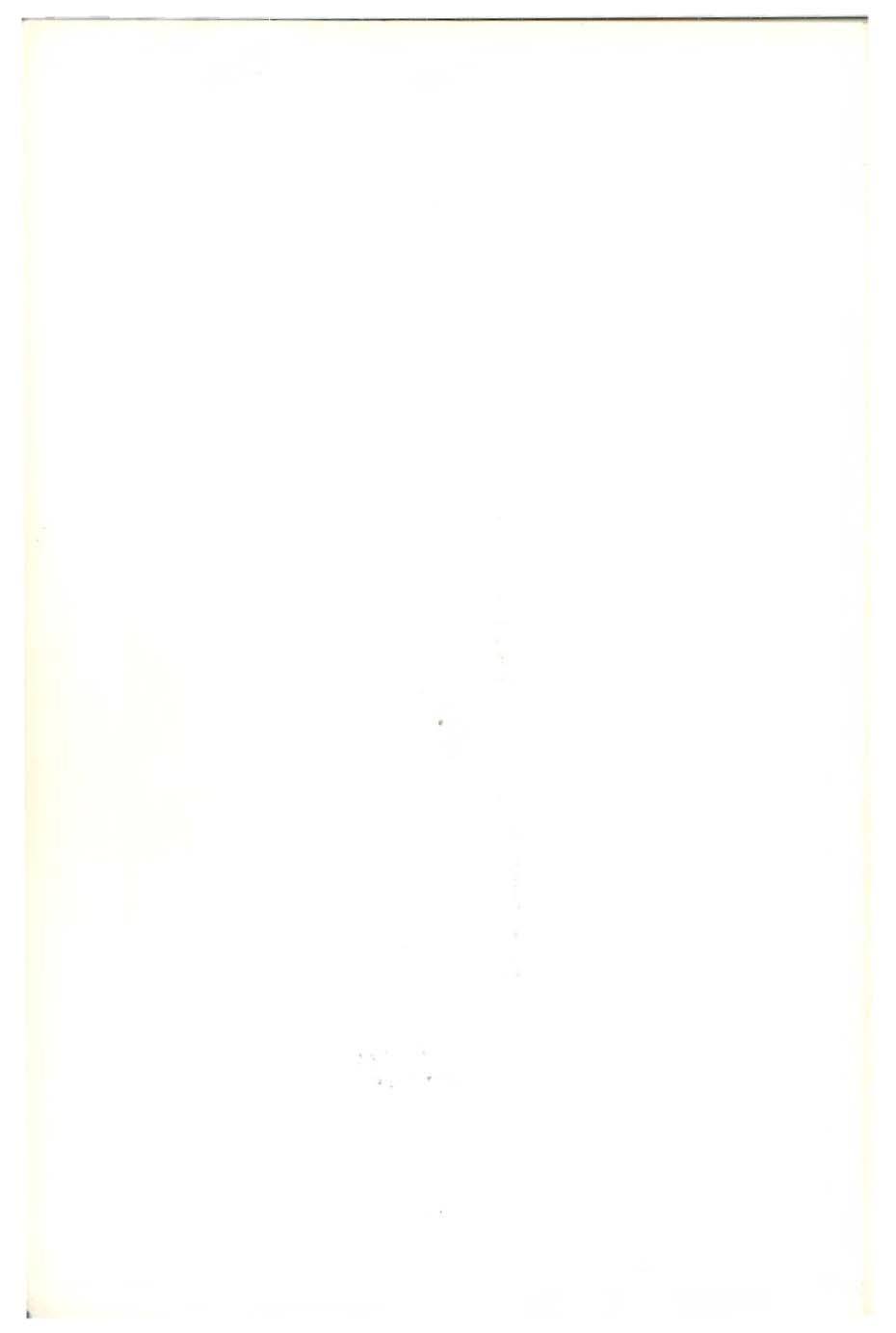
Information abo,ut student retention and completion as required by the Higher Education Ame ndments of 1976 is available through the Office of Student Affairs .
No person attending Peru State College shall, on tbe grounds of race, color, national origin, handicap, or gender, be excluded from participation in, be denied of, or be subjected to discrimination under any program or activity receiving federal financial assistance Inqui ries regarding these matters shou ld be directed to the Vice President for Administration and Finance. This catalog contains officia l information for the 1998-2000 academic years. The College res,erves the right to repeal, change, or amend rules, regulations, tuition and fees, and may withdraw, add to or modify courses and programs. The catalog is p1L1blished by Peru State College at Peru, Nebraska and entered under Bulk Pennit Number 4 at Peru, Nebraska 68421.

The College phone number is: (402) 872-3815
The College World Wide Web Home Page address is: http://www.pe1ru.edu/
The Library World Wide Web Home Page address i s : http://www.pe1ru.edu./Jindsay/library.html
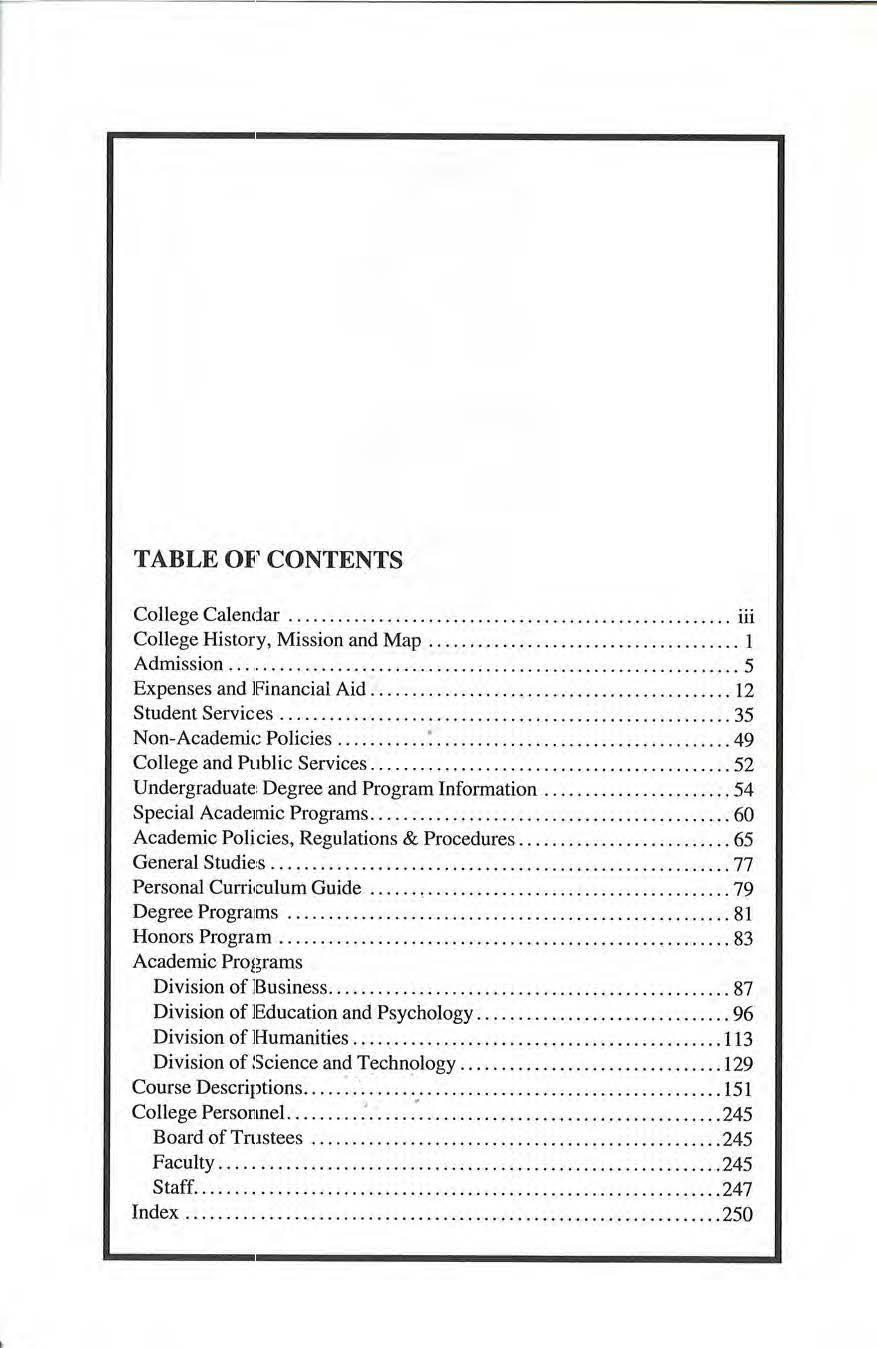
College Calendar iii College History, Mission and Map ...................................... 1 Admission ... .. .......................................................... 5 Expenses and JFinancial Aid 12 Student Services ....................................................... 35 Non-Academic Policies : 49 College and Public Services 52 Undergraduate, Degree and Program Information 54 Special Academic Programs 60 Academic Policies, Regulations & Procedures ..... .. .... ..... . ......... 65 General Studie,s 77 Personal Curri,culum Guide ...... , ..................................... 79 Degree Progra1ms 81 Honors Program 83 Academic Programs Divi sion of ]Business 87 Division of Education and Psychology ............................... 96 Division of IHumanities 113 Division of :Science and Technology .. ..... . .. . .. .... . .. .. .......... 129 Course D escriptions 151 College Persomnel ............... .'..................................... 245 Board of Tmstees 245 Faculty ............................................................. 245 Staff 247 Index .. ..... .. . . ... ............. .... ... ..... ................... . .... .. 250
TABLE OE' CONTENTS
rrcshmon Welcome and Orientation
1998-2000 ACAOEMI C CA LENDAR
FALL S EMESTER 1998
Rcgistra1ion (late registration allcr this dale)
Day & evening classes begin
AprlicRtions for Non-Resident Scholar due
Lns1 d~y 10 Add/Drop regular semester courses
Labor Day l lo liday (no clas..<e-1 - ofli(l(l5 do~cd)
Chwcs resume

Tuhi0t1 and fee payment
Applications for December gradua1ion due Stude.nt teacher applicmions due for Fllll 199')
Mid-Term ends
Mid-Term Break (no clns,c, - offices open - classes dismissed following the final class meeting on October 16)
Classes resume
.La.st day 10 withdraw from regul ar scrncstcrcourses withn W
Homecoming
P'1iregis1ration for Spring Semester
l'all Brcok (no classes - o ffioes closed - classc, di s missed ill 5:50 pm. on November 25)
auses res ume
Last day or regular semester classes
Final Exam Weck
Semester end~
Sarurday-1,1011day, Mooda}', Monday, Monday, Friday. Monday, Tuesday, 1¥ed11esday-Friday, Frfd<1y, Fridoy, Fridny, Mu11day-T114 day.
\Vt'dn~,t/ay, fr/da y,
Satur<la v \V~dnesdQ)~Friday, 'T'lwrsda)~Friday,
Monday, Friday, Mo11day-1lmr6day, Friday,
SPRING SEMESTER 1999
Registration (late rcgis1mtfon after this date)
D~y & evening classes begin
Last day to Add/Drop regular scmc,1er courses
Mart.in Luther King Observw,cc ( nl) clas.scs- orlice.s open)
Tuition and (cc payme nt
Applications for May Graduation doe
Mid -"ienn e nds
Student teacher applications due for Spring 2000
Mid-Term Break (no c lasses -offices open - classes Oismisscd foll owing the finaJ class metting Mun;h 5)
1..851 day 10 withdraw from rcgulru- ,emesler courses withaW
C lasses resume
Preregistration for Fall Semester
Spring Brcolt (no classes - offices c lo5Cd)
Clussc~ rc.\umc
Los! day of reguhtr semester c lassci final faam Weck Comrnenccrnenl
Mm,day, Mmtday, Fridny. Mo11day, Wtdntsdny-Friday, Frldny. Friday, Fridny, Mo11duy-Friday, Mmulay. Mo,1day, Monday- Wed11estlay, Friday, Monday, Friday Montlay-Frlikly. Sar/lrda_l'.
SUMMER TERM 199')
Registmtion
Classes begin
Tuition and fee payment
Last day of rcgis lnltion or change of regis1ration
Independence Day Holiday (no classes-offices closed)
First Five Weck Session ends
Second Five Weck Session begi ns
Sccur, d Five Weck Session e nds
CALENDAR
August 22,24
Aug11~124
Augu.1t 2.4
August 24
August 26
September 7
Scp1ernbcr8
Sep1embnr 2-4
Septe mber 25
Octobct 2
Oc1oberl6
October 19--W
Ociobe.r 21
October23
Octobcr24
November 11 - 13
NovcmbN 26-27
Novcrnbcr 30
Dcocmbcr 1l
Occcmher 14-17
December 18
January 11
Jnnuary 11
January 15
Janua ry 18
Jnnuary 20-22
Fchnmry 12
Mru-ch 5
March 5
March 8 - 12
March IS
Marc~ 15
Mru-ch 22-24
Aprill
April5
April 30
May 3-7
Mays
Monday, T11esdny, Tuesda.v-11wr..day, 1¥ed11esday, Monday, 11rursdoy, Monday, Th11rsdtiy,
Jun• 7
Junc8
Junc!!- 10
June 9
July 5
July 8
July 12
August 12
CALENDAR
Freshman Wcl'come &, Orientation
Reg(s(rution Onie registration aficr tl1is dale)
Day & Eve ning classes h~gin
Last day to add/drop regular semes ter c lssses
Tui1io11 and fee paymcn1
FALL SEMESTER 1999
Labor Day Holiday (no classes - offices closed)
Cfossc.t rcslJmc
Applicalions for December Graduation due
Sludcnt teacher ~pp lications due fo r Fal l 2000
Mid-Tenn ends
Mid -Tonn Break (n1> cl:t.Sscs - 9 fCices open - cla,;sc,; dismissed following the final class meeting o n Ooiober 15)
Last day to withdraw fmm reg ular 1'<:mcstercourses with a W
Classecs resume
Preregi~tration for Spring Semester
Fall Break (no classes - offices closed - classes dismissed at .'.i:50 p.m. on November 24)
Cl11sscs resume

Last day or regular semester classes
Pinal Exam Wet;k
Semester e nds
Registration (late registration aller this dale)
Day &evening classes begin
Sut11rday-Monday, Mond(jy, Monday. Fridny. Wed11ssl1ay•Friday, Monday 'Tuesday. Friday, Friday, Friday. Mondr1y 4 TU~$dlly, Friday. Wed11esday, \Ved11esdiJy,Fridu_v, Th,.rsduy-Friday, Mo nday, Friday, Mo11day-T/tursduy, Prfday.
SPRING SEMEST ER 2000
Last day h) add/dr,)p regular scmestercour,;cs
Martin Luther King Obscrvru,cc (no classcs--0fficcs open)
Tuition. and fee paymenl
Applica1io11s for M;i.y Gr•dua1ion due
S 1udcm reacher applica1ions d ue ror Spring 2001
MTd-Torm e nds
Mid-Ten,1 Break (no c lasses - offices open - cla.,ses dismissed following lhc final cla~ meeting March 3)
Last day to withdraw from Regular scmestercoun;~s with a W
ClMscs rc.wrne
Prercgistralion for Fal l Semester
Spring Break (no cla,;ses - offices closed)
Classes resume
Last day of regular scmcsicrclosses
Final Exam Week
Cornmcncemcnt
RcgiWalion Classe..~ begin
August 21-23
August 23
Augu st 23
August?.7
September I-3
Soplcmber6
Scprembcr7
September 24
Octobor I
October 15
Octob•r I ij- t 9
Octobcr22
Octobtlr20
November I 0-12
November 25-26
Novcmbcr29
December 10
December 13- 16
December 17
Monday. Monday. Frida,_v. Mondo)', We.dnes,lay• Frici.ay. Friday. Friday. Friday. Mo nday -Friday, Mo11day Monday, \Vt!d11,.,day-Friday, Friday, Monday Friday, Mm1da>•-Frid11y. Slll11rcloy,
SUMME R TERM 2000
L;is1 day of rcgistmlion or change of rcgislmtio n Tuit ion and fee payment
Independence Day Holiday ( no classes - offices closed)
Fim Five Week Ses. ion ends
Second F ive Week Session begins
Second Five Week Sessiot• ends
TENTATIVE 2000-200 1 DATES:
Fall c lusses begin August 21, semester e nds Dccen1bcr I5
Spring clllSScs begin January 8, CommMcement ls May 5
TENTATIVE'2001-'2002 DATES:
Fal! classes begin Augus t 20, sc111cster e nds December 14
Springcla;ses begin January 14, Commenceme nt is Mny 11
T ENTA'!'JVE 2002-2CX)3 DATES:
Fall classes begin August 26, semester ends Dece mbe r 20
S11ring c'lasscs hegi n January IJ. Commence me nt is May 10
Monday, Tuesday, Wecl11esduy1 T11esdoy-Thursday, T11esday, Fridny, Mo11dny, Thursday,
January JO
January 10
January 14
January 17
January 19-21
February 11
March 3
March 3
Marth 6-10
March 13
March 13
Man:h 22-24
April21
April 24
April28
May 1-5
May6
Ju11c5
June 6
June 7
June 6-8
July 4
July7
July 10
August 3
AN INTRODUCTION TO PERU STATE COLLEGE
Peru State College was founded i n 1867 as Nebraska's first coll ege and was the third teacher ed ucation in stitution establ ished west o f the Missouri R iver. F or more than a century, thousands of young people have crossed the Campus of a Thousand Oaks to become teachers and l eaders in Nebraska and t hroughout t he nati on.
The people of Nebraska have made the faci l ities of the Co llege ava ilable to students at a minimum of perso nal cost. The taxpayers of the state bear th.e major portion of the cost of educating the College's students.

Peru State admits all graduates of accredited Nebraska h igh schools and qua l ified out-of-state students. The philosophy of the College is that each person is entitled to the opportunity to succeed at the collegiate level. All w ho have the abiJjty and the willingness to work will hav e an excellent cha nce to s ucceed at Peru State.
The College believes in academic ex_cellence, in opportunities for personal growth, and in student self-determination consistent with the p rinciples of a democratic society. Administrative intent is to involve students in the decisions which affect them. The Colleges educationa l experience is designed to enable stude nts to learn, to equip themselves for meartingful careers, and to be productive members of society. Peru State s tudents have the opportunity to know their instructors well and to be working par tners with the staff and other students. Living and working with other people offers many opportunities for friendship, growth, and personal development.
The College's facu lty and s taff are here to serve you. We welcome the opportunity to assist you in realizing your personal , educational, and career objectives.
H istory
fn 1867 , the same year that Nebraska became a s tate, th e new state's legislature established a training sc hool for teachers at Peru. The school actually began on December 2, 1865, when its predecessor, Mount Vernon College, was organized by a group of early settlers who resolved to place the school unde r the "care and manage ment of the M e thodist Episcopal Church."
Colonel T.J . Majors , a leader during the Civil War and a state legislator, proposed that the school be made into a s tate university Although the offer was rejected, the state leg islature on June 20, 1867 did accept the school as a "normal school ' ' several months before the state university was established. For the next 38 years, the Peru sc hool was the only teacher education institution in the s tate.
A s Nebraska's population increased, the legjs lature extended the normal school s from two-year to four-year in stitutions and authorized them to grant the d egree s of Bacllelor o f Arts in Education, Bachelor of Science in Education, and Bache lor
INTRODUCTlON-- 1
of Fine Arts in Education. At the same time, the name of the school was changed from State Normal School to State Teachers College. In 1963, Peru's name was changed to Peru State College. When the United States entered World War 11, the College trained officers for the armed forces. The first of an eventual 500 men in tbe Navy's V-12 program arrived on campus July l, 1943. The College operated an accelerated program for both civilian students and naval trainees. In 1949., the legi slature a uthorized the Nebraska State Colleges to confer the Bachelor of Arts degree. The Bachelor of Science degree was authorized in 1965. Emerging from its role as a si ngle- purpose teachers college, the College is now a regional state college offering a wide variety of programs to meet the changing needs of southeast Nebraska and beyond.
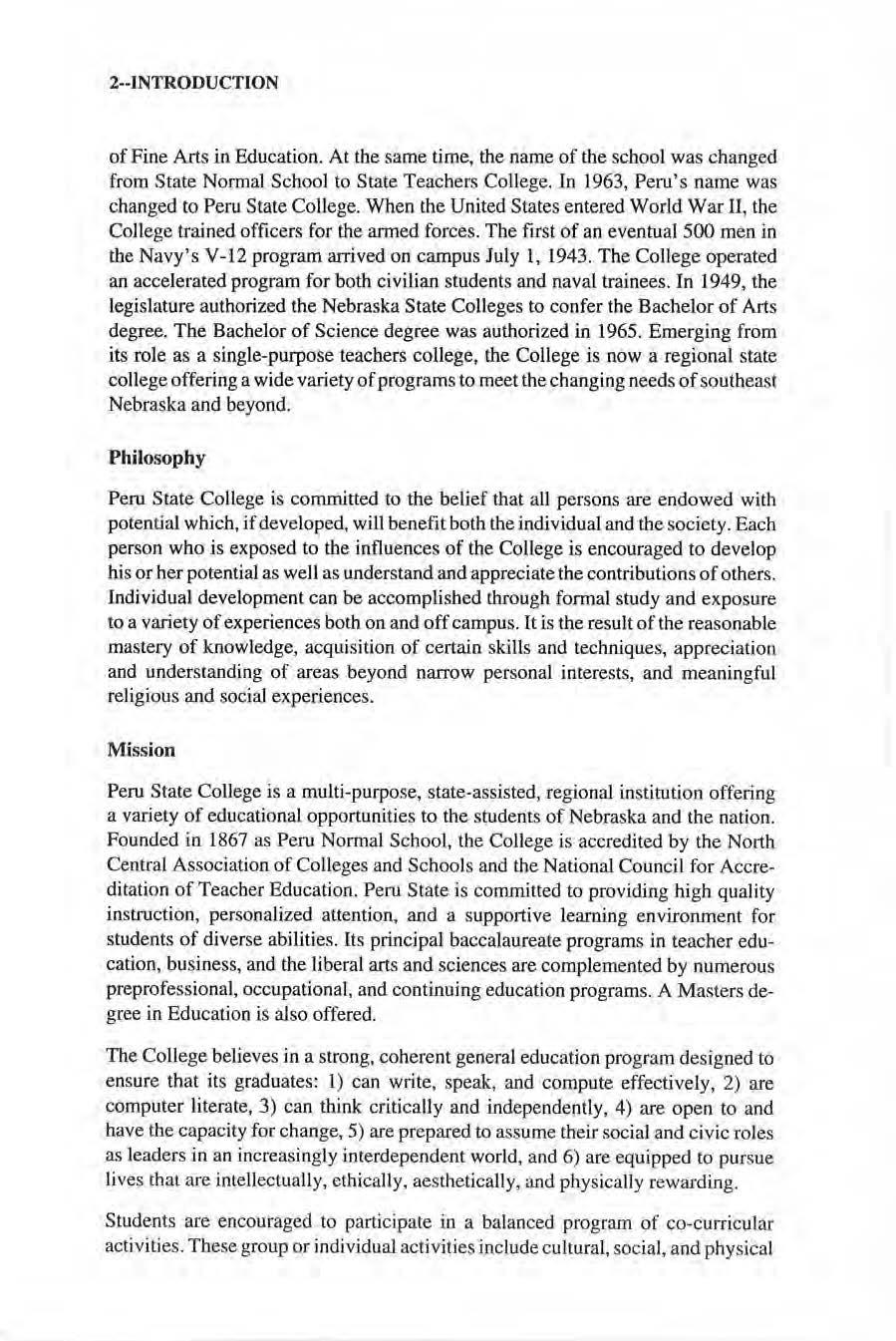
Philosophy
Peru State College is committed to the belief that all persons are endowed with potential whjcb, ifdeveloped, wi II benefit both the individual and the soc iety. Each person who is exposed to the influences of the College is encouraged to develop his or her potential as well as understand and appreciate the contribut ions of others. Individual development can be accomplish ed through formal study and exposure to a variety of experiences both on and off campus. It is the result of the reasonable mastery of k-nowledge, acquisition of certain skills and techniques, appreciati on and understanding of areas beyond narrow personal interests, and meaningful religious and soc ial experiences.
Mission
Peru State College is a multi-purpose, state-assisted, regional in stitution offering a variety of educational opportunities to the students of Nebraska and th e nation. Founded in 1867 as Peru Normal School, the College is accredited by the North Central Association of Colleges and Schools and the National Council for Accreditation of T eacher Education. Peru S tate is committed to providing high quality instructio n, personalized attention, and a supportive learning e nvironment for students of diverse abilities. Its principa1' baccalaureate programs in teacher education, bu siness, and the liberal arts and sciences are complemented by numerous preprofessiona l, occupational, and cootinoi ng educ ation programs. A Masters degree in Education is also offered.
The College believes in a s trong, coherent general education prog ram designed to e ns ure that its graduates : 1) can write, s peak, and compute effectively, 2) are comp uter literate, 3) can think critically and independently, 4) are open to and have the capacity for change, 5) are prepared to assume their social and civic roles as leaders in an increasingly interdependent world, and 6) are equipped to pursue lives that are intellectua ll y, ethically, aes thetically, and physically rew81·ding.
Students are encouraged to participate in a balanced program of co-curricular activities. These group or individual activities include cultural, social, and physical
2-•INTRODUCTION
pursuits which augment or support the instructional program. sustain tradition, and strengthen the College community.
The College is committed to continuing and enhanci ng its role as a center for regional development. Through its cultural, educational, research and public service efforts, Peru State assists other institutions and agencies in community and economic development for the benefit of all.
Goals
Jn order to fulfill its mission, Peru State has established the fo llowing goals:
* To increase t he quality and diversity of programs to persons with differ ing aptitudes , interests, and needs ;
* To intens ify its milieu of academic excellence;
* To enhance the intellectual cooperation between the liberal and applied arts;
* To promote the inv olvement of both s tudents and faculty in experimental and creative research;
* To strive to be a more effective publi.c service institution;
* To offer continuing and occupational education for personal and career enrichment;
* To explore new and creative educationa l opportunities for students;
* To serve as a transitional educatio nal institution for students purs uing various occupational or profess ional objectives;

* To prepare s tudents to be contributing members of a democratic soci ety;
* To enhance s tudent developm ent outside the classroom.
Memberships and Accreditations
Peru State College is accredited by the Commission on Institutions of the North Central Association of Colleges and Schools and by the National Council for Accreditation of Teacher Education. Full membership is maintained in the American Association of Co lleges for Teacher Education and the American Council on Education. The College also is a charter member of the Nebra~ka Cou ncil on Teache r Education.
lNTRODUCTION--3
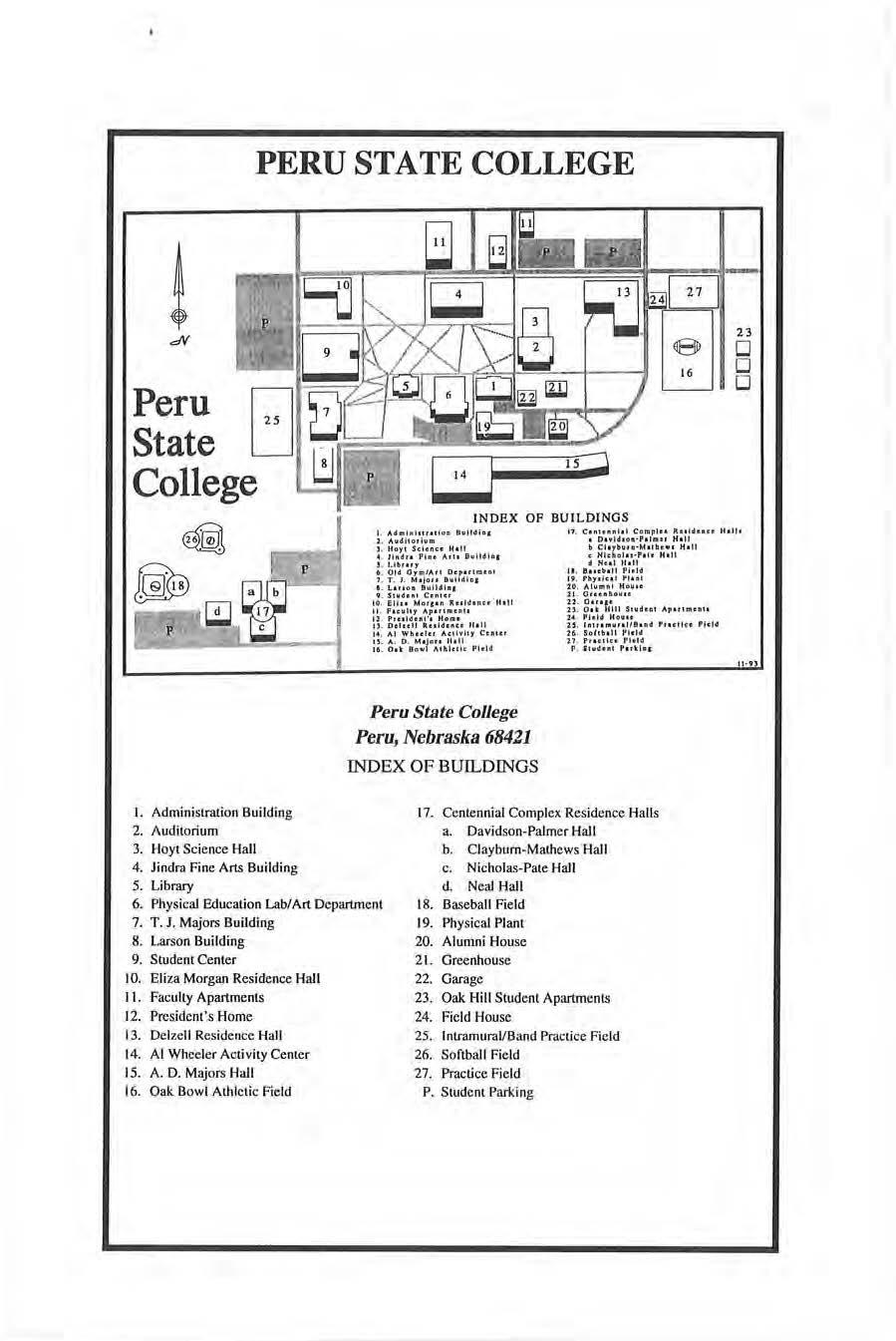
PERU STATE COLLEGE ! 27 23 dV D 0 0 Peru 2 State College I NDEX OP BUILDINGS 1. •ll•h 1 1 ll' e 1 1 Cc 111 ph1. 111 ,11,h.u , ll 1lh • o thl l I. Adm ini slratio n Buildin g 2. Auditorium 3 lloyt Science Ha ll 4. Jindra Fine Ans Building 5. Library l , Hori $dun 1h11 4 J l •d u P i • l• !l41 r J ·'"'"' ;_ ~!",.o~ ~:~:• .~;r;.t,•;'n t I L U U •• !14l•a 9 to <llf I Cfll tU 19 , E l h • Mo11 • n J1u l ,h 11u ff 11I I I f'u~h, A, , n , , IJ P o11Jd1 • t·1 IJ OehO I R u ld1,u:1 1h 11 11 Al Wlt1 t l u Auhhr C u u, ::: ~~t ~:1·~:.'i''/11 • 1,1• Peru State College Peru, Nebraska 68421 INDEX OF BUILDINGS : ~::c:~::.-.~:!"H::1,11 11 a Nul 1h 11 11 e,ulPo ll Plt lil i, ••r•l u t •11,1 :o, Alu• • I HH • • 11n: ~=~•r:111 $1w41<11 Ap ot l fflt H 1• fll,i. i,., 1u,, .-.,, ,1 1• • • 4 r,u1 l n P lcl 4 U. SO-hb 1ll l'l • t • n ..-, 11u '" fl ,1.lliHI P u \1• 1 17. Centennial Complex Residence Halls a. Daoidson-Palmer Hall b Clayburn-Mathews Hall c. N icholas-Pate Hall d, Ne,~ Hall 6. Physical Bclucation Lab/Art Departme nt 18. Baseball Fie ld I 9 Physica l Plant 7. T. J. Majors Building 8. Larson Building 9. Student Center 10 Eliza Morgan Re sidence Hall 11. Facu lty Apartments 12. Pros.idcnl's Home 13. Del,cll Residence Hall 14. Al Wheeler Aotioity Center 15. A. D. Majors Hall I6. Oak Bow l Ath letic Field 20. Alumn i House 21. Greenhouse 22. Gat3ge 23. Oak Hill Student Apartmunts 24. Fie ld House 25. IntramuraVBand Practice Fie ld 26. Softba lI Fie ld 27. Practice Field P. Student Pariting
ADMISSION
Peru State College welcomes appUcations from s tude nts who wi s h to pursue tbeir educational and vocational goals.
Entering Freshmen
Admiss ion to P eru State College (PSC) is granted to students who have g raduated from accredited Nebraska high schools and who have not previously attended college, or out-of -state students who meet the College's admissions standards. The College recommends that entering fres hmen h ave completed the following uni.ts of work in their high school program of study: four (4) units of English, three (3) units of social sciences, three (3) units of mathematics, two (2) units of laboratory s ciences, additional courses in foreign language, fine and perfonning arts and computer Literacy

Entering freshmen who are seeking an undergraduate degree should follow tnese steps for admis s ion to Peru State College :
I. Submit an appl icati o n for admissio n to the Office of Admissions.
2. Submit a nonrefundable application fee of$ I0.00 with the application form.
3. Provide an official tran script. Request that your high schoo l Record s Office mail an official tran script which bears the s ea l or other offici a l designation of the institution directly to the PSC Office of Admissions . The transcript should include at least six semesters of study up to your senior year Immediately upon graduation from hi gh school you will need to submit a final high schoo l transcript indicating your graduation date, c umulative grade po int average. and class rank. Out-of -state applicants must have a minimum cumuJative g rade point average of 2 .0 or ''C'' average.
4. Provide test s cores. Request that the results of your ACT (American College Test), or SAT (Scholast ic Aptitude Test) be sent to the PSC Office of Ad.missions by indicating PSC as a recipient of your scores or by contacting the appropriate testing agency if the test bas already been taken Out-of-state applicants must have minimum composite scores of 14 on the ACT or 560 on the SAT. Students who have been high schoo l grad uates for more than one year, or who hold the GED, do not need to s ubmit test sco res. Out-ofs tate appl icants who do not meet the minimum requirements outlined above may be admitted by submitting a Jetter of recommendation from the ir high s chool counselor.
5. AU s tudents planning to attend the main Peru campus must submit the PSC Medical Form. Tb.is form i s available from the PSC Office of Admissions. Thi s information is not used to evaluate an applicant for admission to the co llege The completed form i s forwarded to the PSC Health Center. The information is used to provide the medical staff witb a confidential medical history wh ich 1s used should medical treatment become necess ary. Proof of medical immunizations is required for admission.
ADMISSION--5
When to apply. You may apply for admission after you have completed your junior year. It is recommended that you apply during the first semester of your senior year or at least six months in advance of the semester in which you plan to enroll. Please submit all paperwork as soon as possible to facilitate the admission and financia l aid process.
Coll ege Transfer Students
Peru State College accepts transfer students from other accredited colleges and universities (see below for ''Seamless Transfer''). Transfer students who are seeking an undergraduate degree should follow these Steps for admission to Peru State College:
l. Submit an appl ication for admission to the Office of Admissions.
2. Submit a nonrefundable application fee of $10.00 with the application form.
3. Provide an official transcript(s). Request that the Office of the Registrar of each college or university you have attended forward an official transcript dir-cctly to the PSC Office of Admissions. A transcript is required from each postsecondary institution in which you have been enrolled whether or not credit was earned. An official hjgh school transcript is also required if you have completed fewer than 30 transferable semester credits. To be considered official, a transcript must be sent to the Office of Admissions directly from the issuing institution and must bear the seal or other official designation of the institution.

4. Submit a Transfer Student Report from each of the postsecondary institutions attended These forms are available from the PSC Office of Admissions. The s tudent must complete the top section of the form and forward the report to the postsecondary institutions attended. The institution completing the transfer stude nt report form must forward the information directly to the PSC Office of Admissions. Transfer Student Report forms are not required of s tudents who have completed a college degree.
5. All stude nts planning to attend the main Peru campus must submit the PSC Medical Form. This form is available from the P SC Office of Admission s . This information is not used to evaluate an applicant for admission to the college. The completed form is forwarded to the PSC HeaJtb Center The information is used to provide the medical staff with a confidential medical history which is used should medical treatment become necessary. Proof of medica l immunizations is required for admission .
When to apply. You may apply for admission during your final year of attendance at another college or university. Please s ubmit all paperwork as soon as possible to facilitate the admissi on and fmancial aid process.
Transfer of Credit. After tbe student has been admitted , an official evaluation (Progress Sheet) is completed which identifies the applicability of previous work to the student's expressed major and degree program.
6--AOMlSSlON
A maximum of 66 semester credit hours from a vocational/technical/community co llege may be applied toward the minimum 125 semester hours required for a bachelors degree.
A maximum of 95 semester cred1t hours from a regionally accredited four-year college or university may be applied toward the minimum 125 semester hours required for a bachelors degree .
Transfer students who already have a signifi cant amount of credit hours toward their major will have their transcripts reviewed by the appropriate Div ision Chairperson.
Students who seek admission and are accepted wbjle on probation from their last college are placed on probation for o ne semester and are subject to al.I the policies of probation at the College.
Students who have been suspended from another college will not be cons idered for admission until the period of suspens ion has expired and the facts of the dismissal are provided.

Students who discontinue their attendance at Peru State during a semester and then attend another college or university before seeking readmission are classified as transfer s tudents.
"Seamless Transfer"
Students who have earned college transfer or academic transfer Associate of Arts ( A.A.) or Associate of Science (A.S.) degrees from an accredited institution meet all PSC general education requirements and enter PSC with junior class standing (or, ifless than 60 hours, with a ll hours transferred).
Transfer students from an accredited institution who have completed at that institution substantial ly - equivalent courses to PSC's General Studies cou rses meet the PSC 's general education requirements in that area. Remedial or developmental courses are excluded. Certain majors may have additional general education course requirements.
International Students
International stude nts at Peru State College make an important contrib ut ion to the campus env iron ment by bringing a global perspective to the classroom and cultural diversity to the social and cultural Jjfe of the College.
Application deadlines for international student s are:
Pall semester - August 1
Spring semester- December l
Summer semester - April I
ADMISSION--7
Internatio nal students are strongly encouraged to apply before the deadl ines to allow for plenty of time to complete applicat ion requirements. in order to consider an applicant for admission, the Office of Admissio ns must receive the following:
1. An application for admission to the Office of Admissions.
2 A nonrefundable application fee of $10.00 U S. dollars wrth the application form.
3. Official transcri pts of all academic work. These include:
a. Secondary school reco rds. Send a complete, year-by-year, official record of all schooling beyond the ninth year of education, includi ng any certificates or d iplomas earned. An English translation is required in addition to tbe originals.
b. College o r university records (if applicable). Send a complete, year-byyear official record of academic performance for all postsecondary schooling including any certificates or d iplomas earned. An English translation is required in addition to the originals .
For admission to PSC, average marks during schooling and on final examinations must be a minimum 2.0 grade point average in the PSC grading system. In the PSC grading system, A is 4.0, B is 3.0, C is 2.0, D ls 1.0 and F is 0.0 International students may need to send their transcripts to an i nternational credentials evaluation service for evaluation. The students will be notified by the Office of Admissions if this is necessary and will be sent a list o f agencies that perfo r m this s ervice. The cost will depend upon the type and complexity of the evaluation.
4, Ev i dence of English language p roficiency. Scores from the Test of Eng lish as a Foreign Language (TOEFL) must be provided by those who come from areas in which English is not the dominant language spoken and written. The minimum acceptable score is 550 for an undergraduate. An individual m ust be proficient at speaking and writing English to be exempt from this step.
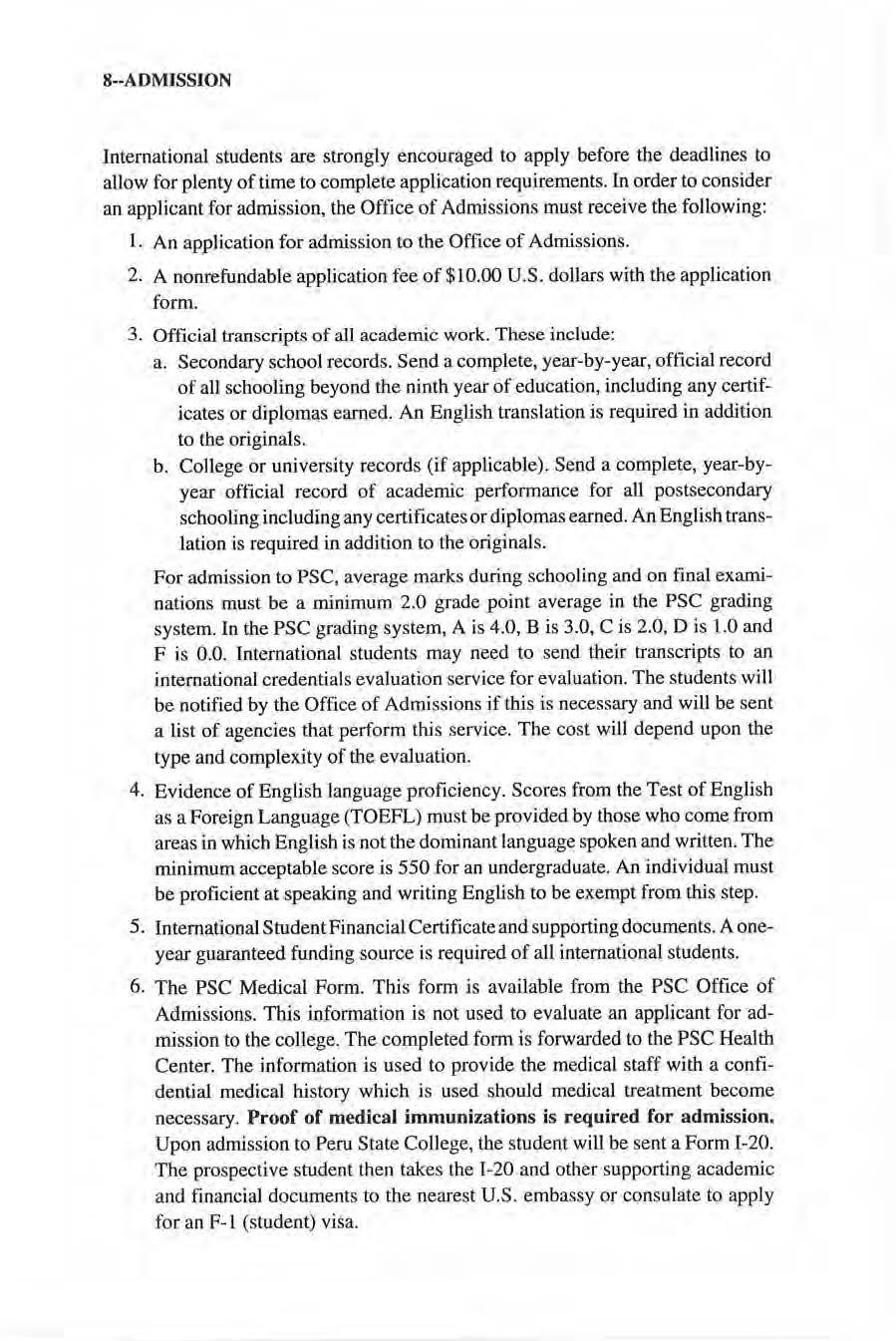
5. Internationa l Student Financial Certificate and supporting docwneots. A oneyear guaranteed funding sou rce is required of all international students.
6. The PSC Medical Form. This form is available from the PSC Office of Admissions. Tb.is ioformatio n is not used to evaluate an applicant for admission to the college. The completed fmm is forwarded to the PSC Health Center. The i nformation i s used to provide the medical staff with a confidential medical history which is used should medical treatment become necessary, Proof of medica l immu n iza tions is required for admission. Upon admission to Peru State College, the student will be sent a Form 1-20. The pros pective student then talces the 1-20 and other supporting academic and financi al documents to the nearest U.S. embassy or consulate to apply for an F- 1 ( stodent) visa.
8--ADMISSlON
Admission of Non-High School Graduates Seeking a Degree
Peru State College requires verification of high school graduatio n prior to enrollin g as a student seeking a degree. For the student with a no ntradi tio nal ed ucational back g ro um;I, PSC accepts the successful completion of the General Edu cation Develo pment test (GED ) in lieu of a formal high school diploma. Non-hig h school gradu ates seeking a deg ree shou ld fo ll ow these steps for admi ss ion to Peru State College:
1. Submit an applicatio n for admissio n to th e Office of Admissions.
2. Submit a nonrefundable application fee of $ 10.00 with the application form.
3. Provide an official copy of General Education Development test (GED) results.
4. Submi t the PSC Medical Form. T hi s form is available from the PSC Office of Admissions. T his in for matio n is not used to evaluate an applicant for admission to the college. The completed form is forwarded to the P SC Health Ce nter. The information is used to provide the medical staff with a confidential medical hi sto ry which is used shou ld med ica l treatment become necessary. Proof of m ed icaJ immun izations is required for admiss ion.
Admiss ion of No n-degree Stu dents (Taking Courses For P ersonal Enrichment)
S tudents not pursu.ing a degree program may take classes at PSC. Completion of an applicatio n is necessary. Howeve r, previous academic transcripts, standardized test sco res or a n application fee are not required.
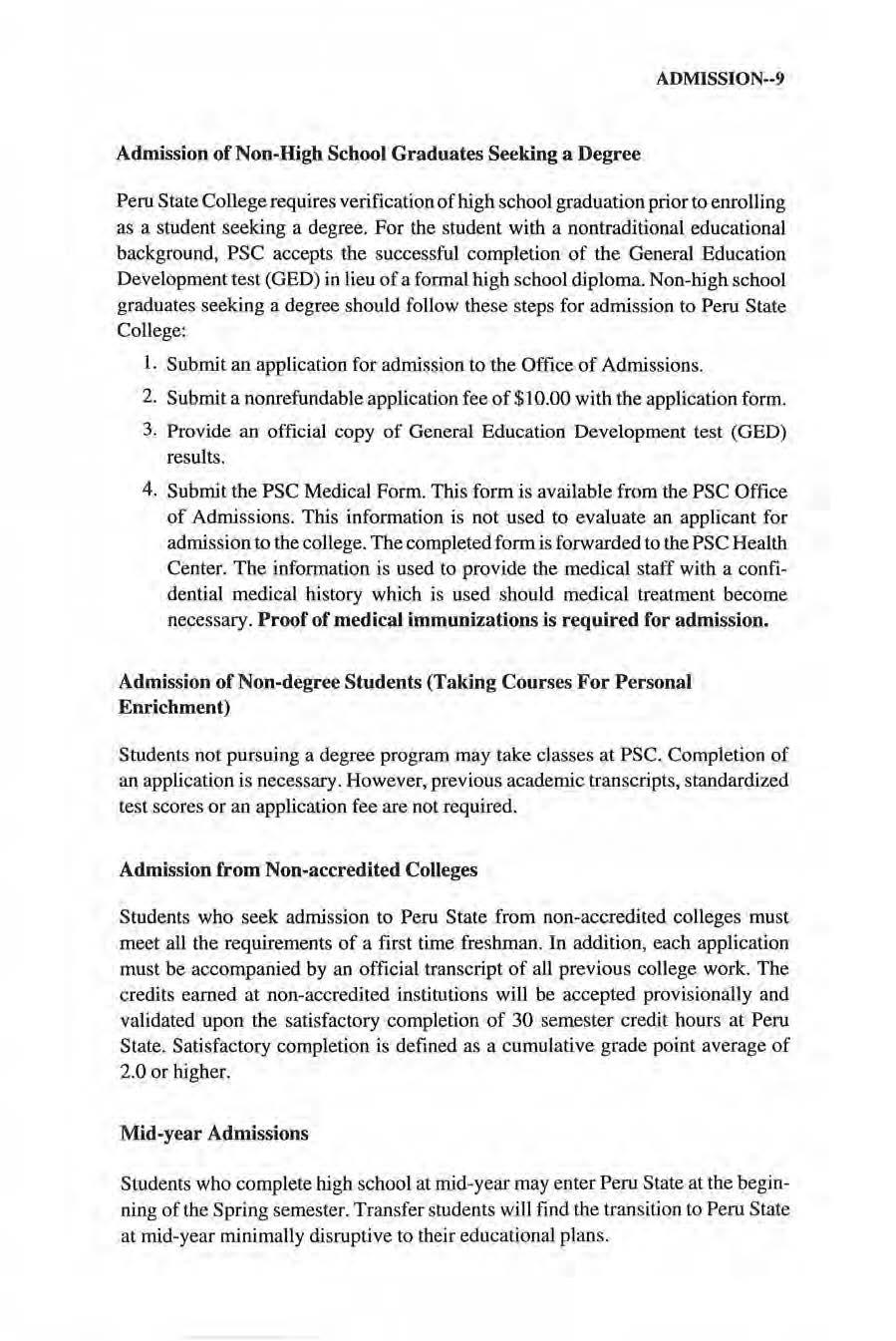
Admission from Non-accredited Colleges
Stude nts who see k admission to Peru State from non-accredited colleges must meet all the requirements of a first time freshman . In add ition , each application must be accompan ied by an official tra nscript of all p revious coll ege work. The credits earoed at non- accredi ted institutio n s wilJ be accepted provisional l y and validated upon the satisfac to ry completion of 30 semester credit hours at Peru State Satisfactory completion is defined as a c um ulative grade point average of 2.0 or higher.
Mid-year Admissions
Students who complete high schoo l at mid-year may enter Peru State at the beginning of t be Spring semester. T ransfer stude nts wi II find the tran sition to Peru State at mid-year minimally disruptive to their ed ucatio nal plans.
ADMISSION --9
Admission to Advanced Standing
Advanced standing is a status beyond the minimum for admission to the College. It is attained by presenting work comp leted at another college or by demonstrating proficiency in a field that removes certain prerequisites. The removal of prerequi s ites may be with or without credit.
Readmission
All u ndergraduate students who have previously attended Peru State and were admitted to an academic program, students who withdrew during a semester or discontinued their studies for a semester or more (summ e r session excl uded), and all post-graduates seeking an additional academic program must apply to the Office of Admissions for readmission. Students suspended for academic or disciplinary reasons must also reapply to tbe Office of Admissions.
Students are generally readmitted for the semeste r or summer term they wish , provided they left the College in good standing.
Students who interrupted their studies, and who were on academic probation, will generally be readmitted for the semester or summer 'term they wish, provided they are in good standing with the College.
Stude nts who are academically suspended wiJl not be considered for readmission for two semesters.
Previously suspended students who are readmitted will generally be subject to permanent suspension if they are suspended a .~econd time.
Students readmitted following academic suspension must maintain an average of 2.0 or higher for the re-entry term and for each successive term until the required cumulative grade point average of 2.0 bas been achieved Failure to meet the above co nditi ons will result in academic suspens ion. A student who has been suspended twice is generally not considered for readmission.

Transfer students who have been previously suspended are subject to the same policies as readmitted students.
Students who discontinue attendance at Peru State College, attend another co ll ege or university, and then seek readmission are considered transfer students.
Readmitted Peru State students may graduate under the cata log in effect at the time of their first admission, if they graduate within seven (7) years of initial enrollment at Peru. Readmitted s tudents are subject to all coJlege regulations and to any additional provis ion s as a cond ition of readmiss ion.
10--ADMISSION
Notification of Admission
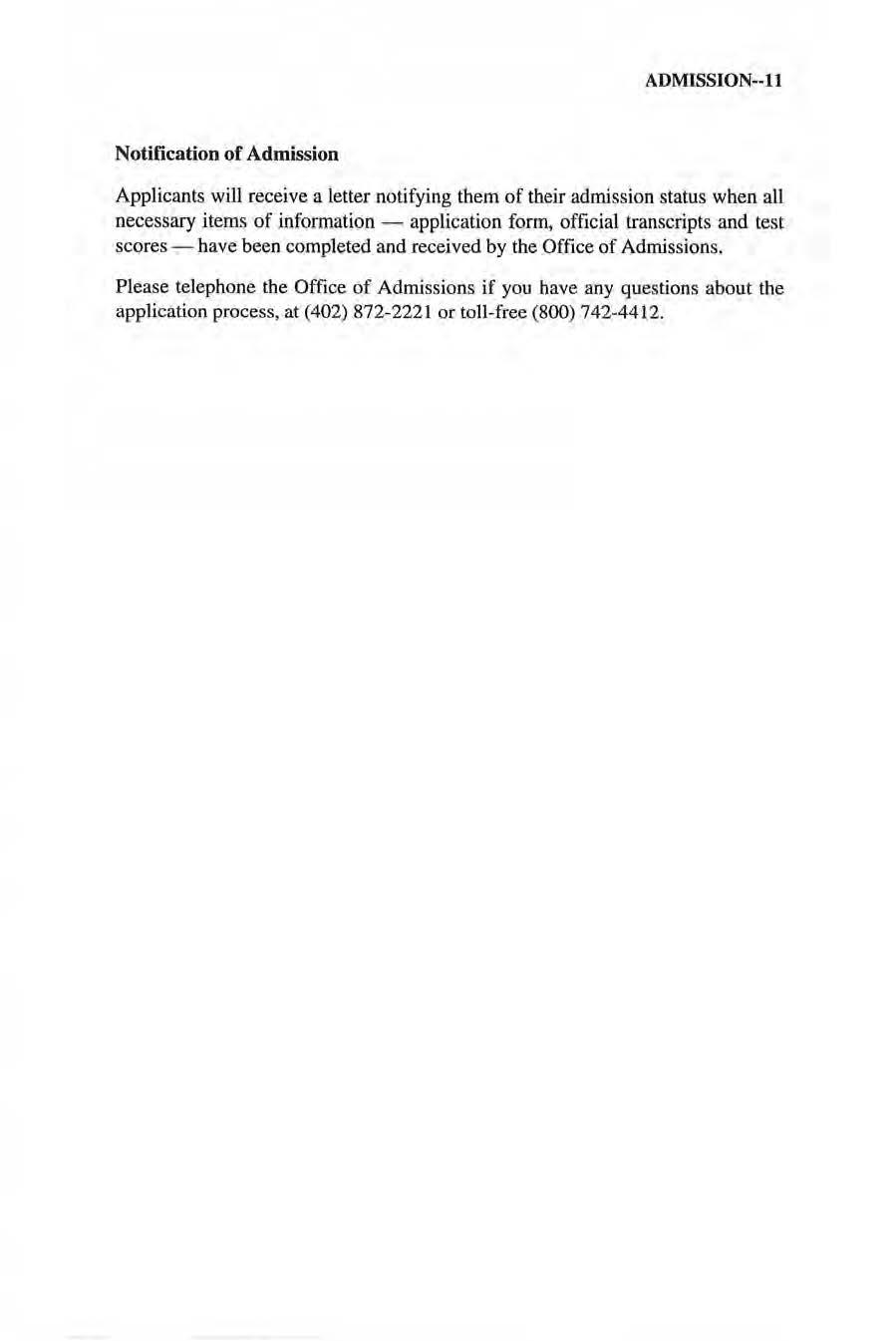
Applicants will receive a letter notifying tbem of their admission status when all necessary items of information - application form, official transcripts and test scores - have been completed and received by the Office of Admissions .
Please telephone the Office of Admissions if you have any questions about the application process , at (402) 872-222 1 or toll-free (800) 742-4412.
ADMlSSION--11
EXPENSES & FINANCIAL AID
Th e expenses for attending Peru State College are set by the .Board of Tru stees o f the Nebraska State Colleges and Peru State. The College reserves the right to change its tuitio n, fees, and other c harges al any time. Additional expe nses for books and su pplies, travel, and personal items will vary for individual s tudents. Tuition rates for 1998-1999 are below.
Nebraska residency for tu iti on purposes is determined in accordance with Nebraska s tatutes and the policies of the Board of Tru stees. R esidency status is based upon ev idence provided in a student's application for admissi on and related docum ents. The Office of Admissions classifies a ll new students.

A currently enrolled non - resident student who seeks Nebraska residency status must officially ap ply through the O fficeoflhe Registrar. The completed application and supporting documents must be s ubmitted on or before t he final date to drop and add courses. Thi s d ate is published in the catalog and class schedu le. A change in reside n cy s tatus is d etermi ned by the Registrar.
Students who gain resident stat us from non-resident status qualify for a spec ifi c term and subsequent terms. Students do not qualify as res idents for any term of attendance prior to the initial res id en t term. In additi on, a change in resident class ification th at occurs during a term, but prior to the app lication deadline, does not e ntitle a student to a tuition refund fo r that term.
Students are respon sibl e for promptly notifying th e Registrar if their resid eat status changes A stude nt 's residency classification may be reviewed ifthere is evidence to indicate a c hange in legal res idence.
Th e residency po licy is not related to the Non~Resident Scholarship program. Information co ncern in g the Non-Resident Scholarship program sho uld be directed to the Office of Ad miss ion s.
12--EXPENS€S & FINANCIAL AID
Tuition Undergraduate per Semester cred it hour Graduate per Semester credit hour Offutt AFB/Continuing Educ Resident $59.50 $74.50 $69.75 Nebraska
Non-Resident $ 11 9 .00 $149.00
Residency Regulations for Tuition
Fees
Fees must be paid each term at the time indicated in the academic calen dar. Course credit will not be awarded unless debts bave been paid or arrangeme nts for late payments have been approved by the Business Office. Fees for 1998-99 are ;
Mandatory, On-Campus Fees:
Computer Lab Fee (Fall, Spring a nd Summer Sess ion s )
1-6 hours
7 + hours
Facilities Fee ( Fall, Spring and Summer Sessions)
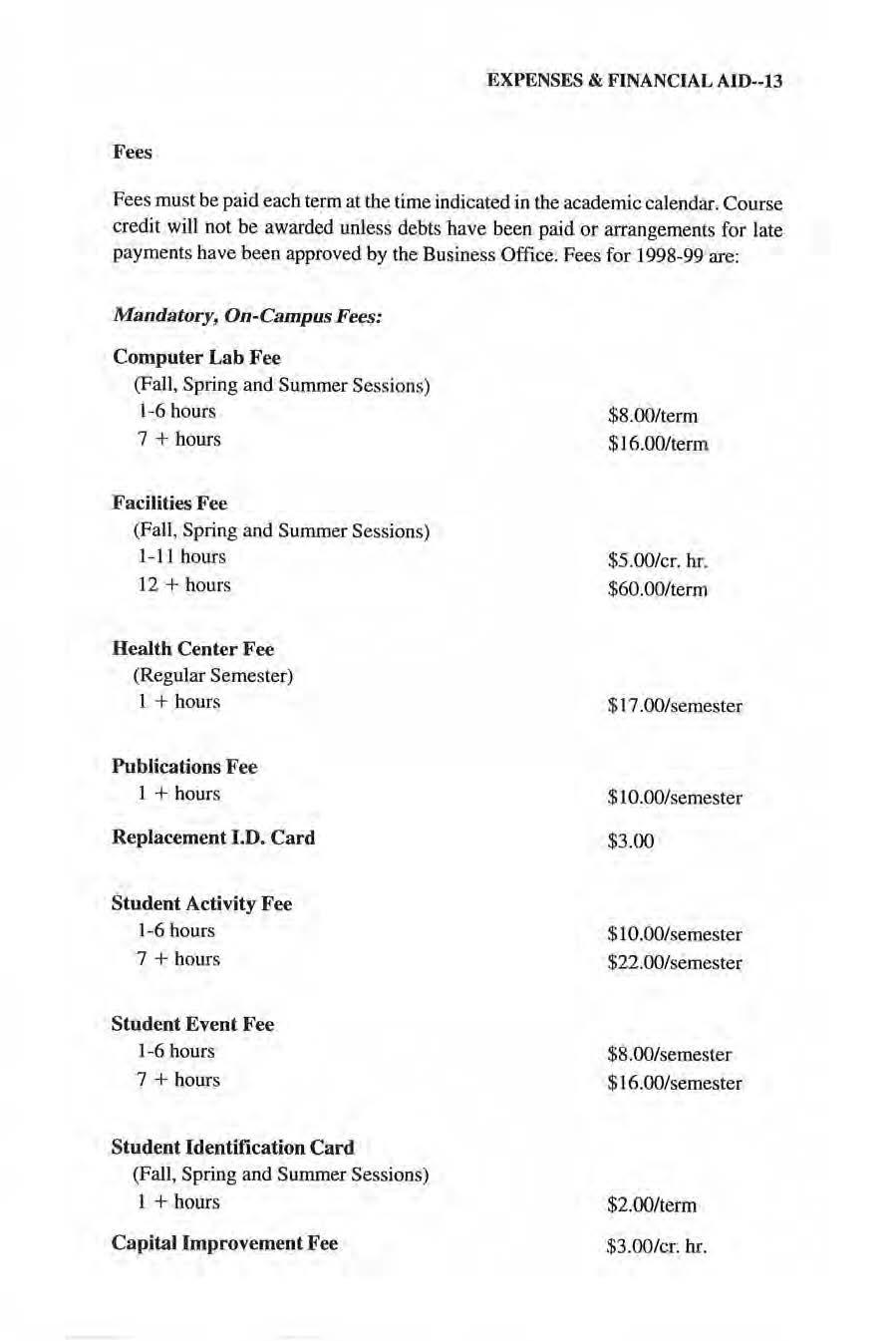
1- I I hours
12 + hours
Health Center Fee (Regular Semester)
1 + hours
Publications Fee I + hours
Replacement I. D . Card
Student Activity Fee
1-6 hours
7 + hours
Student Event Fee 1-6 hours
7 + hours
Student Identification Card (Fall, Spring and Summer Sessions)
l + hours
CapjtaJ Improvement Fee
$8.00/term
$16.00/term
$5 .00/cr. hr .
$60.00/term
$ 17 .GO/semester
$10.00/semester
$3 .00
$10.00/semester
$22.00/semester
$8.00/semester
$ I 6 .00/semester
$2.00/term
$3.00/cr : hr.
EXPENSES & FINANCIAL AID--13
Other Applicable Fees for 1!)97-98:
Administration of CLEP test $7.00
Admission Fee $ 10.00
Admission fee must accompany all applications for admission and does not apply toward tuition.
Continuing Education/Offutt Surcharge
$12.00/cr. hr. (Off-Campus courses)
Course Fees Varies
Some courses require adclitiooal materials, supplies, or laboratory fees
(The cap and gown are rented from the Campus Bookstore. Th.is fee is not a College fee.}
Late Registration Fee $ 10.00
Due on all registrations completed between the end of regular enrollment and up to one week after the regular enrollment period is ended.
Late Tuition Fee 15% of tuition
Due on all registrations completed more than one ( l ) week after the regular enrollment period is ended. Due on aB accounts not paid in full during fee payment unless other arrangements have been approved by the Business Office.
Motor Vehicle Registration
Off-Campus Service Fee

Private Music Lessons (Non-Music Majors OnJy)
Charged to non-Music majors,
Transcript Tuition Refunds
$ 15.00/year
$ I 2.00/cr. hr. $90.00/cr. h.r. $4.00
Tuition, fees and deposits are refunded in accordance with College policies and the Department of Education Calculation Guidelines for refunds Refund distribution is governed by federal guidelines.
14--EXPENSES & FINANCIAL
AJO
Fee Deferment Fee D egree Fee Undergraduate Graduate $4.00 $20.00 $20.00 $35.00
Credential File
Withdrawal from C lass
Tui ti on and fee refunds are grant ed for a reduction Jo semester cred it hoUTS through the final d ate to add/drop reg ular se mester courses as indicated in the catalog. Th e final date to withdraw from class during the summer sessio n is a proportional period oftime.
Withdrawal from C ollege
Students must officially withdraw through the Vice President for Student Affairs. R efunds are granted to stude nts w ho totally withdraw fro m the College within a given time period. All firs t-time s tudents are subj ect to the D epartment of E du cation Calculation Guideli nes for refunds. Al l other s tudents receive a propo rtional refund accordi ng to the fo llowing sch edule:

Regular Semeste r
First and second weeks
Third and fourth weeks
Fifth through eigbfh weeks
After the eighth week
Summer Session
Firs t week
Second week
Third week
After third week
90% of t ui tion/fees/dep osits
50% of tuition/fees/deposits
25% of tuition/fees/deposits no refunds
90% of tuitio n/fees/de posi ts
50% of tuition/fees/deposits
25% of tu it ion/fees/dep osi ts no refunds
Works hops and Other Non-Standard Academic Terms
Refunds for workshops a nd other non-standard terms will be proportional based onthetimeperiodofthe workshop and in compliance with Departme nt of Education Calculation Guidelines for refunds. There will b e no refunds after 50 pe rce nt of th e works hop's or non-standard term's contact hours. Refund specifics fo r non-standard works hops a nd exceptions are dete rmined by l he Business Manag er.
Hou s ing and Food Servke Contracts
H o using and Food Service contracts are academic year annu al contracts. Room reservati ons require a deposit of $75 .00 and m ust accompany the housing contract. The deposit is refundable if th e student comple tes his/her contract, withdraws for approved reasons, or there are no damages to the facility . Stude nts have the opportunity to ch ange meal plans until t he last day of add/drop. Students may appeal to be released from a meal plan by formally appeali ng to the Director of Res idential Life. Food Serv i ce rates for 1998-99 are below Ca ll ihe PSC Admiss io ns Office for current rates.
EXPENSES & FINANCIAL AID--15
16--EXPENSES & F INANCIAL AID
Food Service Rates (meal plans available Monday-Sunday , with noted exceptions)

5 meals/5 days (commuter, faculty, staft)
10 meal s/5 days
10 mealsn days
15 m eals
19 m ea ls
Housing Rates
Delzell and Morgan Halls (per semester)
Private Room
Semi-private Room
Centennia l Complex (per semester)
Priv ate Room
Semi-private Room
Oak HiJJ Apartm ents (partially furnisbed)
One-bedroom Un.it
Two-bedroom U nit
$335.00/semester
$7 42.00/semester
$7 50.00/semester
$790.00/semester
$845.00/semester
$1020.00/semester
:s 770.00/semester
$11 I6.00/semester
$ 866.00/semester
$ 196.00/montb
$ 239.00/month
Both t he one-bedroom unit and th e two-bedroom unit m O ak Hill include water and gas, but not e lectricity. Utilities are taxed and subject to a monthly surcbarge based on utility cost.
Nicholas Hall Apartments (furnish e d with utilities included )
One-bedToom Unit
Two-bedroom Unit
Housing Deposit
Housing and Food Service Refunds
$26 LOO/month
$317 .00/month
$ 75.00
Students who withdraw from school or wh ose hou s ing contract is canceled (both require approval of the Vice President for Student Affairs) may receive prorated refunds of their housing and food service fees . Refunds for bousing follow the same refund schedule establ ished for tuition and fees. Refun ds for meals are prorated on tbe number of days in the semester and the date of approved cancell ation of the contract.
Room deposit will be refunded if:
I. All terms of the contract are completed.
2. There is no damage or unusu al wear-and-tear to the facility.
3. The student checks out of his/her room properly and returns all keys.
4 The facility is left clean.
Applying for Financial Aid
Financial aid is available to all students planning to attend Peru State College. Financial aid consists of. scholarships, grants, college work study, and loans. At Peru Stare College, aid is awarded to students based on qualification~ and/or financial need. 1n order to be awarded need- based Title JV Federal Financial Aid, a student must complete a federal needs analysis form. The needs analysis measures a family's ability to pay, not the willingness to pay, for a postsecondary education. For priority consideration, the preferred fi l ing date for the Free Application for Federal Student Aid (FAFSA) is March l. The priority deadline for institutional scholarships is March I. Questions regarding applications or e ligibility should be directed to the Financial Aid Office.
New freshmen and students transferring to Peru State College who wish to apply for financial aid should:
1. Complete an application for admission and pay the non- refundable fee of $10.00.
2. Request official copies of grade transcripts from high school and previous post-secondary schools attended. Financial Aid Transcripts (FAT} may be needed if the student is a mid-year transfer.

PLEASE NOTE: A student must be admitted as a degree-seeking student to Peru State College in order to receive federal financial aid. (See requirements unde r Admissions.)
In addition, all students who wish to apply for federal financial aid should:
I. Complete the Free Application for Federal Student Aid (FAFSA). Peru' s Title 1V code is 002559. This application must be filed annually. Financial aid is based upon financial need and is reviewed annually . The preferred filing date for scholarships and federal aid is March l. Students who file after tbis date cannot be assured availability of funds.
2. A student interested in obtaining college work study must complete and return an application to the Financial Aid Office for consideration. This application is available from the Admissions and Financial Aid Offices. Federal College Work Study funds are limited and are awarded to students with need-based eligibility.
3. The student must be pre-registered for the coming academic year.
EXPENSES & FINANC IALAID--17
Requirements for Financial Aid
Fioaocial aid awards are determined based on an academic year. Amounts are credited equally per term of enrollment to the student's bill. At the end of each term of enrollment tbe Financial Aid Office will review the records of students to determine if tbey are maintaining necessary eligibility requirements for aid awarded to them. Athletic and divisional scholarships will be reviewed by departments. Satisfactory Academic Progress will be reviewed by the Vice President for Academic A ffairs and the Financial Aid Office. Peru State College is not required to replace scholarships lost with other types of financial aid.
INSTITUTIONAL SCHOLARSIDPS
Board of Trustees Scholarship
The Board of Trustees of the Nebraska State Colleges provides full tuition scholarships for current graduates of Nebraska high schools who have demonstrated outsta nding academic achievement The recipient must be a Nebraska resident, have a minimum ACT composite of 25, and graduate from a Nebraska high school. One letter of recommendation is required. The scholarships are renewable to cover eight academic semesters. Vndergraduale recipients of this academic scholarship are required to take a minimum of one Honors course during their first year of attendance. Tbe application deadline is January 15.
PresidentiaJ Scholarship
The Presidential Scholarship is available to current graduates of Nebraska high schools (first-time freshmen). The recipient must be a Nebraska resident, have a minimum ACT composite of 22, and graduate in the upper third of their high schoo l class. This is a $400 schol arship (subject to change) that is awarded for one academic year. Recipients of this academic scholarship areiequired to take a minimum of one Honors course during their first year of attendance. Application for this scholarship must be made with the Admissions Office.
Davidson Scholarship

The D avidson Scholarship is available to out-of-state graduating high school seniors. The recipient must be a first-time freshman, live out of the state of Nebraska, have a minimum ACT composite of 20, and submit one letter of recommendation . This is a $400 scholarship (subject to change) for one academic year. Recipients of this academic scholarship are required to take a minimum of one Honors course during their first year of attendance. Application for this scholarship must be made with the Admissions Office.
Leadership Scholarship
The L eadership Scholarship is made ava il able to graduating high school seniors who have held a leade rship role in high school clubs and organizations, aod plan to continue that leadership at Peru State College. The recipient
18--EXPENSES & F(NANClAL AID
must also have a mirtimum ACT composite of 18 and submit one letter of recommendation. Application for this scho larship mus t be made with tbe Admissions Office.
Special Activity Tuition Scholarships
Special Activity Tuition Scholarships are available to s tudents enrolled fulltime with special abilities in athletics. art, music, and cheerleading. These schol arships are awarded in the form of waivers. Recipients are expected to participate in the program for whic h the award was given. Failure to participate, remain eUgibile, or meet the department's requirements could result in loss of the scholarship. Applicants should contact the appropriate depart- · ment chair or coach to indicate interest in a scholarship. Waivers are granted for one academic year and can be renewed.
Coopera ting Schools Scholarships
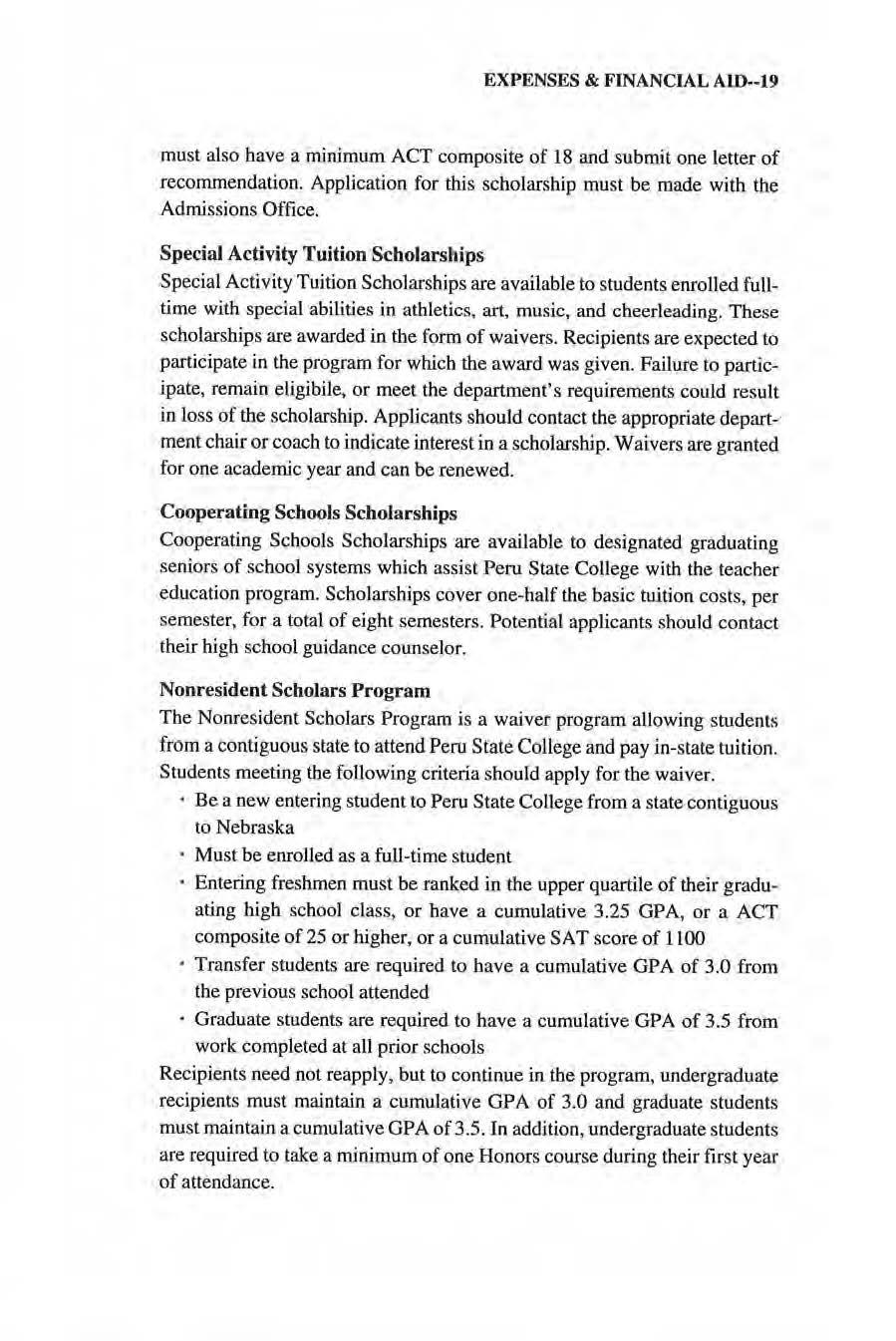
Cooperating Schools Scholarships are available to designated graduating seniors of school systems which assist Peru State College with the teacher education program. Scholarships cover one-half the basic tuition costs, per semeste r, for a total of eight semesters . Potential applicants should contact their high school guidance counselor.
Nonresident Scholars Program
The No nres ident Scholars Program is a waiver program allowing students from a contiguous state to attend Peru State College and pay in -state tuition. Students meeting tbe fo llowing criteria shoufd apply for the waiver.
· Be a new entering student to Peru State College from a state contiguous to Nebraska
Must be enrolled as a full-time student
Entering freshmen must be ranked in the upper quartile of their g raduating high school class, or have a cumulative 3.25 GPA, or a ACT composite of 25 or higher, or a cumulative SAT score of 1100 Transfer students are required to have a cumulative GPA of 3.0 from the previous school attended
· Graduate students are required to have a cumul ative GPA of 3.5 from work completed at a ll prior schools
Recipients nee<l not reapply , but to continue in the program, undergraduate recipients must maintain a cumulative GPA of 3 .0 and graduate students must maintain a cumulative GPA of 3.5. In addition, undergraduate students are required to take a minimum of one Hono rs course during their first year of attendance.
EXPENSES & FINANCIAL AID--19
FEDERAL FINANCIAL AID
A student must complete the Free Application for Federal Student Aid (FAFSA) in order to be considered for federal financial aid.
Federal Pell Grants
Th e res ults of information submitted to the Department of Education (results of the Free Application for Federal Student Aid - FAFSA) determine Pe ll Grant eligibility.
Federal Supplemental Educational Opportunity Grant (FSEOG)
These grants are awarded to s tudents with exceptio nal financial need. The student must be a recipient of a Federal Pell Grant. The grants range from $200 to $1000 per academic year.

Federal College Work Study (FCWS)
College work study is a need-based program. The intent of college work study is to allow a stude nt an opportunity to pay for a portion of their education by working. A student attending school full-time can work a maximum of 15 hours per week and during periods of vacation 40 hours per week. Jobs are usually on campus and are vital to the efficient operation of the college.
Federal Perkins Loans
These are low interest, long•term loans made to students showing financial need and who are in good standing. The loans range from $500 to $3000 per academic year.
Federal Family Education Loan Programs
Loa ns included in this program consist of Federal Subsidized a nd Unsubsidized Stafford Loans and Federal PLUS Loans. These are long-term loans made available to students and/or parents who are attending an eligible institution of higher education. Loan amounts vary depending on g r ade level.
STATE GRANT PROGRAMS
State Scholarship A ward Program (SSAP)
This assistance is awarded to students demonstrating substantial need. Recipients mu st be U S. ci tizens enrolled at an eligible Nebraska institution of higher educat ion.
Scholarship Assistance Program (SAP)
The recipient must demonstrate substantial need and be a Nebraska resident enrolled at an eligib le Nebraska institution of higher education.
20--EXPENSES & FINANCIAL AID
SATISFACTORY ACADEMIC PROGRESS STANDARDS FOR FINANCIAL AID
According to the Federal Educatio n Amendments of 1980, Peru State College is required to d e fine and m onitor standards of satisfactory academic progress for s tuden ts receiving Federal Title IV funding. This includes: Federal Pell Grant, Federal Supplemental Educational Opportunity Grant (FSEOG) , Federal Perk.in s Loan, Federal Stafford Loan, and Federa l Parent Loan for Undergraduate Students ( PLUS). Satisfactory academic standards are establi s hed to encourage students to meet and maintain the college's minimum academic standards , or GPA, and to provide a measure of progress toward a degree by completing a minimum percentage of credit hours each academic year.

I . A student planning to enroll as a full- time s tudent and receive FederaJ T itl e IV funds must meet the following criteria to be consid ered in academic good stand in g: a) co mplete th e term with a minimum of 12 credit hours (to stay fu ll - time) and; b) achieve a cumulative GPA of 2.0 (C ave rage) or better. For continuing education stu dents , s ix (6) credit hours or more per academic tenn will be considered fuJl-time.
2. A s tudent enro lling less than full - time will be required to comp lete a minimum of nine (9) credit hours as a three-quarter time student, and six (6) credit hours as a half-time student, and achieve a cumul ative GPA of 2.0 (C average) or better to receive Fed e ral Title IV funds. For continuing education students, five (5) credit hours per academic term will be consi dered threequarter time enro llme nt, a nd 3-4 credit hours will be considered half-time.
3. A student purs uing an undergraduate degree at Peru State College may receive Title IV aid for up to a maximum of 188 attempted cred i ts or until obtaining a bachelor's degree, whichever comes first.
Procedures
At the end of each semester the academic records of all students at Peru State College are reviewed to determine if they are maintaining a minimum average based on credits attempted. The Vice President for Academic Affairs reviews the records of all s t udents who h ave a grade point average of less than a cumulative 2.0. A student not making satisfactory academic progress or not meet i ng the standards set with graduation and/or specific condition s for retention may be placed on probation or suspension.
In addition to these standards, which apply to all students, Federal Title IV recipients must also meet the following standards to continue to receive financial aid.
I. A student considered in "good academic standing" is considered in "good standing" fo r the purposes of finan c ial aid eligibility.
2. The student mu st recei ve credit for a minimum of 75 percent of the total number of Peru State Co llege credits attempted as regi ste red for at the e nd of the drop- add period. Only credits that are passed (g rades of A through D,
EXPENSES & FINANCIAL AfD--21
and CR) w ill be counted as credits earned. Grades of L F, and NCR will not be counted as credit received until they are replaced by a satisfactory letter grade.
1t is the student's responsibility to notify the Financial Aid Office when grades of I have been completed. Withdrawals (W) and repeated courses for whic h credit was previously earned wi ll count as credits attempted, not passed.
3 Students may receive Title IV funds for up to 188 attempted credits, or untH obtaining a bachelor's degree, whichever comes first.
4. S tude nts transferring to Peru State College for the first time will be considered making satisfactory academic p rogress if they are admitted as a degreeseeking student at the institution. Cumulative GPA and 75 percent completion of credits attempted will be monitored from the point of enrollment. If the s tu dent has been admitted on probationary status due to academic status at a prior institution, the Director of Fina ncial Aid may review the case and put the student on financial aid probation or suspension
The percentage of credi ts passed over credits attempted will be calculated using only Peru State College credits. Transfer c redits will be used toward graduation requirements.
Financial A id Acade m ic P robatio n
A student not fo "good standing" or not meeting the requirements consistent with graduation, o r not earning the minimum percentage of total c redits attempted, will be p laced on financial aid probation for the next academic semester of enrollment. A student will remain eligible to receive Tille I V funds while oo probation for a period of one (I) academic semester (two (2) academjc terms in continuing education programs).

Financial A id & S uspens ion
Financial Aid will be suspended if a student has failed to meet the required 2.0 cumulative GPA and/or pass 7 5 percent of al I Peru State College credits attempted after a semester of probation (two (2) academic terms in continuing education progn1ms). A student will not be eligible to receive Federal Title I V funding while on financial aid suspension .
Reinstatement
Reins tatement of financial aid eligibi l ity will occur at the end of any grade period in which the minimum cumulative grade point average of 2.0 and/or 75 percent of credits attempted has been achieved. Students may take courses at their own expense to reinstate their eligibility for future financial aid.
22--EXPENSES & FINANC IAL AID
Appeals
If mitigating circumstances eX,ist, a student may appeal, in writing, to the V ice President for Student Affairs. D ecisions regarding financial aid suspension and t he granting of appeals are made by the Vice Pres ident for Student Affairs a nd/or the Financial Aid Comm ittee.
Scholarships
The Pe(U State College Foundation administers various scho larship funds. Scholars hips are awarded on the basis of academic achieve m e nt, financial need and/or a combination of both. Scholarships and other financial a id are availabl e to deserving full-time s tude n ts because of the generous contribu tions of a lumni , friends, corporations and fou ndations

Hanson and Amber Aldrich Scholarship
Th is scholarship is provided to an incoming freshman from Nemaha County planning to enroll in Education at P SC. Amber Jodr y Aldrich was a 1923 graduate of Peru State.
American National Bank Scholarship
Thi s scholarship i s p rovided annu ally by the Ame rican National B ank of T ecumseh, NE. It is awarded to a student from the Johnson County a rea, selected by Tecum seh Higb School/American National B ank.
Laurine Anderson Tri Beta Scbolarship
The recipient of this scholacsh.ip is selected by the Natural Science Di vision and must be a Biology major and member of Tri Beta. The scholarship was established by L aurine Anderson , class of I 928, who was a charter member of the Peru Chapter of Tri Beta.
Marian Anderson Scholarship
This scholarship i s awarded to an incoming female freshman African-American student.
Charles Andrews Memorial Scholarship
T hi s fund was es tabl ished as a memorial to C harles Andrews, a 19 I 4 gradu ate of the College The scholarship i s awarded to a n incoming freshman who shows academic promise and may be renewed d epending on the student's grade point average
1947-48 Hall of Fame Basketball Scholarship
This scholars hj p was established by the 1947- 48 PSC basketball team. I t is available to a freshman male or female bask etball a thlete and w ill be selected by the Athl etic Department.
EXPENSES & FINANCIAL AID--23
Bath Family Memorial Scholarship
This scholarship was established in 1967 by Mrs. Minnie Bath in memory of her busband John and her two sons, Edward J. and Robert L. Bath. It is awarded for academic achievement.
Merle "Hoot" Bauer Memorial Scholarsh ip
This scholarship is awarded to an incoming freshman, with preference to Tecumseh, Holdrege. North Platte or Bertrand g raduates, who will be on the basketball team. Mr. Bauer, a 1950 graduate. was an outstanding varsity basketball player. Selection by the Athletic Department.
E.C. and Mae Miller Beck Scholarship
This scholarship was established by Dr. and Mrs. Beck in 1967 for an English major with athletic abili t y.
Albt!rt Brady Scholarship
Established by the Pem State College Letterman's Club and the friends of Albert Brady, the scholarship is awarded to a Biology major with athletic ability. Selected by Athletic Department/Division of Science & Technology
George V. Iva Seid Brown Scholarship
This scholarship was provided by Sid Brown, a 1959 graduate of Peru State College, in memory of his parents. The scholarship is available to Nebraska residents with a 3.0 or higher GPA.
Esther Delzell Brownell Memorial Scholarsh i p Mrs. Brownell's family established th.is scholarship in her memory. It is awarded to a deserving student. An interest in dramatic activities i.s encouraged.
Pearl Morgan Butler Memorial Scholarship
The scholarsh ip provides for tuition as the fond allows. It wa s established by Joy Elmer Morgan in memory of his sister who attended the College in 1905.
Campus of a Thousand Oaks Scholarship
This scholarship is awarded for academic excellence and/or potential. Funds in this pooled account have been provided by the Lillian Barnes and Alice Warnock Scholarship, Class of 1939 , Jess A. Harris Scholarsh ip Fund, Harold and Alice Grush Johnson, and the E.A. L arson Scholarship Fund.

Roy Chamberlain Schola rship
The Roy Chamberlain Scholarship was provided by Mrs. Chamberlain in memory of her husband Roy, a 1927 alumnus of Peru State College. Any full-time male student is eligible to apply.
24- -EXPENSES & FlNANClALA1D
C .C. and E rma Wilson C hoyce Scholarship
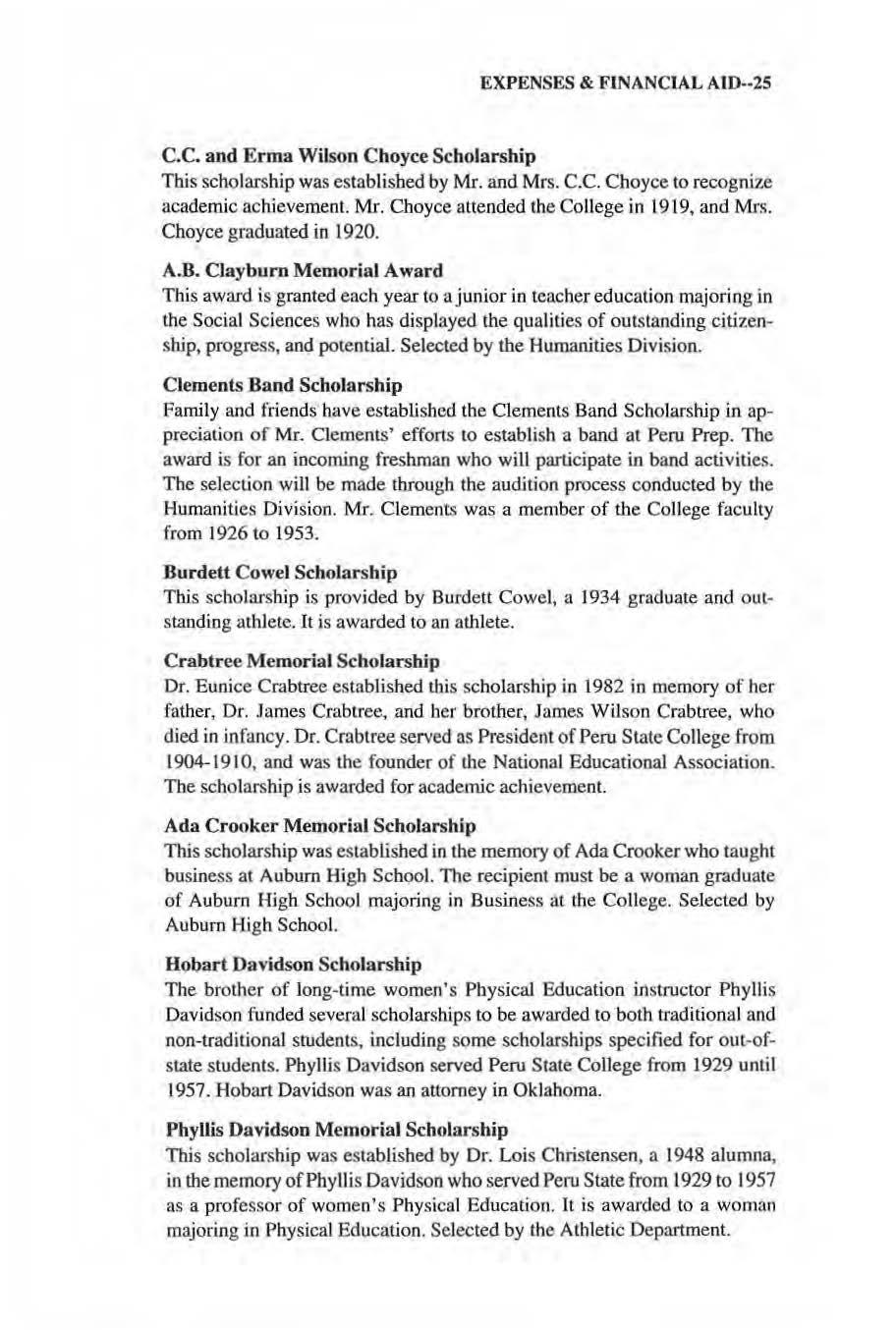
This scholarship was estab l ished by Mr. and Mrs. C.C. Choyce to recognize academic ach ievemen t. Mr. Choyce attended the Co ll ege in t 9 19, and Mrs. Choyce grad uated in 1920.
A.B. Clayburn Memoria l Award
This award i s granted each year t o a junior io teacher educat ion majori ng in the Social Sc iences who has djsplayed the qualit ies of outstanding citizenship, progress, and potential. Selected by the Humanities Division.
C lemen ts Band Schola rs hip
Fami l y and friends hav e established the Cl ements Band Scho larship in appreciation of Mr. Clements' efforts to establish a band at Peru Prep. The award is for an incoming freshman who will participate in band activities
The selection will be made through th e audjtion process conducted by the Human ities Division. Mr. Clements was a member of the College faculty from I926 to 1953
Burdett Cowel Scholars hip
Thi s scholarshjp is provided by Burdett Cowel, a 1934 graduate and outstandin g athl ete. It is awarded to an athlete.
Crabtree Memoria l Sc ho larship
Dr. Eunice Crabtree established this scholars hip in 1982 in memory of her father, Dr. James Crabtree, and her brother, James Wilsou Crabtree, who died in infancy. Dr. Crabtree served as Presiden t of Peru State College from 1904-1910, and was the founder of the National Educational Association The scho larship is awarded for academic achievement.
Ada Crooker Memorial Scholarship
This scholarsh ip was establi shed in the memory of Ada C rooker who tau g ht business at Auburn Hi gh School. The recipient must be a woman graduat e of Auburn High School majoring in Business at the College Selected by Auburn High School.
Hobart Davidson Sc ho larship
The brother of long- time women's Phy sical Education instructor Phyllis David son funded several scho l arships to be awarded to both trad iti ona l and non-traditional students, including some scholarships specified for out- ofstate students. Phyllis Davidson served Peru State College from 1929 until 1957 . H obart Davidson was an attorney in Ok lahoma.
Phy llis Davidson Memorial Scholarship
This scholarshjp was establ ished by Dr. Lo is Christensen, a 1948 alumna, in the memory of Phylli s Davidson who served Peru State from 1929 to 1957 as a professor of women's Physi cal Education. I t is awarded to a woman majoring in Physical Education. Selected by the Athletic Department.
EXPENSES & FlNANClAL AID--2S
Elizabeth Aldrich Dougherty Scholarship
Elizabeth Dougherty was a 1921 graduate of PSC. This scholarship was established by her chjldren and is designated for a junior or senior in Education. Students living in Nemaha, Richardson. Johnson, Pawnee or Otoe counties in Nebraska are eligible for this scholarship. Selection will be made~ by the Division of Education , Psychology and Physical Education
Helen Naeve Douglas Music Scholarship
Thi s scholars hip is provided annually by Judson Douglas in memory of bis mother. The award is given to a freshman who is a talented musician majoring in Music Education. Preference will be given to Johnson, Otoe or Nemaha co unty residents. Selected by the Division of the Humanities.
Mac Dunning Industrial Arts Award
This is an annual cash grant given to an outstanding student in Industrial Technology and Education. Selected by fT faculty.
Lura Hendricks Eichler Memorial Kindergarten Education Award
This award is presented annually to a student who has demonstrated ability, aptitude, and interes t in kindergarten education. Selected by Education D ivision.
Loure Saltzman Firoved Scholarship
Mrs. Firoved, a 1916 graduate of the College, served many years as secretary to the college president. This scholarship, established by her children, is designed for a student majoring in Business.
Elsie I. Fisher Memorial Scholarship

This scholarship was established in memory of Elsie I. Fisher, a graduate, who taught for39 years in the Omaha schoo l system. It is awarded to students in Art Education.
Esther Cole Franklin Memorial Scholarship
Dr. Franklin was a 1920 graduate of the College who was recognized as a distinguished alumna in 1977. This scholarsh ip was established in her memory and is awarded to an outstanding student.
Glen and Verda ~rary Scholarship
Glen and Verda Hauptman Frary were both 1927 graduates of Pe ru State who devoted their careers to educating youth. This scholarship is to be awarded to a sophomore or junior Education major
Emma Anne Hart Fuller Scholarship
Helen H art Fuller, who graduated from Peru State in 1919, left a si.zeable bequest to assist nontraditional students who have been out of hi gh school at leas t ten years.
2-6--EXPENSES & FINANCIAL AID
Lovisa Albert Glaze Memorial Scho larship
This award is p rovided by the family of Lovisa Glaze, a 1934 graduat e of Peru State College. The award is avai lab le to Education majors with a preference to elementary educat io n. A soph omore,juni or, or senior is e l igible fo r this scholarship .
Chris Haddad Memoria l Scholarship
Establi shed by friends and family, thls scholarship is awarded to a Business student, with preference to someone from Seward County. Chris H addad was a 1989 graduate and was an admissions counselor at Peru State College.
Helen Parker Hanika Schol arship
H elen P arker H ani ka was a 19 17 PSC graduate. Thi s scho larsh ip is for an in coming freshman wh o bas graduated from a Richardson Cou nty (NE) high s c hool.
C lifford Harding Social Science Sc holars hip
This schol arship is available to sophomores, juniors, and seniors who are majoring in Social Sciences. Applications for this award are available from the Division of the Humanities. Clifford Hardin g was a 1944 graduate of PSC.
Benjamin Harrison Memorial Scholarship
The famiJy of Benjamin Harri son, C lass of 1907, estab lished this memorial to provide scholarships to worthy Peru State students
Walter and Lillian Harris on Memorial Schol arsh ip
This scholarship was established by Carlos Harrison in honor of his parents. The award is given to freshmen s tu dents from Mills, Fremont or Page counties in Iowa.
Arno ld and Bertha Hilte rman Scholarship

This scholarship was estab li s hed by C harles Masopust in memory of his s ister and her h u sband. It is presented to a deserving Peru State student.
Lena Huff Memorial Scholarship
This scholarship is awarded for scholastic excellence in the memory of L e na Huff, a 1909 g raduate of the Coll ege.
Harry and Mary Hutchinson Memorial Scholarship
This scholarship is provided by Charles Masopust in memory of the pare nts of his s ister-in- law, Hollis. It is to be given to an outstanding sophomore or junior who has excellent potential to be an outstanding teacher. The recipie nt should demonstrate campus leadership and a need for fin ancial assistance.
EXPENSE.5 & FINANCIAL AID--27
D e e V. a nd K athleen Jarvis Industri al Edu cation Schola rs hip
Dee V. and Kathleen Jarvis provide a sc holarship for a student majori ng in Industrial Arts Education. Mr. Jarvis, a J948 grad u a te of the Coll ege, served on the s taff as a professor of Ind ust ria l E d ucation for 30 years before retiring in l 978. Selected by the 1T faculty.
G lenn D . Jenkins Mem o rial Sc hola rs hip
The famil y and friends of Glenn D. Jen.kins, C lass of 1909, established thi s sc ho lars hip for students from Humboldt and Richardson County. Sel ec ted by Humboldt High S c hool.
V ictor H. Jindra M emo rial Sch o la rs hip
This scholarship for s tudents in Musi c was established from the estate of Victor H . Jindra, a professor of Mu s ic at the Co ll ege from 1923 to 1961. Selected by the D ivision of Humanities.
P e arl A. Kenton Lan guage Ar ts A wa rd
This award is prese nted annually to an outstanding student majoring in Language Arts. Selecte d by the Div isio n of Humanities.
C o retta Scott King Scholars hip
These scho larships are provided annually by an anonymous donor. They are awarded to African-American female freshmen s tuden ts who are not athletes.
P aul and Lillian L a nd olt Schol a rship
Thi s scholarship i s i n memory of Pau l L ando l t, a 1933 graduate of Peru State College, a nd his wife. P aul was a long-time teacher and spent his ewly years in Peru. The scholarship is available to students in Business Ed ucation or Science.
A.V . and WilheJmjna L arson M emorial Indu s trial A rts A w ard
This award is present ed to a sophomore student who demon strates promi se as a teacher of Industrial Techno logy. Selected by IT fac ulty .
A rthur R. Majors M emorial Schol a rship
This scho larship was estab li s hed i n me mory of Arthur R. M aj o rs, a 1926 g raduate of Peru State, who was an active educator for 43 years. Mr. Majors was a strong supporter of the College and the Peru State College Foundation. Tbe scho larship is awarded to a student majoring in Natural Science .
Charl es Masopust Scho la rship
This scholarship wa s donated by Charles Masopust. Although he never attended Peru State, Mr Masopust developed an i nterest in the College thro ug h his broth er Joe, a s u pporter of the Co ll ege and Peru residen t. T his award is g iven to a deserving student who may not qualify for other scholarship funds based on outstanding academ ic accomplishments, but who dem onstrates personal quafaies that are a credit to the College and stude nt body and who distinguishes himse l f/hersel f throug h invo l vement in cocurricular activities..
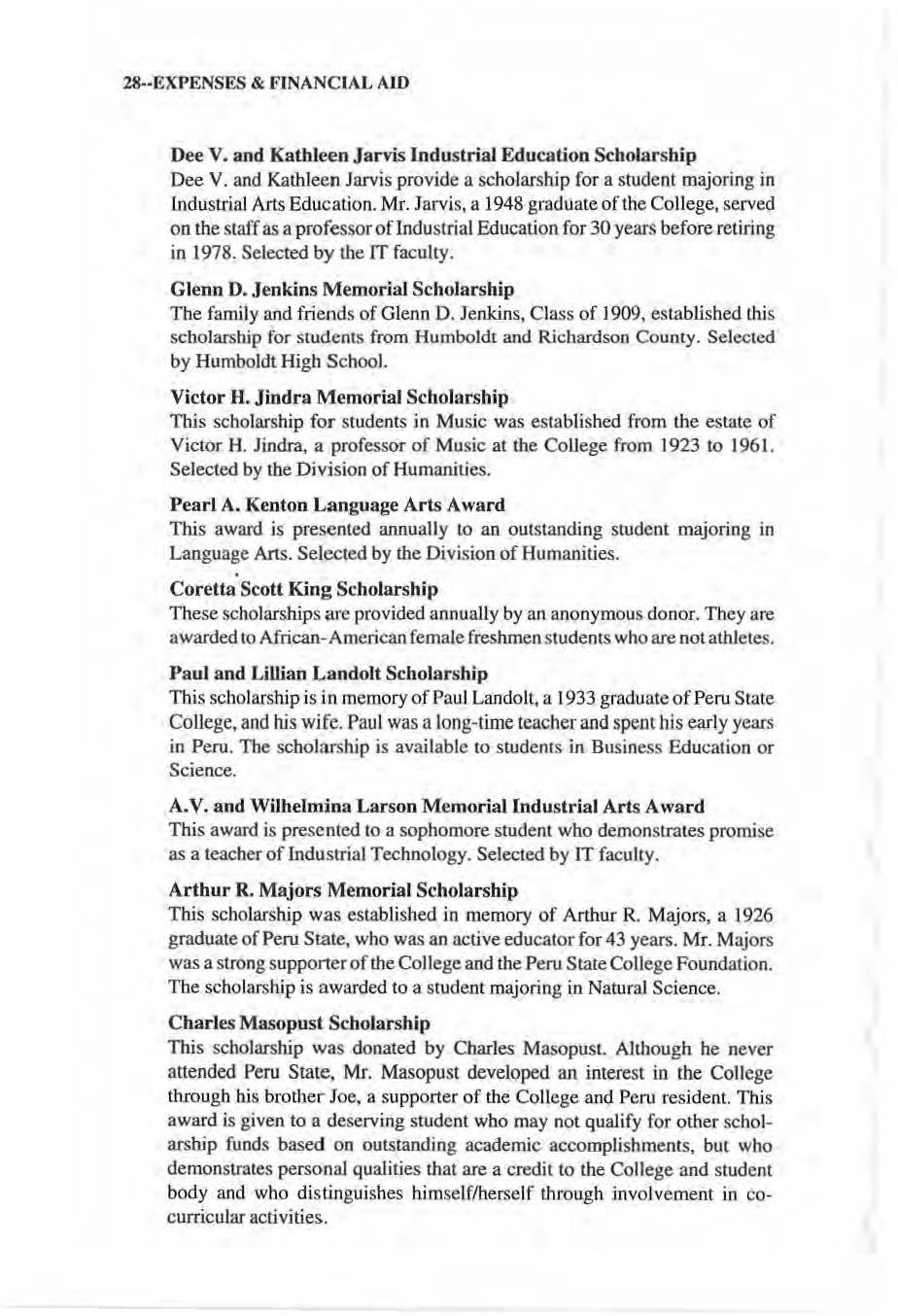
28--EXPENSES & FI NANC IAL AID
Hollis Hutchinson Masopust Memorial Scholarship
This scholarship, established in 1986, was donated by Charles Masopust in memory of hi s sister-in-law, a 1933 graduate of Peru State College. Th e award is to be given to an outstanding sophomore or junior s tudent who has participated above and beyond average in math and science and to whom this award will make a difference in achieving his/her education.
Joe Masopost Memorial Scholarship
Thi s sc holarship was establ ished in 1986 and is donated by Charles Masopust in memory of his br,other, a friend and benefactor of Peru State College. The scholarship i s to be given to the outstanding sophomore or junior student who has contributed the most to Peru State College in non-scholastic activities (not sports), has good scholastic potential and to whom this assistance will make a difference .in achieving the student's education.
John and Francis Schima Masopost Scholarship
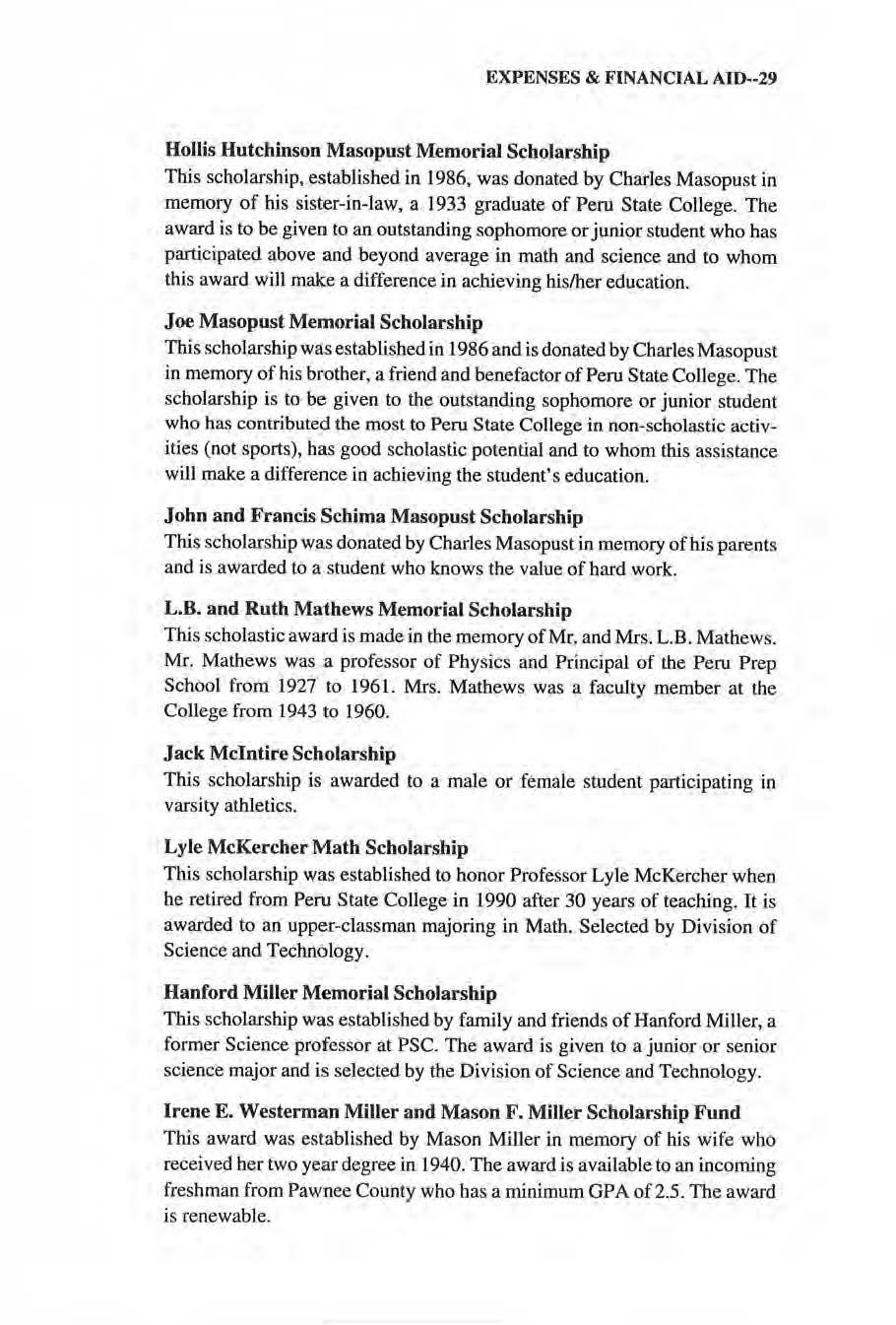
This scholarship was donated by Charles M asop ust in memory of his parents and is awarded to a student who knows the value of bard work.
L.B. and Ruth Ma1hews Memorial Scholarship
This scho las tic award is made in tbe memory of Mr. and Mrs. L.B. Mathews. Mr. Mathews was a professor of Physics and Principa l of th e P eru Prep School from 1927 to l96 l. Mrs. Mathew s was a faculty member at the College from 1943 to 1960
Jack McIntire Scholarship
This scholarship i s awarded to a male or female student participating in varsity athletics.
Lyle McKercher Math Scholarship
Thi s scho lars hip was established to honor Professor Lyle McKercher when be retired from Peru State College in 1990 after 30 years of teaching , It is awarded to an upper-classrnan majoring in Math. Selected by Division of Science and Technology.
Hanford Miller Memorial Scholarship
This scholarship was established by family and friends of Hanford Mi ll er, a former Science professor a t PSC. The award is given to a junior o r sen ior science major and is selected by the Division of Science and Techno logy.
Irene E. Westerman Miller and Mason F. Miller Scholarship Fund
This award was established by Mason Mille r in memory of his wife who receive d her two year degree in 1940. The award is available to an in coming freshman from Pawnee County who has a minimum GPA of2.5. The award i s renewable.
EXPENSES & FINANCIAL AID--29
Dr. Joy Elmer Morgan Memorial Scholarship
This scholarship was provjdecJ by th e estate of Dr. Morgan, a 191 2 graduate of Peru State College and long time Secretary of the National Education Association. The award is to be given to outstanding students preparing to become teachers.
Evalyn Booth Newton Scholarship
Evalyn Booth Newton was a student at Peru State CoUege in 1925 and 1926. She was a mus ic and Engli sh teacher and supervised student teachers at PSC from 1956 to 1958. This sc ho larship is available to English Education majors with sophomore, junior, or senior sta tus who have a 3.0 or higher GPA . The award is selected by the English Department.
The Omaha World•Herald Scholarships
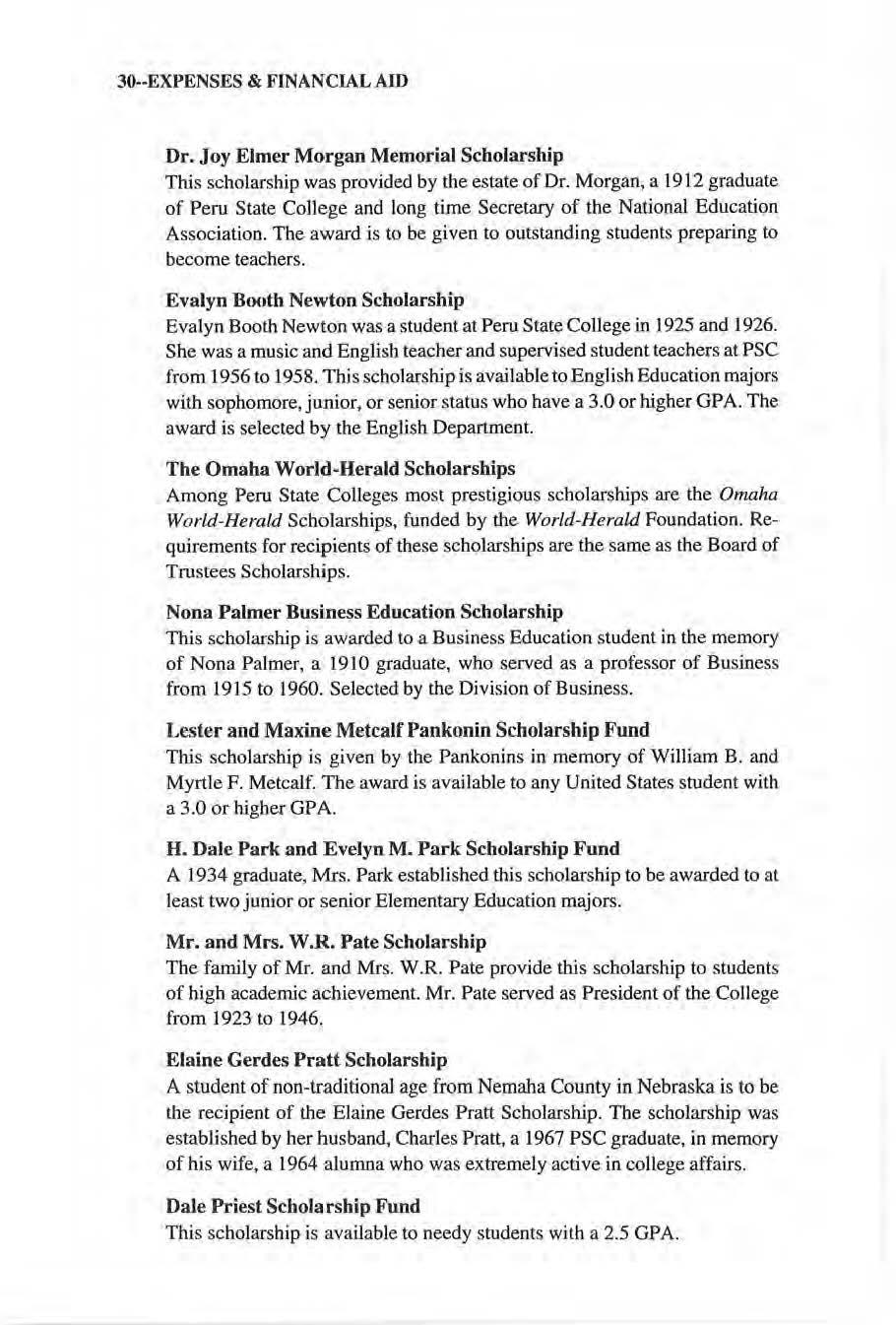
Among Peru State Colleges most prestigious scholarships are the Om.aha World-Herald Scholarships, funded by the World-Heraul Foundation. Requirements for recipients of these scholarships are the same as the Board of Tru stees Scholarships.
Nona Palmer Business Education Scholarship
This scholarship is awarded to a Business Education st udent in the memory of Nona Palmer, a 1910 graduate, who served as a professor of Business from 1915 to 1960. Selected by the Division of Business.
Lester and Maxine Metcalf Pankonin Scholarship Fund
This scholarship is given by the Pankonins in memory of William B. and Myrtle F. Metcalf. The award is available to any United States student with a 3.0 or higher GPA.
H. Dale Park and Eve1yn M. Park Scholarship Fund
A 1934 graduate, Mrs. Park established this scholarshjp to be awarded to al least two junior or senior Elementary Education majors.
Mr. and Mrs. W.R. Pate Scholarship
The family of Mr. and Mrs. W.R. Pate provide thls scholarship to s tudents of high academic achievement. Mr. Pate served as President of the College from 1923 lo 1946.
Elaine Gerdes Pratt Scholarship
A student of non-traditional age from Nemaha County in Nebraska is to be the recipient of the Elaine Gerdes Pratt Scholarship. The scholarship was established by her husband, Charles Pratt, a 1967 PSC graduate, in memory of his wife, a 1964 -alumna who was extremely active in college affairs.
Dale Priest Scbola rsbip Fund
This scholarship is available to needy students with a 2.5 GPA.
30--EXPENSES & FINANCIAL AID
Ernest J. Rawson Memorial Industrial Education Scholarship
Thjs scholarship was established by the family of Ernest J. Rawson, Class of 1938. Mr. Rawson taught Industrial Education in high school and college before retiring in the late 1970s. Selected by IT faculty.
Wayne and Adele Penterman Reed Scholarship
This scholarship was established by Mrs. Reed in memory of her husband who served as Peru State College President in 1950 It is awarded to an upperclassman majoring in Education.
Troy Rippen Memorial Scholarship
Troy Rippen was a popular student on campus and participated in many activities. At the time of his death, a scholarship fund was established by family a nd friends. This scholarship i s awarded to a student majoring in Business. Selected by the Division of Business.
A.B. Ritchie Scholarship

A.B. Ritchie of Auburn, a 1927 graduate, established a scholars hip to be given to a men's basketball player who is a southeast Nebraska resident. Selected by the Athletic Department.
Joseph Robertson Foreign Student Scholarship
This scholarship is provided by Joseph Robertson , a 1928 graduate, for a international student.
C larence L. and Mildred Ru ssell Memorial Scholarship
Th.is scholarship was established in memory of the Russells. Mr. Russell was a 19 17 graduate of Peru State, and tbe Russells were long time s upporters of the College. Tbe recipient of the scholarsh ip is to be in the Indu stri al Technology program and is selected by the facu l ty of the department.
Lester and Esther Russell Scholarship Fund
This scholarship was established by family and friends at the time of Dr. Russe ll 's retirement from Peru State College in 1995. The scholarship is awarded to a student in the Industrial Technology program and is selected by the facul ty of the department.
Ruth M. Russell Seholarship Fund
This fund was created by family and friends of Mrs. Russell, a long time Peru resident, i n honor of her 100th birthday. Students eligible for this scholarship shall have graduated in the upper one-third of their high school class. The scholarship shall a l ternate each year between students studying in the Arts/Humanities and Science.
Vince SabatinelJi Memorial Scholarship
This scholarship i s awarded to a deserving athlete in the memory of Vincent Sabatinelli, a former member of the Peru State football t eam, who gave his life in the service of his country in Vietnam. Selected by the Athletic Depaiirnent.
EXPENSES & FINANClAL AlD--31
G eorge.Scbottenhame l Sch o l a rs hip
T hi s scholarship is in memory of George Schottenbamel, Professor of Social Sciences at the Co ll ege from 1957 to 1987. I t is awarded to a student studying H isto ry, Soc ial Scie nce or Fine Arts. Selected by the Divi sion of Humani ties.
Bernice Sh ac kelford Sc holarsh i p F und Bernice Jacka Shackelford was a 1 94 1 graduate of Peru State College wh ere she majored in education. She taught in various schools in Nebraska with 37 years at Filley as a teacher and l ibrarian. This scho larship will be available to deser ving students.
K en Si ms Indus trial A rts Scho lars hip
Thjs memorial scholarship wa s establ ished by Mr. S ims' wife Linda. Both gradu ated from Pero State College in I 964. It is awarded to a s t udent maj oring in IndustriaJ Technology. Selected by the IT faculty.

Beatrice Sp oh n Sch o lars h ip
Beatrice Spohn was a 1929 two-year graduate of PSC. T he scholarship is for an incoming freshman from Weeping Water or Sutton, NE h i gh school, and is renewable.
G. Holt "Pop" Steck Memori a l Scholarsh ip
G Ho l t " Pop" Steck served as Professor of Music at Peru State from 1928 to 1943. T he scholarship is awarded to a Music student with preference for vocal music. Selected by the Division of Humanities.
O liver St e-venson M emori a l Scholarship
M rs. Ol i ver Stevenson, a friend of the College, establi shed this scholarship in memory of her husband. T he scho larship is awarded to students who have demonstrated academ.ic excell ence.
B ill and J eanne Tynon Memor ial Schol a rs hip
T his award is presented to a Nebraska res ident student in good standing who has partic ipated in inter-collegiate sports at Peru State College. The Bill Tynon Memorial Scholarship fund was established by Mrs. Jeanne Rhinehart
Tynon, a 1965 graduate, i n memory of her husband, a 1964 graduate of Peru State, who was active in athletics at the college. Jeanne Tynon passed away in 1986 and the name of the scholarship has been changed in memory of Jeanne, also.
Maude Phelps Vacek Scholarship
This scholarship was established by her children and grandchildren. lt is awarded to a fu ll -time student living in Pawnee City or Pawnee County who will be pursuing a degree in Education.
32--EXPENSES & FINANCIAL AJO
Evan Van Zant Teacher Education Scholarship
The recipient of this sc holarship is selected by the Division of Education, Psychology and Physical Education for academic excellence, dedication to the teaching profession, and an aptitude for teaching. lt was established in the memory of Eva11 Van Zant, Professor of Education from 1961 to 1980.
John and Daisy Clark Wear Scholarship
Established by the family and friends of Dr. John Wear, Class of 1914, this scholarship assists a pre-medical or science student at the College. A copy of Dr. Wear's book, My Life and My Work, is in the Co ll ege library. Selected by th e Divi s ion of Science and Technology.
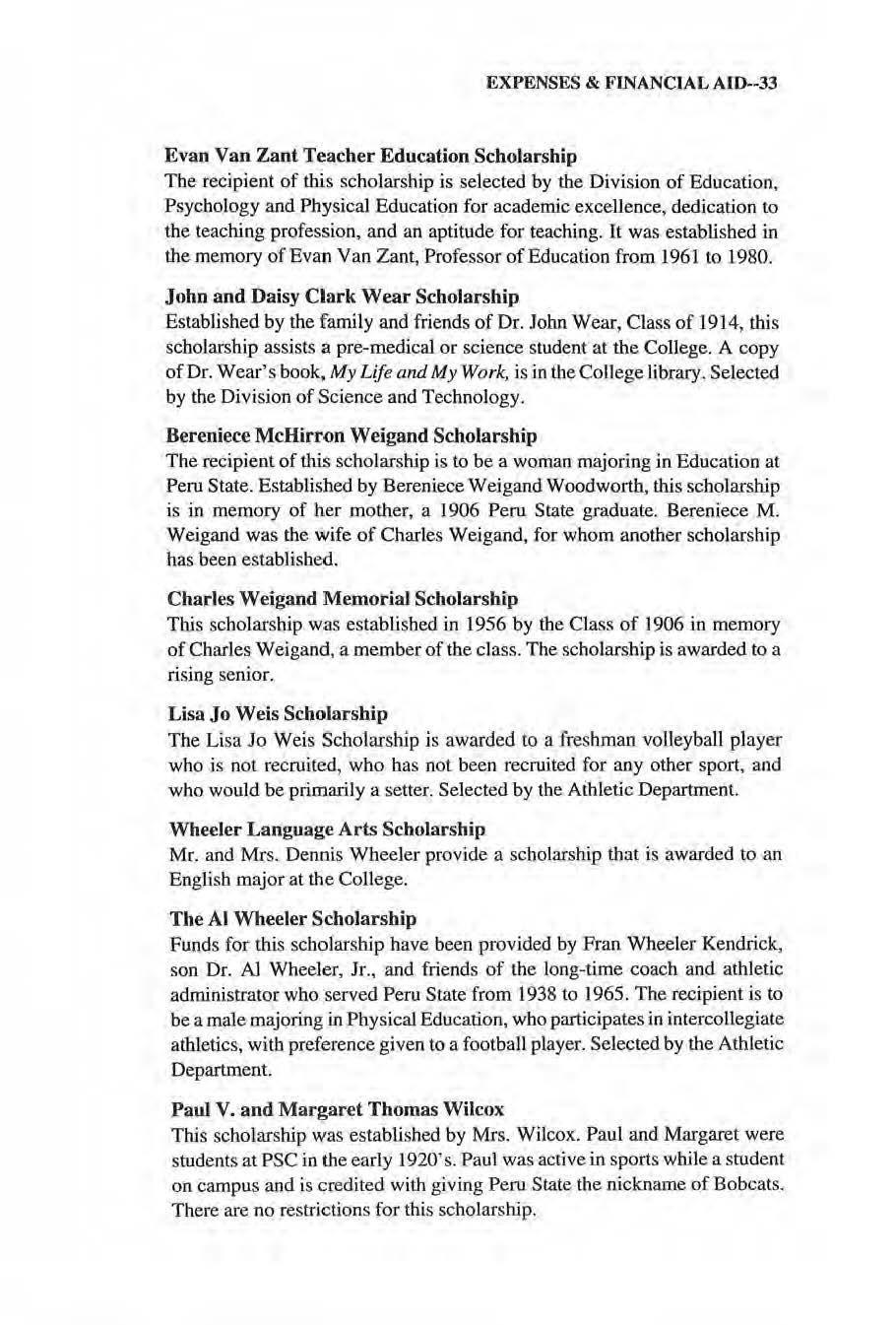
Bereniece McHirr<m Weigand Scholarship
The recipient of this scholarship is to be a woman majoring in Education at Peru State. Established by Bereniece Weigand Woodworth, this schol arship is in .memory of her .mother, a 1906 Peru S~te graduate. Bereniece M . Weigand was the wife of Charles Weigand, for whom ano ther scholarsh ip has been established.
Charles Weigand Memorial Scholarsh ip
Thjs scholarship was established in 1956 by the Class of 1906 in memory of Charles Weigand, a member of the class. The scholarship is awarded to a rising senior.
Lisa Jo Weis Scholarship
The Li sa Jo Weis Scholarship is awarded to a fTeshman volleyball player who is not recruited , who has not been recruited for any other sport, and who would be primarily a setter. Selected by the Alhletic Department.
Wheeler Language Arts Scholarship
Mr. and Mrs . Dennis Wheeler provide a scholarship tha t is awarded to an English major at the College.
Tile A l Wheeler Scholarship
Funds for this scholarship have been provided by Fran Wheeler Kendrick, son Dr. Al Wheeler, Jr., and friends of the long-time coach and athletic administrator who served Peru State from 1938 to I 965. The recipient is to be a male majoring in Physical Education, who participates in intercollegiate athletics, with preference given to a football player. Selected by the Athletic Department.
J>aul V. and Margaret Thomas Wilcox
This scholars hip was established by Mrs . Wi lcox. Paul and Margaret were students at PSC in the early 1920' s. Paul was active in sports while a student on campus and is credited with giving Peru State the nickname of Bobcats. There are no res trictions for this s cholars hip
EXPENSES & FINANCIAL AID--33
Harold E. Willey Memorial Scholarship
Mr. Willey, who was a farmer near M ead, is memorialized in this endowment. Scholarships are awarded to students who are children of farm or ran ch families or their employees, and who are of sophomore rank or above, with a 3.0 average. They must be a resident of Nebraska.
Gilbert aod Mary Rulh Wilson Leadership Scholarship
This scholarship has been establ i shed by family and friends of the Wilsons. The scholarship is available to an incoming freshman with a B or higher GPA who bas s hown l eadersh ip qualities in his/her c hurch or community.
Jack D. and Eula M. Wolken Scholarship

No restrictions. Amount of scho larship should be sufficient to pay the majority of tuition for one year.
William Henry Wortman Memorial Scholarship
This scholarship is awarded to minority students with a preference being given to Native Americans. It was establi shed by the family and friends of William Henry Wortman.
Peru State College Foundation
The Peru State College Foundation was organized in June, 1955 and incorporated as a non-profit corporation for educational and charitab le purposes in May, 1962.
Institutional Loans and Awards
Livermore Loan Fund
The Livermore Loan Fund was established by Sheridan Livermore, a 1932 graduate of Peru State College. Application forms are available at the P eru State College Foundation Office. A referral from the Financial Aid Office is required.
Helen E . Cole Pollard Founders Award
An award presented in the spring to the senior who has demonstrated loyalty and service to the College.
B. E. Swenson, Jr., Athletic A ward
This award was established in 1925 by Bert E. and Stella Swenson in memory of their son, B. E., Jr. , and their parents who made possible their early education at Peru. Jlllniors and seniors are eligib le for the award based on general character and personality, scholarship, school loyalty, and athletics. A s tudent may win tbe award only once. S elected by the Athletic Department.
Zelma R. Wonderly Award
Th;s annual award is presented to an outstanding s econd g rade student teacher. Selected by the Divi s ion of Education, Psychology and Phys ical Education.
34--EXPENSES & FINANCIAL AID
STUDENT SERVICES
Student Affairs M i ssion Stateme nt
The m1 ss ion of Student Affairs is to provide an environment that s upports the developme nt of the stu dent as a whole p erson . Educat ion of the w hole s tudent encompasses academic training as well as social, spiritual, cuJtural, physical and e motional development. Student Affairs encourages students to be active participants in the forma t ion and fruition of their educational process to clarify values , to sol ve problems and to discover, apply and integrate knowledge.
Admissions
The Ofticeof Admissions assists s tudents and prospective students with admjssion to PSC and transition to careers The activities of the Office of Admissions include the following:
Admiss ion counseling
Admission processing
Campus tours conducted by Student Ambassadors
Board of Tru stees Scholarship program
Hi gh school and college visitat ion programs
School relations
Sponsorship of Principal and Counselor Day and Orientation Programs
Athletics
Pe m State College is a .member of the National Association of Intercollegi ate Athletics (NAJA). Th e College bas six athletic programs and a cbeerleadiog sq uad Teams are fielded in football, volleyball, men' s and women's baske tball, baseball, and softba ll. The athletic teams compete against all divisions of schools in the NAIA and NCAA.
The Bobcat teams have all experienced success in re cent years with national recognition in the top twenty rankings or berths to the nat ional tournaments. The s uccess exhibited by tile teams bas not been confined to the playing arena, as several student-athletes have earned national academic honors.
Cooperative Education and Career Services
Cooperative EducatiOJJ and Career Services offers students career planning assistance. A resource library, computers, employment directories, and major newspapers are available to students in the Cooperative Education/Career Services office. Credential files are maintained for students and alumni. Personal assistance is provided to identify spec ific part-time, cooperative ed ucation, and permanent openi ngs. Coordinators assist stude nts in developing resumes, cover letters, and

STUDENT SERVICES--35
perfecting inteC'Viewing s"k.ills. Assistance i s provided to students seeki ng inform ation on graduate schools, scho l arships, and career cho ices via co mpute r prog rams, videos, and r e late d r eso urce library materials.
The office administers PPS T, CLEP and Miller Analogies (MAT) tests, and has registration materials for GMAT, GRE and LS AT .
Cou nseling and Student Support Services
Students so me times feel the need to seek ass ista nce in dealing with personal, vocationa l, e ducationa l, or social concerns. T he Offices of Student Affairs, Student H ealth Center and Student Support S e rvices will assist and coun sel students The Student H ealth Center provides educational , personal, and social cou nsel ing.
Student Sup po rt Services, a TRIO program, assist~ students wi th their academic a nd personal issues related to college s uccess. Student Support Services is funded by a gran t from the U.S. Department of Edu catio n. Students who m eet-the eligibility r equ irements can r eceive academic and tutorial assistance, financial aid information, and personal and social s u pport. I n order to qualify for program services, students must be a first g•e ne rati o n co ll ege student o r s how financial need base d on U.S . Department of Education g uidelines or have a verifiable learni ng o r physical disabi l ity.

Dining Services
The Stude nt Center also serves as the main d ining facility The m a in dining area is open seven days a week for meal service to s tudents, faculty, staff and g uests. All meals are desi gned with variety, nutri tion and good taste in m i nd
There are currently five meal pl11ns from which students m a y choose:
19 meal plan - prov id es all three meals Monday through Friday and two meals on Saturday a nd Sunday
15 meal plan - provides th e c hoice of any 15 mea ls Monday through Sunday.
10 m eal plan - provid es the c h oice of any te n meals Monday thro u gh S unday
IO m eal plan - provides the choice of a ny ten meals Monday throu g h Friday.
5 meal p lan - provides the cho ice of any five meals Monday thro ugh Friday. (This plan is only available to Commuter s tud e n ts and faculty and s taff.)
The " Bob Inn " is a lso lo cated i n the Stude nt Center and offers grill item s, deli sandw ic hes, pizza, coffee and co l d drinks. A Taco Bell Express is a lso located in the Bob Inn.
36--STUDENT SERVJCES
Financial Aid
The College provides a variety of ways fo r students with l imited resources to meet educational costs. An extensive program of Federal and State grants, schol arshi ps, loans, and jobs are available to studenlS with financial need. A Free Application for Federal Aid must be completed and fil ed. The U.S. Department of Education will determine the student's nee d and eligibility. (See Expenses and Financial Aid section in thi s catalog for further information.)
Intramurals and Rec reation
lntramurals and other recreational activi ties offer each indi vid ual an opportunity to choose the type of activity in whi ch they wish to participate. Intramural activities are offered each semester. Other recreational opportunities for students i nclude use of the weight room, pool, and the Al Wheeler Activity Cen ter. Activities are added to the program as tbe needs and interests indicate, depending l argely on the participation of the studen ts an d their involvement.
Orientation
The College cond ucts several orientation sessions des igned to address the special concerns of incoming students. Each program acqu a ints students (and their parents ) with the College and camp us life The goal of the orientation program is to have the student leave campus that day bein g know ledgeableabout colJ ege life, academicall y advised, and registered. The New Student Weekend i s lbe fi.rst weekend prior to class each F all se mester. The weekend i s designed to acq uain t s tudents with their new campu s and expose them to new skills that will help them be successful both academically and socially. It also meets the requirements for College 100.
Residence Ha lls and Living Accommodations
All req uests for information about liv in g accommodati o ns shoul d be directed to the Office of Res idence Life. The schedule of room and board rates is listed in the Expenses and Financi al Aid section of the catalog.
Living in a residence haU exposes students to a wonderful ne w environment; it i s a li ving- l earni ng enviro n ment that strives to assist students with their academic and personal development.
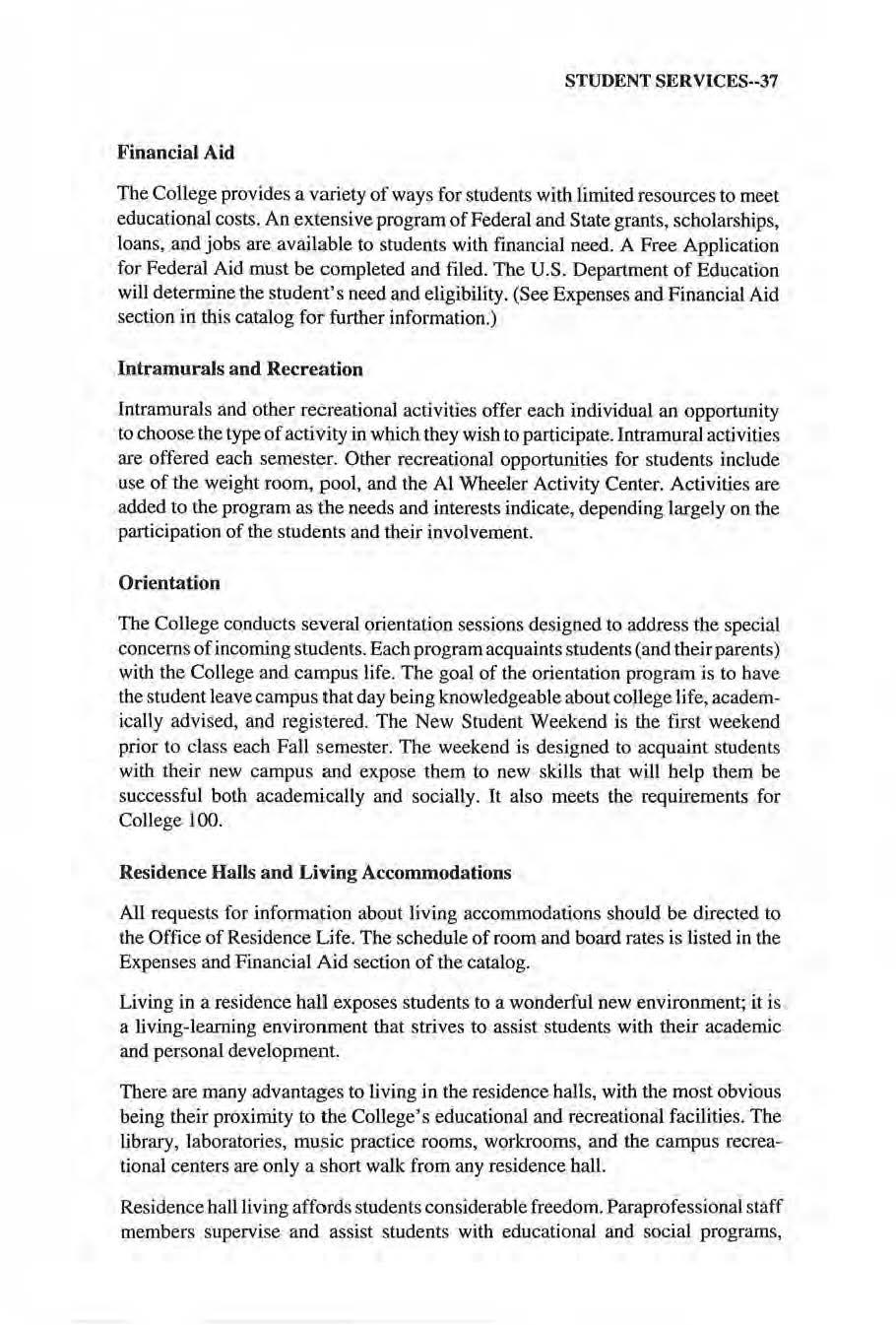
There a re many advantages to livi ng in the residence hall s, with t he most obvious being their proximity to t he College ' s educational and recreational facil ities. The lib rary, l aboratories , music practice rooms, workrooms, and the campus recreationa l cen ters are on ly a s hort walk from any residence hall .
Residence hall living affords stude nts considerable freedo m. Paraprofessio nal s taff members supervi se and assist students w it h educational and social programs,
STUDENT SE RVICES--37
augmenting the academic program. These programs provide the assistance that may be needed to adjust to college life.
Peru State offers a variety of alternative living accommodations. There are separate residence halls for men and women as we ll as co-educational balls. Each residence hall has its own visitation policies and unique physical layout. Students are responsible for supplying theirown linen and bedding including p illows and mattress pads. Residents are welcome to bring other personal items from home such as radios, stereos, etc. Hot plates, microwave ovens, and air conditioners are oot permitted. The lower level of each hall is equipped with lcitchen fac ilities, microwave oven, washers and dryers, and recreational equipment such as pool and pingpong tables. Also, computer labs are located in each ball for student use. Hours of operation vary between halls.
The residence hall and/or food contracts are for the full academic year. Student~ should understand that the contract is a financially binding agreement lhat obl igates them for rental rates for the academic year Con t racts will be voided only for the following documentable reasons: unforeseen financial hardship, medical, withdrawal from college, graduation, transfer, oc marriage (appropriate verification is required). The last day to make changes to the residence hall and/or food contract coincides with the last day to drop/add
A ll unmarried freshman and sophomore students must live in college residence halls; however, this requirement shall not apply to those undergraduates who:
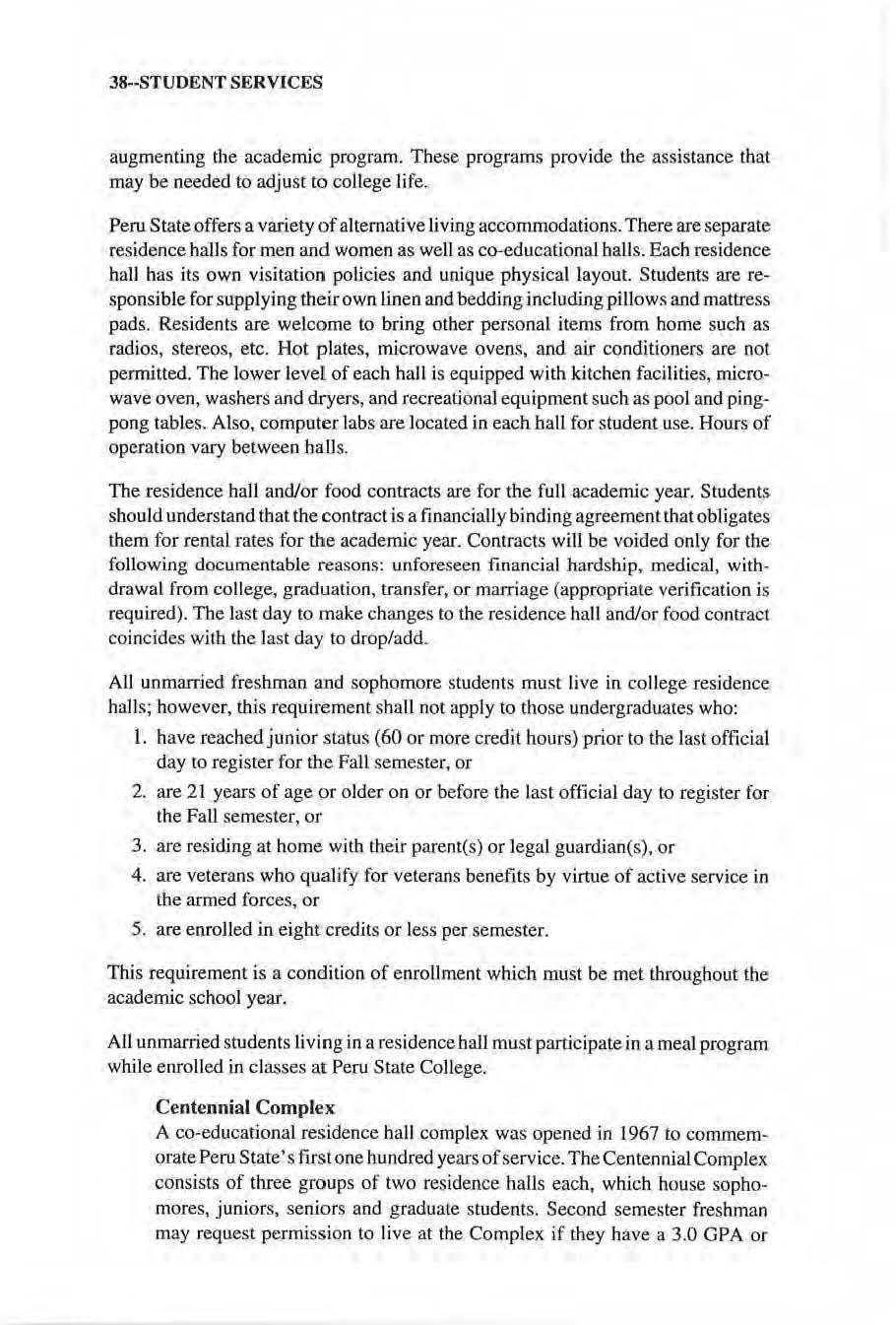
l. have reached junior status (60 or more credit hours) prior to the last official day to register for the Fall semester, or
2. are 2 1 years of age <;>r older on or before the last official day to register for the Fall semester, or
3. are residing al home with their parent(s) or legal guardjan(s), or
4. are veterans who qualify for veterans benefits by virtue of active service in the armed forces, or
5 are enrolled in eight credits or less per semester.
This requirement is a condition of enrollment which must be mel throughout the academic school year.
All unmarried students living in a residence ball must participate in a meal program while enrolled in classes at Peru S tate College.
Centen nial Complex
A co-educational residence hall complex was opened in 1967 to cornmemoratePe ru State's first one hundred years of service. The Centennial Complex consists of three groups of two residence halls each, which house sophomores, juniors, seniors and graduate students. Second semester freshman may request permission to live at the Complex if they have a 3 0 GPA or
38--STUDENT SERVICES
higher. Davidson/Palmer Hall and Clayburn/Mathews Hall are co-educational. Nicholas/ Pate H all houses both s ingle a nd married/family s tudents.
The living areas in the Complex are set up suite- sty le. Each suite is comprised of two or three bedrooms, a living room and a bath. Toe suites are carpeted and furnished; each bedroom has two bujlt-in desks, study lights, book cases, a dresser, twin beds and a double closet with ample storage. For the convenience of residents there are computer/study suites with IBM-compatible computers and printers. The computer labs are also equipped for Internet access.
Delzell Hall
Gothic-styled Oelze]] Hall houses approximately 150 men. The spacious living room i s furnished w ith sofas, chairs, a te.lev is io n and a fireplace.
There are four floors of rooms arranged as combination $leepi ng and study rooms with each room housing two students. A built-in combination dresser and des k, bookcase, bulletin board, twin bed, and draperies are furnished to each student.
In addition to a walk-in closet, lavatory, and medicine cab in et that are shared, each student is provided with an individual built-in wardrobe. There is a large shower room of ceramic tile and marble located on each tloor. Delzell Hall a l so has a computer/study room for the conve nience of its residents, with computer access to the Internet.
EUza Morgan Han
Located in the northwest corner of the campus, Eliza Morgan H all was o pened in 1929 . Tl;ie building houses 167 women in rooms situated on four floors. There are two large furnished lounges located on the first floor and the basement for student use. Rooms are double occupancy and furnished wi th two twi n beds, two desks, a dresser and window coverings. In add it ion, each resident shares with her roommate a closet and sink area. Each floor has centrally located bathrooms and shower areas.
Morgan Hall has s tudy rooms situated on each 0oor and a computer room on the first floor for the convenience of its reside nts. A computer with access to the Internet is located in this lab.
Oak 1-lill Apartment Housing
Campus apartments are available to students who have families or are o lder than traditional college age. Preference is given to married students who may or may not have children There are one and two bedroom units available in Oak Hill. Each unit is furnished with a stove and refrigerator. Apartments are leased on a renewable yearly bas is. A deposit is required and is refundable at the end of the lease agreemen t provided the property is left in good condition. Rent is due the first of the month and is payable io the College Bus iness Office.

STUDENT SERVICES--39
Inquiries about married/family housing may be made at the Office of Reside nce Life.
Student Handbook
Toe Student Handbook is a gu ide for college success, college services, campus living, and student conduct. Students are expected to acquaint themselves and comply with the rul es and poli cies in this catalog and the Student Handbook .
Studen t Health Services

Th.e College maintains its Health Center in A.O Majors Hall Students may visit the college nurse, doctor, or counselor at the Health Cen ter during regularly sched uled office hou rs or make appointments through the nurse with other health care providers. Some nonprescription drugs, first aid, and primary care are administered at the Heal th Center. The College' s responsibllity for medical expenses is limited to these services.
It is recommended that stu dents have health insurance. The College does not insure students for health care. Students who wish to participate in intercollegiate athletics must be certified each seaso n as physically fit by a physician and provide insurauce information before beginning their sport.
Pu blic Health Services
The College provides space at the Health Center for two medical clinics for the benefit of the community and the College.
Family Planning Clinic provides pap smears, testing for sex ua ll y trans mitted infections (including HIV) and pregnancy, and counseling on family planning. This clinic is held monthly.
Nemaha Cou nty Health Department holds a Well Child Clinic several times each month which is available to any child regardless of residence or income.
Student Programs and Student Life
Peru State College provides opportunities for st11dents to grow outside lhe classroom setting.
Students h ave the opportunity to become an integral part of campus activities through Student Senate, the student goveming body of the campus. Student Senators provide a link between the College faculty, and administration and tbe student body by serving on many College committees. The student representative to the Nebraska State College Board of Trustees also re ports regularly to the Student Senate. The Student Senate is an e lected body representative of the s tudent community.
40--STUDENT SERVICES
Students may also elect to be involved in Campus Activities Board (CAB), a volunteer student organization that provides campus educational, social, cul tural, and recreational programs. CAB offers individuals opportunities to select, develop, and present quality programming. Throughout the year CAB sponsors a wide variety of activities including professional artists, dances, picnics, non-traditional student programming, low-budget activities, ethnic cultural events, Women's History Month, Homecoming, and Spring Fling activities.
Students also have the opportunity to become involved in other organizations on campus. Participation in these organizations and programs provides students an opportunity to develop leadership and social skills.
Student Organizations
Students at Peru State may participate in a wide variety of stude nt organizations fo r their personal, social, acadern}c, or professional benefit.
Professional and Social Organizations
ACORN - AEYC is a local affiliate of the National Association for the Education of Young Children (NAEYC) Membership in ACORN is open to both students and local area ed ucators NAEYC is the nation's largest membership organization of early childhood professionals. Students interested in the education of young children are e ncouraged to belong to this organ ization.
The A rt Cl ub is a social club for art majors and students interested in art.
T he Accounting Association is affiliated with the In stitute of Management Accountants , Its purpose is to increase student awareness of caree rs i n accounti ng and to increase emp loyers' awareness of Peru State grad uates.
The Association of Challenged and Enabl ed Students (ACES) provides support and inform ation for those having or concerned with learning disabilities or physical di sabilities and to expose the no n-d isab led population to a more realis tic perspective of those with disabilities.

The Campus Activities Board (CAB) is the central agency to provide and assist with co-curricular and recreational programs for the benefit of PSC and the surroundi ng community, and to develop sound studen t leadership through planning and execuling co curric ular activities.
The Computer Club is open to all Peru State College s tudents. Its purpose is to enhance the membership 's knowledge of computers, computer applicatio ns. the Internet, and other co mpu ter-related topics. Interested members have the opportunity to ga in experience by doing consultin g work for busi·ness and indus try.
STUDENT SERVICES--41
The Co uncil for E xce ptional Children-Student (CEC -S), a program o f CEC, is an interna tional association for all s tude nt membe rs of CEC a nd is organ i zed on b oth the state/prov inc ial level and o n the the international level.
I ts primacy purpose is to pre sent stude nt s with opportunities to improve ed ucational, professional standard s and increase awareness of exceptional chjldren and youth , and it is the focal point for the professional preparation of any student interested in serv ic es for exceptional children and youth.

The Biology Club provides educational and professional activ iti es for s tudents int erested in the bi ological sciences.
The English Club promotes the mastery of written expression, encourages worthwhile reading, and foste rs fellowship among students specjalizing in E nglish or literature.
The Honors C lub is open to students withi n the H onors Program and provides a forum fo r interaction and discus sio n.
The Industrial Arts Club is devoted to promoting interest in the industria l arts and vocational education.
The Multicu ltural Committee is a campu s-wide committee composed of students, facul ty and staff that assists the campus in increasing awareness and respec t for all cu ltures.
The Peru Social Science Society strives to provide a n informal setting fol' soc ialization and discussion.
Peru Sta te Management Association is open to all students aod p rovides a wide range of activities to enhance members' knowledge in the fi eld of Busi ness Management
Phi Beta Lambda is a state and national bus iness frate rnity. Peru State's chapter, Epsilon Tau, is open to a ll stu de nts in terested in business.
The Peru Student Ed ucation Association is an organizat ion for p ote ntial teachers and i s affi liated with the Nebraska State Ed ucat ion Association and t he National Education Association. Its act iviti es are devoted to the improv e~ ment of educat ion.
42--STUDENT SERVICES
Honorary Societies
Alpha Chi is the College's national honorary scholars hip society . It recognizes academic schol arship, good reputation. and character. The s ociety's members are select:ed from the top ten percent of tbeJunior and senior classes.
Alpha Mu Omega i s an honorary mathematics fra ternity which aims to develop and promote interest in the study of mathematics . Students with above-average grades in mathematics who have taken at least ten hours of mathematics are eligible for membership.
Beta Beta Beta is the College's professional honorary biology fraternity open to junior and senior biology students. Candidates for membership must have above-average grades and plan to continue the study of biology.
Epsilon Pi Tau, an honorary professional fraternity in technology education, selects joniors and seniors based on their grade point averages in the industrial arts and other fields .
Kappa Delta Pi is a national honorary education fraternity open to juniors who rank in the upper quartile of their class and who show evidence of a con tinued interest in education.
Phi Alpha Theta, a national honorary history fraternity, is open to students with more than l2 hours of history and high schol asti c standing.
Sigma Tau Delta, the national honorary E ng lish fraternity, g ranted Peru State its Phi Alpba Chapter in 1926. Students who demon s trate an interest in literature and creat ive writing and who are above average in sc holarship are elig ible for membership. The chapter assists the E ngli s h Club in publi s hing Sifting Sands.
Music Organizations
The College's band program is divided 1nto the Marching Band , the Concert Band, and the Instrumental Ensembles.
The Peru Chorus is open to all students and is devoted to the study and perfonnance of choral literature. Other audi ti on Vocal Ensembles include Madrigals and Show Choir.
The Student M.E.N.C. i s the student chapter of the Music Educator s National Conference and is open to all students interes ted in music. The club annu ally s ponso(S instrumental and vocal clinics, as well as other musical productions.

Religious Organizations
Religious groups available to Peru State students are the Fellowship of Christian Ath letes and the United Ministry to Higher Educatio n.
STUDENT SERVlCES--43
Student Government
The Student Senate of Peru State College consists of elected representatives from a variety of constituencies and is dedicated to focusing student interests and opinions in the operation of the College. The Senate has voting members on the Library Committee, Teacher Education Committee, Academic Affairs, and Scholarship Committee; it has non-voting membership on Faculty Senate and President's Council.
Residential HalJ Councils are representative councils selected by the members of each residence hall. These governing bodies recomm end solutions to student issues, plan educational and social activities for hall residents, and recommend building improvements.
Student Publications
The Peru State Times is the official college newspaper. It is published during the school year under the sup.ervision of an academic advisor. Stud ent contributions are welcomed.
Sifting Sands is a magazine of student writing that is published in the spring by the English Club and Sigma Tau Delta.
STUDENTS RIGHTS, FREEDOMS, AND RESPONSIBILITIES
The role of Peru State Co llege is to encourage people of all ages to develop th eir skills and talents, according to individual abilities and interests. so that collectively they contribute to the continuum of democracy. College policies, procedures, and regulations are formulated to guarantee each student's freedom to learn and to protect the constitutional rights of others.
The concept of rights and freedoms, no matter how basic o r w idely accepted, carries with it corresponding re sponsibilities. Students, as well as other members of the College community, e nj oy the same constitutional and civil rights guaranteed all citizens; at the same time, they are subject to the laws of the nation, the State of Nebraska, the local commun ity and the College. All members of the College community have a strong responsibility to protect and maintain an academic climate in which the freedom to learn can be enjoyed by all. To this end, certain basic regulations and policies have been developed to govern the behavior of students and employees as members of the college community.
Violations of student conduct regula ti ons will be handled through the Office of the Vice Pre sident for Student Affairs. Violations of federal, state, and/or local laws make a student subject to civil and/or criminal action in addition to disciplinary action by the College. Each student is responsible for knowing and complying with PSC policies, procedures and deadlines.

44--STUDENT SERVICES
Policies and regulations may be found in the College Catalog, the Student Handbook, and in the Student Affairs Offi ce.
Academic Rights of Students
The College has the responsibility of providing a program of quality education in keeping with its financiatl r eso urces. Students have protection through campusdesigned procedures agaimstprejudiced or capricious academic evaluation. Student per formance shall be evaluated solely on an academic basis, not on opinions or conduct in matters unrelated to academic standards. Students are responsible for the proper completion of their academic program, for familiarity with all requirements of the College Catalog, and for maintaining an acceptable grade point average for degree requirements. Students have the right to be informed at the beginning of each term of the nature of the course, course expectations, evaluation standards, and the grading system.
Code of Conduct
Students at the College have certain rights and responsibilities. Tncluded in the resp onsibilities is an awareness of the standards of appropriate behavior. The College expects each student to exercise self-discipline which will enhance the individual's educational experience and the total learning environment of the College.
In general, the off-campus activities of students are v iewed as their personal business. However, when a student violates local, state, or federal laws and at the same time violates the Code of Conduct, e ithe r on or off campus, the College reserves the option of init iating disciplinary action on its own. Disc.iplinary action may be initiated by the College and sa nct ions impo sed against any student or student organization found guilty of committing, attempting to co mmi t, or intentionally assisting in the commission of any of the following prohibited forms of conduct.

1. Participatio n in a demonstration on the campus which materially and substantially disrupts or obstructs th e normal operations, activities or func tions of the College, including unauthorized occupation of College premises;
2. Any act of academic dishonesty (see the Academic Dishonesty section of the College Catalog);
3. Providin g false or misleading information for College records or student identifi cation cards, forging sig natures or otherwi se altering official College documents;
STUDENT SERVICES--45
4. Misuse of computers or computing resources;
5. Unlawful or unauthorized possession, use, distribution, dispensing, delivery, sale or consumption. of any alcoholic beverage on College property;
6 . Unlawful or unauthorized possession, distribution, del ivery, dispens ing, manufacture or sale of any drug; or being unlawfully under the influence of any drug on College property;
7. Physically abusing or threatening to physi cally abuse any person;
8. Sexually assaulting or any other uninvited behavior of a sexually explicit nature;
9. Conduct which is unreasonably dangerous to the health or safety of other persons or oneself;
IO. Theft or attempted theft of any property;
11. Damaging or attempting to damage property of the College or of another individual;
12. Using or possessing bombs, explosives, incendiary devices, or fireworks;
13. Setting or attempting to set any fire on the campus or on the premises of any student housing unit, except in fireplaces or other facilities designated for fires;
14. Failing to report or falsely reporting a fire or any other extremely dangerous coodition when known or recognized on the campus or on the premises of any student housing unit;
15. Possessing or selling firea rms, ammunition, other dangerous weapons, or dangerous chemicals on the campus or on the p remises of any student housing unit. Weapons used for hunting and other legitimate sport may be stored in an area designated by the College; the checking in and out of weapons from the designated storage area must be accomplished in accordance with procedures established by the College and published in the Residence Life section of the Student Handbook;
16. Obstructing or failing to comply with the directions of a law enforcement officer, firefighter, or College official in the performance of his or her duty on the College campus, on the premises of any student hous ing unit or at any activity or event sponsored by the College or an organization;
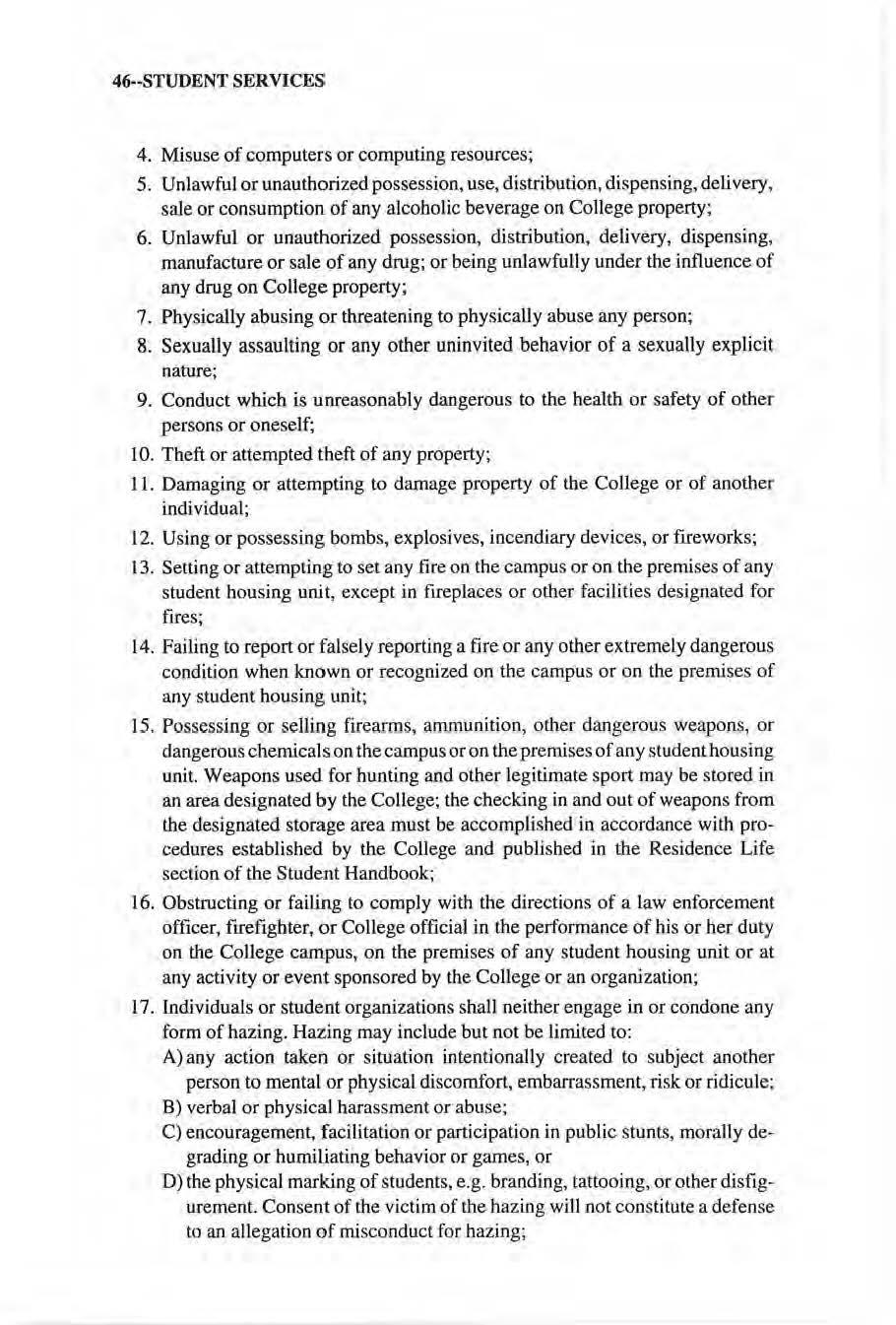
17. individuals or student organizations shall neither engage in or condone any form of hazing. Hazing may include but not be limited to:
A) any action taken or situation intentionally created to s ubject another person to mental or physical discomfort, embarrassment, risk or ridicule:
B) verbal or physical harass ment or abuse;
C) encouragement, facilitation or participation in public s tunts, morally degrading or humiliating behavior or games, or
D) the physical marking of students, e.g. branding, tattooing, or other disfigurement Consent of the victim of the hazing will not constitute a defense to an allegation of mi sco nduct for hazing;
46--STUDENT SERVICES
18. Committing any unlawful act of indecent exposure or public indecency;
19. Participating in any gambling activity in violation of the laws of tbe State of Nebraska or of the United States;
20. Unauthorized use of any College property, facilities, equipment or materials;
2 1. Possessing, producing, manufacturing, or having manu fac tured without proper authorization, any key or unlocking device tor use on any College facility or lock;
22 Serious traffic violati ons on the campus, inc luding operating any vehicle while intoxicated, speeding, reckl ess endangerment, or reckless driving;
23 Violation of any s tude nt ho using unit policy, rule or regulation;
24. Abuse of College disci pl inary proceedings which includes, but is not limited to, failure to obey a r eq uest to appear before a disciplinary officer or committee, falsification of testimony, dis ruption or interference with the orderly conduct of a ny hearin g;
25. Any act by a s tudent whi ch occurs on the campus, on the premi ses of any student hou s ing unit o r at any activity or eve nt Spon sored by the College or an organ izatio n which is in violation of any ordinance of the municipality i n which the College resides, s hall consti tute misconduct;
26. Unauthori i.ed sales or solic itation on College property, i ncluding bu t not limited to door- to-door so li c itation in resi dence hall s o r other campus buildings.
Disciplinary Procedures
Disciplinary procedures may be found in the Student Handbook.
Freedom from Unreasonable Search/Sei zure
Students shall be free from unreasonable search and/or seizure regardi ng their person and their personal property The College does reserve the right to search College property as regard s to perso nal safety in comp liance with College policies.
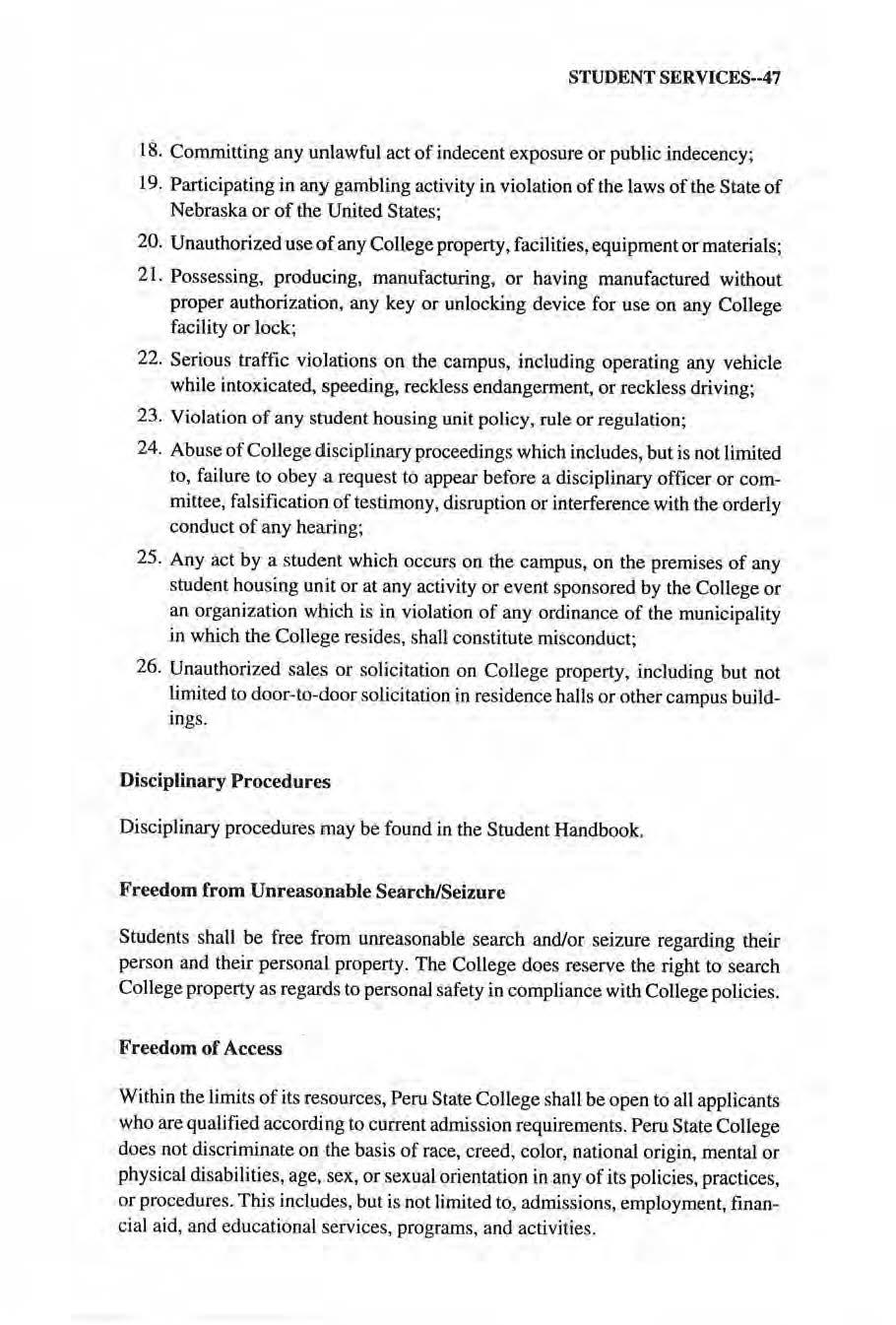
Freedom o f Access
Within the limits of its resources, Peru State College shall be open to all applicants who are quaLified according to c urrent admi ssio n requirements. Peru State College does not discriminate on t he basis of race, creed, col o r, national orig in, mental or physical disab iliti es, age, sex, or sexual orientation in any of i ts policies, practices, or procedures. Tbis i ncludes, but is not limited to, admissions, employment, financial a id, a nd educati o nal serv ices, programs, and activities .
STUDENT SERVICES 47
Freedom of Association
Students are free to associate and promote their common interests. They have the right to seek, through official procedures, tbe establi shment of organizations as long as they are not in conflict with the educational puIJ)oses of the College. Students have the right to affiliate with officially recognized campus organizations of th eir choice, within the membership requirements of those organizations.
Freedom of Expression
The rights of free speech and peaceable assembly are fundamental to the democratic process. The College supports the rights of s tudents of the College community to express their views and opinions on actions or ideas, to associatefreely with others, and to assemble peacefully.
Whether expressing themselves as individuals or in organized groups, members of the Co llege community are expected to conduct themselves responsjbly , according to law, and to respect the basic educational goals of the College. Accordin gly, th e College insists that free express ion not violate the rights of others. Disruption of th e educational processes and functions of the College, violation of law , and fighting words would constitute such violation of the Student Code of Conduct, for example.
The College reserves the right to de termine or reg ulate time, place and manner of expression, demonstrations, or meetings.
Student Participation in Institutional Government
Students shall be free, individually and co llectively, to express their views on iss ues of institutional policy and on matters of general interest to the student body. The student body shall have clearly -defined means to participate in the fonnulation and application of institutional policy affecting academic and student affairs.
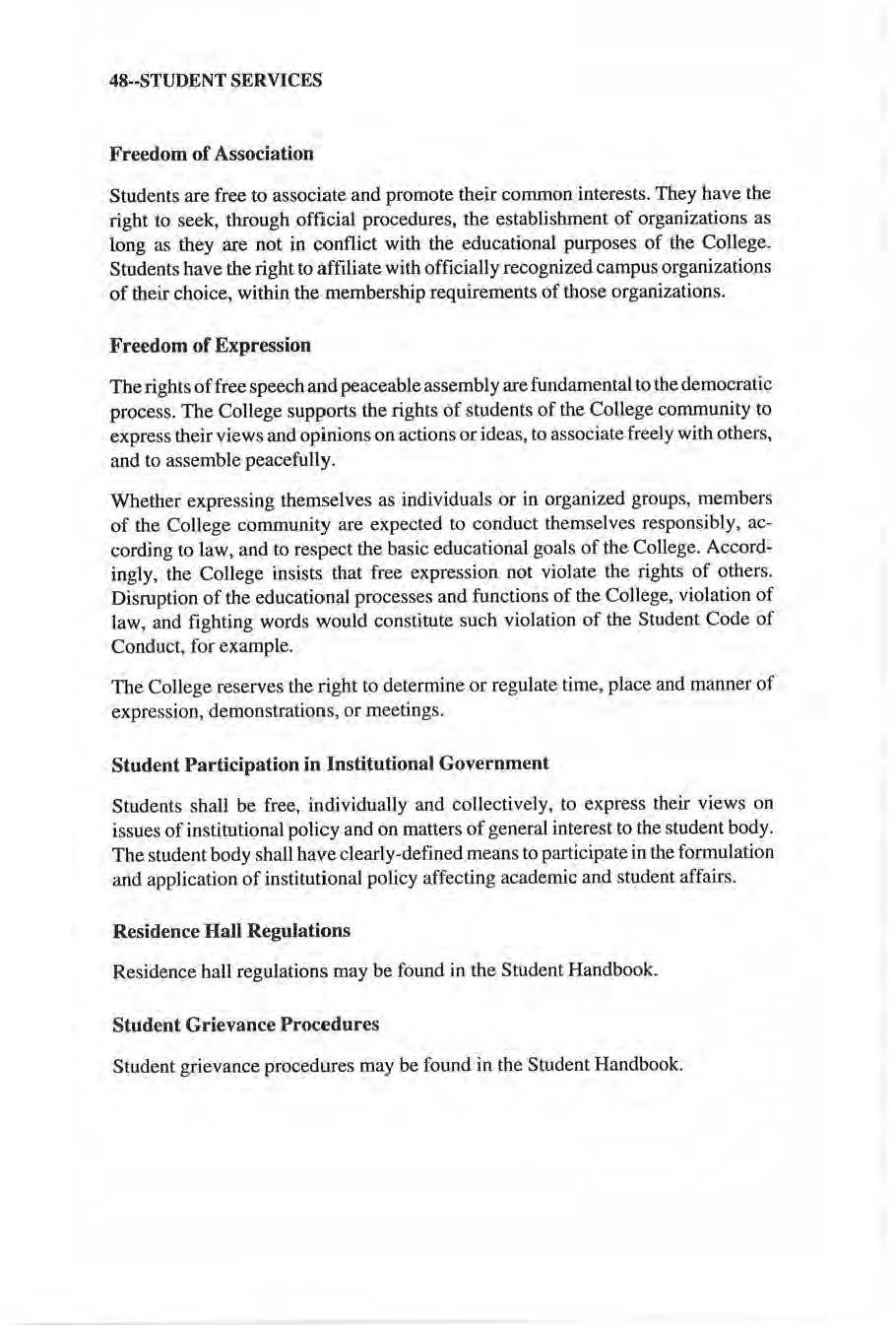
Residence Hall Regulations
Residence ball regulations may be found in th e Student Handbook .
Student Grievance Procedures
Student gr ievance procedures may be found in the Student Handbook .
48--STUDENT SERVICES
NON-ACADEMIC POLICIES
AIDS
This policy is followed in the event any student, employee, or other school contact has contracted AIDS (Acquired Immune Defici ency Syndrome), or ha s been diagnosed by a physician as b eing infected with the HIV virus (Human Immunodeficiency Virus).
The goals of Peru State College are to:
1. Provide an appropriate and least restrictive work/study setting as feasible for persons with AIDS and HIV.
2 Provide a safe environment for the College community.
3. Maintain and protect all rights and privacy of persons with AIDS and HIV.
4. Continue to observe non-discriminatory guidehnes for all areas of campu s life (i.e. soc ial, academic, a nd cultural).
5. Assure that students/staff are not put at risk because of lack of knowledge, education, or proper equipment.
6. Incre ase awareness and provide education to prevent further disease.
HIV/STD testing is available at the Student Health Clinic.
Discrimination
Peru State Co llege believes that fostering diversity and respect for difference 1s a fundamental goal of higher educational insti tuti ons Therefore , the College takes the unequivocal stance that the subordination of a perso n or a group based on race, color, creed, di s ability, marital status, national origin, race, sex, or sexual orientation, cannot be tolerated. Peru State College will take stron g and effective steps to achieve a diverse learning e nvironment an d a workplace respectful of differences. Clear, fair and effective policies will be formulated and commun icated to all members of the campus community, and administration will respond promptly and consi stently to complaints about any acts that violate those policies
Family Education Rights and Privacy Act of 1974
The primary purpose for maintaining s tudent records at Peru State is to assist students with their educational endeavors and to record institutional actions. It is the policy of the College to a llow stud e nts to inspect, review and challenge their educational records as provided by the F ami fy Education Rights and Privacy Act of 1974 ( Buckley Amendme nt).
The complete College policy regarding the Family Eduation Rights and P rivacy Act can be found in the Student Handbook.

NON -ACADEMIC POLICIES--49
Complaints about the alleged failure of the College to compl y with the requireme nts of the Buckley Amendment should be first addressed to the Office of the Vice President for Academic Affairs.
Sexual Assault and Sexual Harassment

The College i s concerned about the safety and well-being of its students and staff and will promote awareness of sex ual harassment, rape, acquaintance rape, and other sex offenses through educational programs, workshops, counseling and pri nted ma terial s.
Sexual assau lt or harassment are violations of the Student Code of Conduct and the Board of Trustees policy concerning employees, and are prohibited. All allegations of sexual assault and/or harassment should be made in a timely manner directly to the Vice President for Student Affairs. All allegation s will be investigated thoroughly and will require detailed accounts of the incident(s). The investigation will be as confidential as po ss ible. ln cases of se xual assau lt the victim will be encouraged to immediately contact the proper legal and medical authorities in order to preserve evidence and prove criminal sexual assault.
Allegations of sexual assau lt or sexual harass ment will result in a disciplinary and/ or grievance procedure as outlined in the Student Handbook . T he results of disciplinary and/or grievance hearings evolving from allegations of sexual assault or sexual harassment will be made known to bo th the plaintiff and acc used within forty-eight (48) hours after the conclusion o f the hearing. The physical violation of o ne per son by another is deemed as most se riou s, and all appropriate campus and legal sanctions will be brought to bear on all gu il ty persons.
Sexual Harassment
Sexual harassment is defined as unsolicited nonrec iprocal behavior by an employee or student who is in a position to control anothers status and who uses the power or authority of that position to cause the employee o r student to submit to sexual activity, or to fear that he or she would be punished for the refusal to submit. Sexual harassment also includes a ny employee or student conduct of a sexual nature unreasonably interfering with a students educational performance or status by creating an intimidating, hostile, or offensive educat ional environment. Sexual harassment may consist of a variety of behaviors by an e mployee or s tudent including, but not li mited to, subt le pressures for sexual activity , inapprop1iate touching, inappropriate private language, demand for sexual favors. and physical assault.
Students with Disabilities
The Rehabilitation Act of 1973 (publi c law 93-11 2) sec tion 504, provides that' ' no otherwise qualified disabled individua l in the United States...shall solely by reason disabled , be excluded from the participation in, be denied the benefi ts of, or
50--NON-ACADEMIC POLICIBS
be subjected to discrimination under any program or activity receiving federal fi nanci al assis tan ce.''
l. It is the student's responsibility to notify the institution of any s pecial circumstances that would affect his/her ability to compete equally in the college environment. Learning disabilities must be appropriately documented.
2. While stude nts are encouraged to se lf-identify at the earliest possible time, students may not know or choose to self-identify, but can still receive services at any time once they self-disclose and document.
3. Students shou ld co ntact the office of Student Support Services, Vice President for Student Affairs or the Director of Admissions for further advisement.
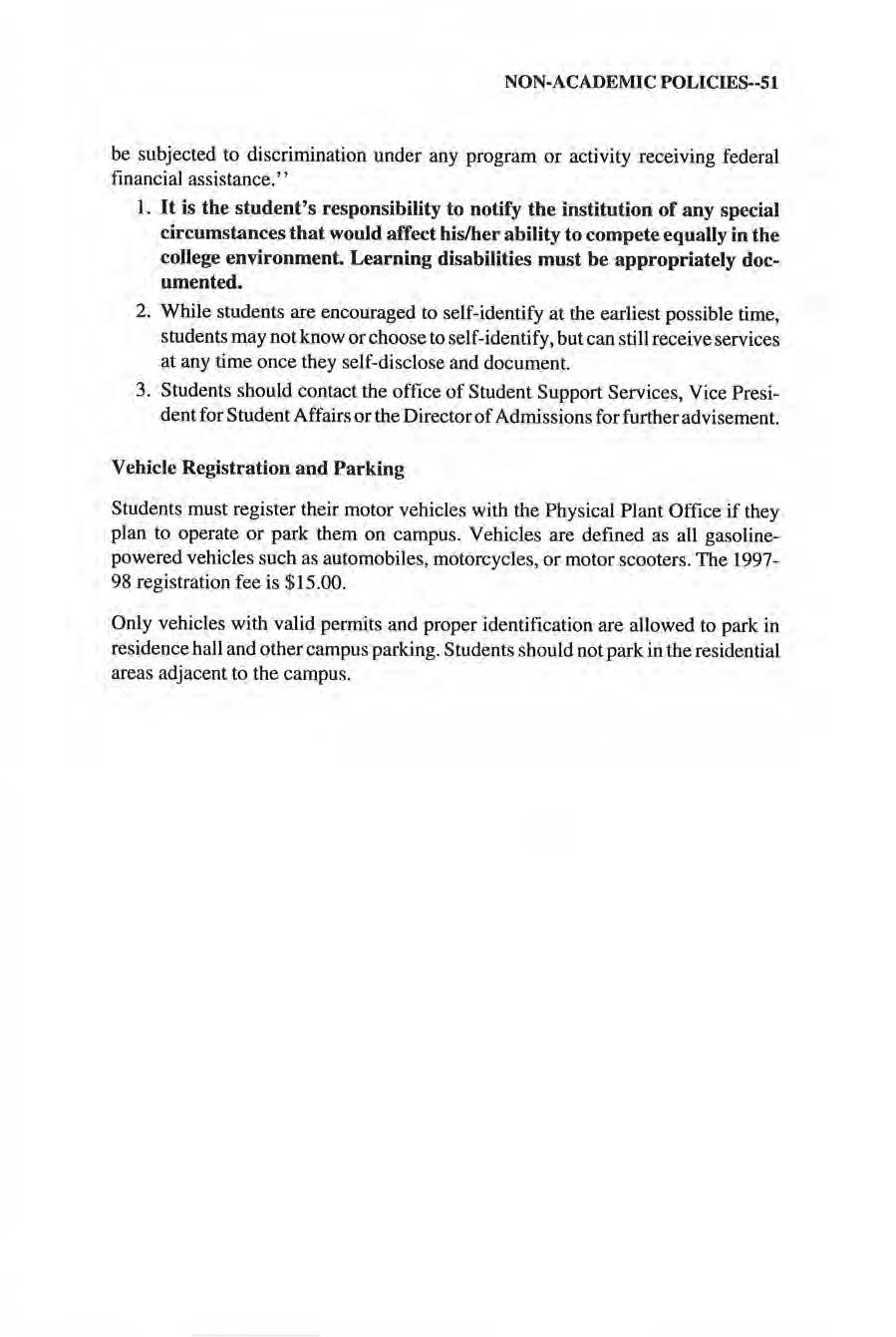
Vehicle Registration and Parking
Students must register their motor vehicles with the Physical Pl ant Office if they plan to operate or park them on campus . Vehicles are defined as all gasolinepowered vehicles such as automobiles; motorcycles, or motor scooters. The 199798 registration fee is $ 15.00.
Only vehicles witl1 valid per,mits and proper identification are allowed to park in residence hall and other campus parking. Students s hou ld not park in the residential areas adjacent to the campus.
NON-ACADEMIC POLICIES--51
COLLEGE AND PUBLIC SERVICES
Economic Development
Peru State College provides economic development serv ices to communities in southeast Nebraska. The Economic Development Program is headed by a full-time director. Community service activities of the Economic Development Program include short courses and workshops, assistance to communities in strateg ic planning, si te evaluation, marketing, business retention, and other aspects of development as requested by communities and development agencies. In addition, the College's Econom.ic D evelop men t Program serves as a liaison between state and regional development agencies and commllnity development groups within its servi ce a rea.
Nebraska Business Development Center
The Nebraska Business Development Cente r on the College campus provides free consulting to businesses or persons wanting to start a business. Clients may be assisted with management , financial projections. marketing, writing business plans, loan packaging, or other concerns. The NBDC is funded by the U.S. Small Business Administration, the State of Nebraska, and the College. The Peru State Coll ege office is one of eight basic serv ice centers located throughout Nebraska.

Peru Alumni Association
All graduates of Peru State College, as well as fonner students, faculty and st.aff who reques t it, are considered members of the Peru State College Alumni Association. There are no annual dues or fees.
Active chapters include Lincoln (organized in 1955), Omaha ( J 955), Rocky Mountain ( 1957. includes Co.lorado, Wyoming , western Kansas, and western Nebraska), Northern California ( l 958), Arizona (l 995) and Kansas City (1995). Inactive chapters include Southern California ( 1961), the local Thousand Oaks chapter ( 1973), and the East Coas t chapter (1988, includes Maine to North Carolina along eastern seaboard).
PSC alumni activities are based in the Alumni/Foundation Build i ng, located on the southeast comer of campus. Current mailing Lists of graduates. many former students, and some former faculty are maintained there, as are collections of yearbooks, photos , publications and other memorabilia.
The Pe ru Stater, the College's ofiicial alumni newsletter, is distributed at no charge to alumni and others.on the curren t mailing list. The College encourages submission of items for inclusion in this publication.
52--COLLEGE AND PUBLIC SERVlCES
College Library
The Peru State College Library provides access to e lectronic and print resources. Electronic resources are accessed through the library's web page at http:// www.peru.edu/library.htm1. The electronic reso urces incl ude an o nli ne catalog shared by the three State Colleges, full-text resources which includes over 2,000 periodicals and 150 newspapers, d atabas es through FirstSearch, and full Internet access. Access is provided in -house with Pentium computers and high speed printers and at the Regional Technology Center in Nebraska City. The print resources include 125,000 volumes, periodicals, and media such as video tapes for class use. lnterlibrary loan servi ce provides access to print resources around the world. Special Collections include the original manuscripts of authors Marion Marsh Brown, E.P. Conkle, Ruth Crone, and Louise Mears and include the history of Peru State College and the region. Information about the library can be found on the library web page.
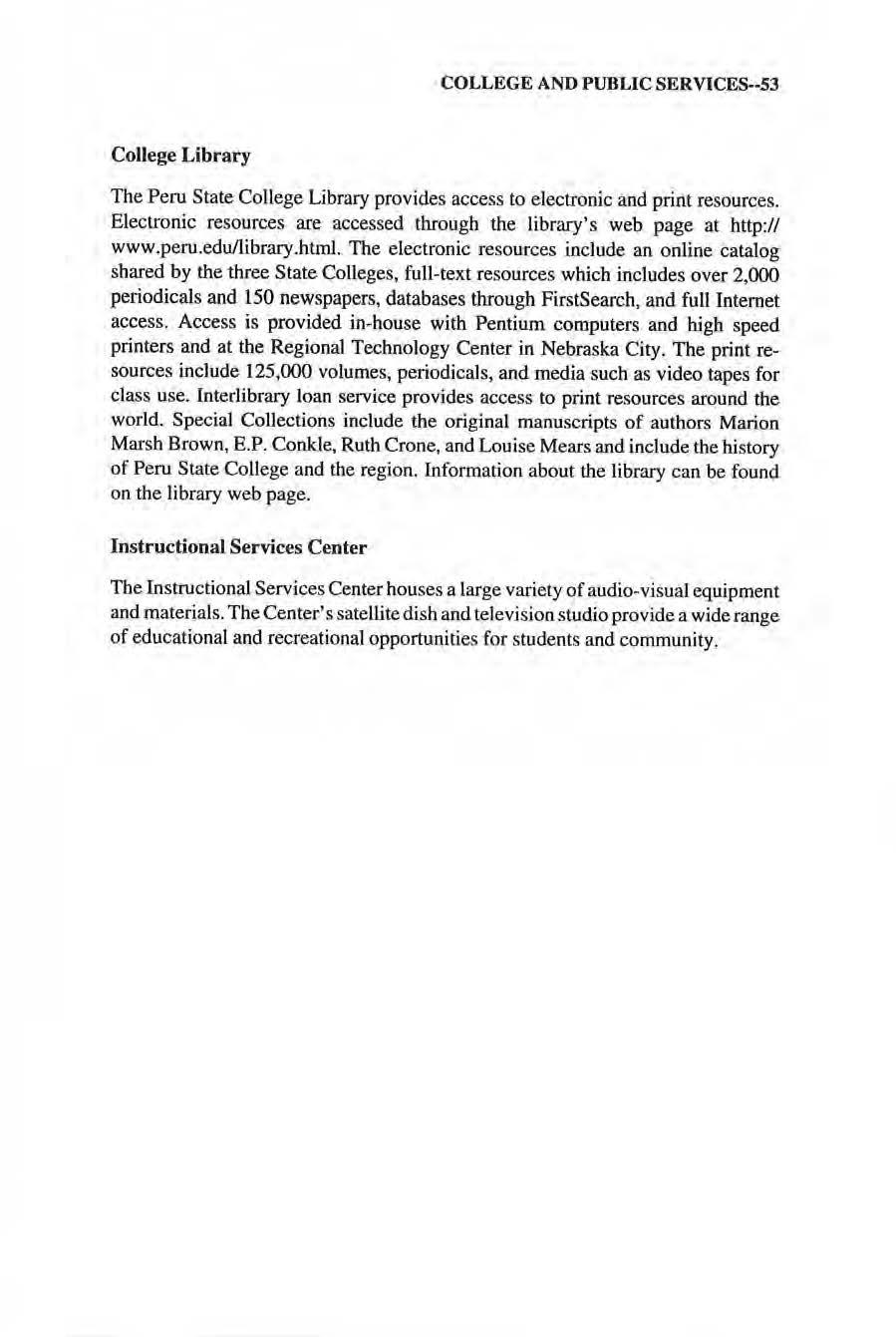
Instructional Services Center
The Instru ctional Services Center hou ses a large variety of audio-visual equipment and materials. The Center's satellite dish and television studio provide a wide range of educational and recreational opportunities for stu de nts and co mmunity
COLLEGE AND PUBLICSERVICES--53
UNDERGRADUATE DEGREE AND PROGRAM INFORMATION
G raduation Requ irements
In co mpliance with Board of Tru s tees policy, th.i s catalog is intend ed as a description of the educationa l programs and activities offered by Peru State. Information in the catalog is correct according to information available at the time of publication. The catalog is exp lanatory in nature and is not a contract between the stude nt and Peru State College. Peru State College reserves the right to withdraw courses at any time, change the rules and requirements regulatin g admissio n and graduation requirements , and change other regulations affecting the student body.
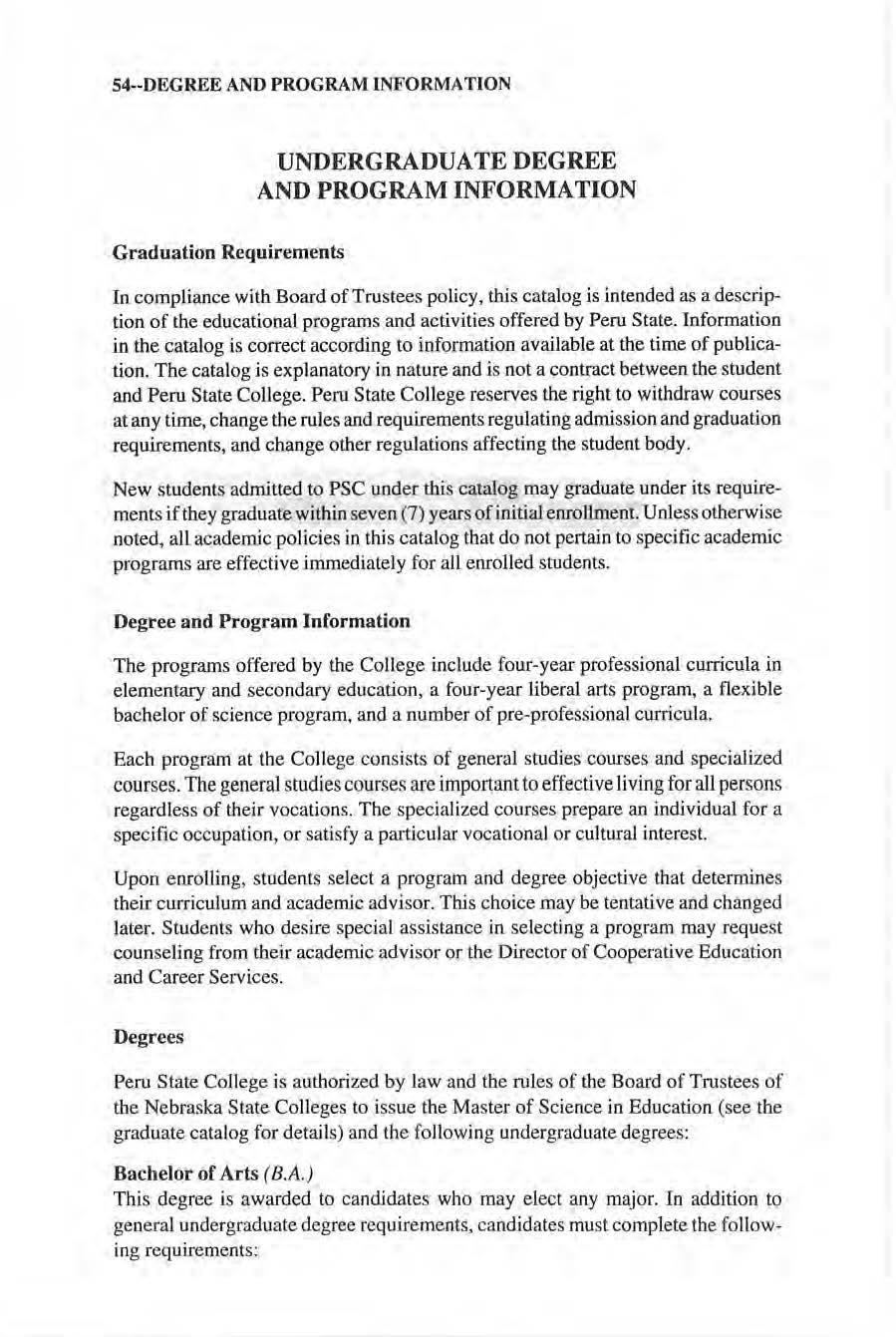
New students admitted to PSC under thi s catalog may graduate under its requ irements if they graduate within seven (7) years of initial enrollment. Unless otherwise noted. all academic policies in this catalog that do not pertain to spec ifi c academic programs are effective immediately for all enrolled students.
Degree and Program Information
The programs offered by the College include four-year professional curricula in elementary and seco ndary education, a four-year liberal arts program, a flexible bachelor of science program, and a number of pre- professional curricula.
Each program at the College cons ists of general studies courses an d spec ialized courses. The general studies course,1i are important to effective living for all persons regardless of their vocati o ns. The specia l ized courses prepare an individual for a spec ific occupation, or satisfy a particular vocational or c ultural inte res t.
Upon enrolling, students select a program and degree objective that determines their curriculum and academic advisor. Tb.i s choice may be tentative and changed later. Students who desire special assistance in selec ting a program may request counseling from their academic advisor or t he Directo r of Cooperative Education and Career Services.
Degrees
Peru State College is authorized by law and the roles of the Board of Trustees of the Nebraska State Colleges to issue the Master of Science in Education (see the graduate catalog for detai ls) and the fo llowing undergraduate degrees:
Bachelor of Arts ( 8.A.)
This degree i s awarded to candidates who may elect any major. Ia addition to general unde rgraduate degree requirements, candid ates must compl ete the following require ments:
54--DEGREE AND PROGRAM INFORMATION
ten ( l 0) semester hours of a modem foreign language oi: ten ( l 0) sem ester hours of uppe r, division credit outside of the student' s major in one di scipline approved by the appropriate Divi s io n Chair; six (6) sem es ter hours of Mathematics or six (6) hours of P syc hology; Politi cal Science 20 l and nin e (9) seme ster hours fro m History 11 3, 1 14, 20 I , 20 2, or Soc iology 201.
Bachelor of Science (B.S.)
This deg ree i s a warded to candidates who elect any major.
Bachelor of Technology (B.T.)
This degree is awarded to candidates whose compleme ntary are a of emphasis is Distribution. , Supervision, or Manageme nt, and who transfer from othe r ins titutions a fte r having co mplete d an associate tech nical deg ree program or equival ent.
Degree Requirements for Bachelor of Arts and Bachelor of Science

The following are the mini mum requirem e nts for the B.A. & B .S. degrees:
Tota l Hours
Degre e candidates must earn a minimum of 125 semester credit hours.
Upper Division Credit
Degree candidates mu st earn at leas t 4 0 semester hours of uppe r divis ion credit (300 and 400 level courses).
Grade Point Average
A minimum, cumulative g rade p oi nt average of 2.5 is requ ired for all deg rees in teacher education; the minimum c umulati ve a verage fo r other degrees i s 2.0
General Studies and Major
Deg ree candidates must complete t he general studies program, a major (teacher education candidates must complete one field endorsement or one subject e ndorsement), and courses in support of th eir educational objective.
Major Grade Point Average
A minimum c umul ative grade point average of2.0 is required fo r a ll course s listed or selec ted to fulfill the maj o r hour re quirements. No grade lower than a D + ( or C for transfer work) may be used to fulfLII course requ irements in an academic maj or .
Peru State Credits
A minimum of 30 semes ter hours must be earned from Peru State College.
DEGREE AND PROGRAM INFORMATION--SS
Resident Credits
A minimum of 24 of the last 30 s emester hours must be earned in residence. This requirement may be waived io cases where any of the required resi dent credit is earned at another Nebraska State College or where official cooperative agreements with other institutions exist. Extension, continui ng education, and off-campus courses conducted by Peru State are considered resident credits .
College Survival SkiUs
A one semester hour course, College 100, is a graduation requirement for all full time on-campus, undergraduate, degree-seeking students (carrying 12 or more hours per semester). The purpose of College 100 is to introduce the new student to information a nd skills pertaining to college success. Among the subjects covered are academic expectations and planning, study skills, time management, financial aid, s ubstance abuse and diversity issues.
This class can be waived under the following conditions:
1. Transfer students who have completed at least thirty (30) se mester hours before the term of admission.
2. PSC students who have accumulated at least thirty (30) credit hours at a part-time level before attending PSC on a full-time basis
3. Readmitted s tudents who have not maintained normal progress and who completed at least thirty (30) semester hours.
4. Transfer s tudents with less than thirty (30) semester hours before the term of admjss ion and who can transfer in a s imilar course from another college.
Degree Requirements for Bachelor of Technology

The Bachelor of Technology degree i s designed for transfer students who hav e an associate deg ree or its equivalent and a technical major. The degree is flexible enough to accommodate the transfer s tudent who meets the following minimum r equirements:
Prerequisites
D egree candidates mu st have a technical associate degree from a regionallyaccredited institution or its equivalent. Students who h ave completed technical pro grams of les s than two years will be required to take additional technical coursework that is eq uivalent to an associate degree program. The additional work may be taken at a comm unity college or other applicable institution, but must be approved by the Chair of the Divi sion of Business at Peru State College.
TotaJ Hours
Degree candidates must earn a mini.rrmrn of 125 semester c redit hours. A minimum of 59 semester hours are to be completed through accredited institutions authorized to grant a baccalaureate or. higher degree. Exceptions:
56--DEGREE
AND PROGRAM INFORMATION
l ) Basic or recruit military training may be used to satisfy the general stud ies requirement of Health & Hygiene/PE Activities; 2) a limited number of CLEP subject examinations are acceptable; 3) a minimum of 30 semester hours must be Peru ,State College instruction.
Upper Divis ion Credit
Degree candidates must earn at least 20 semester hours of upper division credit (300 and 400 level courses).
Grade Point Average
A minimum, cumulative grade point average of2.0 is required for all coursework comp leted at Peru State.
General Studies
Thirty semester credit hours are required. At least three (3) hours must be selected from each area listed below and no more than nine (9) hours of the total can be in any one area. Courses selected must be exclusive of those completed for the area of emphasis:
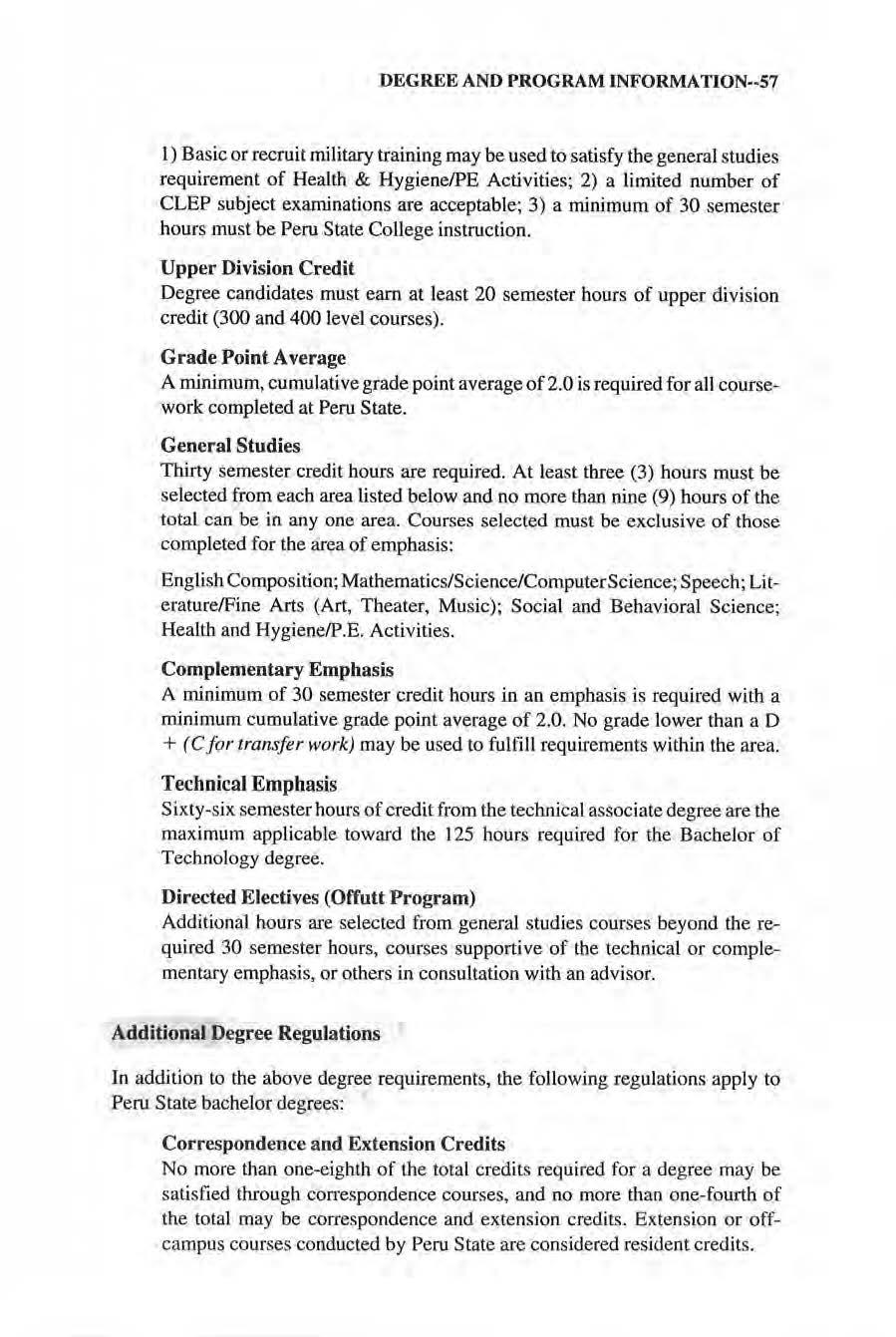
English Composition; Mathematics/Science/ComputerScience; Speech; Literature/Fine Arts (Art, Theater, Music); Social and Behavioral Science; Health and Hygieoe/P.E. Activities.
Complementary Emphasis
A minimum of 30 semester credit hours in an emphasis is requ ired with a minimum cumulative grade point average of 2.0. No grade lower than a D + (C for transfer work) may be u sed to fulfill requirements within the area.
Technical Emphasis
Sixty-six semester hours of credit from the technical associate degree are the maximum applicable toward the 125 hours required for the Bachelor of Technology degree.
Directed Electives (Offutt Program)
Additional hours are selected from general studies courses beyond the required 30 semester hours, courses s upportive of the technical or complementary emphasis, or others in consultation w.ith an advisor.
Additional Degree ReguJations
In addition to the above degree requirements, the following regulations apply to Peru State bachelor degrees:
Correspondeuce and Extension Credits
No more than one-e.ighth of the total credits required for a degree may be satisfied through con-espondence courses, and no more than one-fourth of the total may be correspondence and extension credits. Bxtensio n or offcampus courses conducted by Peru State are considered resident credits.
DEGREE AND PROGRAM INFORMATION--57
Professional Schoo l Residence Credits
Pre-profess ional students who have successfu lly completed three years i n a specifically approved program may transfer to an accredited professional school during their fourth year and qualify for a bachelor's degree provided they meet all othe r graduation requirements .
Varsity Sports Credits
A maximum of four (4) credit hours of P.E. 190-Yarsity Sports is all owed toward a degree. PE 190 may not meet General Studies requirements
Developmental Skills Credit
A maximum of five (5) credit hours of D evel opmental Skills courses is allowed toward a degree.
Independent Study
A maximum of six (6) hours of Independent Study is allowed toward a degree (see page 63)
Directed Study
A maximum of eight (8) hours or two (2) courses of Directed Study is allowed toward a degree (see page 62).
Cooperative Education
A maximum of 12 hours of Cooperative Education internship credit is al~ lowed toward a degree. Primarily, the hours earned are noted as general electives. In certain majors. there are some limitati ons placed on the number of hours that may be applied to that major (see page 60).
Application for Degree
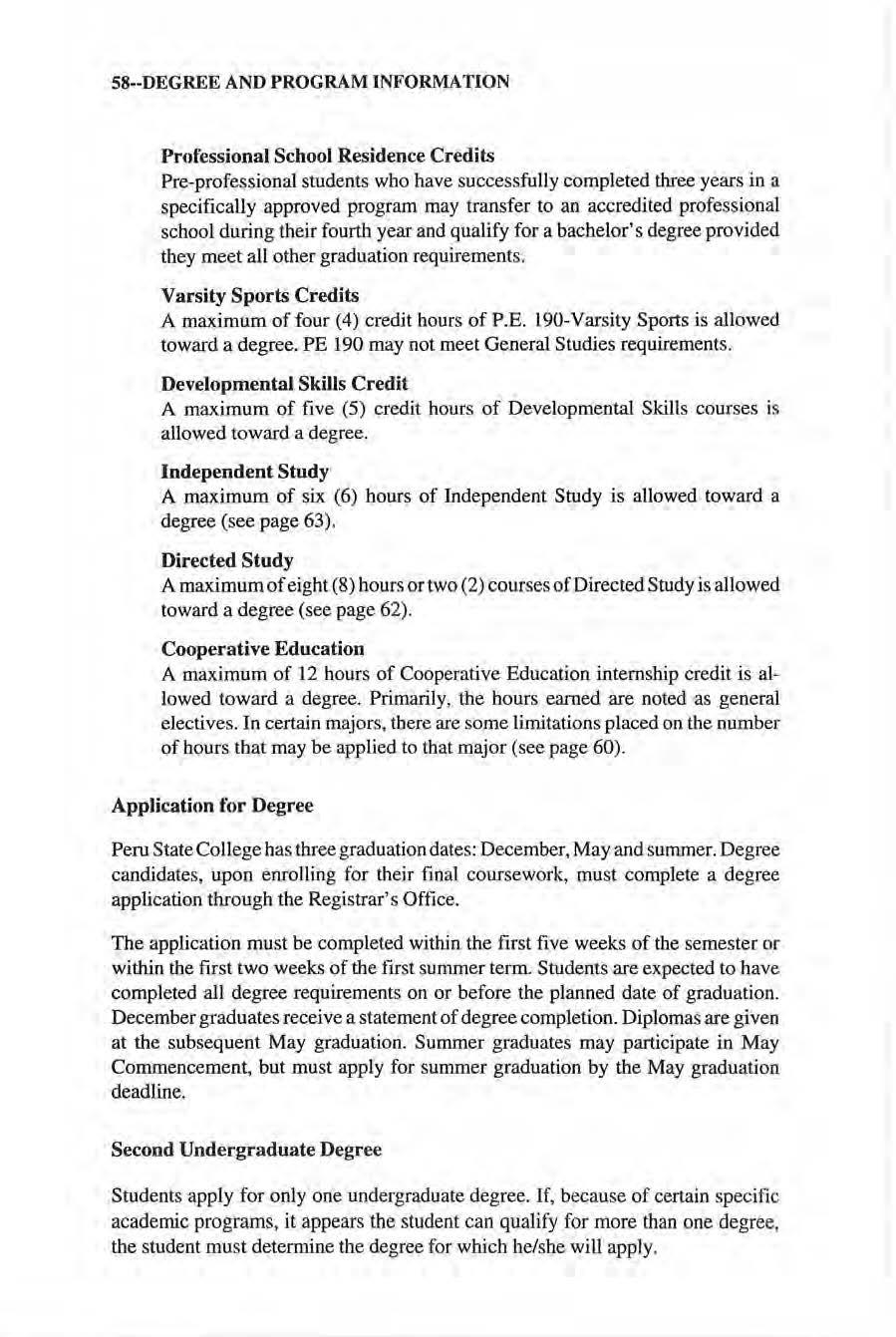
Peru State College has three graduation dates: D ecember, May and s ummer. D egree candidates, upon enroll in g fo r their final coursework, must complete a degree application through the Registrar's Office.
The applicatjon must be completed within the first five weeks of the semester or within the first two weeks of the first summ e r term. Students are expected to have completed all degree requirements on or before the planned date of graduation. December graduates receive a statement of degree completion. Diplomas are given at th e subsequent May graduation. Summer graduates may participate in May Commencement, but must apply for summer graduation by the May graduation deadline.
Second Undergraduate Degree
Students apply for only one undergraduate degree. If, because of certain specific academic programs, it appears the student can qualify for more than one degree, the student must determine the degree for which he/she will apply
58 DEGREE AND PROGRAM INFORMATION
An additional undergraduate degree may be obtained by completing at least 30 semes ter hours of credit beyond the total hours reco rded when qualifying for the previous baccalaureate degree. All prescr ibed requirements for the degree must be successfu lly completed.
Individual s will follow the academic requirements of the college catalog in effect at the time of their readmis sion to pursue the additional degree.
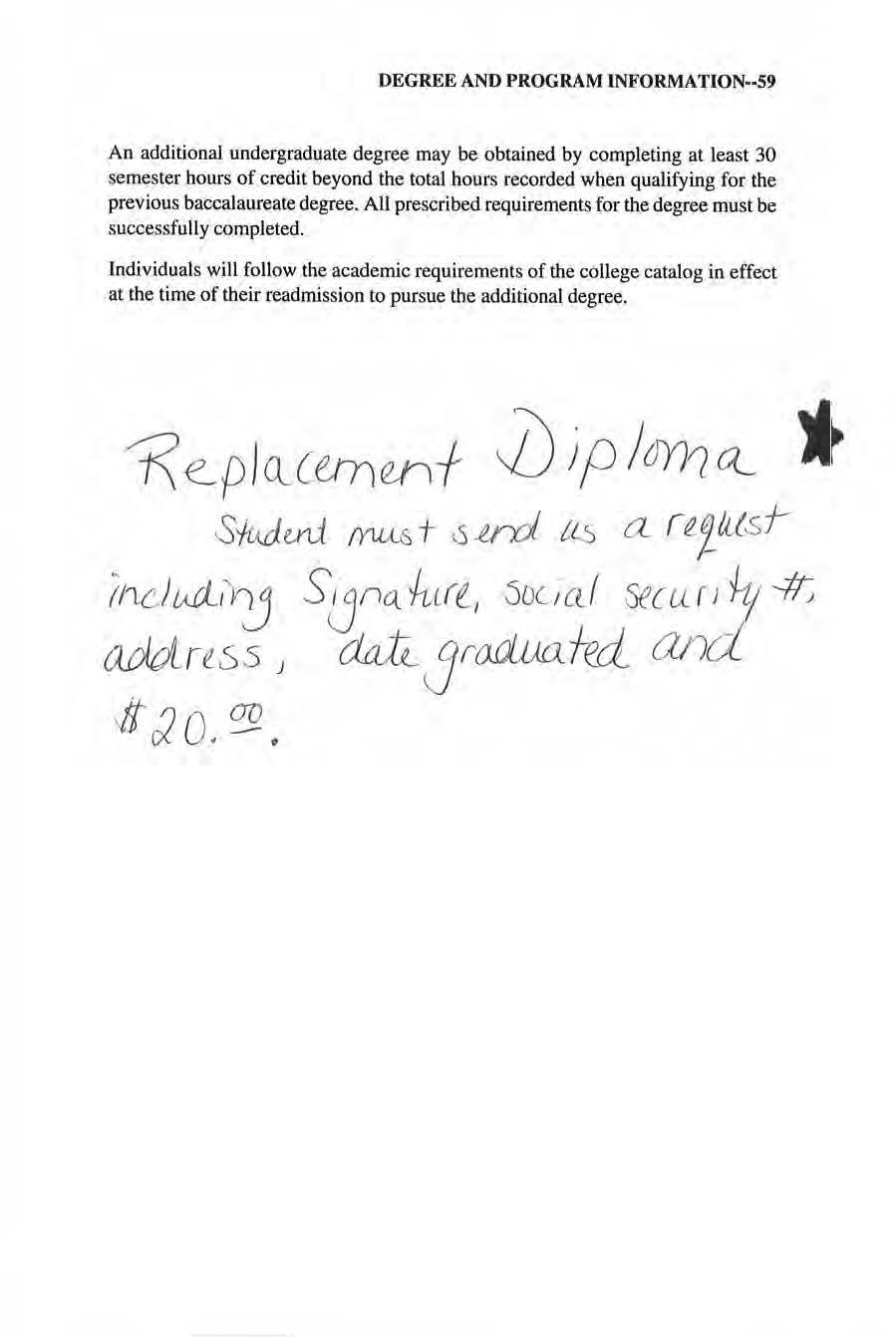
DEGREE AND PROGRAM lNFORMATION--59
e_p /Q(lrr)e,h+ JJ j p /{fy)r/ a__ -Sfude..nl mu& t -SR.rd t~ a r tjllts-J(ti,::Jwi,~ S/jna)ure, :Soc_,a/ secu r, 1tj-tr, aoldress , d£UL (lo.d.i)afed 017(.,l lt J o. <!!}_ •
SPECIAL ACADEMIC PROGRAMS
Agriculture Transf er Program
Peru State and the College o f Agricultural Science and Natural Reso urces at the University of Nebraska-Li ncoln cooperate to offer a transfer program for agriculture students Under the terms of this agreement, students may complete a specified group of courses at Peru State and then transfer to the Univers ity' s Coll ege of Agriculture.
Continuing Education
The Office of Continuing Education offers a variety of programs and services to meet the e ducation al needs of the College's service area.
Peru State/Southeast Community College Program
Peru State and Southeast Community College offer a cooperative degree program on the Beatrice and Milford campuses of Southeast Community Co!Jege. Students may take up to 66 semester credit hours with Southeast Commu nity College before trans ferring into the Peru State program. The Transfer Guide assis ts both students and advisors. Tt lists the course equivalencies at both i nstitutions, the s pecific course requirements for each degree, and the procedures for admission, registration, and payment of tuition and fees.

Peru State/Offutt Air Base
In cooperation with the Offutt Air Base Education Office, Peru State offers accelerated eve ning courses leadjng to the bachelor degree in e lementary education, teacher certification/endorsement in elementary and secondary education, and the B achelor of Technology degree with emphasis in Ma nagement..
Other Continuing Education Sites
I ndividual sites are located throughout the College's serv ice area Courses are offered at these sites in response to community o r group needs. While most are academic credi t courses, continuing professional education courses for relicensure or upgrading, as well as some non -credit courses, are a lso offered. The specific lis ting of courses and their lo cations is printed each Fall, Spring, and Summer. Inquiries about classes throughout the region should be directed to the Office of Continuing Education.
Cooperative Education
The Cooperative Education foternship Program provides s tud e nts with the opportunity to explore the field of work or gain valuable work experience while earning academic credit in all majors. The maximum number of hours allowed for graduation is 12. Employment occu rs in positions which are relevant to a student's major
60--SPECIAL ACADEMfC PROGRAMS
or career interests. The program is available to all students including off-campus and non-traditional students. A flexible registration schedule allows st udents to enroll through the middle of each semester. To help facilitate a mutually benefic ial work experience for the student, each placement is approved by the cooperative education staff, faculty members, and the respective division chai rs. Each internship is monitored by the cooperative education staff.
First-year students who have completed 15 credit hours and are in good academic s tanding are eligible to enroll for exploratory or major-related cooperative education experiences at the Bus 241, GSci 241 , Educ 24 l , or Hum 241 level. Students may take one to four hours at this level on a credit-no credit bas is. Students who have completed 45 credit hours and are in good academic standing are eligible to enroll for major or career related cooperative education experiences at the Bus 441, GSci 441, Educ 441, or Hum 441 level. Students may take from one to twelve hours at this level and will receive an academic letter g rade.
A total of twelve hours maximum rnay be used toward graduation.
AU transfer s tudents must complete 15 hours at PSC before being eligible for the program.
All students must have a permission form signed by a cooperative education staff member and the respective division chair before enrolling.
College400
This one hour course is des igne d to teach job searc h techniques: an educational approach for professiona l development. ft is open to aU majors. See the Office of Cooperative Education and Career Services.
Developmental Stud ies
The Developmental Studies program is designed to assist students in reaching their educational objectives. The program is concentrated in three areas that most often impact student success: English composition, mathematics and reading.
Placement in D evelopme ntal Studies is through the Computer Placement Test (CPT) which is required of all students entering Peru State College with fewer than 30 hours of co llege work and ACT scores lower than 20 in readi ng, 21 io sentence compos ition and 21 in mathematics.
Tbe courses are taught through the u se ofcomputer-assisted instruction and through one-to-one interaction between the student and tbe instructor.
Studen ts must sign up for d evelopm ental courses based on the following criteria:
Reading - Students scoring below 65 on the reading comprehensio n portion of the CPT are required to enro ll in English 070 Reading l.

SPECIAL ACADEM IC PROGRAMS--61
English Comp os ition - Students scoring below 75 on the sentence skill portion of the CPT are required to enroll in English 080 Compositio n.
Math - Studen t s scoring below 60 on either or both the arithmetic and e lementary algebra portions of the CPT are required to enroll in Math 080 Arithmetic.
Peru State College offers developmental reading (English 070 and 071), compositio n (English 080 and 08 I ), mathematics (Math 080 and 081 ). Students failing to pass the post-test of the first course in the sequence are r equir ed to register for the seco nd course. Pas sing of the post-test in En glish is a re.guirement for entry into the General Studies English curriculum. Passing the post-test in mathematics is a requirement for entry into the General Studies mathemati cs curriculum.
Students failing to pass the post-test in the English 08 1 or Math 081 will be counseled by the Vice President for Academic Affairs concerning their chances for academic success Upon lhe recommendation of the Vice President, the student may contjnue through independent study to pass the post-test. After the third opportunity, Peru State College will no longer be able to provide assi stance in the developmental studies area.
Directed S tudy
A Directed Study (S ubject 297 or 497) may be taken as acou rse subs ti tution when a student has been unable to meet a course requirement in the normal manner and can demonstrate a need to take the course vi a Directed Study to graduate In a birected Study, the student m ust meet the Same requirements as in the course being s ubstituted for. Direc ted Study is available in nearly every subject area and i s numbe red either 297 o r 497. To be e li.gible to take a Directed Study, a student should have completed a minimum of 90 semester hours (senior stanwng) and be within two semeste rs of graduatin g.
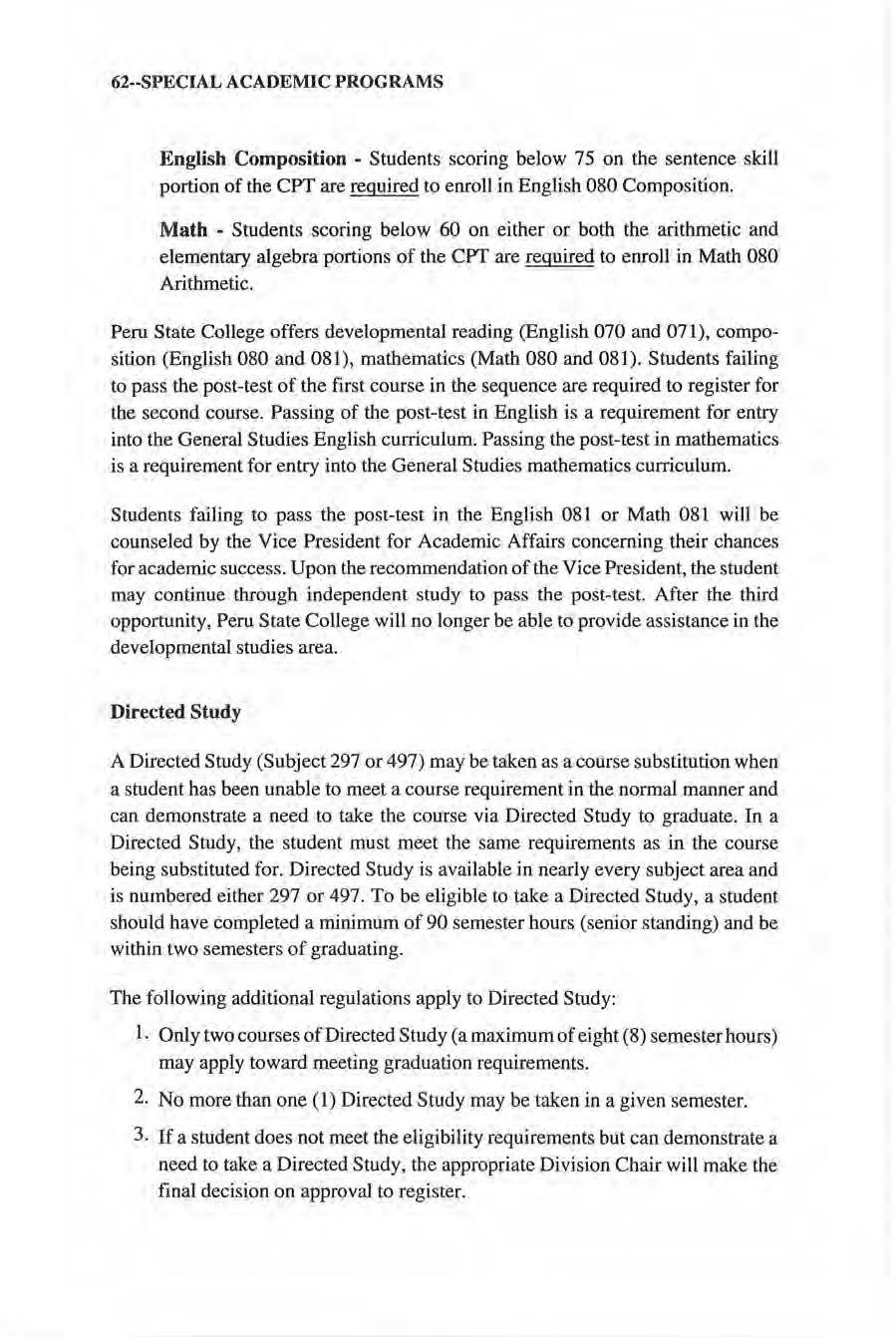
T he following addjtional regulations apply to Directed Study:
1. Only two courses of Directed Study (a maximum of eight (8) semester hours) may apply toward meeting graduation requirements.
2. No more than one (l) Directed Study may be taken in a given semester.
3. If a student does not meet the eligi bi lity requirements but can demonstrate a need to take a Directed Study, the appropriate Division Chair will make the final decision on approval to register.
62- -SPEC IAL ACADEMIC PROGRAMS
4 . The student must meet with the instructor at least once each week.
5. A Directed Study fo rm must be completed and submitted to the Div ision Chair, the Registrar, and V ice Pres ident for Academic Affairs by the e nd of the second week of t he semester
Exte nsion (see Continuing E du cation)
G raduate Studies
Peru State College offers a Master of Science in Education degree program for teachers in elemen tary and secondary classrooms. It is a program designed i n response to the assessed needs of teachers. The program features emph asis on the improve ment of classroom teaching, t he use of techno logy in teaching, and the s t rengthening of the foundatio n.s of educational practice . Further informatio n may be sec\.lred by contacting the Div ision of Education, Psych ol ogy and P b.ysical Educatio n.
Indepe nd ent Study
An Independe nt Study is a carefully organized learning activity with specific obj ectives and methods of evaluation developed in consultation w ith a fac ul ty member. Courses are numbered 499 . To be e li gible to take an Independe nt Study, a student m ust have completed 60 semester hours Gunior standing) and be capable of doi ng independent research, work and study. The following additional reg ula~ tions app ly to Independent Study courses:
I. No more th an six (6) semester hours of Independent Study may be counted toward meeting graduation requirements.
2. No more than one Independent Study (a maximum of three hours) may be taken in a g i ven semester.
3. The student must communicate with the ins tructor at least once each week.
4. A n Independent Study Form must be completed and submitted to th e Division Chair, the Registrar, and the Vice President for Academic Affairs by the end of the second week of the se mester.
5. A copy of the Independent Study final project should be submitted to the Division Chair as weU as the instructor for Departmental archives
Internship (see Cooperative Education)
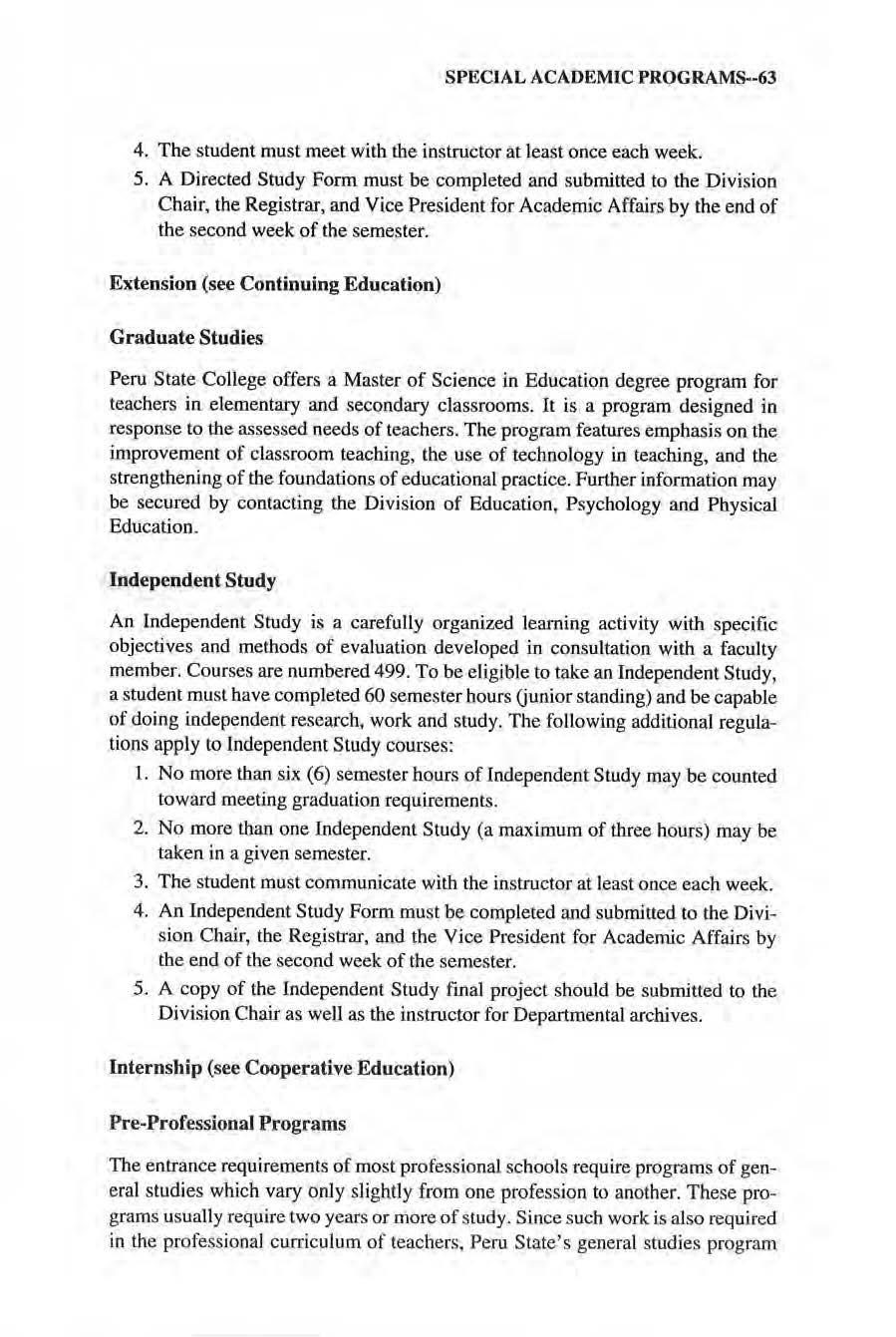
Pre-Professional Programs
The entrance requ irements of most professional schools require progra ms of general studies which vary only slightly from one profes sion to another. These programs u s ually require two years or more of s tudy. Since such work is also required in the professional cuniculum of teachers. Peru State's general studies program
SPECIAL ACADEMIC PROG R:AMS..-63
ACADEM IC PROGRAMS
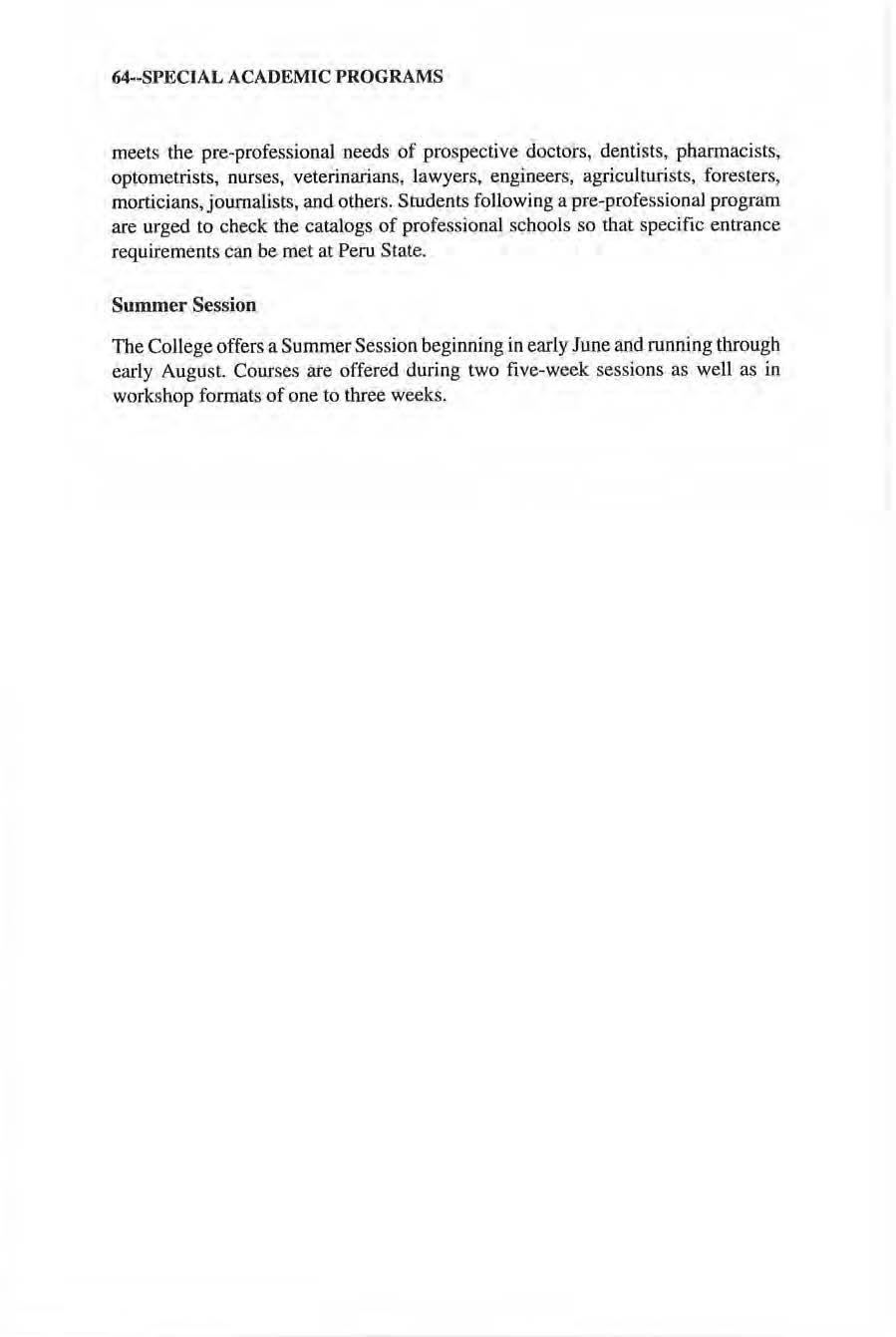
meets the pre-professional needs of prospective doctors, dentists, pharmacists, optometrists, nurses, veterinarians, lawyers, engineers, agriculturists, fo resters , morticians,journalists, and others. Students following a pre-professional program are urged to check the catalogs of professional schools so that specific entrance requirements can be met at Peru State
Summer Session
The College offers a Summer Session beginn ing in early June and running through early August. Courses ate offered during two five- week sessions as well as in works hop formats of one to three weeks.
64--SPECJAL
ACADEMIC POLICIES, REGULATIONS, & PROCEDURES
Academic Appeal
Any request for waiver or exception to the policies and regulations s tated in the catalog is submitted as a written petition to the Office of the Vice President of Academic Affairs. Consideration is given to the petition by the Faculty Senate, and a written response is sent to the petitioning student. Petitions s hould clearly and specifically state the grounds for the request.
Academic Bankruptcy
A student may remove up to two complete semesters of work from his/her cum ulative grade point average and degree considerations by petitioning for approval to the Office of Vice President for Academic Affairs. To qualify, a student must have completed either 15 consecutive Peru State College se mester hours o f credit with a minimum 3.0 term grade point average or 30 consecutive hours with a minimum 2.5 term grade point average at Peru State College following the semester(s) the student wi s hes to remove.
To declare a semester bankrupt, all courses taken during that se mester are voided (both credit hours and grades). The bankrupt semester is removed from consideration for cumulative grade point average purposes and the bankrnpt credit is not used for degree require ments. The semesterli stingof courses and grades. however, remains on the academ_ic transcript.
Academic Credit. (See How to Determine Credit.)
AP Credit. (See Standardized Examinations .)
Armed Services. Veterans of the armed forces who are honorably discharged and current active duty personnel will generaliy be g,ranted credrt for the ir military experience in accordance wilh the recommendation s of the American Council on Education. Air Force records should be obtained from the Community College of the Air Force. Army records should be obtained from the Army/American Council on Education Regi s try Transcript System (AARTS).
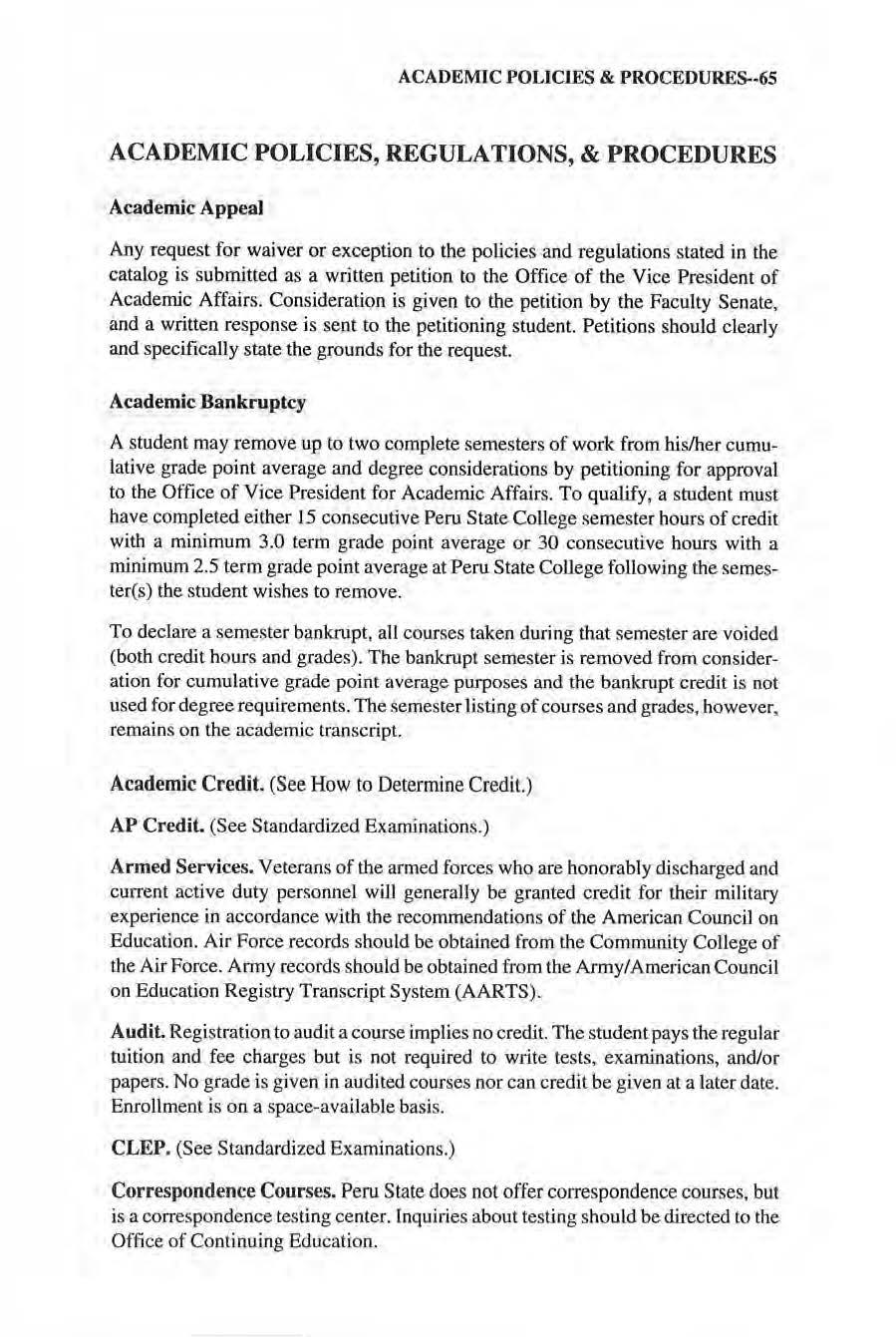
Audit. Regi s tration to audit a course implies no credit. The student pays the regular tuition and fee charges but is not required to write tests, examinations, and/or papers. No grade is given in audited courses nor can credit be given at a later date. Enrollment is on a s pace-available basis.
CLEP. (See Standardized Exam inations. )
Correspondence Courses. "Peru State does not offer correspondence courses, but is a correspondence testing center. Inquiries about testi ng should be directed to the Office of Cootinlling Education.
ACADEMIC POLICIES & PROCEDURES-.65
Course Cha llenge. (See Institutional Exams.)
DANTES. (See Standardized Examinations.)
Early Entry_ In high schools where Peru State.h as a formal early entry agreement. the principal decides which students are qualified to take college courses. Other restrictio ns also apply; contact the Office of Continuing Education for details.
Any high school s tudent approved to regi ster for a coll ege credit course will have the appropriate information entered on a college transcript.
Extra-institutional. Students may earn college credit for experiences and accomplishments attained outside of the normal college setting. Credit may be g ranted through standardized examination programs or the cred it recommendation s of the Guide to the Evaluation of Educational Experiences in the Armed Ser vices and The Nationa l Gu ide to Educational Credit for Training Programs .

The College's genera l policy for awarding credit for extra-in stitutio nal learning is:
1. Only individuals who have not participated in similar scheduled coursework are e ligible to rece ive extra-institutional c redit.
2. Extra-institutional credits are considered transfer credits and are subj ect to the same policies as other transfer credits.
3. A maximum of 66 se mester c redit hours earned through extra-institutional valjdation may be applied to the 125 semeste r hour minimum required for a bac helor's degree, unless otherwise specified.
4. Creclit examinations may be earned only once in a single subject. A similar subject test in another testing program wi II not earn additional credits. High School. (See Early Entry.)
How to Determine Credit. P eru State credi t is exp ressed as semester credit hours . One credit hour is awarded to a s tudent who satisfactorily completes (I) a course that meets one hour per w eek for a semester, or (2) a laboratory that m eet s for two hours per week for a se meste r, or ( 3) a laboratory that meets for three hours per week for a semester, or any combination of these depending upon the type of instruct ion and material covered in the course, Credit for internships, st udent teaching, and other instrnctional formats is determined us ing other appropriate standards.
Incomplete Coursework . To designate a student's work in a course as incomplete at the end of a term, instructors record the in comp lete grade (I). Students may receive this grade only when serious illness, hardship, death in the immediate fami l y, or military service during the semester in which they are registered prevents them from completing course requirements. In addition, to receive an incomplet e, a student must have completed a majority of the course's major requirements.
66--ACADEMIC
POLICIES & PROCEDURES
Unless extenuating circumstan ces dictate otherwise, student<; must initiate requests for an incomplete by filling out an Incomplete Grade Completion Contract, which requires the student and faculty signature.

The I ncomplete Grade Completion Cont ract cites the reason(s) for the incomplete and details the specific obl igations the student must meet to change the incomplete to a letter grade. If students agree to comp lete req uj red work prior to the normal deadline for making up an incomplete - the end of the subseque nt semesterthis date must appear in the contract. The division chair, the instructor, and the s tudent receive signed copies of the Incomplete Grade Completion Contract.
Even if the student does not attend Peru State Co llege, all incomplete course work must be finished by the end of the subsequent semester. Unless Facu l ty Se nate approves an extensi on, if the student does not fulfill contract obligations i n the allotted time, the incomplete grade automatically becomes an P.
Students who have filed an application for graduation are not eligible for a grade of Incomp lete.
Institutional Exami nations. Studerits, due to exper ience and/or personal improve~ ment, may qualify for credit in lower division cour ses through the procedu re of an interview and a written examination provided the examination is made avai lable by the respect i ve academic d i visions TI1e stu dent must, through an interview, satisfy a faculty committee that he/she has had a •fom1al or i nformal experience in which the course content may have been met before the student will be given a written comprehensive examination.
The amount of credit to be allowed, the course for which substitution, if any, is made, and the particular graduation requirements wrucb may be satisfied, will be determined by the chair of the djvision and will be snbjectto all general graduation requirements. The student must register for the course and pay the tu it ion charges before writing the examinations. The letter grade received is recorded on the student's transcript. This process is also known as "Course Challenge."
PEP. (See Standardized Exam inations.)
Repeat Courses. Students may and are urged to repeat courses in which they have performed poorly. The initial course t itle aod grade are not removed from the student's permanen t record. The higher grade is used to determine the new grade point average. There may also be occasions when students repeat a course for review o n an auilit basis without a c h ange of grade.
It is the student's respo nsibility to report all repeated courses when registering for cou rses. Tuition an d fees are paid for repeated courses, but additional credit hours are not earned.
Standardized Examination. Students may earn credit through several standardized examination programs. Credi ts earned from the CLEP subject exam on ly
ACAOEM(C POLICIES & PROCEDURES--67
(College Level Examination Program) , DANTES (Defense Activity Nontraditional Education Support), PEP (Proficiency Examination Program), and APP (Advanced Placement Program) can satisfy certain Peru State degree req uirements. Students should contact the Offi ce of Cooperative Education and Career Services for specific information abo ut the College's regulations and procedures for the standardized CLEP examinations. The 66 hour maximum for extra in stitutional credit includes standardized examinations.
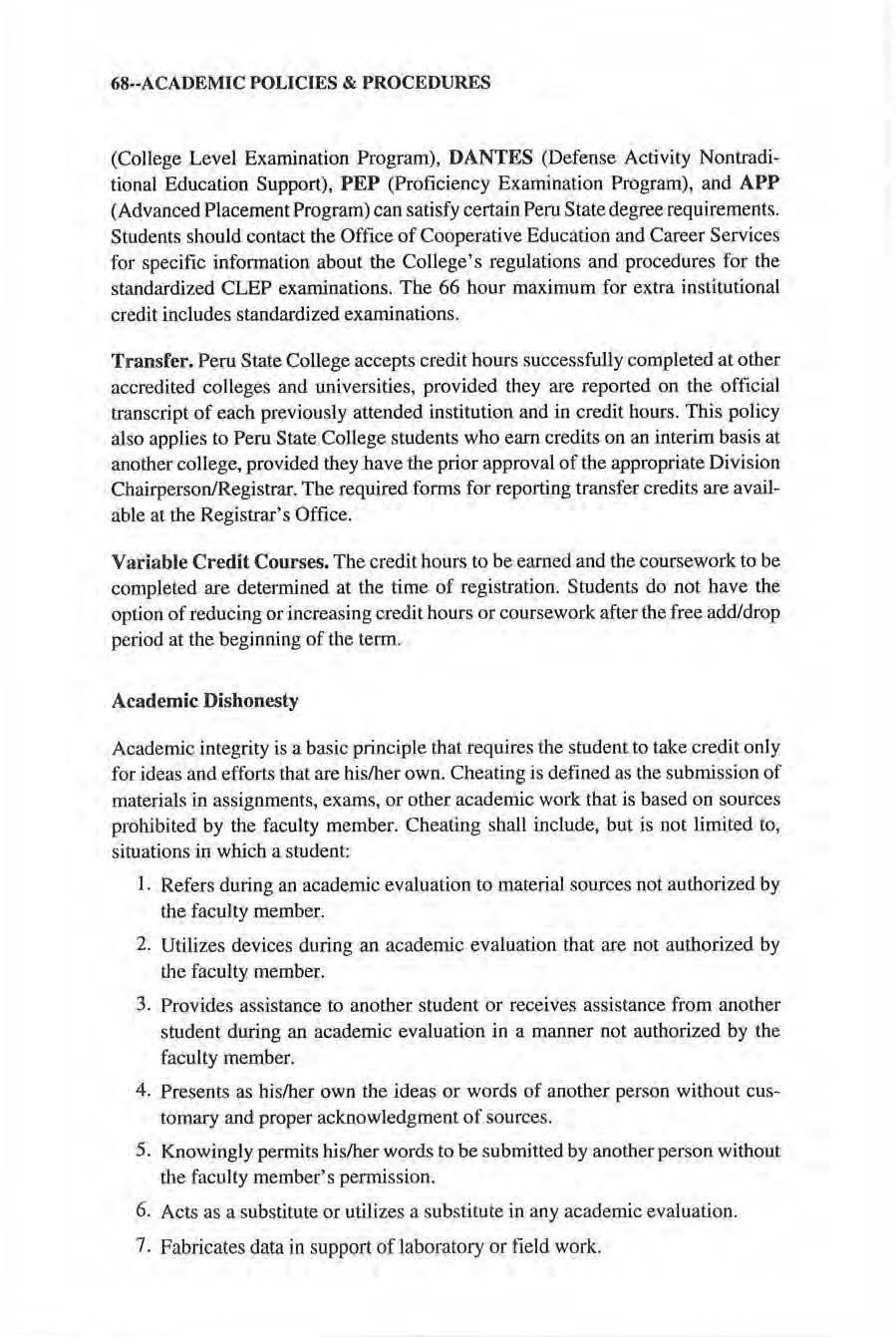
Transfer. Peru State College accepts credit hours successfuJly completed at other accredited colleges and universities, provided they are reported on the official transcript of each previously attended institution and in credit hours. This policy also applies to Peru State College students who earn credits on an interim basis at another college, provided they have the prior approval of the appropriate Division Chairperson/Registrar. Tbe required forms for reporting transfer credits are available at the Registrar's Office.
Variable Credit Courses, The c redit hours to be earned and th e coursework to be completed are determined at the time of registration. Students do not have the option of reducing or increasing credi t hours or coursework after the free add/drop period at the beginning of the term
Academic Dishonesty
Academic integrity is a basic principle that requires the student to take cred it only for ideas and effo rts that are b.is/her own. Cheating is defined as the s ubmi ss io n of materials in assignments, exams, or other academic work that is based on sources pmbibited by the faculty member. Cheating s hall include, but is not limited to, situations in which a student:
I . Refers during an academic evaluation to material sources not au thori zed by the faculty member.
2. Utilizes devices during an academic evaluation that are not authorized by the faculty member.
3. Provides assistance to another student o r receives assistance from another student during an academic evaluation in a manner not authorized by th e faculty member.
4. Presents as his/her own the ideas or words of another person without customary and proper acknowledgment of sources.
5. Knowingly permits hi s/her words to be submhted by another person without the faculty member's permission.
6 Acts as a substitute or utilizes a substitute in any academic eval u ation.
7. Fabricates data in suppo rt of laboratory or field work.
68--ACADEMIC
POLICIES & PROCEDURES
8. Possesses, buys, sells, obtains, or uses a copy of any materials intended to be used as a n instrument of academic evaluation in advance of its administration.
9. Alters grade records of hi s/her ow n o r another student work in a course o r a component of a course.
I n addition to any adverse academic action tbat may result from engaging in academically disho nest behavior, the College specificall y reserves the right to address a nd sa nction the cond uct invol ved through the disciplinary procedures outlined in this catalog. Academic actions are reviewable under the Academic. Appeals Policy contained in this cata log .

Academic Probation & Suspension
Students· with a cumulative grade point average of l.00-1.99 at th e close ·of a semester, regardless of the number of attempted hours, are placed on academic probation. Probationary students must agree to th e provisions of an Academic Probation Contract that may include the following: limited enro ll ment (9-12 hours); advisor meetings; and one or more mandatory courses. Probationary stu~ dents must obtai n a minimum 2.0 average for each successive semester of attenda nce (continued probation) until the required cumulative grade poi nt average of 2.0 or higher has been achieved Failure to meet the above cond ition will result i n academic suspension (see below). Academic s uspension is generally for two semesters.
"21-Hour Rule.' ' Studen ts who have attempted 21 cred it hours or less (including transfer record) and h ave a cu mul at ive grade point average below 1.00 at the close of a semester are placed on academic probation and may continue attendance under t he above requirements provided the following additional requirements have been satisfied. The stude nt must petition the Vice P resident for Academ ic Affa irs on o r before the day of general registratio n, and must address the following po in ts: 1) reasons why the College s hould allow the student to conti.nue; 2) the student's explanation for his/her prior poor performance; 3) the s tudent' s personal plan for improvement. The student must agree to the provisions of an Academic P robatio n Contract that may include the follow ing : limited enrollment (9- 12 hours); advi sor meetings; and one or m ore m an datory courses. (See chart below)
Suspension
Students who have attempted 22 semester hours or more, including transfer record, and have a c umulati ve grade point average be low 1.00 at the end of a semester are sus pended. Academic suspension is generally for two semesters. A second academic suspension is general l y a final suspension. Suspended students may not take Peru State Co llege courses during the period of suspension. (See chart below.)
ACADEMIC POLICIES & PROCEDURES--69
Academic Standards Chart

Cunent or Admitted Status after Subsequent Semester Statu s Cumu lative G.P.A. (includes subsequent semester)
*Unless the student has attempted 21 hours or less (including transfer hours), in which case the status is probation, See ' ' 2 l Hour Rule,•' above.
*"'Unless semester G.P.A. is 2.00 or higher, in which case the status is continued probation.
Admi nistrative Withdrawal/Drop
Students who do not meet the prerequisites of a course as stated in the current catalog and who have not received instructor permission to enroll may be administratively dropped from the course. Students who are so identified after registering for a course will be notified within the add/drop period 'by the Division Chair that they do not meet the prerequ isites and should institute the procedures for dropping the course. Students who do not drop will be notified by the Division Chair that they are being withdrawn. The Division Chair will notify the Registrar to have the student dropped. Such notification will be approved by the Vice President fo r Academic Affairs.
Assessment
All Peru State studen ts participate in outcomes assessment activities that determine whether specific learn ing goals have been achieved.
To assess whether students have met general education goals, the college compiles portfolios compri sed of pi eces of significant work from each General Studies course taken during t he student's freshman and sophomore years. During the second semester of the sophomore year, a faculty team evaluates the portfolio and meets with the student to discuss the student's progress toward general education goals and , if necessary, the need for remediation. Students with 45 or more hours must complete their portfolio evaluation meeting before p reregistering for the next semester's coursework.
70--A CADEMrc POLlCIES & PROCEDURES
fil.l:!1m 11111. G.P.A. 2.00 or hig her 1,00-1,99 !l,22 or l ess Good Standing 2.00 or higher Good Standing Probation Suspension* Probation 1.99 or less Good Standing Suspension** Suspension
To assess whe the r senior stude nt s have mastered the content, methodology, and liberal arts base of their discipline, each g raduatin g senior must successfully complete the discipline's senior competency. Senior competencies for each maj or are noted in the major's section of the catalog and below :
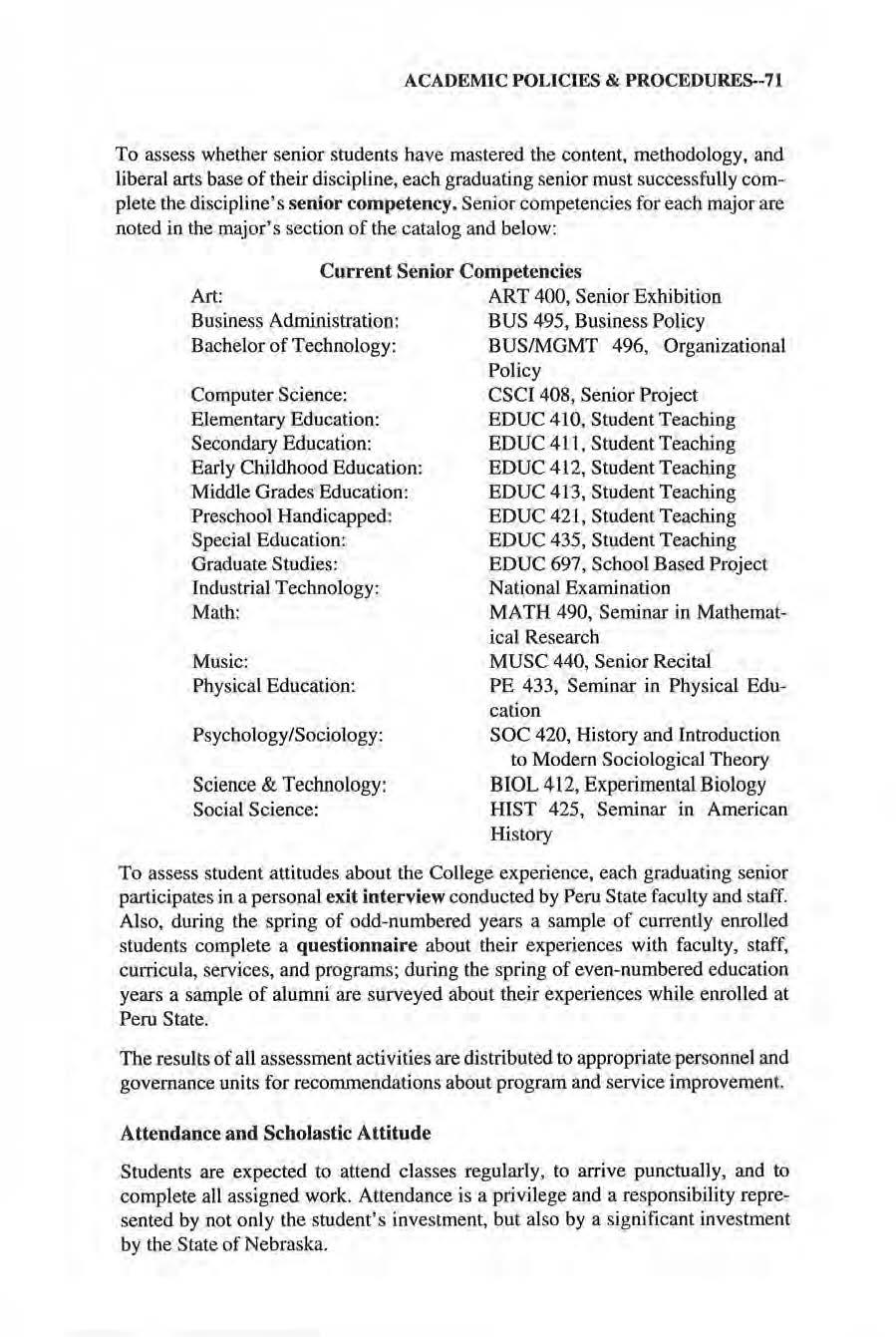
Current Senior Competencies
Art:
Business Administt:atioo :
Bachelor of T echnol ogy:
Computer Science:
Elementary Education:
Secondary Education:
Early Childhood Education:
Middle Grades Education :
Preschool Handicapped:
Specia l Education:
Graduate Studies:
Indu strial Technology:
Math;
Music:
Physical Education:
Psychology/Sociology:
Science & Technology:
Social Science:
ART 400, Senior Exhjbition
BUS 495, Business Policy
BUS/MGMT 496 , Organizational Policy
CSCI 408 , Senior Project
EDUC 410. Student Teaching
EDUC 411. Student Teaching
EDUC 412, Student Teaching
EDUC 413, Student Teaching
EDUC 421 , Student Teaching
EDUC 435, Student Teaching
EDlJC 697, School Based Project
National Examination
MATH 490, Seminar in Mathematical Research
MUSC 440, Senior Recital
PE 433, Seminar in Physical Education
SOC 420, Hi story and Introduction to Modem Sociological Theory
BIOL 412, Experimental Biology
HIST 425, Seminar in American Hi story
To assess student attitudes about the College experience, each graduating senior participates in a personal exit interview conducted by Peru State faculty and staff. Also, during the spring of odd-numbered years a sample of currently enrolled students compl ete a questionnaire about their experiences with faculty , staff, curricul a, services, and programs; during the spring of even-numbered education years a sample of alumni are surveyed about their experiences whil e enrolled a t Peru State.
The results of all assessment activities are di stributed to appropriate personnel and governance units for recommendations about program and service improvemen t.
Attendance and Scholastic Attitude
Students are expected to attend classes regularly , to arrive punctually, and to complete all assigned work. Attendance is a privilege and a res ponsibifay represented by not only the student's investment, but also by a significant investment by the State of Nebraska.
ACADEMIC POLlClES & PROCEOURES--71
When it is necessary for students to miss class, they have the responsibility to notify their instructor in advance whenever possible. Faculty members have the prerogative of allowing students to mak e up and complete work missed during the absence.
lnstructors have the right to base a portion of a student's grade on attendance. They must present their grading practices and attendance policies in writing to both studen ts and their division chair during the first week of the semester.
Whenever absences or oth er elements of scholastic attitude become detrimental (regardless of cause) to the student's standing in class and/or the success of the class as a whole, the instructor may confer with the student. The instructor and the student may mutually agree that the registration in the co urse sho uld be withdrawn, or the instructor may issue the student a • 'scholastic alert.' ' Future conferences for the same or related reasons may result in the instructor withdrawing the student from the class. lf the student requeSts, the Vice Presiden t for Academic Affairs may be asked to participate in the decision. The grade will be a W if the course withdrawal is prior to the last date to withdraw with a W. An F will be recorded after this date.
Change of Advisor
Students who want to change advisors may obtain a Cha nge of Advisor form from their di vision office or the Registrar's Office. Change of advisor is not official and complete until the previous advisor, the new advisor's chair, and the new advisor's signatures are obtained. The previous division' s office is responsible for transfer of student files to the new advisor
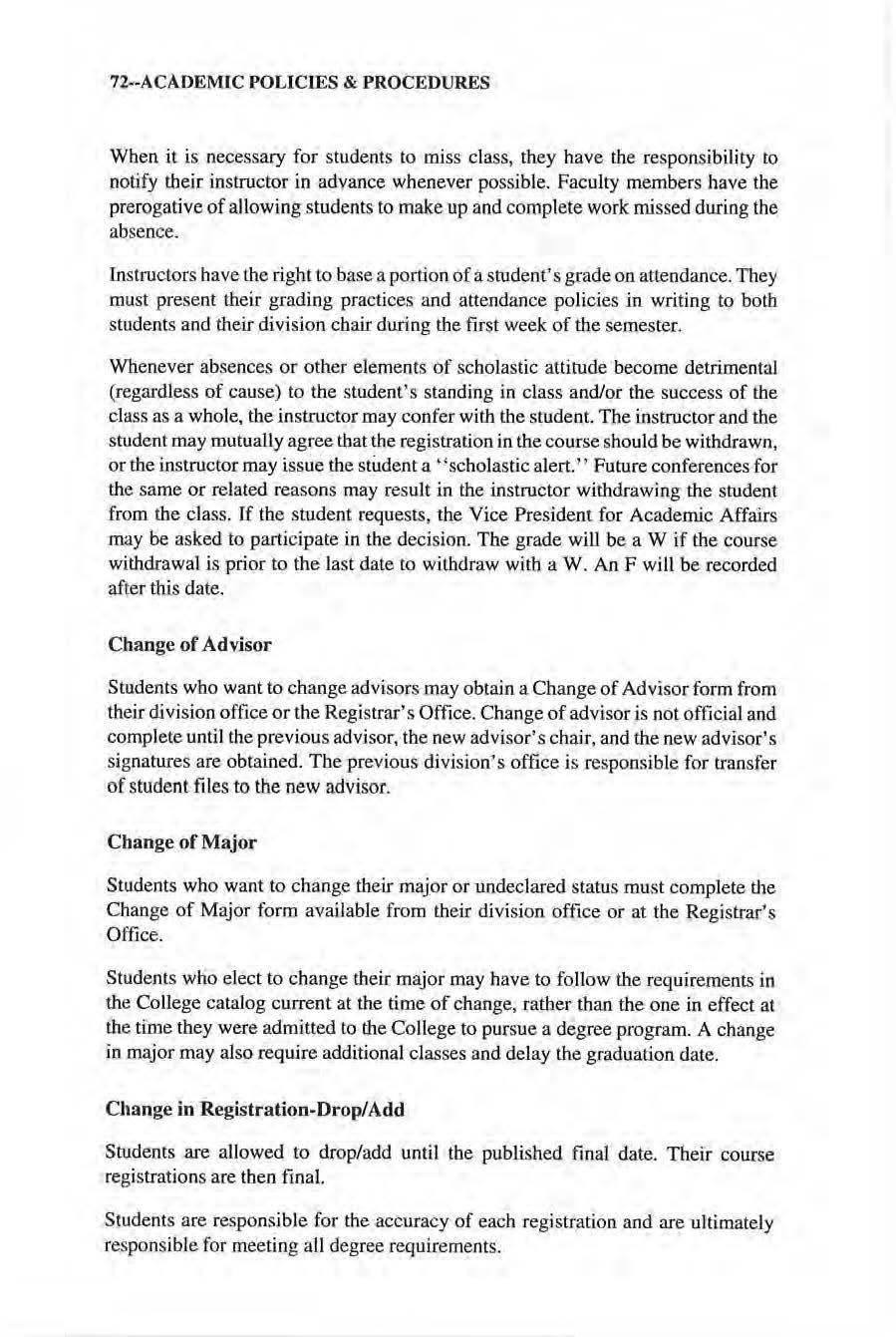
Change of Major
Students who want to change their major or undeclared status must complete the Change of Major form available from their division office or at the Registrar's Offi ce.
Students who elect to change their major may have to follow the requirements in the College catalog current at the time of change, rather than the one in effect at the time they were admitted to the College to pursue a degree program. A change in major may also require additional classes and delay the graduation date.
01ange in Registration-Drop/Add
Students are allowed to drop/add until the published final date. Their cou rse registratio ns are then final.
Students are responsible for the accuracy of each registration and are ultimately respons ibl e for meeting all degree requirements.
72--ACADEM.IC POLICIES & PROCEDURES
A change in registration is p(ocessed at the Registrar's Office. No full semester courses may be added after the published final date to add courses When applicable, tuition charges will be adjusted for changes initiated during the official add/ drop period only.
Classification of Students

Students are classified according to the number of semester credit hours earned: Freshman Sophomore Junior Senior
0 to 29 credits 30 to 59 c redi ts 60 to 89 credits 90 and over
Post-graduate students baved earned a bachelor's degree or higher and are earning additional undergraduate credit.
Non-degree students are qualified persons who enrolled primarily to sati sfy an occupational need or personal interest.
Dead Week
Dead Week is the week prior to finals week and no exams a re to be given during that week. Exceptions to this policy may be granted only by the Vice President for Academic Affairs.
Final Exams
Final exams are scheduled the last week of the semester. Coaches of varsity athletic teams are not to schedule regular games or events during this week. However, they may enter their teams -in NAIA approved play-offs in which the College has declared an intention to participate if qualified. Students who participate in playoff events during finals week are still subject to the attendance policies of their instructors.
Full-Time Student Status
Peru State students who are enrolled for l 2 credit hours or more during a semester are cons idered full-time students. However, the normal course load for a student who expects to complete a bachelo r's degree within eight (8) semesters (4 years) is 15-16 hours. Th e maximum load without special permission is 17 hours; more than 17 hours requ ires the approval. of the chair of the div ision in which the student is majoring. The Vice President for Academic Affairs may approve 18-21 credit
ACADEMIC POLICIES & PROCEDURES--73
POLICIES & PROCEDURES
hours provided the student obtained a minimum 3 .5 grade point average the previous semester. The max.imum credit hour load is 2 1. Students m ust petition Faculty Senate for loads above 21 hours. Class withdrawal s subsequent to the add/drop period are included in the credit hour load.
Veterans and other eligible persons attendi ng Peru State under the benefi ts of Chapter 34 and 35, Title 38, U.S.C., as full-time students must be enrolled for at least 12 semester hours, o r the equivalent.
Courses at Offutt Air Base and Southeast Community College are scheduled on an e ight-week cycle.
For each eight-week session when students are not registered for student teaching, they may register for a maximum of 12 semester credit hours with Peru State. The 12 hours include any independent or directed study courses.
Grading System
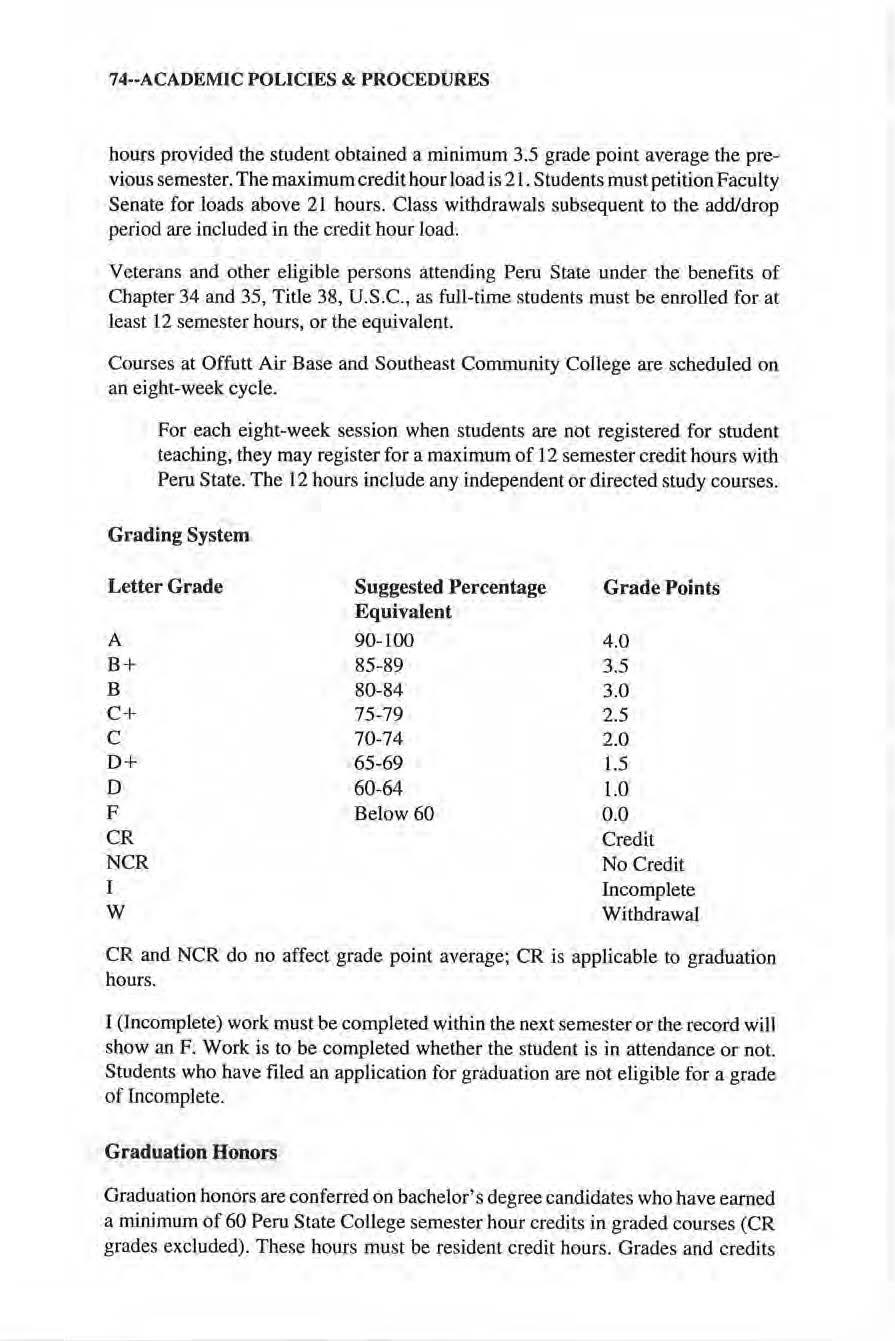
CR and NCR do no affect grade point average; CR is applicab le to graduation hours.
I (Incomplete) work must be completed within the next semester or the record wiJl show an F. Work is to be completed whether the student is in attendance or not. Students who have filed an application for graduation are not eligible for a grade of Incomplete.
Graduation Honors
Graduation honors are conferred on bachelor's degree candidates who have earned a minimum of 60 Peru State College semester hour credits in graded courses (CR grades excluded). These hours mu s t be resi dent credit hours. Grades and credits
74--ACADEMIC
Letter G rade Suggested Percentage Grade Points E quivalent A 90-100 4.0 B+ 85-89 3.5 B 80~84 3.0 c+ 75-79 2.5 C 70 -74 2 0 D+ 65-69 LS D 60-64 1.0 F Below 60 0.0 CR Credit NCR No Credit I Incomplete w Withdrawal
earned at other colleg es and universities do not apply toward graduation honors from Peru State.
With Hi ghest Distinction With High Distinction With Di stinction
Honors
At the end of each semester the Vice President for Academic Affairs publishes fue Academic Honors List. Students on the Academic Hon ors List must have a grade point average of 3.75 or higher for the semester, have completed at least 12 hours (credit/no credit not included), have no incomplete grades for the semester, and have no ''holds" on their academic record.
Outcomes Assessment (See Assessment.)
Overload (See Full-Time Student Status.)
Petition (See Academic Appeals.)
Probation (See Academic Probation.)
Selecting a Major
Students who apply for admission to the College will indicate on the Application for Admission the major area of study they intend to pursue. Individuals who are unsure of a major s hould indicate ''Undeclared' ' on the application form.
Suspension (See Academic Suspension.)
Transcripts
A fee is charged for each transcript (including the first). Transcripts are not issued to students who have financial obligations to the College or holds on the ir academic records. Tran scrip t requests are made in writing to the Registrar.
Once a student graduates or discontinues attendance at Peru State, subsequent college credits do not become a part of his/her Peru State transcript. Thi s does not app ly to an active student's credential file in the College's Cooperative Education and Career Services Office.
Waiver (See Academic Appeal.)

ACADEMIC POLICIES & PROCEDUR..ES--75
3.90- 4.00 3.75 - 3.89 3.50 - 3.74
List
POLICIES & PROCEDURES
Withdrawal from C lass
Studen ts who wish to withdraw from a class must notify their advisor, the course instru c tor, and officially withdraw through the Registrar's Office. Athletes must notify their head coach of their intent to withdraw. Students withdrawing after the last day to add classes, the end of the first week of class, receive a W. After one week past the term mid-point date, students who initiate a withdrawal receive an F for the class.
Withdrawal from the College
Students who wis h to withdraw from the College must initiate their withdrawal with the Vice President for Student Affairs and complete al l the appropriate paperwork. Proportional tu ition refunds are made in accordance with the refund schedul e (see the Expenses and Financial Aid section) to s tudents who officially withdraw from tbe College.
Prior to one week past the mid-point of the term withdrawal course g rades will be W After o ne week past the mid-point of the term, the Vice President for Student Affa irs will determine if unusual or extenuating circumstances surround a w ith • drawal request and recommend either W ithdrawal (W) or FaiJing (F) grades for all coursework. Poor academic performance is not sufficient reason to recei ve all W ' s.

76--ACADEMIC
GENERAL STUDIES
The purpose of the General Studies Progra m at Peru State is to prepare the student fo r advanced college work as well as for life-long learning. The General S tudies .Program consists of spec ific courses that are designed to assist the stude nt m acquiring tbe inte llectual fo undati on that will last for a lifetime of learning.
The objectives of the General Stud ies Program are establis hed in the Role and Mi ss ion statement. This statement requires that Peru graduates ·' 1) can write, s peak, and compute effec tively, 2) are compu ter literate, 3) can think criti cally and independently, 4) are open to and have the capacity for change, 5) are prepare d to assu me the ir social and civic roles as leaders in an increasingly interdependent world, and 6) are equipped to pursue lives that are intellectually, ethically, aesthetically, and phy sically rewarding. " Below is the curriculum designed to meet the above objectives.
General Studies Courses
rank al tile 85111 percemil, ur higher 011

GENERAL STUDLES--77
Courses Hwiic Skills 17-22 buurs Mulbemulics (Students must comple te ucmu.,e i11 bml, A and B) ...•••.• • 5-7 hours Total A General Ma1hemalics - Choose one course at !he 100 level except Malh 107 ond Mnlh 126. (S rndents whQ ra11k at the 85th percemile or higher ,m the 111uthemt1tics sectiun of tile ACT nr SAT Jest may waive 1he gene ral mathematics re quireme nt.) B Slatistics - C hoose One Math 240 E le me nts o f S1atistic< •. • •. .•..•...• , •. , 2 or Molh 340 S1atislics • , , • • , • .• , • • • , .••• 3 Computer Science , , • 3-6 hours TolJII CSci I00 In tro to Computer Applications ••. • , , • • , • 3 o r CSci 102 Intro Iii Computer Concepls , •. , •.• , , • •• 3 and Bus 229 Software Applications , •.....• •• • • •• , ••. , 3 Composition • • , •.....•• •. , , ..• 6 hours TolJII E ng 10 1 E11gl ish Composi tion 3 E ng 20 I Advanced English Com))Ositio n • , •....3 (Slltde11ts
,lw Eng/is/, sec1iot1 of (he ACT or SAT tesrs may wnive 1/te first cm,rs~ qft/,e compositio11 skills requirement Eng I OI.) Spe\lch , , , , , , , • •. •• •. •. .• • 3 hours Total Speh 152 Fundamenlals of Speech • ....• , , • 3 Perspecti•es Area: •. 28-30 hours Science (One class must have a lab component and studcms 11111s1comple te a co11 rse in both A and 8) ..•... • _ •• _ , • , •• , , •... 6-8 hours Total A. Physil'81 St.ie.rucc ......... . ........ , ... . . . ..... .. . . ... .. .•.••.. .. ...... 3 hours C he m 101 Genera l Chemistry • , •.... • .4* GSci 206 Principles of Phys ica l Science • .••. • • g OSci 232 Energy , ..• • , , • • • • , •. , • , ...• , 3 Phys 206 Great Ideas in Astro nomy .•• ..• , , 3 * 8. Life Science • ..• .•. , .• ...•• .• •.. • .• • • 3 hours Biol 10 1 Introductory Botany .. _. . . .•• , , . , ••••. • . .•• .. • .... .. . . .......... 4* Biol 102 lntroductpry Zoo logy • •. .•. • , 4* GSci 205 Biological Science • • •. • •. • - - • 3• HP 205 Science ,u1d Society .• .......... • .. •. . • .. • . . . .•. . • .. . . .............. 3 MP 296 Biology a nd Social Debate.. . . . ... •. . , . . . .. • ... .•. . , . . .... . . . ...... ... 3* (•Cou rse contai ns a lah compone nt)
wlw
78--GENERAL STUDIES
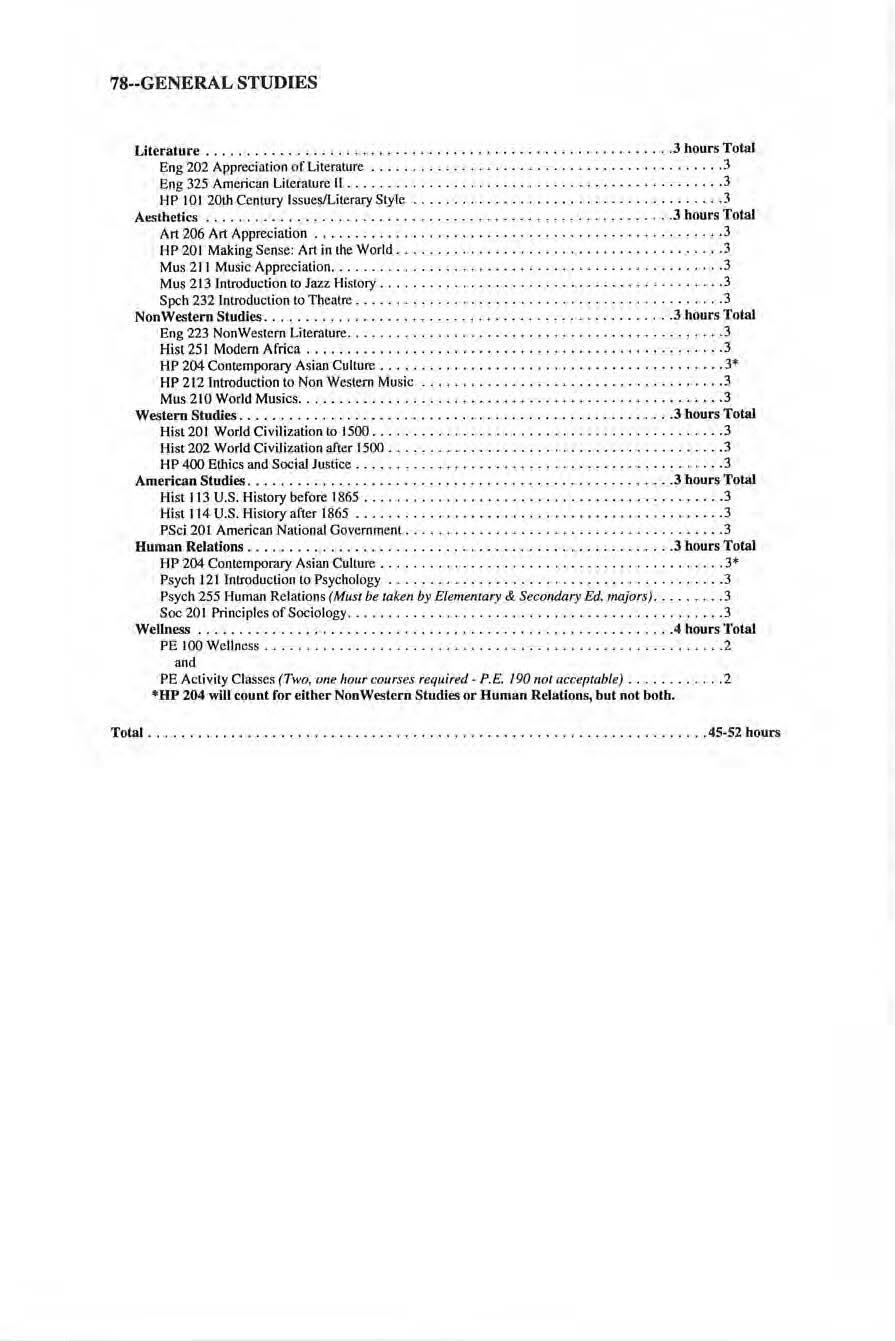
Literature .....•. • ..• ....•. , , ....• 3 h ours T ow l Eng 202 Appreciatio n of Literature • 3 Eng 325 American Li terature II , , , , , , 3 HP 101 20th Century l ssueyLiterary Style ..•............... 3 Aesthetics .• , , 3 hours Tolal Art 206 Art Appreciation ....... . ..... ... ..... .. .. .•• . ... • •... . . . , • . .. .....3 HP 201 Makiog Sense: Art in the Wor ld • • •• • • • 3 Mus 211 Music Appreciation , •... • • • , , •.. •.. • , .3 Mus 2 13 Introduction to Jazz History • , , ..••.. • • , •• 3 Speh 232 lnlr<lduction lo Theatre .... . •• .••... • .. .... •. •• . •• .. • . • .. • .. . . ... .. . 3 NonWest em S tudies ...••.... •.... •• 3 hours Total Eng 223 NonWestern Literature , , • • .....•. , • 3 Hist 25 1 Modem Africa ••.. • • • 3 HP 204 Conu:mporary Asian Culture • , • • •• 3• HP 212 lntroductlon to No n Western Music , , • •. , 3 Mus 210 Wo rld M usics .....• ...• •• ......•. 3 Western Studies • •• • 3 h ours Total Hist201 World Civilization to 1500 •• ..• • • 3 Hist 202 World CiviJi:auio n 3.fter 1500 • .•... •. • 3 HP 400 Ethics and Soda! Justice .. . ..... . . . ., • . .. • . •• ............•....... , . ..3 Ame rica n Studies .• .... . ......... ............ ...... .....•....... • ....3 hours Total His t 11 3 U.S. Histo ry before 1865 , ••• , .• • , 3 Hist 114 U.S. History after 1865 , • , , ..•.. , , • • , ..•. • , • •. 3 PSci 201 American National Govc mme nl. , 3 Human Relatlons ...... . . ..... . ......... ... ...... . . .•. . , • .. • . . ... • . . .3 hours T o tal HP 204 Contemporary Asian C ulture , , , , , 3* Psych 121 Introduction to Psychology , , 3 Psych 255 Human Re lations (Must be taken by Elemllltary &. Secondary Ed. majors) •... • 3 Soc20 1 Principles of Socio logy •. , 3 Wellness . ..... .. .... . .. . ..... . . .... . ..... . ...... . . ... , . ....... .. . . 4 ho u rs T o tal PE 100 Welln ess . • .. . ...... .. , . ... .. .. •••. ... • • .... •. .. ... , . ,., .. , . . • • . .2 and PE Activity C lasses (Two, on e hour <VJ11rses re,111ir,d • P.E. 190 n ot flcc•ptable/ 2 *HP 204 will count for e ither Non Western S tudle.s or Human Relations, but n ot both. T otal .•.• , • • • • • • , • •.• , • •• • • , 45-S2 hours
Cu uru
PERSONAL CURRICULUM GUIDE
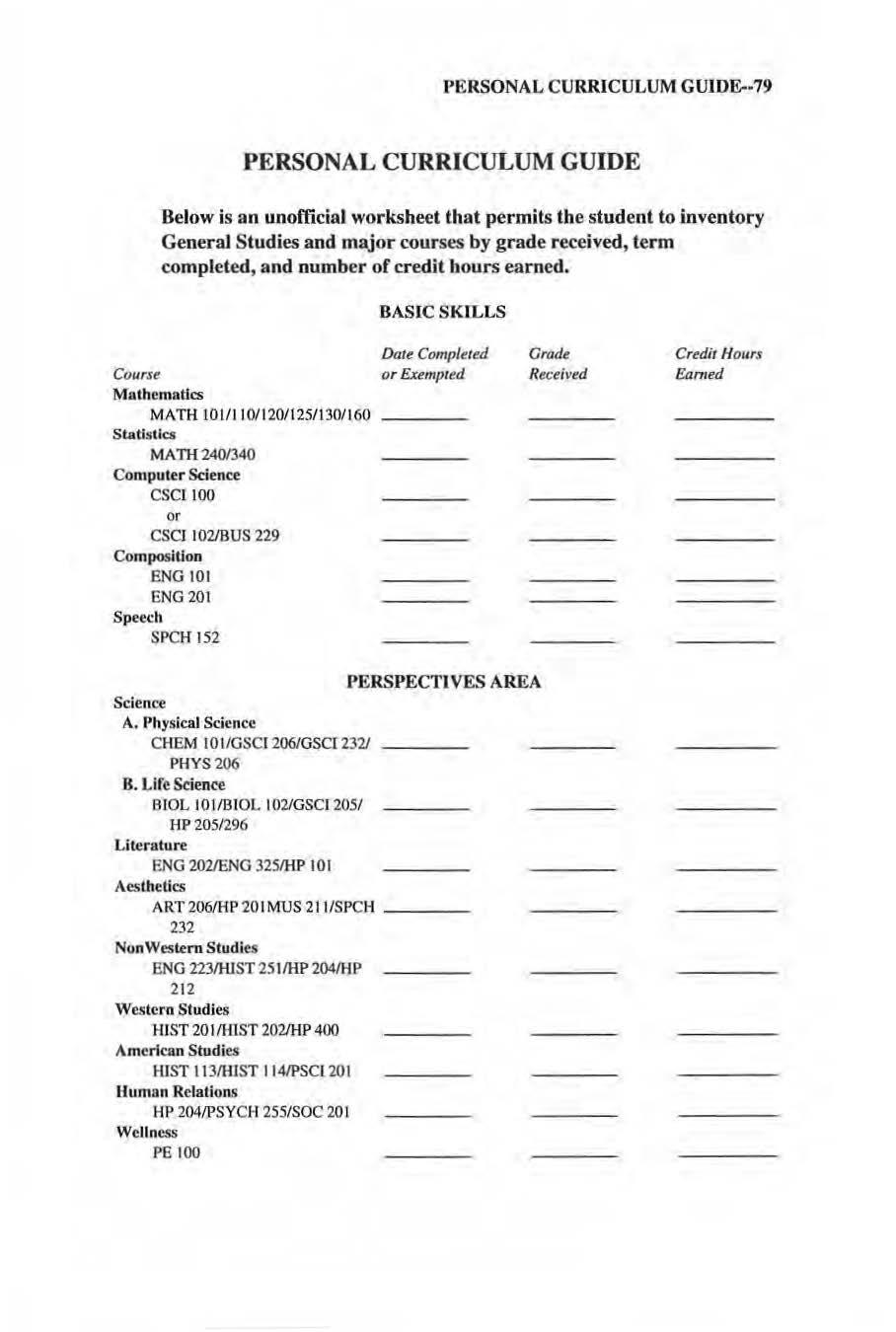
Below is a n unofficia l works heet that permits th e student to invento ry General Studies and m ajor courses by grade r eceived , term completed, and numbe r of credit h ours earned
BASIC SKILL S
Date Complt!ted o rExemp1ed
Grade Received
Mathematics
MATH IOI/I I0/120/125/130/160 ____
Sta tis ti cs
MATH 240/340
Computer Scie nce
CSCl 100 or CSCJ 102/BUS 229
Co mpositio n
ENG IOI
ENG201
Speech
SPCH 152
Science
A. Physical Scien ce
PERSPECTIVES AREA
C HEM 101 /GSCI 206/GSCI232/ ____
PHYS206
B. Life Scienre
BIOL IOI/BIOL l02/GSCf205/
HP 205/296
Literature
ENG 202/ENG 325/HP 101
Aest hetics
ART206/HP20IMUS 211/SPC H ____ 232
Nun Western St ud ies
BNG 223MJST 25 1/HP 204/HP
2 12
W estern Stud ies
HJST 20 I/HIST 202/HP 400
America n S tudies
HTST 113/HIST 114/PSCL201
Human Relations
HP 204/PSYCH 255/SOC 201.
We llness
PE 100
Credit Ho11rs &med
PERSONAL CU RRI CULUM GUIDE-0 79
MAJOR COURSES
PROGRAM· SPECIFIC REQUIREMENTS
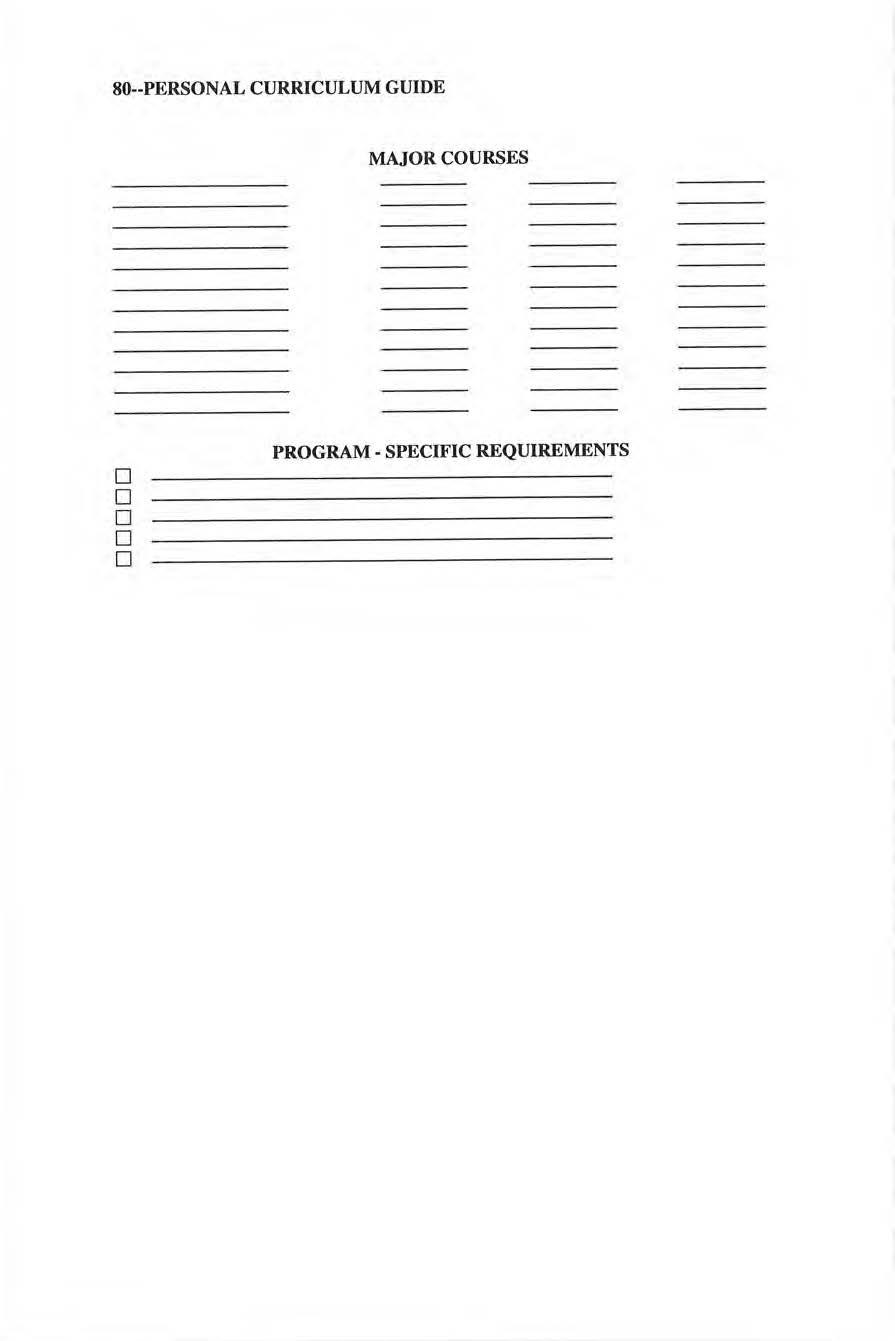
80--PERSONAL
CURRICULUM GUIDE
DEGREE PROGRAMS
Peru State College offers thirteen underg raduate maj o rs with 45 options, 26 endorsements, and two minors within the major s tructure .
Degree Mnjor Optio n
BS/BA Busin ess
Administration
BT Business
Accounting
Basic Business Subject Endorseme nt
Management
Management Information
Syste ms
Marketing
DiSlribulion
Administration Management (Offun Technology Program only)
Supervision
Minor
BS Ele mentary
.,..Elementary Education Education
•*Special EducationElementary or Secondary
**Early Childhood
0 Preschool Ham.li capped
0 M1ddle Grades
BS Physical
*'Physical Education
Ed ucation ( K- 6)
**Physical Education (7-12)
*Athle tic Coaching
Sports Manage ment
BS/BA Art ~Art
BS/BA English
BS/BA Musi c
'"Language Art.~
*English
"""Vocal/Instrumental Musi c
Music Educ111.ion (7-12)
Vocal Music Education ( K -6)
Music Perform ance
Mu sic Marketing
BS/B A Psychology/ Crimina l Justice Sociology
Psychology- Sociology
*Ps ychology
*Sociology
BS/BA Socia l Science
•Social Science
*Histmy
BS/BA Nntural Sci ence Biological Science

Wildlife Ecology
0 .Biology
'"*C hemistry
*Na11.1ra l Science
Nuclear Technology
• Physical Scien ce
DEGREE PROGRAMS--81
82--DEGREE PROGRAMS
BS/BA
BS/BA
BS/BA
Computer Science Mathematics Industrial Technology
Technical Business Applications

*Computer Science
* Mathematics
"'Industria l Technology
Industrial Management
**Driver Education
*Teaching endorsement available.
**Teaching endorsement onl y.
Computer Science
HONORS PROGRAM
The purpose of the Honors Program is to challenge academically-gifted s tudents with new ideas and perspectives. Honors courses are usually inte rdi sciplinary in approach. Class size is limited and s tudent eligibility req uires highe r than average acade mic qualifications.
Hono rs co urses are designed to stimulate an inquiry model of learnjng through a seminar structure. The Honors Prog ram is an opportunity for personal growth and an i nspiratio n for a lifetime of intellectual curios ity. Honors Program students may a ttend specia l cu ltural or scholas tic events throughout Lhe academic year, as well as interact with visiting scholars on the Peru State College campus.
To compl ete the Honors Program, students need at least 15 hours of Honors classes. Two of these cou rses are required: HP 101 - Twentieth Century Issues - Literary S tyles (meets lhe Ge neral Studies Literature reqwreme nt) and HP 400 - Etrucs and Socia l Justice -Capstone course (meets the Gen eral Studies Western Stud ies requirement). Four ad d itional Hono rs courses are offered on a regula r basis; students must take at least three of these courses to fulfill t he 15 credit hour requirem ent. All regularly scheduled Honors courses fulfill requirements of Peru State College's General Studies Progra m In addition to the two courses already described, the following fou r courses may be offered: (choose three)
I ) HP 201 Mak i ng Sense: Art in the World (Sati sfies Lhe General Studies Aesthetics requirement)
2) HP 204 Contemporary A s ian Cultures (Sati sfies the General Studies Non-Weste rn Stud ies or Human R e lations requirement , b ut not both)

3) HP 205 Science and Society (Satisfies one of tbe Gen e ral Studies Scie nce course requirements)
4) HP 212 Introduct ion to Non-Western Musics (Sat isfies the General Studies Non-Western Studies requirement)
S tude nts apply to the Honors Prog ram through the Co ordinator. Admission i s based o n the followjng criter ia:
I ) 24 ACT compo site, or
2) A cumulative g rade point average of 3 .3 for a t least 12 se mes ter hours at Peru S ta te College and a ranking in the top one-fourth of their high school graduating class, or
3) A cum ul a tive grade point average of 3.3 for at least 12 semes ter hours a t Peru S tate as a non-traditional student, o r
4 ) Permission of the Hon ors Program Committee o n writte n a ppli cation for stude nts with specia l abilities or achievements.
If s tudents meet t he e li gibiliLy reqwrements of the H onors Program, Presiden t ia l, Board of Trustee, and Non-Resident Scho larship, they are requi red to enroll in one
HONORS PROGRAM--83
H onors co urse during their first year at Peru State College. They then have the option to continue in or to drop t he program.
All students wishing to conti nue in the pro gra m must finish each academic year with at least a 3.0 c umulative grade po int average. T o be consi dered Honors Program gra duates, students must have maintained at least a 3 .0 cumulative grade point average, a nd completed the 15 credit bour requisement.
Students who successfully complete the Honors Program are designated as Honors Program graduates. They are recognized at Commencement and o n their permanent college records.
Course Descriptions
Honors Program
101 Twentieth Century Issues - Literary Styles (3 hours)
(Sati sfies the General Studies Literature requirement)
T hrough literature s uch as fiction , poetry, drama, biography, autobiography, and historical narrative, this course will foc us on selected iss ues such as education, the env ironment, racism, behaviorism, nucle ar war, political leade rship and the psych ology of leade rship, mass po litical movements , and the use of propaganda.

Permissio n of H o nors Program Coo rdinator required. (Each Fall Semeste r )
201 Making Sense: Art in the World (3 hou rs)
(Satisfies the General Studies Aes tberks requirement)
T his is an integrated F ine Arts course des igned to provide students the oppo1tunity to view and discuss tbe i.nterrelatedness of the fine arts , in particular the performance arts, e.g., class ical theatre, modern theatre, m usical theatre, ballet, modem dance, choral performance, orchestral performance, ope ra, the visual arts in all media, film, photography, architecture, etc. IL will rel y heavily upon on-campus semi nar sessions and student attendance at on-campus and off-campus performances.
Permission of Honors Program Coordinator required
204 Cont emporary Asian Cultures (3 hours)
(Satisfies the General S tudies Non-Western Studies or Human Relations requiJement, bu t not both)
This course will introduce societies and cu ltu res of the Far Easte rn co untri es with emphasis o n Japan, Korea, and Chi na. The course covers s uch topics as tbe grou p , relativism, education, business, religion, role of women, and psychological traits . In addition, students will look at the current iss ues affecting the U nited States a nd Asian countries.
Permissio n of Honors Progra m Coord inator required .
( Each Spring semester)
84--HONORS PROGRAM
205 Science and Society (3 hours)
(Satisfies one of the General Studies Science course requirements)
This course will focus on the scientific metbod and the impact that sc ie nce has on society and individuals. Topics to be considered will be the relationships of science, e thics, politics, moral issues, and societal goals. Students will read publi shed articles, write about, and <liscuss the topics of this class. Th e course topics will be considered in light of a single discipline withjn science, evolutionary biology.
Pennission of the Honors Program Coordinator required.
212 Introduction to Non- Western Musics (3 hours)
(Satis fies the Ge neral Studies Non-Western Studies requirement)
Th.is course is an introduction to ethnomusicology in which the studen t will learn to experience and understand music in the context of human life. Students will experience and analyze the musics of Africa, Native America, Black America, Asia, the Near East, th e Pacific, and Eastern Eu_rope. This course will also provide the student the tools with which to discover the meanings of music in the life of any society.
Permission of the Honors Program Coordinator required. (Each Fall semester)
400 Ethics and Social Justice (3 hours)
(Satisfies tbe General Studies Western Studies requirement)
This co urse examines contrasting co nceptions of social justice and the ideal society as these appear in some of the major thinkers in the tradition of Western ethical philosophy.
Permission of the Honors Program Coordinator requ.ired. (Each Fall semester)
COLLEGE 100 and COLLEGE 400
The purpose of College 100 is to introduce the new student to information and ski ll s pertaining to college success. Among the subjects covered are academic expectations and planning, study skills, time management, financial aid, substance abuse, and diversity issues.
The purpose of College 400 is to provide cred it-beari ng career development opportwlities, especially job search ski ll s .
Course Descriptions College

100 New Student Experience ( l hour)
This course is an introduction to college success s kills It is a graduation requirement for all on-campus degree-seeking students with less than 30 hou,rs at time of admiss ion, unless subject to waiver.
(Each semeste r)
HONORS PROGRAM--8S
400 Career Strategies ( 1 hour)
This course is designed to teach job search techniques, an educational approach for professional development. Open to all majors. (Each semester)

86--HONORS
PROGRAM
DIVISION OF BUSINESS
C hair: Jack Hamilton
Professors: Snyder, Thomas
Assistant .frofessors: Hamilton , Kesh, Tabata
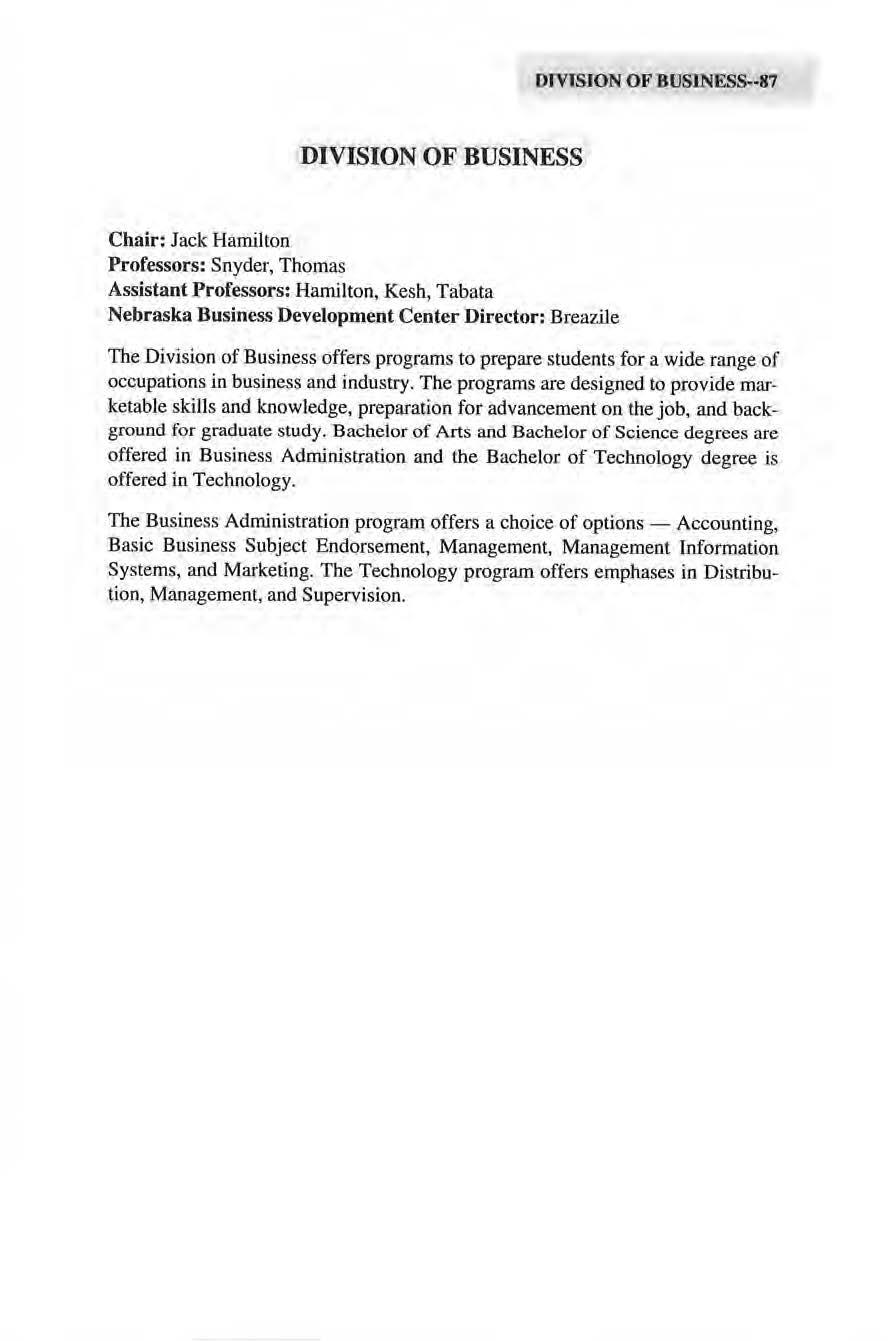
Nebraska Business Development Center Director: Breazile
The Division of Busi ness offers programs to prepare students for a wide range of occupations in business and industry. The programs are designed to provide marketable skills and knowledge, preparation for advancement on t he job, a nd background for grad u ate study. Bachelor of Arts and Bachelor of Science degrees are offered in Business Administration and the Bachelor of Technology degree is offered in Technolo gy.
The Business Administration prograJn offers a choice of options - Accounting, Bas ic Business Subject Endorsement, Management, Management Information Systems, and Marketing. The Technology program offers emphases in Dis tribution, Management, and Supervision.
DJVTSJON OF BUSINESS--87
NOTE: Business Administration Majors must take the following courses in the General Studies program:

88--DIVJSION OF BUSINESS Econ Econ Bus Bus Bus Bus Bus Bus Bu s Bus Bus BACHELOR OF SCIENCE BUSINESS ADMINISTRATION BUSINESS CORE 220 Principles of Ma croeco nomi cs 221 Prin ciples of Mi c roeconomi cs 231 Principles of F inan c ial Accounting 232 Prin ciples of Managerial Accounting 251 Legal Environment and Contract Law 301 Organizational Communi ca tion s 328 Prin c ipl es of Marketing 335 Production/Operation s Management 33 9 Busin ess Finance 373 Organizational Behavior 495 Business Poli cy ( Last Semester) (Senior Competency Course)
MANAGEMENT
OPTION
ACCOUNTING BASIC BUSINESS MANAGEMENT
MARKETING OPTION SUBJECT OPTION INFORMATION OPTION ENDORSEMENT SYSTEMS
Bus 229 Software App)jcatio ns CSci 102 Introductio n to Computer Concepts Math 120 Finite Mathematics Math 340 Statistics
Business Administration • Accounting Option
The Accounting option prepares students for several hjgh-demand careers in financial occupations. Initial coursework is designed to prepare students for positions in private -industry and the Certified Management Accountants (CMA) examination. Those students desiring to talce the Certified Public Accountants (CPA) examjnation w ill need to complete the additional Requirements for Public Accounting/CPA Focus.
Requirements for General Accouoting/CMA Focus (125 hours required)
Additional Requirements for Public Accounting/CPA Focus (150 hours required)
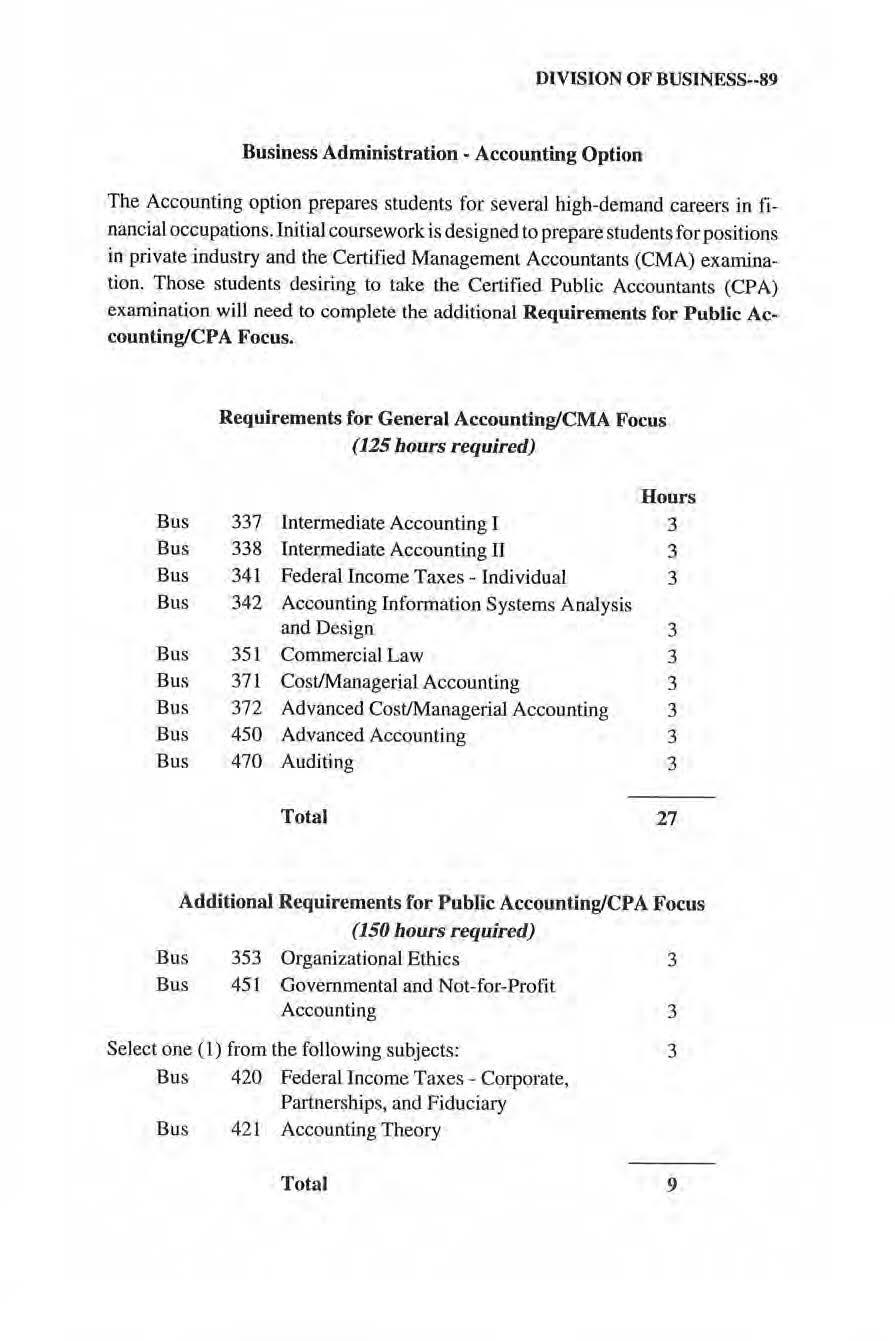
Select one (1) from the following subjects:
-
DIVISION OF BUSlNESS--89
Hours Bus 337 I ntermediate Accounting I 3 Bus 338 In termediate Accounting TI 3 Bus 341 Federal Income Taxes - Individual 3 Bus 342 Accounting Information Systems Analysis and Design 3 Bus 351 Commercial Law 3 Bus 371 Cost/Managerial Accounting 3 Bus 372 Advanced Cost/Managerial Accounting 3 Bus 450 Advanced Accounting 3 Bus 470 Auditing 3 Total 27
Bns Bus 353 Organizational Ethics 451 Governmental
and Not-for-Profit Accounting
Bus 420 Federa l Income Tax.es
Corporate, Partnerships, and Fiduciary Bus 421 Accounting Theory Total 3 3 3 9
Students opting for the CPA Focus are required to talce a total of 60 hours of credjt in general education excludin g PE but including Lbe cun-ent G eneral Studies Program. Credit hours beyond those required by the General Studies Program can be from any area of ge neral s tudies and are not specifically designated classes (i.e any English or math class). T he CPA Focus degree requirement is ISO hours. Th.is is th e State of N ebraska requirement e ffective January I , 1998 and will be the requirement for membership in the American Institute of Certified Public Accountants ( AlCPA) effective January I , .ZOO I.
Business Admin istration - Ba.s ic Business Subject Endorsement

The Basic Business Subject Endorsement prepares students for ce rtification to teach basic busin ess courses in Nebraska public schools in grade levels 7- 12.
Students in this option must complete a minimum of 33 semester hours in Business and Economics, excluding Bus 229, Software Applications.
Note : The program r eq uires a demonstrated competency in touch keyboarding, the ten-key pad , document formatting, correct technique, and employable speed .
The following courses may be subs tituted for Bus 335, Bus 339 , Bus 373, or Bus 495 in the Busi ness Core:
Note: Students must select the following General Studies courses:
Student s in the Basic Business Subject Endorsemen t may substitute M ath 101 , College Algebra, for Math 120 above.
Students must compl ete the above Subject Endor sement plus the 39 hours of Professional Education listed in the Education Di vision under Professional Edu-
90--DIVISION OF BlJSINESS
*.Bus *Bus Bus Bus Bus Bus 137 Principl es of M anagement 351 Co mmerc ial Law 353 Orga niza tional Ethics 374 Advanced Sp reads heet Applications 380 Human Resources Management 480 Internationa l Bus in ess * Courses marked with an asterisk are required. Hours 3 3 3 3 3 3
Bus CS ci Malb Math 229 Software Applications 102 Introduction to Computer Concepts 120 Finite Mathematics 340 Statistics 3 3 3 3
cation Se.quence and under Secondary Educa tion
Business Administration - Management Option
The Management optio n offers a general bu s iness approach and prepares graduates fo r e ntry and mid- level management positions .
(Only t hree (3) hours of Bus 441, Cooperative Educatio n Internship, may count toward the M anagement option.)
Business AdministrationManagement Inform ation Systems Option
Tbe Man agement In formation Systems (MlS) option prepares s tudents for employment in the development and maintenance of computer-based sy stem s that generate timely a nd accurate in formation for manag ing an o rganization.
Select One Course from t he following:

DI VISION OF BUS TNESS--91
Bu s Bu s Bus Bu s Requireme nts for Management Option 137 Principles of Manageme nt 35 l Commerc ial L aw 353 Organizational Ethics 380 Human R esources Management Business/Economi cs/Computer El ectives Total Hours 3 3 3 3 9 21
Requirements for Management Information Systems Option Hours Bus 320 Busi ness D ata Communications 3 Bus 376 Management of Local Area Networks 3 CSci 203 COBOL P rogramming 3 CSci 304 File P rocessing and D atabases 3 CS c i 312 Systems Analysis and D es ign 3 CS c i 408 Sen ior Project ( in Management Information Systems) 3 Electives:
3 Bus
Accounting
ems Analysis and Desi gn Bus 375 Advanced D atabase Ma n agement CSci 404 D ata Structw:es and Ana lysis of Al gori th ms Total 21
342-
Information Syst
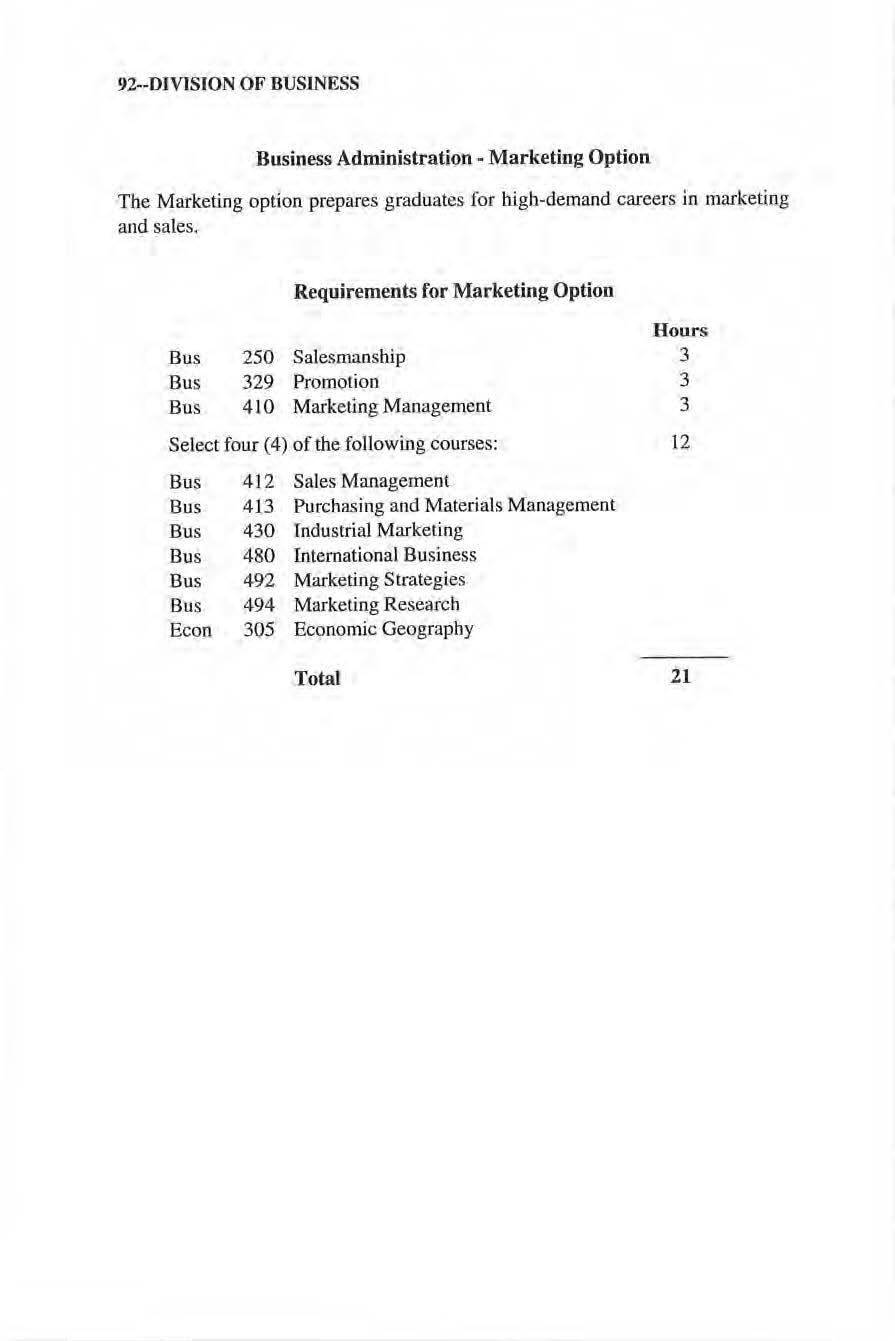
92--DIVTSlON OF BUSINESS
The Marketing option prepares graduates for high-demand caree rs in marketing a nd sa les. Requirements for Marketing Option Hours Bus 250 Salesmanship 3 Bus 329 Prom otion 3 Bus 410 Marketing Management 3 Select four ( 4) of th e following courses: 12 Bus 4 12 Sales Management Bus 413 Purch as in g and Materials Management Bus 430 fndu strial Marketing Bus 480 Internati onal Business Bus 492 Marketing Strategies Bus 494 Marketing Research Econ 305 Economic Geography Total 21
Business Administration - Marketing Option
BACHELOR OF TECHNOLOGY BUSINESS ADMINISTRATION
The Bachelor of Technolo gy degree requires a technical associate degree or equiva lent. All majors should complete the tec hnology core before the option Technology majors are not required to take the business core.
TECHNOLOGY CORE
Bus/Mgmt 231 Prin c ipl es of F in ancia l Accounting
Bus/Mgmt 30 l Organi za tional Commun i ca t ions
Bu s /Mgmt 328 P rinciples of Marketing/Marke ti ng Strategies

Bu s /Mgmt 373 Organi za ti ona\Behavior/Organ i zational Managem e nt
Bu s /Mgmt 496 Organizational Poli cy (Senior Competency Course)
DISTRIBUTION MANAGEMENT SUPERVISION OPTION OPTlON OPTION
DIVISION OF BUSINESS--93
The Management option is designed to meet the needs of Air Force personnel. Civilians may also elect the Management option and attend tbe Offutt program Some restrictions apply. Call (402) 293 - 1764 for more inform ation.
This degree requires completion of a transfer two -year technical associate degree and a minimum of 30 resident management option hours .
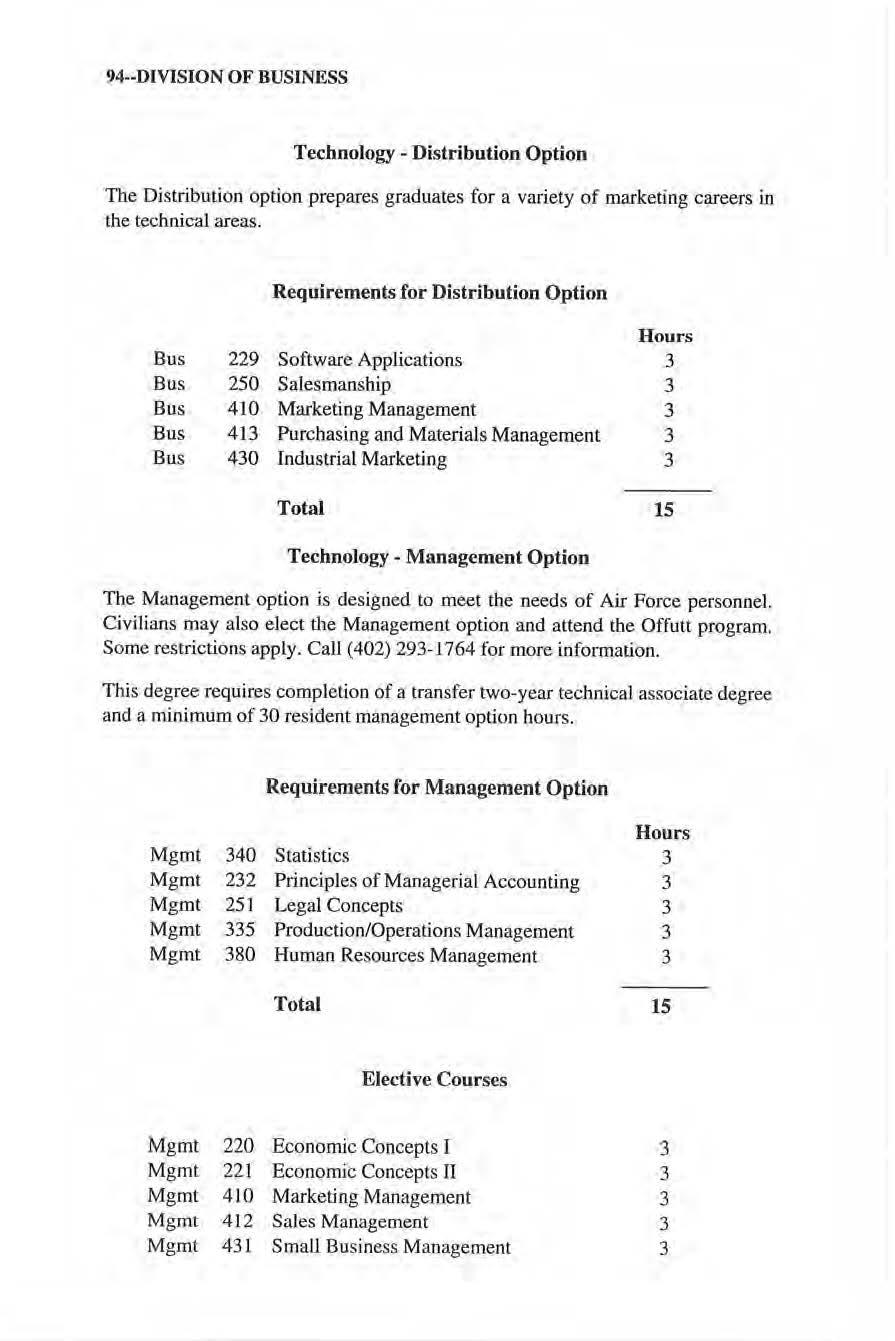
94--DIVISION OF BUSINESS Technology - Dis tribution Option
he Distribution option prepares graduates
variety of marketing careers
technical areas. Requirements for Distribution Option Hours Bus 229 Software Applications 3 Bus 250 Salesmanship 3 Bus 4 10 Marketing Management 3 Bus 413 Purchasing and Materials Management 3 Bus 430 Tndustrial Marketing 3 Total 15 Technology - Management Option
T
for a
io the
Requirements for Management Option Hours Mgmt 340 Statistics 3 Mgmt 232 Principles of Managerial Accounting 3 Mgmt 251 L egal Concepts 3 Mgmt 335 Production/Operations Management 3 Mgmt 380 Human Resources Management 3 Total 15 Elective C ourses Mgmt 220 Economic Concepts I 3 Mgmt 221 Economic Concepts II 3 Mgmt 410 Marketing Management 3 Mgmt 41 2 Sales Management 3 Mgmt 431 Small Bus ines s Management 3
Technology - Supervision Option
The Super visio n option prepares graduates for entry-level management careers in the technical area. The equivalent coursework offer-ed at Offutt AFB bas a MGMT prefix.

DlVCSION OF BUSINESS--95
Requirements for Supervision Option Hours Bus 229 Software Applications 3 Bus 25 1 Legal Environment and Contract Law 3 Bus 353 Organizational Ethics 3 Bus 380 Human Resources Management 3 Bus 414 Supervisory Problems 3 Total 15
DIVISION OF EDUCATION, PSYCHOLOGY AND PHYSICAL EDUCATION
C hair and Certification Officer: Dr Dani e l J. Cox: Professors: Citrin, Cox, Ferre, Lundak
Associate Professors: Rempp
A ssistant Professors: Arthaud, Dunni gan, H ypes, Seger
Instructors: Ferrante, Oibbs, Thomeczek
TEACHER EDUCAT ION
P eru State College, founded as a teachers' college, pl aces a primary em phasis u pon tbe prepar<1tion of excellent teachers who will serve the reg ion, the state and the nation. That teachers are the professio nal s c harged with the task of educating our children for role s in a de m ocratic society is a reaLization forming the philosophica l basis for our prog r am.
The Peru State College Teacher Education Program faculty view the t eacher as a r at:io nal and effective decis ion-maker. The effec tive decision-maker in the K-1 2 setting must have a solid cog nitive knowledge base in such areas as learning theory, ch ild and adolescent growth, educational planning, educa tion a lly diverse groups, excep tio nal learners , culturally diverse groups, ed ucational technology, curric ulum d eve lopment and human relations.
T he graduate oftbe Peru State College T each er Education Program will be prepared to carry o ut the instructiona l role of professional decision- maker in a persona l, caring manner. The grad uate will be prepared to develop in h.is/ber s t udents problem solv in g and t.hjnk.ing skills, basic knowl edge a nd s ki ll s, and a hi gh leveJ of se lf-es teem and a positive se lf co ncept.
TI1e effecti ve teacher is one who ca n make decisions wh ich will facilitate stu de nt achievement of intended le arni ng outcomes. Effective decision-makers acquire their comple x teaching skill s throu g h cog ni tive undemandi ng followed by practice and feedback on p rofessio nal performances.
The teacher education model, whicb shows how the vari o u s component s of the knowledge base relate, has as its focus the role of the classroom teacher. Bach Peru State teacher preparation program is ba sed on the phil osophica l model of tl1e Teacher as Decision-Maker
The Divi sion of Education a nd P sychology prov id es teacher preparation programs in acco rdance With the Nebraska D epartment of Education. The Nebraska Department of Educatio n requ ires that individuals seeking teacher certificati on be qualified for endorsem ent in one field or one subject. Subjects and fields are d efined as fo llo ws:

96--DJVISION OF ED0CATIO N, PSYCHOLOGY & PHYSICAL EDUCATION
Field: Field refers to two or more closely related subjects. For example, Social Science is a fiel d whi le History is a subject; or Physical Science is a field while Biology and Chemistry are considered subjects; or Elementary Education is a field including all the s ubjects taught in grades kindergarten through grade eight.
Subject: Subject refers to specific courses suc h as. English, Psychology, or Early Childhood Education.
The Division of Education and Psychology offers teacher preparation programs in the following fields and subjects:
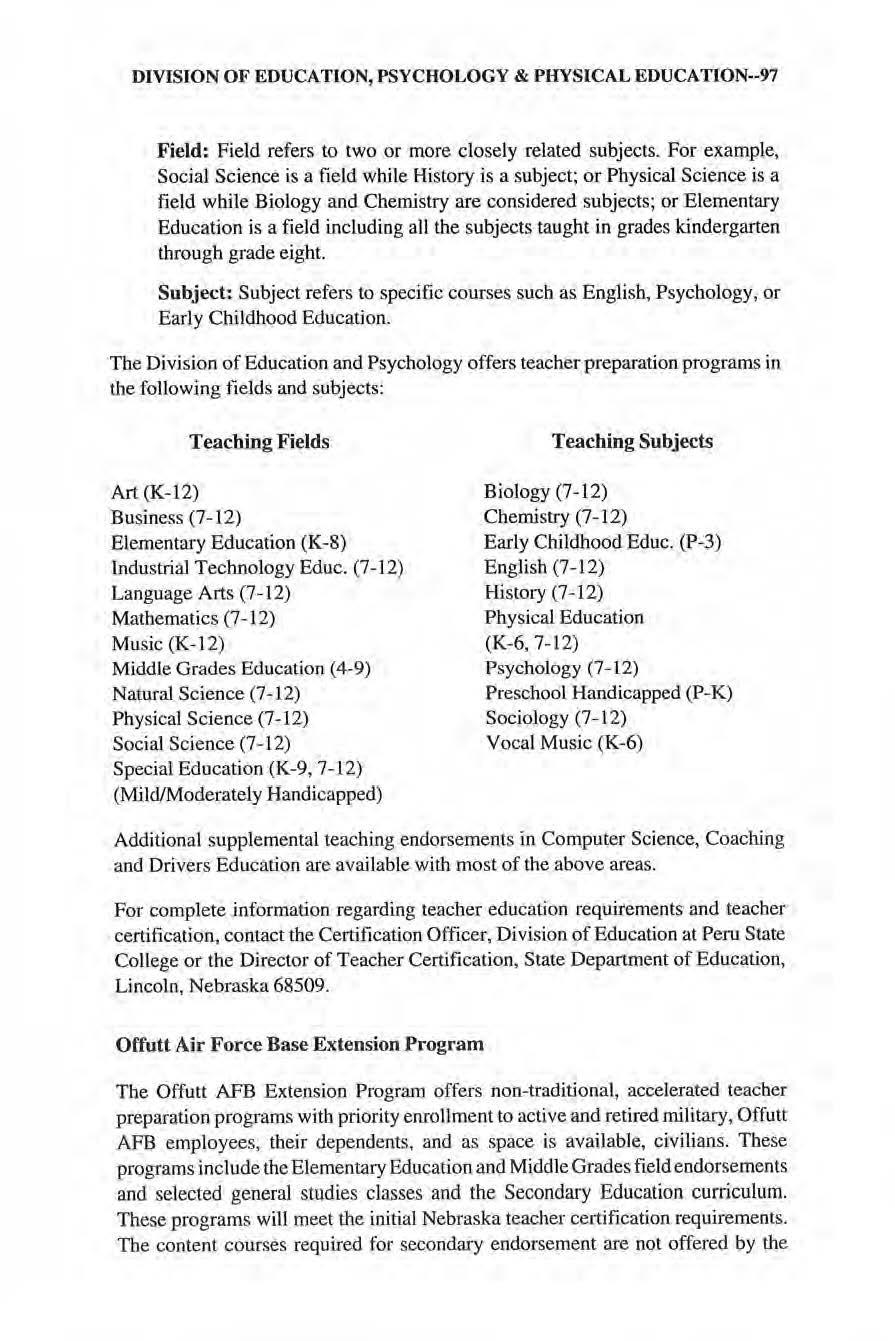
Teaching Fields
Art (K-12)
Business (7-12)
E lement ary Education (K-8)
Industrial Technology Educ. (7-12)
L anguage Arts (7-12)
Mathematics (7 - 12)
Music (K- 12)
Middle Grades Education (4-9)
Natural Science (7-12)
Phys ical Science (7- 12)
Social Science (7 - 12)
Special Education (K-9, 7- 12) (Mild/Moderately Handicapped )
Teaching Subjects
B iology (7- 12)
Chemistry (7-12)
Early CbjldhoodEduc. (P -3)
English {7-12)
History (7- 12)
Physical Education
(K- 6, 7-12)
Psychology (7- 12)
Preschool Handicapped ( P- K)
Sociology (7-12)
Vocal Music (K-6)
Additional supplemental teaching endorsements in Computer Science, Coaching and Dri vers Education are avai l able with most of the above areas.
For complete information regarding teacher education requitements and teacher certification, co ntact the Certification Officer, Di vision of Education at Peru Stat e College or the Director of T eacher Certification, State Department of Education, Lincoln, Nebraska 68509.
Offutt Air Force Base Extension Program
The Offutt AFB Extension Program offers non -traditional, accelerated t eacher preparation programs with priority enrollment to active and retired military, Offutt AFB employees, their dependent s, and as space is available , civi lians . These programs i nclude the Ele mentary £<location and Middle Grades field endorsements and selected general studies classes and the Secondary Education curriculum. These programs will meet the initial Nebraska teacher certification requirements The co ntent courses required for secondary endorsement are not offered by the
DlVISlON OF EDUCATION,
&
PSYCHOLOGY
PHYSICAL EDUCATlON--97
Offutt program. Admission, degree, and course r equirements are the same as oncampus. Information regarding the Offutt Extension Program is available by contacting the Peru State College Extension Office, Base Education, 55 MSS/DPE, Offutt AFB, NE 68113. (402) 293-1764
Adm iss i on to Teacher Education
Admission to Peru State College does not automatically perm i t admission to the Teacher Education program. Students planning to enter teacher education are required to file a formal application with the Teacher Education Committee.
Application for admission to teacher education will nor mally be made during the sophomore year in conjunction with enro llm ent in Ed 208: Orientation & Practic um. Students who transfer creclit which includes this course will be required to make application during their flrst semester on campus. Non-degree studen ts seeking endorsements only must appl y immecliately.
The following criteria and conditions must be met by applicants for admission to teacher education:
I . Free from social probation.
2. Overall grade point average of at least 2.5.
3. Minimum score of 170-readfog comprehension; 171-math; and 172-composition on the Pre- Pro fessional Skills Test (PPST ). Offi cial Institutional Sco re Reports are required for Teacher Certification.
4. Recommendations from two instructors who are in a position to assess the student as a prospective teacher.
5. Evidence of proficiency in English Composi tion and Mathematics as indicated by a grade of C or above in college level courses or scores at o r above the fiftieth percentile on the English and Mathematics sections of the ACT or 800 on the SAT.
6. Tbe Nebraska State Department of Education's R ule 20 requires that t he following regulation and appeal process be in effect:
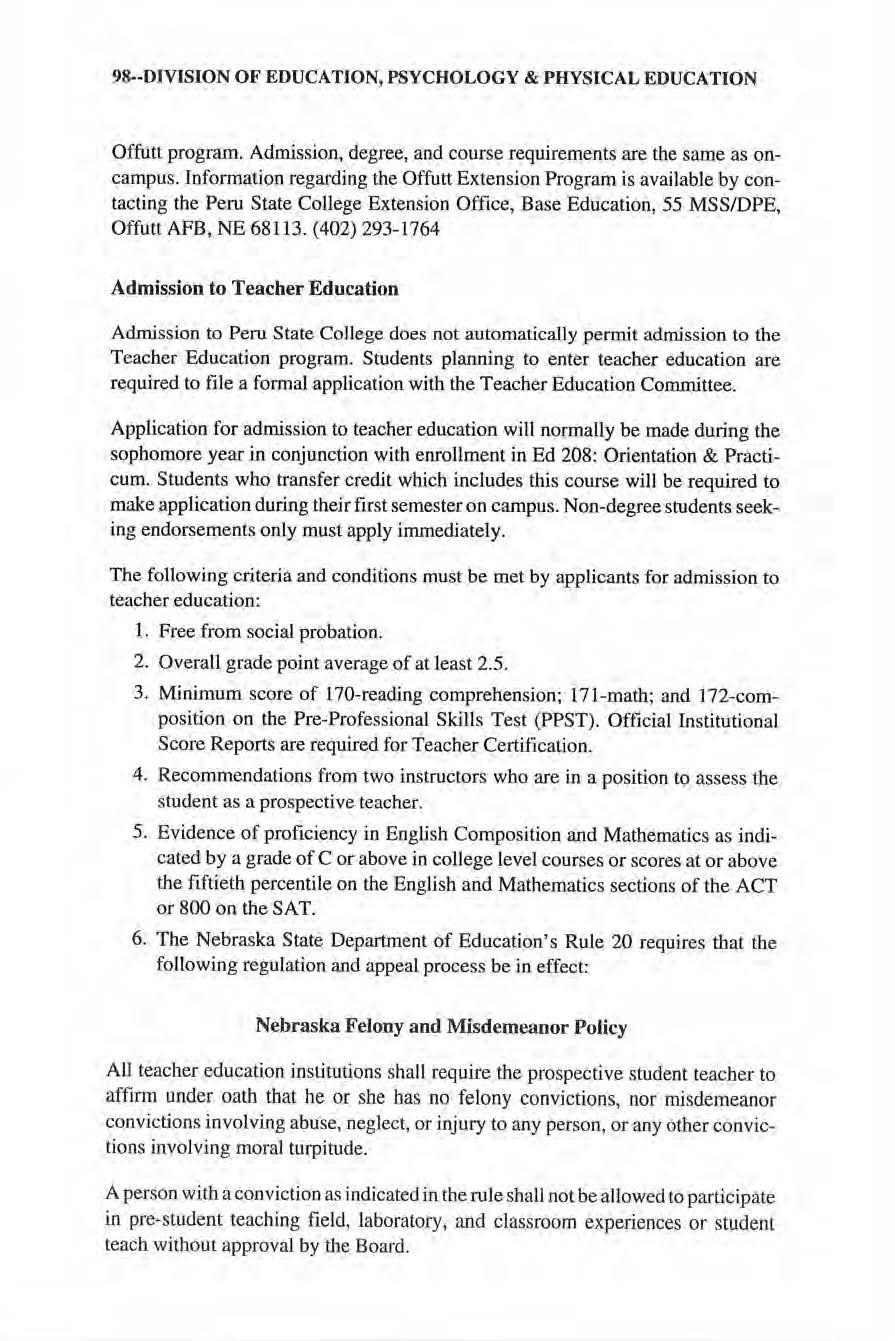
Nebraska Felony and Misdemeanor Policy
All teacher education institutions shall require the prospective student teacbex to affirm under oath that he or she bas no felony convictions, nor misdemeanor convictions involving abuse, neglect, or injury to any person, or any othe r convictions involving moral turpitude.
A person with a conviction as indicated in the rule shall not be allowed to parlicipate in pre•student teaching field, laboratory, and classroom eX_periences or student teach without approval by tl1e Board.
98--0JV ISION OF EDUCA TJON, PSYCHOLOGY &
E0UCATION
PHYSICAL
To meet this requirement, all students shall complete an oath prior to participation in pre-student teaching field, laboratory, and classroom experiences or student teacbfog.
In compliance with this rule the following Peru State College policy is in effect:
NO STUDENT WlLL BE ALLOWED TO PARTICfPATE IN PRE-STUDENT TEACHTNG FIELD, LABORATORY, AND CLASSROOM EXPERIENCES OR STUDENT TEACH UNTil.., A NOTARIZED OATH AS DESCRIBED IN
THB TEACHER EDUCATION HANDBOOK HAS BEEN PRESEN TED TO '111'1 THE DIRECTOR OF FIELD EXPERIENCES.
PERSONS WITH A RECORD OF CONVICTIONS MUST CONT ACT THE CERTLFICATlON OFFICER BEFORE ENROLLING IN ANY PRE-STUDENT TEACHING FIELD, LABORATORY, AND CLASSROOM EXPERIBNCES OR STUDENT TEACH.
No student will be admitted to the Teacher Education program until all of the above criteria have been met.
After consideration by the Teacher Education Committee, the applicant will be approved or disapproved for admission to the Teacher Education program. Approved applicants and their advisors will be notified by letter from the Teacher Education Committee.
Applicants not approved for admission to teacher education and their advisors will be notified of the reasons for disapproval by the Teacher Education Committee. Applicants may request a review of the application and/or a hearing before tl1e Teacher Education Committee.
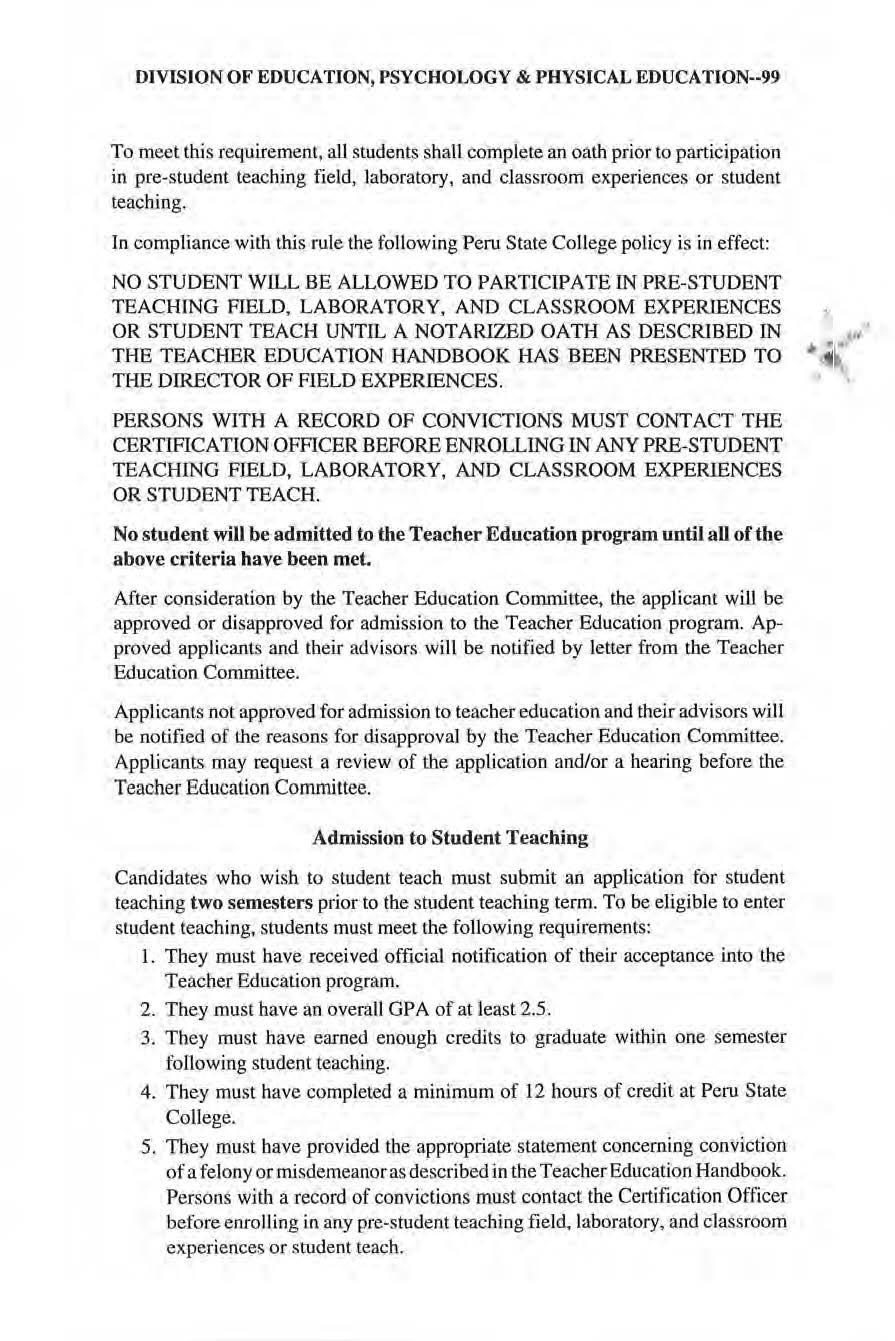
Admission to Student Teaching
Candidates who wish to student teach must submit an application for student teaching two semesters prior to the student teaching term. To be eligible to enter student teaching, students must meet rhe following requirements:
1. They must have received official notification of their acceptance into the Teacher Education program.
2 . They must have an overall GPA of at least 2.5.
3. They mus t have earned enough credits to graduate within one semester following student teaching.
4. They mu s t have completed a minimum of 12 hours of credit at Peru State College.
5. They must have provided tbe appropriate statement concerning conviction of a felony or misdemeanor as described 1n the Teacher Education Handbook
Persons with a record of convictions must contact the Certification Officer before enrolling in any pre- s tudent teac hing field, laboratory, and clas s room experiences or student teach.
DIVISION OF EDUCATION, PSYCHOLOGY & PHYSICAL EDUCATJON--99
~I."
TEACHER EDUCATION
The Divi sion of Education offers tbe B.S. with a major in Education. The B S. prepares a student to teach in Elementary or Secondary Schools. Options are ava il able in Elementary Ed ucati on, Middle Grades Education , Special Education: Elementary or Secondary, Early Childhood Education, and Preschool Handicapped Education.
All r equited coursework in the Education Core and Optio ns must be completed with a mini.mum grade of "C."
In addition to the requirements listed below, all teacher ed ucation students must take Psych 255: Human Relations.
Education Core
All studen ts seeki ng certification in any endorsement option area are required to complete tbe following courses:
*Courses marked with an asterisk require Admission to Teache r Education. Elemeotary E ducation Option
A ll students seeking endorsement in Elementary Education (grades Kindergarten · 8) must comp lete the following Option in Eleme ntary Education.

100--DIVISION OF EDUCATION, PSYCHOLOGY & PHYSICAL EDUCATION
Educ Educ Psych Psych SpEd 208 Orientation and Practicum 400* Philosophical Foundations of Education 20 5 Educationa l Psychology 250 Human Growth & Development 200 Introdu ctio n to Specia l Education * Student T eaching Total for Education Core Ho urs l 3 3 3 3 16 29
Educ 30 I * Practicum - Socia l Studies & L anguage Arts L Educ 302* Practicum - Math & Science I Educ 317* Educational Tests & Measurements 2 Educ 325* Teaching Language Arts in E lem/Middle Schoo l 3 Educ 326* Teachin g Social Studies in Elem/Middle School 3
* Courses marked with an asterisk require admission to Teacher Education.
Secondary Education Option
In conjunction with the Education Core th e following classes are required for any endorsement to teacb in grades seven through twelve. Additional coursework is required in the Subject Area. See endorsement p rogram descriptions in Business, Humanities , or Science and Technology.
* Courses marked with an asterisk require admission to Teacher Education.
K-12 Teacher Educat ion Programs
Peru State College offers program s to prepare individuals to teach from kindergarten through the twelfth grade in the areas of Art and Music. Students wor king toward K- 12 certification must meet the same requirements a nd follow the same professional teacher education progra ms as Secondary Education candidates with the exception of practicum and s tudent teaching, which must include expe ri e nces with both elementary and secondary s tude nts .

DIVISlON OF EDUCATION, PSYCHOWGY & PHYSICAL EDUCATJON--101 Educ Educ Educ Educ Eng Art Mus PE 327* Teaching Math in Elem/Middle School 3 328* Teaching Science in Elem/Middle School 3 334* Teaching Reading in Elementary School 3 403* Diagnostic and Remedial Reading 3 203 Literature for Children Through Adolescence 3 308 Art Exploration 3 251 Elementary Music Methods 2 313 Elementary/Middle School Physical Education 3 Total for Elementary Education Option 33 Total for Elementary Education Endorsement 62
Hours Educ 300* Classroom Mgmt and Effective Teaching Sec 2 Educ 309* Secondary Practicum 2 Educ 310* Secondary M e thods (or Subject Area Methods Course) 3 Educ 434* Secondary Reading & Writing Across the Curriculum 3 Total for Secondary Education Option 10 Total for Secondary Education Endorsement 39
Early C hildhood Education Option
This program will en.dorse an individual to teach Early Childhood grades Prekinder garten through three (3).
* Courses marked with an asterisk require admission to Teacher Education.
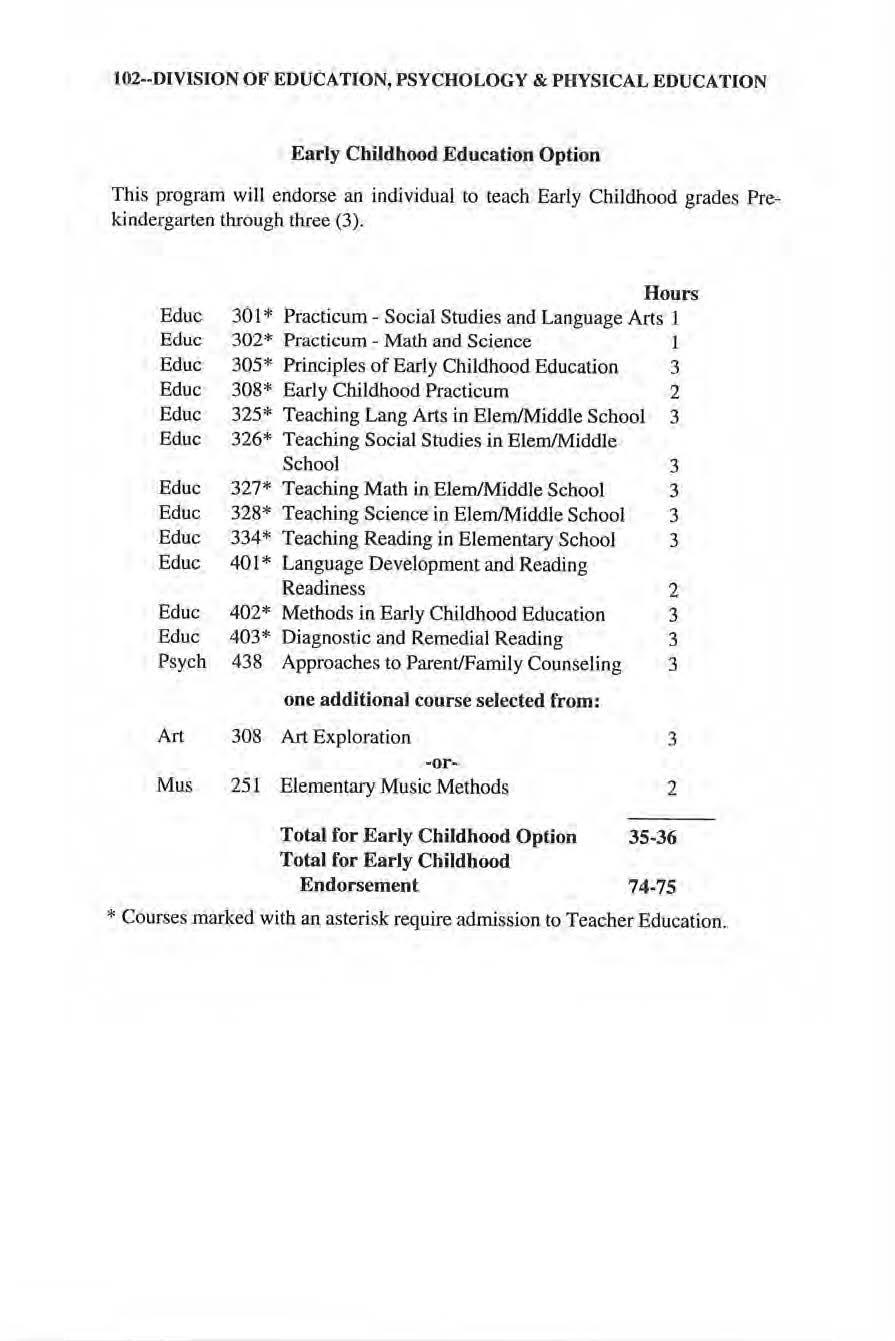
102--DIVISION
OF EDUCATION, PSYCHOLOGY & PHYSICAL EDUCATION
Educ Educ Educ Educ Educ Educ Educ Educ Educ Educ Educ Educ Psych Art Mus Hours 30 1* Practicum - Social Studies and Language Arts 1 302* Practicum - Math and Science 1 305 * Principles of Early Childhood Education 3 308* .Early Childhood Practicum 2 325* Teaching Lang Arts in El em/Middle School 3 326* Teaching Social Studies in Elem/Middle School 3 327* Teaching Math in Elem/Middle School 3 328* Teaching Science in Elem/Middle School 3 334* Teaching Reading in Elementary School 3 401 * Language Development and Reading Readiness 2 402* Method s in Early Childhood Education 3 403* Diagnostic and Remedial Reading 3 438 Approaches to Parent/Family Counseling 3 one additional course selected from: 308 Art Exploration -or251 Elementary Music Methods Total for Early Childhood Opt.ion Total for Early Chi ldhood Endorsement 3 2 35-36 74-75
Middle Grades Education Option
This program will endorse an individual to teach: (A) any or all s tud ents in a selfcontai ned classroom in grades four (4) through nine (9), (B) the areas of special preparation in an integrated team planning/teaching organizational pattern in grades fou r (4) throu gh ni ne (9) or (C) the areas of s pecial preparati on in classrooms with othe r organizational patterns in grades four (4) through nine (9).
* Cou rses marked with an asterisk require admiss ion to Teacher Education.
Additional Requirements For Middle Grades
Special Area Requirements: This endorsement s hal I assure the applicant ha s s pecial knowledge in three areas. The applicant must have 18 distinct semester hours in each of two Special Areas and 12 distin ct semester hours in one other Special Area, of which no more than two of the Special Areas may be chosen from any one of tbe four B road Fiel ds Listed below:
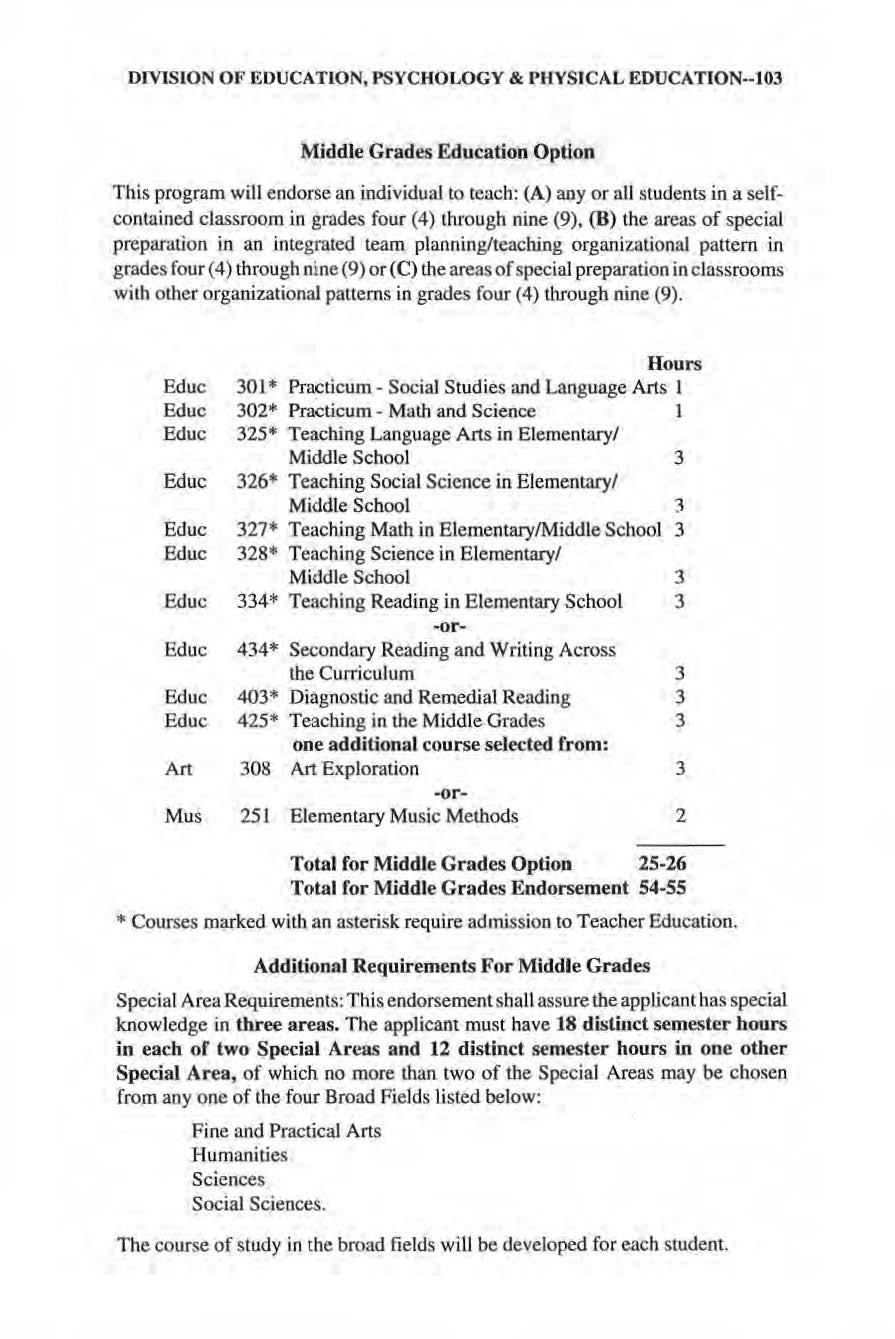
F ine and Practical Arts
Hum anities Sciences
Social Sciences.
The course of study in the broad fields will be developed for each s tuden t
DMSION OF EDUCATION, PSYCHOLOGY & PHYSICAL EDUCATION--103
Hours Educ 301 * Practicum - Social Stu dies and Language Arts I Educ 302* Practicum - M a th and Science I Educ 325* Teaching Language Arts in Elementary/ Middle School 3 Educ 326* Teaching Social Science in Elementary/ Middle School 3 Educ 327* Teaching Math in Elementary/Middle School 3 Educ 328* Teaching Science in Elementary/ Middle Schoo l 3 Educ 334* Teaching Reading in Elementary School 3 -orEduc 434* Secondary Reading and Writing Across the Curriculum 3 Educ 403* Diagnostic and Remedial Reading 3 Educ 425* Teaching in th e Middle Grades 3 one additional course selected from: Art 308 Art Exploration 3 -orMu s 251 E lementary Mu s ic Methods 2 Total for Middle Grades Option 25-26 Tota l for Middle Grades Endorsement 54-55
This program will endorse an individual to teach Elementary Special Education ( Mild/Moderate Hanclicapped) in grndes Kindergarten (K) through nine (9).
* Courses marked with an asterisk require admission to Teacher Education.

104--DIVlSION
Education Option: Elementary
OF EDUCATION, PSYCHOLOGY & PHYSICAL EDUCATION Special
Hours Educ 301 * Practicum - Social Studies and Language Arts 1 Educ 302* Practicum - Math and Science l Educ 325* Teaching Language Arts in the Elem/Middle School 3 Educ 326* Teaching Social Studies in the Elem/Mjddle Educ Educ Educ Educ Educ SpEd SpEd SpEd SpEd SpEd SpEd SpEd Psych Ps ych. Speh School 3 327* Teaching Math in the Elem/Middle School 3 328* Teaching Science in the Elem/Middle School 3 334* Teaching Reading in the Elementary Sch ool 3 403* Diagnostic and Remedial Reading 3 405* Diagnostic and Remedial Mathematics 3 290 Education of Mentally Handicapped Learners 2 300* Assessment in Special Education 3 307* Practicum in Special Education 2 385* Education of the Leaming Disabled 2 430* M ethods of Special Education Program M anagement 3 460* Career & Vocational Education for the Handicapped 2 465* Education of Emotionally Tmpaired Learners 2 438 Approaches to Parent/Family Counseling 3 440 Behavior Management & Modification 3 353 Speech Correction & Development 3 Total for Special Education Option: Elementary 48 Total for Special Education Elementary Endorsement 77
Sped.al Education Option: Secondary
This program will endorse an individual to teach Special Education (Miki/Moderate Handicapped) grades seven (7) through twelve (12) .
* Courses marked with an asterisk require admission to Teacher Education.

DIVISION OF EDUCATION, PSY CHOLOGY & PHYSICAL EDUCATlON--105
Educ Educ Educ Psych Psych SpEd SpEd SpEd SpEd SpEd SpEd SpEd Speh Boors 375 Education of Gifted Learners 3 403* Diagnostic & RemecLial Reading 3 405* Diagnostic & Remedial Math 3 438 Approaches to Parent & Family CounseUng 3 440 Behavior Management & Modification 3 290 Education of Mentally Ha ndicapped Learners 2 300* Assessment in Special Ed ucation 3 307* Practicum io Special Education 2 385* Education of Leaming Disabled 2 430* Methods in Special Education Program Management 3 460* Career & Vocational Education for the Handicapped 2 465* Education of Emotionally Imp aired Learners 2 353 Speech Correction & Development 3 Total for Special Education Option: Secondary 34 Total for Special Education Secondary Endorsement 73
OF EDUCATION, PSYCHOLOGY & PHYSICAL EDUCATION
P reschool Handicapped Education Optio n
This program will endorse an individual to teach infants and young children through age five who have handicapp ing conditio ns.

106--DIVISJON
Edu c Ed uc Educ Educ Educ Educ Educ Educ Educ SpEd SpEd SpEd Psych P sych 301 * Practicum - Social Studies and Lang Arts 302* Praclicum- Math a nd Science Hours 1 305* Principles of Early Chjldbood Education 325* Teaching Language Arts in the Eleol/Middle School 326* Teachlng Social Studies in the Blem/Middl e l 3 3 School 3 327* Teaching Math in the Elem/Middle School 3 328* Teac hing Science in the Elem/Middle School 3 334* Teac hing Reading in the Elementary School 3 401 * Language Development and Reading Readiness 2 300* Assess ment in Special Education 3 309* Practicum in Preschool Handicapped 2 405* SpEd/Early Cruldhood Characteristics & Methods 3 440 Behavior Management & Modification 438 Approaches to Parenl/Famjly Counse ling 3 3 Total for Preschoo) Hand icapped Option 36 Total for Presch ool Hand icapped Endosrement 55
to Teache r Education.
* Courses marke d w ith an asterisk require admission
Requirements for Psychology Option (7• U Subject Endorsement or
This program will e ndorse an individual to teach P sychology in grades seven (7) through twelve (12) The Education Core and Secondary Education Option are also required.

DIVISION OF EDUCATION,PSYCHOWGY & PHYSICAL EDUCATTON--107
Nonteaching)
Psychology-Sociology Core Requirements: Psych 121 Introduction to Psychology 3 Psych 255 Human Relations 3 Soc 20 1 Principles of Sociology 3 420 Psych/Soc. Theory 3 Additional Psychology Requirements: P s ych 250 Human Growth and Development 3 P sych 305 Social Psychology 3 Psych 320 Psychology of Learning 3 Psych 345 Psychology of PersonaEty 3 Psych 440 Behavior Management and Modification 3 Psych 450 Abnormal Psychology 3 Electives in Psychology 6 Total for Psychology Option 36 Total for Psychology Endorsement 75
Physical Education
T he Divisioo of Education offers programs for individuals wishing to major in Physical Education which will enable graduates to become cect.ified as Physical Education teachers in t he public schools or to become qual ified for careers in Sports Management and to enable students to meet the requirements for certification as coaches. (Non-teaching PE majors must choose the Sport Management Option.)
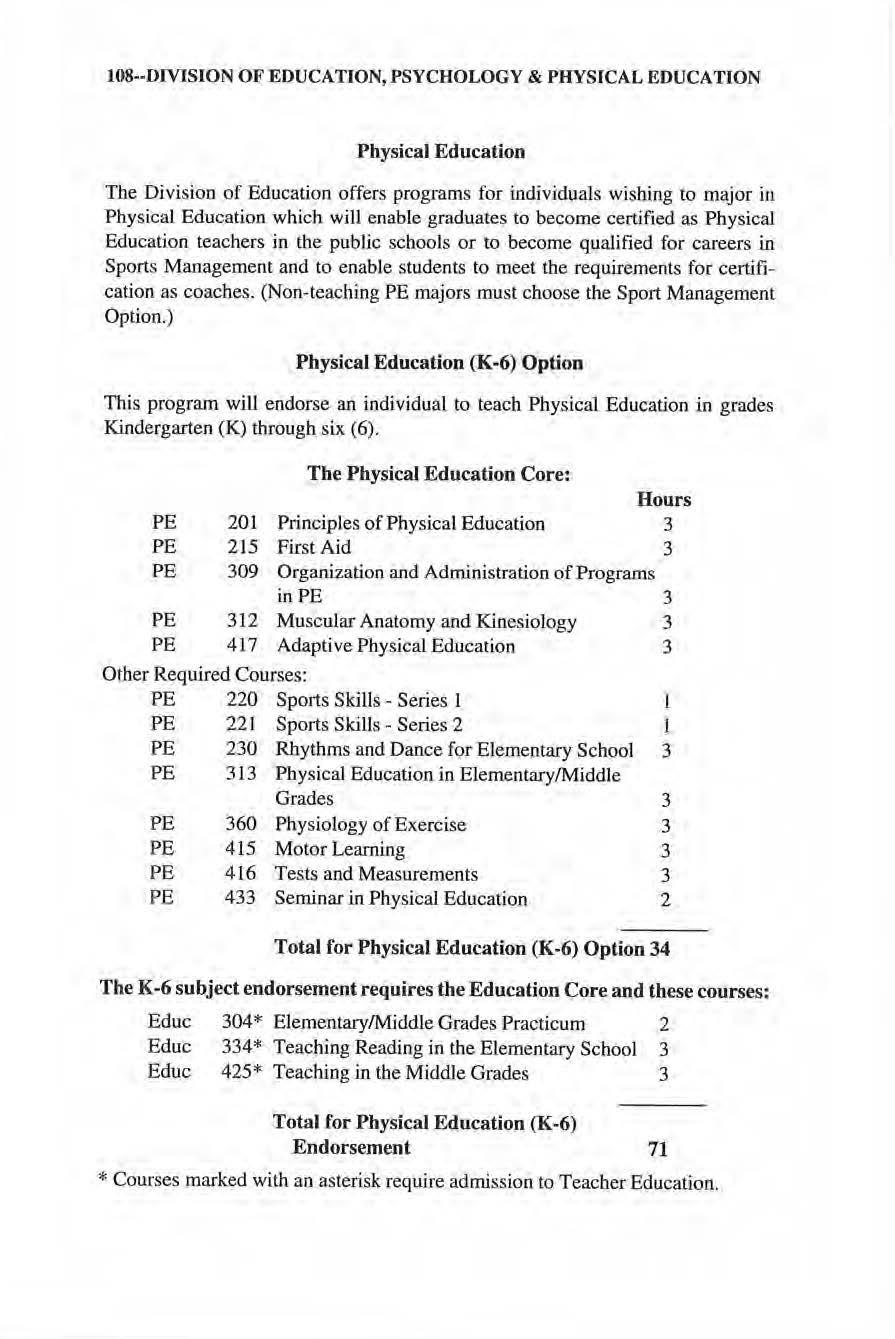
Physical Education (K-6) Option
This program will endorse an individual to teach Physical Education in grades Kindergarten (K) through six (6).
The K-6 subject endorsement requires the Education Core and these courses:
* Courses marked with an asterisk require admission to Teacher Education.
108--DIVISlON OF EDUCAT ION,
PSYCHOLOGY & PHYS£CAL EDUCATION
PE PE The Physical Education Core: 20 l Principles of Physical Education 215 First Aid Hours 3 3 PE 309 Organization and Administration of Programs ~PE 3 PE 312 Muscular Anatomy and Kinesiology 3 PE 417 AdaptivePhysicalEducation 3 Other Required Courses: PE 220 Sports Skills - Series I L PE 221 Sports Skills - Series 2 I PE 230 Rhythms and Dance for Elementary School 3 PE 313 Physical Education in Elementary/Middle Grades 3 PE 360 Physiology of Exercise 3 PE 415 Motor Learning 3 PE 416 Tests and Measurements 3 PE 433 Seminar in Physical Educati on 2 Total for Physical Education (K-6) Option 34
Educ 304* Elementary/Middle Grades Practicum 2 Educ 334* Teaching Reading in the Elementary School 3 Educ 425* Teaching in the Middle Grades 3 Total for Physical Education (K-6) Endorsement 71
Physical Education (7-12} Option
Thi s program wiJI endorse a n individual to teach Physical Education io grades seven (7) through t welve (12).
The 7-12 s ubject endQrsement requires the Education Core and the Secondary Education Option.

DIVISION OF EDUCATION, PSYCHOLOGY & PHYSICAL EDUCATION--109
PE PE The Phys ical E ducat ion Core: 201 P rinciples of Physical Edu cation 215 FirstAid Hours 3 3 PE 309 Organization and Administration of Programs ~ffi 3 PE 312 Muscular Anatomy and Kinesiology 3 PE 41 7 Adaptive Physical Education 3 Other Required Courses: PE 220 Sports Skills - Series 1 1 PE 22 1 Sports Ski lls - Series 2 I PE 360 Ph ysiology of Exercise 3 PE 415 Motor Learning 3 PB 416 T es ts a nd Meas urements 3 PE 433 Seminar in Physical Education 2 Fou r semesters of PE activity classes ( to include an aquatic offering) 4 Total for Physical Education (7-12) Option 32 Total for Physical EdtLcation (7-12) Endorsement 42
Physical Education {K-6n-12) Option
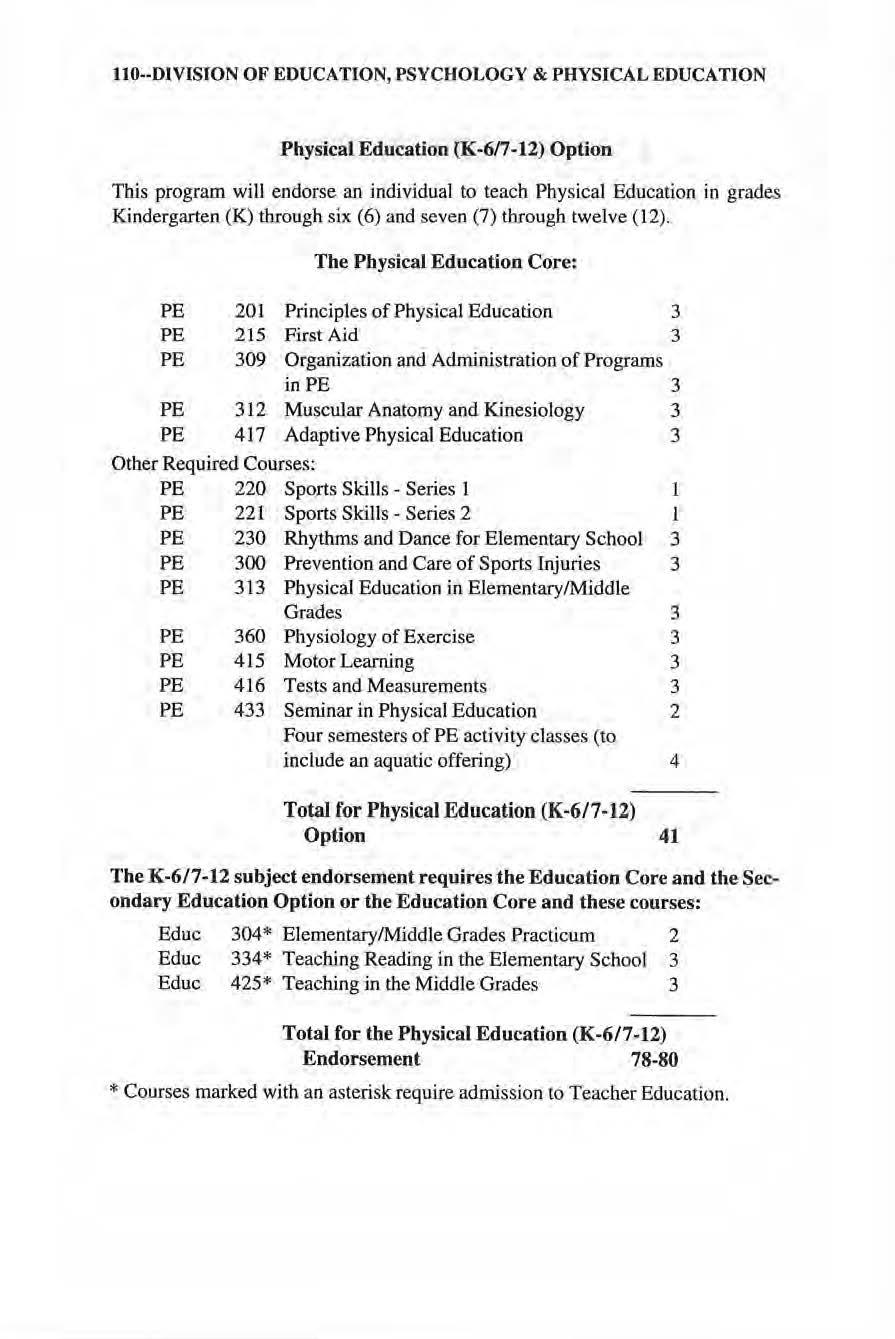
Thls program will endorse an individual to teach Physical Education io grades Kindergarten ( K) through six (6) aod seven (7) through twelve (12).
The K-6/7• 12 subject endorsement requires the Education Core and the Secondary Education Option or the Education Core and these courses:
* Courses marked with an asterisk require admission to Teacher Education.
110--DlVISTON
OF EDUCATION, PSYCHOLOGY & PHYSICAL EDUCATION
The Physical Education Co.re: PB 201 Principles of Physical Education 3 PE 2 15 First Aid 3 PE 309 Organization and Administration of Programs in PE 3 PE 312 Muscular Anatomy and Kinesiology 3 PE 417 Adaptive Physical Education 3 Other Required Courses: PE 220 Spo,rts Skill s - Series I 1 PE 221 Sports Skills - Series 2 l PE 230 Rhythms and Dance for Elementary School 3 PE 300 Prevention and Care of Sports Injuries 3 PE 313 Ph ys ical Education in Elementary/Middle PE PE PE PE Grades 3 360 Physiology of Exercise 415 Motor Learning 416 Tests and Measurements 433 Seminar in Physical Education Four semesters of PE activity classes (to include an aquatic offering) Total for Physical Education (K-6/7-12) 3 3 3 2 4 Option 41
Educ 304* Elementary/Middle Grades Practicum 2 Educ 334* Teaching Reading in the Elementary Schoof 3 Educ 425* Teaching :in the Middle Grades 3 Total for the Physical Education (K-6/7-12) Endorsement 78-80
Requirements for Athletic Coaching Endorsement
The following program is designed to fit the needs of the high school coach and lead s to an institutional recommendation for endorsement. Students completing this program are required to have an endorsement in Physical Education.
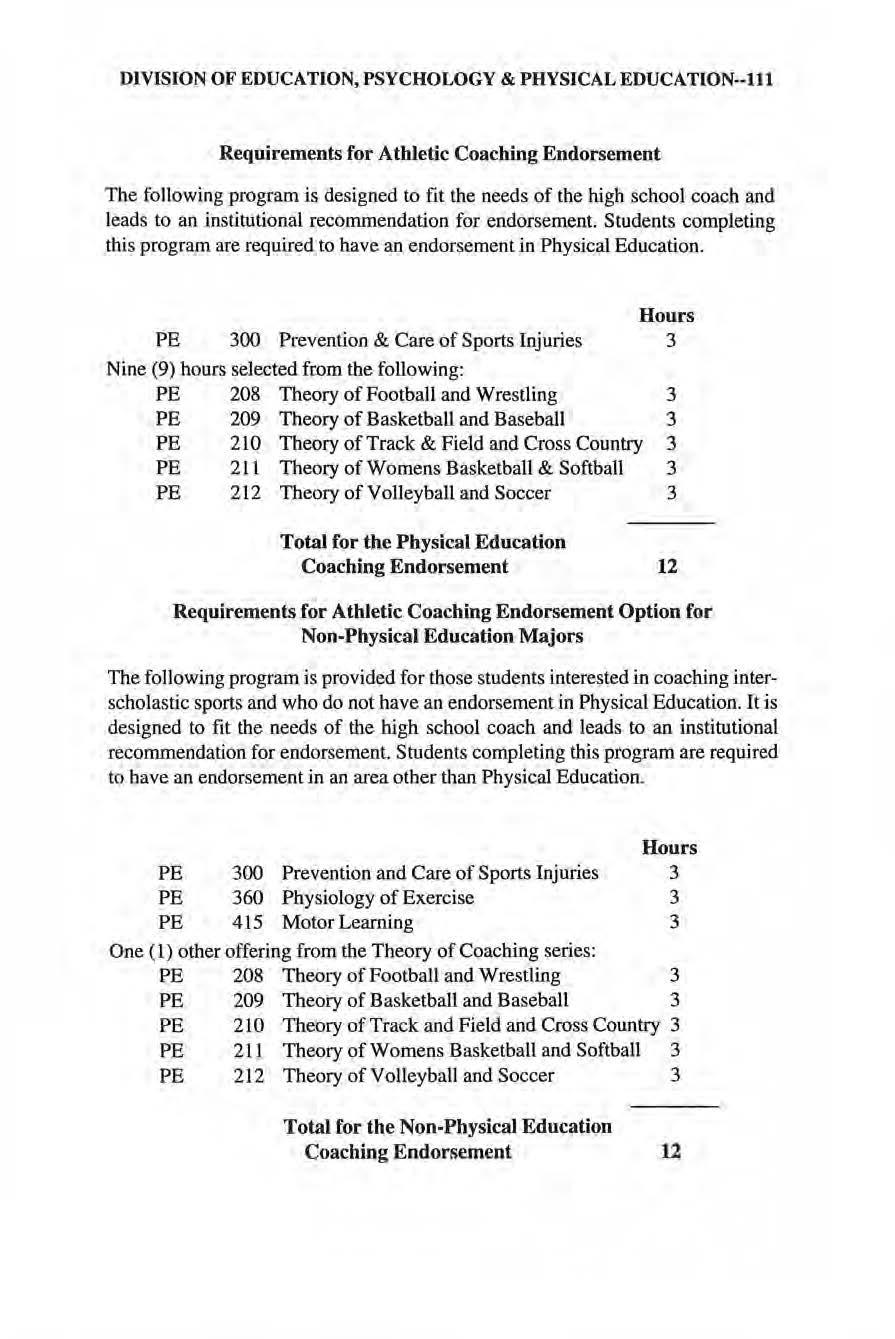
Requirements for Athletic Coaching Endorsement Option for Non-Physical Education Majors
The following program is prov ide d for those students interested in coaching interscholastic sports and who do not have an endorsement in Physical Education. It is designed to fit the needs of the high school coach and leads to an institutional recommen dation for endorsement. Students completing this program are requ.ired to have an endorsement in an area other than Physical Education
DIVISION OF EDU CATlON, PSYCHOLOGY & PHYSICAL EDUCAT ION--111
PE 300 Prevention & Care of Sports Injuries Nine (9) hours selected from the followi ng: PE 208 Theory of Football and Wrestling PE 209 Theory of Basketball and Baseball Hours 3 PE 210 Theory of Track & Field and Cross Country 3 3 3 3 3 PE 21 t Theory of Womens Basketball & Softball PE 2 12 Theory of VoUeyball and Soccer Total for th.e Physical Education Coaching Endorsement 12
PE P E PE 300 Prevention and Care of Sports Injuries 360 Physiology of Exercise 415 M otorLearniog One ( 1) other offering from the Theory of Coaching series: Hours 3 3 3 PE 208 Theory of Football and Wrestling 3 PE 209 Theory of Basketball and Baseball 3 PE 210 Theory of Track and Field and Cross Country 3 PE 21 1 Theory of Womens B asketball and Softball 3 PE 212 Theory of Volleyball and Soccer 3 Total for the Non-Physical Education Coaching Endorsement 12
OF EDUCATION, PSYCHOWG\' & PHYSICAL EDUCATION
Physical Education Sport Management Option
The Sport Management option w il l allow the graduate to pursue a career i n the sports industry. This option does not lead to a teaching endorsement and does not require the Education Core.
Note: Sport Management students will be advised to take the " B " Option in Genera l Education computing: CSci 102 and Bus 229.
The student shall also select nine (9) additional hours w i th an emphasis in one of the Business options ( Ma nagement, Marketing, Accounting or Management Information Systems).

J12--DlVISION
BUS BUS BUS BUS Required Courses i n Business: 137 Principles of Management 23 1 Principles of Financial Accounting 251 Legal Environment and Contract Law 30 I O rganizational Communications 3 3 3 3
9 Total for Required Business Courses 21 Required Courses in Physical Education: The Physical Education Core: PE 201 Principles of Physical Education 3 PE 215 First Aid 3 PE 309 Organization and Adrrunistration of Programs in PE 3 PE 312 Muscular Anatomy and Kinesiology 3 PE 417 Adaptive Physical Education 3 Additional Requirements: PE 24 1 Physical Education Internship 3 PE 300 Prevention and Care of Sports I njuries 3 PE 360 Physiology of Exercise 3 PE 415 Motor Learning 3 PE 416 Tests and Measurements in PE 3 PE 433 Seminar in Physical Education 2 PE 441 Physical Education Internship 3 Psyc 310 Psycho logy of Sports and Physical Activities 3 Total for Required Physical Education Courses 38 Total for Physica l Education Sport Management Option 59
DIVISION OF THE HUMANITIES
Interim Chair: Dr. Joe l Lundak
Professors: Anderson, Davis, Ediger, Edris, Harper, H o ltz , McCrann
Associate Professors: Asmussen, Clemente, Crook, Jones, Mokris
Assistant Professor:
Instructors: Emerson, Fryer
The Division of Humanities offers majors in Art, English, Mu s ic, PsychologySocio logy, and Social Science. A c urriculum has been developed for each of these areas d esigned to meet specific degree requirements and provide preparation for career s in teaching and non-teaching profe ssions The English Major provides options for either English or the broader area of Lan guage Arts. The Social Science Major provides options for History, and the broader area of Social Sciences. The Psychology-Sociology major provide s options for Psyc ho logy, Sociology, P sychology/Sociology combined, and a Criminal Justice option. Majors in the visual and performing arts areas provide various teaching and non-teach ing options in Art, Music, and Speech and Dram~
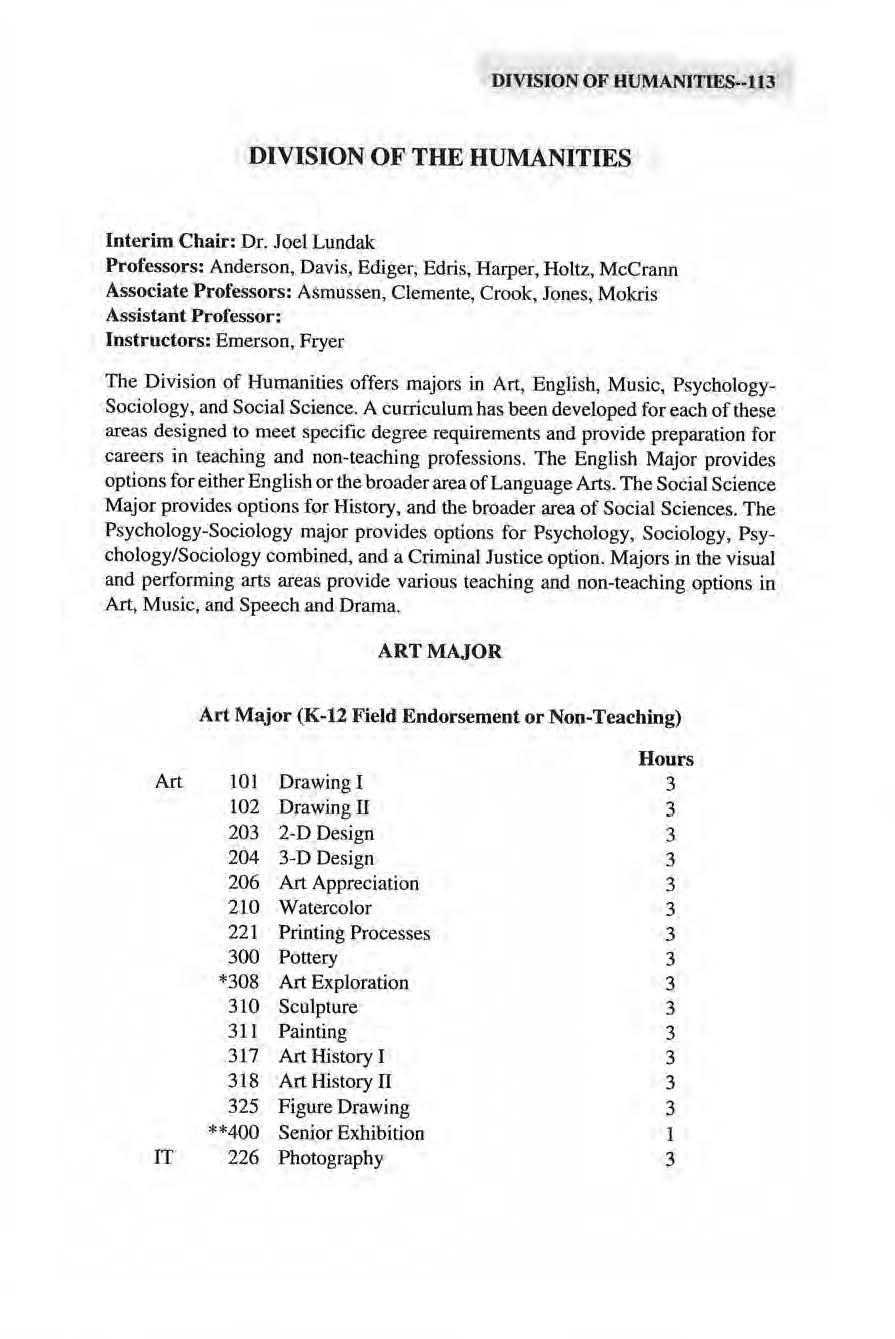
DIVISION OF RUMANlTlES•-1 13
Art Major (K-12 Field Endorsement or Non-Teaching) Hours Art 101 Drawing I 3 l02 Drawing II 3 20 3 2- D Design 3 204 3 -D Desig n 3 206 Art Appreciation 3 2 10 Watercolor 3 221 Printing Processes 3 300 Pottery 3 *308 Art Exploration 3 310 S c ulpture 3 311 Painting 3 317 Art History I 3 318 Art Hi story IT 3 325 Fig ure Drawing 3 **400 Senior Exhibition l IT 226 Photography 3
ART MAJOR
Art electives (select l l hours from the following)
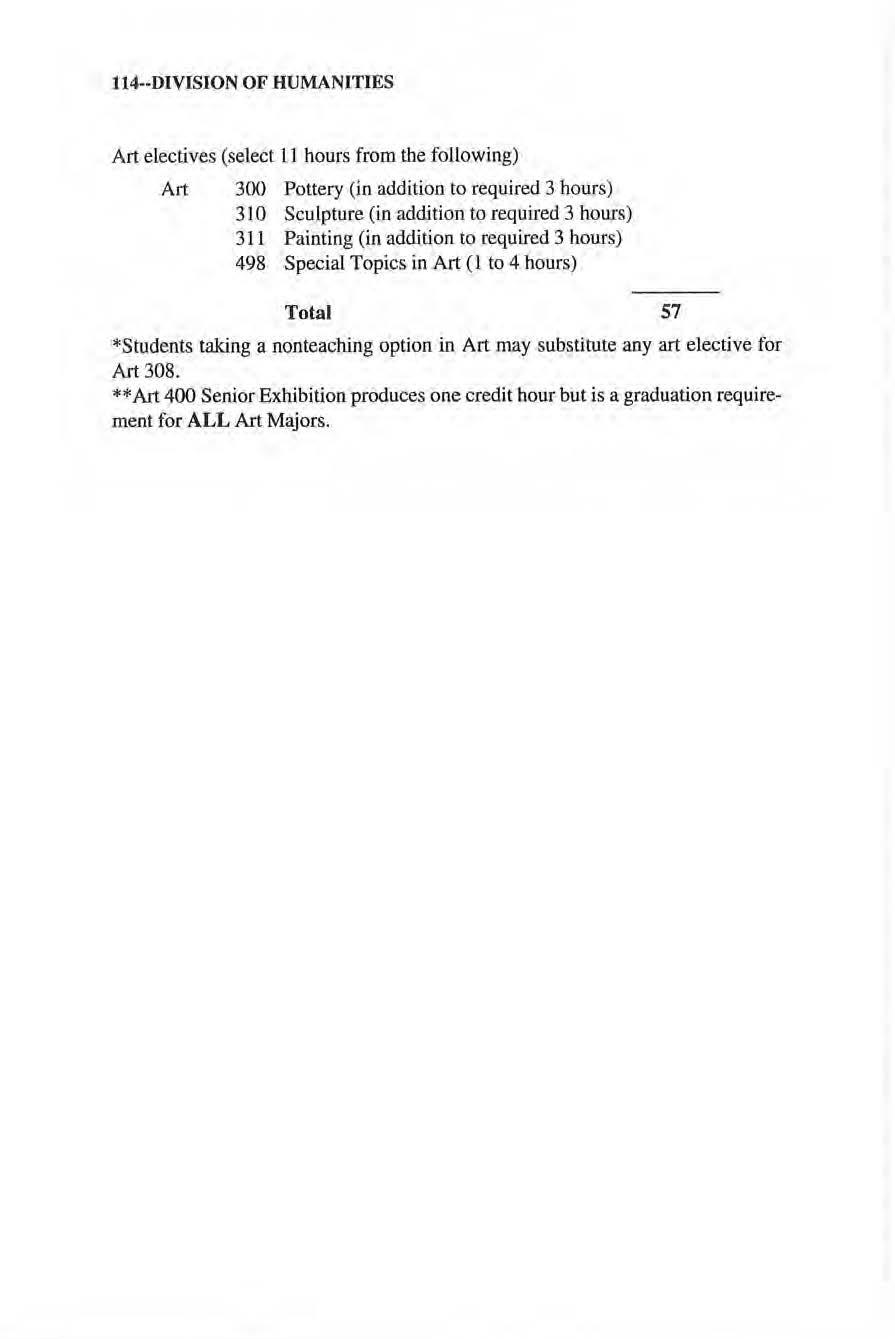
A1t 300 Pottery (in addition to required 3 hours)
310 Scu lpture (in addition to required 3 hours)
311 Painting (in addition to required 3 hours)
498 Special Topics in Art (I to 4 hours)
Total 57
*Students talcing a nonteaching option io Art may s ubstitute any art elective for Art 308.
** Art 400 Senior Exhibition produces one credit hour but is a graduation requirement for ALL Art Majors.
t 14--DIVISION OF HUMAN JTlES
(7-12 Field
Select twelve ( 12) hours from the following courses with at least one course from each area:
*Students preparing to teach in middle school are required to take Eng 203.
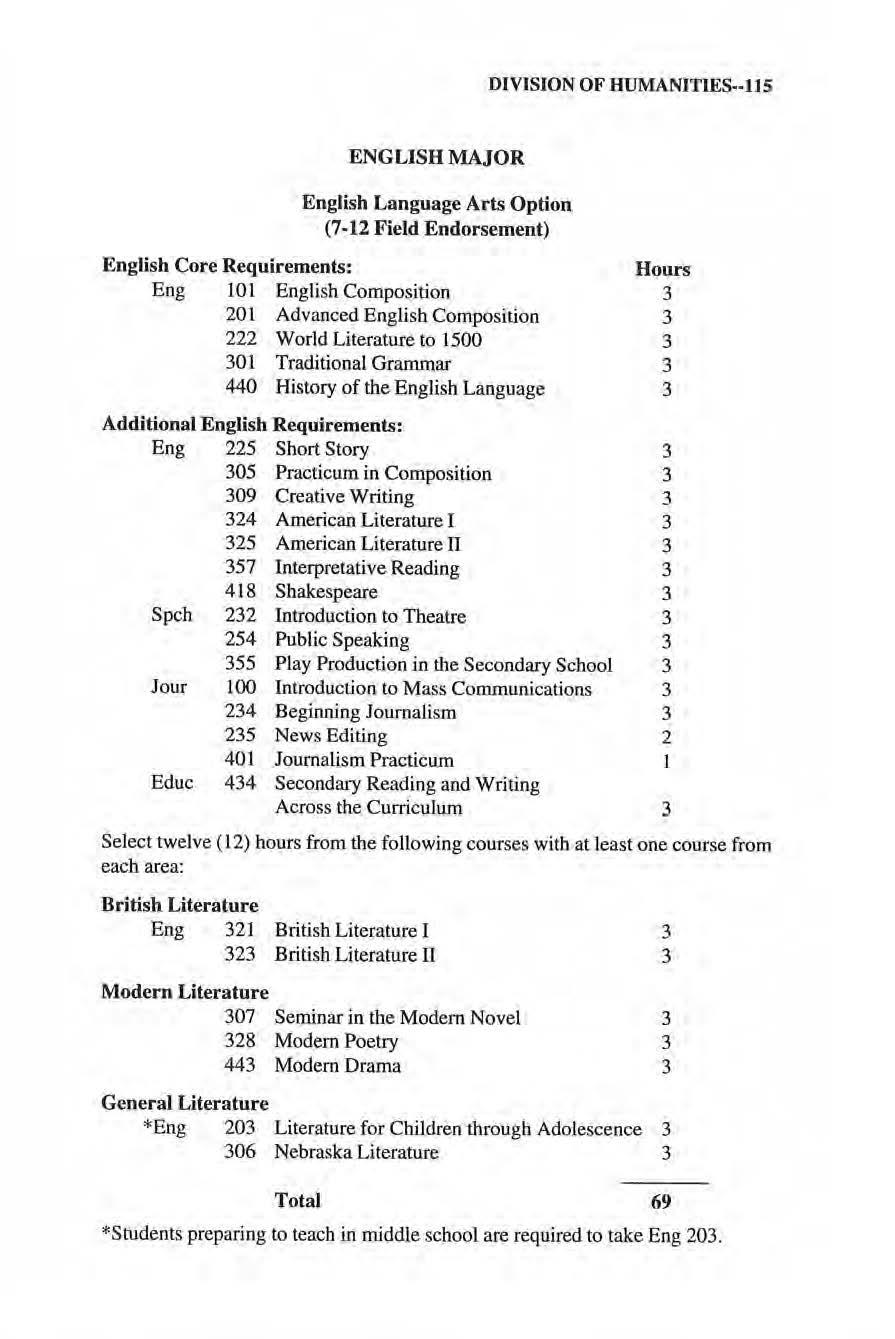
DIVlSION OF HUMANlTIES--115
English Language Arts Option.
Endorsement) English Core Requirements: Eng 101 English Composition 201 Advanced English Composition 222 World Literature to 1500 301 Traditional Grammar 440 History of the English Language Additional English Requirements: Eng 225 Short Story 305 Practi cum in Composition 309 Creative Writing 324 American Literature I 325 American Literature II 357 Interpretative Reading 418 Shakespeare Speh 232 Introductio n to Theatre 254 Public Speaking 355 Play Production in tl1e Secondary School Jour 100 Introduction to Mass Communications 234 Beg;inning Journalism 235 News Editing 401 Journalism Practicum Educ 434 Secondary Reading and Wri ting Across the CurricuJum Hours 3 3 3 3 3 3 3 3 3 3 3 3 3 3 3 3 3 2 I 3
ENGLISH MAJOR
British Literature Eng 32 1 British Literature I 323 British Literatuxe II Modern Literature 307 Seminar i n the Modem Novel 328 Modern Poetry 443 Modern Drama General Literature 3 3 3 3 3 *Eng 203 Literature for Children through Adolescence 3 306 Nebraska Literature 3 Total 69
Select twelve ( 12) hours from th e following cou rses with at l east o ne co urse from each
*Students taking a nonleaching option in English may substi tute fo r En g 3 0 5 and Educ 434 any cou rse from the English e lectives
**Students preparing to teach in middle school are required to take Eng 203.
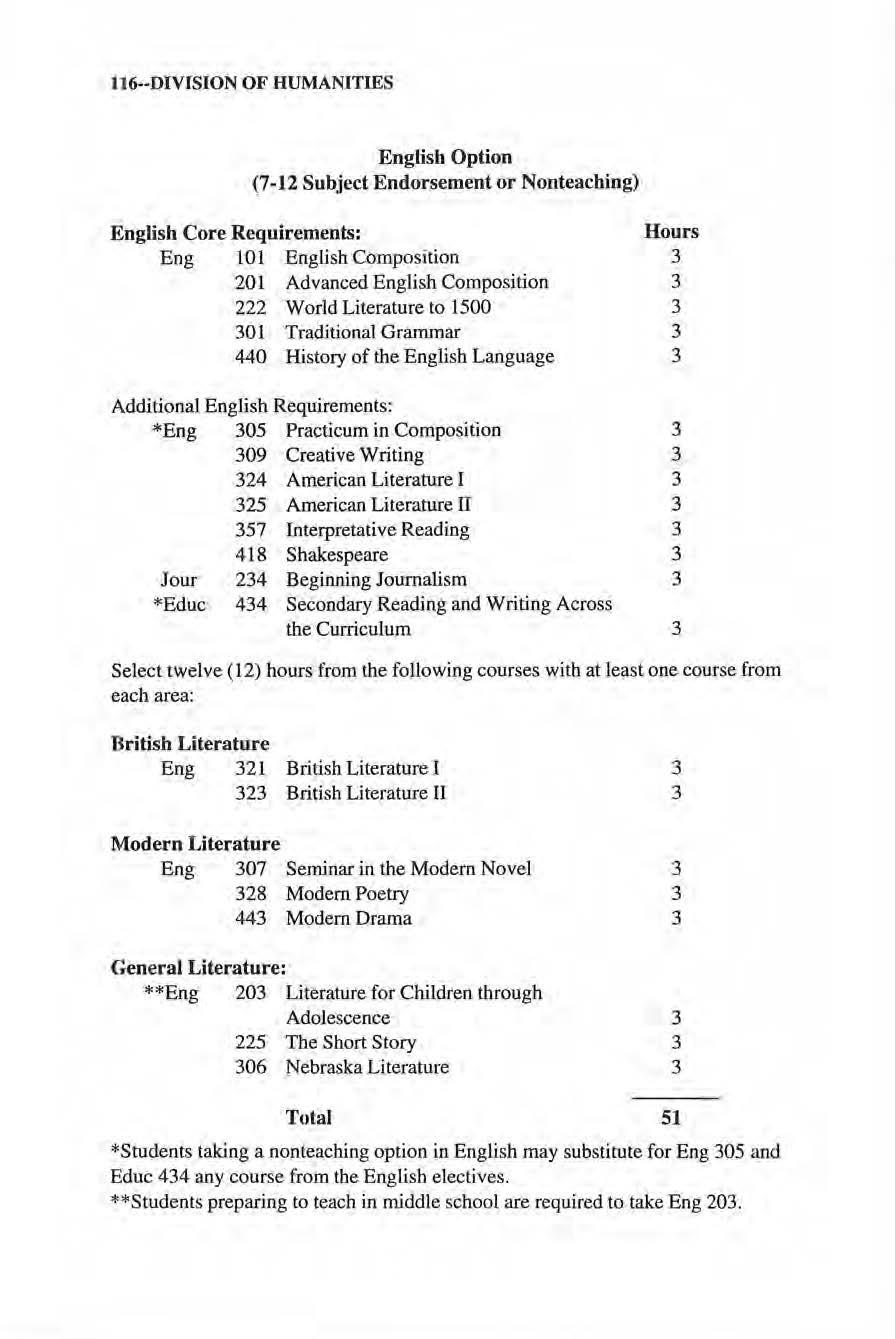
116--DIVJSION OF HUMANITIES English Option (7-12 Subject Endorsement or Nonteacbing) E nglish Core Requirements: Eng 101 English Composition 20 l Advanced English Composition 222 World Literature to 1500 30 1 Traditional Grammar 440 History of the English Language Additional English Requirements: *Eng 305 Practicum in Composition 309 Creative Writing 324 American Lite rature I 325 American Literature II 357 lnterpretati ve Reading 4 18 Shakespeare Jour 23 4 B eg inning Journa li sm *Educ 434 Secondary Reading a nd Writing Across the Curriculum Hours 3 3 3 3 3 3 3 3 3 3 3 3 3
British Literature Eng 32 1 Bri tish Literatu re [ 323 British Literature II Modern Literature E ng 30 7 Seminar in the Modero Novel 328 M odem Poetry 443 M odem Drama Gene ral Literature: **Eng 20 3 Literature for Children through AdoJescence 225 The Short Story 306 Nebraska Literature Total 3 3 3 3 3 3 3 3 51
area:
ENGLISH SENIOR COMPETENCY: SENIOR PORTFOLIO
After declaring the Engli sh/L anguage Arts major, each s tudent will begin to compi le eight exams or papers which will make up the completed Senior Portfolio The English Department will provide specific details to majors on the required s ubmiss ion s. During the first semester of the junior year, majors must schedule an interview with a minimum of two English department faculty members to discuss their perceptions regarding current personal a bilities and expectations for the future, as well as to receive s uggestion s fro m the faculty regarding areas where they may need improvement. Toward the end of the final semester of the senior year, majors will schedule an exit intervi ew with the English department for portfolio assessment.
IDSTORV - SEE SOCIAL SCIENCE MAJOR MUSICMAJOR
The Music Minor (Nonteaching) option a nd the Mu sic- Marketing (Nonteaching) option are open to all students who have prior experience reading music and have the ability to perform on a wind or percussion in s trument, piano, or as a vocalist. Those studen ts seeking to earn the Music-Education (K-6 or K- 12 endorsements) or Music-Performance (Nonteaching) options will be conditionally accepted into the program. Besides needin g to h ave the ability to read music and perform, studen ts mu s t also satisfy two l eve ls of qualification before being fully accepted into the music education or performance programs.
Level I Qualification: Mus ic -Education or Music-Pe rforman ce
1. The student must have achieved at least a 2.5 overaU GPA after compl eti ng two consecuti ve semesters.
Level II Qual,ification: Music-Education
1. The student must be free from disciplinary probation.
2. The student must have achieved at least a 2.5 overall GPA after completing four consecut ive semes ters.
3. The student must achieve on the Pre- Professional Skills T est (PPST) a minimum score of 170 - reading comprehension, 17 1 - math, and I 72 . composition
4. The student must submit letters of recommendation from three faculty ( two should be music facu lty) who are in a position to assess the student as a prospective teacher.
5. The student must compl ete an interview conducted by a faculty member.
L evel II Qualification: Music-Performance

1. The student must be free from di sciplinary probation.
2. The student must have achieved at least a 2.5 overall GPA after comp let ing four consecut ive semeste rs.
OlVJSION OF RUMANITlES--117
3. The student must submit letters of recommendation from three faculty (two should be music faculty) who are in a position to assess the student ' s attitude, motivation, and enthusiasm toward music performance.
4. After four consecutive semesters the student must perform a qualifying audition consisting of a prepared piece and a demonstration of fundamental music performance skills, such as sight reacting, scales, or other skilJs appropriate to the performancemectium.
Special Mus ic Major Regulations and Information
I , All music majors are required to participate in a large ensemble each semester of full-time enrollment even though only a limited number of credits may count toward meeting graduation requir ements.
2. Music majors are required to take final examinations in their major applied area before a jury of music faculty members at the end of each semester.
3. All music majors are required to register for Muse 100 each semester until they have completed the established number of semesters of recital attendance.
4 , Music-Education majors are req uired to have at least two semesters of private voice and private piano instruction for certification purposes.
5. Students pu rsuing either of the Music-Education majors are required to pas s a functional piano examination (Muse 200) before enrolling in student teaching. During the semester students are enrolled for Muse 200 they should concurrently be enrolled for Applied Piano.
6. Music-Education (K-12 Vocal/Instrumental) majors are required to give a senior recital (Muse 440). Music~Performance majors are requi red to give a j unior recital (Muse 340) and a senior recital (Muse 440). Students should concurrently be enrolled for applied music during the semester they are enrolled for the junior or senior recital.
7. Music-Performance majors during the freshman year are limited to taking only one hour of applied music instruction in the major applied area. Commencing with the sophomore year, Music-Performance majors will need to take two (2) hours of private music instruction in the major applied area each semester in order to complete the required number of hours within tbe four (4) years of attendance.
8. Applied music fees a re listed in the financial section of the catalog. Declared music majors are not charged an additional fee for private music instruction. Others taking applied private music instruction will be charged at the established rate.

l l8·•DIVTSION OF HUMANITIES
Music Minor (Nonteaching)

*If tb e major applied area is piano , then two hours of applied voice or applied instrument will be substituted for the two hour applied piano requirement.
Music • Marketing Option (Nonteaching)
*If the major apptied area is piano, then two (2) hours of applied voice or applied instrument will be substituted for the two (2) hour applied piano requirement.
DIVISION OF HUMANITIES--119
Music Core Requirements: Muse 141 Mu sic Theory I 142 Mu sic Theory 11 2 10 World Mus i cs 342 Arranging 442 Musi c Hi s tory n ( 1750-present) Additional Music Requirements: Hours 3 3 3 3 3 Muse J 00 Recital Attendance (4 semesters required) 0 Large Ensemble Performance 4 (select Muse 101 College Band or Muse 102 Co llege Choir) Applied music in one major area (voice, instrument, or piano) 4 *Applied Piano 2 Total 25
Music Core Requirements: Muse 141 Music Theory 1 142 Music Theory II 210 World Mu s i cs 342 Arranging 442 Music Hi story II ( 1750-present) Additional Music Requirements: Hours 3 3 3 3 3 Muse 100 Recital Attendance (4 semesters required) 0 Large Ensemble Performance 4 (select Muse 101 College Band or Muse 102 College Choir) Applied music in one major area (voice, in stru ment, or piano) 4 *Applied Piano 2 Bus 250 Salesmanship 3 328 Principles of Marketing 3 412 Sales Management 3 4 13 Purchasing and Materials Management 3 430 Industrial Marketing 3 441 Cooperative Education Internship 3 492 Marketing Strategies 3 Mu se 363 Music Business 3 Total 49
K-6 Vocal/Elementary Music Education Option (Subject Endm:sement)
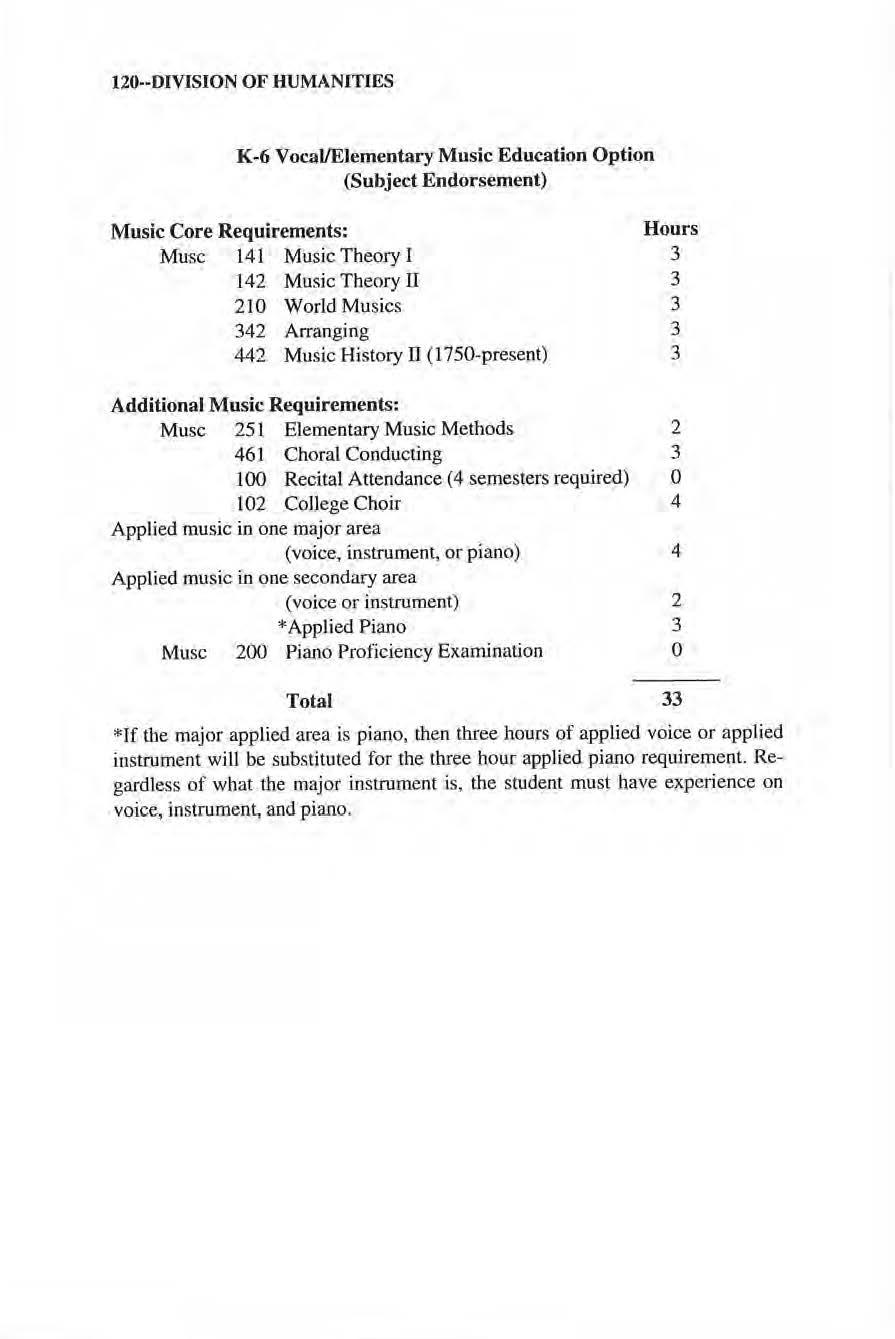
Music Core Requirements:
Additional Music Requirements:
*If the major applied area is piano, the n three hours of applied voice or applied instrument will be substituted for the three hour applied piano requirement. Regardless of what the major instrument is, the student must have experience on voice, instrument, and piano
120--DMSION OF HUMANITIES
Muse
MusicTheoryl 142 Music Theory II
World Musics
Arranging
Music History
141
210
342
442
11 (1750-present)
Muse
Elementary Music
Choral Conducting
Recital Attendance
semeste
College Choir Applied music in one major area (voice, ins trument, or piano) Applied music in one secondary area (voice or instrume nt) *Applied Piano Muse 200 Pi a no Proficiency Examination Total Hours 3 3 3 3 3 2 3 0 4 4 2 3 0 33
25 1
Methods 46 1
100
(4
rs required) 102
K- 12 Vocal/I nstrumenta l Music Educa tion Option (F ield Endorsemen t)
Mus ic Core Requirem ents: Muse 141 Music Theory I
142 Mu si c T heory II
210 World Musics
342 Arrang ing
442 Music History II (1750- present)
Additional Music Requirements : Muse 241 Music Tb eo ry Ill
242 Music Theory IV
25 ( Elementary Music Methods
321 Choral Techniques
322 Band techniqu es
35 1 Brass Ins trument Tech nique s
352 Woodwind Instrument Techniques
362 Percu ss ion Instrument T echniques
441 Music History I (Antiquity - 1750)
46 1 Choral Co nducting
462 Instrumenta l Conducting 100 Recital Atte ndance (6 semesters required)

Large Ensemble Performance (se lect Muse 101 College Band or Muse 102 College Choir)
Small E ns emble Performance (select Muse 105 Brass En se mb le or Mu se 106 Woodwind Ensemble or Muse 107 Madrigal Singers or Muse 108 Percussion Ensemb le)
Applied music in one major area (voice, instrume nt, or piano}
Applied mus ic in one secondary area (voice o r instrument)
* Applied Piano
Muse 200 P iano Proficiency Examination Muse 440 Senior Recital
T otal
*lf the major applied area is piano, then three hours of applied voice or applied instrument will be substitu ted for the three hour applied piano requirement. Regard less of what the major in strument is, the student must have experience on vo ice, instrument, and piano.
DMSION OF HUMANITIES--12J
Hours 3 3 3 3 3 3 3 2 2 2 2 2 2 3 3 3 0 4 3 6 2 3 0
61
*If the major applied area is piano, then two (2) hours of applied voice or applied instrument will be substituted for the two (2) hour applied pi ano requirement.
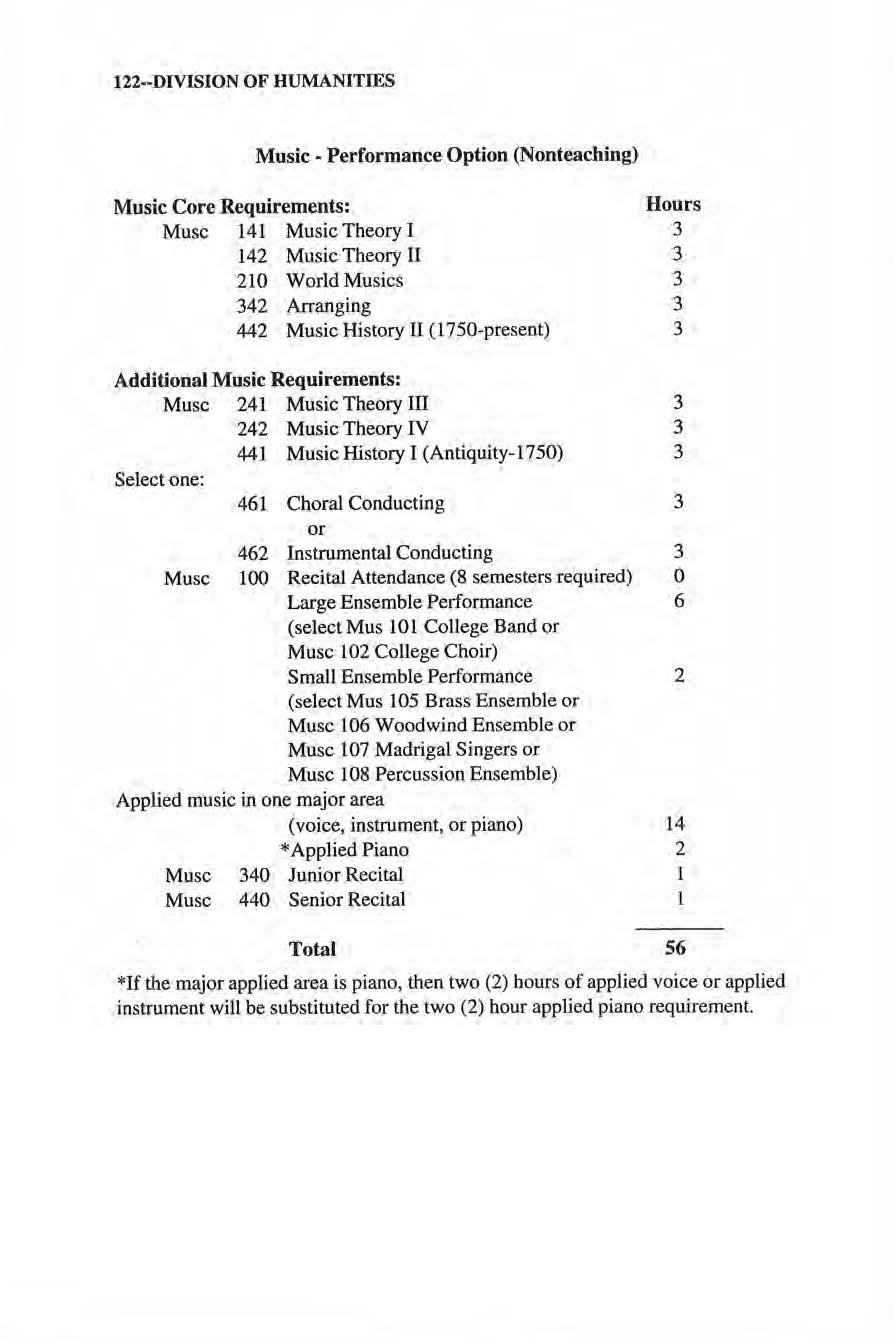
122--DIVISION OF
HUMANITIES
Music Core Requirements: Muse 141 Mu sic Theory 1 142 Music Theory ll 210 Worl d Musics 342 Arranging 442 Music H istory II (1750-present) Additional Music Requirements: Muse 24 1 Music Theory Ill 242 Music Th eory IV 441 Musi c History I (Antiquity-1750 ) Select one: 461 Choral Conducting or Hours 3 3 3 3 3 3 3 3 3 462 Instrumental Conducting 3 Muse 100 R ecital Attendance (8 semesters required) 0 Large Ensemble Performance 6 (select Mus l Ol College Band or Muse 102 College Choir) Small Ensemble Performance 2 (sel ect Mus 105 Brass Ensemble or Muse 106 Woodwind Ensemble or Muse 107 Madrigal Singers or Muse 108 Percussion E nsemble) Applied music in one maj or area (voice, in stru m e nt, or piano) * Applied Piano Muse 340 Juni or Recital Muse 440 Senior Recital Total 14 2 1 l S6
Music • Performance Option (Nonteaching)
PSYCHOLOGY-SOCIOLOGY MAJOR

DIVISION OF HUMANITLES--123
Psychology/Sociology Option (Nonteacbing) Psychology-Sociology Core Requirements: Psyc 121 Principl es of P s ychology 255 Human Relations Soc 201 Principles of Sociology 420 Psych/Soc Theory Additional Psychology Requirements: Psyc 345 Psychology of Personality 250 Human Growth and Development 305 Social Psychology 320 Psychology of Learning Soc 225 Introduction to Cultural Anthropology 250 Community Organization 300 Contemporary Social Problems 340 The Family Select One Psyc 440 Behavior Modification or 450 Abnormal Psychology Select One Soc 230 Sociology of Women or 320 Sociology of Education AdditiooaJ Socia l Work Requirements (select nine (9) hours) Sowk 280 Introduction to Social Work 3 10 Social Service,~ 375 Casework 390 Groupwork 498 Special Topics in Social Work Total Hours 3 3 3 3 3 3 3 3 3 3 3 3 3 3 3 3 3 3 3 3 3 51

124--DMSION OF HU MANITrES Psychology Option (7-12 Subject Endorsement or Nonteaching) Psychology-SocioJogy Core Requirements: Psyc 12 1 Princip les of Psychology 255 H uman Relations Soc 20 l Principles of Sociology 420 Psych/Soc T heory A dditional P syc hology Requirements: Psyc 2 50 Human Growth and Development 305 Social Psychology 320 Psychology of Learning 345 Psychology of Personality 440 Behavior Modification 450 Abnormal P sychol ogy E lect ives in P sychology Total Sociology Option (7- 12 Sub.iect Endorsement o r Nonteaching) P syc hology-Sociology Core Requirements: Psyc 12 1 Principles of Psychology 255 Human Relatio ns Soc 201 Principles of Sociology 420 Psych/Soc 'T11eory Add itional Sociology Requirements: Soc 250 Community Organization 260 Rural Sociology 300 Contempo rary Social Problems 320 Soc iology of Education 32 l Soc iology of Religion 340 T he Famil y E lectives in Soc io logy Total Hours 3 3 3 3 3 3 3 3 3 3 6 36 H ours 3 3 3 3 3 3 3 3 3 3 6 36

DIVISION OF HUMANITIES--125 CriminaJ Justice Option (Nonteaching) Psychology-Sociology C ore Requirements: Hours Psyc 121 P1inciples of Psychology 3 255 Human Relations 3 Soc 201 Principles of Sociology 3 Soc 420 Psych/Soc Th eory 3 AdditionaJ Requirements: CJus 110 Survey of Criminal Justice 3 220 Introduction to Corrections 3 330 The Police 3 440 Juvenile Justice 3 Hum 24 1 Coop Ed. Internship 3 441 Coop Ed. Intemsbip 3 Soc 300 Contemporary Social Problems 3 340 The Family 3 360 Criminology 3 370 Ethnic Group Re l ations 3 Hist/ PSci 426 American Constitutional Law 3 Psyc 450 Abnormal Ps ychology 3 or Psyc 440 Behavior Modification 3 Electives • Select two SoWk 280 Introduction to Social Work 3 310 Social Services 3 390 Group Work 3 Psyc 460 Psycho log y of Correctional & At-Risk Youth 3 Soc 480 Social Science Research 3 Span 101 Introductory Spanish 5 Total 54-56
SOCIAL SCIENCE MAJOR
Ex cluding the 12 hour social science cognate a rea above, select electives in the remaining soc ial science cognate areas of
with at least three (3) hours in each cognate area.
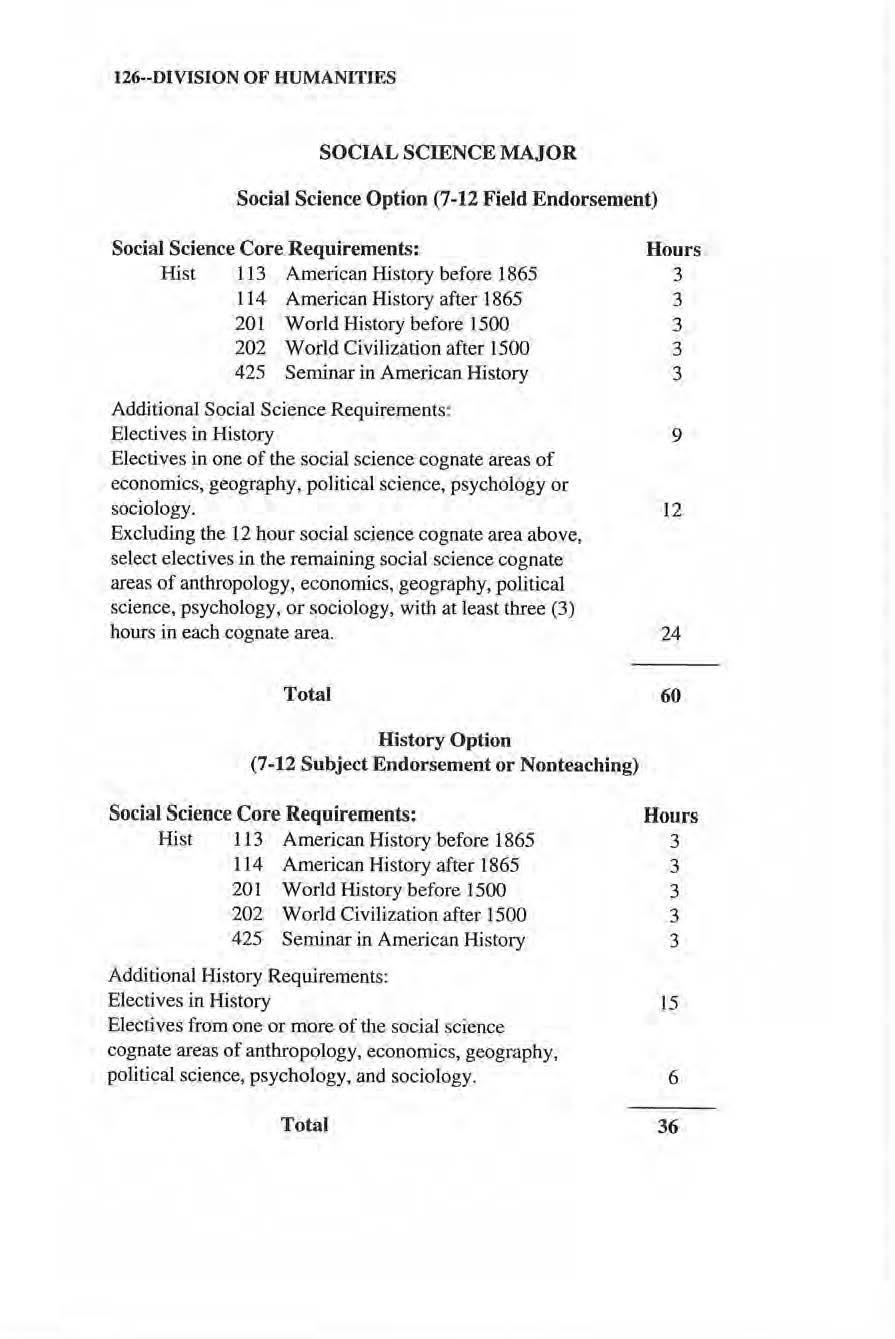
126--DIVJSlON OF HUMANITIES
Social Science Option (7- 12 Field Endorsement) Social Science Core Requi rements : Hist 113 American History before J 865 11 4 American Hi story after 1865 201 World History before 1500 202 World Civilization after 1500 425 Seminar in American History
Social
Electives in His tory
ce,
or
Additional
Science Requirements :
Electives in one of the social science cognate areas of economics, geography, political scien
psychology
soc.iology.
economics, geography,
psychology,
sociology,
Total IDstory Option (7-12 Subject Endorsement or Nonteaching) Social Science Core Requirements: Hist 113 American History before 1865 114 American Hi story after 1865 20 I World History before l 500 202 World Civilization after 1500 425 Seminar in Ameri can Hi story Additional History Requirements: Electives in Hi story Electives from one or more of the social science cognate areas of anthropology, economics, geogmphy, political sc ience, psychology, and soc iology. Total Hou rs 3 3 3 3 3 9 12 24 60 Hours 3 3 3 3 3 15 6 36
anthropology,
political science,
or
PRE-LAW STUDY
The term Pre-Law refers to a student's intention to pursu e advanced studies at a law school, not to any prescribed major or curriculum. Adequate preparations for entrance into a ranking Jaw school requires a bachelor's degree. Neither tbe committee on pre-law education of the American Bar Association nor leading law schools spec ify a particular undergraduate major or prescribe a specific pre-law program, but tbey do stress the ability to read perceptively, to write intelligently, to use a Library, and to eval uate evidence. Success in law school requires inte llectual depth and breadth as we ll as certain s kills and insights relevant to law study. Since many of the goals of legal ed ucation are also the goals of liberal education, law schools recommend that pre-Jaw students obtain the widest possible undergraduate experience consistent with their professional objectives. Literate, well-informed students with broad general educations te nd to succeed in law school. Those students aspiring to enter law school , then, may major a nd/or minor in any number of fields that will aid them in attaining the following:

* Compositional skiJls and oral prese ntatio ns skills.
* A broad unders tanding of the English language.
* A solid background of American history and govern me nt.
* A broad knowledge of society and its institutions.
* A fundamental understanding of business, including basic acconnting skills.
* Critical thinking and the ability to reason.
The undergraduate curricula of Peru State College provide a sound found ation fo r pre-law study and offer students an opportunity to challenge and expand their capacities to the fullest. Students planning a legal career should inform their academic adv isor of this fact early in t heir undergraduate years in order for the st udents and the advisor to make important dec isions regarding the selection of courses. Pre-Jaw advising is h ighly individualized. It is determined by the major the student has selected and the unique goals of each student. During the senior year the student will need to register for the Law School Admissions Test (LSAT). Acceptance into law school will depend upon many factors, of which scores on the LSAT and grade point average are usually but partial criteria. Other factors generally considered by law schools include campus and community involvement, work experience, and letrers of recommendation. The PSC undergraduate experience provides an excellent opportunity to demonstrate s t rength in thes e additional areas.
DIVISION OF HUMANITIES••l27

128--DIVISlON OF HUMANITIES SUGGESTED PlIB-LAW COURSES Computer Science 102 Introduction to Computer Concepts Criminal Justice 110 Survey o f Criminal Ju stice English 075 Speed Reading 301 Traditional Grammar 308 Technical W rit ing 309 Creative Writing Speech 254 Public Speaki ng 357 Interpret ative Reading History 11 3 U. S. His tory Before I S00 114 U.S. History Afte r 1500 201 World Civilization to 1500 202 World Civ ili zation since 1500 Political Science 201 American National Government 202 State and L ocal Government 426 American Constit utional Law *468 Public Administration Sociology 201 Principles of Sociology 225 Introduction to Cultural Anthropology Business 23 1 Principles of Fina ncial Accounting 251 Lega l Environment and Contract Law *468 Public Administra tion Economics 220 Principles of Macroeconomics Math 340 Statistics Philosophy 201 Introduction to Philo sophy * denotes cross-listed courses Sugges ted Major Fields of Study Engl is h Hi s tory Business Social Science Soc iology
DIVISION O F SCIENCE AND TECHNOLOGY
Chair: Dr. David L. Pi ppert
Professors: Long, Pipp e rt
Associate Professors : Clopton, Klubertanz
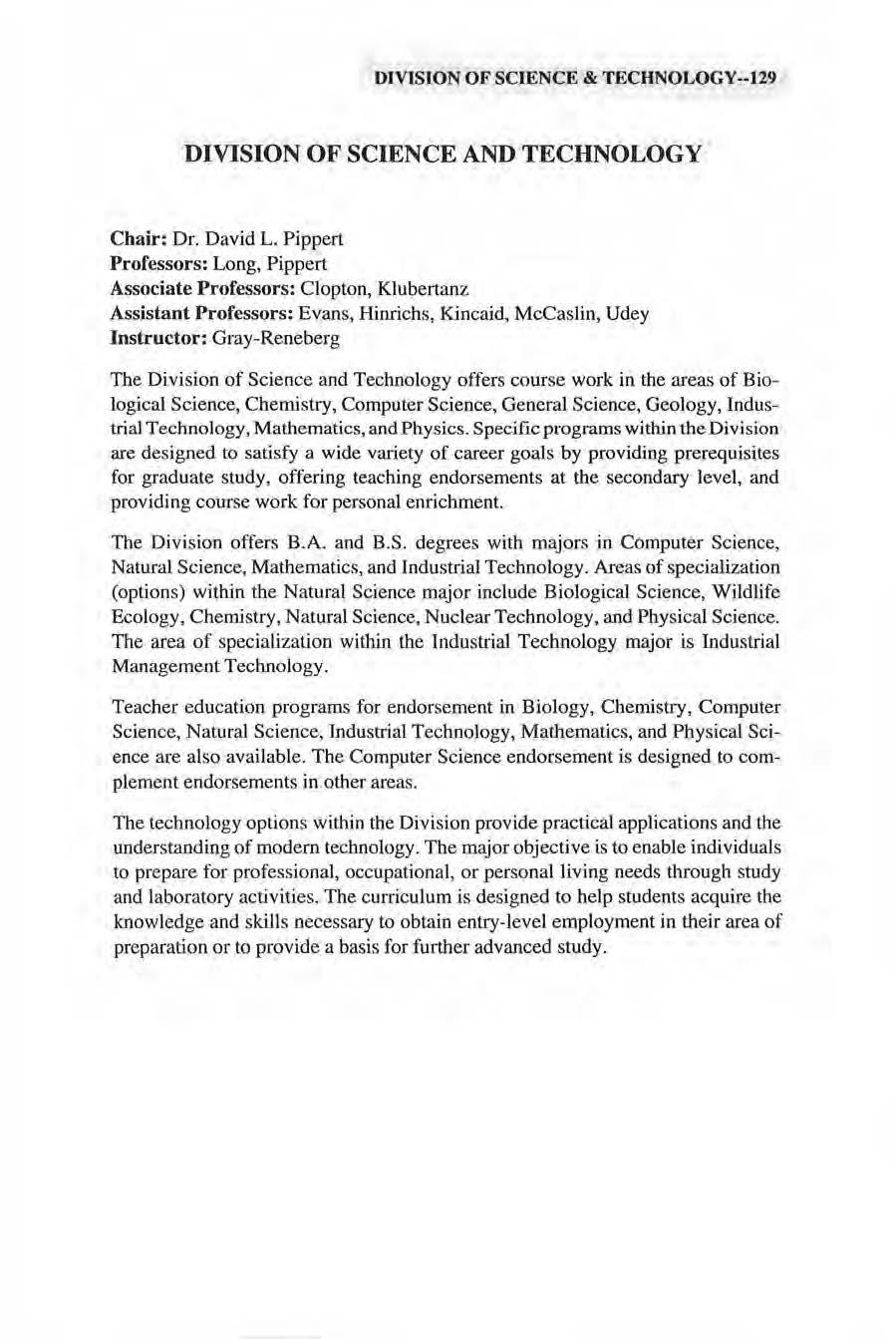
Ass.is tant Professors: Evans, Hinrichs, Kincaid, Mccaslin, Udey
Instructor: Gray-Reneberg
The Division of Science and Technology offers co urse work in the areas of Biological Science, Chemistry, Computer Science, General Scie nce, Geology, Indu striaf Technology, M ath emat ics, and Phy sics. Specific programs with.in theDlvision are designed to satisfy a wide variety of career goals by providing prerequisites for graduate study, offering teachin g endorsements at the secondary level, and provjding course work for personal enrichment.
The Div ision offers B.A and B.S. degrees with majors in Computer Science, Natural Science, Mathemati cs, and Industrial Technology. Areas of special ization (optio ns) with.in the Natural Science major include Biological Science, Wildlife Ecology. Chemistry, Natural Science, Nuclear Technology, and Phys ica l Scjence. The area of s pecial.ization within the Indu strial T echnology major is Industrial Management Techno lo gy .
Teacher education programs for endorsement in Biology, Chemistry, Computer Science, Natural Science, Indu strial Technology, Mathematics, and Physical Scie nce are al so available. The Computer Sc ience endorsement is des igned to complement endorsements in other areas.
Th e technology options within the Division provide practical applications and the understaoding o f modern tech nology. The major objective is to e nabl e individuals to pre pare for profess ional, occupational, or person al living needs through study and laboratory activities. The curriculum is d esigned to help students acquire the knowledge and skil ls n ecessary to obtain entry- level employment in their area of preparation or to provide a basis for further advanced study.
DIVlSION OF S CIENCE & TECHNOLOGY- -129
NATURAL SCIENCE MAJOR
The Natural Science Bachelors Degree Program (B.S., B.A.) consists of a core of courses to provide the students with a general background. [n addition to completing these core courses, the studen t must also select and complete o ne of the several options withi n the curriculum. These options w ill allow the student to work towards one of a variety of career and occupational goals.
T he Biological Science option is designed for students planning to enroll in a graduate or professional school after completion of the baccalaureate degree.
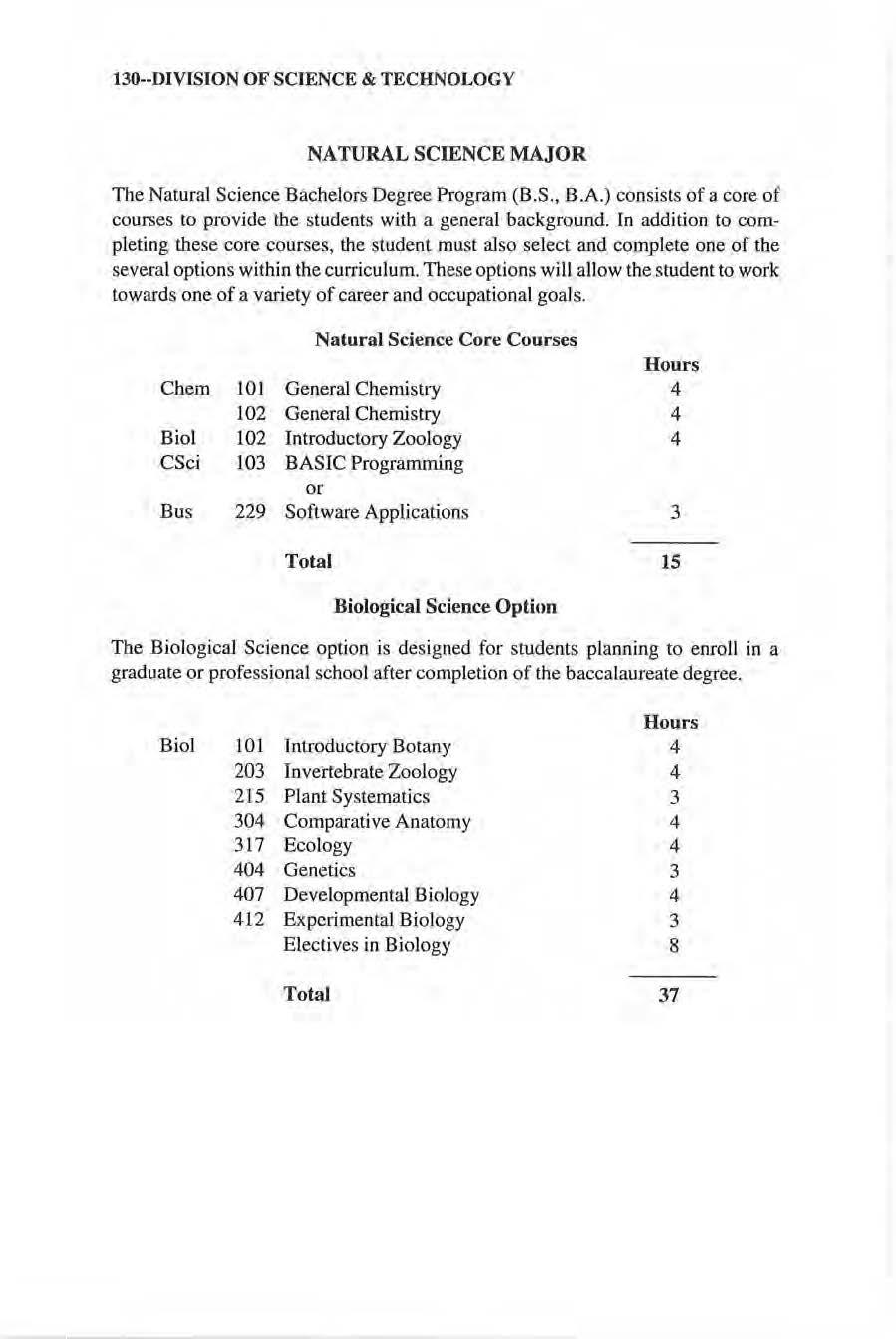
130 DIV fSION OF SCIENCE & TECHNOLOGY
Natural Science Core Co u rses Hours Chem 101 Gener al Chemistry 4 102 General Chemistry 4 Biol 102 I ntroductory Zoology 4 CSci 103 BASIC Programming or Bus 229 Software Applications 3 T otal 15 Bio logical Scien ce Opt ion
Hours Biol 101 Introductory Botany 4 203 Invertebrate Zoology 4 215 Plant Systematics 3 304 Comparative Anatomy 4 317 Ecology 4 404 Genetics 3 407 Developmental Biology 4 412 Experimental Biology 3 Electives in Biology 8 Total 37

J>lVISION OF SCIENCE & TECHNOLOGY--13 1
The Wildlife Ecology option is designed for students interested in careers as conservation officers or park rangers. Hours Biol 101 Introductory Botany 4 203 Invertebrate Zoology 4 215 Plant Systematics 3 225 Freshwater Biology 3 3 17 Ecology 4 395 Mammalogy 3 404 Genetics 3 411 Ornithology 3 412 Experimental Bio lo gy 3 486 Wildlife Management Techniques 3 Math 340 Statistics 3 Electives in Biology 8 Total 44 Biology Subject Endorsement Option A biology subject e ndorsement is offered as part of the teacher education program. Biol Geol GSci Math 101 203 2 15 301 304 312 317 404 20 1 100 130 Hours introductory B o tany 4 Invertebrate Zoology 4 Plant Systematics 3 Microbiology 4 Comparative Anatomy 4 Human Physiology 4 Ecology 4 Genetics 3 Physical Geology 4 Physics 4 Principles of Modem Mathematics 3 Total 41
Wildlife Ecology Option
Chemistry Subject Endorsement Option
A chemistry subject endorsement is offered as part of the teacher education program.
1l1e requirements Listed represent both the education and non -education degree programs. ff the teaching endorsement is chosen, attention must be gjveo to the additional courses required for entrance into the teacher education program professional semester. Tn the teac her education program, Natural Science is a field endorsement.

132- -DIVISION OF SCffiNCE & TECHNOLOGY
Chern Math GSci Phys Geol 205 Principles of Qualitative Analysis 206 Principles of Quantitative Analysis 303 Organic Chemistry 304 Organic Chemistry 43 I Biochemistry 499 Independent Study in Chemistry 225 Calculu s with Analytic Geometry I JOO Phys ics or 201 General Physics 201 Physical Geology Total Natural Science Option .Hours 4 4 s 5 4 3 5 4 4 38
Biol 101 203 312 317 Chem 142 205 Phys 201 202 GSci 499 IT 328 Geol 201 202 203 304 Geog LOI Phys 306 Math l30 225 Introductory Botany Invertebra te Zoology Human Physiology Ecology Introductory Organic and Biochemistry Principles of Qualitative Analysis General Physics General Phys ics Tndep. Study Modern Physics Analog Electronics Physical Geology or Roc ks & Mineral s or Introductio n to Fossils Meteorology and Climatology Physical Geography Astronomy Principles of Modern Mathematics Calculus with Analytic Geometry Total Hours 4 4 4 4 4 4 4 4 4 3 4 3 3 3 3 5 60
Nuclear Technol ogy Option
In addition to the specific coursework requ irements l isted below, the candidate for this option must also be a licensed reactor operator. Questions regarding this program should be directed to tbe Chair of the Division ofScience and Technology.
The requirements listed represent both the education and non-education degree programs. If the teaching endorsement is chose n, attention must be given to the additional courses required for entrance into the teacher education program profess ional semester lo the teacher education program, Physical Scien ce is a field endorsement.

DIVIS ION OF SCIENCE & TECHNOLOGY--133
Math 225 Calculus with Analytic Geometry I 226 Calculus with Analytic Geometry JI Phys 20 I General P hysics 202 General P h ysics Biol 210 Hwnan Anatomy 1T 127 Principles of Power Transmission 132 Materials P rocessing 1 233 Electricity/Electronics Computer Science or N uclear Physics elective Total Physi cal Sci ence O pt i o n Hou rs 5 5 4 4 4 3 3 3 3 34
Hours Biol 101 I ntroductory Botany 4 Chem 205 Princip les of Qualitative Analysis 4 303 Organic Chemistry 5 304 Organic Chemistry or 206 Principles of Quantitative Analys is 4-5 GSci 100 Physics 4 Phys 201 General Physi cs 4 202 General Physics 4 306 Astronomy 3 IT 328 Analog Electronics .3 Geol 201 Physical Geology 4 202 Rocks and Minerals or 203 Introduction to Foss il s 3 304 Meteorology and Climatology 3 Math 130 Principles of Modem Mathematics 3 225 Calcu l us with Analytic Geometry 5 Tota l 53-54
COMPUTER SCIENCE MAJOR
After completing a core c urriculum , two options are available to students interested in a Computer Science major, the technical option and the business application option. Students majoring in other areas and seeking background in computers may select the Computer Science minor.
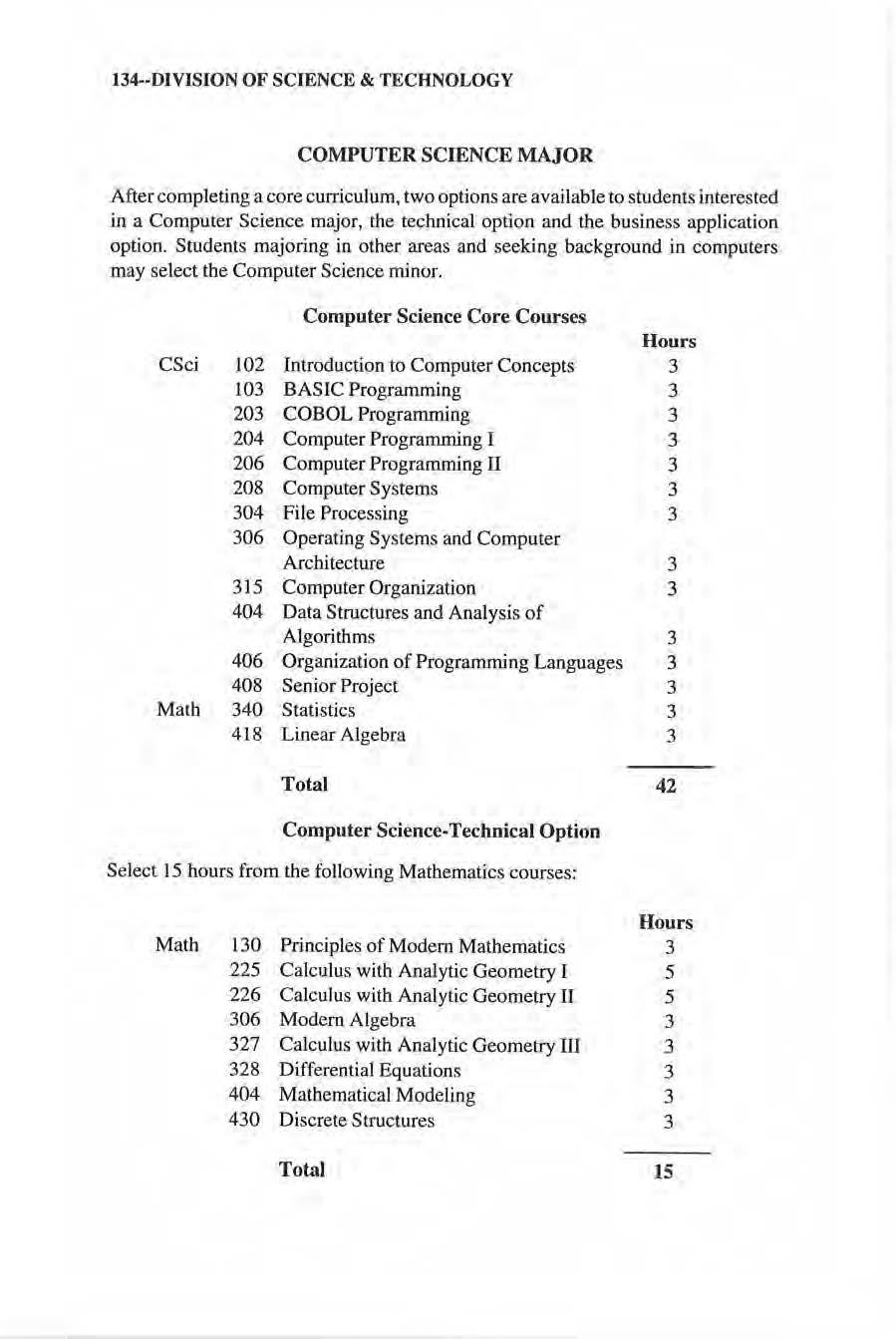
134-- DIVJSlON OF SCIENCE & TECHNOLOGY
Computer Science Core Courses Hours CSci 102 Jntroduction to Computer Concepts 3 103 BASIC Programming 3 203 COBOL Programming 3 204 Computer Programming I 3 206 Computer Programming II 3 208 Computer Systems 3 304 File Proces sing 3 306 Operati ng Systems a nd Computer Architecture 3 315 Computer Organization 3 404 Data Structures and Analysis of Algorithms 3 406 Organization of Programming Languages 3 408 Senior Project 3 Ma1b 340 Statistics 3 418 Linear Algebra 3 Tota l 42 Compttter Science-Technical Option Select J5 hours from the following Mathe matics courses: Hours Math 130 Principles of Modem Mathematics 3 225 Calculus with Analytic Geometry I 5 226 Calculus with Analytic Geometry 1T 5 306 Modem Algebra 3 327 Calculus with Analytic G eo metry ill 3 328 Differential Equation s 3 404 Mathematical Mode ling 3 430 Discrete Structures 3 Total 15
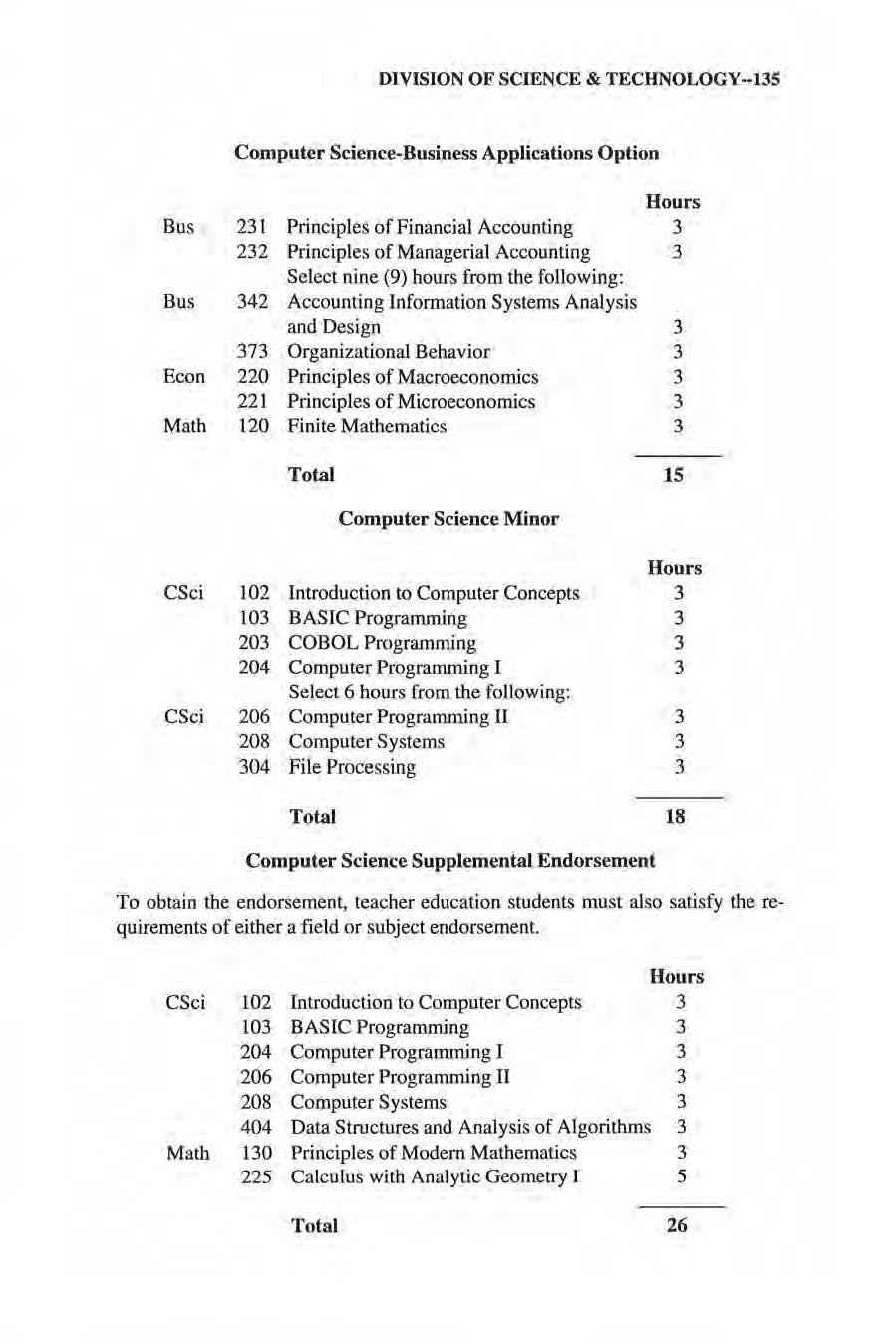
DIVISION OF SCffiNCE & TECHNOLOGY--135 Computer Science-Business Applications Option Hours Bu s 231 Pri nciples of Financ ial Accounting 3 232 Principles of Managerial Accounting 3 Select nine (9) hours from the following: Bus 342 Accounting I nformation Systems Analysis and Design 3 373 Organizational Behavior 3 Econ 220 Principl es of Macroeconomic s 3 221 Princ iples of Microeco nomi cs 3 Math 120 Finite Mathe matics 3 Tot.al 15 Computer Science Minor Hours CSci 102 Introd uction to Computer Concepts 3 103 BASIC P rogramming 3 203 COBOL Programming 3 204 Computer Programming I 3 Select 6 hours from the following: CSci 206 Computer Programming U 3 208 Computer Systems 3 304 File Processing 3 Total 18 Computer Science Supplemental Endorsement
endorsement,
her education stude nts mu st
the re-
of
CSci Math 102 103 204 206 208 404 130 225 Introduction to Computer Concepts BASIC Programming Hours 3 Computer P rogramming I Computer Programming IT Computer Systems Data Structures and Analysis of Algorithms Principles of Modern Mathematic s Calculus with Analytic Geometry I Total 3 3 3 3 3 3 5 26
To obtain the
teac
also satisfy
quirements
either a field or subject endorsement.
MATHEMATICS MAJOR
The mathematics major bas two options, a mathematics option and a mathematics education option (field endorsement).
If the mathematics education option is chosen, attenJion must be given to the additional course work requirements for entrance into the secondary teacher education program and to the professional semester. Mathematics is a field endorsement io the teacher education program

136--DlVISlON OF SCIENCE & TECHNOLOGY
Mathematics Core Courses Math 130 Principles of Modem Mathematics 225 Calculus with Analytic Geometry f 226 Calculus with Analytic Geometry U 327 Calculus with Analytic Geometry m 304 Modern Geometry 340 Statistics 418 Linear Algebra Required: 13 hrs Math 328 306 490 CSci 204 206 Total Mathematics Option Differential Equations Modern Algebra Seminar in Mathematical Research Computer Programming I Computer Programming IT Hours 3 5 5 3 3 3 3 2S Hours 3 3 I 3 3 Electives: Nine (9) hrs ( a minimum of three (3) courses from the following) Math 404 Mathematical Modeling 3 419 Topology 3 4 30 Discrete Structures 3 440 Advanced Statistics 3 Independent Study and/or Special topics in mathematics may be applied toward the major with the consent of the Division Chair. Total 22

DfVlSION OF SCIENCE & TECHNOLOGY 137 Mathematics Field Endorsement Option Required: 9 hrs Malh 404 Malhematical Modeling CSci l 00 Introduction to Computer Applications I 03 Basic Programming Hours 3 3 3 Electives: Nine (9) hrs (a minimum of three (3) cou rses from lhe following) Math 306 Modern Algebra 3 328 Differential Equations 3 419 Topology 3 430 Discrete Structures 3 440 Advanced Statistics 3 Independent study and/or Special lopics jn mathematics may be applied toward the major with the consent of the Division C hairperson. Total 18
INDUSTRIAL TECHNOLOGY MAJOR
The Indu s tri al T echnology Bachelors D egree Progr am consi s ts of a core of technjcal courses to provide the sruden t with a broad general background of technology. The op tions available within the curriculum enab le the student to specialize i n Jndustrial
Ed ucation o r Indu
Management T echnology,
The Industrial Technology Education optio n is for those who plan to teach Tndu strial Tec hno logy in public orprivatesecondary schoo ls. The p r ofess ional ed ucation requi rements must be met in additio n t o t he courses lis ted for a teaching endorsement.
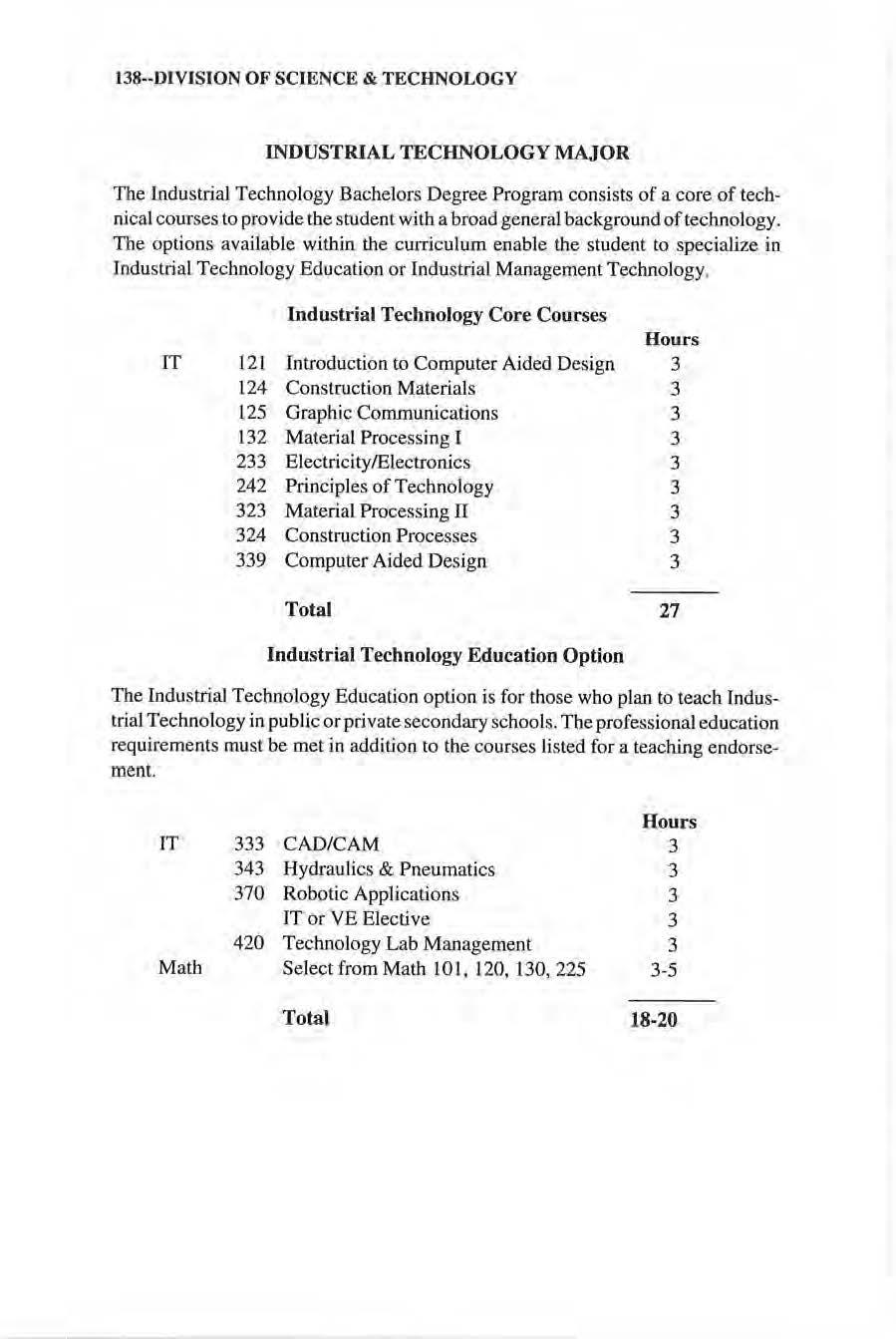
138--DIVJSION OF SCIE NCE & TECHNOLOGY
strial
Industrial Technology Core Courses Hours IT 121 (n troduct ion to Computer Aided Design 3 124 Construc ti on Materials 3 125 Gra phic Communications 3 132 M a t erial Pro cess in g I 3 233 Electricity/Electronics 3 242 Principl es of Technology 3 323 M ateria l Processing IT 3 324 Construction Processes 3 339 Compu ter Aided D es ig n 3 Total 27 Industrial Technology Educati
Technology
on Option
Hours IT 333 C AD/CAM 3 343 H ydrau lics & Pneumatics 3 370 Robotic Application s 3 IT or YE Elective 3 420 Technology Lab Man agement 3 Math Select from M a th IO 1. 120, 130, 225 3.5 Total 18-20
Industrial Management Technology Option
The curriculum for the Indus trial Management Technology option is designed for students whose main objective is preparation for technician and managerial positions in indus try. The curriculum has been developed to include a combination of technjca,I and business courses in order to prepare the graduate for employment in an industrial enterprise.
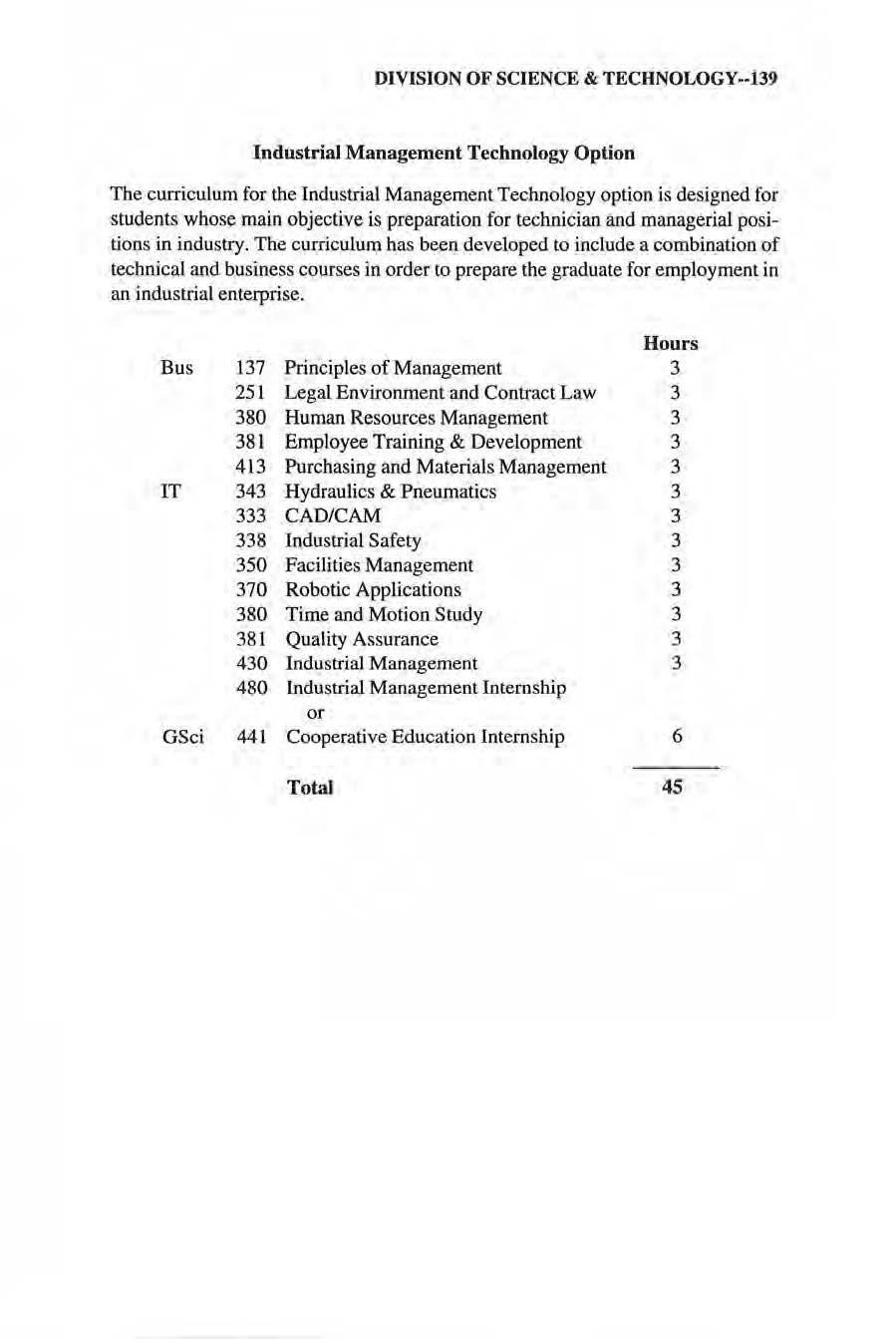
DIVISION OF SCIENCE &TECHNOLOGY--139
Hours Bus 137 Principles of Management 3 251 Legal Environment and Contract Law 3 380 Human Resources Management 3 381 Employee Training & Development 3 413 Purchasing and Materials Management 3 343 Hydraulics & Pneumatics 3 333 CAD/CAM 3 338 Industrial Safety 3 350 Facilities Management 3 370 Robotic Applications 3 380 Time and Motion Study 3 381 Quality Assurance 3 430 Indus trial Management 3 480 Lndustrial Management Internship or GSci 441 Cooperative Education Internship 6 Total 45
Vocational Education
For those see king an endorsement in Vocational Trades and Industrial Education, the following is required in addition to the general degree program.
l. Au emphasis in Industrial Technology
2. A minimum of 12 semester hours in an area of specialization.
3. Six hours from the following vocational courses:
a. Vocational Education 441/541
b. Vocational Education 442/542
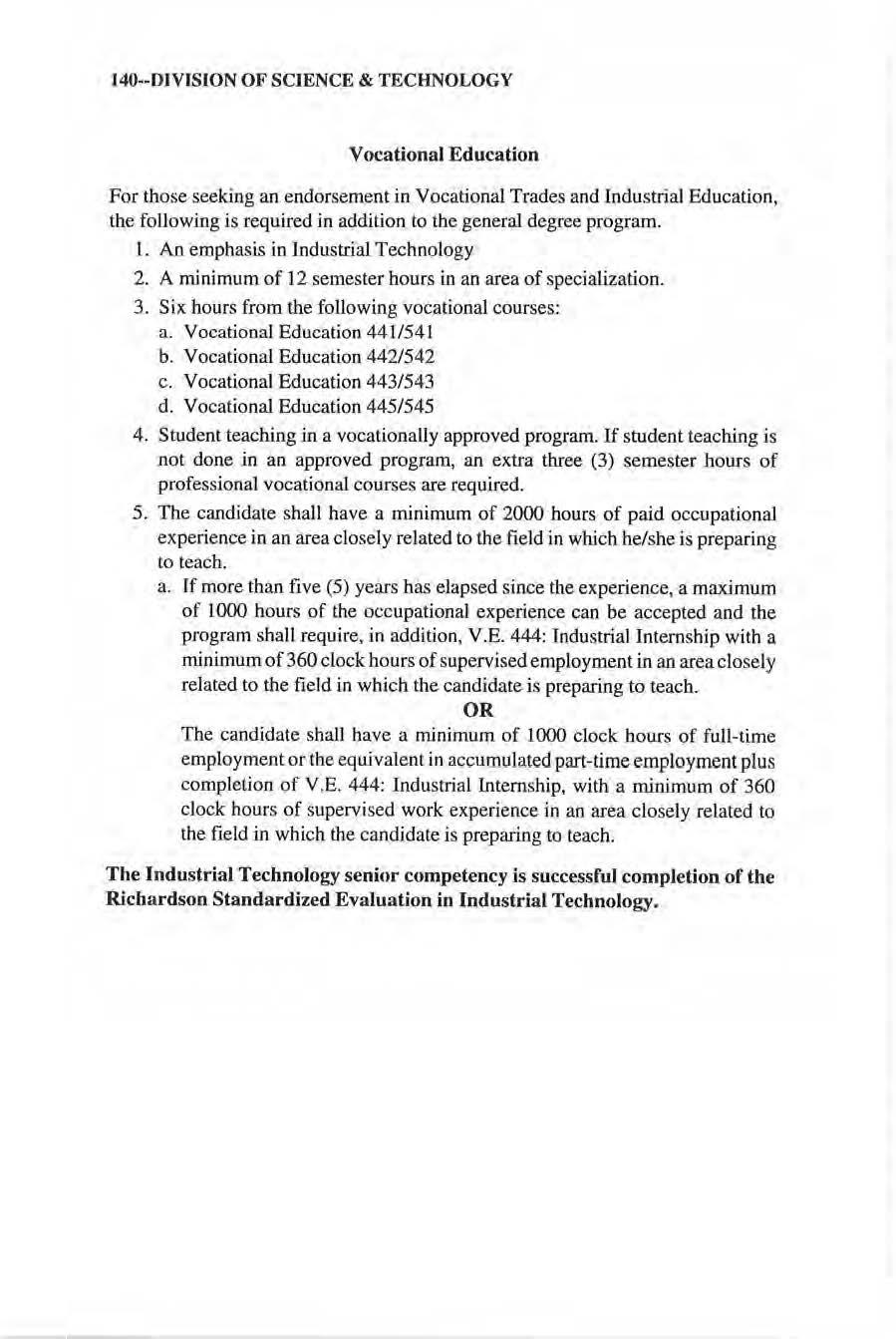
c. Vocational Education 443/543
d Vocational Bducation 445/545
4. Student teaching in a vocationally a pproved program. If student teaching is not done in an approved program, an extra three (3) semester hours of professional vocational courses are required.
5 . The candidate shall have a minimum of 2000 hours of paid occupational experience in an area c lo sely related to the field in which he/she is preparing to teach.
a. If more than five (5) years has elapsed since the experience, a maximum of 1000 hours of the occupational experience can be accepted and the program shall require, in addition, V .E 444: Indu s trial Int ernship with a minimum of 360 clock hours of supervised employment in an area closely related to the field in which the candidate i s preparing to teach.
The candidate sha11 have a minimum of 1000 clock hours of full-time employment or the eq11ivalent in accumulated part-time employment plus completion of V ,E 444: I ndustrial Interns hip, with a minimum of 360 clock hours of supervised work experience in an area clo sely relate d to the field in which the can didate is preparing to leach
The Industrial Technology sen ior competency is successful completion of the Richardson Standardized Evaluation in Industrial Technology.
l40--DJ VISION OF SCIENCE & TECHNOLOGY
OR
Driver Education Endorsement
The fo ll owing program is provided for those who a.re interested in teaching Driver' s Education in the secondary school.
Requirements:
t . A teaching certificate in a field or two subject areas
2. A Nebraska driver' s license
3. A minimum driving record of two years and 20 ,000 miles free from repeated chargeable accidents and/or traffic violations.
4. Complete the following courses:
T be transfer programs l isted in this section may require from one to four years to complete. They do not rep resent academic majors. Students planning to complete a degree at Peru State rnust s atisfy the requirements for a specific academic major in addition to completing the requirements for one of these programs.
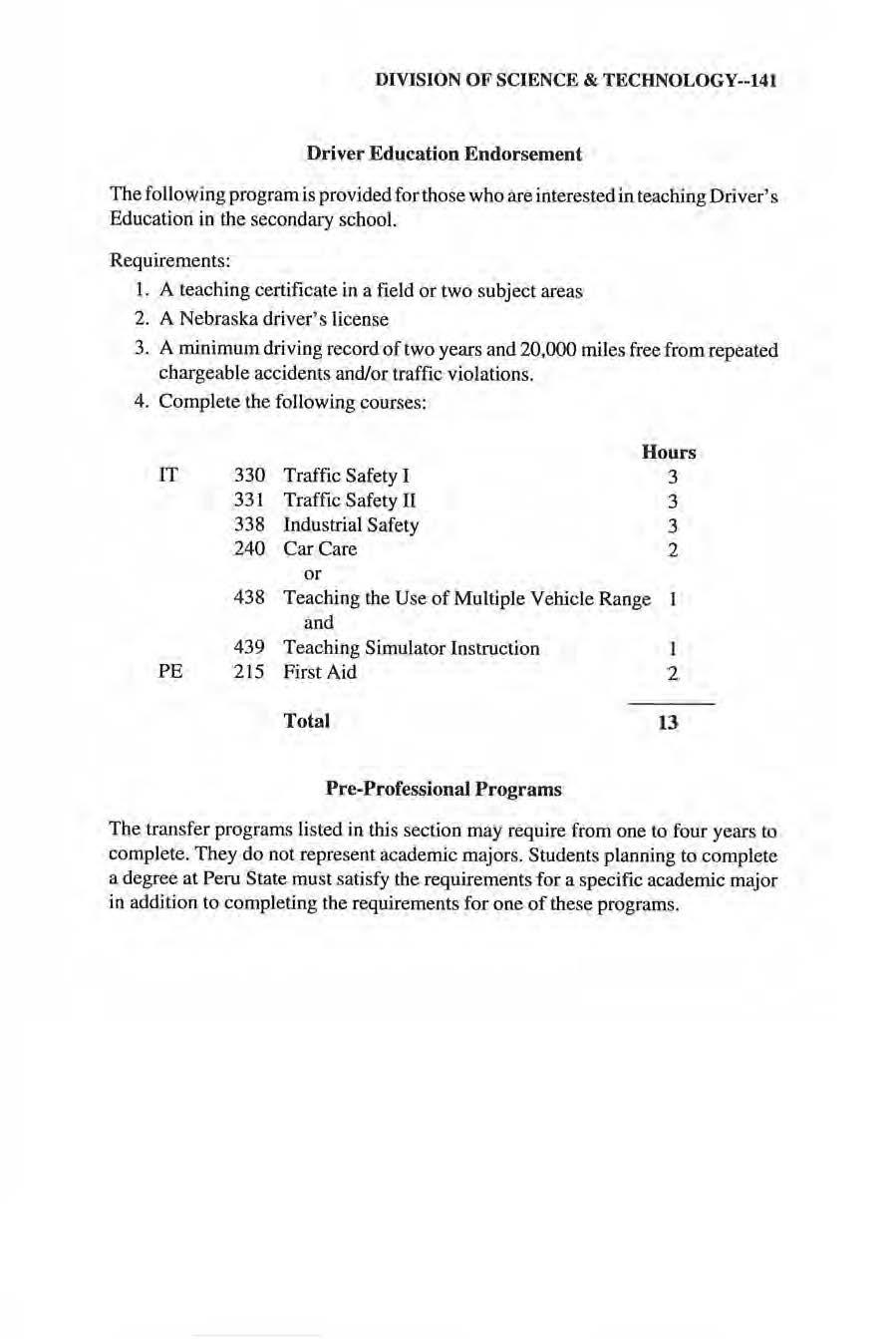
DIVlSION OF SCIENCE & TECHNOLOGY- - 141
IT PE 330 Traffic Safety I 331 Traffic Safety II 338 Industrial Safety 2 40 CarCare or Hours 3 3 3 2 438 Teac hing the Use of Multiple Vehicle Range and 439 Teaching Simulator I nstruction 215 First Aid Total Pre-Professional Programs 2 13
Below is a s uggested outline for both programs. The-students are advised to secure a catalog from the professional school they expect to attend as individ ual schools may vary in requirements for pre-dental and p re-m edical programs.
The following courses are suggested for admittance into a dental hygiene p rogram:

142--DMSION OF SCIENCE & TECRNOWG Y
and Pre-Medical
Pre-Dental
English Composition Chemistry Statistics Calculus Ps y c hology Biology Physics Humanities/Soc ial Sciences Electives and addifio nal requirements Pre-Den tal Hygiene H ours 6 24 3 5 3 12 8 12-16
English Composition General Chemistry Introductory Zoology Microbiology Principles of Sociology Introdu c t ion to Psychology Nutrition Fundamentals of S peech Social Sciences Electiv es Humanities Electives 12 H our Series Pre-Engineeri ng Suggested prog ram for th e first two years: English Composition M athematics T echnical Graphics Chemis try Physics (reco mmended) Electives Hou rs 6 8 4 4 3 3 3 3 3 6 12 Hours 6 26 3 8 8 10
Pre- Forestry
Th e requirements for forestry scb.ools vary. Early in the pre-forestry program s tudents should consult the catalog of the college they plan to attend later.
The following program is suggested as a prerequi s ite for entering a college of mortuary
Th e basic science and humanities requirements for nursing programs vary depending on the school selected and the level of training offered (i.e., djploma. associate degree or baccalaureate degree program). The pre-nursing students are urged to obtain a copy of the catalog from the nursing school selected to insure proper planning for transfer The following courses are suggested for a one-year prenursing program. A seco nd year of co ursework may be necessary for students entering a B.S.N. program.

DIVISION OF SCrENCE & TECHNOLOGY--143
English Composition Biology Chemistry Mathematics Economics P oljtical Sciences Speech Physics Pre-Mortuary Hours 6 15 8 12 6 3 3 8
science: English Composition Mathematics Chemistry Biology Speech Psychology Accounting Electives Pre-Nursing Hours 6 5 8 12 6 6 6 Jl
Pall s ,mcster
Chem IOI Gener:tl Chemistry

8iol 210 Hurnnn Amuomy
P,ych 121 Int roduction 10 P•ychology
E,,g IOI E<1glish Cotoposition
S00 201 PrincJplesorSo<:iology
Fres hman Yea r
Jlours
Sprlug Semester
Biol 301 Microbiology
Biol 312 Hum:u, Physiology
Eng 201 Advanced Enilis h Com.position
M ~lh 101 College Al~br.1 or Maih 340 Sf!Uistics
fall Stllle!lltcr
Chem IO I GCD!!ra1 Chcmi~uy
B iol IOJ lo1rodue1ory2oology
Eng 101 E,,glish Cornpod!ion
Moth l )0 Prin of Mud Math
Psych n. t lntroduction to P1:ychology
Sp ring Semester
Eng 202 Appi,;:.cia.tion or Lil erature
Chem I 02 General Chcmlstry
Biol 304 Com[l1lf01ive Anotomy
Eni 201 Advanced Engl i~h Con1po.sUiun
Fall Semester
Phy~ '201 Gc nt:ral Phyi.ict"
Biol JOI Mlcrobiology
Biol 203 ln\let1cbrnte 7.AO l ogy
Eloo1iv0*
144-- DIVlSION OF S CIENCE & TECHNOLOGY
4 4 17
re-Optometry
shman Year
4 .j 3 3 3 17
P
Fre
Holll"'5
Blcctives
Year Hou~ 4 ) 16 Sp
Sophomore
ring Sem~tu
General Physics
ol
Human Physiology E l i ves HllUl'S 3-•l 14-15 Hoo.-. 17 flours 4 4 &
Ph)'• 202
Bi
3 12
Pre-Osteopathic Medicine
In addi tion to a total of at least 90 semester hours of credit, students accepted for admission must have completed course wo rk in the following spe.cific areas:
Transfer to a co llege of pharmacy requires a minimum of 60 semester hours of coursework which must include the following:
Restricted electives s hould be from the following areas : Humanities, Social Science s , and Behavioral Sciences. Additional electives sho uld be selected from the areas of Phys ics, Chemistry, Computer Science, Mathematics , Bus iness Administration. Students s hould refer to college pharmacy catalogs for more information.

DIVISION OF SCIENCE & TECHNOLOGY--145
English Composition Physics Biology General Chemistry Organic Chemistry Introduction to P syc hology Humanities and Social Science Electives Additional Biology co urses in Physiology, Anatomy, Microbiology , Embryology and Histology Pre-Pharmacy Hou.rs 6 8 8 8 IO 3
English Composition General Chemistry Organic Chemistry Biological Sciences Calculus Statistics Accounting Hours 6 8 IO 8 3 3 3
Pre-Physical Therapy
The follo wing courses a re suggested -for students interested in Ph ysical Therapy:
Appl icants fo r a physicia n assistant program must have satisfactorily completed a min imum of 90 semester hours i ncluding the fo ll owing courses:
Applicants to a coll ege of pod iatric medicine must have completed the followi ng prereq uis ite co urses:

146--OIVISION OF SCIENCE & TEC HNOLOGY
Fall S em ester Chem 101 Gem.'ftl l Chcmi~ry E,,g 101 Engli~ Co rnpositiOl1 Biol 102 lnt rod~ctory ZDology M, ,r, 101 C<,fleg• Algebra EJtctiVdo f.'wll S rmester Ma!h 130 PMn. or Mod, Marti Biol tO Huomn Anolomy Phys201 Ci<n. Physics P,ych Elc-:ch'e F reshman Year llouTS 4 3 4 2 17 Sprlug Sem~tcr Cbem t 02 Gener.ti Ch~mi~lr)' Biol 30 I Microbiology En& 201 AdYnn0<d &g Comr ~ych 12 1 lnlnt ~yt:holo~y Elec1i\1cs Sophomore Year 14 Sprini s,mcslH Biol 3 11 Human Phy,iology M3lh 340 SlaLii;J:ic~ Phy$202.G\!n Phy!iiic.-.; Psych f;IL"Cti'-'t!Pre-Physician Assistant Hou~ • 4 3 3 2 Hou~ -4 3 14
English Composition Biology (Human Anatomy, Physiology and Microbiology Required) Hours 6 16 Chemistry 22 (General, Organic and Biochemistry required) Mathematics (Statistics required; Co llege Algebra recommended ) Psychology (Ab normal req ui red; Developmental recommended) Pre-Podiatric Medkioe 7 9
Biology General Chemi stry Organic Che mi s try Ph ysics English Compos ition Hours 8 8 IO 8 6
Pre-Radiation Science Technology
The following coursework is suggested for stude nt s in radjation therapy, radiography, nuclear medicine technology, or medical sonography.
The following courses are suggested for students interested in entering a baccala~ reate program in respiratory therapy.
FlillS.,nester
Biot 102 lnlroiJuc(Ory ?..)OIQi)'
Eni 10 I Eng li sh Com position
M••h 101 College Algebra

or
Math 'IJO Pl'in. o r Mod MOJh
FiRC Ans- Electi...,e:11
Eleclive~
Fiill Setne."iler
Chem 10 I Cencrol Chen1l<1ry
Biol 2 10 Jlu,non Anotorny
CSci 100 Phy,ics or
Phy• 20 I CcocraJ Physics
DMSION OF SCIENCE & TECHNOLOGY--147
English Composition Algebra Humanities and/or Social Science General Science Biology Chemistry (with Lab) Physics Pre-Respiratory Therapy Hours 6 4 6 4 4 4
electives Freshman Year Hours 4 3 J-4 3 3 16-17 Spring Semc,iter Biol 301 M \1;:robiology Psych 121 Intro. to P,ycholoi:y Speh 152 Fundmncnml, otSpeec h Electives Sophomore Year Hou"' 4 4 16 Spring St-mester Chen> 102 Co_neral Olcmistry Biol 312 Hu"'111 Phy$iOIQgy Elcc1ivei; lfoors 4 3 3 6 16 .4 8 16
Pre-Veterinary Medicine
The co urses li sted below are s uggested for Veterinary Science.
Fell Scro~tcr-
Chcm 10 1 Genernl Chernfsl,Y
Biol 102 l nrroduc.1ory Zoology
Malh I JO Prin. of Mod, Mruh GScf 100 Physics
Sophomore Year
F MU St'mCSter
OJtn• 205 Principles of Qunli1ative Analy~is or

Ch<m 303 Organic Chcml<try
Eo_g io1 l\dyooccd Enl',lish Compo.shion Biol 407 De,clopnk!nrnl Rlolo11y
148--DIVTSION OF SCIENCE
& TECHNOLOGY
Electives Freshman Yea r Hours 4 3 l5 Spi:lng S,mcstcr Chem
Gcncml Chemistry
Culc:ulus
102
Aloi .31'2 I luman Phygio(C>ti:Y long IOI English Composition Malh 225
I
U OIJrs 4-S 16-17 Spring Scm~lu Che m
Principl<0 of
or Ok!m 304 Orf;ooic Chemistry Biol 304 Compar.uive An:unmy Biol 404 Gcneiic~ Speh 02 Fundamental, of Speech Uli;-ctivesHours 4 16 Hours 4-S 4 3 J 17-18
206
Quan liHUi\lt: Analysis
Medical Techno logy
111is is a transfer program. During the first three years, the student must satisfy the General Studies requirements for graduation, complete a minimum of90 semes ter hours applicable toward a baccalaureate degree, comp lete 24 semester hours of Chemi s try, 16 ho urs o f Biology, and at least one course each in Mathematics and Phy s ics. The fourth year, which cons ists of a full twelve-month program , is s pent in residence at an approved schoo l of Medi ca l Technology which a wards the degree.
Suggested Program for Medical Technology

Fres hman Year
FaUStm~cer-
Eos 101 l'ngti>.h Compo,l~on
Moth 130 Pnn. or M,xl . M3lh
lliol 102 l nuodoaory Zoology
Cl><m 101 General Ch< n>[Slry
Col 100 New S1udcnt Expcric.nc."i:
Hou~ J 3 IS
SprlogSmlC!lh:r
Speh I5'2 fundam:ni,I, or Speccfl
Math 225 Colculu.• I
Hist 114 U.S fll<to,y Since 1865
Chem I 02 Ocn<flll Chcmiscry
CSci 103 RASIC l'rognunming
Sophomore Year
Fall Semester
Eng 202. ApprcdMtOt\or Lileruluri:.
Cht,n ?O~ Pn ndple.111.ofQu:tll 1ntive
Analr•••
HISt 113 U.S. 1118101)110 I 86S
o r
HfSI 20 1 Wotld Ci•ill,n1lnn to 1500
Biol Devolapmtntul Biology
PE 100 Wellne<S
f tll Seme.'\ll'r
a..m JOJ o , goolc Chorni$t ry
Phys 20 I Ocncl'lll Pl>y,ks
Bio l 401 C,cnetltt
Phy,.tcal EducatiOJJ Act[VJ1y
Elcc1lve
Spring Scme,;ttr
81ot 30-l Computll.li ve: An.nomy
B1o l 3 t l Physiology
Chein 2116 Principles or Qu11n1it3(iY~ Analy!ilis
PSc! 201 Amorian Niu lonnl Oov'enul)Clll
Art 206 An Appn:ciado11 o r
M1'Slc21 I Mu!!l c l\f)IKW:llioo
Junior Year
Spring Semeste.r Chem)~ O,gnnlo Chemistry
Biol 301 Mic,obi ology
Eoe 201 Adv""°'d ll,,glW, Cum pOSilfoo
Phy~it:.il Oducatioa Acli'flity Eteco!ve
Senior Year
Twelv e month prog ram at an approved school of Medical Technology
DIVISION OF SCffiNCE & TECHNOLOG\'--149
3 3 4 2 16
Hours
4 3 16
nouns
n..,,. 3 s l 4 18 Hours 4 4 J 3 18 lluur., 5 16
Natural Resources
2 Plus 2 Agreement
The 2 Plus 2 Agreement in Natural Resources is a joint pro gram between Peru State College (PSC) and the Colleges of Agricultural Sciences and Natural Resou rces (CASNR) at tbe University of Nebraska-Lincoln (UNL) which allows PSC students to co11tinue theit education and study in a major l eadi ng to a Bachelor of Science D egree in Natural Resources . The agreement provides a basic knowledge plus speciali zed course work in naLural resources. A student enrolled in th.is program may transfer all satisfactorily completed academic credits identifi ed in the course sch edule listed below, and enter CASNR to study in a major leading to a Bachelor of Science Degree in Natural Reso11rces D e tails of the agreement may be obtained from the Chair of the Division of Science and Technology.
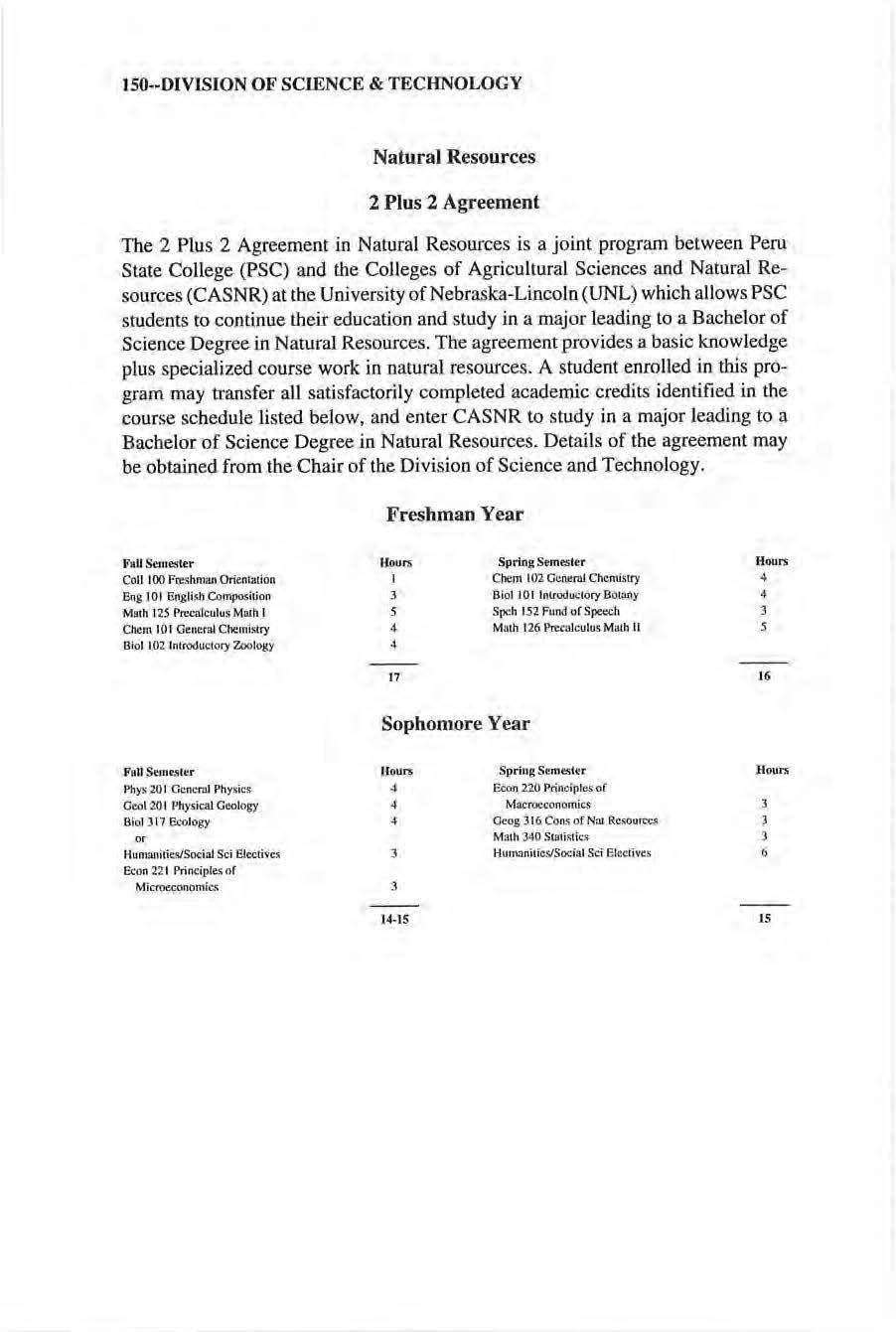
150--DIVISION OF SCIENCE & TECHNOLOGY
FllUScm,sler Coll 100 Freshman Orien1a<lon Eng 101 E~jli$h Composiljon Maih 125 Premlculus M:11h 1 Cllcm IO I General Chemistry Biol I02 lntmductor) Zo(,logy li'AU St.me."'iler Ph)'S 201 Gcnerul Phy•i"" Ocol 201 Physicol Geolol:)' Biol l 17 l,c-ology or Humanltic!l!Soc:iaJ Sci Etcctivc!; Econ 22 1 Principles or Microeconomi~ Freshman Year 3 5 4 4 17 Spring Seme;;Jtr Chem 102 Gcrum,J Chemistry Biol 101 l ntroduclo ryBtlt:lliy Spc:h 152 Fund ur Spwch Mmh 126 Pn:calculus Math II Sophomore Year {Jl)Urtll 4 4 4 3 .l 14,15 Spring s m~t~r Eco n 220 Principles of Mocnll!.c"onomi~· o~og 316 Con~ of Nat Rc.,ourt'C$ Muth ')40 Srnti lic:S. Hu1nani1fos/Sod td Sci S lcctlves Hours 4 4 J 16 lloun 15
Art
COURSE DESCRIPTIONS
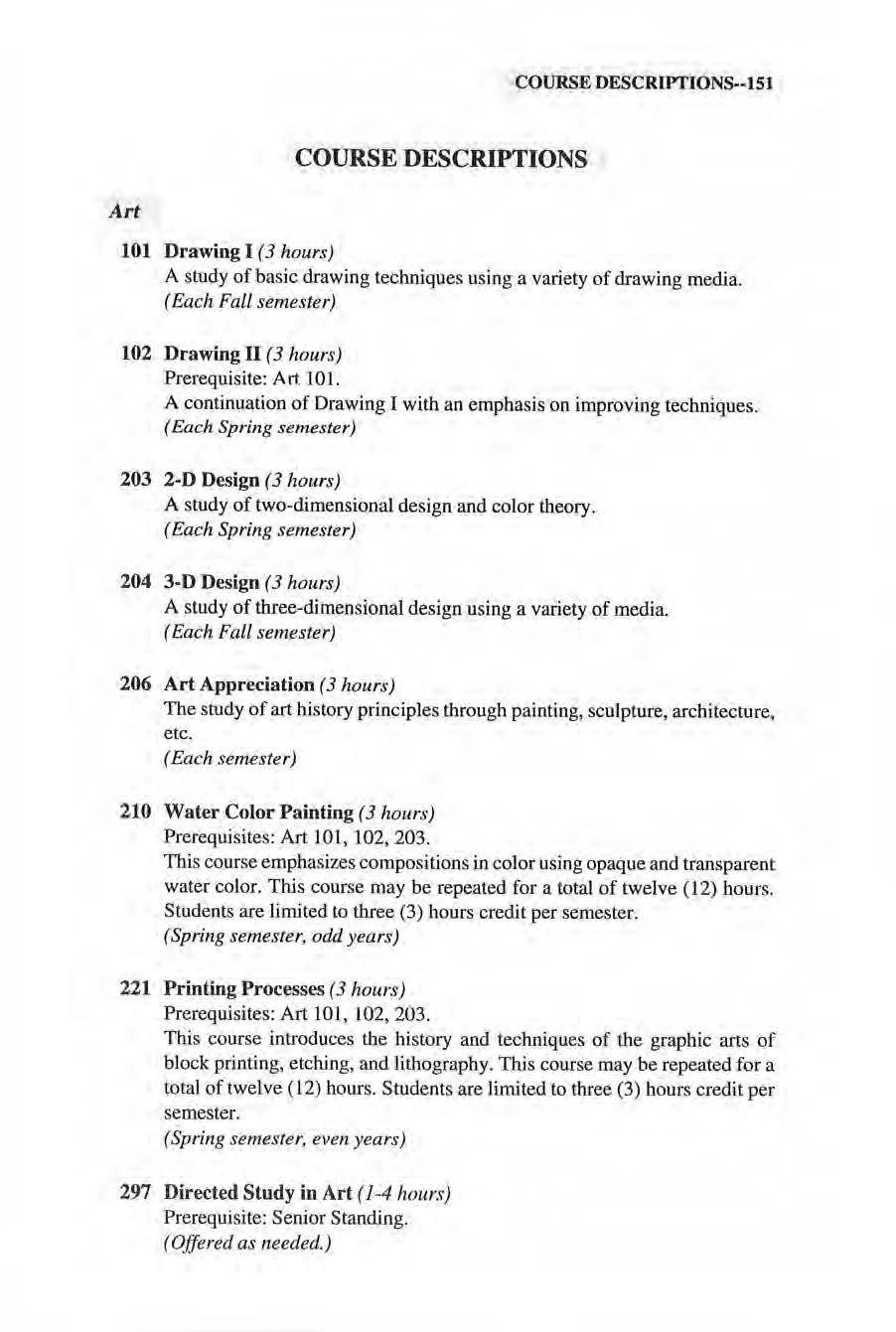
101 Drawing I (3 hours)
A study of basic drawing techniques using a variety of drawing media. (Each Fall semester)
102 Drawing II (3 hours)
Prerequisite: A11 101.
A continuation of Drawing I with an emphasis on improving techniques. ( Each Spring semester)
203 2 -D Design (3 hours)
A study of two-dimensional design and color theory. (Each Spring semester)
204 3-D Design ( 3 hmirs)
A study of three-dimensional design u sing a variety of media. (Each Fall semester)
206 Art Appreciation (3 hou rs)
The study of art history principles through painting, scu lpture, architecture , etc.
(Each sem este r)
210 Water Color Painting ( 3 hours)
Prerequisites: Art 101,102,203.
This course emphas izes compositions in color using opaque and transparent water col or. This course may be repeated for a total of twelve (12) hours. Students are Umited to three (3) hours credit per semester.
(Spring semester, odd years)
221 Printing Processes (3 hours)
Prerequisites: Art 101,102,203.
Thi s course introduces the hi story and techniques of the graphic arts of block printing, etching, and lithography. This course may be repeated for a total of twelve (12) hours. Student s are limited to three (3) hours credit per semester.
(Spring semester, even years)
297 Directed Study in Art ( 1-4 hour.~)
Prerequisi te: Senior Standing.
(Offered as needed.)
COURSE DESCRWfIONS--15 1
DESCRJPTlONS
298 Special Topics in Art ( 1-4 hours)
Prerequisite: Freshman-Sophomo re standing. (Offered as needed)
300 Pottery (3 hours)
Prerequisites: Art 101, 102, 204.
This cou rs e offers experiences in hand-built and thrown projects i ncluding a basic study of glaze preparation and clay analysis . Students are limited to three (3) hours credit per semester. This course 01ay be repeated for a total of twelve ( 12) hours.
( Each Fall semester)
308 Art Exploration (3 hours)
A s tudy of the purpose of art education in the elementary schoo l program. The s tudent is presented with a survey o f the history and phi losophy of art in the elementary schoo l and becomes actively involved i n art activities designed for the elementary school classroom.
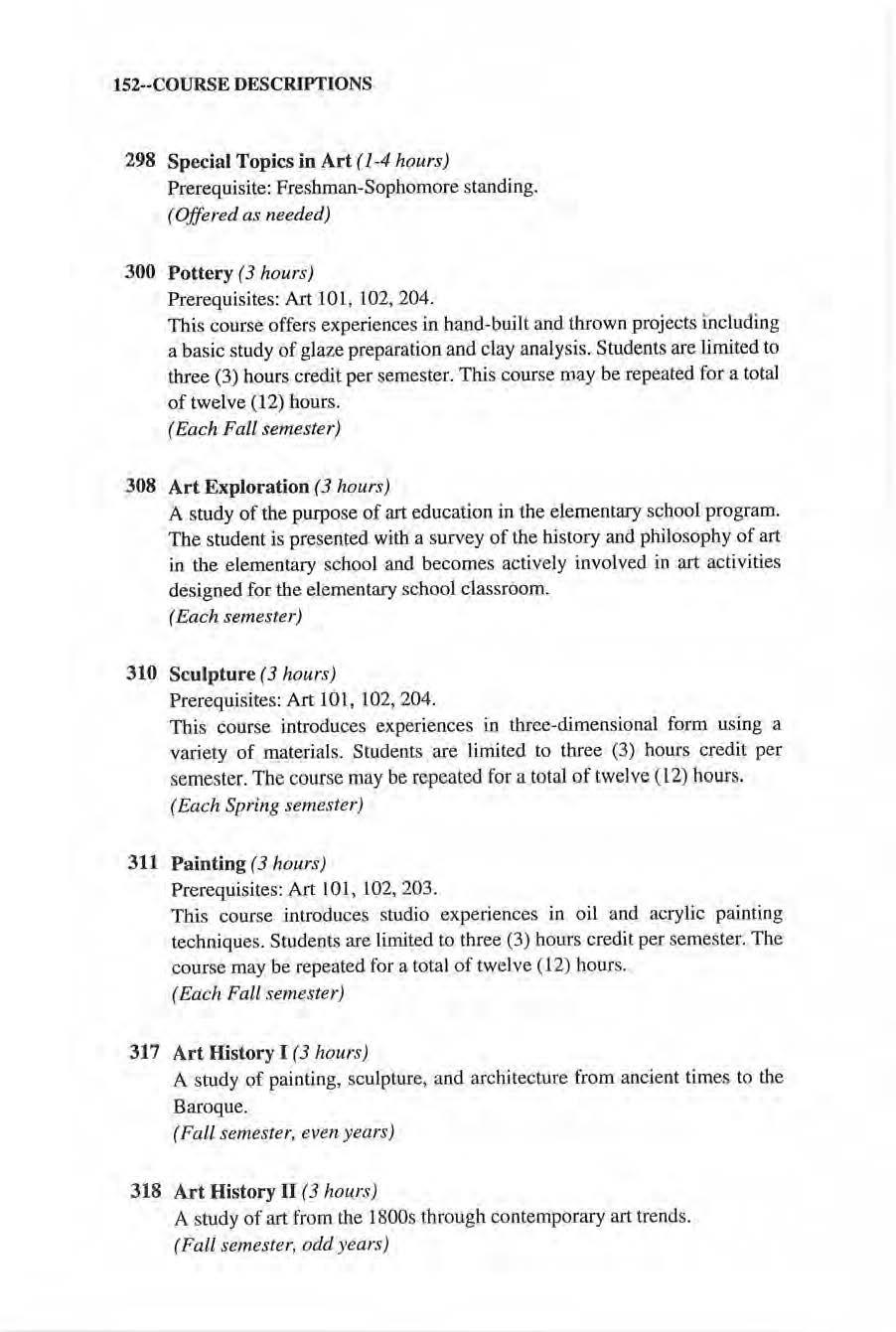
(Each semester)
310 Sculpture (3 hours)
Prerequisites : Art 101, 102, 204
This course introduces experiences rn three-dimensional form using a variety of materials. Students are limited to three (3) hours credit per semester. Th e coui-se may be repeated for a total of twel ve ( 12) hours.
(Each Spring semester)
311 Painting (3 hours)
Prerequisites: A,t IO I, 102, 203.
Tbis course introduces studio experiences in oil and acrylic parnttng techniques. Student~ are limited to three (3) hours credit per semester. The course may be repeated for a total of twelve ( 12) hours.
( Each Fall semester)
317 Art History I (3 hours)
A study of painting, sculpture, and archi t ecture from ancient times to the Baroque.
(Fall semester, even years)
318 Art History II (3 hot{rs)
A study of art from the I 800s through contemporary art trends. (Fall semester, odd years)
152--COURSE
325 Figure Drawing (3 lzou,-s)
Prerequisite: Art 101, 102, 203, 204.
Figure drawing is a course that deals with drawing of the human anatomy from live models. This course may be repeated for a total of twelve (I 2) hours. Students are limjted to three (3) hours c redit per semester.
( Each Fall semester)
350 Studio Activities (3 hou,-s)
Prerequisites: Art 10 I , !02, 203, 204.
An integrated course consisting of students working in various art mediums. Students will be allowed to work in the field of their choosing; painting, sculpture, etc. This course may be repeated for a total of twelve (12) hours. Students are limited to three (3) hours credit per semester.
(Each Spring semester)
400 Senior Exhibition ( 1 hour)
Prerequisite: Seofor standing
A student in this course must create a minjmum of two (2) new major pieces, mount and hang their exhibition, design and print announcements/mailers , and create their resume, as well as document their work by the use of slides
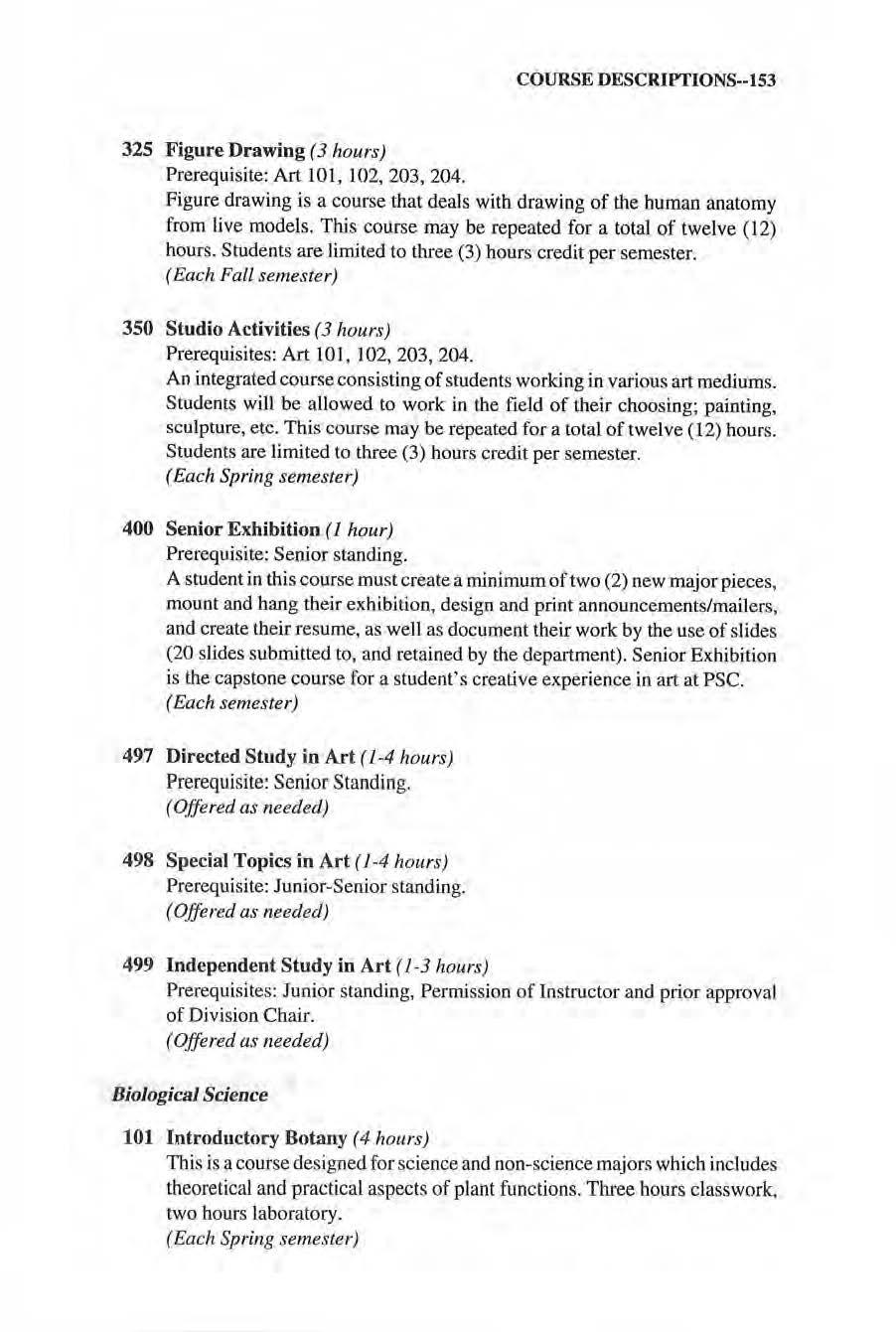
(20 slides submitted to, and retained by the department). Senior Exhibition is the capstone course for a student's creative experience in art at PSC.
( Each semester)
497 Directed Study io Art (1-4 hours)
Prerequisite: Senior Standing .
(Offered as needed)
498 Special Topics in Art (1-4 hours)
Prerequisite: Junior-Senior standing.
(Offered as neede d)
499 Independent Study in Art ( 1-3 hours)
Prerequisites: Junior standing, Permission of Instructor and prior approval of Division Chair.
(Offered as needed)
Biological Science
101 Introductory Botany (4 hours)
This is a course designed for s cience and non-science majors which includes theoretical and practical aspects of plant functions. Three hours classwork. two hours laboratory.
(Each Spring semester)
COURSE DESCRIPTIONS 153
154--COURSE DESCRIPTIONS
102 Introductory Zoology (4 hours)
This is a b asic course fo.r science and non-science majors which includes ce ll biology, ge netics, embryology, p hys iolo gy, ecology, and animal behavior. Three hours classwork, two hours l aboratory.
( Each Fall semester)
203 Invertebrate Zoology (4 hours)
Prerequis i tes: B iol IOI and 102.
Thi s course introduces th e structu re, classification, behavior, medica l, and evo lutionary relationships of invertebrate ani mal s. Three hours classwork. two hours laboratory.
(Fall semester, even yea rs)
210 Human Anatomy (4 hours)
T his course is a comprehensive examination of the cell biology, histol ogy, embryology, genetics, skeletal system and muscular system of humans. Th e course is designed for students in a lli ed health and pre-·nursing.
( Each Fall semester)
215 Plant Systematics (3 hours)
P rerequisites: Biol 10 1 and 102.
The principles an d methods of plant taxonomy and nomenclature are studied in this course . Three hours classwork.
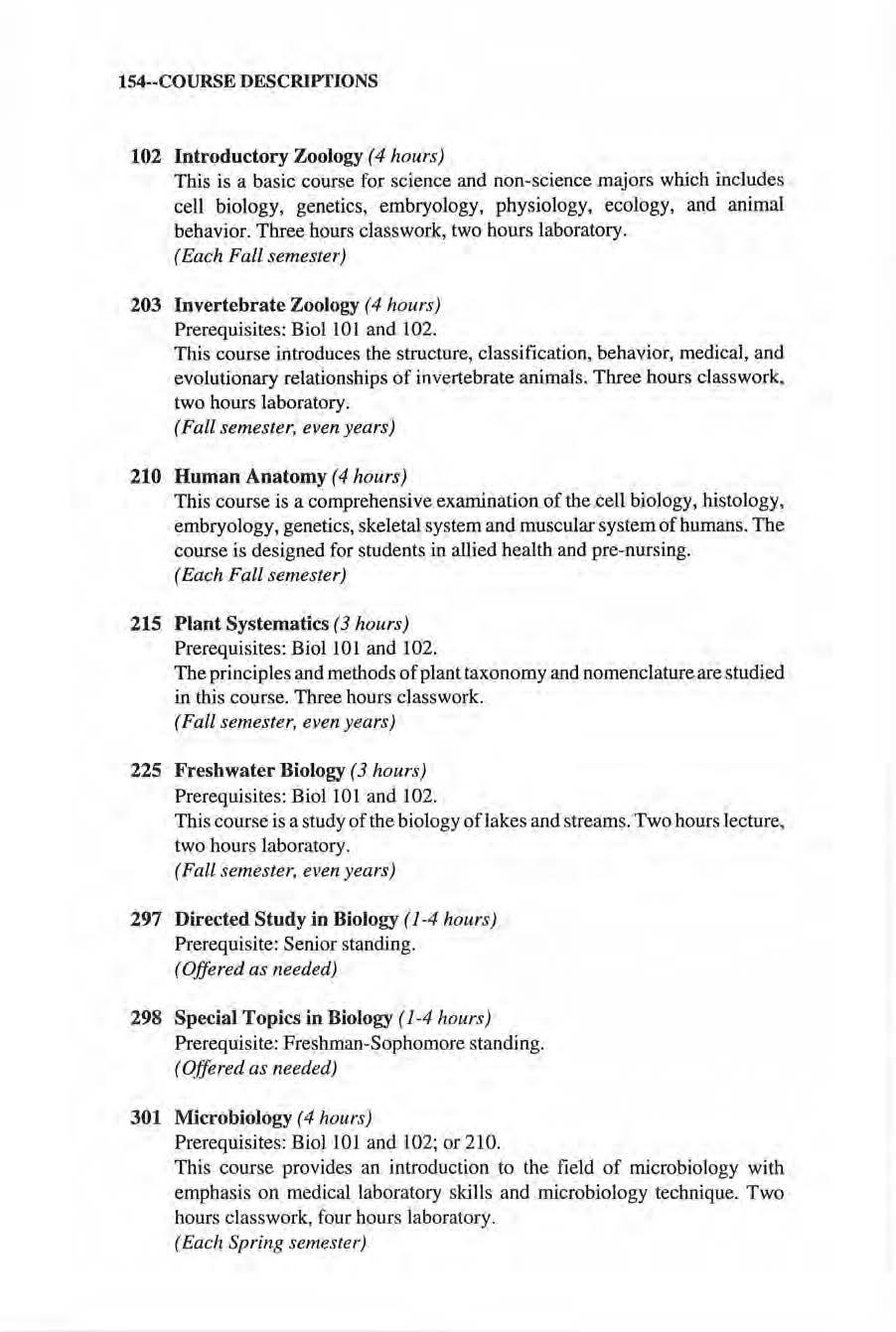
(Fall semester, e.venyears)
225 Freshwater Bio logy (3 hours)
Prerequisites: Biol IO I and 102. This course is a study of the biology of l akes and streams. Two hours lecture. two hours laboratory.
( Fall semester, even years)
297 Directe d Study in Biology ( 1-4 hours)
Prerequisite: Senior standing.
(Ojjered as n eeded)
298 Special Topics in Biology ( 1-4 hours)
Prerequisite: Freshman-Sophomore s tanding.
(Offered as needed)
301 Microbiology (4 hours)
Prerequisites: Biol 101 and 102; or 210.
This course prov ides an introduction to the field of microbiology with emphasis on medical laboratory ski lls and microbiology technique. Two hours classwork, four hours laboratory.
( Each Spring semester)
304 Comparative Anatomy (4 hours)
Prerequisites: Biol IOI and 102.
The evolutionary relationships of vertebrates are studied anatomically in this course. Three hours classwo rk, two hours laboratory
(Spring semeste r, odd years)
312 Human Physiology (4 hour.t)
Prerequisites: Biol l 02 and 210.
This course examines the function s of the human body including the nervous, cardiovascular, respiratory , endocrine, urinogenital, digestive. and immune syste ms. Emphasis is placed on the body's homeostatic control mechanisms
(Each Spring semester)
317 Ecology (4 hours)
Prerequisites: Biol 101 and 102.
Organisms inclu ding their interactions with each other and their environment are studied in this course. Three hours classwork, two hou rs laboratory.
(Fall semester, odd yea rs)
395 Mammalogy (3 hours)
Prerequisites: Biol 101 a nd 102
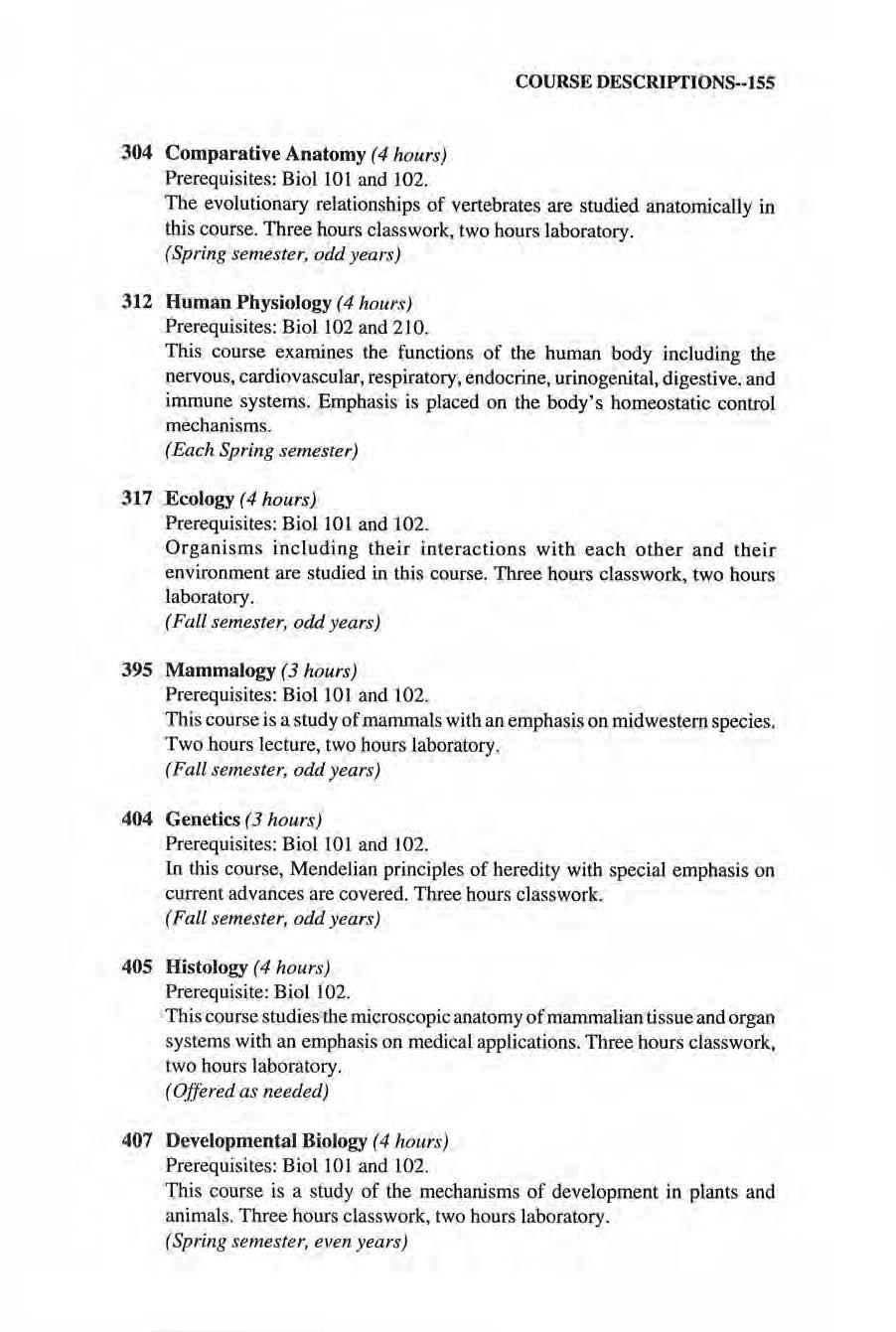
This course is a study of mammals with an emphasis on mid western species. Two hours lecture, two hours laboratory.
(Fall semester, odd yea rs)
404 Genetics ( 3 hours)
Prerequisites: Biol 101 and 102.
lo this cour se, Mendelian principles of heredity with special emphasis on current advances are covered. Three hours classwork.
( Fall semester, odd years)
40S Histology (4 hours)
Prerequisite: Biol I 02
This course studies-the microscopic anatomy of mammalian tissue and organ s ys tems with an emphasis on medical applications. Three hours classwork, two hours laboratory.
(Offered as needed)
407 Developmental Biology (4 hours)
Prerequisites: Biol IO I and 102.
This course is a study of the mechanisms of development in plants and animals. Three hours classwork, two hours laboratory. (Spring semester, even years)
COURSE DESCRJYfIONS--15S
156--COURSE DESCRIPTIONS
411 Ornithology (3 hours)
Prerequisites: Biol 101 and 102. This course is a s t udy in avian biology inducting morphology, physiology, taxonomy, breeding, and ecology. Two hours lecture, two hours laboratory.
(Spring semester, odd years)
412 Experimenta l Biology (3 hours)
Prerequisites: Biol IOI and 102, and 8 ho urs upper division Biology courses. Students will examine c urrent biological topics of interest that emphasize scientific method, interpretation, and analysis. Three hours lecture. This course is the capstone co urse and senior competency for the B io logica l Science and Wildljfe Ecology options.

(Spring semester, eveTI years)
486 Wildlife Management Tech n iques (3 hours)
Prerequisites: Biol 101 and 102.
Contemporary techniques of conservation and management of wild! ife are studied. Three hours lecture.
(Spring semester, even years)
497 Directed Study in Biology ( 1-4 hours)
Prerequisite: Senior standing.
(Offered as needed)
498 Special Top ics in Biology ( 1-4 hours)
Prerequisite: Junior-Sen ior standin_g.
(Offered as needed)
499 Independent Study in Biology ( l-3 hours)
Prerequisite: Junior standing; Pennission of lnstructor and prior approval of Division Chair.
(Offered as needed)
Business
080 Computer Keyboard ing ( I ltour)
Prerequ.isite: Permission of Instructor required. Th is is a beginning course for persons with little or no previous keyboarding instmction. f t introduces the standard computer keyboard and develops correct techniques for attaining useful levels of speed and accuracy. This course is graded on a credit/no credit basis
(Each semester)
137 Principles ofMana_gement (3 hours)
This course is a comprehe nsive in troductory course for managers in all organi zations. Planning, problem solving, goal attaining, contro llin g, and leading a re s tudied in this course Con tem porary management issues and current trends that affect managers will be discussed .
(Each Fall semester)
213 Loss Prevention (3 hours)
This cow-se. is designed to i mpart the know ledge of in te rnal securi t y issues such as perso nn el screeni ng, the identificatio n of high-risk employees, methods of employee th eft, honesty shopping, undercover detectives, interrogation principles, counsel in g, al a rm systems, a nd perimeter secu rity. External i ssues will include s hoplifting, c h ecks and credit card secu rity, forgery, burglary, and vendor fraud.
(Offe red as needed)
229 Software Appli cations (3 hours)
Prerequis ite : Keyboarding Ability. This course is an introduction to MS-DOS and IBM-based software c urrently used in indu sn-y. D evelopment o f p roficiency u s ing Selected commercial software packages is s tressed.

( Each semester)
230 Designing Web Pages for Business (3 hours)
This cou rse will be an introduction to the H ype rTex t Markup Language (HTML) . HTML is the language used to create a web page. Topi cs covered will include: d efining design e l ements, page layout tooJs, photography, image m aps, videos, audio a nd 3D, setting up a web server, desig ning for speed and efficiency, designing a self-promotio n s ite. How commercial organi zati o n s score site desig n is al so cove-red
( Each Spring se m ester)
2 31 Principles of Financial Accounting (3 hours)
This course i ntroduces s tudents to the process of recording financial data and preparing peri od ic financial statements. The complete accounting cycle will be stud ied Four hours of attendance per week is required.
(Each Fall semeste r)
232 Principles of Managerial Accounting (3 hours)
P rereq ui si te: Bus 231.
This course is a continu ation of Bus 231 consideri ng the accounting process fo r a corpo ration The student is introduced to acco unt ing theory, financi al statement a na ly sis, and cost accounting. Four ho urs o f attendance per week is required.
(Each Spring semester)
COURSE DESCRIPTIONS--157
241 Cooperative Education Internship ( 1-4 hours)
Prerequisite: 15 hours of completed coursework, minimum GPA 2.0; Permission of Cooperative Education Staff and Division Chair. This programis designed for students with an intended major in the Business Division to explore and/or gain work experience related to their major and anticipated career goals. Students may enroll for 1-4 hours of cred it which will be graded on a credit/no credit basis. A minimum of forty (40) hours of work experience will be required for every hour of credit per semester. The student will complete necessary paperwork with the employer and t he Cooperative Education s taff. A final paper will be prepared at the conclusion of the internship. Three semester hours of Bus 241 or Bus 441 may be applied toward the Management option.
(Eac h semester)
2S0 Salesmanship (3 hours)
Students focus on the ski ll s and techniques used in sell ing and persuasion. The course is designed to help the student learn to sell products and i deas through a study of proven techniques used by successful salespeople.
(Each Fall semeste r)
251 Legal Environment and Contract Law (3 hours)

This course examines the source and origin of law and the legal system and obligations of parties to a contract.
(Each Fall semester)
260 Entrepreneurship (3 hours)
Prerequisite: CSci 100 or CSci l02 .
Thfa cou rse is designed for those interested in starting a small business. The areas covered wil l include writing a small business plan, researching markets, raising money, analyz in g acco un ting records, and using information technology.
( Each Spring semester)
297 Directed Study in Business (1-4 hours)
Prerequisite: Senjor standing.
(Offered as needed)
298 Special Topics io Business ( 1-4 hours)
Prerequisite: Freshman-Sophomore standing.
(Offered as needed)
158- -COURSE
DESCRIPTIONS
301 Organizational Communications (3 hOJ.1rs)

Prerequ isi te: Speh 152; Eng 20 l.
Studen ts s tudy the role of bus iness letters and reports in communica tion and human relations and problems faced by wri ters of letters and reports. Other topics of study and ana l ys is inclu de presentational methods in formal business speaking, sales and motivational strategies, confl ict resolution, condu cting s uccessful meetings, using visual aids in the business sett ing and conducti ng and participating in i n terviews.
(Each semest er)
320 Business Data Communications (3 hours)
Prerequisite: CSci I 02; Permi ssion of Instruc tor.
Thi s course is designed to teach the fundame ntal principles o f d ata communications, especially as they apply to the bu siness community Topics include co mmunication media, hardware, message flow with protocol, networking a nd analysis, and management of data commllllication systems.
(Each Fall semester)
328 Principles of Marketiog (3 hours)
Students learn the buying, selling, t ra nsporting, and s to rin g functions involve d in marketin g, with an introd uction to retai lin g, wholesaling, and marketing manageme nt.
(Each Fall semester)
329 Promotion (3 hours)
Prerequisite: Bus 328 recommended. Stud ents exa min e the five e lements of the promotion mix: includin g advertising, direct marketing, personal selling, sales promotion, and public relations/publicity, focusing on the blending of the elements into an integrated marketing commu nication program.
(Each Spring sem ester)
331 Insurance (3 hours)
This course presents essentials of an insurable risk, uses of insurance, and a brief study of the more important types of ins urance .
(Offered as needed)
332 Investments ( 3 hours)
This course. ut il izes economic principles in evaluating the major uses of inve~tment funds, incl udin g savings accounts in banks and other financial institutions, government bonds, corporate stocks and bonds, annuities, and real estate.
(Offered as needed)
COURSE DESCRIPTIONS--159
335 Production/Operations Management (3 hours)
Prerequisite: Bus 232, Econ 221, Math 340. Students st udy the evolution of operational management and its relationship to the total enterprise. Decision making, production and plant planning, syste ms design. manpower planning, and control syi;tems are considered.
(Each semester)
337 Intermediate Accounting I (3 hours)
Prerequisite: Bus 232, Bus 229 or Permission of lnstructor. This course focuses on the problems involved in establishing sound valuations for asset, liability, and net worth items; proper reporting of financial position and net income is stressed.
(Each Fall semester)
338 Intermediate Accounting II (3 hours)
Prerequisite: Bus 337, Bus 229 or Permission of Instructor.
This course is an in-depth continuation of Bus 337 with special emphasis on long-term liabilities, intangible assets, statement analysis, stockholders' equity, app lication of funds, and present value.
(Each Spring semester)
339 Business Finance (3 hours)
Prerequjsite: Bus 232, Econ 220 , Econ 22 I; Math 120 and Math 340 recommended.
Students examine the uses of fonds to finance assets, internal and ex ternal sources of funds, and the costs of funds obtained from alternativ e soui-ces under various co nditio ns.
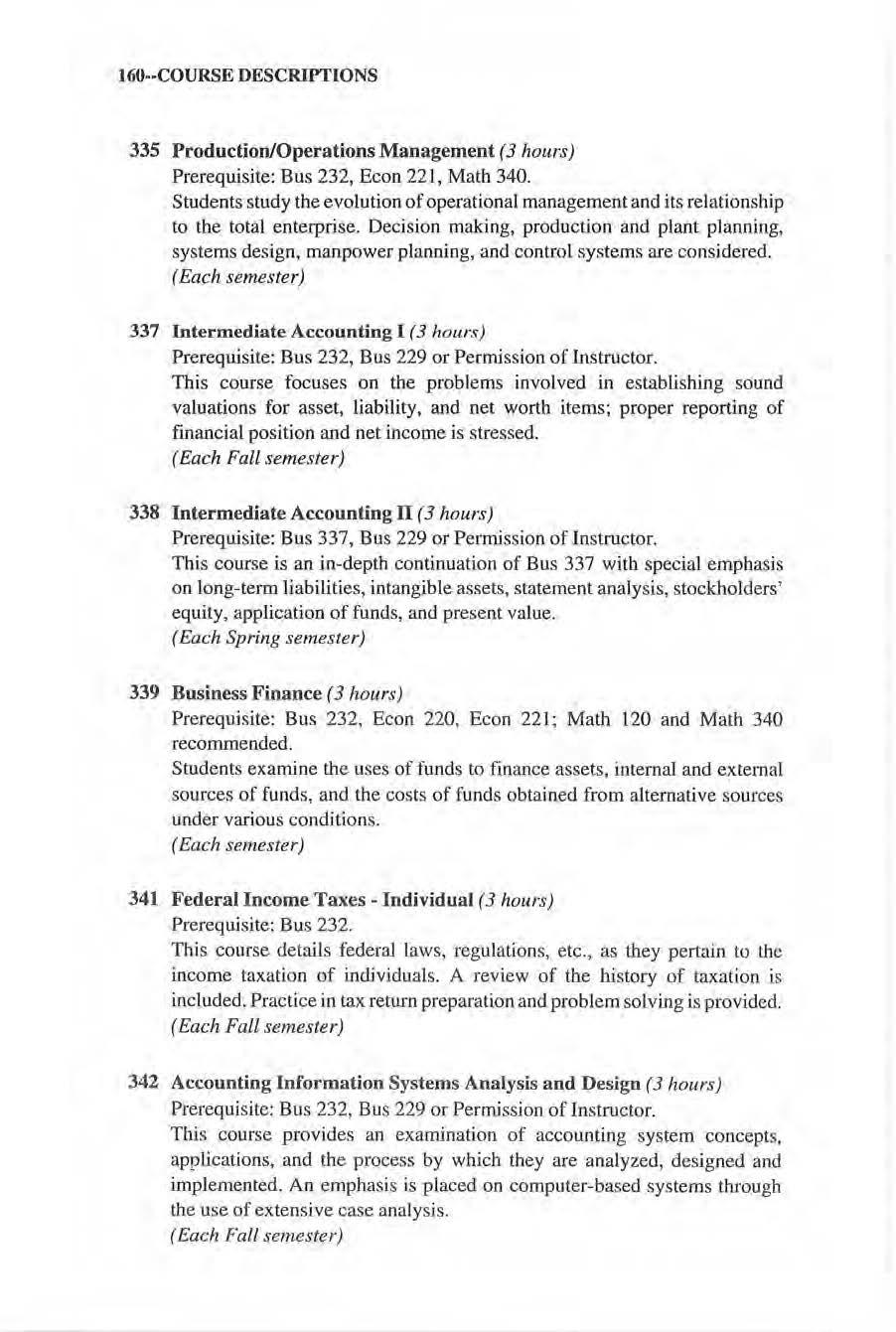
(Each semester)
341 Federal Income Taxes -Individual (3 hours)
Prerequisite: Bus 232.
Thi s course details federal laws, regulations, etc., as they pertnin to the income taxation of individuals. A review of the history of taxation is included. Practice in tax return preparation and problem solving is provided.
( Each Fall semester)
342 Accounting Information Systems Analysis and Design (3 houl's)
Pi-erequisite: Bus 232 , Bus 229 or Perrn.ission of Instructor
This course provides an exarrunation of accounting sys tem concepts. applications, and the process by which they are analyzed, desig ned and implemented. An emphasi s is placed on computer- based systems through the use of extensive case analysis.
(Each Fall s e mester)
160--COURSE
DESCRIPTIONS
345 Real Estate Principles and Practices (3 hours)
This course presents real estate Jaw as it affects marketing, ownership, interests, sales, leases, and agencies T he financial, marketing, and managerial aspects of real property will be introduced.
(Offered as n eeded)
346 Fi nancia l Institutions and Markets (3 hours)
Prerequis i te: Econ 220.
Students study the various institutions which constitute the United States financial system, an analysis of financial markets, and study of interest rate determination.
(Offered as needed)
351 Commercial Law (3 hours)
Prerequ isite: Bus 2 51.
Thi s course covers legal princip les cover in g sales contracts, negotiable instruments, bailments, corporate and partnership laws as outlined in the Uniform Commercial Code
( Each Spring semeste r)
353 Organizational Ethics (3 hours)

This course applies eU1 ical concepts and principles to moral is s ues in business: corporate responsibil ity, discrimination , advertising , competition, whistle~blowing, trade secrets, multinationals, environment, workers ' rights , government regulation, investment, bribes, product liability, and consumerism.
(Each Spring semester)
360 Real Estate Finance (3 hours)
Prerequisite: Bus 345.
This course is a detailed analysis of the methods and techniques of financing the purchase of real estate. Areas of study include fund sources, analysis of mortgage risk, FHA underwriting, other government influences and agencies, legal aspects, and the polic i es and procedures of lending institution s.
(Offered as needed)
361 Real Estate Law (3 hours)
Prerequ isite: Bus 345.
Students learn the legal implications of estates - land , deeds, leases. mortgages, easements, zon ing ordinances, covenants, trespass, nuisance, Licen ses, invitees, and descendants' es tates
(Offered as needed)
COURSE DESCRlPTlONS 161
371
Prerequisites: Bus 232, Math 340; Bus 229 or Permission of Instructor. Cost concepts, determination, control, and analysis are studied. Emphasis is placed on communicating cost data for internal decision making. Topi cs include cost behavi or and estimation, direct cos tin g, standard cost, cap ita l budgeting, and inventory con t rol.
( Each Fall semester)
372
Prerequisites: Bus 335, Bus 371. Students study advanced topics in cost accounting incl uding new costing methods. Coverage includes cost allocations, transfer pricing, and performance evaluation. An emphasis is placed on cost analysis for decisionmaking and budgeting as a planning and control tool for both operations and capital expenditures.
(Each Spring semester)
373
This course presents the foundations oflhe hi story, theory, and applications of organizational behavior includin g personality, stress, motivation, job design, goal setting, l earning theory, behavior modification, group behavior, power, leadership, organizational structure, decision-making, -and control.
(Each semester)
374
Prerequ.isite: Bus 229.
This course starts at the departure point for LOTUS 1-2-3 in Bus 229, Software Applications. There will be a review of materia l covered in Software Applications. This cou rse will cover advanced technjques in LOTUS 1-2-3 usi ng business applications for the coursework. Advanced commands and some macro programming in LOTUS 1-2-3 will be covered. Advanced LOTUS applications wiU be utilized for case analysi s including spreadsheet modeling, information system development, and automated forms-oriented database management.
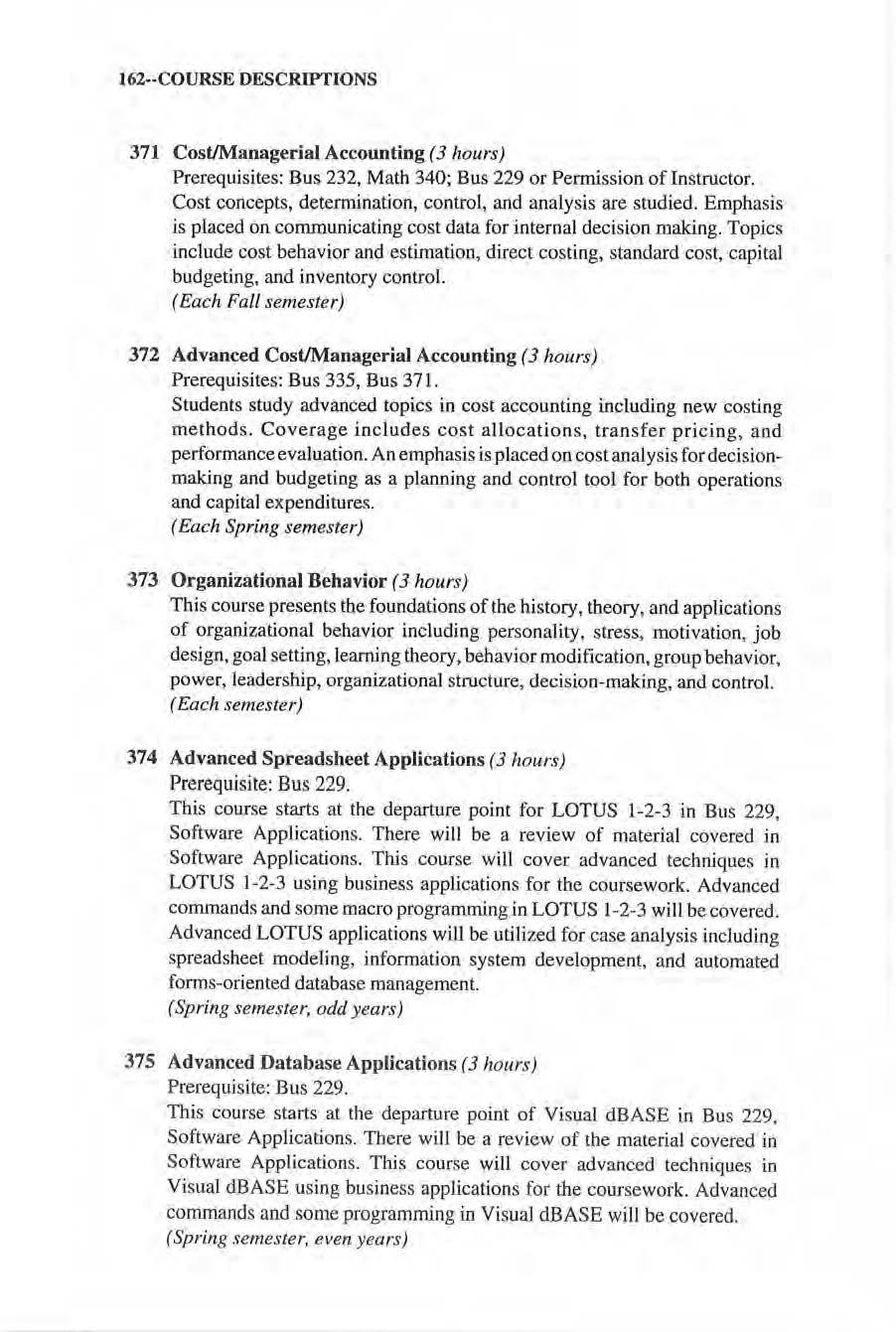
(Spring semes ter, odd years)
375
Prerequ is ite-: Bus 229.
This course starts at the departure point of Visual dBASE in Bus 229. Software Application s. There will be a review of the material covered in Software Applications. This co urse will cover advanced techniques in Visual dBASE using bu s iness applications for the coursework. Adva nced commands a nd some programming in Visual dBASE wi ll be covered.
(Spring semester, even yea rs)
162--COURSE
DESCRIPTIONS
Cost/Managerial Accounting (3 h ou rs)
Advanced Cost/Managerial Accounting (3 hours)
Organizational Behavior (3 hours)
Advanced Spreadsheet Applications (3 hours)
Advanced Database Applications (3 ho urs)
376 Management of Local Area Networks (3 hours)
Prerequi sit e: Bus 320. This course is designed to provide the student with hands- on experi ence with loc al area networks. Topics include: admin.istration, configuration, in stall ation and maintenance of l ocal area networks.
(Each Spring semester)
380 Human Resources Management (3 hours)
Prerequisite: Bus 373 .
Students learn management of employees and the efficient use of human resources for both the pe rsonnel manager an d the operating manager. Recruiting, motivation, and compensating are con sidered a long with the cu rrent l aws, career develo pme nt, unions, and other topics.
(Each Spring semester)
381 Employee Training a nd Development (3 hou rs)
P rerequi s ite: Bus 380.
A s tudy of corporate tra.ining from the needs assessment, cos t s and benefi t s, methods used in the evaluatio n and fo llow-up. Various training techniques are studied for the orientation, retraining, and development of workers, s uperv i sors and executives.

( Each Fall semester)
410 Marketing Management (3 hours)
Prerequisite: Bus 328.
T his cou r seanalyz.es marketi ng principles from the managers ' point of view a nd their appli cation tow a rd mee1ing various marketing objectives including the study of markets, cons umers, advertis in g, personal selling, retailing, pricing, and disu·ibutioo.
( Each Fall $emesrer)
412 Sales Management (3 hou.rs)
P rerequisite: B us 250.
Thjs study of a management positfon in a sal es career includes an analysis of such tasks as r ecru iting. interviewi ng, and hirin g salespeople. Other areas of study are training and motivating, compensation metho ds, assigni ng territories, and coordi nating with other managers.
(Fall semester, even years)
COURSE DESCRIPTIONS--1 63
413 Purchasing and Materials Management ( 3 hours)
Prerequisite: Bus 328.
The study of the procuring of industrial materials includes such topics as SIC codes, negotiated contracts, reciprocity , buying committees, and bidding procedures. Bu ying motives are $tudied as are procedures such as straight rebuyfog, value analysis, inventory analysis, and other topics from th e buyer's viewpoint.

(Spring semester, even years)
414 Supervisory Problems (3 hours)
Students learn the basis for effective supervision including worker motivation, leadership styles and practices, COIUIT)unications with workers, selection, promotion, co mpen satio n, training , co un selin g, evaluat ion, and discipline aJI within the confines of first-line management.
(Offered off-campus only)
420 Federal Income Taxes• Corporate, Partnerships, Fiduciary (3 hours)
Prerequisite: Bus 232, Bus 341 .
Students study federal law s, regulations, etc. , relating to estate and gift taxation and income taxation of partnerships, corporations, and fiduciaries. Practice in tax return preparation and problem so lving is provided.
(Each Fall semester)
421 Accounting Theory (3 hours)
Prerequisite: Bus 338.
This course is a study of theoretical considerations in asset measurement and inco me determination. Emphasis is placed on pronouncements of recognized accounting authorities.
(Fall semester, odd years)
430 Industrial Marketing (3 hours)
Prerequisite: Bus 328.
Students analyze industrial distribution coosidering organ izational consumers, demand, buying process, and strateg ies. Understanding planning , product lines, channels, logistics, prici ng, and promotion are included.
(Sp riJ1.g semester, odd years)
164--COURSE
DESCRIPTIONS
441 Cooperative Education I nternship ( 1-1 2 hours)
Prerequis ite: 45 hours of completed coursework, m1mmum GPA 2.0; Permiss ion of Cooperative Education Staff and Di vision Chair. This progmm is designed for students with a major in Business to g~ io work experience relate<l to their major and career goal s. Students may en roll for 1- 12 hours of graded credit A minimum of forty (40) hours of work experie nce will be required for every hour of credit per semester. The student wi ll comp lete necessary paperwork with the employer and the Cooperative Education office. The stude nt 's work wil l be supervised by Cooperative Education staff. A final paper will be prepared at the conclusion of the internship. Three (3) se mes ter hours of Bus 24 1 or Bus 441 may be applied toward the Management option. (&ch semester)
443 Qua ntitative Management (3 hours)
Prerequisite: Math 340 or P erm iss ion of Instructor. T his study of systems a nd management sc ience includes the devel opment of analytical reason in g and set concepts, as well as topics in decision proces ses, linear prog ramming, waiting Jin es, s toch astic processes , forecasting methods , i nve ntory control , input/output analys is, and gen era l modeling.
(Offered as needed)
4 50 Advanced Accounting (3 hours)
Prerequisite: Bus 338.
Students apply accountin g theory and p ractice lo business comb inations and consolidatio n o f finan cial statement s for parent/subsidiary corporations. Add itiona l e mp has is is p laced on acco unting for in ternational business activities and investments. SEC reporting, partnerships, and other advanced topi cs are also addressed

(Each Fa ll semester)
451 Governmental and Not-for-Profit Accounting (3 hours)
Prerequisite: Bus 338.
Accounting theory and practice are applied to governmental and o ther notfor-profit entities including hospitals and coll eges. Aud iting of government entities is discussed .
(Each Sp ring semester)
COURSE DESCRJPTlONS--165
468 Public Administrat ion (3 hours)
Prerequisite: PSci 201.
Student s will study a range of topics involved in the administration of public age ncies. Topics will include the history of America's public serv i ce, the development of intergovernmental relations , bureaucracies, public pe rsonnel, budgeting, dec ision-making, eval uation procedures, and regulatory administration. This class will encourage s tudent s to investigate the roie of public administration in the past and today, as well as to conjecture the possibilities for the future.
(Spring semeslet~ odd yearsj
470 Auditing (3 hours)
Prerequisite: Bus 338, Bus 342. This course covers generally accepted auditing standards and procedures with the philosophy supporting them. Aud i ting techniques available to the independent public accountant are a lso studied.
( Each Spring semester)
480 International Business (3 hours)
Prerequisite: Bus 328, Bus 339, and Bus 373 .
Students leam contemporary business and management practices in multinational market environments with emphas is on cultural, financial . and marketing differences
(Fall semester, odd yea rs)
492 Marketing Strategies (3 hours)
Prerequisite: Bus 328.
This cou rse takes a case~study approach designed to instill the methods of marketing analysis for decision-making. Specific components include financial analysis, situation analysis, strategic planning components, problem and opportunity analysis, generation and evaluation of alternative marketing programs , defining measurable objectives, and marketing mix/ program decisions.

(Offered as needed)
494 Marketing Research (3 hours)
Prerequi site: Bus 328, Math 340. Students apply analytical tools to marketing problems including markets , products, distribution channels. sales efforts, and advertising. Emphasis is placed on planning, investigation. collection, interpretation of data, and presentation of results.
(Offered as needed)
166--COURSE
DESCRIPTlONS
49S Business Policy (3 hours)
Prerequisite: Senior business major havjng completed 45 semester hours of business majorwhicb includes: Bus 229, Bus 339, Econ 220, and Econ 22 1 Recommended for student's last semester. This course takes a case-s tudy approach reqwring in-depth analytical and communication skills. Requirements jnclude a thorough review of all given and acquired data, formulation of well-defined problems, and structured plans of action to be presented in written and oral form. This course is the capstone course and senior competency for the Business Administration major.
(Each semester)
496 Organizational Policy (3 hours)
Prerequisite: Students should have completed a minimum of one-half of the business courses required in their major priorto enrollment in this courseincluding Bus/Mgmt 231, Bus/Mgmt 328, and Bus/Mgmt 373. This course takes a case-study approach requiring in-depth analytical and communication skills. R equirements include a thorough review of all given and acquired data, formulation of well-defined problems and structured plans of action to be presented in written and oral form. Cases will be selected to match the student's major area of study. This course i s the capstone course and senior competency for the Bachelor of Technology degree - Distribution option and Supervision option.

(Offered off-campus only)
497 Directed Study in Business {1-4 hours)
Prerequ.isite: Senior standing.
(Offered as needed)
498 Special Topics in .Business (1-4 hours)
Prerequisite: Junior/Senior standing.
(Offered as needed)
499 Independent Study in Business (J-3 hours)
Prerequisite: Junior standing; Perrrussion of In structor and prior approval of Division Chair.
(Offered as needed)
Chemistry
101 General Chemistry (4 hours)
Prerequisite: High school algebra. An introduction to the fundamentals of chemistry. Topics such as atomic theory, chemical bonding, stoichiometry, solutions, and pH are covered , Three hours classwork, two hours laboratory.
(Each Fall semester)
COURSE DESCRlPTIONS--167
J68--COURSE DESCRIPTIONS
l02 General Chemistry (4 hours)
Prerequisite: Chem lO l. This course is an application of the fundame nt als of chemistry, including states of matter, oxidation-reduction, thermochemistry, chemical equilibrium, kinetics, nuclear chemistry, and descriptive chemistry. Three hours classwork, two hours lab oratory.
( Each Spring semester)
142 Introductory Organic and Biochemistry (4 hours)
This is a tenninal course in organic and biochemistry. Three hours classwork, two hours laboratory.
(Offered as needed)
205 Pr inciples of Qualitative Analysis (4 hours)
Prerequi site: Chem 102.
The principles of qualitative analysis a nd their application in the laboratory are studied. Two hours classwork, four hours laboratory.
(Fall semester, odd years)
206 Principles of Quantitative Analysis ( 4 lwurs)

Prerequi site: Chem 205.
The principles of q uanti tative analysis and their application in the laboratory are studied. Two hours classwork, four hours laboratory. (Spring semester. even years)
297 Directed Study in C hemistry ( l-4 hours)
Senior standing.
(Offered as needed)
298 Special Topics in C hemistry (1- 4 hours)
Fres hman-Sophomore standing.
( Offered as needed)
303 Orga nic Chemistry (5 hours)
Prerequi s ite: Chem 102.
This course introduces the chemistry of aliphatic and aromatic compounds w ith the mechanisms and stereochemistry. Three hours classwork, four hours laboratory.
( Fall semester, even years)
304 Organic Chemistry (5 hours)
Prerequisite: Chem 303.
Thi s course is a contin uati on of Chem 303 with emphasis on the chemistry and detection of functional grou ps. The laboratory emphasis is on methods of qualitative organic analysis. Three hours classwork. four hours laboratory.
(Spring semester, odd years)
431 Biochemistry (4 !to urs)
Prerequisite: Chem 304.
The chemical foundations of molecular biology with an emphas is on the molecular aspects of intermediary metabolism are stud ied. Three hours classwork, two hours laboratory.
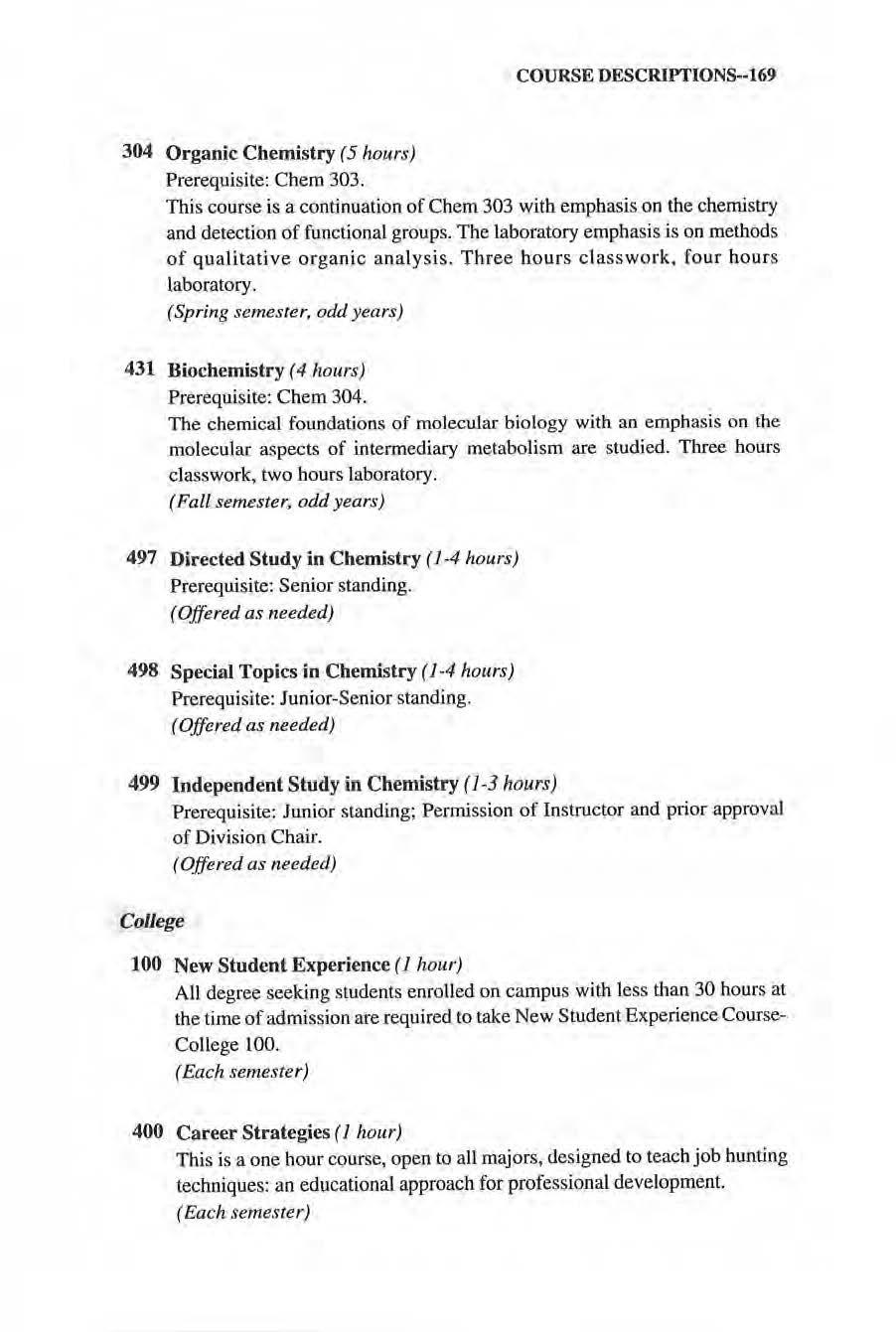
(Fall semester, odd years)
497 Directed Study in Chemistry ( 1A hours)
Prerequisite: Senior standing.
( Offered as needed)
498 Special Topics in Chemistry ( 1-4 hours)
Prerequisite: Junior-Senio r standing
(Offered as needed)
499 Independent Study in Chemistry (1-3 hours)
Prerequisite: Junior standing; Permission of Instructor and ptior approva l of Divi.sion Chair.
(Offered as needed)
College
100 New Student Experience ( 1 hour)
All degree seekin g students enrolled on camp us wi th less than 30 hours at the time of ad mi ssion are required to take New Student Experience CourseCollege 100.
(Each semester)
400 Career Strategies ( I hour)
This is a one hour course, open to all majors, designed to teach job hunting techniques: ao educational approach for professional development.
( Each semester)
COURSE DESCRIPTIONS--169
Computer Sdena!
100 Introduction to Com11uter Applications (3 hours)
This course provides an overview of the history and evolution of computers and software. Issues such as the future of computers, their social impact, and the ethics of computer use are also considered. Students receive direct ins truction and directed experience on a n integrated software package that in.eludes word processor, spreadsheet, and data file manager. Two hour lecture, two hours laboratory .
(Each semester)
102 Introduction to Computer Concepts (3 hours)
Thi s course is designed to deve lop a general knowledge about comp uters. Tb.is includes techn ical knowledge about hardware and software with regard to their operation and how they arc us ed to solve problems. The course also includes an awareness of how computers affect society. Students will use software simulation projects that demonstrate the use of the computer to sol ve common problems.

( Each semester)
l03 BASIC Programming (3 hours)
The BASIC language and its application to problem solving in mathematics, science, and business. Microcomputer applications are e mphasized, starting with simple operations and progressing into string manipulation , arrays, subroutines, graphics and file manipulation.
(Each semester)
203 COBOL Programming (3 hours)
Prerequisite: CSci l02 or permission.
An introduction to ANS COBOL and its application to business computing. This course emphasizes structured analysis and design of programs illustrating business applications.
(Fall semester, odd years)
204 Computer Programming I (3 hours)
This course provides an introduction to programming and algorithm development using Pascal with elements of program structure and subprogram usage Problem so lvin g technjques, including stepwise refinement, are applied to problems io mathematics and business with algorithms for searching, merging, and sorting introduced.
(Each Fall semester)
170--COURSE
DESCRIPTIONS
206 Co mputer Programming II (3 hours)
Prerequisite: CSci 204.
This course in t roduces programming and algorithm development using the C Programming Language.. The study of s tepwi se refinement and top-down programming, testing, and debugging is continued with an emphasi s on string processing, internal searchin g and sorting, and recursion. Datu structures including s tack s. queues, deques and linked lis ts are also built and manipulated.
(Each Spring sem ester)
2 08 Computer Systems (J hours)
Prerequisite: CSci 203 or 204.
The principles of operation and assembly programming of the DEC VAX systems are introduced. Topics to be.studied include computer structure and machine language , addressing tech niques, macros, program segmentation and linkage conventions, file input-output, assemblers, and interpreters. ( Fall semester, even years)
297 Directed Stud y in Computer Science (1 -4 hours)
Prerequisite: Senior standing.
(Offered as needed)
298 Special Topics in Computer Science (1-4 hours)
Prerequisite: Freshman-Sophomore standin g. (Offered as needed)
304 Fil e Processing and Databases (3 hours)
Prerequisi te: CSci 203.
A study of the methods used to store and access data. Sequential, direct and indexed file techniques and relational database co ncepts are studied. Programming examples and exercises wiJl stress applications of COBOL andSQL
(Spring semester, even years)
306 O pe rati ng Systems and Computer Architecture(] hours)
Prerequis ite: CSci 206 and 208.
Operating systems prin ciples and relationships between operati ng sys tems and co mputer architecture are studied incl uding procedure activation, sys tem stmcture, system modeling and evaluation, memory management , process management, inter rupts, scheduling, and recovery procedures, (Sp ring semester, odd years)

COURSE
DESCRIPTIONS--171
3U Systems Analysis and Design (3 hours)
Prerequisite: CSci 203.
A study of the methods used in design of computer programs and applications systems, with emphasis on Computer Aided Software Engineering (CASE) tools and prototyping using fourth generation languages (4GL).
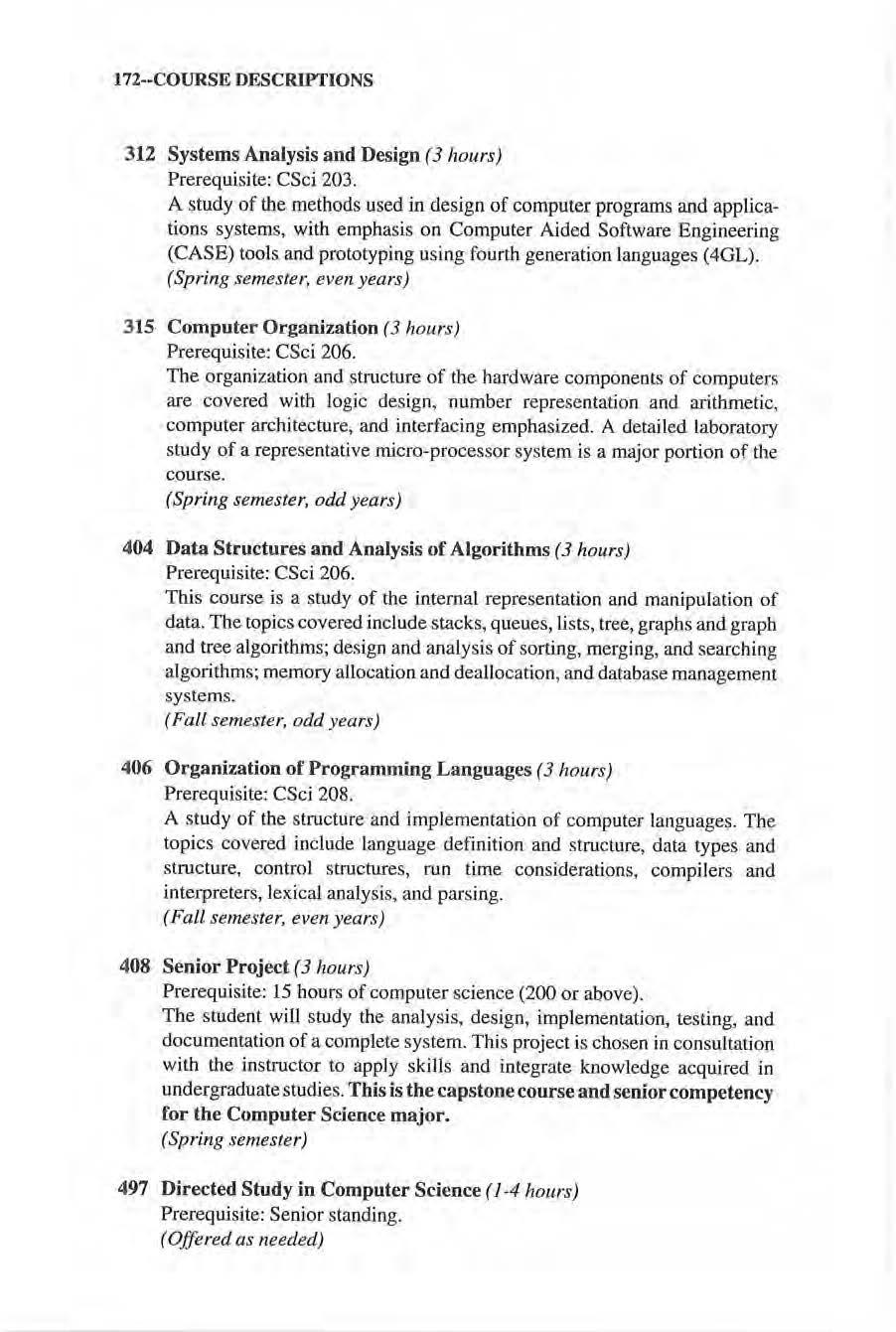
(Spring semester, even years)
315 Computer Organization (3 hours)
Prereqwsite: CSci 206.
The organization and s tructure of the hardware componenlS of computers a re covered with logic design, number represe ntation and arithmetic. computer architecture, and interfacing emphasized. A detailed laboratory study of a representative micro-processor system is a major portion of the course.
(Spring semester, odd years)
404 Data St.ructures and Analysis of Algorithms (3 hours)
Prerequisite: CSci 206.
This course is a study of the internal representation and manipul ation of data. The topics covered include stacks, queues, lists, tree, graphs and graph and tree algorithms; design and analysis of sorting, merging, and searching algorithms; memory allocation and deallocation, and database management system s .
(Fall semester, odd yea rs)
406 Organization of Programming Languages (3 hours)
Prerequisite: CSci 208.
A study of the s tructure and implementation of co mputer languages. Th e topics covered include language definition and structure, data types and structure, control structures , run time consideralions, compilers and interpreters, lexical analysis, and pars ing.
( Fall semester, even years)
408 Senior Project (3 hours)
Prerequisite: 15 hours of computer science (200 or above). The student wiU study the analysis, design, implementation, testing, and documentation of a complete system. This project is chosen in consultation with the instructor to apply skills and integrate knowledge acquired in undergraduate studies. This is the capstone course and senior competency for the Computer Science major.
(Spring semester)
497 Directed Study in Computer Science ( 1-4 hours)
Prerequisite: Senior standing.
(O.ffered11s needed)
172--COURSE
DESCRIPfIONS
498 Special Topics in Computer Science (1-4 hours)
Prerequisite: Junior-Senior standing.
(Offered as needed)
499 Independent Study in Computer Science (/-3 hours)
Prerequisite: Junior standing; Permission of In structor and prior approval of Division Chair.
(Offered as needed)
Consumer Economics
332 Nutrition (3 hours)
Fundamental principles of human nutrition, its development lhrough research as related to the needs of individuals according to their age, sex. and occupation are studied.

(Each Fall semester)
Criminal Justice
110 Survey of Criminal Justice (3 hours)
This course introduces students to general criminal justice concepts and knowledge about the relationships of crime and criminal behavior. The purp ose, role, and interrelationships of the police, other law enforcement officials, the courts and judiciary, corrections, and parole syslem will be discussed.
(Each Spring semester)
213 Loss Prevention (3 hours)
Prerequisite: CJus 110.
This course is designed Lo impart the knowledge of internal security issues such as personnel screening, the identification of high-risk employees, methods of emp loyee thef4 hon esty shopping, undercover detectives, interrogation princ iples, counseli ng, alarm systems, and perimeter security. E,ctemal issues will include shoplifting, checks and credit card security , forgery, burglary, and vendor fraud. This course is cross listed as BUS 213.
(Offered as needed)
220 Introduction to Corrections (3 hours)
Prerequisite: C Jus l lO.
This course is a general introductory course that describes the history and development of corrections in America, the various aspects of correctional practices, and issues and perspectives affecting institutional life within the correctional system. Organizational and administrative practices will be exami ned.
(Each Spring semester)
COURSE DESCRWJ'IONS--173
297 Directed Study in Criminal Justice(l-4 hours)
Prerequisite: Senior Standing.
(Offe r ed as needed.)
330 The Police (3 hou rs)
Prerequisite: CJus 110 and J unior stand ing. T his cou rse covers the major roles of the police in American society. The course will inves tigate the origins of policing, law enforcement, police organization, the func tions of police in society, and the polices relationship s to the components of the crirruoal justice system. [ssues confronting police administration will also be addressed.
(Each Fall semester)
440 Ju venile J us tice (3 hours)
Prerequi site: CJus 110 and Junior standing. This course examines the historical and philosophical development of the Juvenile Justice System. In addition, the role of various criminal justice organizations a nd their approaches to prevention and treatment techo iques will be examined
(Each Spring semester)
497 Directed Study in Criminal Justice (1-4 hours)
Pre requi site: Senior stand ing.
(Offered as needed.)
220 Pr inciples of Macroeconomics (3 hours) This course presents elementary concepts of macroeconomics with an emphasis on equilibrium analysis, monetary and fiscal policy, banking and developmental economics.
(Each Spring semester)
221 Principles of Microeconomics (3 hours)
Consideration is given to the microeconomics concepts of wages, interest, rent and profits, personal distribution of income, consumption, monopolies, ag riculture, government taxation and expenditures, international trade and comparative economic systems.
(each Fall semester)
297 Directed Study in Economics ( 1-4 hours)

Prereq uis ite: Senior standing.
(Offered as needed)
174--COURSE DESCRIPTIONS
&'<J11<Jmics
298 Special Topics in Economics ( 1 -4 hours)
Prerequi site: Freshman/Sophomore standing.
(Offered as needed)
305 Economic Geography (3 hours)
Prerequisite: Econ 220.
The purpose of economic geography is to introduce the student to the basic concepts, analytical too ls and resources which explain ways in which individuals and organizations organize their economic activities iu geographical l oca tion It further develops t h e influence of various institutional a rrangeme nts that affect spat ial intei·dependencies. Finally, the course explains the use of demographic data in interpreting international target markets.
(Spring semester, even years)
320 Macroeconomics for Managers ( 3 hours)
Prerequisite: Econ 220.
Thi s course presents advanced concepts of macroeconomics with an emphasis on the application of th eory to practical problems faced by managers.
(Offered as needed)
375 Labor and Industrial Relations (3 hours)
Prerequisite : Econ 22 1.
Students study labor, management, and government as they involve collective bargaining, labor laws, and wage theories.
(Offered as needed)
497 Directed Study in Economics ( 1-4 hours)

Prerequisite: Senior s tanding
( Offered as needed)
498 Special Topics in Economics ( I -4 hours)
Prerequisite: Junior/Senior standing.
(Offered as needed)
499 Independent Study in Economics ( l -3 hours)
Prerequisite: Juni or s tanding; Permission of Instructor and prior approval of Division Chair.
(Offered as needed)
COURSE DESCRJPTIONS--1 75
Education
208 Orientation & Practicum ( J hour)
Thi s co u rse will provide a s tud e nt considering e du cat i o n with an introdu ction to the Peru State College Teacher Educatio n program a nd an opportunity to spend 2 0 - 30 clock hours in an elementary, junior high/ middJ e, or secondary school to observe the foner-workings of classrooms fr om the point of vi.ew of a teacher. Regularly scheduled, on-campus se minars will be held in co njunction with the sc hoo l visits to discuss classroom experiences with other education students and facu lty and LO meet other co urse requ irements.
( Each sem ester)
241 Cooperative Education Internsltip ( 1-4 hours)
Pre requi sites; 15 hours of completed coursework, minimum G PA 2 .0, permission of Cooperative Education staff and Divi sio n Chair. This program is designed for students with an intended maj or in the Educati.on Division to explore and/or gain work experience related to th eir major and anticipated career goals. Students may e nroll for 1-4 hours of credit which will be graded on a credit/no c red it basis. A minimum of forty hours of work experi ence will be required fo r eve ry h o ur of credit per semes ter. The student wi ll complete necessary paperwork with employer and Cooperative Education Office. The stu de nt 's work will be sup erv ised by Cooperti ve Education staff. A fi n al paper will be prepared a t t he con clu sion of the internship.
(Each semest er; summer session)
297 Directed Study in Education (1-4 hours)
Pre req uis ite: Senior stand in g.
(Offered as needed)
298 Special Topics in Education ( 1-4 hours)
P rerequi s ite: Freshman-Sophomore s tandin g.
(Offered as needed)
300 C lassroom Manage ment & Effective Teaching in the Secondary School (2 h ours)

Prerequisite : Admission to T eacher Education. Thls co urse i s i.ntended to provide prospective secon d ary education students the opportuni ty to discuss the relationships between classroom managemen t a nd effecti ve teaching, to research and di scu ss current t heory, research , and practice in classroom management and effective teach i ng, cli scuss and practice lesson and unit planning and curriculum design, and to discuss individu al management sty les and pl ans fo r lheir own classrooms.
(Each semester)
176--COURSE DESCRflYl'JONS
301 Practicum - Social Stud ies and Language Arts ( 1 hou.r)
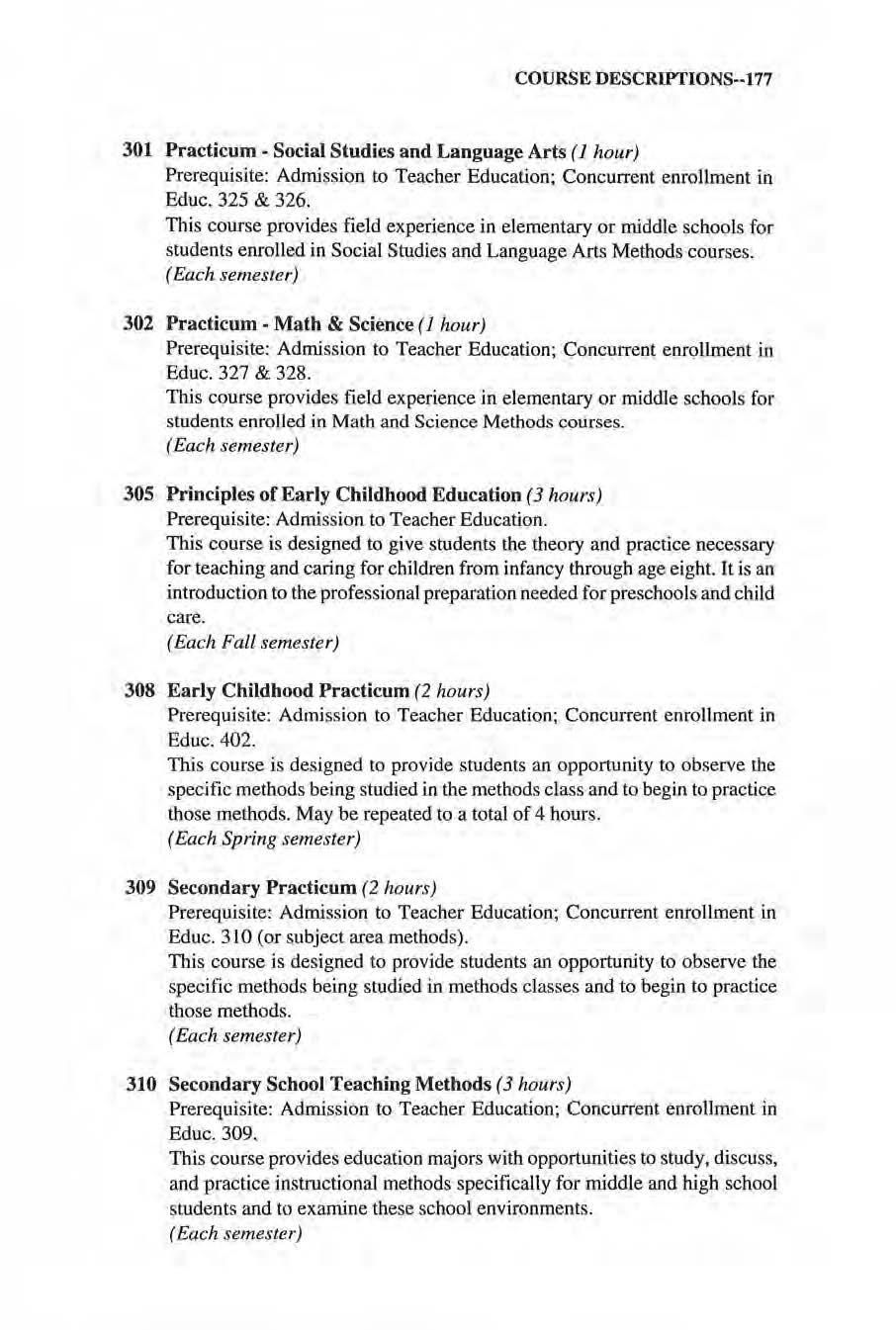
Prerequisite: Admission to Teacher Education; Concurrent enrollment in Educ. 325 & 326
Thi s comse provides field e xperience in elementary or middle schools for students enrolled in Social Studies and Language Arts Methods courses.
( Each semesler)
302 Practicum • Math & Science ( 1 hour)
Prerequisite: Admission to Teacher Education; Concurrent enro llment in Educ. 327 & 328.
This cour se provides field experience in e lementary or middle schools for students enrolled in Math and Science Methods courses.
(Each semester)
305 Principles of Early Childliood Education (3 hours)
Prerequi s ite: Admission to Teacher Education.
This course is designed to give students the theory and practice necessary for teaching and caring for children from infancy through age eight. It is an introduction to the professional preparatio n needed for preschools a nd chi ld care.
(Each Fall semester)
3 08 Early Childhood Practicum (2 hours)
Prerequi s ite: Admi ssion to Teacher Education ; Concurrent enrollment in Educ. 402.
This cou rse is designed to provide students an opportunity to observe Ule specific methods being studied in the methods class and to begin to practice those methods. May be repeated to a total of 4 hours.
(Each Spring semester)
309 Secondary Practicum (2 hours)
Prerequisite: Admiss ion to Teacher Education; Concurrent enrollment in Educ. 3 10 (or subject area methods).
Thi s course is designed to provide students an opportunity to observe the specific methods being s tudied in methods classes and to begin to practice those methods.
(Each semester)
310 Secondary School Teaching Methods (3 hours)
Prerequisite: Admission to Teacher Education; Concurrent enrollment in Educ. 309,
Thi s course provides education m ajors with opportunities to study, discuss, and practice instructional methods specifically for middle and high school students and to ex.amine these sc ho ol environments.
( Each semester)
COURSE DESCRIPTIONS--177
317 Tests and Measurements (2 hours)
Prerequisite: Admission to Teacher Education. The course emphasize s the procedures for constructing tests, analyzing teacher made tests, and applying tbe results of testing to grading and reporting of pupil progress. T he course also presents the basic statistics which are used in the analysis, interpretation, and use of test results.
(Each semester)
325 Teaching L anguage Arts in the Elementary/Middle School (3 hours)
Prerequisite: Admission to Teacher Education ; Concurrent enrollment in Educ. 301 & 326.
This course investigates goals, methods, materials, and eva lu ation techniques in the area of elementary/middle grades language arts.
( Eac h semester)
326 Teaching Social Studies in the Elementary/Middle School ( 3 hou rs)
Prerequisite: Admission to Teacher Education; Concurrent enrollment in Educ. 301 & 325.
This course is designed to make the prospective elementary/middle school teacher aware of the methods, materials, resources, and techniques used to teach Social Studies in an elementary/middle school. Students will also discuss the importance of Social Studies and the make-up of an elementary/ middle grades Social Studies curriculum.
( Each semester)
327 Teaching Math in the Elementary/Middle School (3 hours)
Prerequisite: Admission to T eacher Education; Concurrent enrollment in Educ. 302, 328; and Math l lO or equivalent. This course introduces and gives practice to students in the philosophi c al basis, techniques, instructional methods, organization, a nd learning activities of teaching elementary/midd le grades Mathematics.
(Each semester)
328 Teaching Science in the Elementary/Midd le School ( 3 hours)
Prerequisites: Admission to Teacher Education ; Concurrent enrollment in Educ. 327, 302; and Genetal Studies Science requirements. The purposes of the course are to: (1) give direction to prospective teachers on how to organize and conduct meaningful science learning experiences in the elementary/middle school. (2) provide simple and easy to understand out)j_n es of science concepts and conceptual schemes for each area of science concepts and appropriate learning experiences. Students will participate and be certified in "Project Wild ''
(Each semester)

178--COURSE DESCRWflONS
334 Teaching Reading in the Elementary School (3 hours)
Prerequisite: Admission to Teacher Education. The course i s a study of current methods, approaches, types and availability of reading materials, and their uses in the elementary school. Emphasis will be placed on facilitating instruction in the classroom and the skills of reading.
(Each semester)
350 Comp uter Applications in Education (3 hours)
The purposes of the course are to ensure that class members have proficiency in creating documents using word proces sing, calculating usin g tbe spreadsheet, and s earching us ing the database; to familiarize the students wi th a variety of the best software programs currently available in their area; to show the students how these programs can be applied in the classroom; and to have the stud e nts appl y useful utility programs to improve the learning process.
(Each semester)
375 Education of Girted Learners (3 hours)
This course examines the hi storic and currently used definitions of gifted and talented, identifying characteristics, means of identifying and choosing the gifted and talented, individuals who have been identified in the present and past, and techniques for teaching gifted and talented students in tbe reg ular classroom,
( Each Spring semester)
400 Philosophica l Foundations of Education (3 hours)
Prerequisites: Taken immediately preceding Student Teaching; Admiss ion to Teacher Education.
Philosophical Foundations of Education i s a capstone course designed to assist the prospective teacher entering stude nt teaching and, ultimately, the teaching profession , So that all students can draw on previously learned information whe n discussing the various objectives of the course. all students will take thi s course during the semester prior to student teaching.
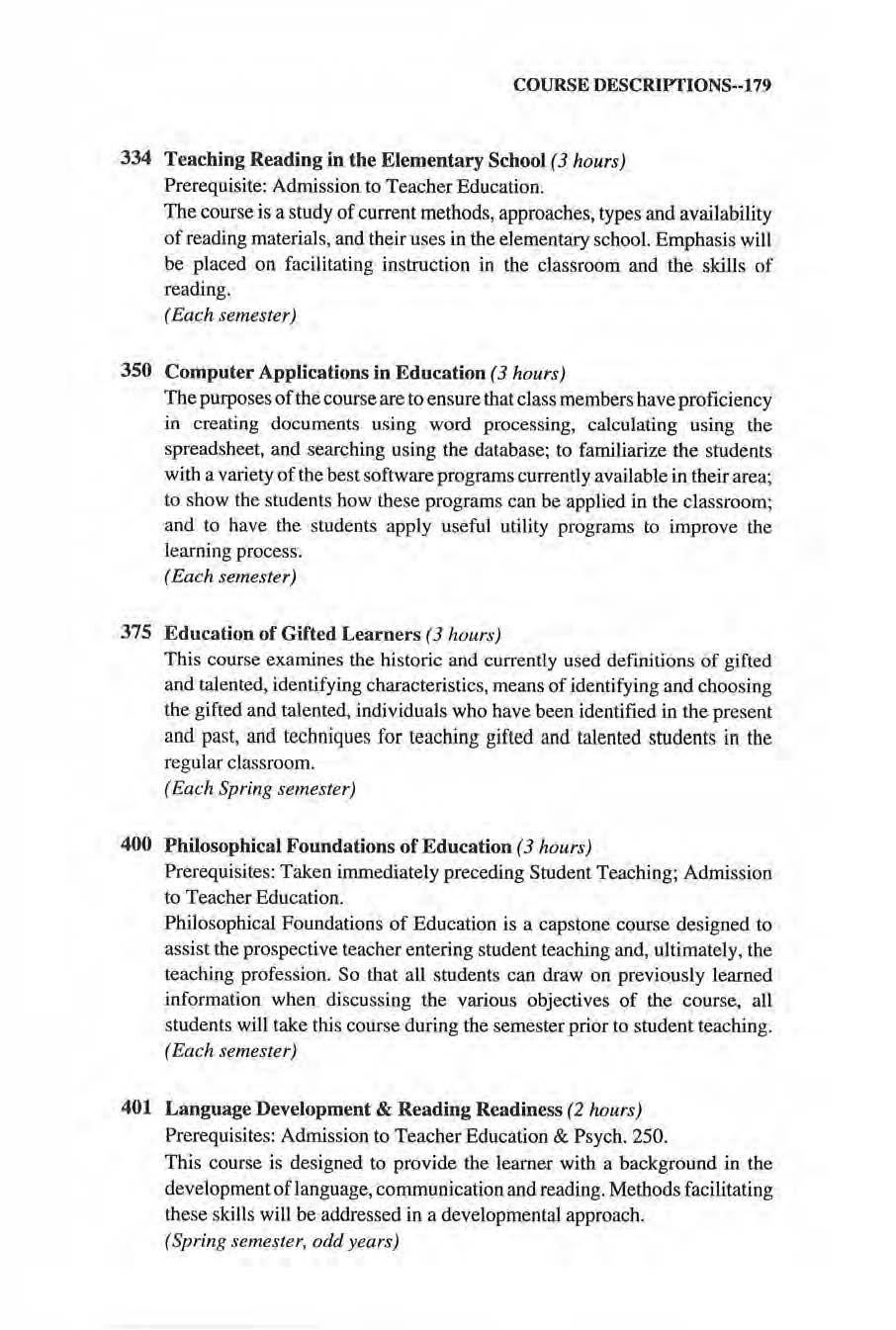
(Each semester)
401 Language Development & Reading Readiness (2 lwurs)
Prerequisites: Admission to Teacher Education & Psych. 250. This course is des igned to provide the learner with a background in the developmentoflanguage, communication and reading. Methods facilitating these sk ills will be addressed in a developmental approach.
(Spring semester, odd years)
COURSE DESCRJPTIONS--179
DESCRIPTIONS
402 Methods in Early Childhood Education (3 hours)
Prerequisites: Admission to Teacher Education and Bduc. 305. This course deals with curricu lum , program planning, materials. and individualization in Early Chi ldh ood Education.
(Each Spring semester)
403 Diagnostic and Remedial Reading (3 hours)
Prerequisites! Admission to Teacher Education; Educ. 334 or 434
This course is designed for students and practicing teachers who want to broaden their knowledge and skiU in diagnostic and remedial reading techniques. Th.is course will include the administration and interpretation of diagnostic instmments, the causes of reading problems, remedial techniques, and administrative procedures with which reading teachers should become familiar
(Each semester)
405 Diagnostic and Remedial Mathematics (2 hours)
Prerequisites : Admission to Teacher Education; SpEd 200, Educ. 327 or approval of Instructor.
This course is designed to provide a foundation fo r working with students who have special needs in the area of mathematics. Leaming theory and general techniques for dealing with in struction of students with special mathematics needs will be emphasized.
(Each Fall se mester)
409 Recertification Student Teaching (3-4 hours)
Prerequisite: Must have held an expi red Nebraska Initial Standard or Profe ssional Teaching Certificate or its equivalent from another state. This course is designed for those persons whose teaching certificate has expired for longer than 5 years. The course will provide the opportunity for the person to spend a minimum of three weeks in a K- 12 classroom to become reacquainted with students and classroom procedures. Educ. 409 will fulfill the State Department of Education Practicum requirement for renewal of an expired certificate.
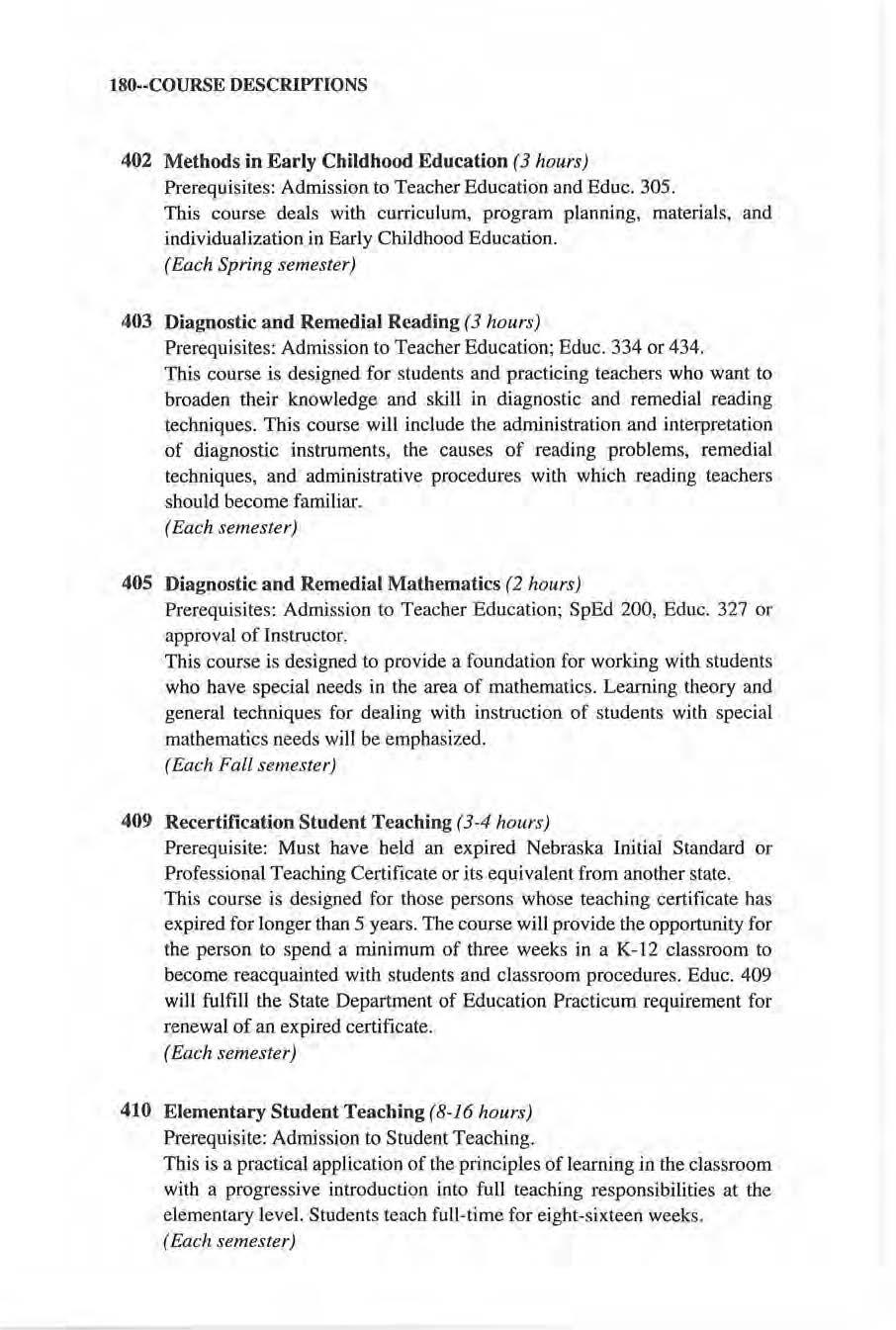
(Each semester)
410 Elementary Student Teac h ing (8-16 hours)
Prerequi site: Admission to Student Teaching. This is a practical application of the principles of learning in the classroom with a progressive introducti on into full teaching responsibilities at the elementary level. Students teach full • time for eight-sixteen weeks
(Each semester)
180--COURSE
411 Secondary Student Teaching (6-16 hours)
Prerequisite: Admission to Student Teaching. This is a practical application of learning principles in tbe classroom with a progressive introduction into full teaching responsibilities at the seco ndary leveL Students teach full-time for six-s ixteen weeks.
(Each semester)
412 Ea rly Childhood Student Teaching (8-16 hours)
Prerequisite: Admission to Student Teaching. This provides observations, laboratory and teaching experience in directing the learning activities of cbildren in Prekindergarten through grade three
(3). During the student teaching experience, the student applies the theories and princip les of learning and instruction. Students teach full-time for eightsixteen weeks.
(Each semester)
413 Middle Grades Student Teaching (8- 16 hours)
Prerequisite: Admission to Student Teaching.
This is practical application of learning principles in the classroom with a progressive introduction into full teaching responsibility at the middle grades level. StudenL,; teach full-time for eight-sixteen week s .
(Each semeste r )
415 Drug Vse and Abuse (2 hours)
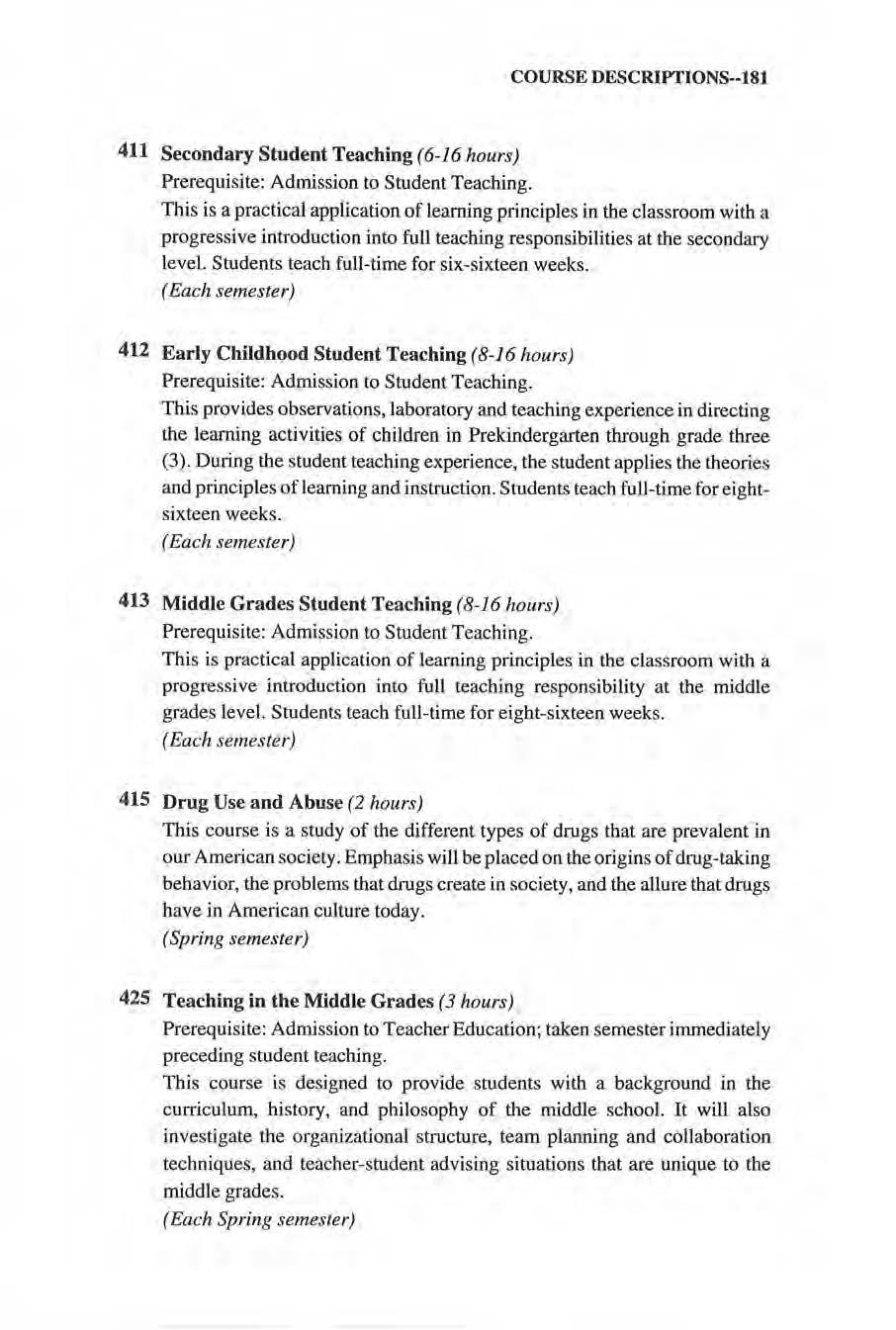
This course is a study of the different types of drugs that are prevalent in our American society. Emphasis will be placed on the origins of drug-taking behavior, the problems that drugs create in society, and the aUure that drugs have in American culture today.
(Spring semester)
425 Teaching in the Middle Grades ( 3 hours)
Prerequisite: Admission to Teacher Education; taken semester immediately preceding student teaching.
This course is designed to provide students with a background in the curriculum, history, and philosophy of the middle school. It will also investigate the organizational structure, team planning and collaboration tec hniques, and teacher-student adv ising situations that are unique to the middle grades.
(Each Spring semester)
COURSE DESCRIPTIONS--181
434 Secondary Reading and Writing Across the Curriculum (3 hours)
Prerequisite: Admission to Teacher Education. The course will be a study of the curre nt trends and practices in reading in the secondary schools. Emphasis will be l)laced on ways for teachers to improve reading s kills for students as well as ways to u se those skilJs to improve learning. The reading/writing relationship will be explored and st udents will be introduced to the process method of writing in s truction Ways to incorporate this method of writ ing into content area classrooms will be presented as weU as other composition methods that can be used in the content areas.
(Each semester)
441 Cooperative Education Internship ( 1-1 2 hours)
Prerequisites: Uppe r- c l ass stand ing , permission of Director of Cooperative Education and Chair of Ed ucatio n Division.
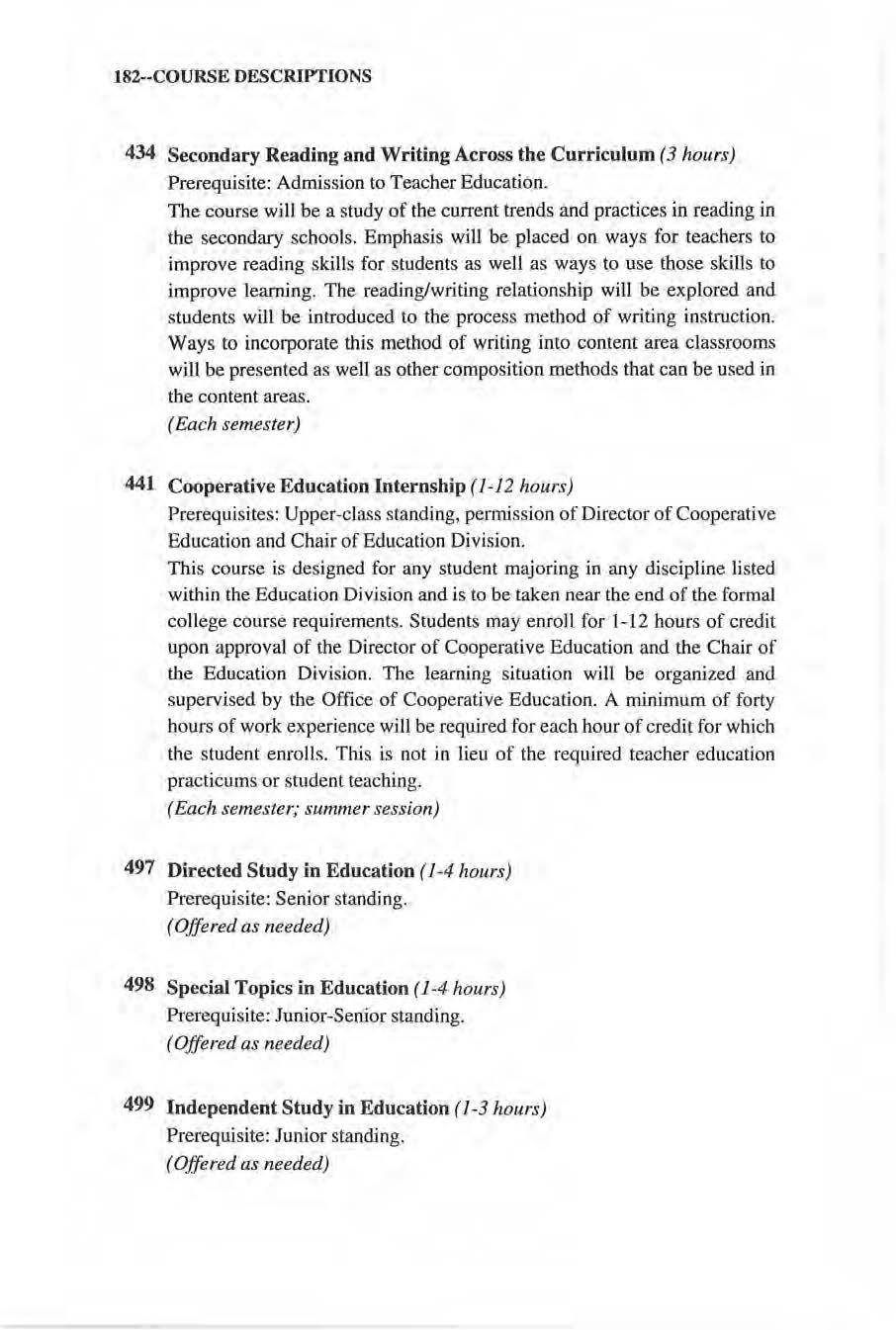
This course is des igned for any student majoring in any discipline li sted within the Education Division and i s to be taken near the end of tbe formal college course require ments. Students may enroll for 1-12 hours of credit upon approval of the Director of Cooperative Edu cation and the Chair of the Education Divis io n. The learning s ituati on will be organized and supervised by the Office of Cooperative Education. A minimum of for ty hours of work experience wjj) be required for eac h hour of c redit for which the student enrolls. This is not in lieu of the required teacher educat ion practicums or student teaching.
(Each semester; summe r session)
497 Directed Study in Education ( 1 -4 hours)
Prerequisite: Se ni o r s ta nding.
(Offe red as needed)
498 Special Topics in Education (1-4 hours)
Prerequ is ite: Junior-Seruor standing.
(Offered as needed)
499 Independent Study in Education ( 1-3 hours)
Prerequisite: Junior standing.
(Offered as needed)
182--COURSE DESCRIPTIONS
English
060 Study Skills ( I hour, credit/no credit)
Thi s course is designed to heJp students learn effective study skills which can be used to promote academic success in college. Units to be covered include managing time, improvjng memory, taking lectu re notes, reading textbooks, talcing examinations, writin g themes and reports, malcing oral reports, improving scholastic motivation, improving interpersonal skill s, and improving concentration. Thi s course is required of all freshman probationary students who have attempted 21 hours or less. This cmuse is open to all students.
(Each semester)
070 Reading (1 hour, credit/no c redit)
This course is designed to help students learn effective reading skills which can be used to promote academic success in college. Units to be covered include re ading comprehension, vocabulary development, and word knowledge. This course is a developmental requirement for stude nts identified as needing reading improvement training. Students required to enroll in English 070 must successfu lly complete the post-test with the necessary passing score before enrolling in English JO L Students who do not earn the necessary passing score will be requi red to enroll in English 071.
(Each semester)
071 Reading ( 1 hour, credit/no credit)
This course is a continuation of English 070 readi ng; that is, this course is designed to help students learn effective readjng skills wbicb ca n be used to promote academic success i n college. Units to be covered include reading comprehe nsion , vocabulary development, and word knowledge. Thi s course is a developmental requirement for students identified as needing reading improvement training. Students required to enroll in English 071 must successfully co mplete the post- test with the necessary passing score before enroll ing in Eng lish 101. Students who do not earn the necessary passing score will be required to meet with the Vice President for Student Affairs to discuss independent course options that can be devised by the director of the Communication Skills Center to promote student success.

(Each semester)
075 Speed Reading (1 hour, c redit/no credit)
This course is designed to help students learn effective speed reading sk.ills which can be used to promote academic success in college. Un.its to be covered include warm-up letters. warm-up words, column reading, eye movement, paced reading, and timed reading. This course is open to all students.
(O.fj'ered as needed)
COURSE DESCRlPTIONS--183
080 Composition() hour, credit/no c redit)
Thi s course is designed to help students learn effective writing ski ll s whjch can be used to promote academic s uccess in college. Uruts to be covered include capitalization, grammar, punctuation, spe lling, planning, developing paragraphs, compos ition skiJls, and English fundamentals. This course is a developmental requirement for students identified as needing wiiting improvement training. Students required to enroll in English 080 must s uccessfully complete the post-test with the necessary passjng score before enrolling in English JOI. Students who do not earn the necessary pass ing score will be required to enro ll in English 081.
(Each semeste r)
081 Composition ( I hour, credit/no credit)
This co urse is a continuation of English 080 composition; that is, this course is designed to help students learn effective writing skllls which ca n be used to promote academic success in college. Units to be covered include capitalization, grammar, punctuation, spelling, planning, developing paragraphs, compositio n ski ll s, and English fundamentals. This course is a developmental requirement for s tudents identified as needing writing improvement training . Student s required to enroll in English 08 I must successfully complete the post-test with the necessary passing score before enro lling in English 101. Students who do not earn the necessary passing score will be required to meet with the Vice Presidenl for Student Affairs to discuss independent course options that can be devised by the Director of the Communication Sk ill s Center to promote student success.
(Each semester)
101 English Compos ition (3 hours)
A study of the principles of clear and effective exp ression as appl ied to the sente nce , paragraph, and the whole composition. A review of grammar, mechanic s, and correct usage. Training in orgaruzation, and the writing of short and long papers. Required course fo( all freshmen. Each semes ter the department will offer at least one special focus course but no more than two . The~e special secti o ns of English IO l are open to all students and focus on diverse subjects (s uch as Prairie Literature or Science Fiction) or on specific areas (such as E cology and Society) of special concern to students.

(Note: Students who rank at the 85th percentile or higher on the Eng li sh portion of the ACT may be excused from English 10 L)
(Each semester)
101 Advanced Englis h Composition (3 hours)
Prerequi site: English 10 I.
Advanced training in writing a variety of types of papers with emphasis placed OD writing which requires the student to think critically, support generalizations, an d appropriately acknowledge sow·ces of information .
(Each semester)
184--COURSE DESCRIPTIONS
202 Appreciation of Literature (3 hours)
Meets a general education requirement designed to increase the student's appreeiation of literature with an emphasis on modern literary forms. (Each semester)
203 Literature for Children through Adolescence (3 hours)
A survey of literature for children through adolescence with an emphasis on applying the principles of evaluation to selected books from both traditional and modem picture books, poems, and stories. ( Each Spring semester)
222 World Literature to 1500 (3 hours)
An introduction to classical and medievaJ traditions in Westero literature. (Spring semester, even, years)
223 Non-Western Literature (3 hours)
An examination of significant literary works of Africa, the Middle East, Asia, Austral ia, New Zealand, Latin America, and the Caribbean (Each semester)
225 Short S tory (2 lwu,~~)
The major empbasis of this course is on the development of the short story in American literature. (Fall semester, even years)
297 Directed Study in English ( 1-4 hours)
Prerequisite: Senior Standing. (Offered as needed.)
298 Special Topics in English ( 1-4 hours)

P rerequisite: Freshman-Sophomore s tanding. (Offe r ed as needed)
301 Traditional Grammar (3 hours)
The emphasis of this course is on an in-depth analysis of sentence s lructure. (Spring sem ester, odd years)
305 Practicum in Composition (3 hours)
An investigalion of current practices, research, issues, and theorie s about teaching composirjon to see how tlley apply 10 classroom teaching. ( Fall semester, even years)
COURSE DESCRIPl'IONS--185
306 Nebraska Literature. (3 hours)
Prerequisite: Consent of the instruc tor. An introduction to the works of Nebraska writers and literature about Nebraska.
(Spring semester, even yea rs)
307 Seminar in the Modern Novel (3 hours)
A s tudy of modem fiction as it mirrors the philosophical, sociological, psychological, and scientific thought of the twentieth century.
(Fall semester, odd yea rs)
308 Business English (3 hours)
Prerequisite: Eng 201, Advanced English Composition. A study of business En_glish and communication as well as a study of how to comp ose and produce the various types of letters used in the business world. This co urse is approved as an elective for business majors.
(Offered as needed)
309 Creative Writing (3 hours)
Experimentation with writing poetry, short fiction, and on e-act plays in a writing workshop setting. (Each Fall semester)
3 2 1 British Literature I (3 hours)
The study of Britis h Literature from the Old Eng li sh period to the 17th Century. Works and writers stud ied may .include Beowu(f, Chaucer, the Pearl Poet, Miracle and Morality Plays, Utopia , Spenser, and Milton_ (Spring semester, odd years)

323 British Literature Il (3 hours)
The study of British Literature from the 17th to the early 20 th Century. Areas of s tudy may include selected words of post- Shakespearian drama, metaphysical poets. and the literature of the Romantic and Victorian periods. ( Fall semester, even years) ·
324 American Literature I (3 hours)
An historical survey of significan t American writing from the Co lonial Period to 1865. Major writers receive chief emphasis. (Fall semester, odd years)
325 American Literature II (3 hours)
A continuatio n of Englis h 324 from 1865 to present. ( Each Spring semester)
186--COURSE
DESCRIPTIONS
328 Modern Poetry (3 hours)
A s tudy of British and American poetry of this century and its relevance to co nte mporary l i te rature a nd life. (Spring sem este r, even years)
357 I nterpretative Reading (3 hours)
This co urse is designed to emphasize oral reading of worthwhile li terature in gro up settings. It includes the close, cri tical analysis of practice selections as we ll as the study and practice of basic delivery techniques. This co urse is dual lis ted with Speh 357 . (Each Spring semester)
375 Film Study (3 hours)
An introd uction to film s tudies with e mphasis on cri tical analysis., historical development, c ultural significance, and cinematic technique. (Ea ch Spring semester)
4 18 Shakespeare (3 hours)
A stud y of representative plays and so nnets. (Spring semester, even years)
440 History of the English Language (3 hours)

A s tudy of the growth of modern English through examin ation of change s in the so unds, forms and syntax that have occu1Ted in the language and the development of vocabulary ( Pall semester, odd years)
441 Pre~Shakespearean Drama (3 h ours)
The development of drama an d theatre through class ical and native channel s to their cu lminatio n in Eli zabethan drama.
( Offered as needed)
442 Post-Sh akespearean Drama (3 hours)
This course provides the basis for the a ppreciation and understanding of the variety and growth of dramatic literature during the years following the death of Shakespeare to the advent of modern theatre.
(Offered as n eeded)
443 Modern Dram a 1890 - present (3 hours)
This course provides th e s t ude nt the opportunity to follow the g rowth of modern dramatic techniques i n the western world, t he interaction of these techniques with the modern movements in art, music and other art forms, and to make the student aware of his recent h eritage of dramatic literature and its position in th e world of tho ugh t and emotion.
(Spring semester, odd years)
COURSE DESCRIPTIONS--187
DESCRIPTIONS
497 Directed Study in English ( 1 -4 hours)

Prerequisite: Senior s tanding.
( Offered as needed.)
498 Special Topics in English ( 1-4 hours)
Prerequisite: Junior/Senior standing.
(Offere d as needed)
499 Independent Study in English (J-3 hours)
Prerequisite: Junior standing; Permission of Instructor and prior approval of Division Chair.
(Offered as needed)
General Science
100 Physics (4 hmirs)
This course is designed to acquaint the student with physics. The areas of energy, mechanics, heat, electricity, sound, and light are surveyed. Three hours classwork, two hours laboratory.
(Fall semester, even years)
205 Introductory Biology (3 hours)
An integrated co urse specifically des igned for the non -sc ience student covering the various phases of mans biotic world including a variety of learning experiences. Does not apply to the major or support in Biology.
(Each semester)
206 Pdnciples of Physical Science (3 hours)
An integrated course specifically designed for the non-sc ience student covering the various phases of man 's physical and chemical world. Experiences with a variety of learning situations, such as demonstrations, experiments, instructional television, and other vis ual aids are included. Does not apply to the major or support in Physical Science.
( Each Spring semester)
232 Energy (3 hours)
A study of energy resources with a focus on both nucl ear and conventional power stations , design operation, cost, governmental regulations, safety, and environmental effects. Field trips to nuclear and con ventional generation stations are required.
(Each Fall semester)
188--COURSE
241 Coo perative Education Internship ( 1-4 hours)
P rerequisite: 15 hours of completed coursework, minimum GPA 2.0. pe rmission of Cooperative Education staff and Di vis ion Chair. This program is designed for students with an intended major in the Science and Technology Division to explore and/or g ain work experience rel ated to their major and anticipated career goals. Students may enroll for 1-4 ho urs of cred it whi ch will be graded on a credit/no c redit basis. A minimum of forty hours of work experience will be required for e very hour of cred it per semester. Tbe student will complete necessary paperwork with employer and Cooper ati ve Education office. The student's work will be s upervised by Cooperative Education staff. A final paper will be prepared at the conclusion of the i nt erns hip.
(Each semester; summer session)
297 Directed Study in General Science ( 1- 4 hours)
Prerequisite: Senior standin g.
(Offe r ed as needed)
298 Special Topics in General Science ( 1-4 hours)
Prerequisite: Fres hman -Sophomore standing
(Offe r ed as needed)
441 Coop erative Education Internship ( 1 - 12 hours)
PrerequJsite: 45 h ours of completed coursework, m.inJmum 2.0 GPA, permiss ion of Cooperati ve Education staff and Di vision C h air. This program is designed for s tudents with a maj o r in the Science and Technology D ivision to gain work experience related to t he ir .major and career goals. Students may enroll for 1-12 hours of g raded credit. A minimum of forty hours o f work experience wi l I be req uired for every hour of cred it per se mester. The student will complete necessary paperwork with employer a nd Cooperat ive Education Office The stud en t's work will be supervised by Cooperative Edu cation staff. A final paper will be prepared at the co nclusion of the internship.
(Each semester; summer session)
497 Directed Study in Gene ra l Science (1-4 hours)
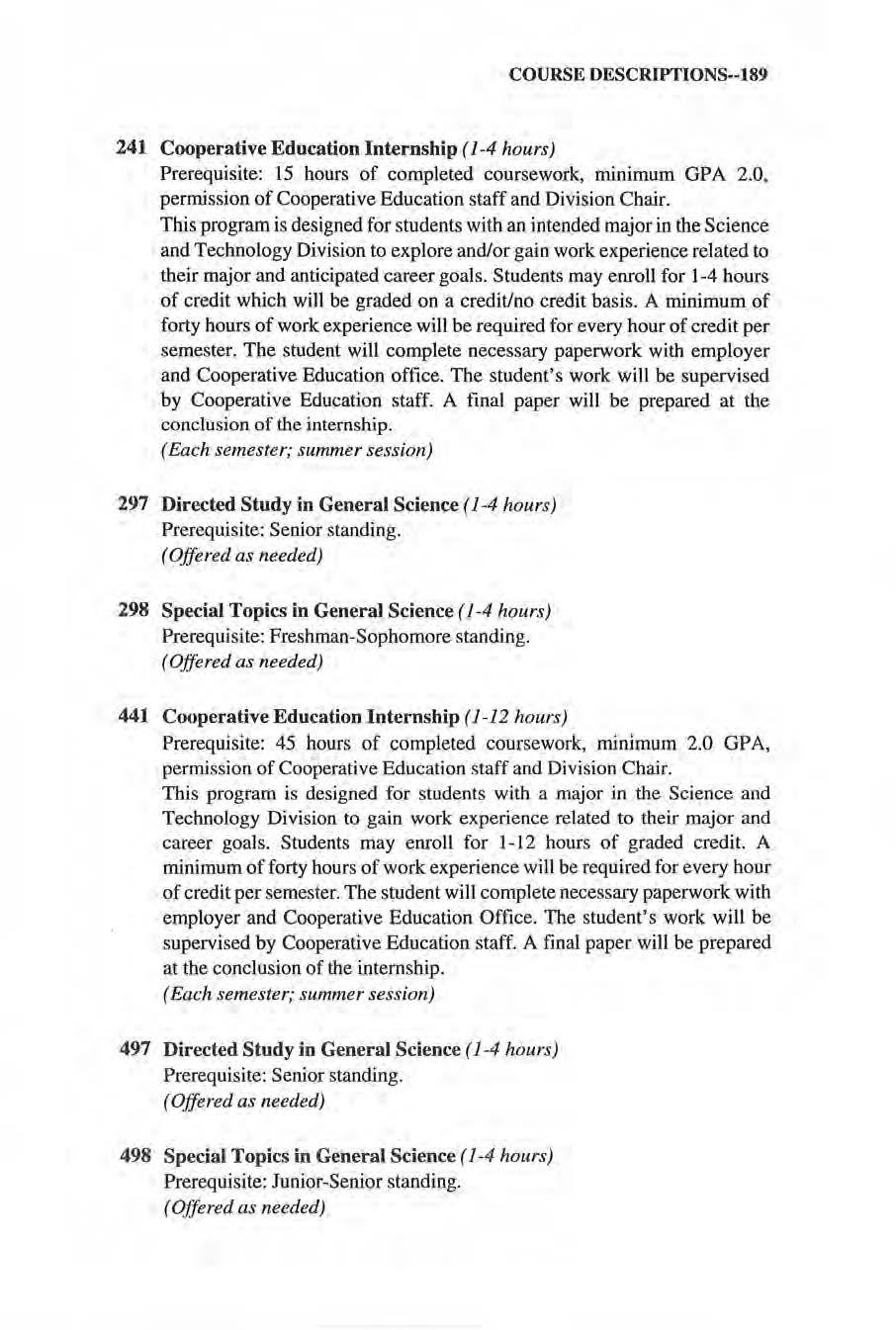
Prerequis ite: Senior standing.
(Offered as needed)
498 Special Topics in General Science ( 1-4 hours)
Prerequisite: Junior~Senior standing.
( Offered as needed)
COURSE DESCRIPTlONS--189
499 Independent Study in Gen eral Science(J -3 hours)
Prerequisite: Junior Standing; Perm.ission of Instructor and prior approval of Division Chair.
(Offered as needed)
Geography
101 Principles of Physical Geography (3 hours)
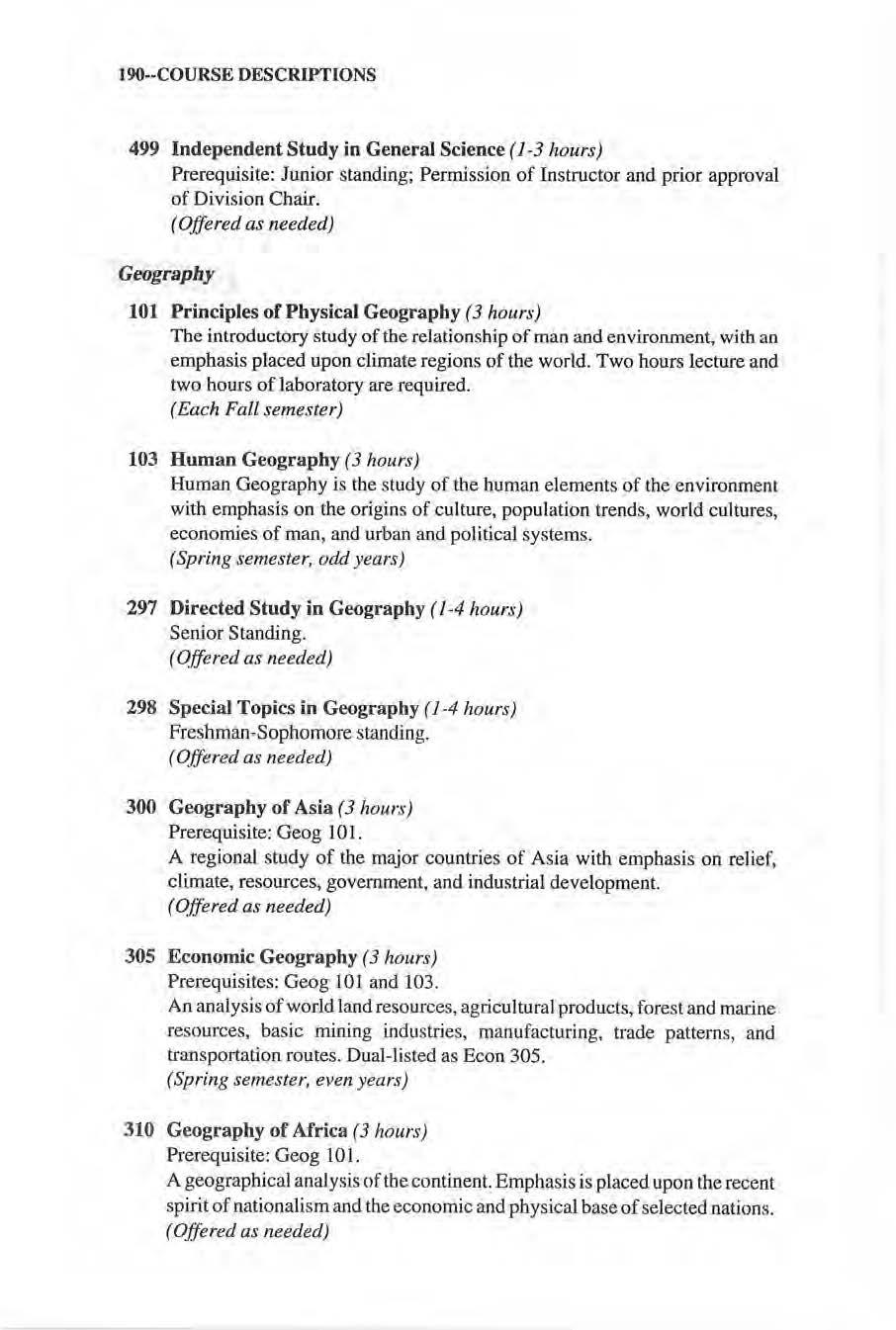
The introductory s tudy of the relationship of man and environment, with an emphasis placed upon climate regions of the world. Two hours lecture and two hours of laboratory are required.
(Each Fall semester)
103 Human Geography (3 hours)
Hu man Geography is the st udy of the human elements of the environment with emphas is on the origins of culture, population trends, world cultures, economies of man , and urban and political syste ms .
(Spring semester, odd years)
297 Directed Study in Geography ( 1-4 hours)
Senior Standing.
(Offered as needed)
298 Special Topics in Geography ( 1-4 hours)
Freshman-Sophomore standing
(Offered as needed)
300 Geography of Asia (3 hours)
Pre requisite: Geog 101.
A regional study of the major countries of Asia with emphasis on relief, climate, resources, government, and industrial development.
(Q/fered as needed)
305 Economic Geography (3 hours)
Prerequisites: Geog IOI and 103.
An analysis ofworJd land reso urces, agricu ltural products, forest and marine resources, basic mining indu s tries, manufacturing, trade patterns, and transportation routes. Du al-listed as Econ 3 05.
(Sp rin g semester, even years)
310 Geography of Africa (3 hours)
Prerequisite: Geog IO I.
A geographi cal analysis of tbe continent. Emphasis is placed upon the recent spirit of nationalism and the economic and physic al base of selected nations.
(Offered as needed)
190--CO URSE
DESCRIPTIONS
311 Urban Geography (3 hours)
Study of the origin, distribution, inte rnal structu re and functions of urban developments with an emphasis on location features of economics and cultural phenomena.
( Offered as 11eeded)
312 Geography of Anglo-America (3 hours)
Prereq uisite: Geog 10 l or Senior standing.
A study of the United States and Canada by natural regions. In each case an evaluation of the physical and economic base wiJl be made in the li ght of the present economic condition.
(Offered as needed)
313 Geography of South America (3 hours)
Prerequisite: Geog lOL
The geographic regions of South America are analyzed in their natural , political. and economic settings as well as the economic relations between South America and the United States.
(Offered as needed)
326 Conservation of Natural Resources (3 hours)
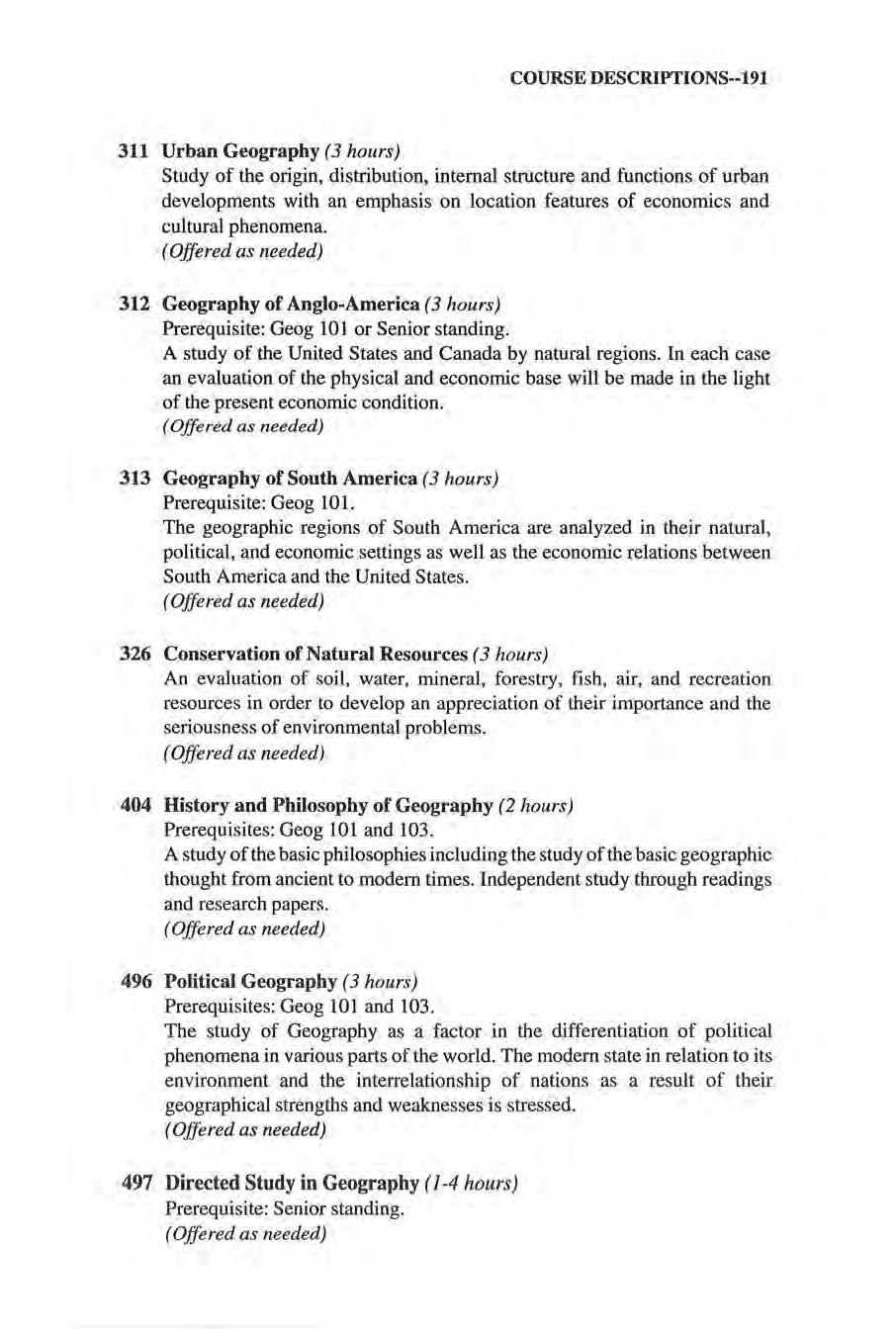
An evaJuat ion of soi l, water, mineral, forestry, fish, air, and recreation resources in order to develop an appreciation of their importance and the seriousness of environmental probl ems .
(Offered as needed)
404 History and Philosophy of Geography (2 hours)
Prerequisites: Geog IOI and 103..
A study of the basic philosophies includin g the study of the basic geographic thought from ancient to modem times. Independent study through readings and research papers.
(Offered as needed)
496 Political Geography (3 hours)
Prerequisites: Geog IOI and 103
The study of Geography as a factor in the differentiation of political phenomena in various parts of the world. The modern state in relation to its environment and the interrelationship of nations as a result of their geographical stre ngth s and weaknesses is s tressed.
(Offered as needed)
497 Directed Study in Geography (1-4 hours)
Prerequisite: Senior standing.
(Offered as needed)
COURSE DESCRIPTIONS••l9l
498 Special Topics in Geography ( 1 -4 ho urs)
PJerequ isite: Junior-Senior standing.
( Offered as needed)
499 Ind ependent Study in Geography ( 1 -3 hours)
Prerequisite: J unior s ta ncling; Permission of Instructor and prior approval of Division Chair.
(Offered as n eeded)
Geology
201 Physical Geology ( 4 hours)
An introducti o n to the theories of the earth's origin and the study of the earth 's structure and materials witb a special emphasis on rock, minera ls, landforms, oceanography and environmental studi es. Tliree hours lecture, two hours laboratory.
(Offered as needed)
2 0 2 Rocks and Minerals (/-3 hours)
An introductory course to the stu dy of the phy s ical properties of rocks and minerals stressing field work at mineral and rock localities in Southeas t Nebras ka.
( Offered as needed)
2 03 Introduction to Fossils ( 1-3 hours)
This is an int roductory course to the methods of interpreting the foss il record through actual field work at fossil locations in Southeast Nebraska.
(Offered as needed)
297 Directed Study in Geology ( 1-4 hours)
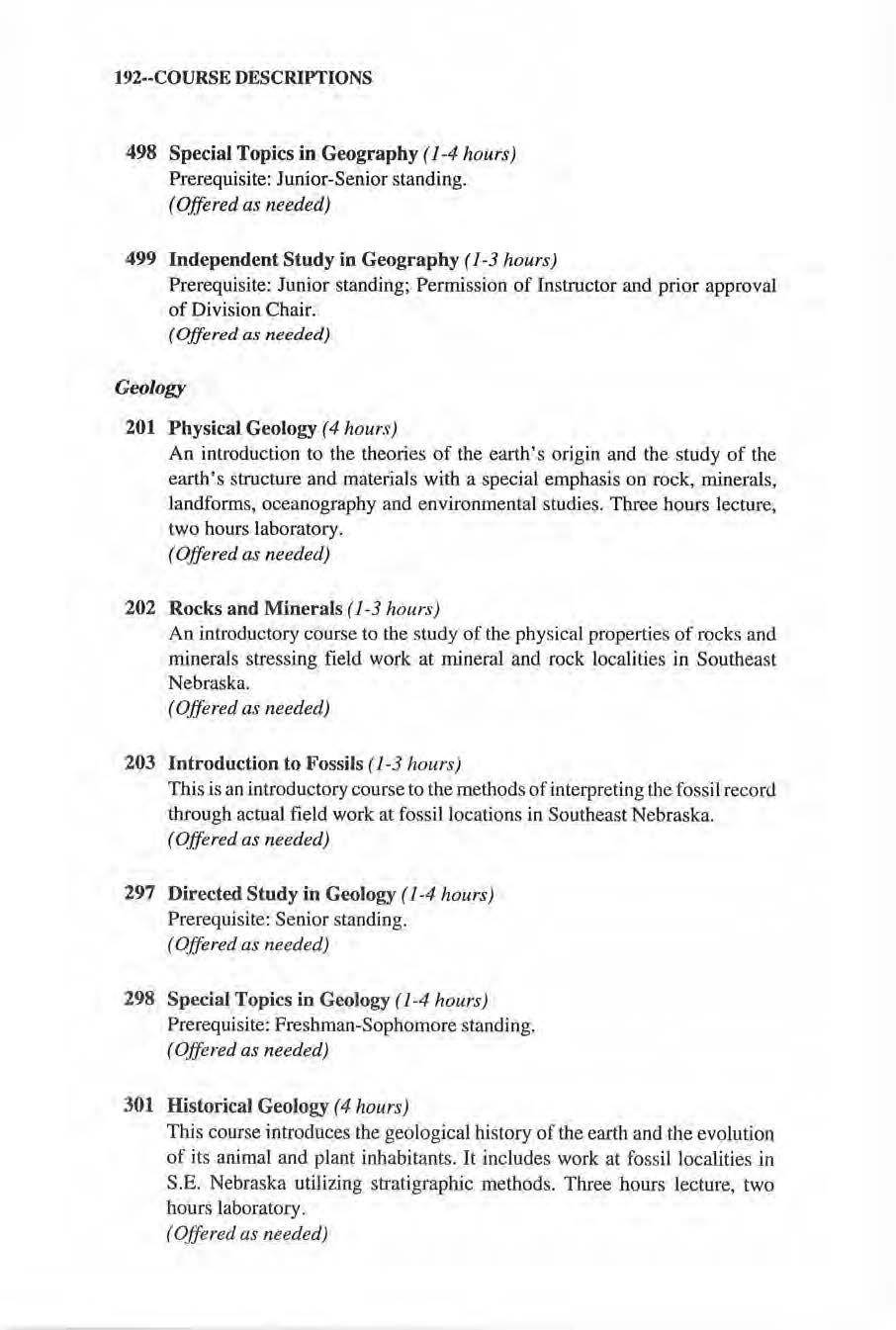
Prerequisite: Senior s tanding.
( Offered as needed)
298 Special Topics in Geology ( 1-4 hours)
Prerequi site: Freshman-Sophomore standing.
(Offered as needed)
301 Historical Geology (4 hours)
This course introduces th e geo logical history of t he eartb and the evolution of its animal and plant inh abitants. It includes work at fossil localities in S.E. Nebraska utilizing stra ti graphjc methods. Three h o urs lecture, two hours laboratory.
(Offered as needed)
192--COU RSE
DESCRIPTIONS
304 Meteorology an d C limatology (3 hou r s)
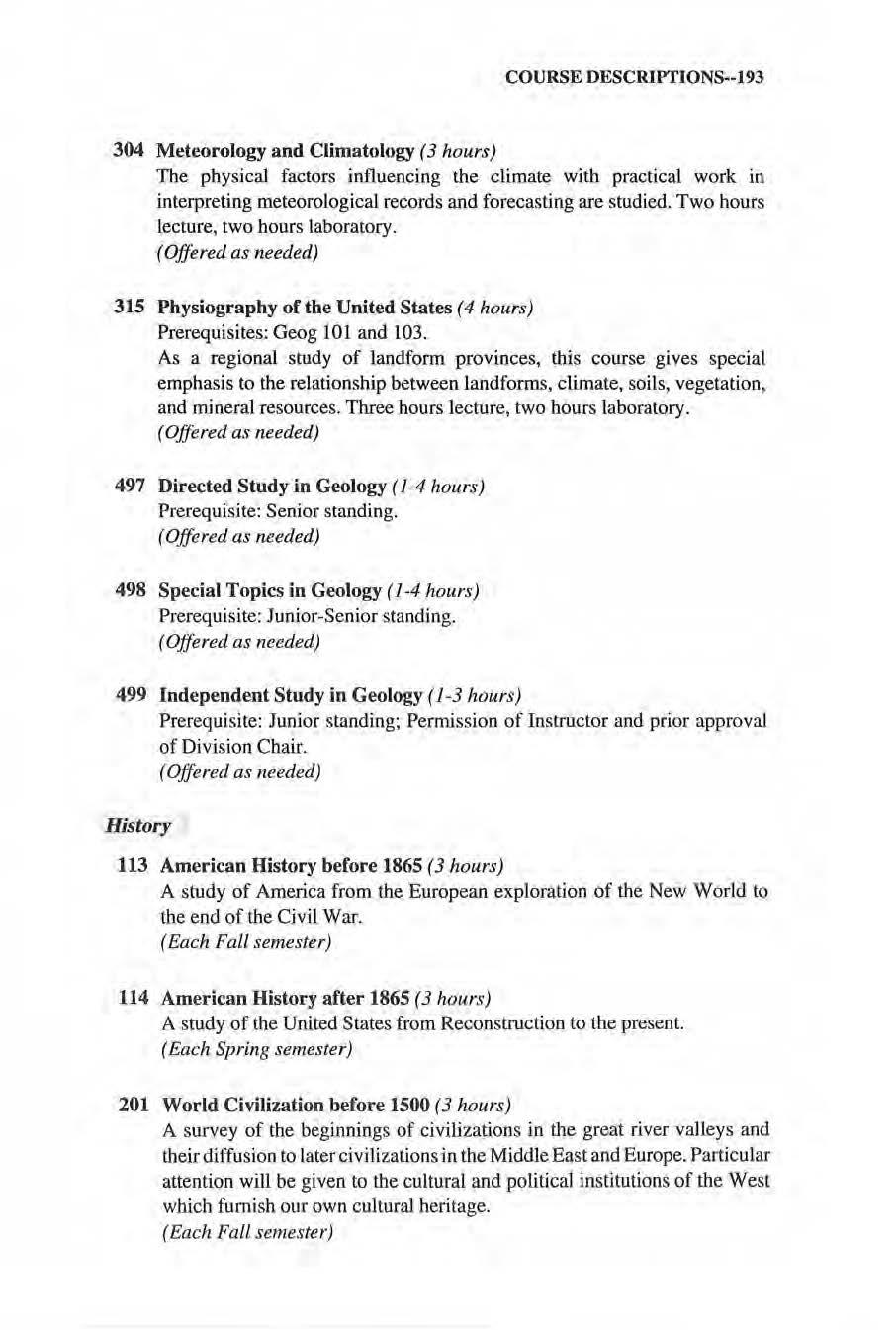
The physical factors i nflu e ncing the climate with practical work in interpreting meteorological records and forecasting are s tudied. Two hours Lecture, two hou rs l abor atory.
( Offered as needed)
315 Physiography of the United States (4 hours)
Prerequis ites: Geog 101 and 103 .
As a reg ional s tudy of landform provioces, this course g ives specia l emphasis to the relationship between landforms, c limate, soils , vegetation, and mineral resources. Three hours lecture, two hours laboratory.
(O.ffered as n eeded)
497 Directed Study in Geology ( 1-4 hours)
Prerequisite: Senior s tandin g .
(Offered as needed)
498 Special Topics in Geology (1-4 hours)
Pl'erequisite: Junior-Seni o r sta ndin g.
(Offered as needed)
499 Indepe ndent Study in Geology ( 1 -3 hours)
Prerequi s ite: Junior standing; Permission of Instructor and prior approval of Divisio n Chair.
(Offered as needed)
History
113 Ame rican H istory before 1865 (3 hours)
A stu d y of America fro m the European exploration of the New World to tbe end of the Cjvil W ar.
(Each Fall semester)
11 4 American Histor y after 1865 (3 hou r s)
A study of the U nited States from Reco nstruction to the present.
(Each Spring semester)
201 World Civilization before 1500 (3 ho urs)
A sw-vey of the beginnings of civilizations in the great river valleys a nd theirdlffu sion to later civil izations-in the Middle East and Europe. Particular attention will be given to the cultural and political i n stitutions of the West which furnish our own cultural her it age.
(Each Fall semester)
COURSE DESCRJPTJONS--193
202 World Civilization after 1500 (3 hours)
The rise and decline of European predominance will be analyzed with emphasis upon the major socia l, po litical, and economic ideologies and institutions that e volved.
( Each Spring semester)
251 Modero Africa (3 hours)
Modem Africa presents the history of sub-Saharan Africa, co ncentrating on the events of the last three centuries and provid ing comparison s with European and American history. (Each Fall semester)
297 Directed Study in History (1-4 hours)
Prerequisite: Se ni or standing. (Offered as needed)
298 Special Topics in History (l-4 hours)
Prerequisite: Freshman-Sophomore standing. (O.ffered as needed)
301 Colonial Amer ica (3 hours)
Prerequisites: History 113 or instructor 's permiss ion.

A study of colonia l rivalry between the Spanish, French, English, and Dutch in North America; rhe Revolution: and U.S. history to 1800. (Offered as needed)
302 The Civil War and Reconstruction (3 ho1ers)
A study of t he U.S. from 1800 through 1876 describing the causes and consequences of the Civil War. (Fall semester, even year!.)
303 U.S. In The Twentieth Century (3 hours)
Prerequisite: History 114 or instructor's pennjssion.
A study of the U.S. in modern times with an emphasis upon the changing social and economic theories of the period and the internal forces tha t influenced their development
(Spring semester, odd years)
304 African American History (3 hours)
A survey of African American life and culture in America from 1619 to the present.
(Fall semester, odd years)
194--COURSE D ESCRlPTIONS
305 American Leadership (3 hours)
Prerequisite: PSCI 101
This course uses the works of historians and political scientists to examine leadership in its many facets - leading organizations, foste rin g change, winning elections, creating movements, and shap in g public opinion. Dual listed as Psci 305.
(Spring semester, even years)
329 Hist.ory of Nebraska (3 hours)
A survey of the political, economk, social, and constitutional developmeut of Nebraska from prehistoric times to the present.
(Spring semester, even yea r s)
343 English History from 1688 (3 hours)
Prerequisite: History 202 or instructor's permission.
A survey of the social, political, and eco nomic development of England since the Glorious Revolution. The course covers the social and religious impact of the English Parliamentary system, the effects of the Industrial Revol ution upon the British Empire, and theprospects of tbe modern welfare state of contempo rary England.
(Spring semester, odd years)
345 Modern E urope (3 hours)
Prerequisite: History 202 or instructor's permission. A comparative historica.l analysis of the ongoing process of modernization in Europe. The emphasis is on movements and institutions such as Liberalism, Conservatism, Romantici sm, Socialism, Imperialism, and Totalitruianism from 1815 to the present.

(Spring semeste r, even years)
411 American Frontier (3 hours)
Prerequisite: History 113 or permission.
A s tudy of the importance of the frontier in America from colonial times to the 20th century.
(Spring semester, odd years)
425 Seminar in American History (3 hours)
Prerequisite: Senior standing
This course describes the major fields and periods of American history , the contributions of lead i ng historians, and the conflicting interpretations of major issues in American history. Th is course is the capstone course and senior competency for the Social Science major.
( Each Fall semester)
COURSE DESCRIPTIONS••l95
426 American Constitutional Law (3 h o urs)
Prerequi s ite: PSci 20 I .
A s tudy of the hi s torical political context of constitutiona l doctrine through major decisions. The emp hasis is on co nstitu ti ona l growth as it rela tes to the fundamental structure of America n government and the social order. Dual - listed as PSC I 4 26.
455 History of Russ ia and the Soviet Union (3 hours )
An analysis of the social, c ultural, political, and economic evolution of Russ ia under the Czars, and the formation of the Soviet Union, a nd the dec line of Communism.
( Offered as needed)
497 Directed Study in History ( 1-4 ho urs)
Prerequi site: Senior Standing (Offe red as n eeded)
498 Special Topics in History ( 1-4 hours)
Prerequisite: Junior-Se nior standfag. ( Offe r ed as needed)
499 Independent Study in History ( 1-3 ho urs)
Prerequis ite: Junior s tandin g; permiss io n of I ns tructor and prior approva l of Division Chair (Offe r ed as needed)
Honors Program
101 Twentie th Century Issues -Literary Styles (3 hours)
Permi ss ion of Honors Progra m C oord inator required. (Satisfies the General Studies Lite rature require ment)
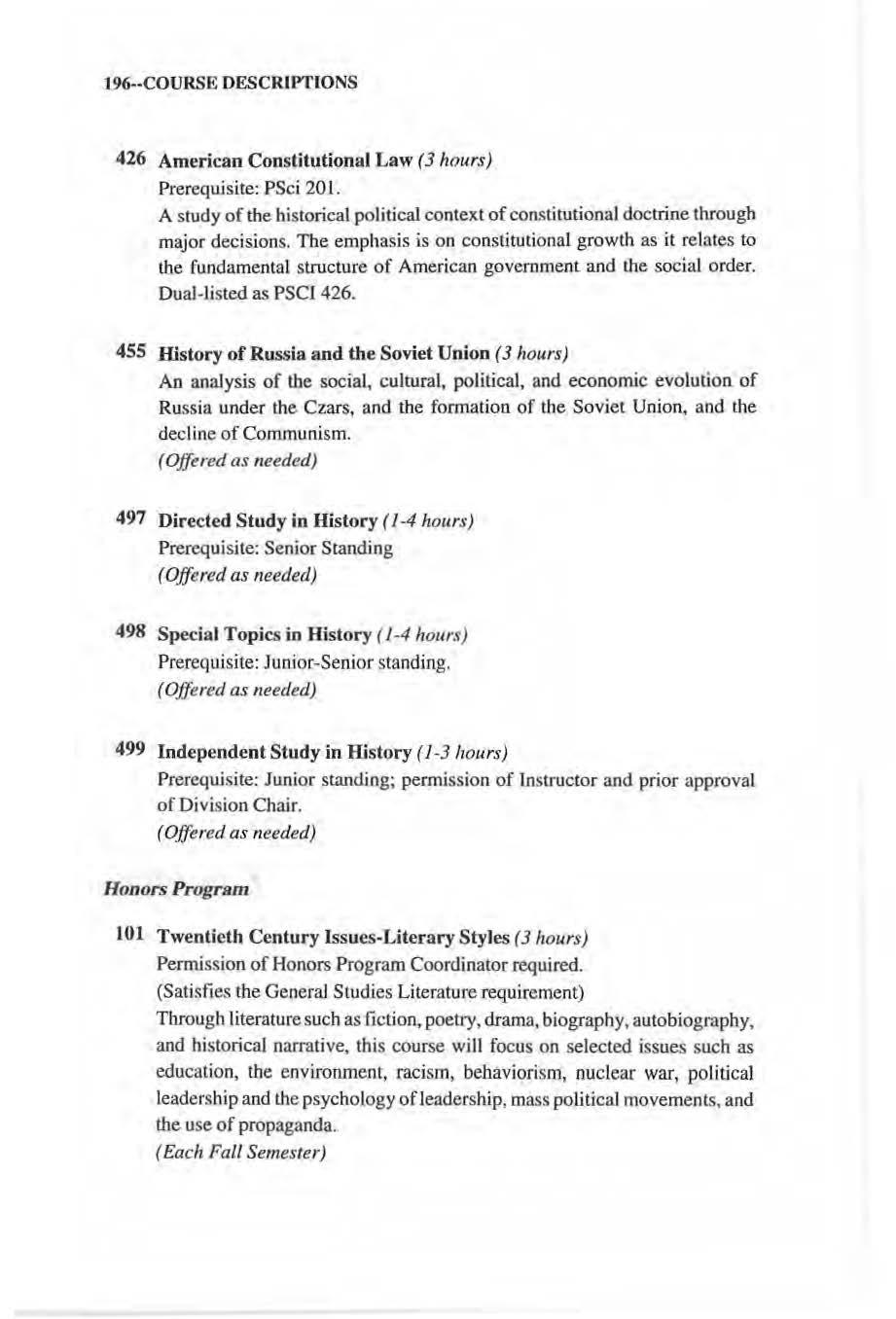
Throug h literature s uch as fiction, poetry, drama, biography, a utobiograp hy, a nd historical narrative, this cou rse wi ll focus o n sel ected issues such as education, the e nvironment, racism, behaviorism, nucle ar war, po litjcal leadership and the p syc ho logy of lead e rs hip, mass po liti cal movements, a nd the use of propaganda.
( Each Fall Semester)
196--COURSE DESCRIPTlONS
201 Making Sense: Art in the World (3 hours)
Pennission of Honors Program Coordinator required.
(Satisfies the General Studies Aesthetics requirement)
This is an integrated Fine Arts course designed to provide students the opportunity to view and discuss the interrelatedness of the fine arts, in partic ular the performance arts, e.g., classical theatre, modern theatre, musical theatre, ballet, modem dance, choral performance, orchestral performance, opera, the visual arts in all media, film, photography, architecture, etc. It will rely heavily upon on-campus seminar sessions and studen t attendance at on-campus and off-campus performances.

(Each Spring semester)
204 Contemporary Asian Cultures (3 hours)
Permission of Honors P rogram Coordinator required.
(Satisfies the General Studies Non-Wes tern Studies or Human Relation s requirement, but not both)
This course will introduce societies and cu ltures of the Far Eastern countries with emphasis on Japan, Korea, and China. The course covers s uch topics as the group, relativi s m, education, business , religio n , role of women, and psychological trai ts. In addition, students will look at the current issues affecting the United States a nd Asian countries.
(Each Spring semester)
205 Science and Society (3 hours)
Permission of the Hono rs Program Coordinator required.
(Satisfies one of the General Studies Sc ience course requirements)
This course will focus on the scientific method, and the impact that science has on society and individuals. Topics to be considered wi ll be the relationships of science, ethics, politics, moral issues, and societal goals. Students will read published articles, write about, and discuss the topics of this c lass. The course tOpics w.ill be considered i n light of a single discipline within science, evolutionary biology.
( Each Spring semester)
212 Introduction to Non-Western Musics (3 hours )
Permission of the Ho nors P rogram Coordinator required.
(Satisfies the General Studies Non-Western Studies requirement)
This course is an introd uction to ethnomusicology in which the student wit I learn to experience and understand music in the context of human li fe. Students will exper ience and analyze the musics of Africa, Native America, Black America, Asia, the Near East, the Pacific, and Eastern Europe. This course will also provide ,the studen t the tools with which to discover the meanings of music in the life of any society.
(Eac h Fall semester)
COURSE DESCRIPTIONS--197
296 Biology and Social Debate (3 hours)
Permission of the Honor's Program Coordinator required (Satisfies the Life Science and laboratory component requirement)
The objectives of this course are to increase the student's level of interest in and understanding of current biology topic~ which are a part of their everyday li fe. It will examine the basis of social conflicts which have arisen, or which may arise, through research in the biological sciences. Discussions of these conflicts wi11 lead to a discussion of their scientific background
(Offered as needed)
400 Ethics and Social Justice (3 hours)
Permission of the Honors Program Coordinator required . (Satisfies the General Studies Western Studies requi rement)
This course examines contrasting conceptions of s ocial justice and the idea l society as these appear in some of the major thinke rs in the tradition of Western ethical philosophy. (Each Fall semester)
Humanities
241 Cooperative Education Internship ( 1-4 ho urs)
'f>rerequisite: 15 hours of compl e t ed coursework, minimum GPA 2.0, permission of Cooperative Education staff and Division Chair
The program is designed for students with an intended major in the Humanities Divi s ion to explore and/or gain work experience related to their major and anticipated career goalr;. Students may enroll for l - 4 hours of credit which will be graded on a crediUno credit basis. A minimum of forty hours of work experience wil l be required for every hour of credit per semester. The student will comp lete necessary paperwork with employer a nd cooper ative education office. The studeut' s work will be s upervised 'by cooperative education s taff. A final paper will be prepared at the conclusion of the internship
( Each setnes rer)
441 Cooperative Ed uca tion Internship ( 1-12 hours)
Prerequisite: Approval from Director of Cooperative Education and Division Chair.
This cou rse is desig11ed for any student major ing in any discip l ine listed within the H umanities Division. A minimum of forty hours of work experience will be required fo r each hour of credit for which the student enrolls. The student w ill complete necessary paperwork with employer and cooperative education office. The student's work will be supervised by cooperative education staff. A final paper will be prepared at the conclus ion of the internship. If any hours from the internship are to be applied toward the completion of a major's requirements , approval to do so must be obtained in writing from the Humanities Division Chair prior to the time of reg istration. Not mor e than 3 hours may be applied toward the co mpletion of a major's requirements.
( Each semester)

198-·COURSE
DESCRIPTIONS
Industrial Technology
121 Introduction to Computer Aided Design (3 hours)
A course concerned witb the fundamentals of the graphic language. Emphasis will be placed on Computer Aided Design and it's application to the industrial setting. The basic fundamentals of s hape description, mult iview projectio n and axonometric views will be covered.
(Each Spring semester)
l24 Construction Materials (3 hours)
This course prov ides an introductory study of construc tio n materials. Topics include the selection, application, and processing of those material s used in typical residential and light commercial construct ion systems.
(Each Fall semester)
125 Graphic Communications (3 hour~)
A course to study the theory and practice of graphic communicat ions and related careers The cou rse will include basic study and practice in drafting, design , graphic arts , and phot ography. A series of interrelated acti vi ties will be comp leted to demonstrate the indu str ial practices utilized in each area
(Each Fall semester)
132 Material Processing I (3 hours)
This course provides an introduction to the study of separating, fonning, and combining of industria l materials. Areas of study wi11 include the proces s ing technology associated with metals, composites, and synthetic materials.
(Each Spring semester)
226 Photograph,y I (2-3 hours)
This course stud ies the theory and praclice in the basic fu ndamenta l s of photography including composition, exposure , lighting, developi ng, contact printing and enlarging. The third hour creclit is gained by add itiona l assignments. Each student must have a camera.
(Each Fall semesrer)
233 E lectricity/Electronics ( 3 hours)
Prerequisite: IT 242 or special permission. Principles and applications of AC and DC theory as utilized in home, business, and industry are covered. Areas of instruction include: electricat/ electronic theory, lighting, heating, motors and gen erators, resi dential and industria l wiring, and basic a utomotive ele ctrical sy s tems
(Each Spring semester)
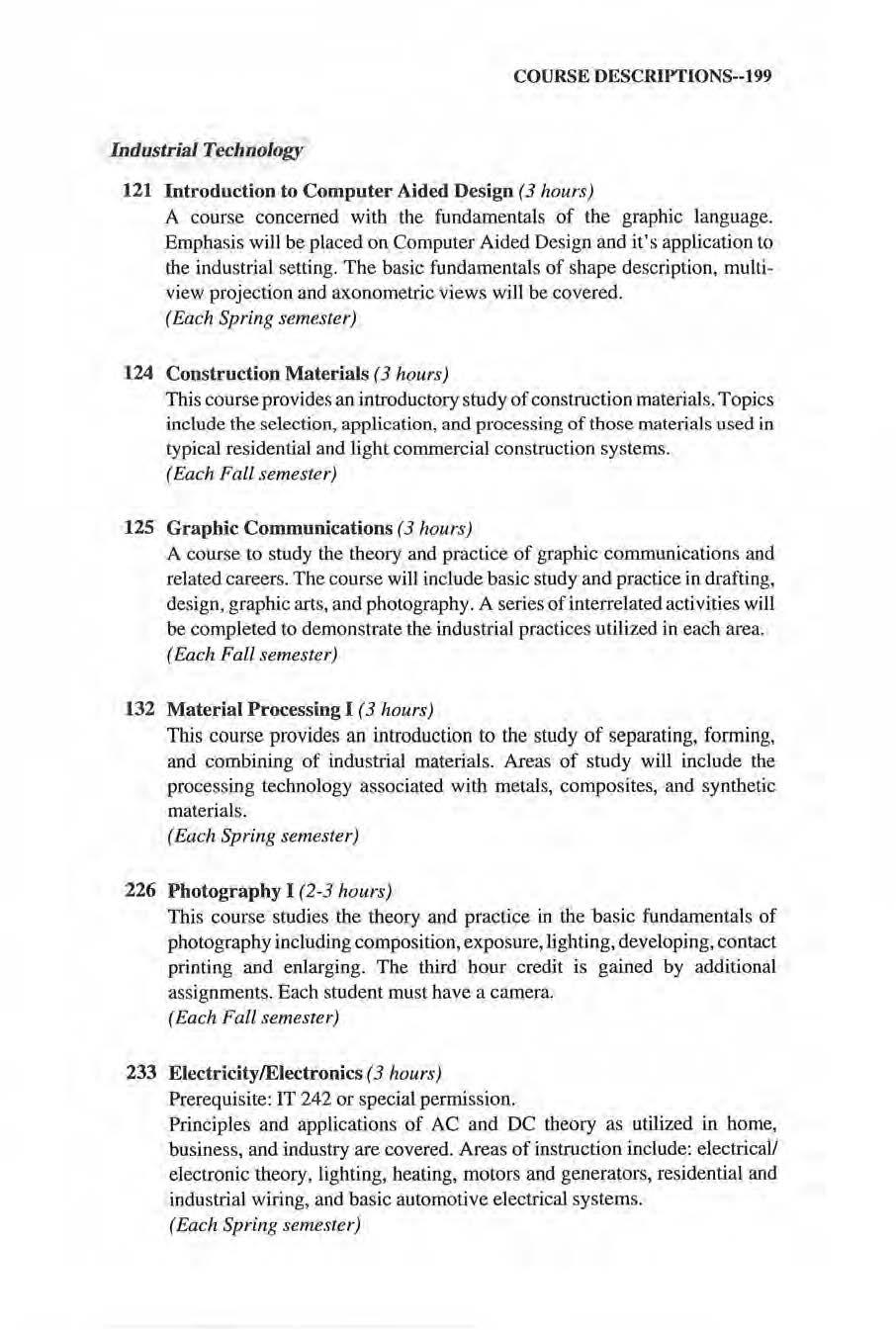
COURSE DESCRIPTIO NS-- 199
239 Silk Sc.reeoiog Techniques (3 hours)
This course is a study of the basic theory, materials, and processes used in silk screen printing.
(Offered as needed)
240 Car Care (2 hours)
This course is designed to provide the student with a basic knowledge of purchasing, maintaining, ins uring, and operating the modem automobile. Consumer information is stressed togelher with basic knowledge of automot ive lubrication, tune-up, and diagnosis. This cou rse does not apply on the Industrial Technology and Education major.
(Offered as needed)
242 Principles of Technology (3 hotirs)

This course presents the principles of technology. Students will study force. work, rate, resistance, energy and power Principles will be applied to mechanical, tluidic, electrical and thermal power systems.
(Each Fall semester)
297 Directed Study in Industrial Technology ( 1- 4 hour.~)
Prerequisite: Senior standin g.
(Offered as needed)
298 Special Topics io Industrial Technology ( 1-4 hours)
Prerequisite: Freshman-Sophomore sta nding.
( Offered as needed)
323 Material Process ing II (3 hours)
Prerequisite: IT 132.
Advanced techniques in manufacturing processes of machining and casting are covered. This course will also include the study ofchemical and physical properties of metal s, composite, and synthetic materials. (Each Spring semester)
324 Construction Processes (3 hours)
Prerequisite: IT 124.
This course will examine the management and production techniques associated with residential construction projects The course is organized upon the Associated General Contractors of America curriculum. Emphasis will be on site preparation, and on s ubstructure and superstructure systems. Planning and design of residential structures using Solidbuilder des~gn software will also be covered.
(Each Fall semester)
200--COURSE
DESCRIPTIONS
COURSE DESCRIPTIONS--201
325 Photography II (2-3 ho urs)
Pre requi site: IT 226.
A course des ig ned to conti nue with the practices and techniques learned in Photography I. The s ubj ect matter will i nclude s u ch item s as: types of cameras, lenses, films and developers, as well as co lor slides and color prints.
(Offe red as needed)
328 AnaJog E lectronics (3 hours)
Prerequisite: lT 233 or special permission. As a study of the principles and applications of electronics in co ntrol a nd communication equipment. Instruction in the theory and application of sol id state and electron ic devices in power supplies, amplifiers, oscillator, and various other c irc uits will be given,
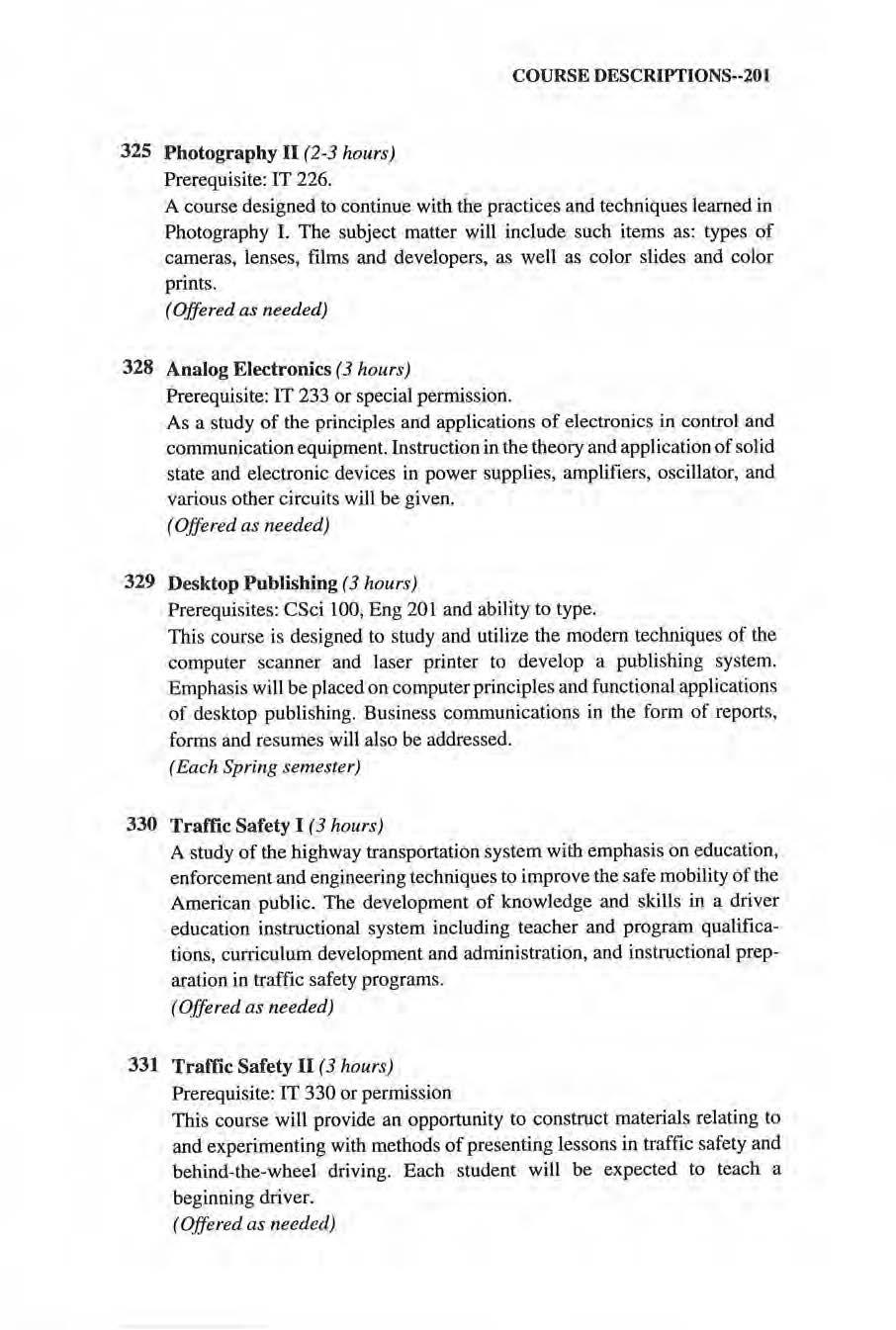
(Offe red as needed)
329 Desktop Publishing (3 hours)
Prerequi sites: CSci 100, Eng 20 l and ability to type. This course is designed to study and utilize th e modem techniq ues of the computer scanner and laser printer to dev el op a publishing sys te m. Emphasis wit I be pl aced on computer principles and functional appli cations of desktop publis hin g. Business communications in th e form of reports, forms and resumes will also be addressed.
(Each Spring sem est er)
330 Traffic Safety I (3 hours)
A s tudy of the hi ghway transportati on system with emphasis on e du cation , e nforceme nt and e nginee rin g techniques to improve the safe mobility of the American p ub lic The development of knowledge a nd skills in a driver education instructional system including teacher and program qualifications, cuniculum development and admi ni s tration, and instructional preparation io traffic safety programs
( Offered as needed)
331 Traffic Safety II (3 hours)
Prerequisite: IT 330 or permission
This course will provide a n opportuni t y to construct materials relating to and experime nting with methods of p resentin g lessons in traffic safety and behind-the-whee l driv ing. E ach student will be expected to teach a beginning driver.
( Offe red as needed)
333 Computer Aided Design/Computer Aided Manufacturing (3 hours)
The purpose of this course is to integrate the design process (CAD) with the manufactming process (CAM). Emphasis wjlJ be placed on CAD application s (AutoCad) and C .N.C. operation and control.
(Each Spring semester)
334 Automotive Systems and Maintenance ( 3 hours)
The student will acquire technical information in the fundamentals and economic operation of the modem automob ile in this course.
(Offered as needed)
338 Industrial Safety (3 hours)
This course is designed to familiarize the student with safety management and accident prevention as related to industry. Emphasis will be placed in the followin g areas : Occupational, Personnel, Transportation, Was te Management, and Management of Safety Programs.
(Each Spring semester)
339 Computer Aided Design (3 hours)
Prerequisite: 1T 121.
Computer Aided Design is a course designed to introduce the student to the use of computers, digitizing pad and plotters i n designing and drawing products io the industrial world. Projects will be encountered that will deal with graphs and charts, architectural design and tech nical drawings
(Each Fall semeste r)
343 HydrauJics and Pneumatics (3 hours)
This course will cover fluid power principles with practical application of hydraulics, pneumatics, and tluid ics.
(Each Spring semester)
350 Facilities Management (3 hours)

This course is designed to acquaint th e s tudent with procurement, and disbursement of materials and equipment in the industrial setting. Plannin g, design. and organization of industrial facilities and materials handling will also be included.
(Each Fall semester)
370 Robotic Applications (3 hours)
This cou rse provides instruction in the fundamentals and management of robots in industry. Students explore the evolution, classification, safety, economics, social impact and future of industrial robots. Students program a robot system to perform a variety of exerci ses.
(Each Fall semester)
202--COURSE DESCRIPTIONS
380 Time and Motion Study (3 hours)
This course is the study and application of work measurement systems and the analysis of work for methods improvement by use of motion economy, process charting. flow diagramming, operator training and s u ggestion systems.
( Each Spring semester)
381 Quality Assurance (3 hours)
The techniques and procedures of determining and maintaining tbe quality of industrial products, random sampling and other statistical procedures used in the manufacturing and service secto r to determine if products mee t specifications are covered in this course. Also. product quality improvement by design and structural features is discovered.
( Each Sp rin g semester)
410 Digital E lectronics (3 hours)
Prerequisite: IT 328 or permission.
As a study of digital integrated circuits, topics cove red will inc lude numbering systems, logic gates, flip flops, registers, clocks, and memories .
(Offered as needed)
415 Microprocessors (3 hours)
Prerequisite: IT 4 LO.
Th e foodamental concepts of m i croprocessors including softwa re, hardware, and interface techniques are covered. Industrial applications will also be examined.
(Offered as needed)
420 Technology Lab Management (3 hours)
This course involves organization and management of industrial technology programs in secondary schools. Lab o rganization, c urriculum, courses, and safety for technology education will be studied.
(Each Fall semester)
425 Educational Methods in Industrial Technology (3 hours)

The co urse will emphasize hi story, philosophy , and trends of the industrial technology movement; the goals and objectives of Tndostrial Technology Education in the secondary school; teaching methods and aids, laboratory discipline, testing, grading, and safety in Industrial Technol ogy Education classes; and an introdu ctio n to Industrial T echnology clubs and their values in the total school program.
( Each semeste r)
COURSE DESCRIPTIONS--203
430 Total Quality Management ( 3 hours)
The study of Industrial Management for industry. Topic areas wiU include cost estimating, production control, inventory control, forecasti ng , and scheduli ng.
(Each Fall semester)
438 Teaching the Use of the Multiple Veh icle Range (1 hour )
Prerequisite: IT 330 or pcrm issiorr.
The course provides the students with basic and advanced techniques, and methods in teaching the use of the multiple vehicle range facility and programs.
(Offered as needed)
439 Teaching Simulator Instruction ( I hoitr)
Prerequisite: IT 330 or permission .
I ntroduction of me thods, techniques and maintenance in the use of driving simulation systems for Driver Education.
(Offere d as needed)
450 Flexible Manufacturing Systems (3 hours)
Prere quisite: Junior or Senio r IT major.
This course will addres s computer programming concepts for computernumerically controlled (C.N.C.) machines. Standard industry G-codes and M- codes will be utilized. Introductory robotic programming and applications will be an integral part of the course .
(Offered as needed)
455 Compu ter Aided Manufactu ring in Education (3 hours)
Prerequisite: Jun ior or Senior IT major. This co urse will address computer programming concepts for computer numerically controlled (C.N.C.) machines. Standard industry G-codes and M-codes will be initialized. Introductory robotic programming and applications will be an integral part of the course.
(Offered as needed)
480 Industrial Management Internsh ip (6 hours )
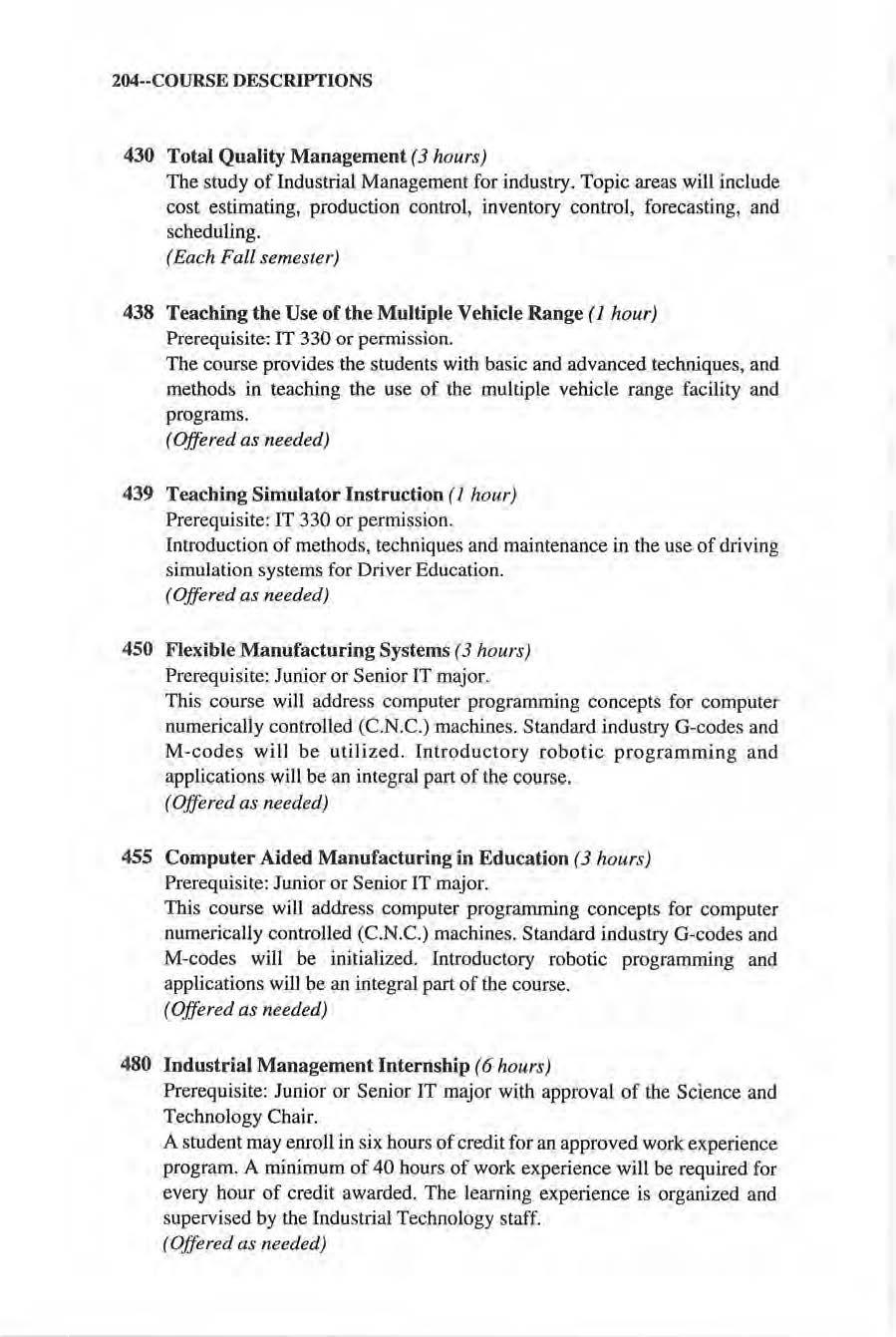
Prerequ isite: Junior or Senior IT major with approval of the Science and Technology Chair.
A student may enroll in six hours of credit fo r an approved work experi ence program. A minimum of 40 hours of work experience will be required for every hour of credit awarded. The learning experience is organized and supervised by the Indus trial Technology s taff.
( Offered us needed)
204--COURSE
DESCRIPTIONS
497 Directed Study in Indus trial Technology ( 1-4 hours)
Prerequisi te: Senior standi ng.
(Offered as needed)
498 Special Topics in Industrial Technology ( 1-4 hours)
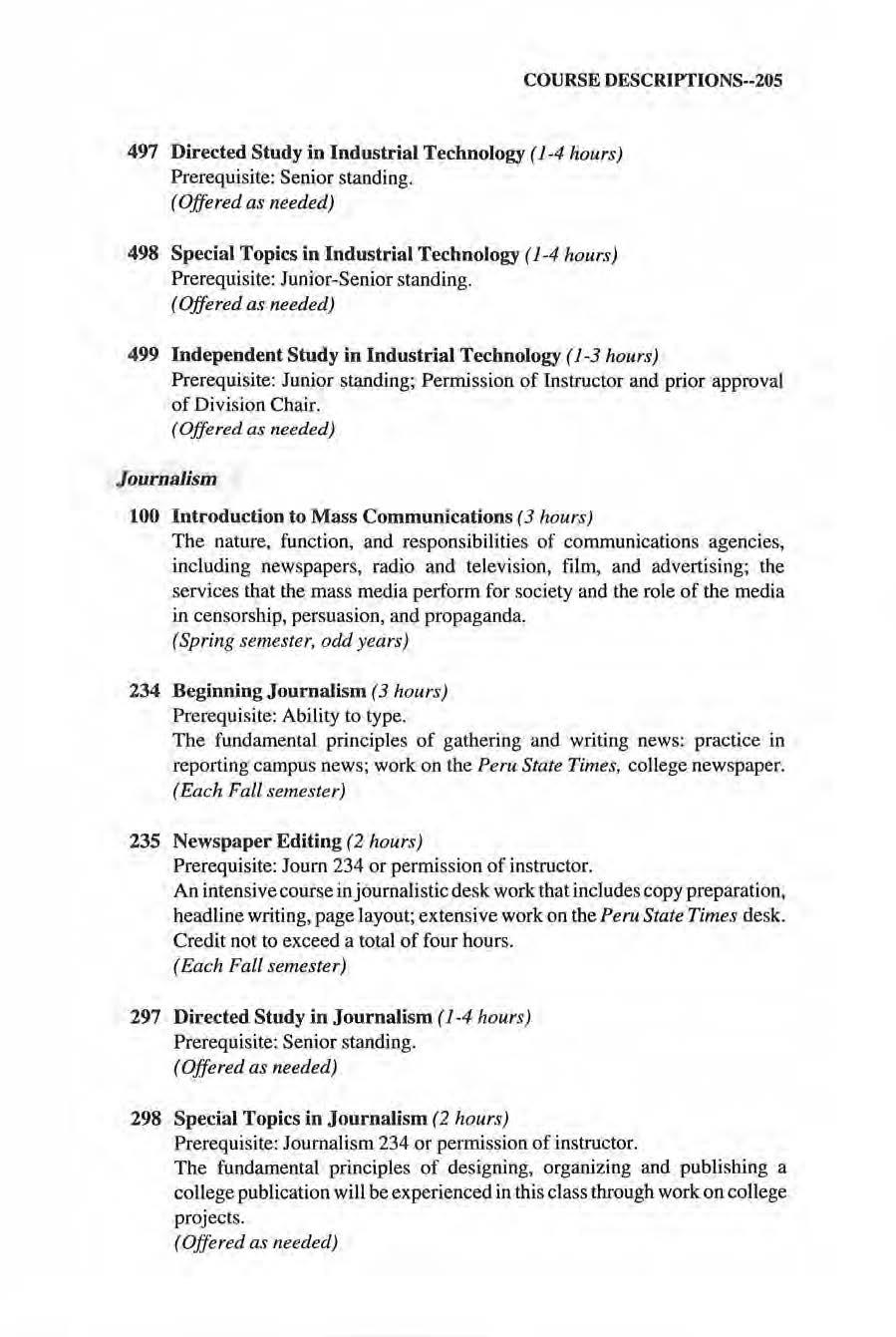
Pre requisite: Jun ior-Senior standing.
( Offered as needed)
499 Independent Study in Industrial Technology ( 1-3 h ours)
Prerequisite: Junior standing; Permission of Instructor and pri o r approval of Division Chair.
(Offered as needed)
Journalism
100 Introduction to Mass Communications (3 lwur:s)
Th e n at ure. function , and respo nsibilities of commun ications agenci es, i ncludin g newspapers, radjo and te levision, film , and advertis ing; t he services that the mass m edia perfor m fo r society and the role of the media in censorship, persuasion, and propaganda.
(Spring semester, odd years)
234 Beginning Journalism (3 hours)
Prerequisite: Abi lity to type.
The fu ndamental principles of gathering and writing news: practi ce in reporting campus news; wor k on the Peru State Times, college newspaper.
(Each Fall semester)
235 Newspaper Editing (2 hours)
Prerequis i te: Joum 234 or permission of instructor. An intensive co urse injournalistic desk work that includes copy preparation, head lin e writin g, page layout; extensive work o n t he Peru State Times des k. Credit not to exceed a total of four hours.
(Each Fall semester)
297 Directed Study in Journalis m (1-4 hours)
Prerequ is ite: Senio r s tandi ng.
(Offered as needed)
298 Special Topics in Journalism (2 hours)
Prerequisite : Journalism 234 or permission of instructor. The fundamen tal principles of designing, o rganiz in g and publishing a co llege publication will be experienced in this class through work on college projects.
(Offered as needed)
COURSE OESCRIPTIONS--205
300 Communications Law (3 hours)
A study of the media's legal context with an emphasis on the issues of libel, contempt, access to public records, invasion of privacy, criticism, and copyrigbt.
(Offered as needed)
401 J ournalism Practicum ( 1 hour)
Prerequisites: Journalism 234.
Practicum students will be involved in the production of the college newspaper and/or college yearbook. Credit not to exceed one credit hour each semester. May be repeated for up to six hours credit.
(Each semester)
497 Directed Study in Journalism ( I -4 hours)
Prerequisite: Senior Standing.
(Offered as needed)
498 Special Topics in Journalism (2 hours)
Prerequisites: Journalism 298.
A continuation of Journalism 298 involving advanced techniques in layout and design.
(Offered as needed)
499 lndepeodent Study in Journalism ( 1-4 hours)
Junior-Senior standing.
(Offered as needed)
Management
220 Economics Concepts I (3 hours )
This course presents elementary concepts of macroeconomics with an emphasis on equilibrium analysis, monetary and fiscal policy, banking and developmental economics.
221 Economic Concepts II (3 hou,rs)

Consideration is given to the microeconomics concepts of wages, interest , rent and profits, personal distr.ibution of income, consumption, monopolies , agriculture, government taxation and expenditures, jnternational trade and comparative economic systems.
231 Principles of Financial Accounting (3 hours)
This course introduces students to the process of recording financial data and preparing periodic financial statements. The complete accounting cycle will be studied.
206- -COURSE
DESCRIPTIONS
232 Pri nciples of Managerial Accounting (3 hours)
Prerequisite: Mgmt 231. This course is continuation of Mgmt 231 considering the accounting process for a corporation. The student is introduced to accounting theory, financial statement analysis and cost accounting.
2S1 Legal Concepts (3 hours)
This course examines the source and origin of law and the legaJ system, and obligations of parties to a contract.
301 Organizational Communications (3 hours)
Students study the role of business letters and reports in communication and human relations and problems faced by writers of letters and reports. Other topics of study and analysis include presentational methods in formal business speaking, sales and motivational strategies, conflict resolution, conducting successful meetings, using visuaJ aids in the business setting, and conducting and participating in interviews.
328 Marketing Strategies (3 hours)
Students learn the buying, selling, transporting, and storing functions involved in marketing , with an introduction to retailing, wholesaling, and marketing management.
335 Production/Operations Managemen t (3 hours)
Prerequ isite: Math 340 or Equivalent. Students study tbe evolution of operational management and its relationship lo the total enterprise. Decision making, production and plant p lanning, systems design, manpower planning, and control systems are considered.
373 Organizational Management (3 hours)
This course presents the foundations of the history, theory, and applications of organizational behavior including personality, stress, motivation, job design, goal setting, learrung theory, behavior modification, group beh avior, power, leadership, organizationa l structure, decision-making, and control.
380 Human Resources Management (3 hours)
Prerequisite: Mgmt 373 recommended. Students learn management of employees and the efficient use of human resources for both the personnel manager and the operating manager. Recruiting , motivation, and compensating are considered along with the current laws , career development., unions, and other topics.

COURSE D ESCRIPTIONS--207
410 Marketing Management (3 hours)
Prerequisite: M gmt 328 recommended. This course analyzes marketing principles from the managers' point of view and their application toward meeting various marketing objectives includin g the study of markets, consumers, advertising, personal se lling, retailing, pricing, and distribution.
412 Sales Management (3 hours)
Thi s study of a management position in a sales career includes an analysis of s uch tasks as recruiting, interviewing, and hiring salespeople. Other areas of study are training and motivating, compensation method s, assigning territories, and coordinating with other managers.
43 1 Small Business Management ( 3 hours)
This course s tudies planning, req uiremen ts, resources, and operations involved in small bu siness manag ement/owne rship.
496 Organizational Policy (3 h ours)
Prerequisite: Stude nts should have completed a mirumum of one-half of th e business courses require d io tbeir major prior to enrollment in this course · including Bus/Mg t 231, Bus /Mgmt 328, and Bus/Mgmt 373. This course takes a case-study approach requiring in-depth analytical and communication ski lJ s. Requirements include a thorough review of all g iven and acquired data, formulation of well-defined problems and structured pla ns of action to be presented in written and oral form. Cases will be selected to match the student's major area of s tudy. This course is the capstone course and senior com petency for the Bachelor of Techoology degree • Management option.
497 Directed Study in Management (J-4 hours)
Prerequisite: Senior standi ng.
498 Special Topics in Management (1-4 hours)
Prerequisite: Junior/Senior standing.
Approved topics are: Stress/Time Management; Effective Publi c Relations; Equal Opportunity Regulations; Effective Personnel Relations ; OSHA R eg ulations; B e nefit Progr ams; Entrepreneurship; and Practical Man age ment T echniques (TQM)
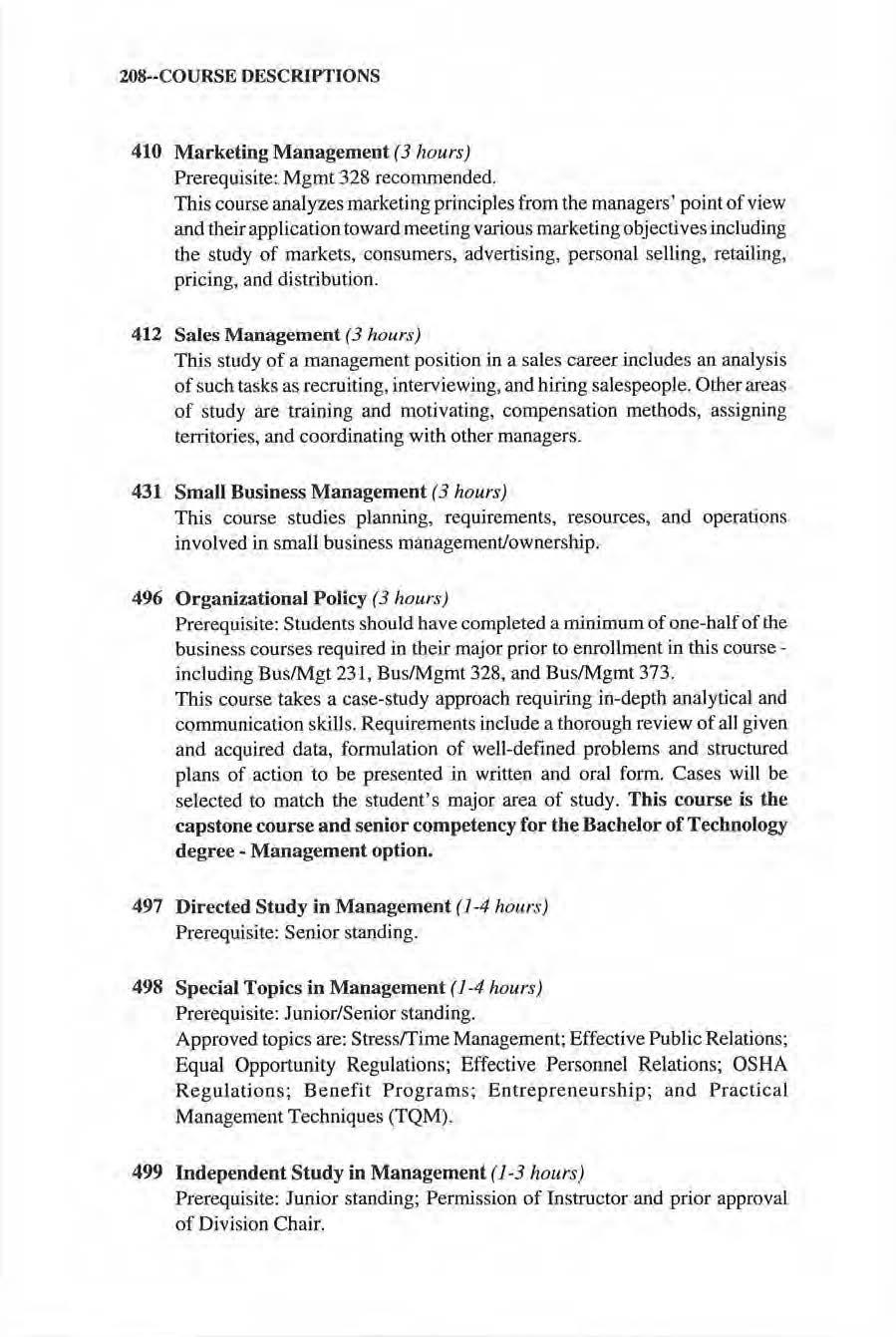
499 Indepe ndent Stu dy in Management ( 1-3 hours)
Prerequis ite: Junior standing; Permission of Instruc tor and prior approval of Divi sio n Cha ir .
208--COURSE
DESCRIPTIONS
Mathematics
060 Surveying ( I hour)
Pre requisite: Knowledge of trigonometry. This cou rse introduces fundamental tbeory and practice, use of the transit. U. S. Pub lic Land Surveys, and field office wo rk.
(Offe red as needed)
080 Arithmetic ( 1 hour, credit/no credit)
This course is designed to help s tudents learn effective arfthmetic and p realgebra ski lls which can be used to promote academic success in co llege. Un.its to be covered include comp utations, concepts, word problems, algebra and geometry. Thi s course is a developmental requirement for students identified as needing mathematics i mprovement training. S tudents in Mat h 080 are advi sed to take Math 090 after this class to i nsure the algebra s k:iJl s nece ssary for s uccess in the G eneral Studies mathematics courses.
( Each semester)
081 Arithmetic (1 hour, credit/no credit )
Thi s course is a continuation of M ath 080 Arithmetic; that is, this course is des ig ned to belp students learn effecti ve arithmetic and pre-algebra skill s which can b e used to promote academic s u ccess in college. Uni ts to be covered include computations, co ncepts, word prob le ms, algebra an d geometry . This course is a devel opmental requirement for s tude nts iden ti fied as needing mathematics improvement training Students required to enroll in Math 080 Arithmetic m ust successfully complete the post-test with the necessary passing score before enrolling in the general stud ies mathem at ics e lective. Students wbo d o not earn the necessary passing score will be req ui red to visit with the Vice President fo r Stude nt Affai rs to d iscuss independent cou,rse options th a t can be devised by the Director of Communications Sldlls Center to promote s tudent success. Students who do earn the necessary passi ng score should consider en.rolling in Math 090 befo re e nroll ing in the genera l studies mathematics e lective.
(Each semeste r)
090 Beginnin_g Algebra ( 1 hour, c redit/no c r edit)
Thi s co urse is designed to help students learn effecti ve algebra and g raphing sk:i lJ s whic h can be used to promote academic success in college. Units to be covered include algebra and graphing and their use in solving word problems. This course is a develop mental req uirement for students ide nt ified as needing mathematics improvement training.
( Every semester)

COURSE DESCRIPTIONS--209
101 College Algebra (4 hours)
Prerequisite: One year of h.igh school algebra. This course is for students who s pecifically need algebra in certain preprofessional programs. It covers fundamental algebraic princ iples and processes and is not to be taken fo r credit by stud ents who have completed Math 120, Math 125 or Math 130
(Each semester)
107 Algebraffrigonometry (4 hours)
This course is a study of basic algebraic and trigonometric concepts with an emphasis on linear and quadratic equations and systems. Trigonometric concepts will be studied from the right triangle and the oblique triang le approach.
(Spring semester, odd years)
110 Elements of Mathematics ( 3 hou.r.y)
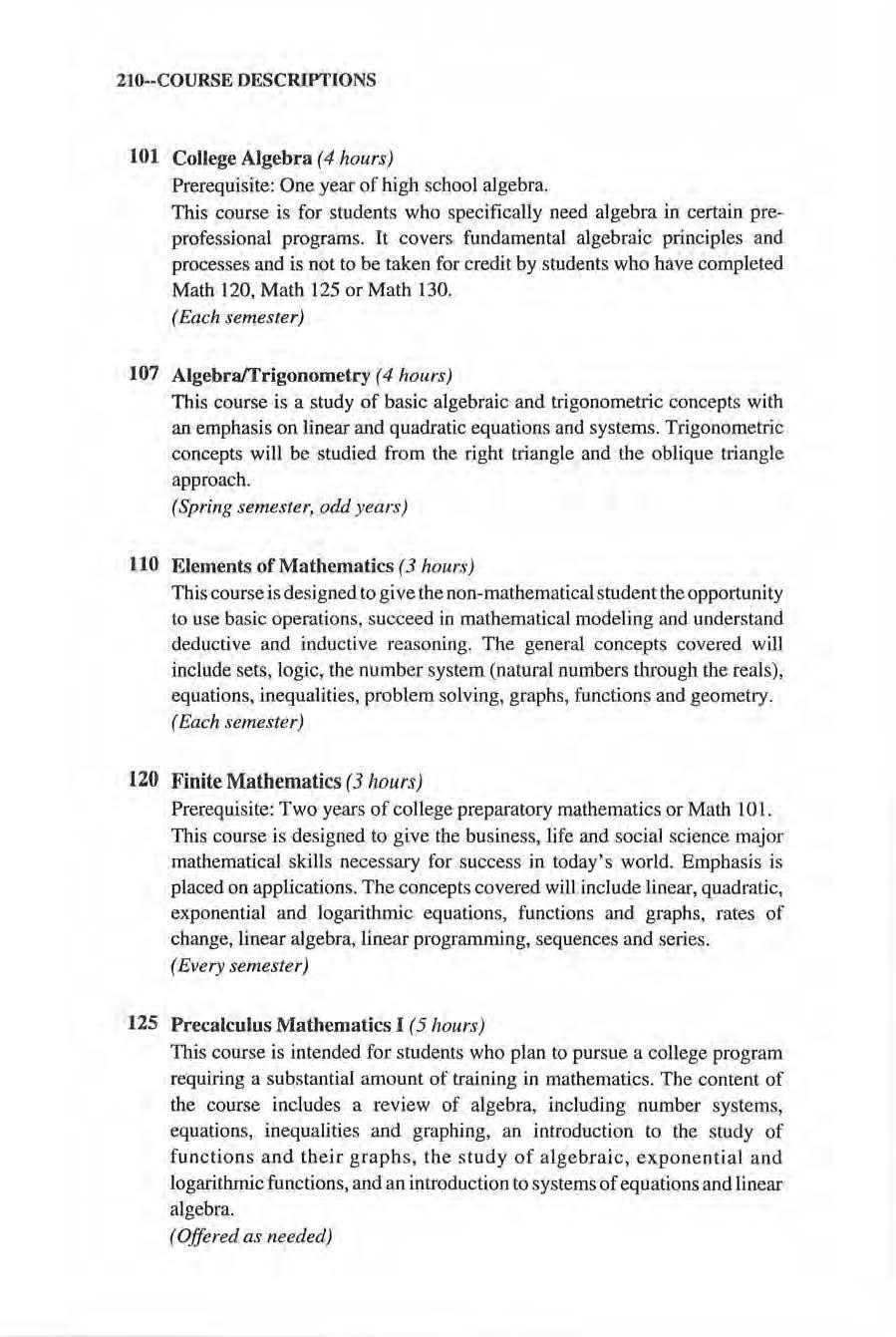
This course is designed to give the non-mathematical student the opportunity to use basic operations ; succeed in mathematical modeling and understand deductive and , inductive reasoning. The general concepts covered will include sets, logic, the number system (natural numbers through the reals), equations, inequalities, problem solving, graphs, functions and geometry.
(Each semester)
120 Finite Mathematics (3 hours)
Prerequisite: Two years of college preparatory mathematics or Math IO l. This course is designed to give the business, life and social science major mathematical ski ll s neces sary for success in today's world. Bmpbasis is placed on applications. The concepts covered will include linear, quad ratic, exponential and logarithmic equations, functions and graphs, rates of change, linear algebra, linear programming, sequences and series.
(Every semester)
125 Precalculus Mathematics 1 (5 hours)
This course is intended for students who plan to pursue a college program requiring a substantial amount of training in mathematics. The content of the course includes a review of algebra, including number systems, equations, inequa lities and graphing, an introduction to the study of functions and their graphs, the study of algebraic, ex.ponential and l ogarithmic functions, and an introduction to systems of equations and linear algebra.
(Offered as needed)
210--COURSE OESCRI.PTIONS
126 Prccalculus Mathematics ll (5 hours)
Prerequisite: Math 125.
This course is intended to continue the mathematic training of the student whose college program requires a substantial amount of training in mathematics. This course includes the study of trigonometric functions and analytic trigonometry, an introduction to analytic geometry and an introduction to the study of seq uences and series.
(Offered as needed)
130 Principles of Modern Mathematics ( 3 hours)
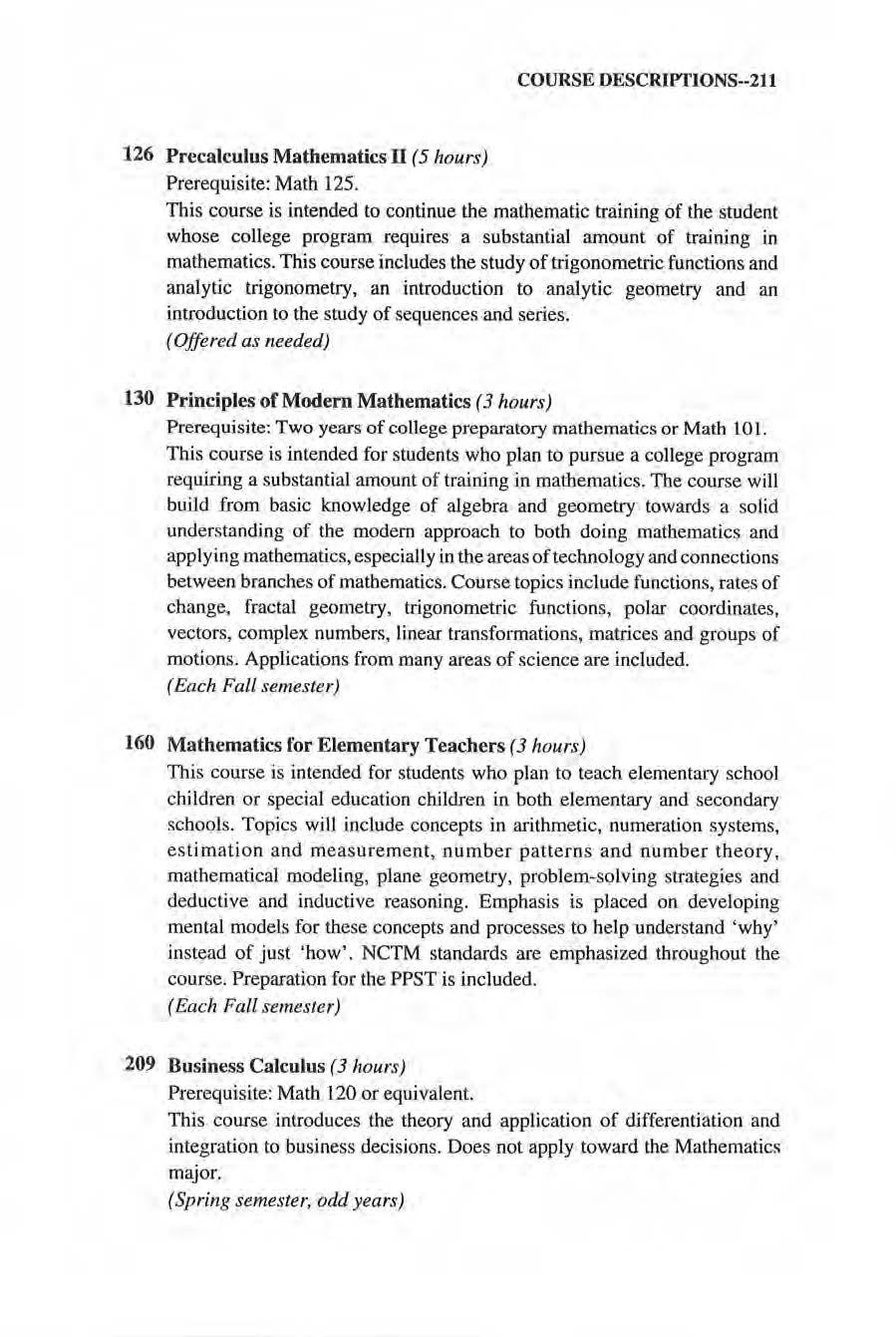
Prerequisite: Two years of college preparatory mathematics or Math 10 l. This course is intended for students who plan to pursue a college program requiring a substantial amount of training in mathematics. The course will build from basic knowledge of algebra and geometry towards a solid understanding of the modern approach to both doing mathematics and applying mathematics, especial ly in the areas of technology and connections between branches of mathematics. Course topi cs in clude functions, rates of change. fractal geometry , trigonometric functions, polar coordinates, vectors , complex numbers, linear transformations, matrices and groups of motions. Applications from many areas of science are included.
( Each Fail semester)
160 Mathematics for Elementary Teachers (3 hours)
This course is intended for students who plan to teach elementary school children or special education children in both elementary and secondary schools. Topics wilJ include concepts in arithmetic, numeration systems, estimation and measurement , number patterns and number theory, mathematical modeling, plane geometry, problem-solving strategies and deductive and inductive reasoning. Emphasis is placed on developing mental models for these concepts and processes to help understand 'why' instead of just 'how'. NCTM standards are emphasized throughout the course. Preparation for the PPST is included.
(Each Fall semester)
209 Business Calculus (3 hours)
P rerequis ite: Math 120 or eq ui valent. This course introduces the theory and application of differentiation and integration to business decisions. Does not apply toward the Mathematics major.
(Spring semester, odd years)
COURSE 0ESCRIPI'IONS--211
225 Calculus with Analytic Geometry I (5 hours)
Prerequisite: Math 130 or equival ent.
lbis course includes the study of analytic geometry, functions, limits , continuity, velocity, differentiation, maxima and minima, higher order derivatives, techniques of graphing, and related topics.
(Each Spring semester)
226 Calculus with Analytic Geometry II (5 hours)
Prerequisite: Math 225 or equiva le nt.
Th is cou rse includes the study of the differentiation of logari thmi c and exp o nenti al fun ctions, antiderivatives and the definite integral, integration, inverses and related topics.
( Each Fall semeste r )
24 0 Elements of Statis tics (2 hours)
This course introduces the non-mathematics student to the statistical language, skills and techniques necessary for success in many of today's fields. Emphasis is placed on appl ications in business, public policy, social sciences, edu cation and medicine Moral a nd ethical i ssues rel at in g to experimentation and to decisi o n making are also discussed. Specific topic s include descriptive statistics, e lementary probability, experimental design , frequency distribution s, visual representation of data, the normal distributio n and formal s tatistical reasoning. Studen t work o n research projects to gain first-hand experience with the issues in the co urse
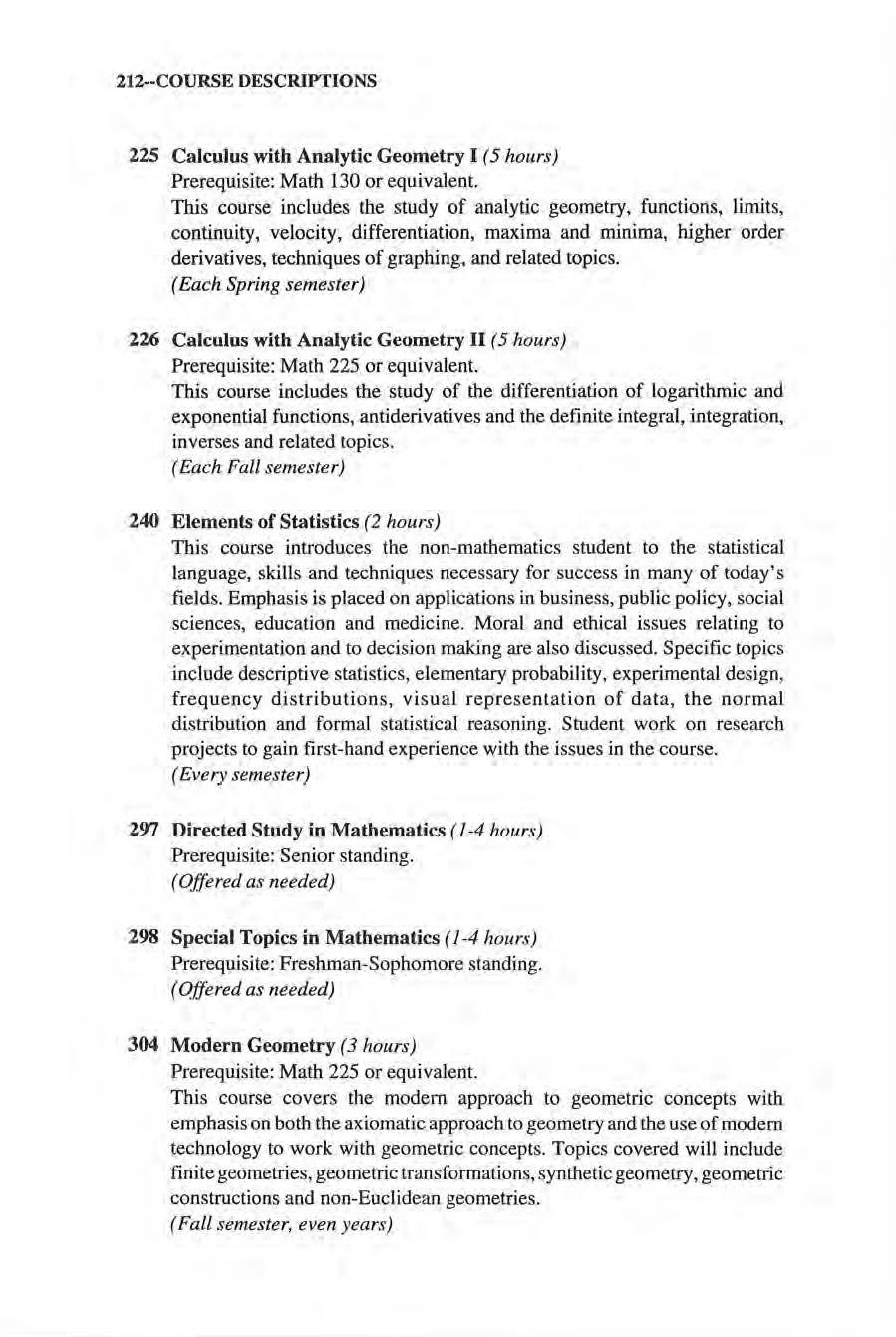
( Every sem este r)
297 Directed Study in Mathematics (1 -4 hours)
P rerequisite: Senior standing.
(Offered as needed)
298 Special Topics in Mathematics ( l-4 hourx)
Prerequisite: F reshman-Sophomor e standing
(Offered as needed)
3 04 Modern Geometry (3 hours)
Prerequisite: Ma th 225 o r equ ival e nt.
This course covers the modem a pproach to geometri c concepts with emphasis o n both the ax iomatic a pproach to geomet ry and the use of mo dern tec hnology to work with geometric concepts. T opics covered will indude finite geometries, geomet ric transformati ons, synthetic geometry, geometric co ns tru ctio ns and non-Euclidean geometries.
( Fall semester, even years)
212--COURSE DESCRIP'fIONS
306 Modern Algebra (3 hours)
Prerequisite: Math 120 or Math 130.
This course is a study of the various algebraic systems arising in modem mathematical computations. Emphasis is placed on the axiomatic approach to algebra and the use of modern technology to work with algebraic concepts. Topics covered will include sets, mappings and operations, relations, groups, rings, domains, development of the real number system and development of the comp lex number system.

(Sprin,g semester, eve11 years)
327 Calculus with Analytic Geometry III (3 hours)
Prerequisite: Math 225 and 226 or equivalent.
This course includes the study of further techniques in integration, infinite limits, improper integra ls, polar equations, an introductio n to vector calculus, and an introduction to m ult ivariable calculus.
(Spring semester, even years)
328 Differential Equations (3 hours)
Prerequisite: Math 327 or equivale nt. This cou rse will review differentiation and integration. Solutions and methods for solving first and second order ordinary differential equation will be discussed and applied.
( Fall semester, even years)
340 Statist-ics (3 hours)
A study of the methods of summarizing and interpreting data, elementary probability. and its relation to distributions. The meanings, importance, and appl ication of the normal and binomia l distributions and the methods of random sampling, testing of hypotheses, analy sis of paired data, and interpretation of standardized test scores are covered. Students work on independent research projects to ga in first-hand experience with the issues of the course.
(Each s emester)
404 Mathematical Modeling (3 hours)
Prerequisite: Math 225 or equivalent
This course covers a variety of mathemalical topics ranging from graphs and networks to linear programming. The emphasis of the course is on modeli ng process used to set up and solve problems in these topic areas. Strengths and limitations of the mathematical modeling technique will be discus sed. Analysis and cri tique of tradi tional word problems will also be discussed.
( Fall semester, even years)
COURSE DESCRJYI'IONS --213
418 Linear Algebra (3 hours)
This course presents systems of linear equations, determinants, vector spaces, inner product spaces, Haear transformations, eigenvalues and eigenvectors with moderate emphasis on proof. Applications of these concepts are also covered.
( Fall semester, odd years)
419 Topology (3 hours)
Prerequisite: Math 225 or equivalent.
This course covers elementary topology with emphasis on the axiomatic approach to set theory and the use of modern technology to work with topological ideas. Topics will include set theory, continuous functions , point-set topology, sequen ces and facial geometry.
(Spring semester, odd yea rs)
430 Discrete Structures (3 hours)
Prerequisite: Math 120 or Math 130
A study of some of the mathematical concepts useful to the computer sciences inc luding number systems. logic, truth tables, sets and relations, boolean algebra, logic circuits, vectors, matrices, determinants, graphs, directed graphs, finite machines, and automata.
(Fall semester, odd years)
440 Advanced Statistics (3 hours)
Prerequisite: Math 340.
This course continues the s tudy of methods of summarizing and interpreting data, wilh special emphasis on non - normally distributed statist i cs, hypotheses testing, multivariate analysis and non-linear analysis of data.
(Spring semester, odd y ears)
442 Biometrics (3 hours)
Prerequisite: Math 340
This course is designed to give the biological research student a basi c knowledge of statistical techniques. Emphasis in thi s course is on application rat.her than statistical theory. Topics will include one and two factor analys is of variation, testing for goodness of fit, and introductions to experimental design and rnultivariable regression.
(Spring semester. even years)
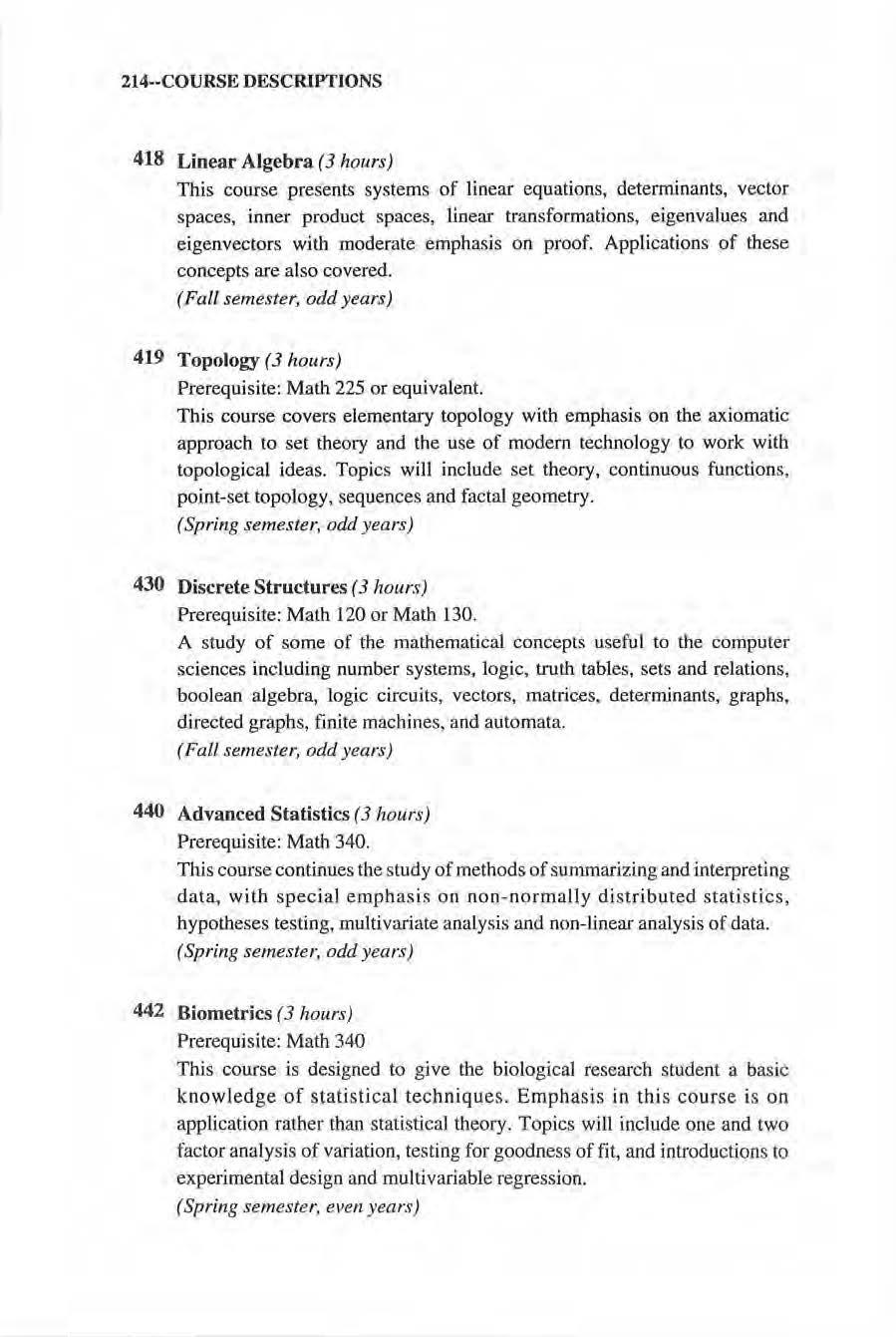
2 14--COURSE
DESCRIPTIONS
490 Seminar in Mathematical Research ( 1 hour)

Prerequi site: Senior Sta niling in Mathematics, Permiss ion
This course cons ists of a review of current research trends in mathematics Each student will review current literature and select and pursue a topic of individual study. Mathematics faculty wi II mentor and grade the participants in the course. This couTse is to be taken during the student's last year of study at Peru State College. This course is the capstone course and senior competency for the Mathematics major.
(Offered as needed)
497 Directed Study in Mathematics ( 1-4 hours)
Prerequisite: Seni or standing.
(Offered as needed)
498 Special Topics in Mathematics (/-4 hours)
Prerequisite: Junior-Senior standing.
(Offered as needed)
499 Independent Study in Mathematics ( 1-3 hours)
Prerequisite: Junior standing.
(Offered as needed)
Music
100 Recital Attendance(O hours)
All s tudents in music are requ.ired to register for this course each semester on a credit/no credit basis for the appropriate number of s emesters inilicated in the ir sel ected program. Attendance at a minimum of eighty percent (80%) of all recitals each semester is required .
(Each semester)
101 College Band (1 hour)
Open to all college students with the consent of the d.irector It functions at p ep rallies, parades, and football games during the fall semester. During the fall and spring semesters concerts are presented both on and off campus. Three days attendance weekly.
(Each semester)
102 College Choir (1 hour)
Open to all students with the consent of the director. An emphasis on the study and performance of representative choral works of all period s. Three days attendance weekly.
( Each semester)
COURSE DESCRIPTIONS-- 215
DES CRIPTIONS

103 Jazz Ensemble ( 1 hour)
Open to all students by audition and the consent of th e in s truc to r. An emphasis is placed on the study and performance of music in all popular idio ms a nd performs concerts on a nd off camp us.
(Each semester)
104 Show Choir (1 ho ur)
Open to all stude nts by audition and consent of the ins tructor. An emphasis is placed upon the study and performance of vocal music in a ll popular idioms and co nce rts are performed on and off campus.
(Each semester)
105 Brass Ensemble (1 hour)
Open to all students with the consent of the instructor. An emphasis is placed upon the study a nd performance of brass li terature in a ll the cha mber musi c idioms and concerts are performed on and off campus.
(Each semester )
106 Woodwind En semble ( 1 hou r)
Open to all s tudents with tbe consent of the instructor. An emphasis is placed upon the study a nd performance of wood wind literature in all the chamber music idioms and concerts a re performed on and off the campus.
(Each semester)
l07 Madrigal Singers (1 hour)
Op en to all students with the consent of the i.nstructor. An emphasis i s placed upon the study and perfo rm ance of vocal literature in al l chamber music idioms and conce11s are performed on and off campus.
( Each semeste r)
108 Percussion Ensemble ( 1 hour)
Open to all students with the consent of the instructor. An emphasis is placed upon the study and performance of percuss ion ensembl e literature in a variety of chamber mus ic idi oms Concerts a re performed on and off campus.
(Each semester)
lll F undamentals of Music (2 h ours)
An introduction to the rudiments of music, inclucling letter and syllabl e names of notes, time values of notes a nd rests, ti.me and key signatures, chromatics, intervals, chords, keyboard experi e nce, and the writing of original melodies.
( Each Pall semester)
216--COURSE
IU Beginning C lass Piano (1 hour)
Beginning instruction on the piano.
(Each Fall semester)
113 Beginning Class Guitar (1 hour)
An introduction to the basic chords, melodies, note reacting, tuning, and styles of performance for the beginning guitarist.
(Offered as needed)
114 Class Piano 11 (I hour)
Prerequisite: Muse 112.
Class Piano II is a continuation of Class Piano I. Students continue to improve their pianistic skills by playing standard repertoire in a variety of keys, learning new techniques, and improving their knowledge of the fundamentals of mus ic.
(Each Spring semester)
115 Class Voice
Thi s course wi.11 provide non-voice majors with the fundamentals of vocal technique. The cow:se will include basic concepts of breathing, posture, tone production, vocal projection, stage presence, and healthy use of the speaking voice.
(Each semester)
120 AppHed Music ( 1 hour)
Private music instruction for voice, insttuments, or piano on the Freshman level. May be repeated for credit.
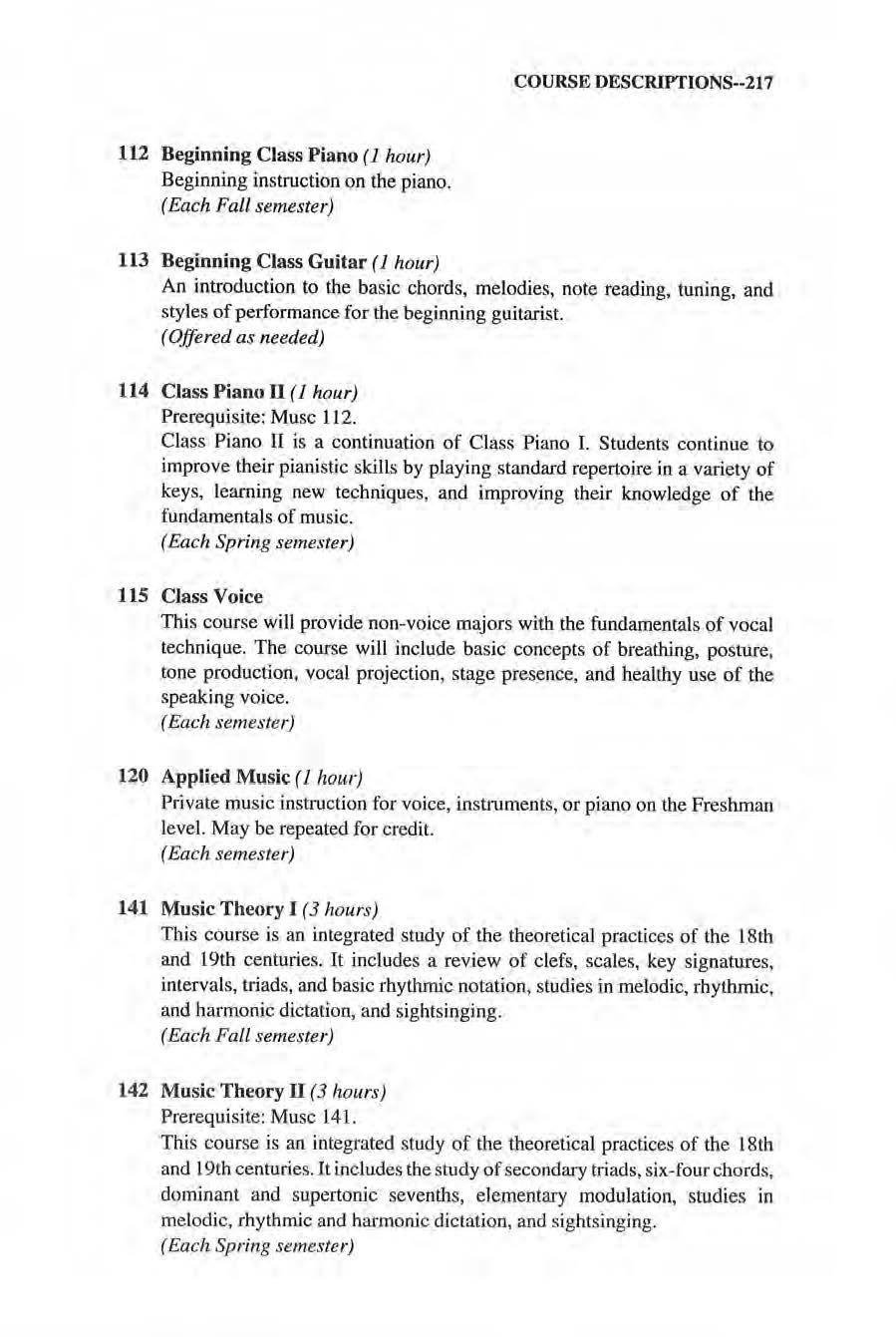
(Each semester)
141 Music Theory I (3 hours)
This course is an integrated s tudy of the theoretical practices of the 18th and 19th centuries. It includes a review of clefs, scales, key signatures, intervals, triads, and basic rhythmic notation, studies in melodic, rhythmic, and harmonic dictation, and s ights inging
(Each Fall sem ester)
142 Music Theory II (3 hours)
Prerequisite: Muse 141.
This course is an integrated study of the theoretical practices of the 18th and 19th centuries. It Lncludes the study of secondary triads, six-fo ur chords, dominant and supertonic seve nth s, e l ementary modulation, stud ies in melodic, rhythmic and harmonic dictation, and sig htsinging.
(Each Spring semester)
COURSE DESCRIPTIONS--217
200 Piano Proficiency Exam i nation (0 hours)
All students in music education (K-6 or K-12) are requ ired to register for Muse 200 o n a credit/no credit basis during the semester they intend to take the required piano proficiency examination. Successful completion of Muse 200 i s required before enrolling for student teaching. Studen t s must be enrolled for applied piano concurrently with Muse 2 00
(Each semester)
211 Music Appreciation (3 hou rs)
A survey of the various for ms and styles of m us ic ranging from fo lk so ngs to opera, oratori o, a nd sy mphony. Selected works are analyzed and discussed through the use of recordings .
(Each semester)
210 World Music (3 hours)
W orld M us ic i s an introduction to ethnomusicology in which the student will learn to experience and understand music in the context of human life. Stude n ts will experience and analyze the musics of Africa, Native America, Black America, Asi a, the Near East, the Pac ific, arrd Eastern Europe. This course will also provide the studen t the tool s with which to d i scove r the meani ngs of music in the life of any society.
(Each Fall semester)
213 Introduction to Ja zz History (3 hours)
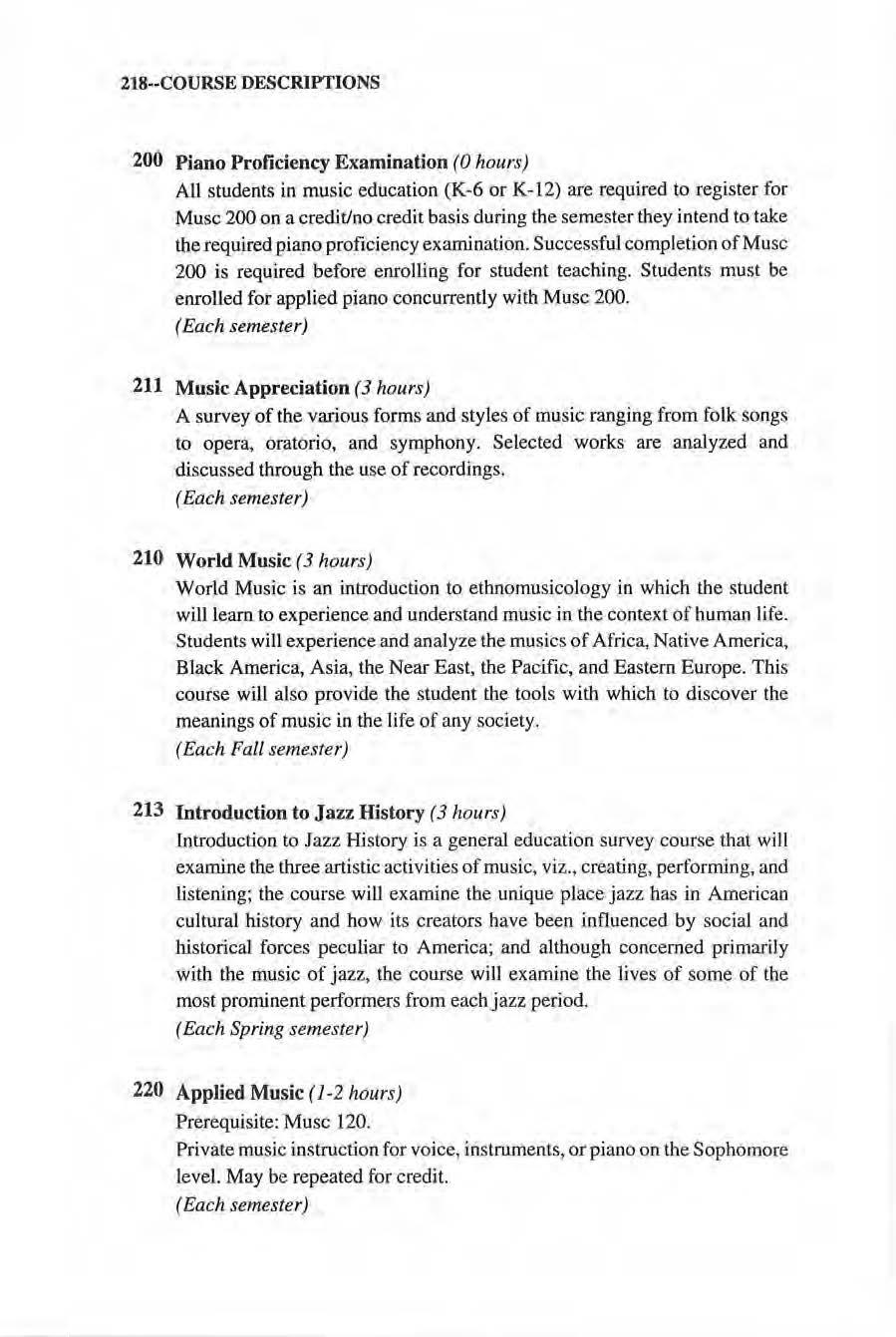
l ntroduction to Jazz Hi s tory is a general education survey course that will examine the three artistic activi ties of music, viz., creating, performing, and Listening; the cou rse wiU examine the unique place jazz h as in American cultural history and how its creators have been influenced by social and historical forces peculiar to America ; and although concerned primarily with the music of jazz, the course will exam ine the lives of so me of the most prominent performers from each jazz period.
(Each Spring semester)
220 Applied Music (1- 2 hours)
Prerequisite: Muse 120.
Private mu sic instruction for voice , instrumen ts, or p iano on the Sophomore l e vel. May be repeated for credit.
(Each semeste r)
218--COURSE
DESCRIPTIONS
241 Musk Theory Ill (3 hours)
Prerequisite: Muse 142.
This course is an integrated study of the theoret ical practices of the 18th and 19th centuries. It includes a detailed study of the chromatic harmonic practices of the 19th century, a survey of the 20th century theoretical practices, studies in melodic , rhytlimic, and harmonic dictation, and s ightsinging.
(Fall semester, even years)
242 Music Theory IV (3 hours)
Prerequ isite: Muse 241.
Thi s cou rse is an integrated study of the theoretical practices of the 18th and I 9th centuries It includes a detailed study of the chromatic harmonic practices of tile 19th century, a survey of 20th century theoretical practices and studies in melodic, rhythmic, and harmonic dictation and s ightsinging .
(Sp ring semester, odd years)
251 Elementary Music Methods (2 hours)
Prerequisite: Muse 111 or music major.
A study of modem teaching techniques for children's music literature. ( Each Spring semester)
297 Directed Study in Music ( 1-4 h0tm}
Prerequisite: Senior standing.
(Offered as 11eeded)
298 Special Top ics in Music ( 1-4 hours)
Prerequ isite: Freshman-Sophomore standing.
(Offered as needed)
320 Applied Music ( 1-2 hours)
Prerequisjte: Muse 220.
Private music instruction for voice, instruments, or piano on the Junior level. May be repeated for c redi t.

(Each semester)
321 Choral Techniques (2 hours)
A study of vocal materia ls and vocal conducting as presented in secondary schools.
(Spring semester, odd years)
COURSE DESCRIPTIONS--219
322 B and Techn iq ues (2 hours)
Prerequisite: Sophomore standing.
An introductory s tudy of organizational ski11s and pedagog ical. techniques for th e concert band, jazz band, elementary band, mid~le school band, and marching band.
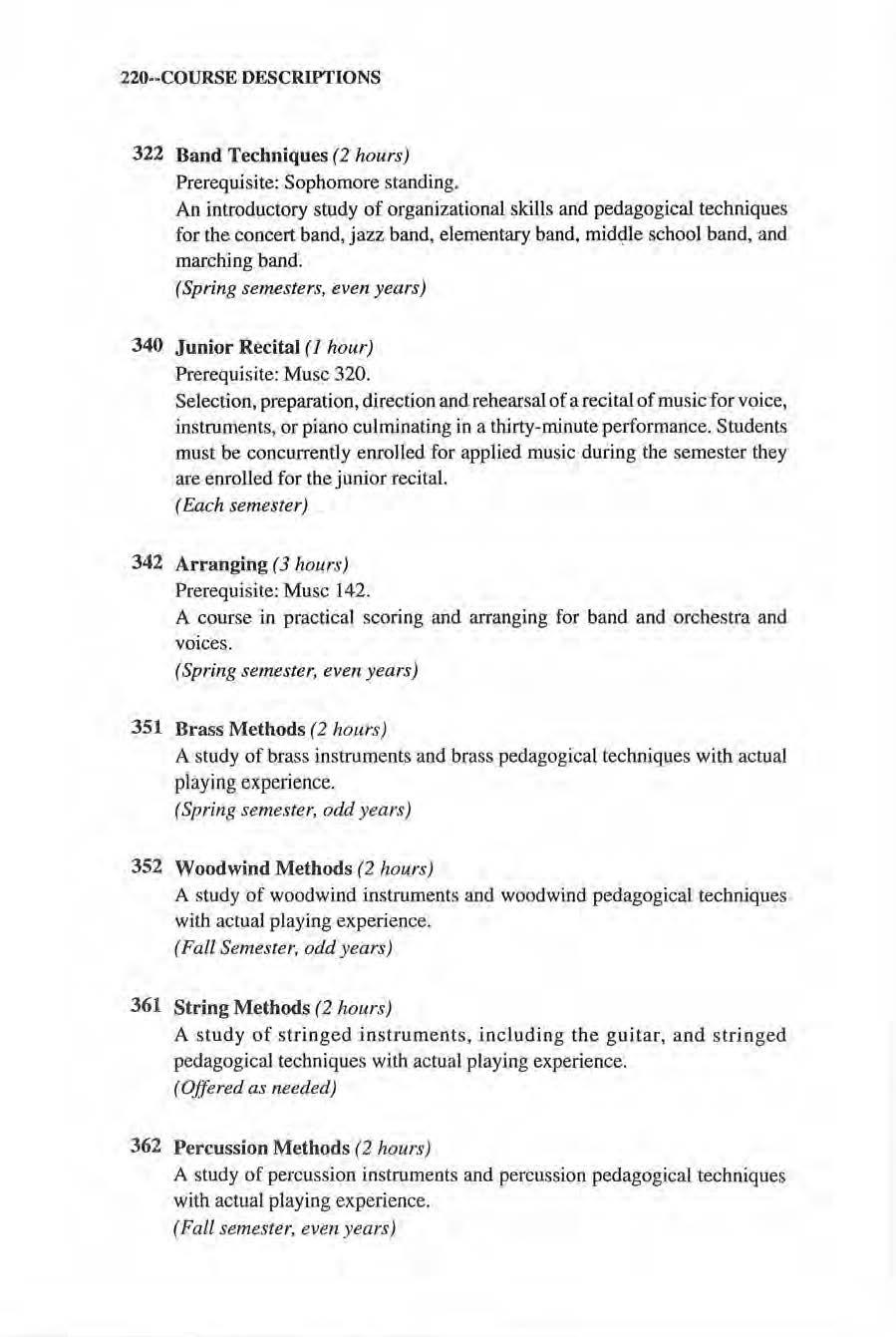
(Spring semesters, even years)
340 Jun ior Recita l (] hour)
Prerequisite: Muse 320.
Selection, preparation, direction and rehearsal of a recital of music fo r voice, instruments, or piano culminating in a thirty-minute performance. Students must be concurren tly enrolled for applied music during the semester they are e n rol.led for tbe juni or recital.
(Each semester)
342 Arranging (3 hours)
Prerequis ite: Muse 142.
A course in practical scoring and arranging for band and orchestra and voices.
(Spring semester, even years)
351 Brass Methods (2 hours)
A st udy of brass instruments and brass pedagogical techniques with actual playing e,xperience.
(Spring sem ester, odd years)
352 Woodwind Methods (2 hours)
A s tudy of woodwind instruments and woodwind pedagogical techniques with actual playing experience
(Fall Semester, odd years)
361 String Methods (2 hours)
A s tudy of stringed instruments, including the guitar, and strin ged pedagogical technique s with actual playing experience.
(Offered as needed)
362 Percussion Methods (2 how:1·)
A study of percussion instruments and percussion pedagogical techniques with actual playing experience.
(Fall semester, even years)
220--COURSE
DESCRIPTIONS
363 Music Business (3 hours)
Music Business is an introduction to music as it function s in the business world in the United States, focusing on the music industry and related fields. Basic theories and processes will be stressed, histori es and musical trends of particular fields will be explored, various contracts and contract law and the role of the music industry attorney, and an examination of the ways in which music is encountered in our daily lives will be taken into account.
(Spring semester, odd years)
420 Applied Music (l-2 hours)
Prerequisite: Muse 320.
Private music instruction for voice, instruments , or piano o n the Senior level. May be repeated for credit.
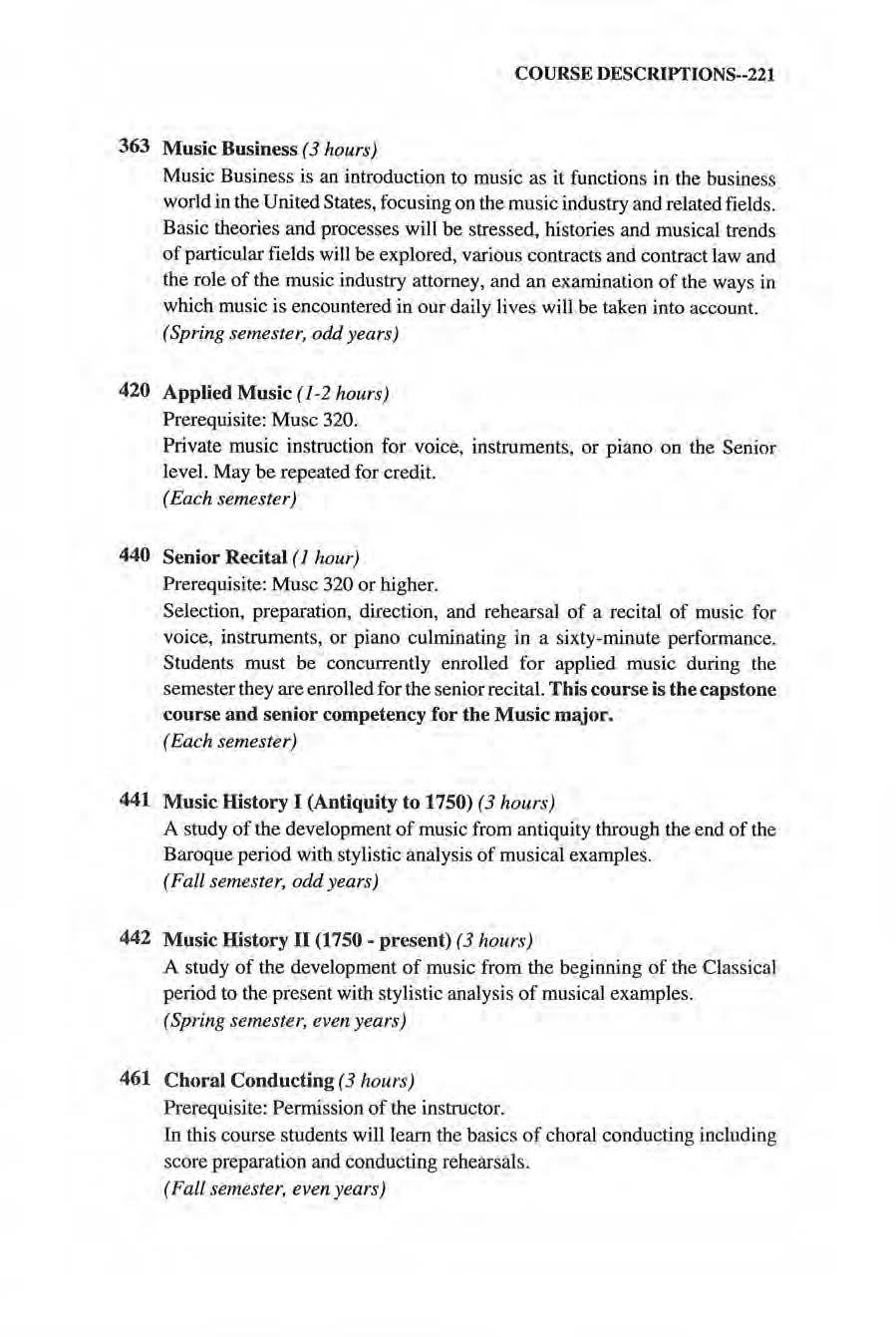
( Each semester)
440 Senior Recital ( I hour)
Prerequisite: Muse 320 or higher. Selection. preparation, direction, and rehearsal of a recital of music for voice, instruments , or piano culminating in a sixty -minute performance. Students must be concurrently enrolled for applied music during the semester th ey are enro lled for the senior recitaL This course is the capstone course and senior competency for the Music major.
(Each semester)
441 Music History I (Antiquity to 1750) (3 ho,.irs)
A study of the development of music from antiquity through the end of the Baroque period witllstylistic anal ysis of musical examples.
( Fall semester, odd years)
442 Music Elistory ll (1750 - present) (3 hours)
A stu dy of the development of music from the beginning of the Classical period to the present with stylistic analysis of musical examp les.
(Spring semester, even years)
461 Choral Conducting (3 hours)
Prerequisite: Permission of the instructor.
In th.is course students will learn the basic s of choral conducting including score preparation and conducting rehearsals .
(Fall semester, even years)
COURSE DESCRIPTIONS--221
DESCRIPTIONS
462 Instrumental Conducting (3 hours)
Prerequisite: Muse 242
The knowledge of baton techniques, reading and interpreting a musical score, and the presentation of techniques of rehearsing instrumental organizations are stressed.
(Fall semester~ odd years)
497 Directed Study in Music ( J -4 hours)
Prerequisite: Senior Standing.
(Offered as needed)
498 Special Topics in Music ( 1-4 hours)
Prerequisite: Junior-Senior standing
(Offered as na.eded)
499 Independent Study in Music (1-3 hours)

Prerequisite: Junior standing; Permission of Cnst1uctor and prior approval of Division Chair.
(Offered as needed)
Philosophy
201 Introduction to Philosophy ( 3 hours)
An introduction to philosophy through the selected writings of outstanding philosophers. L ectu res and class discussions on such topics as ethics, philosophy of history, philosophy of religion, and metaphysics are stressed.
( Each Fall semester)
Physical Education
Physical Education activities courses require two hours of attendance. Each student will be required to enroll in PB 100 Wellness. It will be followed by two activity courses, of which one will be developmental.
100 Wellness (2 hours)
T his course is designed to acquaint students with the philosophy, knowledge, and techniques necessary to write a personalized life-time 6tn.ess and wellness program. The course will include both theory and practical application in the study of physical fitness and wellness.
( Each semesrer)
104 Golf and Tennis-Mainten ance ( 1 hour)
Prerequisite: PE I00.
This course is designed to interest the student in golf and tennis. Emphasis will be placed on fundamental techniques of the game, rules of the game and eliquette.
( Each semester)
222--COURSE
106 Racquet Sports-Maintenance (1 hour)
Prerequisite: PE I00
Tb.i s course is designed to introduce students to a variety of racquet sports. Emphasis will b e placed on fundamental ski lls , rules and techniques of play
(Each Fall semester)
112 Beginning Swimming-Developmental ( 1 hoitr)
Prerequisite: PE 100.
This course is de signed to introduce the student to the basic funda mentals of sw immi ng. Emphasis will be placed on development of basic strokes and rhythmic breathing.
(Each Spring semeste r)
116 Volleyball and Basketball-Maintenance (J hour)
Prerequisite: PE I 00.
This course is desi g ned to introduce the stud ent to the basic fundamentals of volleyball and basketball. Emphasis will be placed o n skills, roles a nd strategies of the games.
(Each Fall semester)
117 Strength Training-Developmental (1 hour)
Prerequisite: PE 100.
Tb.is course .is desi g ned to introduce students to a variety of philosophies and s trength development techniques. Programs will be developed to meet individual needs.
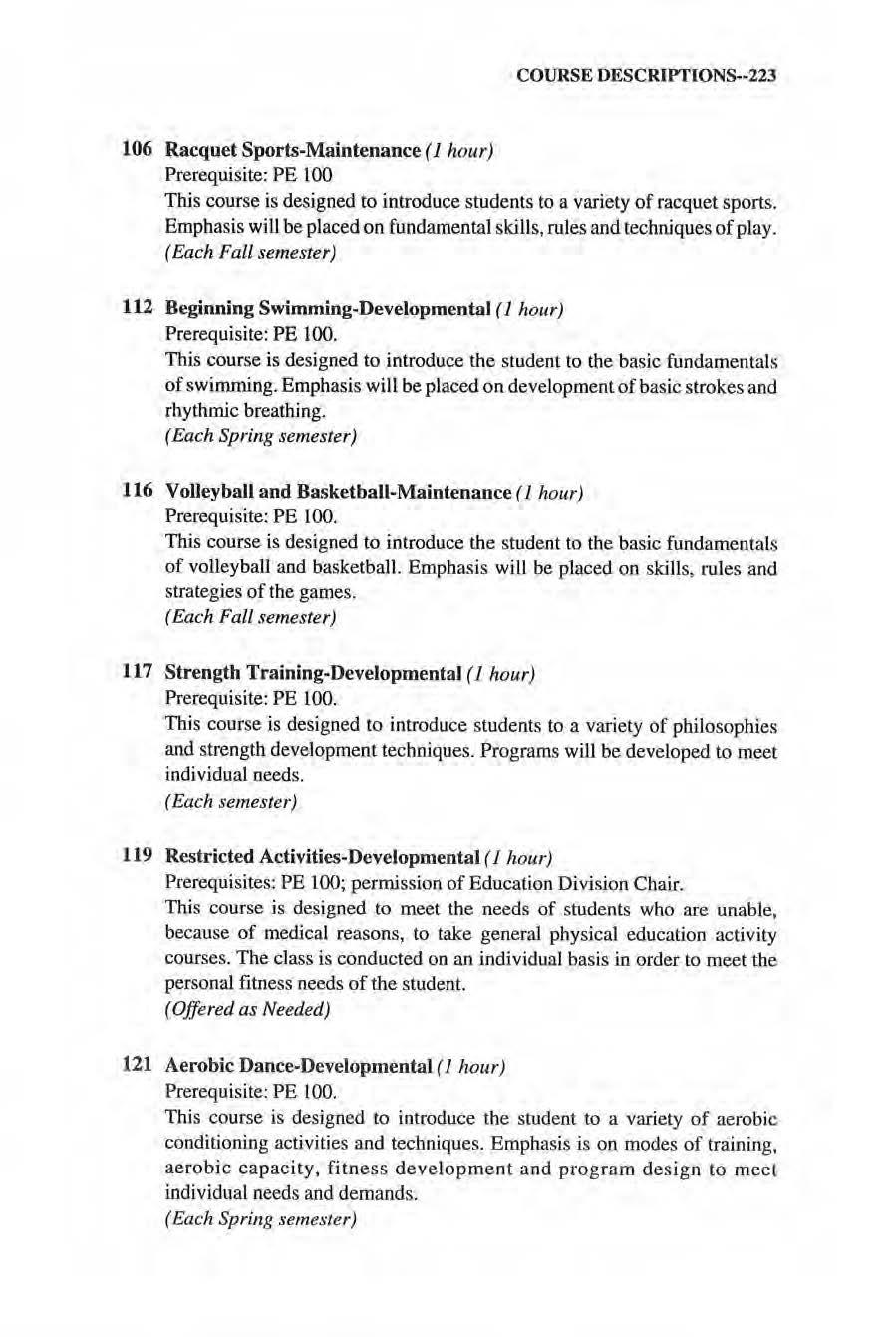
( E ach semester)
119 Restricted Activities-D evelopmental ( 1 hour)
Prerequi sites: PE 100; per mi ss ion of Education Division Chair. This co urse is designed to meet th e nee ds of s tudents who are unable, because of medic al re asons, to take general phy sical education activity courses. The class is conducted on an individual basis in order to meet the personal fitness needs of the student.
(Offe red as Ne eded)
121 Aerobic Dance-Developmental ( J hour)
Prerequ isite: PE I00.
Thi s cou rse is designed to introduce t he student to a variety of aerobic conditioning activities and techn iqu es . E mphasis is on modes of training, aerob i c capacity, fitness development and program design to me et individu al needs and d emands.
(Each Sprin g semester)
COURSE DESCRIPTlONS--223
122 Walking, Jogging and Cond i tioning-Developmenta l ( 1 hout)
Prerequisite: PE 100.
Th.is course is designed to introduce the student to aerobic conditioning. Emphasis is on modes of training. aerobic capacity, fitness development and program design to meet individual needs and abilities.
(Each semester)
123 Aquatic Fitness-Developmental (1 hour)
Prerequisite: PE 100.
This course is designed to introduce the student to a variety of aquatic fitness activities and tec hnique s Emphasis is on aerobic capacity, fitness development and program design to meet individual need s and abilities .
(Each Fall semester)
131 Folk, Square and Social Dance-Maintenance ( 1 h ou r)
Prerequi site: PE 100.
Thi s course is de s igned to introduce students to dance as a recreational and physical education activity. D ance elements and social responsibilities assoc iated with dancing will be discussed Variou s social. folk, and s quare dance patters will be introduced.
( Each Spring semester)
190 Varsity Sports ( 1 hour)
Requ ires success ful participation in a varsity s port. (A maximum of four (4) h o urs may be applied ro the degree requirements.)
(Ea c h semest e r)
201 Principles of Physical Education ( 3 hours)
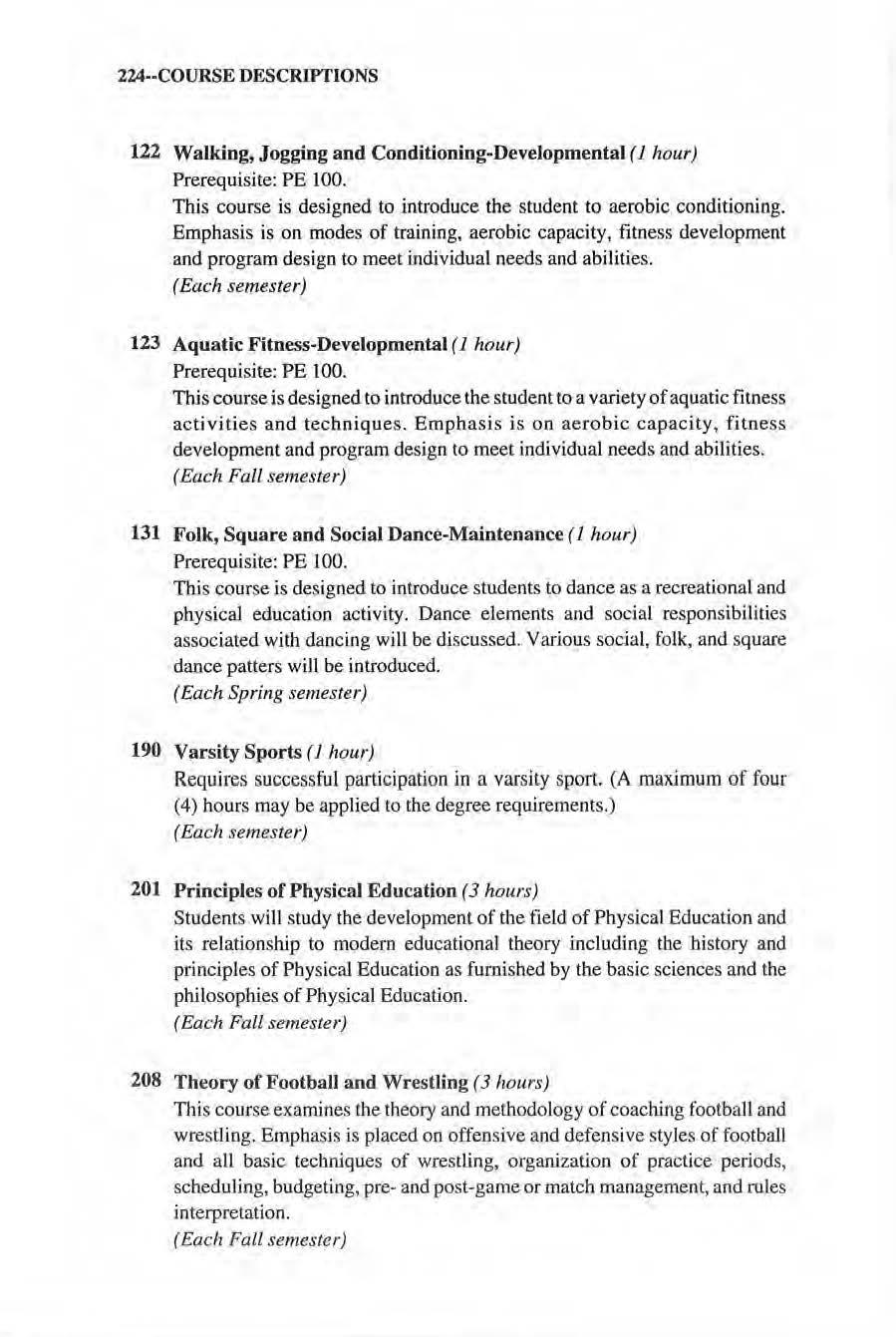
Students will s tudy the development of the field of Physical Ed ucation and its relations hip to modern educational theory including the history a nd princ ipl es of Phy s ical Education as furnished by the basic scie nces and the philosophies of Physical Education
(Each Fall semeste r)
2 08 Theory of Football and Wrestling (3 hours)
Thi s co urse examin es th e theory and methodology of coaching football and wrestling. Emphasis is placed on offens ive and defensive sty les of football and all basic techniques of wrestling, organization of practice periods, scheduling, budgeting, pre- and post-game o r match manageme nt, and rules interpretation.
(Each Fall semester)
224- -COURSE DESCRIYI'IONS
209 Theory of Bas ketball and Baseb all ( 3 hours)
This co urse examines the theory and methodology of coaching baskelball and baseba ll. Emphas is is placed on offensive and defensive styles of basketbal1 and baseball, orga nization o f practice periods, scheduling, budgeting, pre- and post-game management, and rules interpretation
(Each Fall semester)
210 Theory of Track and Field and C ross Country (3 hours)
Thi s course examines the theory a nd methodology of coaching all the standard track and field events· and cross country. Emphasis is placed on organization of practice periods, scheduling, budgeting, management of aerobic capacity, fitness d eve lopment and program design to meet indi vidual needs an d ab il i ti es.
(Each Fall semester)
211 Theory of Womens Basketball a nd Softball (3 hours)
This course examines the theory and methodology of coaching women's basketball and softball. The course will address ge nder differences in selec tion of activities in basketball a nd softball The psycholog ical approach to the game and special concerns a coach mu st be aware of when dealing with fe male ath letes will also be addressed. This course will address the d ifferences between women's a nd men 's sports . Emphasis is pl aced on organization of practi ce periods, schedulin g. budgeting. pre- and post-game manageme nt and roles interpretation

(Each Spring semeste r)
212 Theory of Volleyball and Soccer (3 hours)
This course examines the theory and methodology of coach ing volleyball
a nd soccer. Emphasis is placed on offensive and defen siv e strat egies in volleyball and soccer, organi zation of p ractice periods, scheduling. budgeting, pre- and post -game management, and rules interp retat ion.
(Each Fall semester)
21S First A id (3 h ou rs)
American Red Cross course and Medical Self Help course.
(Each semester)
Sports Skills courses (PE 220-221) require two hours of attendance.
220 Sports Skills - Se ries 1 (1 hour)
This co urse is a study of the strategies and techniques i nvolved in te aching selected physical education activities. fnclodes work to demonstrate competency in speci fi ed motor sk ills, including aq uatics.
(Each Fall semester)
COURSE DESCRIPI'IONS--225
221 Sports Skills - Series 2 ( 1 hour)
This course is a study of the strategies and techniques involved in teaching selected physical education activities. Includes work to demonstrate competency in specified motor skills, including gymnastics.
(Each Spring semester)
230 Rhythms and Dance for Elementary School (3 hours)
This course is an ex.ploration of the concepts and relationships of movement, broadening the concept of self-education through the experience of basic rhythms and dance activities at the e lementary level.
(Each Spring semester)
241 Internship in Sport Management (3 hours)
Prerequisite: Permi ssion of Director of Cooperative Education and Education Division Chair.
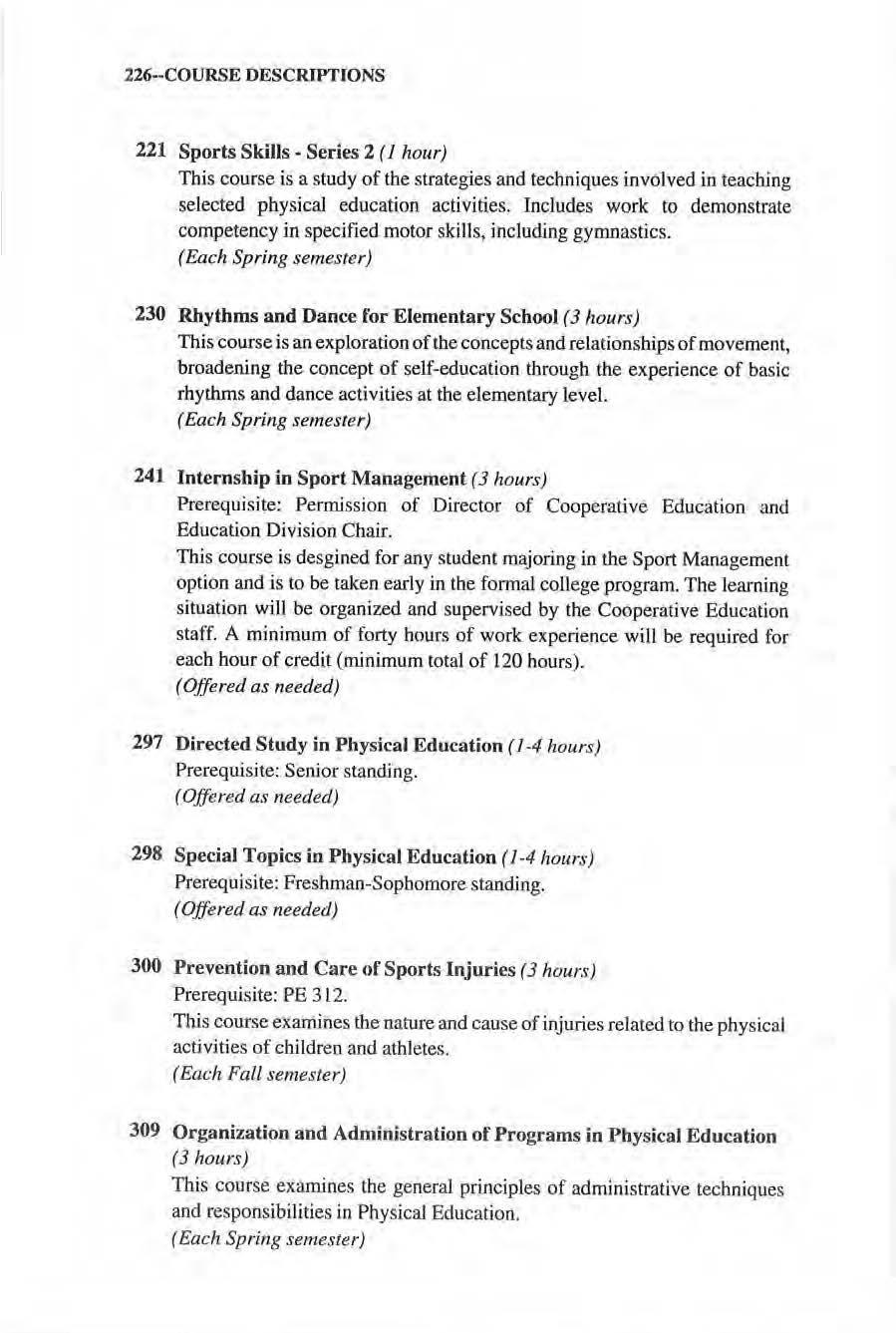
This course is desgined for any student majoring in the Sport Management option and is to be taken early in the formal college program. The learning situation will be organized and s upervised by the Cooperative Education staff. A minimum of forty hours of work experience will be required for each hour of credit (min imum total of 120 hours ).
(Offered as needed)
297 Directed Study in Physical Education ( 1-4 hours )
Prerequisite: Senior standing
(Offered as needed)
298 Special Topics in Physical Education ( 1-4 hour:;)
Prerequisite: Freshman-Sophomore standing.
(Offe red as needed)
300 Prevention and Care of Sports Injuries (3 hours)
Prerequisite: PE 312.
This course examines the nature and cause of injuries related to the physical activities of children and athl etes.
(Each Fall semester)
309 Organization and Administration of Programs in Physical Education (3 hours)
This cou rse examines the general principles of adm ini strative techniques and responsibilities in Physical Education.
(Each Spring semester)
226--COURSE
DESCRIPTIONS
312 Muscular Anatomy and Kinesiology (3 hours)
This course will provide the student with an understand ing of the anatomical and mechanical fundamentals of human motion. The s tude nt will learn a systematic approach to the analysis of human motion and will be able to apply anatomical and mechanical analysis to the learn ing and improvement of a broad spectrum of movement activities.
(Each Fall semester)
313 Elementary/Middle School Physical Education (3 hours)
Prerequisite : Junior standing or pennission of Education Division Chair.
This course examines the selection and organization of materials and technique s of instruction focusing on human movement and its significance in the development of the lives of children K-8.
(Each semester)
360 Physiology of Exercise (3 hours)
This course will provide students with a working understanding of how exercise affects the different systems of the body.
( Each Spring semester)
415 Motor Learning (3 hours)
This cou rse will provide an introduction to the field of motor learning. The focus of the course is on skill acqui s ition with primary consideration given to the learning process, tbe cognitive and motor processes underlying the learning of skiJl s and factoi-s that influence skill learning.
(Each Fall semeste11
416 Tests and Measurements in Physical Education (3 hours)

The purpose of this course is to provide an understanding of essenti a l statistical techniques, relevant measurement theory, and avai lable tests to enable the student to develop valid method~ of evaluation.
(Each Spring semester)
417 Adaptive Physical Education ( 3 hours)
Prerequisites: Psych. 250 and PE 312.
This course provides a study of philosophy, procedures and practices in adapted physical education.
(Each Spring semeste r)
COURSE DESCRIPTlONS--227
441 Internship in Sport Management ( 3 hours)
Prerequisites : Permission of Director of Cooperative Education and Education D iv ision Chair; Completion of PE 241.
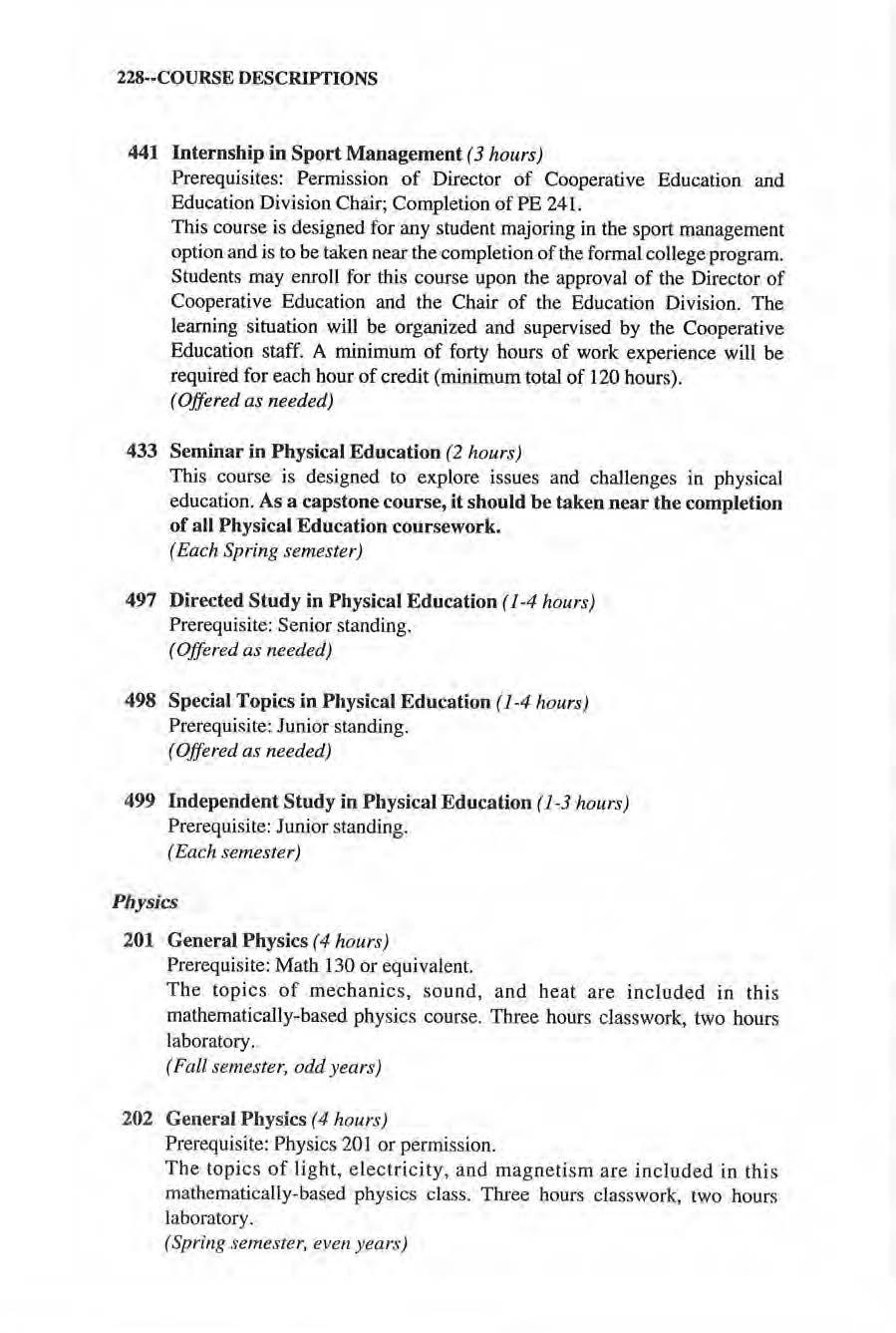
This course is designed for any student majoring in the sport management option and is to be taken near the completion of the formal college program. Students may enro ll for this course upon the approval of the Director of Cooperative Education and the Chair of the Education Division. The learning s ituation will be organized and supervised by the Cooperative Education staff. A minimum of forty hours of work experience will be required for each bour of credit (,minimum total of 120 hours).
(Offered as needed)
433 Seminar in Physical Education (2 lwurs)
This course is des igned to explore issues and challenges in physical education. As a capstone course, it should be taken near the completion of all Physica l Education coursework.
( Each Spring semester)
497 Directed Study in Physical Education ( l - 4 hours)
Prerequisite: Senior standing.
(Offered as needed)
498 Specia l Topics in Physical Education (1-4 hours )
Prerequisite~Junior standing.
(Offered as needed)
499 Independent Study in Physical Education ( 1-3 hours)
Prerequisite : Junior stao~
(Eac h semester)
Physics
201 General Physics (4 hours)
Prerequi site: Math 130 or eq uivalent.
Tbe topics of mechanics, sound, and heat are included in thi s mathematically-based physics course Three hours classwork, two hours laboratory.
( Fall se111este1; odd years)
202 General Physics (4 hours)
Prerequisite: Physics 201 or permission.
Tbe topics of light, e lectri c ity, and magnetism a re included in this mathematically-based physics class Three hours classwork, two hours laboratory.
(Spring .temester, even years)
228--COURSE
DESCR1PTIONS
206 Great Ideas in Astronomy ( 3 hours)
This course is an introduction to astronomy, with emphasis on those ideas and discoveries which have had, and continue to have, strong influence on our modern culture and world view .
(Offered as needed)
297 Directed Study in .Physics ( 1-4 hours)
Prerequisite: Senior standing.
(Offered as needed)
298 Special Topics in Phy sics ( 1-4 hours)
Prerequisite: Freshman-Sophomore standing.
(Offered as nee ded)
306 Astronomy (3 hours)
A basic course dea lin g with a study of the heavenly bodies, the solar system, and the universe. Telescopic observation is a part of this course.
(Spring semester, odd years)
497 Directed Study in Physics (1-4 hours )
Prerequ.isite: Senior standi ng.
(Offered as needed)
498 Special Topics in Physics ( 1-4 hours)
Junior-Senior standing.
(Offered as needed)
499 Independent Study in Pnysics (1-3 hours)
Prerequisite: Ju.nior standing; Permission of In structor and prior approval of Division Chair.
(Each semester)
Political Science
20 l American National Government ( 3 hours)
A thorough intro duction to the U.S. political system, its institutio ns and processes. Topics will include the constitutional founding, federalism, political culture, Congress, the Presidency, judiciary, bureaucracy, publi c opinion and the media, the electoral process, and civil liberties.
( Each semester)
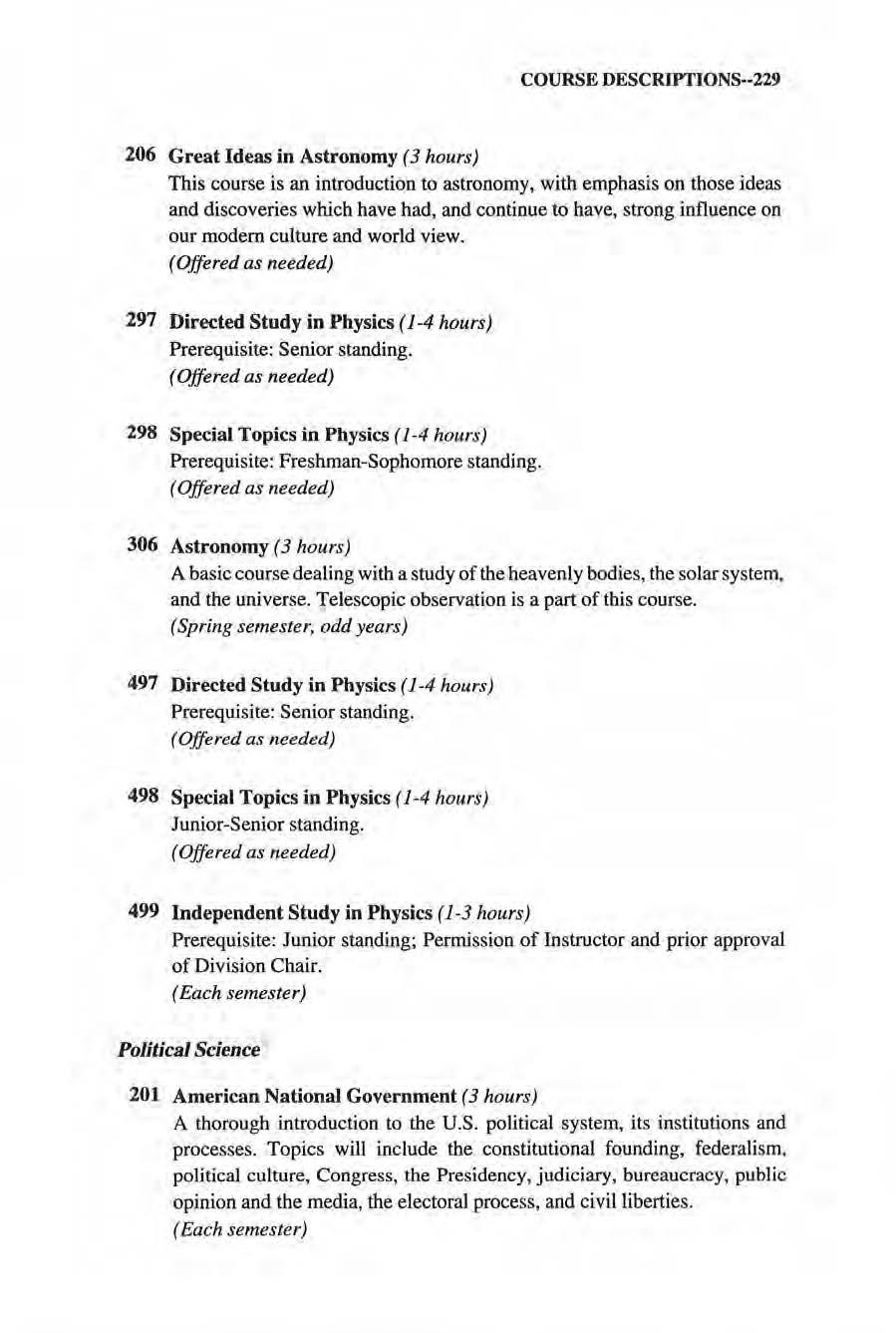
COURSE DESCRIPTIONS--229
202 State and Local Government (3 hours)
Description and analysis of political institutions and behavior in American states with interstate comparisons and comparisons between state and national political systems. Lecture topics include the development and role of American local government, its forms and structures, and the relationship to the federal government. ( Fall semester, even years)
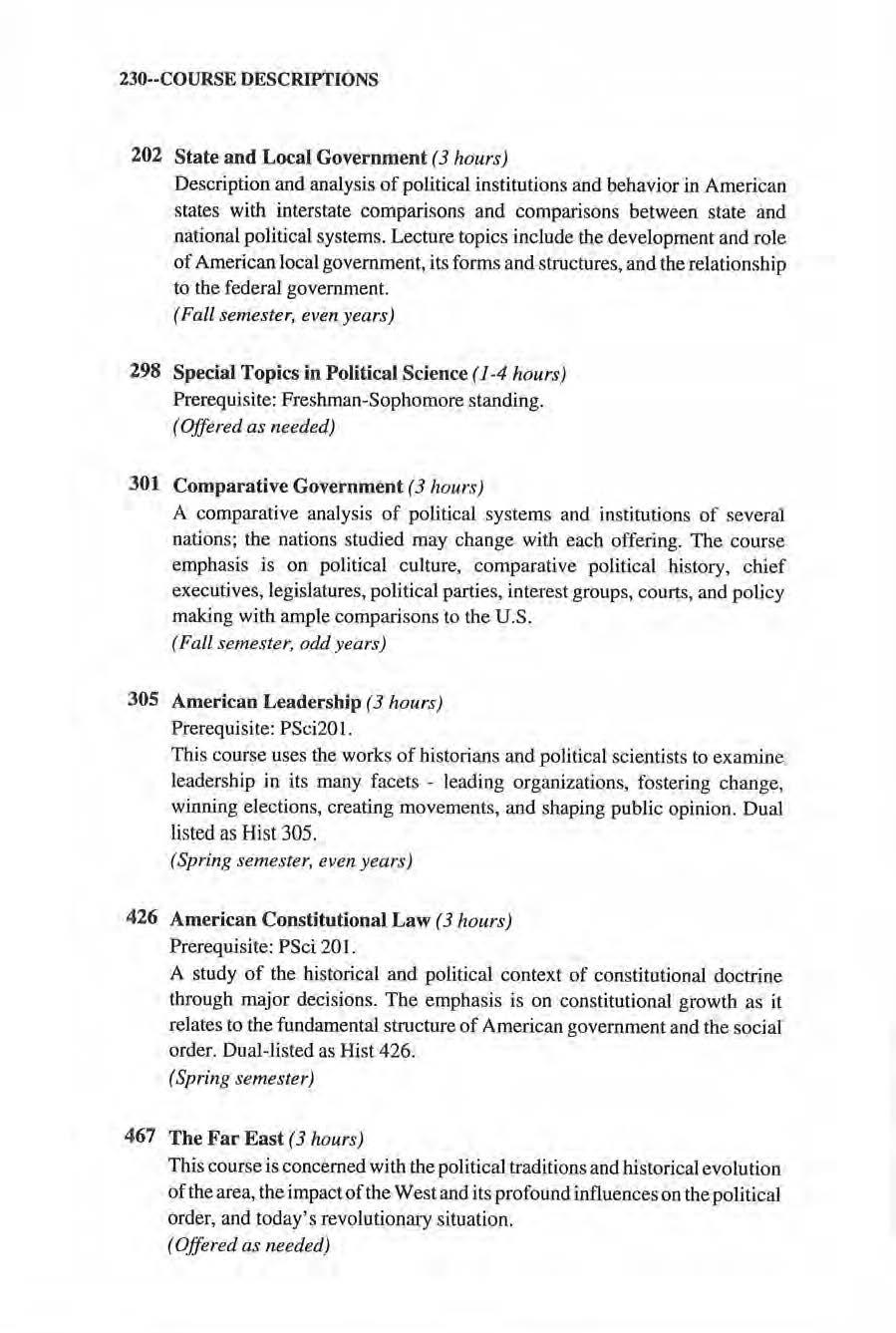
298 Special Topics in Political Science (J - 4 hours)
Prerequis ite: Freshman -S ophomore standing. (Offere d as needed)
301 Comparative Government (3 h ou rs)
A comparative analysi s of political systems and institutions of several nations; the nations s tudied may change with each offering. The course emphasis is on political culture, comparative political hi story , chief executives, legislatures , political parties, interest groups, co urts , and po]jcy making with ample comp ari sons to the U.S.
( Fall semester, odd years)
305 American Leadership (3 hours)
Prerequisite: PSci20 I.
This co urse uses the works of historians and political sc ienti sts to examine leadership in its many facets - leading organizations, fostering change, winning elections, creating mov.e ments, and shaping public opinion. Dual listed as Hist 305 (Spring semester, even years)
426 American Constitutional Law (3 hours)
Prerequisite : PS ci 20 I .
A study of the his torica l and politica l context of constitutional doctrine through major decisions. The emphasis is on constitutional grow th as it relates to the fundamental structure of American government and the social order. Dual-listed as Hist 426. (Spring sem ester)
467 The Far East ( 3 hours)
This course is concerned with the politi cal tra ditions and historical evolution of the area, the impact of the West and its profound influences on the political order, and today's revolutionary situation.
(Offered as needed)
230-·COURSE
DESCRIPTIONS
468 Public Administration (3 hours)
Prerequisite: PSci 20 l.
Students will study a range of topics involved in the administration of public agencies. Topics will include the history of America's public service, the development of intergovernmental relation s, bureaucracies, public personnel, budgeting, decis ion making, evaluation procedures, and r egulatory administrat(on. This c las s will encourage students to investigate the role of public administration in the past and today, as well as to conj ectu re the possibilities for the future.
(Spring semester, odd years)
497 Directed Study in Political Science ( 1-4 hours)
Prerequisite: Senior Standing.
(OJj'ered as needed)
498 Special Topics in Political Science ( 1-4 hours)
Prerequisite: Junior-Senior standing.
(Offered as needed)
499 Independent Study in Political Science (1 - 3 hours)
Prerequisite: Junior standing.
(Offe red as needed)
Psychology
121 Introduction to Psychology (3 hours)
This course is a general introduction to contemporary psychology focusing on basic concepts, principles, terminology, trends in psychological research, and the application of this knowledge , (Each semester)
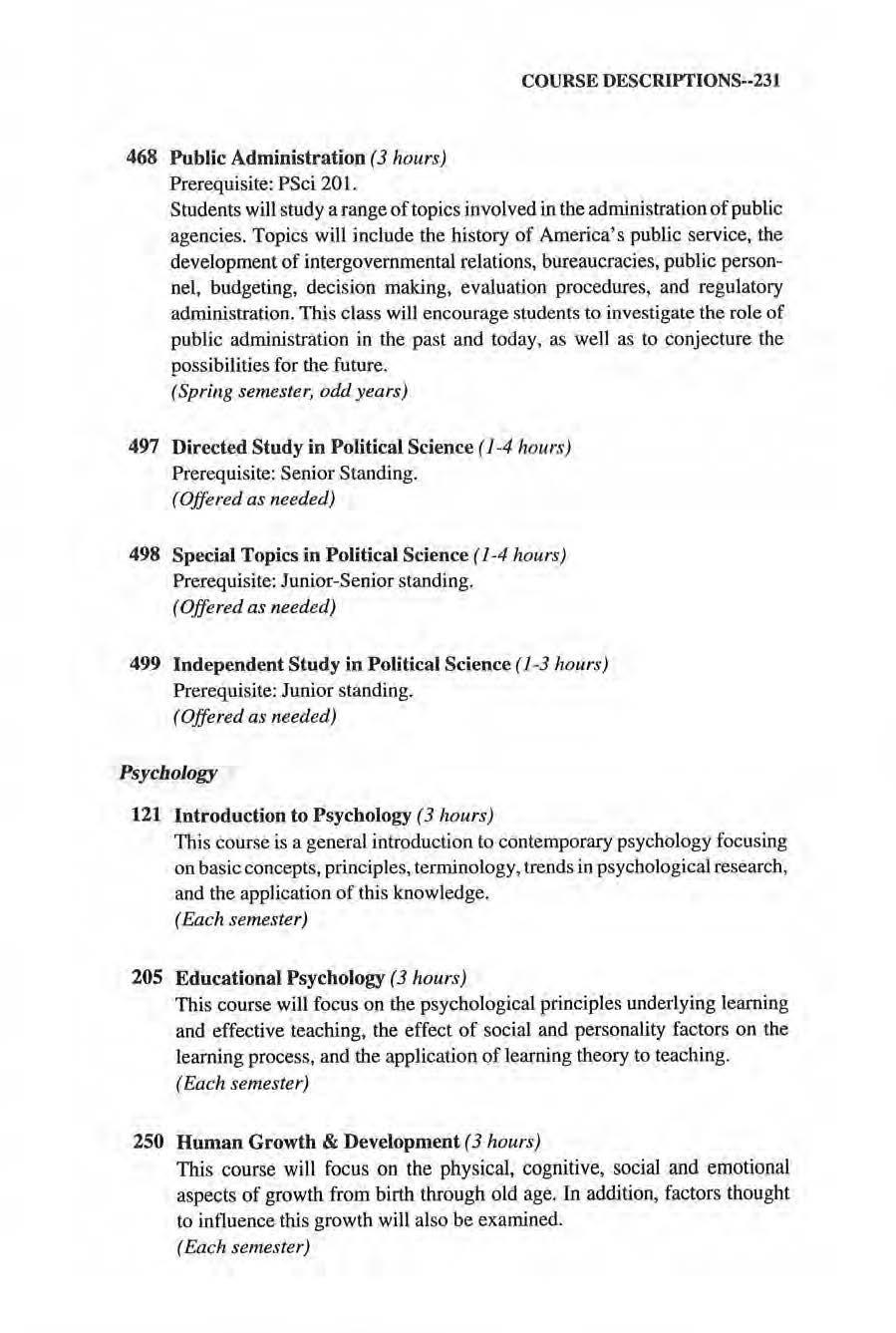
205 Educational Psychology (3 hours)
This course wilt focus on the psychological rrinciples underlying l earn in g and effective teaching, the effect of social and personality factors on the learning process, and the application of learning theory to teaching.
( Each semester)
250 Human Growth & Development (3 hours)
Tb.is course will focus oa the physical, cognitive, social and emotional aspects of growth from birth through old age. In addition, factors thought to influence this growth will also be examined.
(Each semester)
COURSE DESCRIPTIONS--231
255 Huma n Relatio ns (3 hours)
Students wi ll study issues of sen sitivity to biases, perpetuation of biases in the use of language, cri tical examination of text b ooks and other printed material for b iases, co ntributions to our cul ture which have accompanied changes in demographic compositi on of the nation and leadership iss ues related to mul ti-culurral issues and appreciation of dive rsity of values, customs and styles, and perso na l interaction.
(Each semester)
297 Directed Study in Psychology ( 1-4 hours)
Prerequisite: Senior standing.
( Offered as needed)
298 S p ecial Topics in Psychology ( 1-4 hours)
Prerequisite; Freshman-Sophomore standi ng.
(Offered as needed)
304 Experimen tal Psychology (3 hours)
Prerequisite; Psych. 121 and Math 340.
The course is designed to assist students in the comprehension and use of experimental methods, basic statist ical analysis, and experimental literature. Research exerc ises are provided to illustrate course content.
(Spring semester, even years)
305 Social Psychology ( 3 hours)
Prerequisite: Psyc.h . 121 or Soc. 201.
This course will focus on the effects of culture, society, social institutions, and social learning on the social attitudes and behavior of ind ividuals within groups.
(Spring semester, odd years)
310 Psychology of Sports & Physica l Activities (3 hours)
Prerequisite: P sych. 121.
This course examines the place of psychology in physical educati on and spo r ts. It includes personality , attention an d arousal, a n xiety and intervention, theories of moti vation, and social psychol ogy of sports

aggression, audience effects, team cohesion, and leadership in sports.
(Fall semester, even years)
320 Psychology of Learning (3 hours)
Prerequisite: Psych. 121.
This course will provide students w ith a broad , eclectic coverage of the field of learning a nd memory by addressing the wide range of issues and problems within the field from stimulus-response to cognitive psychology.
(Spring semester, oda years)
232--COURSE
DESCRJPTIONS
345 Psychology of Personality (3 hours)
This course will focus on the process of personality growth and adjustment. Through an examination of selected theoretical systems, different interpretations of this process will be presented.
( Fall semester, odd years)
431 Psychological Tests and Measurements (3 hours)
Prerequisites: Psych. 121 and Math 345 or permission of the instructor. The course will focus on the issues and problems surrounding psychological testing Topics to be discussed include reliability , validity , construction, administration, norms, and interpretation as well as a survey of current psychological tests.
( Offered as needed)
437 Techniques of Counseling ( 3 hours)
Prerequisite: Psych. 121.
The content, process, and practi ce of various counseling techniques will be examined for their applicabi li ty to education, psychology a nd social work. Practical experience in the use of these techniques will also be provided.

(Spring semester, even years)
438 Approaches to Parent & Family Counseling (.1 hours)
Prerequisite: SpEd 200. This course is designed for persons who are preparing to work with parents in family counseling. The changing nature and definition of "family" as it relates to today's society will be introduced. The ethics, settings, referral process, basic counseling strategies and approaches will be addressed, (Fall semester)
440 Behavior Management & Modification (3 hours)
Prerequisite: Junior standing o r permi ssion of instructor. The course will focus on the basic principles of behavior modification as well as survey some of the practical applications of this general approach to behavior change.
(Each Fall semester)
450 Abnormal Psychology (3 hours)
Prerequisites: Psych. 121, 250 and junior standing. Focusing on personality di sorders, schizophrenia and manic depressives, this course wlll deal extensively with DSM -Ill- R categories of abnonnul psychology.
(Spring semester, odd years)
COURSE DESCRIPTIONS..-233
460 Psychology of Correctional and At-Risk Youth Education & Therapy (3 hours)
Prerequisite: Junior standing or corrections employment or instructor permission.
This course appl ies cultural influences on behavior, multicultural considerations and techniques, and educational and therapy skills appropriate for the At-Risk Youth in education and undereducated adults in the correctional population It in corporates learning styles, domestic violence education and prevention, cooperat ive learning, conflict management, social skills literacy, and leadership skills developed in active learning and interest-based reading,
(Each semester)
465 Psychology Practicum (3 hours)
Prerequisite: Psych. 460, Math 240 or 340
As a companion course of Psych. 460, Practicum will supervise students tutoring and mentoring offenders Students will develop library and referencing skills along with c hoosing a topic, formulating a research question, note taldng, paraphrasing, and summarizing. Other areas to be covered include interpretation of data, presentation of materials, and plagiarism.
(Ea ch semester)
497 Directed Study in Psychology ( 1-4 ho"rs)
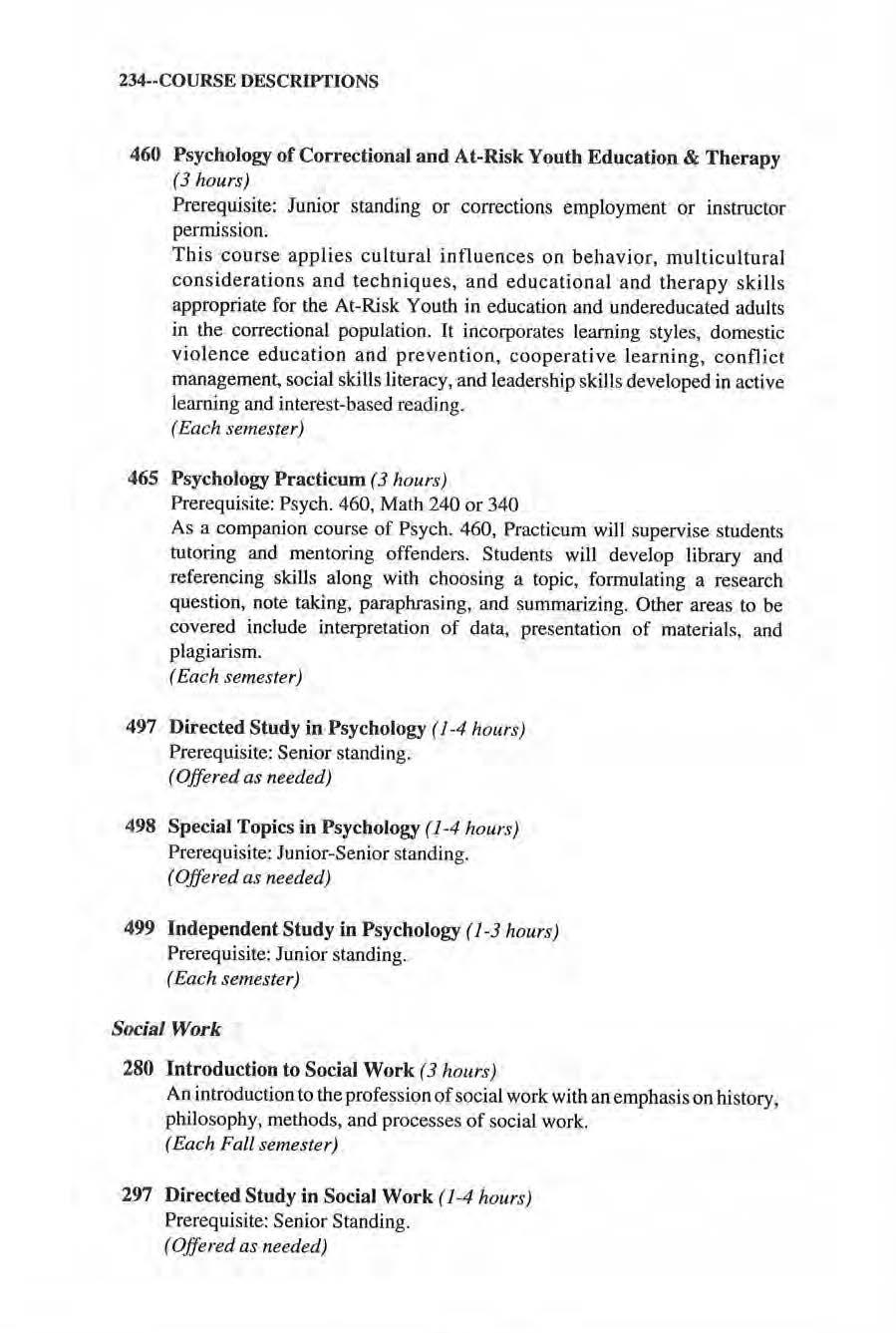
Prerequisite: Senior standing.
(Offered as needed)
498 Special Topics in Psychology (1-4 hours)
Prerequisite: Junior-Senior s tanding.
(Offered as needed)
499 Independent Study in Psychology ( 1-3 hours)
Prerequisite: Jun ior standing.
(Each semester)
Social Work
280 Introduction to Social Work (3 hours)
An introduction to the profession of social work with an emphasis on history, philosophy, methods, and processes of social work.
(Each Fall semester)
297 Directed Study in Social Work ( 1-4 hours)
Prerequisite: Senior Standing.
(Offered as needed)
234--COURSE
DESCRIPTIONS
298 Special Topics in Social Work (1-4 hours)
Prerequisite: Fre s hman-Sophomore stanw ng.
( Offered as needed)
310 Social Services (3 hours)
Prereq ui si te: SoWk 280.
The stud y of community social work with emphasis on techniqu es used to as s ess social problems o n a macro le vel as well as practice. Emphasis also on bow social services meet th e needs of communities in dealing with social i ssues.
( Eac h Sp ring semester)
375 Casework (3 hour,r)
Prerequisite: SoWk 280.
The art , theory, and practice of the dynamics of case wo rk with an emp hasi s on current social work techniques u sed to meet group and i ndividual needs
(Each Fall semester)
390 Group Work (3 hours)
Prerequisite: SoWk 28 0
The theory and practice of the dynamics of group work with an emphasis on techniques used in meeting group and individu al needs
(Each Spring semester)
430 Field Work Practicum (3 hours)
Prerequisite: 9 hours of Social Work and permission, Supervised experience in social work.
(Offe red as needed)
497 Directed Study in Social Work (1-4 hours)
Prerequi s ite: Seni or Standing.
(Offe red as ne eded)
498 Special Topics in Social Work ( 1-4 hours)
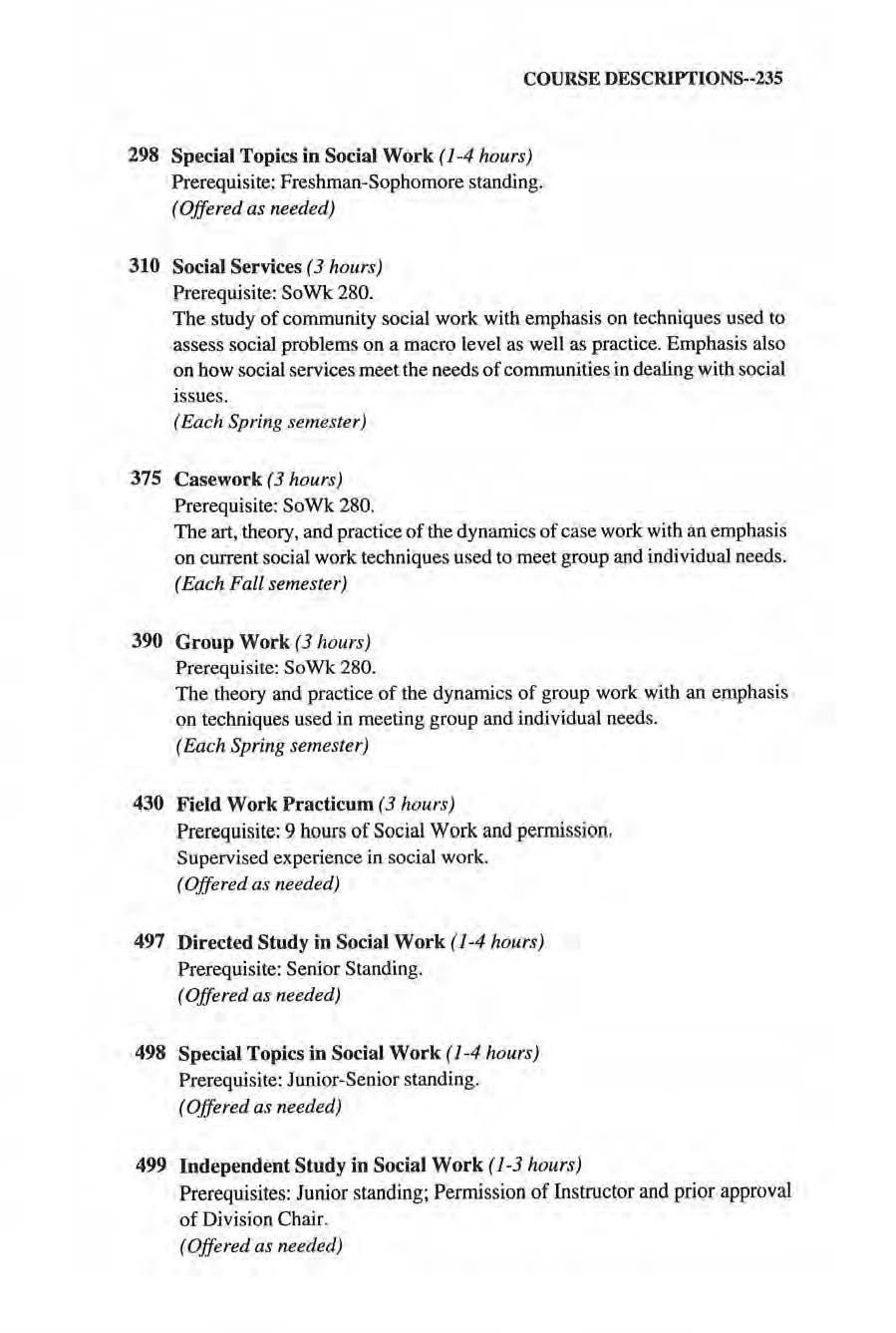
Pre req ui site: Junior-Senior standing.
(Offered as needed)
499 Independent Study in Social Work (1-3 hours)
Prerequisites: Junior standing; Permission of Instructor and prior approv al of Divis io n Chair.
(Offered as n eeded)
COURSE DESCRIPTIONS--235
Sociology
201 Principles of Sociology (3 hours)
A study of cultures and their relationship to specillc social problems, social institutions, ethnic groups, and the major problems of social policies.
(Each semester)
225 Introduction to Cultural Anthropology (3 hours)
A comparative and historical approach to the religion, social organization, subsistence patterns, and the other aspects of the great variety of cultures around the world.
(Each Fall semester)
230 Sociology of Women (3 hours)
A brief history of women 's role and status as well as society's attitude toward women.
(Spring semester, even years)
250 Commun ity Organization (3 hours)
Prerequisite: Soc 201.
The focus of this course is on the urban communi ty, basic patterns of social and ecological organization, and factors contributing to community integration a nd clisorganization.
(Each Spring semester)
260 Rural Sociology (3 hours)
Prerequisite: Soc 201.
An examination of rural societies with an analysis of rural groups. institutions, and rural-urban relations.
(Fall semester, even years)
297 Directed Study in Sociology ( 1--4 hours)
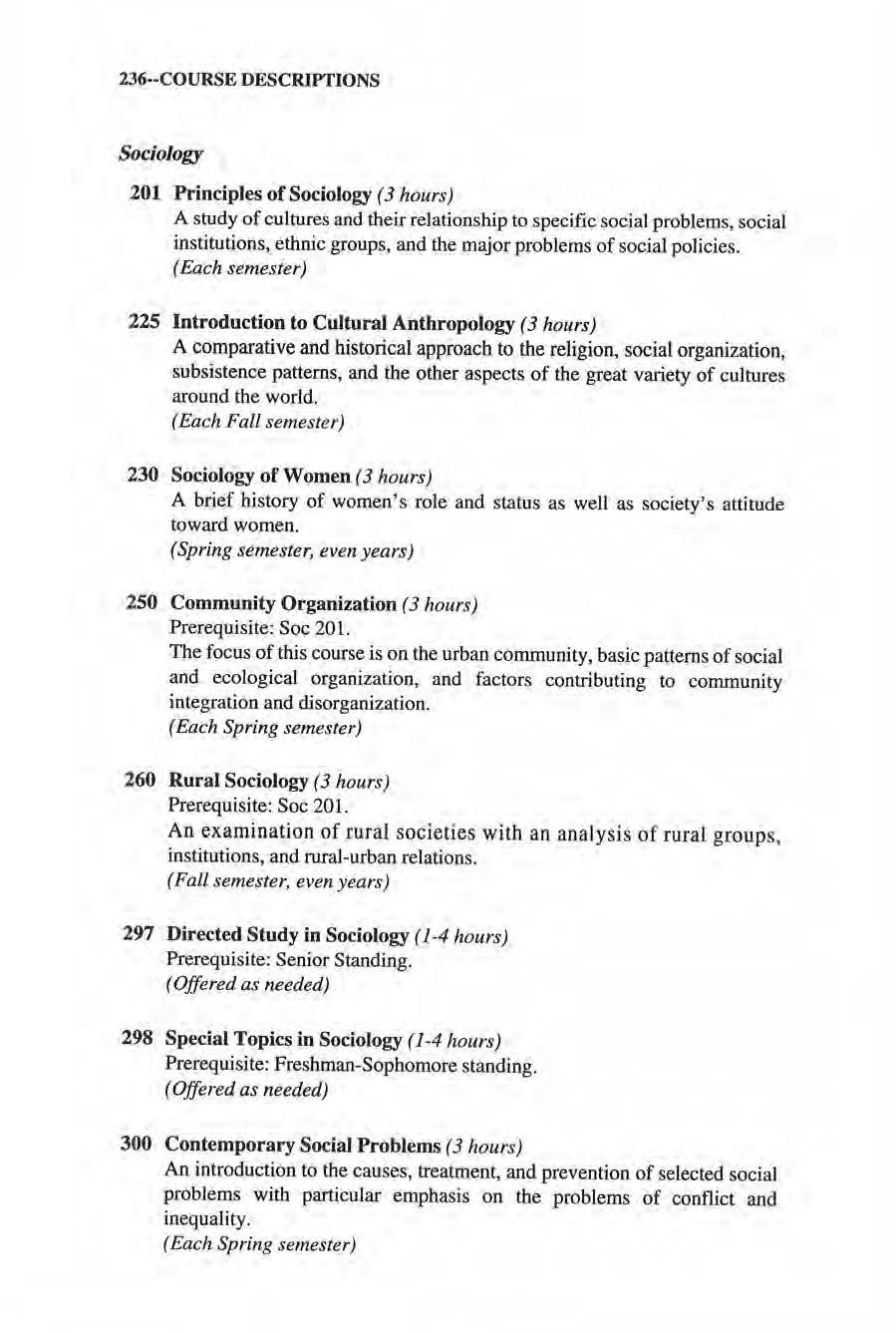
Prerequisite: Senior Standing.
(Offered as needed)
298 Special Topics in Sociology (1-4 hours)
Prerequisite: Freshman-Sophomore stand ing. (Offered as needed)
300 Contemporary Social Problems (3 hours)
An introduction to the causes, treatment, and prevention of se lected social problems with particular emphasis on the problems of conflict and inequality
(Each Spring semeste r)
236--COURSE DESCRIPTIONS
320 Sociology of Education ( 3 hours)
Prerequisite: Soc 20 l.
An application of sociological principles to the education process. The relationship between stratification and education, the importance of interaction patterns on the educational process , the effectof other institutions on education, and the role of education as a dynamic institution in a changing society are stressed.
( Fall semester, odd years)
321 Sociology of Religion (3 h o urs)
A study of the rok of religion in life, from early societies to the presenl The course stresses Sociological Theory ofReli,gi9a and includes materials from Anthropology. Archeology, Macrosociology, History, and comparative religions.

(Spring semester, odd years)
340 The Family (3 hours)
P rerequisite~Soc 20 I.
An examination of the role of t he family in contemporary society with an emphasis on the factors influencing the family structure, functions, and roles, and their implications for both the community and individuals at varying stages of the family life cycle.
(Each Spring semester)
360 Criminology (3 hours)
An examination of the nature and causes of tri me as a social phenomenon.
(Each Spring semester)
370 Ethnic-Group Relations (3 hours)
Prerequisite: Soc 201.
A study of the nature of minority groups and their distribution in American society with an examination of the melting pot-thesis in a pluralistic society.
(Each Fall semester)
420 Sociological and Psychological Theory (3 hours)
Prerequisite: Soc 201 and permission
An overview of earlier sociological theorists and theu contributions to current sociological theory . This course is the capstone course and senior competency for the Psychology/Sociology major.
(Each Fall semester)
497 Directed Study in Sociology {1-4 hours)
Prerequisite: Senior standing.
(Offered as needed.)
COURSE DESCRJPTIONS--237
498 Spec iaJ Topics in Sociology ( 1-4 hours)
Prerequisite: Junior-Senior sta nd ing.
( Offered as needed)
499 Independent Study in Sociology ( 1-3 hours)
Prerequisite: Junior s tandin g; Permi ssion of Instructor and prior approval of Division Chair.
(Offered a s needed)
Spanish
101 Introductory S panish (5 hours)
An introductory course in Spanish dealing with grammar, reading, writing, and conversing.
(Each Fall semester)
102 Spanish II (5 hours)
Prerequisite: Span 101.
Spanish II emph asizes increased proficiency in con versational situ at ions , grammar, reading, and writing.
(Eac h Spring semest er)
Special Education
200 Introduction to Special Educat ion (3 hours)
This course is des igned to provide a historical, political and sociological survey of the are as of except io nality in the field of spec ial education . Th e course will identify si gn ifi cant changes which have occurred in the education of exceptional populations a nd provide an introductory experience co ncerning tb.e various disability groupings.
(Each semeste r)
290 Education of Mentally Handicapped Learners (2 hours)
Prerequisite: SpEd 200 or concurrent enrollment. This course is designed to provide a survey of the characte ristics., ab ilities, needs, the psychological a nd environmental and cultural fac to rs which con tribute to retardation.
( Eac h Fall semester)
297 Directed Study in Special Edu cation ( 1-4 hours)
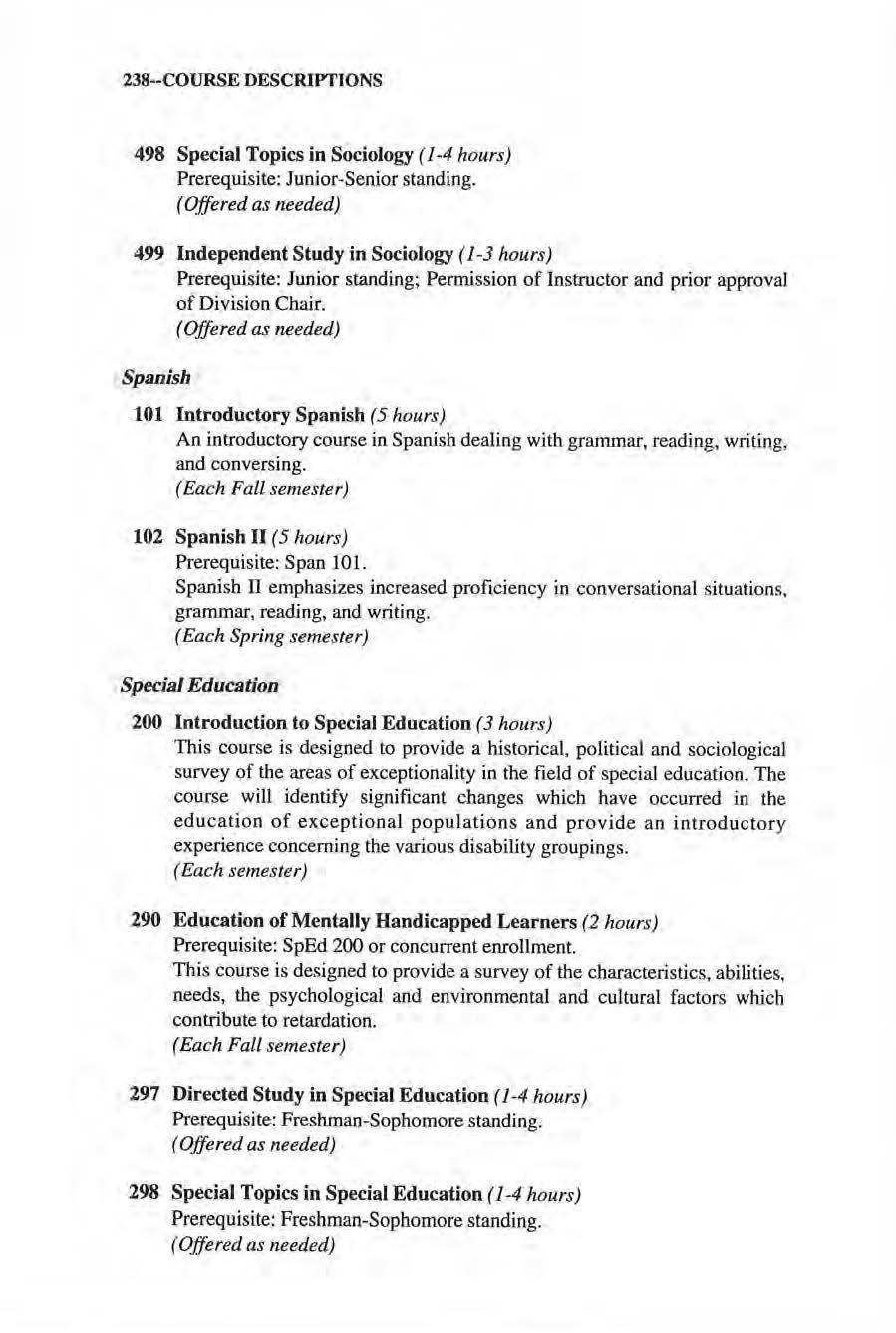
Prerequisite: Freshman-Sophomore s tanding.
(Offe red as needed)
298 Special Topics in Special Education ( 1-4 hours)
Prerequisite: Freshman-Sophomore standing.
(Offered as needed)
238--COURSE DESCRIPl'IONS
300 Assessment in Special Education (3 hours)
Prerequisitse: Admission to Teacher Education; SpEd 200. Tests commonly used for children with suspected handicaps are administered and intepreted. Emphasis is o n the use of fo rmal and informal assessment procedures to diagnose strengths and weaknesses of students which may affect academic performance. (Completion of Math 240 Elements of Statistics prior to enrollment is recommended.)
(Each Spring semester)
307 Special Education Practicum (2 hours)
Prerequisites: Admission lo Teacher Education; SpEd 200; Concurrent enrollment in SpEd 430.
The purpose of the course is to provide a classroom experience in a Special Education setting.
(Each Fall semester)
309 Preschool Handicapped Practicum (2 hours)
Prerequisites: Admission to Teacher Education; SpEd 200; SpEd 405.
This course is designed to provide students with an opportunity to observe the Specific methods in Preschool through Kindergarten being studied in preschool handicapped methods classes and to begin to pract ice those methods .
(Spring semester, even years)
385 Education of Learning DisabJed (2 hours)
Prerequi sitse: Admission to Teacher Education; SpEd 200 or Concurrent enrollment.
This course bas been designed to prepare the prospective teacher with the ability to diagnose deficit areas and areas of strengths, and to be able to know and implement various instructional procedures and appropriate educational materials of t he LD. child.
(Each Spring semester)
405 Special Education/Early Childhood Characteristics & Methods (3 hours)
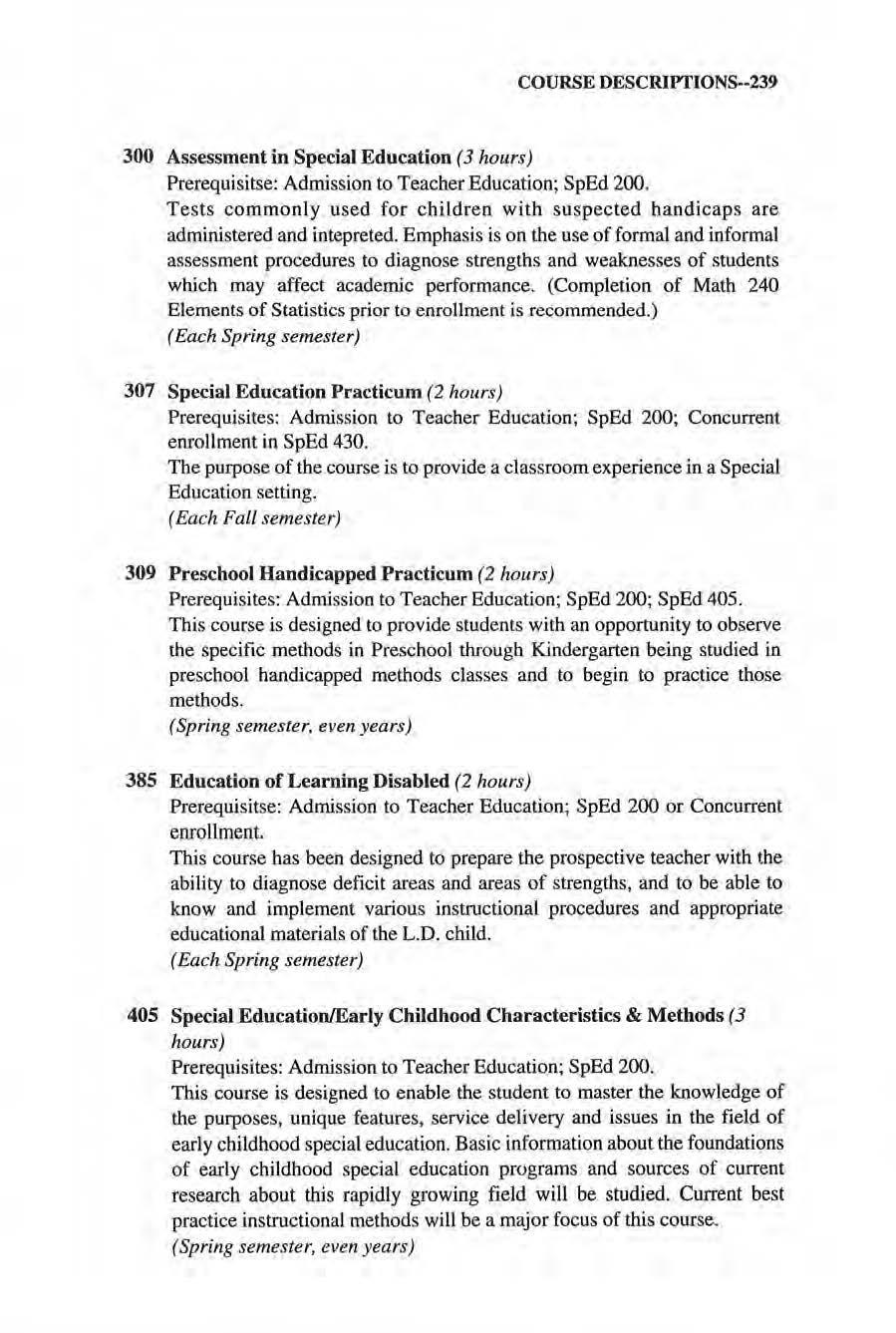
Prerequisites: Admission to Teacher Education; SpEd 200.
This course is designed to enable the student to master the knowledge of the purposes, unique features, service delivery and issues in the field of early childhood special education. Basic information about the foundations of early chi ldhood special education programs and sources of current research about this rapidly growing field will be studied. Current best practice instructional methods will be a major focus of this course.
(Spring semester, even years)
COURSE DESCRIPTIONS--23?
DESCRIPTIONS
421 Preschool Handicapped Student Teaching (8-16 hours)
Prerequisite: Admission to Student Teaching.
Observation, laboratory and practical application of learning principles in Preschool through Kindergarten settings. Students teach full-time for e ightsixteen weeks.
(Each semester)
430 Methods in Spec ial Education Progi:am Management (3 hours)
Prerequisites: Admission to Teacher Education; SpEd 200; Concurrent enrollment in SpEd 307.
This course is designed to develop skills n ecessary for teaching Special Education students (K-12) with mild/moderate hand icapping conditions. Emphasis is o n developing knowledge, skills and technique s for successful teaching in multi-categorical resource room settings and inclusionary educational programs.
(Each Fall semeste r)
435 Special Education Stud ent Teaching (8-16 hours)
Prerequisite: Admiss ion to Student Teaching. Observation, laboratory and teaching experience, in the special education classroom. Students teach full-time for eight -sixteen weeks.
( Eac h semester)
460 Career & Vocat ional Education for the Handicapped (2 hours)
Prerequisites: Admission to Teacher Education; SpEd 200. The curriculum is designed to provide background i nformati on jn vocational/career education for the mild/moderately handicapped. Vocational services, vocational evaluation, vocational counseling, workstudy programs, job placement and follow-up, lesson p lans and current models and materials used are included in the curriculum.
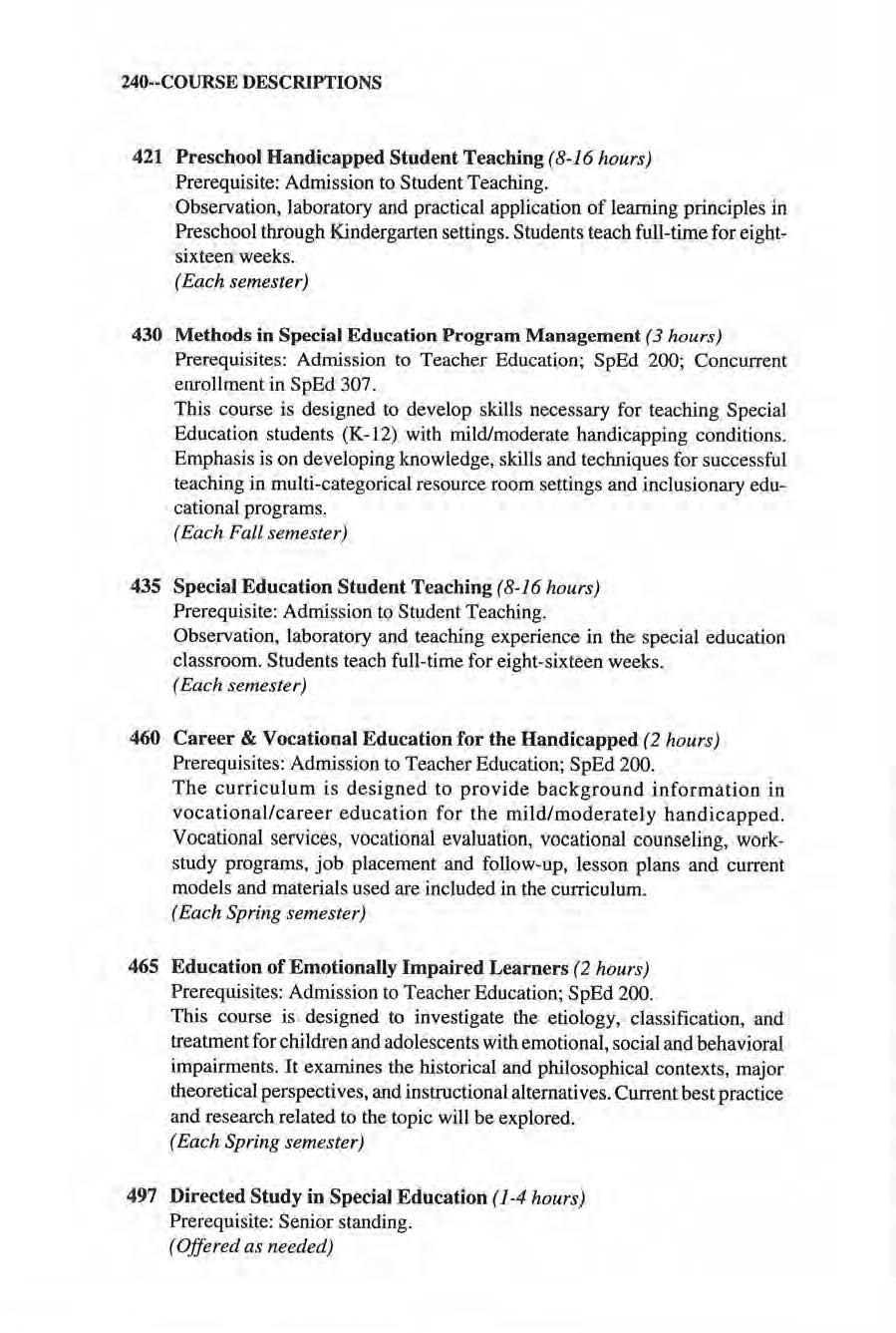
(Each Spring semester)
465 Education of Emotionally Impaired Learners (2 hours)
P rerequisites: Admission to Tea cher Ed ucation; SpEd 200.
Tb is course is des igned to investigate the etiology, dassification, and treatment for chi ldren and adolescents with.emotio nal, social and behavioral impairments. It examines the historical and philosophical contexts, major theoretical perspectives, and instructional al ternatives. Current best practice and research related to the topic will be explored.
(Each Spring semester)
497 Directed Study in Special Education ( 1 -4 hours)
Prerequisite: Senior standing.
(Offe red as needed)
240--COURSE
498 Special Topics in Special Ed ucation (1-4 hours)
Prerequisite: Junior-Senior standing.
(Offered as needed)
499 Independent Study in Special Education ( 1-3 hours)
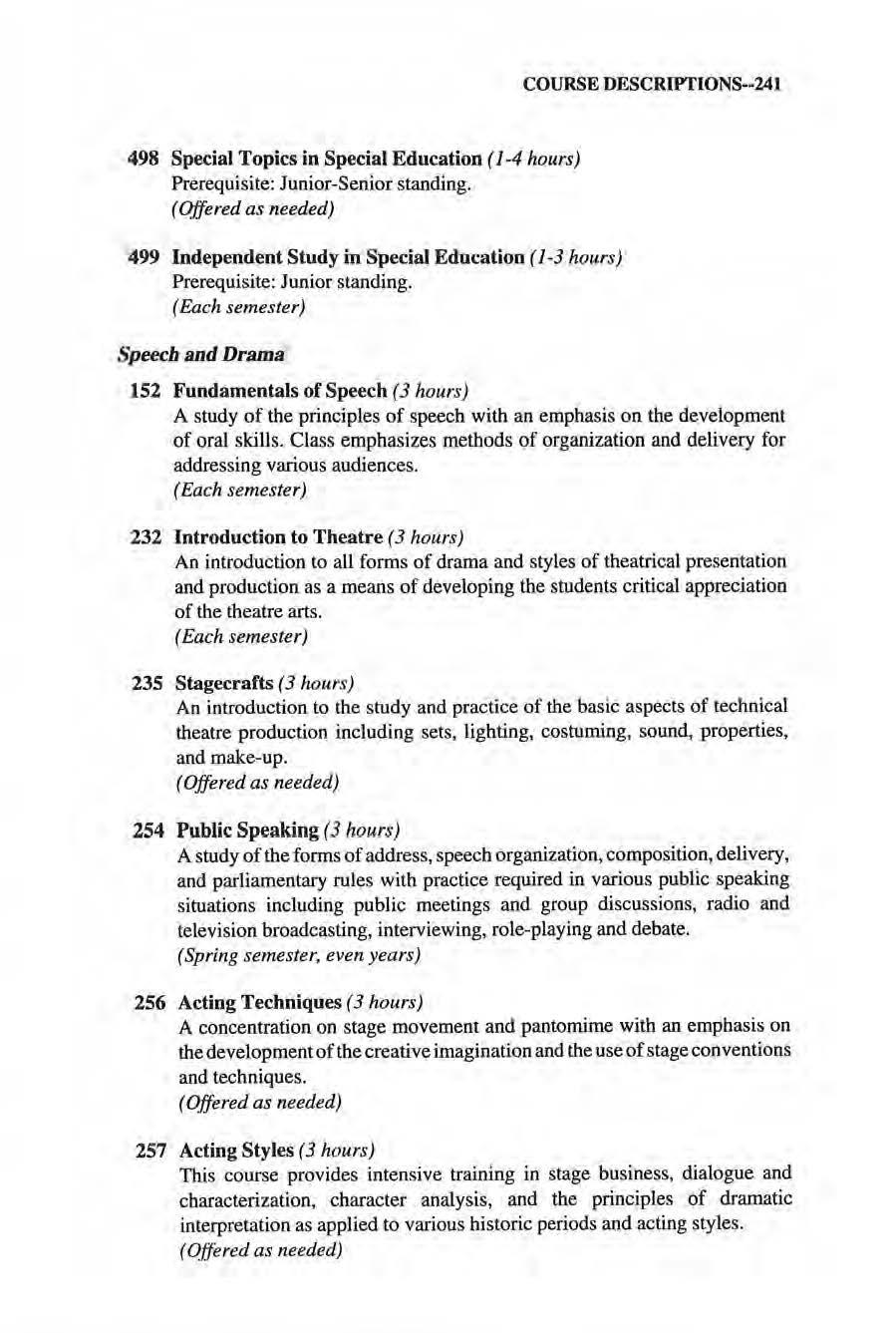
Prerequisite: Junior standing.
(Each semester)
Speech and Drama
152 Fundamentals of Speech (3 hours)
A study of the principles of speech with an emphasis on the development of oral skills. Class emphasizes methods of organization and delivery for addressing various audiences.
(Each semester)
232 Introduction to Theatre (3 hours)
An introduction to all forms of drama and styles of theatrical presentation and production as a means of developing the studen ts critical appreciation of the theatre arts.
(Each semester)
235 Stagecrafts (3 ho urs )
An introduction to the stu dy and practice of the basic aspects of technical theatre production including sets, lighting, costuming, sound, properties, and make-up.
(Offered as needed)
254 Public Speaking (3 hours)
A study of the forms of address, speech organizatio°' co mposition, delivery, and parliamentary rules with practice required in various public speaking situations including public meetings and group discussions, radio and television broadcasting, interviewing, role-playing and debate.
(Spring semester, even years)
256 Acting Techniques (3 hours)
A concentration on stage movement and pantomime with an emphasis on the development of the creative imagination and the use of stage convent ions and techniques.
(Offered as needed)
257 Acting Styles (3 hours)
This course provides intensive training in stage business, dialogue and characterization , character analysis, and the principles of dramatic interpretation as applied ,to various historic periods and acting styles.
( Offered as needed)
COURSE DESCRlPTlONS--241
297 Directed Study in Speech and Drama ( 14 hours)
Prerequisite: Senior Standing.
(Offered as needed.)
298 Special Topics in Speech and Drama ( 1-4 hours )
Prerequisite: Freshman-Sophomore standing.
(Offered as needed)
300 Summer Theatre Workshop (3 hours)
This course offers practical training in all aspects of theatre production including acting, set design, lighting, costuming, make-up, improvisation, music , and dancing.
(Offered as needed Summers only)
327 Light and Sound Design for Stage and Television (3 hours)
Prerequisite: Speh 235.
This course studies the theory and practice of stage and television lighting and sound systems with an emphas is on color, acoustical, and light problems.
(Offered as needed)
353 Speech Correction and Development (3 hours)
This course ide ntifies the unique educational problems of children with speech deficiencies with an emphasis on identification and remediation.
(Spring, even years)
355 Principles of Play Production (3 hours)
Thi s course for tbe director of dramatics in schools and communities auswers the fundamental questions of play sel ection, casting, directing, s teps in rehearsal, scenery, lighting, costume, malce--up, and business organization.
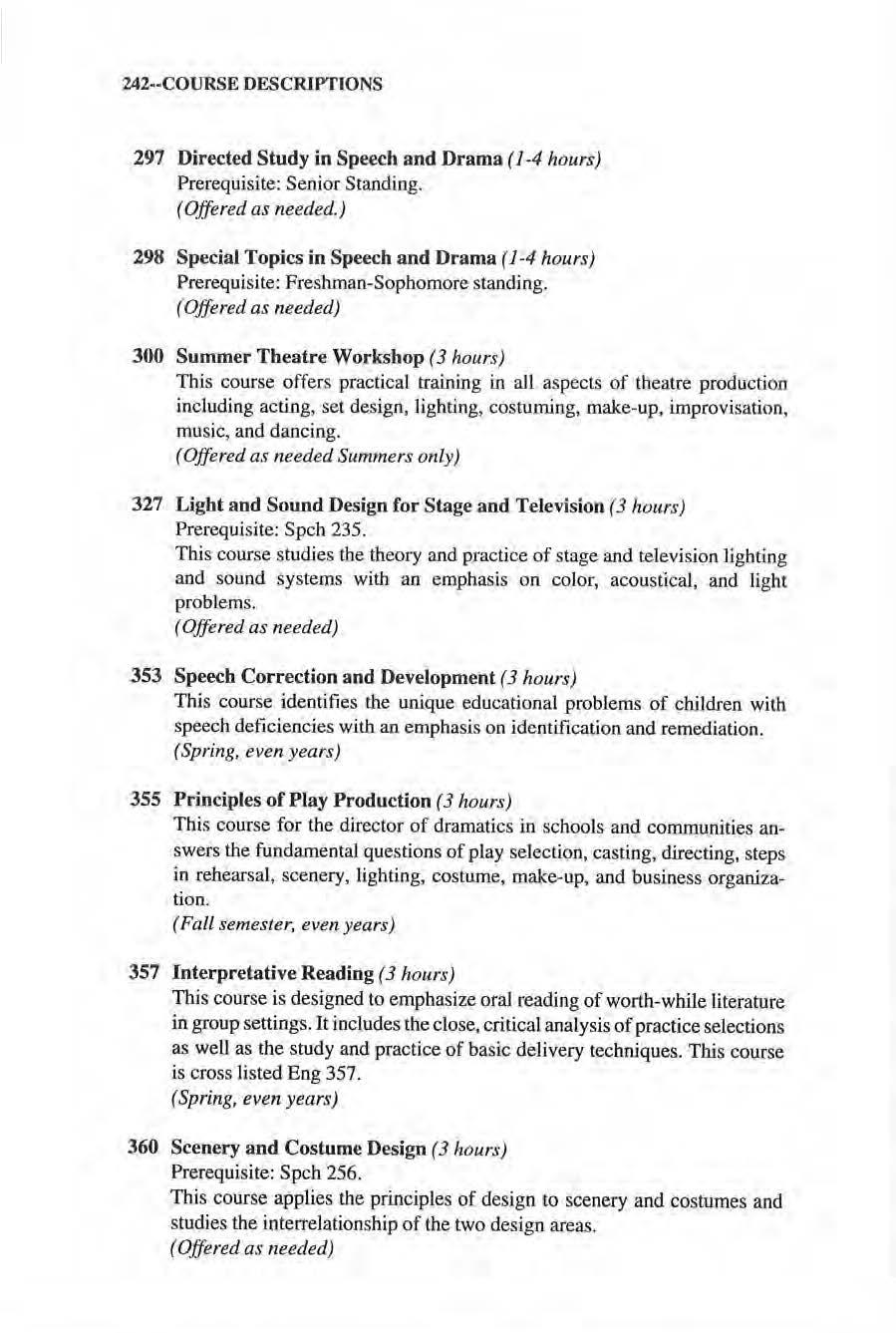
( Fall semester, even years)
357 Interpretative Reading ( 3 h ours)
This course is designed to emphasize oral reading of worth-while literature in group settings. lt iacludes the close, critical analysis of practice selections as weU as the study and practice of bas ic delivery techniques. This course is cross listed Eng 357.
(Spring, even years)
360 Scenery and Costume Design (3 hours)
Prerequis ite: Spcb 256.
This course applies the principles of design to scenery and costumes and studies the interrelationship of the two design areas.
(Offered as needed)
242--COURSE
DESCRIPTfONS
363 Directing I (3 hours)
Prerequisite: Speh 256.
Thi s course answers the fundamental questions of play selection, castLng, directing, scenery, lighting, costume, and make-up for the one-act play.
(Offered as needed)
364 Directing II (3 hours)
Prerequisites: Speh 256 and 363.
Further study in the historical interpretations of action, and an intense practical application of the fundamentals learned in D irecting I i n staged scenes and staging a one-act play.
(Offered as needed)
369 C h ildren's Theatre and Creati ve Dramatics (3 hours)
The study and active participation in the two different concepts of drama for young people. Creative dramatics, in which children with the guidance of an imaginative leader create scenes or plays and perform them using improvised dialogue and action with personal development as the goal, and Children's T h eatre which util izes written scripts directed and performed as a co mplete production for c h.il d audiences.
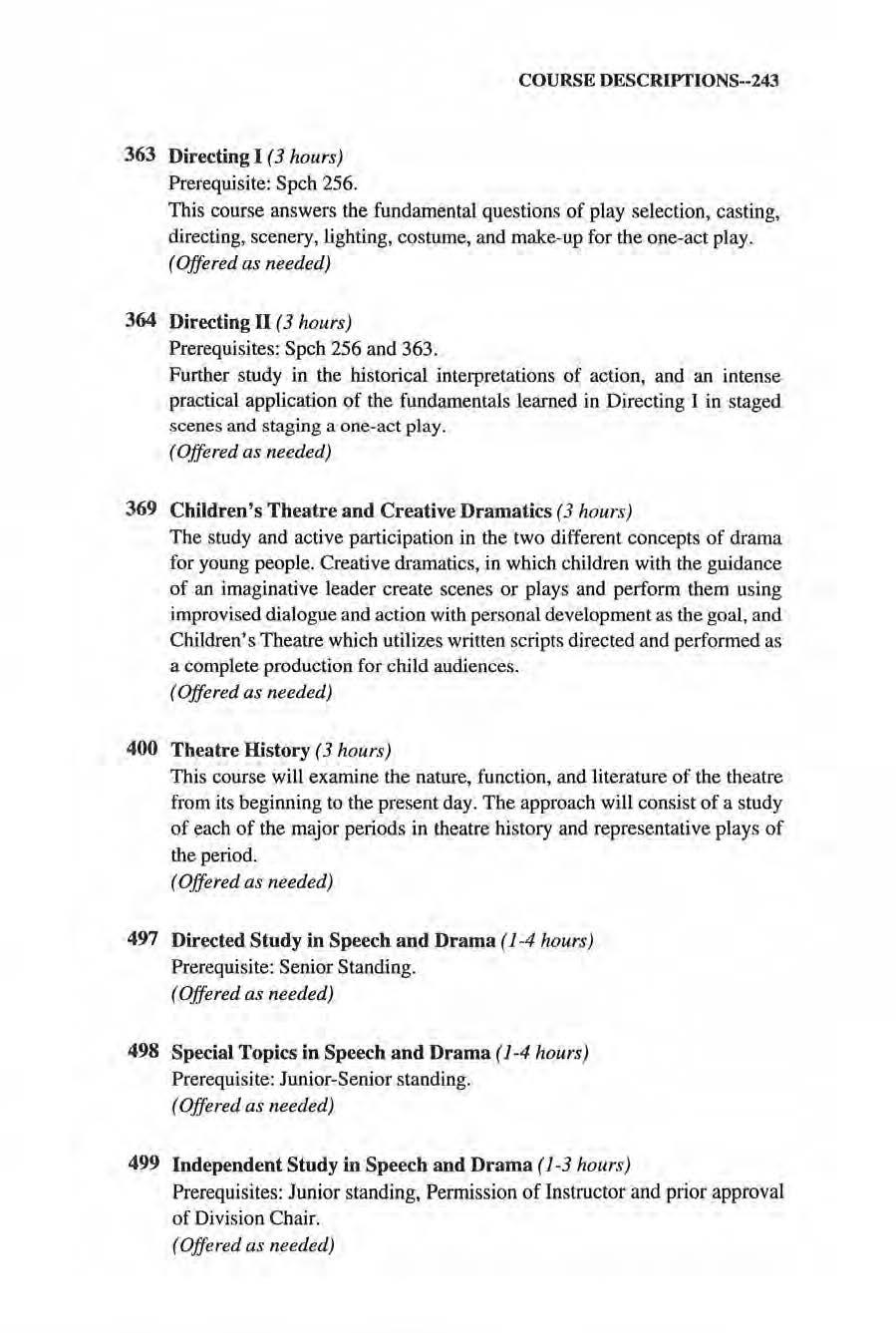
(Offered as needed)
400 Theatre History (3 hours)
This course will examine the nature, function, and literature of the theatre from its beginning to the present day. The approach wi ll consist of a study of each of the major periods in theatre history and representative plays of the period.
( Offe red as needed)
497 Directed Stady in Speech and Drama ( 1-4 hours)
Prerequisite: Senior Standing.
(Offered as needed)
498 Special Topics in Speech and Drama ( 1-4 hours )
Prerequisite: Junior-Senior standing.
(Offered as needed)
499 Independent Study in Speech and Drama (1 -3 hours)
Prerequisites: Junior standing, Permission of Instructor and prior approval of Divi sion Chair.
(Offered as needed)
COURSE DESCRIPTIONS--243
Voca ilona/Educauon
441 History and Philosophy of Vocational Education (3 hours)
The origins and philosophy of vocational education and its relationship to the school curriculum are covered. This course is req uired for vocational certification and recommended as a n e lective for sc hool administrators
(Offe red as needed)
442 Organization and Administration of Vocational Education ( 3 hours)
This course provides a study of tile principles and policies governing the administration of vocationa l educat ional programs in high schools, techn ica l school s, junior colleges, and adul t education p rograms.
(Offered as needed)
443 Coordination Techn iques in Vocational Education Programs (3 hours)
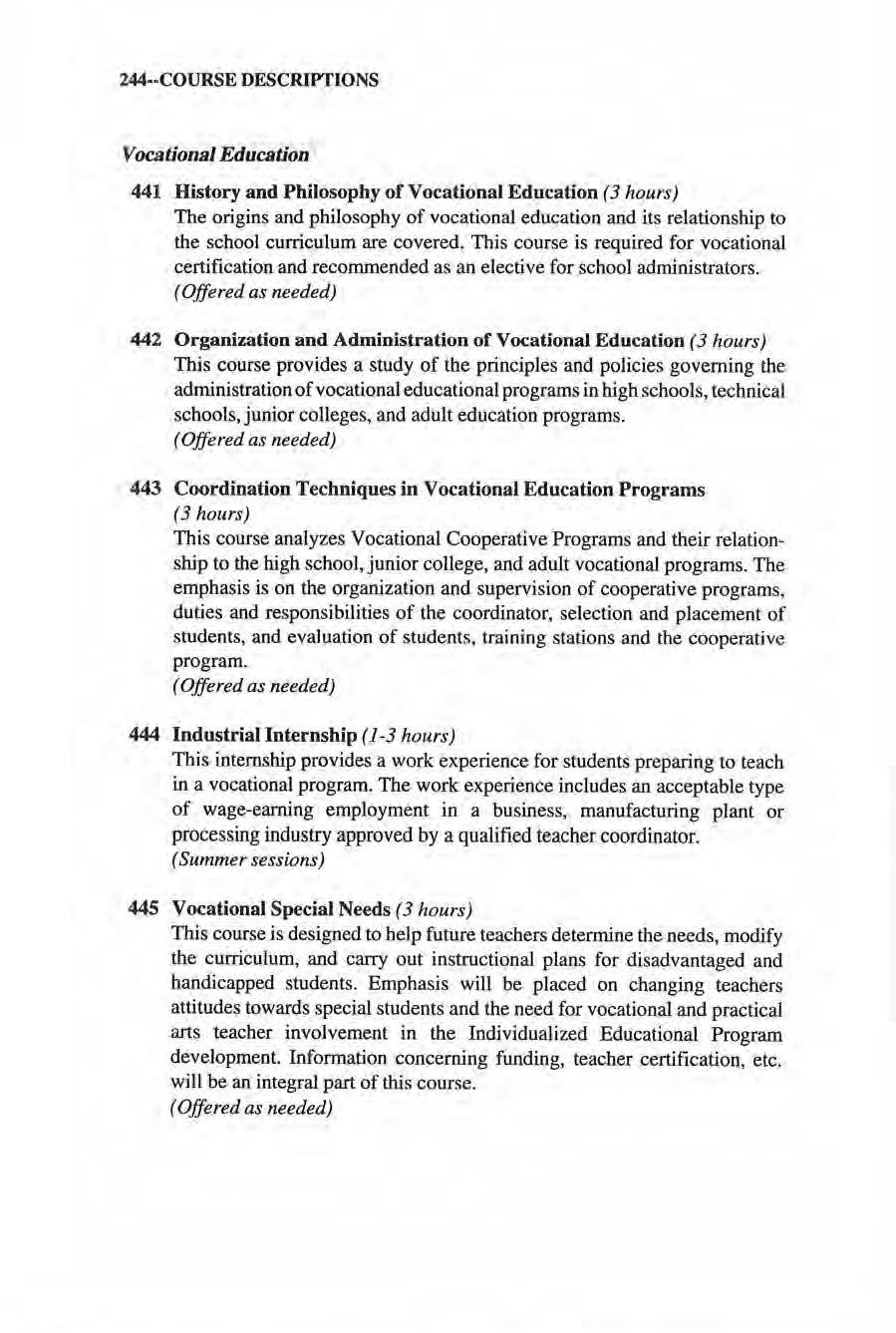
This course analyzes Vocational Cooperative P rograms and their relation• ship to the high school, junio r college, and ad uJt vocational programs. The emphasis is on the organization and supervision of coopera ti ve programs, duties and responsibilities of the coordinato r, selection and placement of students, and eval uation of students, trai ning stations and the cooperati ve program.
(Offered as needed)
444 Industrial Internship (1-3 hours)
This internship provides a work experience for students preparing to teach in a vocationa l program. The work experience in cludes an accep table type of wage-earning employment in a bus in ess, manufacturing plant or processing indus t ry approved by a qualified teac her coordinator.
(Summer sessions)
445 Vocational Specia l Needs (3 hours)
Th is course is designed to help future teachers determine the needs, modify the cu.niculu m, and carry out instructional plans for d isadvantaged and handicapped students. Emphasis will be placed o n cha nging teachers attitudes towards special students and the need for vocational and practical arts teacher involvement in the Individual ized Educational Program development. Information concerning fund i ng, teacher certificatio n, etc. wi ll be an integral part of this course.
( Offered as needed)
244- -COURSE
DESCRIPTlONS
Bo a rd of Trus t ees of the Nebras ka State Colleges
Dou g C hristensen , Stat e C ommissi o
Al G igstad
Fra nces Grimes
LH. Rick Kolkma n
C arrol Krause; Executive Directo r. Li ncoln
S heryl Lindau . , Wayne
Lee-E llen Matzke
Jeff Renner
Emeriti
Alma Ashley (1946-1970)
Clyde Ba rrett ( 1965-1993)
Faye Brandt (1959-1985)
Everett Bro wni n g ( / 969- 1986)
Estbe r Divney ( 1975-1990)
Roya l Eckert (1975- 1994)
Jobn Habn (1968-1993)
Wreathea Hicks ( 1968-/985)
Lucy Ho vey (1967-1972)
Don Jaco bs (1980-1994)
Dee Ja rvis (1948-1978)
K arol(! Johnson ( 195 1-1982)
Paul Kruse(J969- /994)
Ke lly Lie we r ( /968-1997)
Ly le McKerche r (1959- 1990)
ErvI n R. Pit ts ( /964-1982)
Fri eda D. Rowo ldt ( 1952-1970)
Lester Russell (1956-1995)
Lela nd S herwood ( 1963-/993)
Sco tt Williams (1966-1990)
G ilbe rt Wilso n (/957-1982)
Mary Ruth Wilson (1966- 1982)
Faculty
Professor Emeritus of Elementary Education
Profess or Emeritus of En glish
Professor l!.merirtlS of library Science
Professor Emeritus ofJoumalism
Professor EmeriltLf of Education
Professor Emeritus ofSpeech/Theatre
Professor Emeriws of Political Science
Professor Emeril<is of Englis/1
Prefessor Emeritus ofHome Economics
Professor Emeritus ofBusiness
Professor Emerillls of Industrial Arts
Professor Emeritus of Education
As.1ista11t Profes.mr Emeritus ofUbrary Science

Registrar Emeritus
Professor Emeritus of Mathematics
Profe 1sor Emeri/1/s of Health and Physical Educat ion
Profes.1or Emeritu s of Business
Professo r Emeritus of Industrial Technology
Profes.ror Emeritus ofArt
Professor Emeritus ofGeography
Professor Emeritus ofM,~1ic Professor Emeril<ls ofEnglish
(Dnre indicates year in whic h service at Peru State beg an.)
David Ai nswo rth ( I 994) Professor of Education
B.A., Kansas Wesleyan University; M.A., Adams State Co llege; Ed.D, University of Montanta
Kenneth A nderson (1984) Professor of Arr
B.G.S., B.F.A., M F.A., University of Nebraska Omaha
Tamara Artba ud ( 1995)
B.S. , M.S., University of Missouri
Kelly Asmussen ( 1994)
Assistant Professor ofSpecial Educ.utio11
Associate Professor ofHum.a11 Services
B.S University of Nebraska-Lincoln, M.Ed. Colorado State, Ph.D., lJnivcrsityof Nebrasku-Ltncoln
R o b e r t B urns (1991) Professor
B.A., Kentucky Southern College; M A , Universi ty of F lorida; Ph D ., University of Louisville
A nth on y Citrin ( /986) Professor of Ed11ca1ion
B . A., M.A., University of Kentucky; Ed.S. Cenlral Michigan Universiry . Ed,D., Western Mich igan University
Wi lliam C le m ent e ( /993)
Associate Professor of £11glish
B.A , San Diego State Un iversity; M A., Ph D., Un ive rsity of Oregon
Richa rd C l opton ( 1995) Assoc/me Professor of Biology
B.S., M.S., Ph.D., University of Nebraska-Linc oln
Da niel Cox ( 1988) Professo r of Educa,tion, Choir of education
B.A. , T arkio College; M.A , Univers ity ofNebraska-Omaha: Ph.D , University ofNebraska-Lincoln
P ERSONNEL--245
o
E
. . ..... . . . . • . ... . . . .. ........ Lincoln
ne r
f
ducation
. . .. .. . ...... . ... . ...... . .. . . . .. , ...... . . • . . ...... Nebraska City
..........
. .. .. . ..... .. ...... .. .. . .. .. ............. . .... . ......... G rand Island
, , • •• , , , North Platte
. ..... . .... . . . ................. . .... . .. . .... . .... . ....... . .. Sidney
. . .. . ...... . . .. , . . . . _.... ... .. . ... . . . . . _. . . . . . . . . . . . . . . . . . . . . . . Bellevue
Sara Crook (1993) Associate Professor of Hisrory/Pofirica f Scie11ce
B ,S,, M.A.. Ph D ,, University of Nebraska -Lincoln
Spencer Da vis (1983) Professor of History
B.A., Brown U niversity; M.A. , University of Nebraska-Lincoln ; Ph.D., University of Toronto
Joy OUJ1nigan ( 1994) Assistant Professor ofSpecial Educalio11
B.S., Doane College; M.S ., University of Nebraska-Lincoln
Thomas Ediger ( f979 ) Profeswr ofMusi c: Direaor of Choral Activiries
A.8. , University of Nebraska-Lincoln: M.A., 0.A., University of Northern Colorado
Da vid Edri s (1974) Professor ofMu sic
B.M.A. , MM Universi ty of Tulsa; D.M.A University of Missouri-Kansas C ity
Nancy Emerso n (1977) /11st1·L1ctor ofSocial Work/Sociology
B.S., M.S , Kansas State College--Pittsburg
Robley Evans ( 1978) Assisto/11 Profe~sor of Industrial Technology
B.S., Western Ke ntuc ky University; M.S., Indiana. University
Victor Fer re ( 1978) Professor of Educatinn
B.A., W eber Siate College; M.S., Utah Stale University; Ecl.D., New Mexico State University
C h ery l Fryer (1994) l,,stmcw r ofMu.tic; Direcror r;,f 81:mds
B.M., Western Michigan Universiry; M .M ., U nivers ity of Missouri-Kansas Ci1y
Joh n Gibbs ( 1981) /115/mctor of Physical Ed11ca1ion
B.S., Willi am Jewell College; .M.S., Central Missouri Srate University
Percy Gray-Rencberg ( 1996) lnstmcwr of fndustriol Tec/1110/ngy
A.A.S Kansas State University; B.A., McPherson College; M .Ed., Colorado State University
Jack Hamilton ( 1972) Assista11t Prof(fssor ofB11sine1,s, Chair of B11si11ess
B.S., M.S. , Kansas Srate College-Pittsburg
Charles Harper ( 1978) Pmfe.wir ofSpeech/Themre
B.A., Tarkio College; M.A ., Ph.D ., University o f Neb ras ka-Lincoln
Paul ffi n r icns ( 1990) Assis/mil Professor ofScience and Technology
.B S., Concordia College; M .S,, University of Nebraska-Lincoln
Dan Ho l tz ( !987) Professor of Eng lish
B.A., Kearney State College; M.S .• Ph.D. , U nivers ity of Nebras ka-Li ncoln
Michael Hypes ( 1996) Assi,<tonr Professor of Physrcal Ed11cotio11
B.S., M.A., Appalachian State University: D.A .. Middle Tennessee State Univers ity
Ma rga ret Jo nes ( 1993) A.uociare Professor ofAl'/
B .A University of Notre Dame: M.F.A University of Nebraska-Lincoln
Ma rk Kesh ( 1995) Assistant Professor ofManagemem 1,iformation Sy.ste,m
B.S., Jackson State Univer.,ity; M.S ., North Carolina A & T S tate Un i versity
Joseph Ki n caid (1996 ) As.,istant Professor ofMath ematics
B.A., Emporia Slate University; M.A., Emporia State University
Tom Kluber lru!z ( 1993) A.uociare Professor of Biol ogy
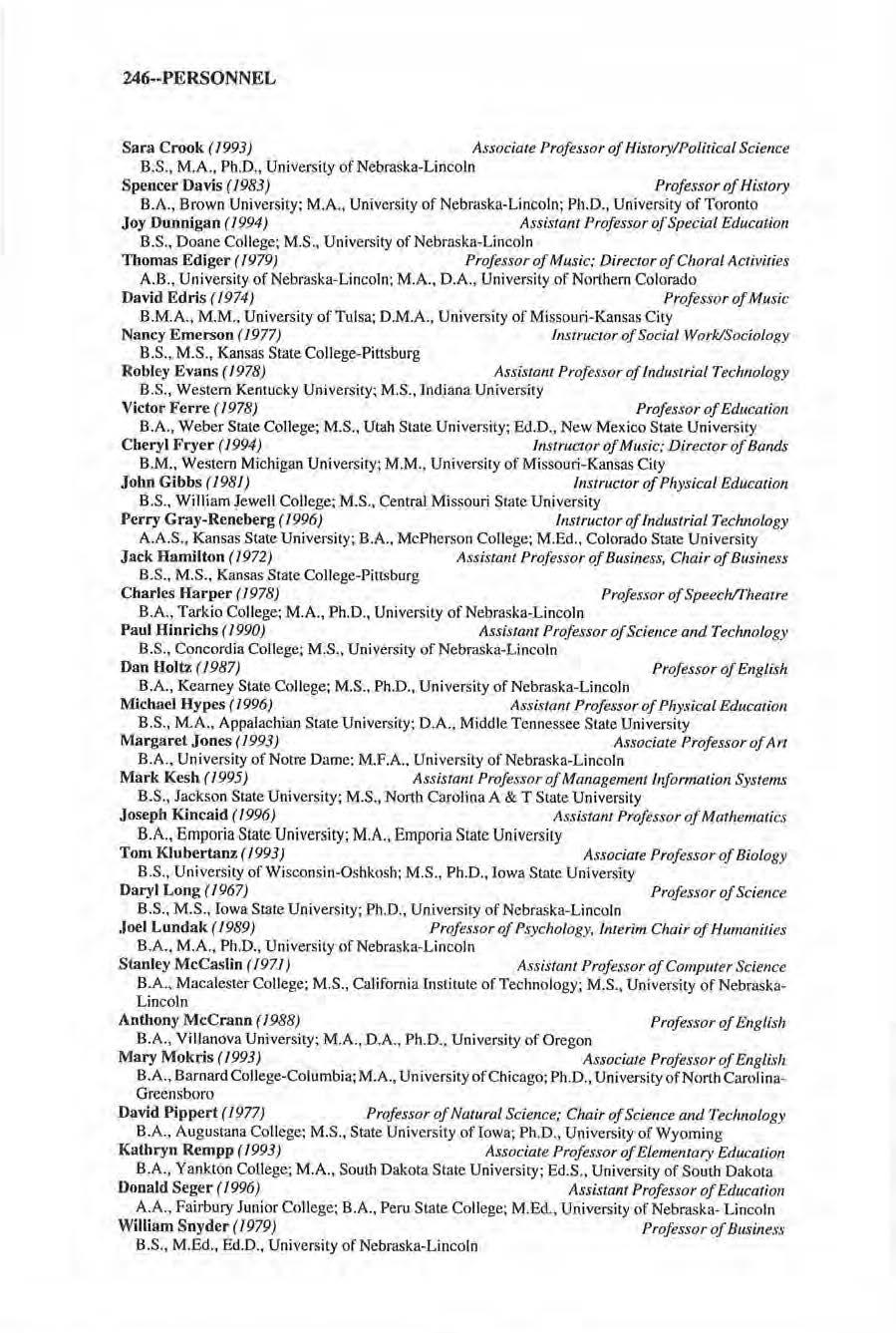
B.S , Un iversity of Wi sconsin-Os hkos h: M.S ., Ph.D., Iowa St11tc Un!verslry
Daryl Lon g ( 1967) Professor ofScience
B.S., M.S., Iowa State Univers ity ; Ph D.• University of Nebraska-Lincoln
.loel L un dak ( 1989) Professor of Psychology, lnleri m Chair of /111111a11itie.s
B, A M.A ., Ph .D., University of Nebraska-Lincoln
Stan ley McCa~ li n ( 1971) Assistant Professor of Computer Science
B A.. Macalest er College; M.S., Ca'lifornia Institute of Technology; M.S ., Univetsity of NebraskaLincoln
Anthony McC r ann ( 1988) Professor of t.'nglislt
B. A., Villanova University; M.A.. D.A., Ph.D• University of Oregon
Mary Mokris ( 1993) Associate Professor of Engfah
8.A ., BamardCollege-Col umbi a;M.A., University ofChicago; Ph .D., UniversityofNorthCaro linaGreensboro
Davi d Pippert (1977) Professor of Nawral Science; Chair ofSden ce and Tech11ology
B.A Augusrana College; M. S , State University of f01va ; Ph D " Ur;i ive rsityof Wyoming
Kat hryn Rcmpp ( 1993) Associate Profel·sor ofElementary Education
B.A., Yankton College; M.A., Sou th Dakota State University; Ed.$ .. University of Sou th Dakota
Donald Sege r ( /996 ) Assistam Professor of Education
A. A. , F airbury Junior College; 8.A., Peru State C o llege: M.Ed.., Uni vers ity of Nebraska- Linco ln
William Snyder (/979) Professor ofBusine.rs
B.S., M.Ed., Ed.D., University of Nebraska-Lincoln
246--PERSONNEL
Harry Tabata (/ 989)
Assistant Professor ofBusiMss
B.A.• University of Washington; M.B.A., Auburn University- Montgomery
James Thomas ( 1985) Professor ofB11siness
B.S., Wayne State University; M.A., Ph.D., Michigan State University
Me lissa T ho m eczek ( /997) Instructor of Physical Ed11cario11
A.A.S., Garden City Community College; B.S., Louisiana State University; M ,S., Indi ana State University
Ross Udey ( 1988) Assistottt Professor of Industrial Tec h110/ogy
B.A., M.S ., Wayne State College
Admin i s t rative Officers
David A insworth (1994) Vive Presidem for Academic Affair.•
B.A., Kansas We~leyan University; M.A., Adams State Col lege; Ed ,D, University of Montana
Robert B urns ( 199 l) Preside,a
B.A. , Kentucky Sou1hern College; M.A., University of Florida; Ph .D., University of Louisville
Oaryll flerscmonn (1994) Vii;e Presidclll for Smdent Affairs
B.A., University of Illinois; M A., Ph.D , Northwestern University
Susan Udcy ( /993) Vice President for Admi11istratio11 011d Finance
B.A.• M.S. , Wayne S1a1e Co llege, M.P.A, University of Nebraska-Lincoln
Pro fessio nal Staff
Ma rk Bayliss ( /997)
B.A., M.A., Siena Heights College
Tummy Bayliss ( /997)
A.AS, , 61 Reno Junior College; 8.S., Central State University
Barb Bend er/ 1988)
8.S., Kent State University
Pa l Beu ( 1997)
B S., M.Ed., Bringham Young University
Bob Brea:t.il e ( 1979)
Jerry Brcazile ( /996)
B .S., Peru State College
Renee Church ( 1997)
B.A. , Mount Marty College , CPA
De lyo C lifto n ( /993)
B.S., Peru Stare College
Paula Czirr ( 1996)
B.S Peru Stme College
Christopher Erickson (1996)
B.S., University of Nebraska-Kearney
Director of l11tranwrals
Health Center Director
Assi,11a11/ lo Director of Co11ti11ui11g Ed11catio11
Student Support Services Director
Facilities Ma11ogu
NBDC Director
Staff Accountant
Compwer Support Specialist
Ass i rtanl Director of Residence Life
Sports Jnforr,1atio11 Director
Ron Fabry (1986) Director of Physical Plarll
Frank Ferrante ( /99/) Director of Developme11ta/ Studies
B.S., ,Univers ity of Nebraska- Omaha; M.A ~ Appalachian State University
Peggy Groff ( 1976) Coordinator ofSpecial Eve11t.i
B.S.. Peru Stille College
Ted Harsh burger ( /989)
Director of Cooperative Education and Career Services
8 S., Peru State College; M.E'<I., University of Nebraska-Lincol n

J ulie Hop p (1995) Assista11t to the Vice Preside11t for Administration and Finance
B A Midlm,d Lutheran College
Jay Jacobsen ( 1996)
B.S.. University of Wisconsin-Superior
Linda Jacobsen (1990)
B.A., M.A., Chadron State College
Robin Jensen (1997)
B.A., Mt!mphls6Late Univ e rsity
Todd Jensen ( 1996)
B S , Unive rs ity of Kans as
Director of Conm1wiica1ioru
Atlmissian ~ Coa11.1elor
Het1d Volleyball Coacl,/Reside/lc e Director
PERSONNEL--247
Margareta Knopik ( 1996)
Assistant to the Director rJj Comin11ing Ed11catio,1
B.S., University of Nebrdska-Omaha; M .S., University of Nebraska-Lincoln
Tara Krck la u ( 1994) Head Wome11 's Basketball Coac/r, Student Advisor, Interim Athletic Director
B.S., University of North Dakota - Grund Forks; M.S., St. Cloud State
Louis Levy ( /996) Executive Dir,;c/or ofAdmissions
B.S., M.S., University of' Wisconsrn-LaCrosse; C.A G.S. (Ed.S.) Virginia Polytechnic Institute and State University
Lorin Lind say ( 1995) Director of Library
B.I\., Kansas Wesleyan University; M.S.L.S. , Wayne State University
W illi a,m Longley ( 1983) Assistafll Complller Center Manager
B.A., M.A., Ph.D. , University of Colorado·Boulder
Ma rk Mathews ( 1993) Head Softball Coach/Assista11I Football Conch
B
.A., Hastlngs College
Sha ron McCasl.in ( /97 J) Technical Services librarian
B.A.• Kansas State University; M.S. , Kansas State Teachers College; Ph.D University of NebraskaLincoln
Janelle Mora n ( 1996)
B.S., Peru State College
J am~ M ulde r ( J984)
8.A., Northwestern College; M A. , University of Iowa
Patricia Musil ( 1997)
A.A., Accounting; B.S , Peru State College
Doug Necma nn (1997)
B.S., M.Ed University of Nebraska-Lincoln
Assistq.11t Director ofAdmissiom
Reference Librarian
Programmer Ana/y.rt
Regi:;rrur
Julia Perry ( 1986) Cooperative Educatio11/CareerServices Ca<1rdinator
B.S. , Peru State College
Christin e Peters ( 1997) Msistaru 10 the Dire ctor of Financial Aid
B.A., Doane CollegeaCrete
Kent Propst ( I 983)
B.S., Peru State College
Bev Ramsey (1991)
B.S ., Peru Stare College; M.S. University of Nebraska-Lincoln
Nancy Reeves (1974)
Erin Sayer (/992)
B.S., Peru Stare College; M.Ed , University of Nebraska-Lincoln
George Scott ( 1997)
B.A., M,A ,. Bringham Young University
Steve Sims ( 1988)
A.A., Valparaiso Technical Tn stitute; B.S ., Peru State College
Robert Smallfoot(1996)
8.S., M.S.. Ph.D., University ofNebraska-U11coln

Dick Strittmatter / / 995)
8.S., Western Illinois University
Donna Sva r e ( /997)
B.A., Doane College-Uncoln
Director of College Advancement
Personnel Director
l,15titu1iu1wl Research Specialist
Direcror of Reside,.ce life
Director of Regional Development
Systems A11alyJt/Prngmmmer
Direc tor of Co11ti1wi11g Ed11cwio11
Heod Football Coac/,
Director of Fina11cia/ Aid
Pam Williams ( / 989) S ,ud,:nt Supporr Services lnte r 'VtN1tio,i Cao rt.il,wro ,
B.S Peru State College
Support Staff
Phyllis Adams
Christine Alberts
Caro lyn Allgood
Alma Anthony
Don Ba llue
Deb Breazile
Carolyn B redemeier
Patricia Bruggemann
R.t:.•1:i.'i'lror .s QJ]it.:e 811si11ess Office
Library Humanities Office Securiry OJ}icer C11stodla/ l eader
PSC Fow1dario11 Office. Cu stodian
248--PERSONNEL
Yvonne C handl e r
Arden Chapin
Nan cy Cooper
Al Da l bec
Phyll is Da vis
Sa ndra Dawson
Mal inda Edris
J a nice E llner
Ke lly Furnas
Ba rb George
Terry Hager
Janet Hawley
Na ncy Hawley
Jerry He nric h s
Robert Hi nes
Julia An n Hypes
Teresa Jense n
Bo bJudd
Connie Kearney
E ld on Kis tner
Dixie Knoplk
Hazel Li ndsay
Gay le Marti n
Conni e Moo d y
Li nda Moody
Dc b r11 Morris
Janel Morris
Silv11 no Mu noz
Lisa Pa rriott
Da rren Reeves
James Rey nol ds
Ji m Robbi ns
Ma rily n Sayer
Donna Shephe rd
Anto n ia S p a ng le r
Tim Spangle r
Gary Sta ples
Linda Sta ples
J oe Stockton
W ill iam Stonebarger
Nancy S trittmatter
GeraJd Stu ck
G r ace Stuck
Kurt S tutheit
Di.xlc Teie n
Pa ula T h om as
C indy Tock
Kathy T ynon
Janice Volke r
Deb Wcilzenknmp
T heresa Young
Xatherine Yost
Computer Center
Admissions Office
Business Office
Buildings and Grounds Attenda/11
Registra r's Office
Swdent Support Services
Vice PrtSl~lft Student Affairs/Residence life Ofj1cc
Education O./Jke
Custodian
Library
Custodian
Science and Te chnolngy OJ]ice
Business Offu:e
Cusrodia11
Paimer
edu cario11 Office
Athletics Office
Mai111e11a11ce Foreman
Vice Pr~.tide ,u for Academic Affairs Offia
Carpenter
Custodian
Vice Presdientfor Admi11istration muJ Finonce Office
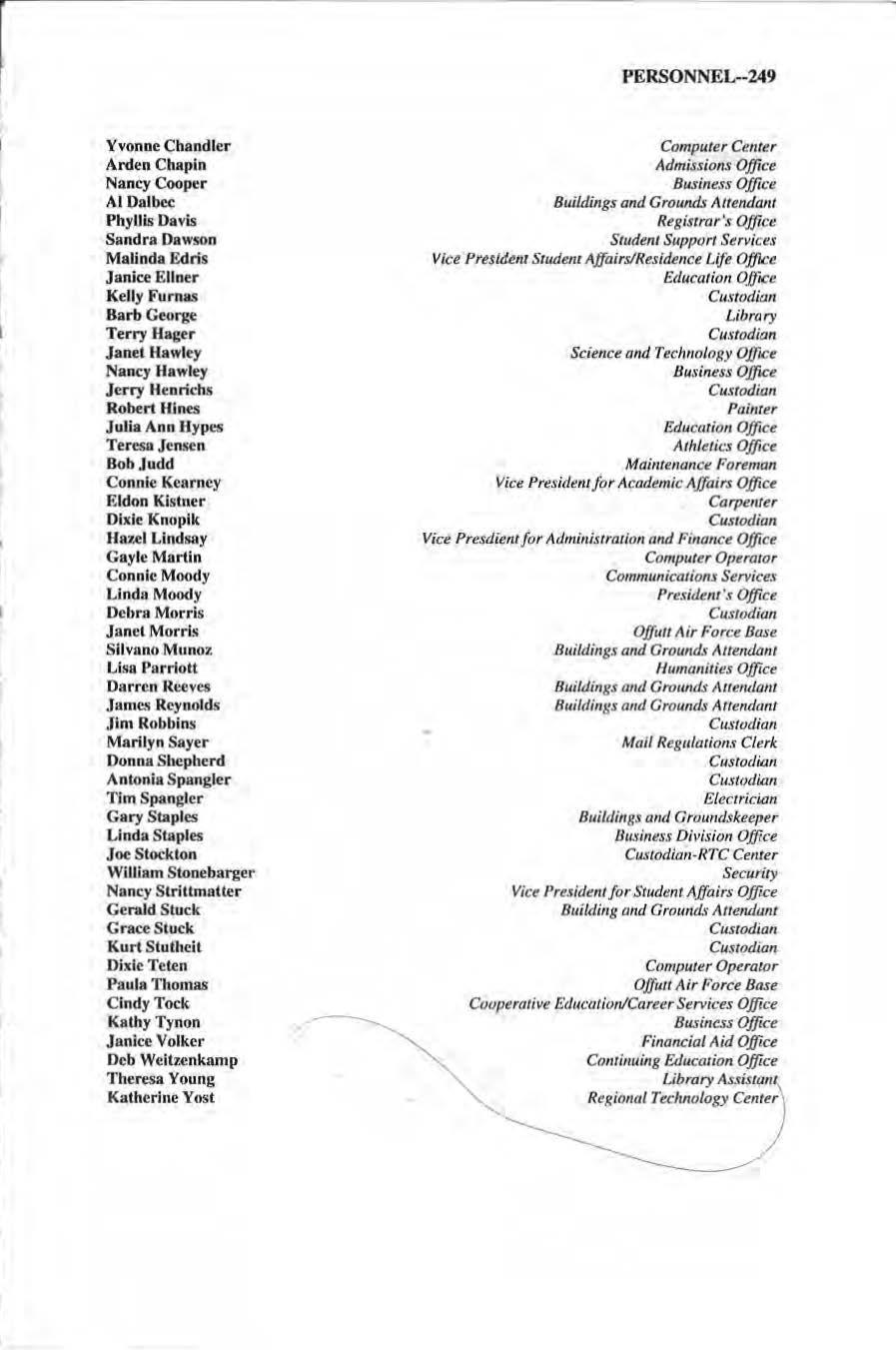
Computer O(Jerator
Communications Services
Presidem·., Office
Custodia11
Off111t Air Force Ba~·e
B11ildi11g.f and Grounds Atte11da11t
N111nanities Office
Buildings 011d Gro1111ds Attellllam
811ildi11gs a11d Gro1111ds Atte11d11nt
Cus1tJdia11
Mail Reg11latio11.r Clerk
Custodia11
C11s1tJdilJ11
Electrician
811ildi11gs 011d Gro,mdskeeper
Business Division Office
Custodla11-RTC Cemer
Security
Vice l'rt ,ident for Student Affairs Office
811ildi11g and Gro1111d.1· A1te1ulant
C11stodia11
Custodian
Compt1ter Opuator
OjJUJi Air Force Base
Cooperative Ed11cotio11/CareerServices Office
Business Office
Financial Aid Office
Co111inuing Educotion Office
Ubrary Assista111
T«hnmogy
P ERSONNEL--249
---::•••I
c~,,
Index - A-
Academic Appeal
Academic Bankruptcy
Academic Calendar .
Academic Credit
Academic Dishonesty
Academic Probation .
Academic Progress Standards for Financial Aid
Academic Rights of Studenls.
Academic Sus pen si on Accreditation , Add/Drop Procedure
Computer Lab Fee , •
Con11puter Science
Computer Scfence Cou rse Descriptions
ConHumer Economics Course Descriptions
Con1inuing Educ~tion
Cooperative Educ a1ion and Career Services , Correspondence Course., ,
Correspondence and Extensio n C r dits
Counse ling and Student Support Services
Course Ch allenge
Course Fees ,
Cred e ntial Pile Fee •.• , Crimi nal Justice Course Descriptio ns
-D·
DANT£$.
Dca<I Week
Defe rment Fee
Degree Fee
Degr ee Programs
Degree and Program Info rmatio n
Degree Requirements for Bac he lor of Ans
aJ1d Bachelor of Science
Degree RequiremcoLs for Bachelor of n:chnology

250•-INDEX
Admission
Admission
AIDS
Alumni
APCrcdit
Armed
Art Cour.;Q Descri plion s •• ssessme nt . A lctics .......... ... . Aue ~ancc and Scholastic ')ltitudc Aud!t>-,.: ) • Aud1t111g a co~ :._.:,y· ·B· B,1che lor Degree Program s Bache lor of Arts Bach e lor of Science • . . . Bachelor of Technology Biological Science Course Descriptions Busines s Course Descriptions • Bu si ness, Division Of .•.•.. ·C· Campus Map. Capital l111prove111e11l Fee Career Center Change of Advisor Change o f Major . . . . . Change in Registrati on/Drop-Add Chemistry Cou rse Descriptions Classification of Students 65 65 Hi 65 68 69 21 45 69 •. 3 72 57 70 5, 35 35 14 .9 .9 9 10 49 60 52 65 58 17 65 .151 70 35 1 , 65 65 5 4 54 88 93 , 153 . 156 87 . 4 13 35 n 72 n 167 73 CLEP • , •. C lubs , .•. , •. , Code o f Conduct Co llege Course Descriptions . Co llege l OO and College 400 14, 65,.67 41 45 .169 Couri;c Descriptions College and Public Services Co llege Survival S kills College 1'r:u1sfer S tudents Com pleme ntary Degree Emphasis , 85 52 56 6 57
Additional Degree Regulations .•. • Admioislralive Wilhdrawal/Drop , Admission . . . . . . . . . , . . Admissions and School Relations
Fee ,
from Non-Accrcduted Colleges Adm ission of No n-Degree Students Admission of Non-High School Graduates Seeking a Degrcc •. Admission to Advanc<;d Standing
Agric ulture Transfer Program
Association •
... , .. • .. A pplicatio n for Degree Applying fo r Financial Aid
Serv ices
Credi
Services
Degr-ees ...... .. . , Devdopmcntal Skills
t Dini1ng
Elcc1ive.~ (OIT,111 Program)
Slildy ..•.. Disc:iplinary Procedures Disc;riminatio n , Dornnltorics f);~;~~:1~k{~~~: E.1riJ1 Entry . . . . . . . . . . . Ecornomic Development , Econ1omics Course Descriptio ns 13 .134 170 .173 14,60 35, 58, 60 65 57 36 66 14 14 .173 66 73 14 14 81 . 54 55 56 54 58. Iii 36 .• 57 58 , 62 47 49 16, 39 • .• 72 . . . 5 °I • 66 52 .174 Educ:ati o n, Psychology and Physical Education. Di vision or Edurntion Course Descriptions, English Course Descriptions Ente,ri ng Freshman Exann inations Expc:nsc.s and Financial Aid Tuili oo Exteinsion Ex tm-l nstitutional Credi t ..... Facilities Fee Facu lty/Staff . . . . . . . . , . • . . Family Education Rights and Privacy Ai:tof 1974 Fcdcrally-Pun<lcd Programs Fees Final Exams , Financial Aid , Food Serv ice Rates Freedom of Access . Free<lom o f Association • Freedom o f Expression , . , . Freedom from Unreasonable Searc h/Seizu re • Full -'Time Stu<le.111 Status , 96 .1 76 .183 5 67 12 63 66 . 13 245 49 20 13 73 2 1, 37 16 47 48 48 47 73
Direc ted
Oirci;ti:d
-N•
Nebraska Business Development Center
Nebraska Residency Regulations for Tuition
1'1ews1~aper
Notifi,cation of Admission
-0-
Off-campus Service Fee
Off, si tc Locations , , ,
Offull Extension Programs •
Orientation •
Other Sources of Financ'ial Aid.
Outcomes Assessment
Overload
.p.
Pnrklng .
PEP
Personal Curriculum Guide

Peru Stale Credits
Peru State Times
Petition
Philos,ophy
Philos,ophy Course Descriptions
Physh::tl Educ,u,on Course
Dc~;cri ptions . . . . . . . . .
Physics Course Descriptions
Politi(:al Science Course Descriptions
Prc- l'o'ufc.ssional Programs ,
Pre-Dental and Pre-Medical
P~-Dcntal Hygiene
Pre-Engineering
Pre-Forestry
Pre-Mortuary
Pre-Nursing
l'rc-Oplometry
Pre-Osteopathic Medicine
Pre - Pharmacy
Pre-Physical Therapy .
Pre - Physician Assistanl
Prc - Podiatric Medicine
Pre-Radiation Science Technology
Prc - RespiraloryThcrapy .
Pre - V<:1erinary
.c.
Course Oescnptions Geo logy Course Descriptions , Genera l Science Course Descriptio ns Genera l Studies
Studies and Major Goals of the College Grade Point Average • Grading System . . Graduate Studies • Graduation Honors
RoquircmenlS
Health Center Health Ccntcr fee
Course Oescriplions Hi$tory of U1c College Honorary Societies Monors List. Mon0l'S Program Course Descriplions Housing • ._ • • Mousing nnd Food Service Conu-acts , . Housing and Food Serv ice Refunds Housing Rates , How to Determine Credit Humanities Cou~e Descriptions Humanities, Division Of .,. Incomplete Coursework Independent Study lndc, of Building., lmlustrial Techn o logy Course Dcscriptiong Institutional Examinations , lastil\Jlionally-Fundcd Programs Institutional u,ans and Awards Institutional Scholarships lntem~1iom1l Student Admission lntramurals and Recreation International Students • Internship lnttoduction to Pcm Stale .J. 190 .192 .188 57. 77 55 • 3 55,57 74 63 74 54 • , 40 13 .193 •• I 43 75 k~. 196 15, J7 15 16 16 66 .198 .113 66 58,63 3 199 67 18 • 34 18 • 7 37 • 7 63 , • I Jo urnalism Course Desc riptions 205 -lr L:uc Rcgistratio11 i;ec , Late Tuition Pee , Library and Instruc tional Serv ices Ce nter Loans -MMajors M:\jor Grad e Point Ave.r~ge Management Course Descriplions Mathematics Co urse Descriptions Medical Technology Me mberships and Accreditations Mid-year Admissions Minors .... . ..... . Mission of the College Moto r Vehicle Regis tration Music Course Descriptions Music Organizations 14 14 53 15 16 72 , 75, 81 55 . 206 .209 .149 3 9 81 , 2 14 .215 43
Geography
General
Graduation
.ff.
History
I NDEX--251
Medicine
Music Lessons . .. Prol>a li<>n , • Profe,;sional and Social Organizations
School Rc.,idence Credits
ychology Course Descriptions l'ubli ptions Fee Pub lic 1-lealth Services -RReado 11issior1 Refuntd Po licy Religiou s OrganiMtioM Repem Course . . . . . Repla cement 1.0 Card Requi remenls for Financial Aid 52 12 44 • 11 14 60 60 37 17 75 75 51 67 79 55 44 15 .222 .222 .222 228 229 63 142 142 142 . 143 143 . 143 • • 144 , 145 145 146 .146 .146 .147 .147 .148 14 75 4! 58 .231 13 40 •. •• llJ 14, 15, 16 43 67 13 18 Rcs iclcnce Halls and Living Accomo<!ations Residence Hall Rcgulatior1s 37 48 12 56 17 Res1dcncy Requirements Resident Credits , Room Deposit Refund
Private
Professional
Ps

252-- lNOEX
Scholarships ...•........ Science & Technology, Division of "SeamlessTransfcr·· Second Undergraduate Degree Selecting a Major ...... , Senior Competencies Sexual Assaull and Sexual Hara.<;Sment. Social Work Course Descriptions Sociology Course Descriptions. Spanish Course Descriptions , Special Academic Programs Spedal Education Course Descriptions Speech and Drama Course Descriptions Spons ..... Standardized Examination State.Funded Programs , State Scholarship Programs Srudcm Activity Fee Srudcnt Affairs Mission Statement . Student Event Fee , Student Handbook Student Health Services . . . Student Grievance ProccdureS Student Identification Card Student Organizations Student Panicipation in fnstitutional Government Student Programs and Student Life Student Publication~ . . . . . . Students Rights, Freedoms, and Responsibilities Student Support Service.~ _ 23 .129 7 58 75 71 . 50 .234 .236 238 ' 60 .238 .241 35 67 20 20 13 35 13 40 40 48 13 41 44,48 40 44 44 35
Teaching Stud,mts wtth Disabilities Summer Session Susp,!nsion • , -TTabll: of Contents Teact1er E<lucation Tcchrnical Degree Emphasis Total Degree Hours Transcripts Transfer of Credit Tuition _ • , • Tuition/Fees , Tuititin Refunds u Ondcrgraduate Degree and Program lnfonnalion Upper Division Credit .v. Variable Credit Courses Varsity Sports Credits Vchi<!lc Rcgi s ttJtion lllld Pru-lung Vocational Education Course Descriptions •W• Waiver ........ . . Withdrawal from Closs WiU1drawal from College Withdrawal from Regular Semester WiUalrawal from Summer Session Wilhclrawal from Workshops and Other Non-S1J1nda!'d Academic Tcm1s . . . 99 50 64 75 , ii % 57 55 14, 75 .6. 7, 68 12 1;2 14 54 55,57 68 58 51 .244 75 15, 76 15, 76 15 15 15
.s.
Studc:nt


Ne braska's First Co llege Office of Admissions Peru State College P.O. Box 10 Peru, NE 68421 (402) 872-2221 • (800) 742-4412





































































































































































































































































